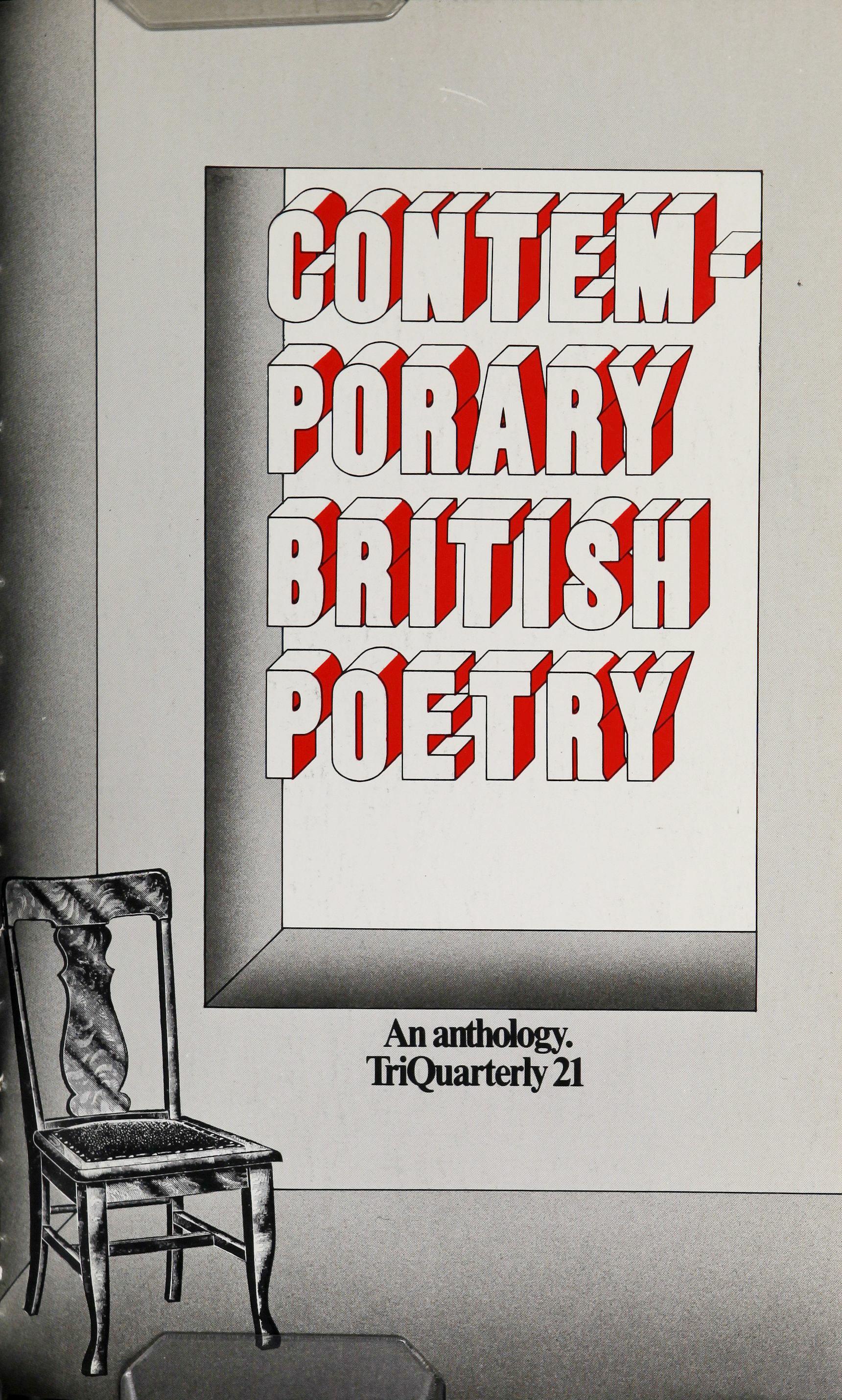
An anthology. mQuarterly21

EDITOR Charles Newman
GUEST CO-EDITOR John Matthias
MANAGING EDITOR Laurence Gonzales
ART DIRECTOR Lawrence Levy
ASSOCIATE EDITORS Suzanne Kurman
Roberta Stein
BUSINESS MANAGER Dianne Wall
ASSOCIATES
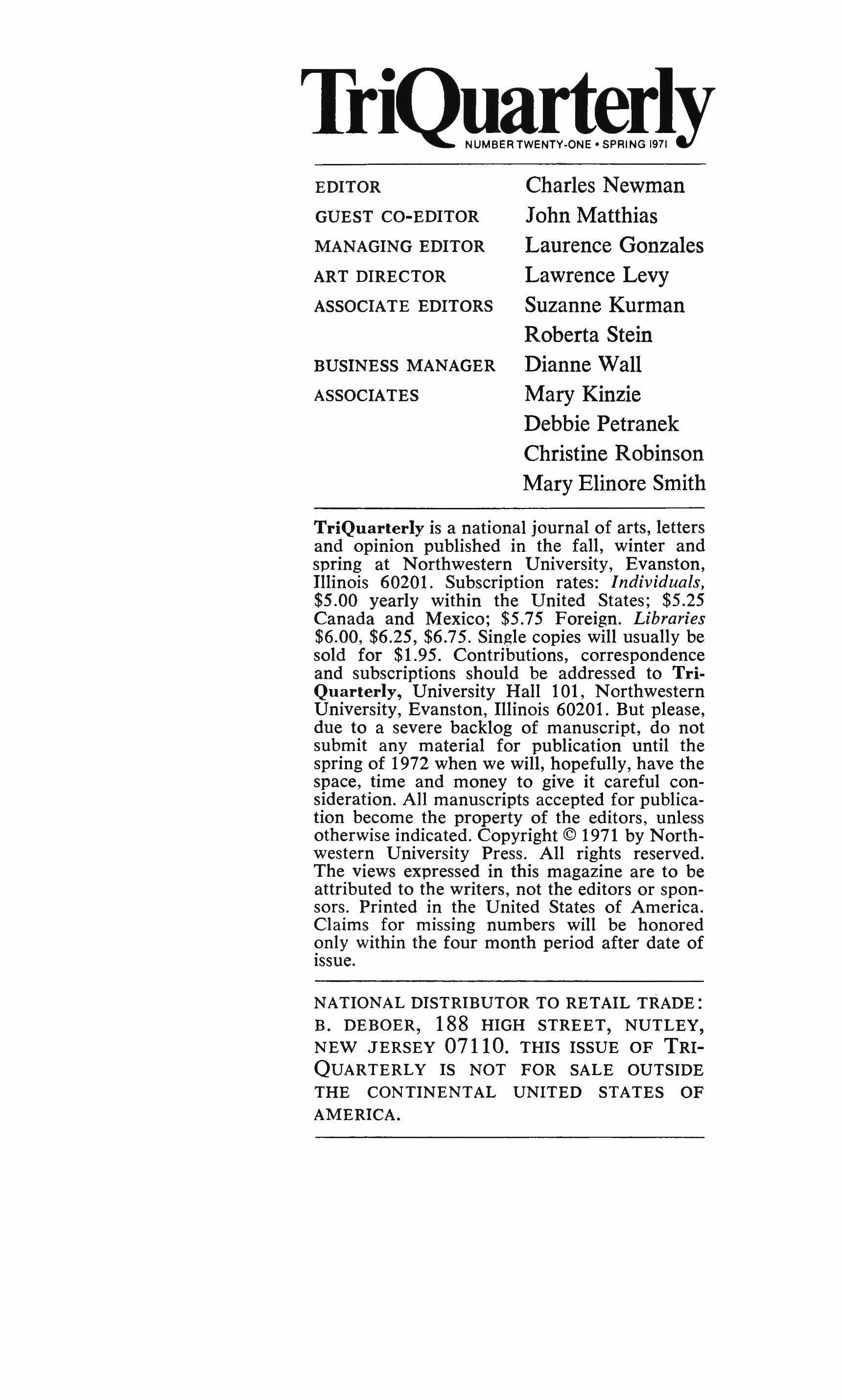
Mary Kinzie
Debbie Petranek
Christine Robinson
Mary Elinore Smith
TriQuarterly is a national journal of arts, letters and opinion published in the fall, winter and spring at Northwestern University, Evanston, Illinois 60201. Subscription rates: Individuals, $5.00 yearly within the United States; $5.25 Canada and Mexico; $5.75 Foreign. Libraries $6.00, $6.25, $6.75. Single copies will usually be sold for $1.95. Contributions, correspondence and subscriptions should be addressed to TrfQuarterly, University Hall 101, Northwestern University, Evanston, Illinois 60201. But please, due to a severe backlog of manuscript, do not submit any material for publication until the spring of 1972 when we will, hopefully, have the space, time and money to give it careful consideration. All manuscripts accepted for publication become the property of the editors, unless otherwise indicated. Copyright © 1971 by Northwestern University Press. All rights reserved. The views expressed in this magazine are to be attributed to the writers, not the editors or sponsors. Printed in the United States of America. Claims for missing numbers will be honored only within the four month period after date of issue.
NATIONAL DISTRIBUTOR TO RETAIL TRADE: B. DEBOER, 188 HIGH STREET, NUTLEY, NEW JERSEY 07110. THIS ISSUE OF TRIQUARTERLY IS NOT FOR SALE OUTSIDE THE CONTINENTAL UNITED STATES OF AMERICA.
The poetry
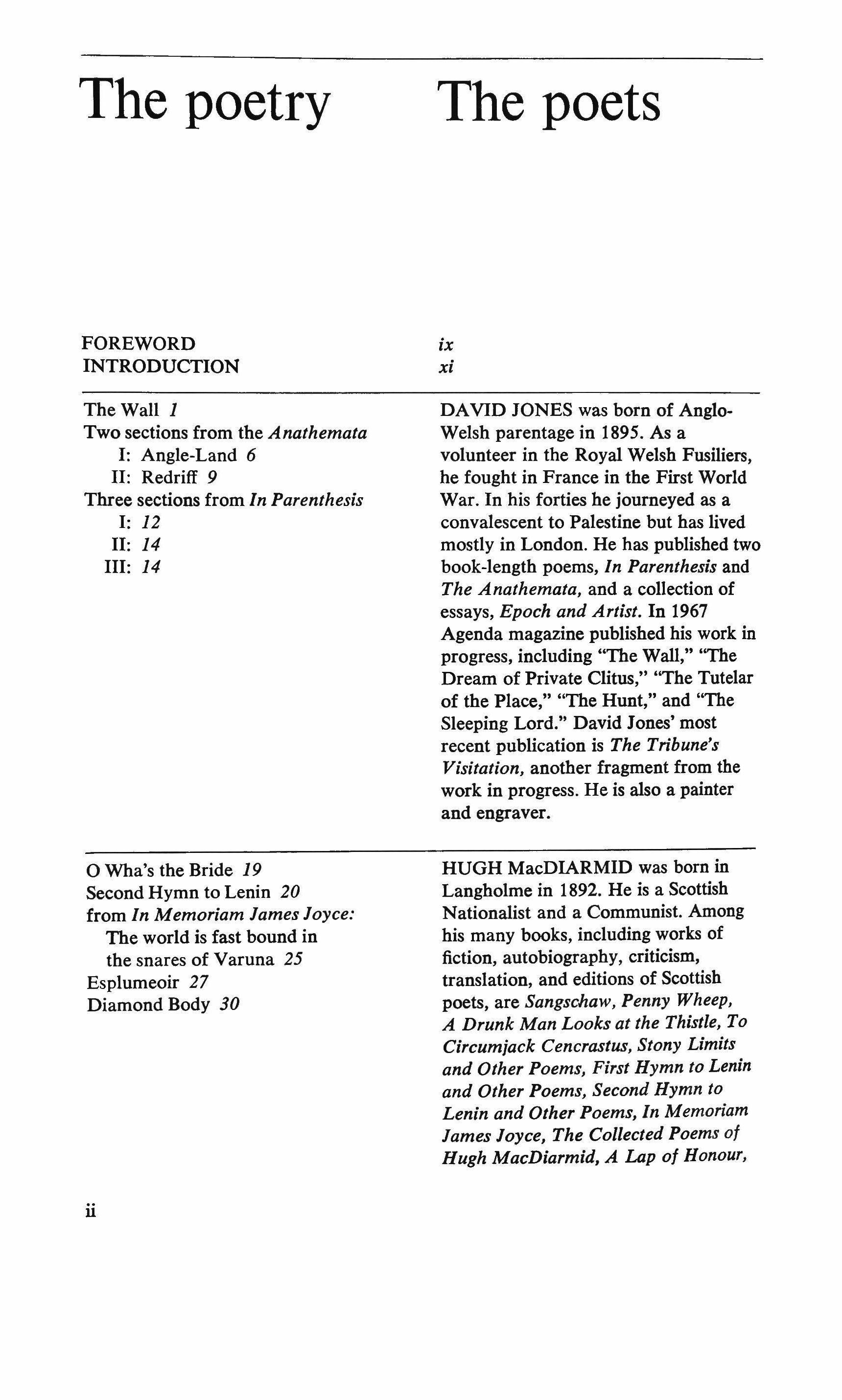
FOREWORD INTRODUCTION
The Wall 1
Two sections from the Anathemata
I: Angle-Land 6
II: Redriff 9
Three sections from In Parenthesis
I: 12
II: 14
III: 14
o Wha's the Bride 19
Second Hymn to Lenin 20 from In Memoriam lames loyce: The world is fast bound in the snares of Varuna 25
Esplumeoir 27
Diamond Body 30
The
poets
DAYID JONES was born of AngloWelsh parentage in 1895. As a volunteer in the Royal Welsh Fusiliers, he fought in France in the First World War. In his forties he journeyed as a convalescent to Palestine but has lived mostly in London. He has published two book-length poems, In Parenthesis and The Anathemata, and a collection of essays, Epoch and Artist. In 1967 Agenda magazine published his work in progress, including "The Wall," ''The Dream of Private Clitus," ''The Tutelar of the Place," "The Hunt," and ''The Sleeping Lord." David Jones' most recent publication is The Tribune's Visitation, another fragment from the work in progress. He is also a painter and engraver.
HUGH MacDIARMID was born in Langholme in 1892. He is a Scottish Nationalist and a Communist. Among his many books, including works of fiction, autobiography, criticism, translation, and editions of Scottish poets, are Sangschaw, Penny Wheep, A Drunk Man Looks at the Thistle, To Circumiack Cencrastus, Stony Limits and Other Poems, First Hymn to Lenin and Other Poems, Second Hymn to Lenin and Other Poems, In Memoriam lames Loyce, The Collected Poems of Hugh MacDiarmid, A Lap of Honour,
ix xi
ii
Vestiges 34
What the Chairman told Tom 35 from Briggflatts
I 37 Coda 41
Chomei at Toyama 42
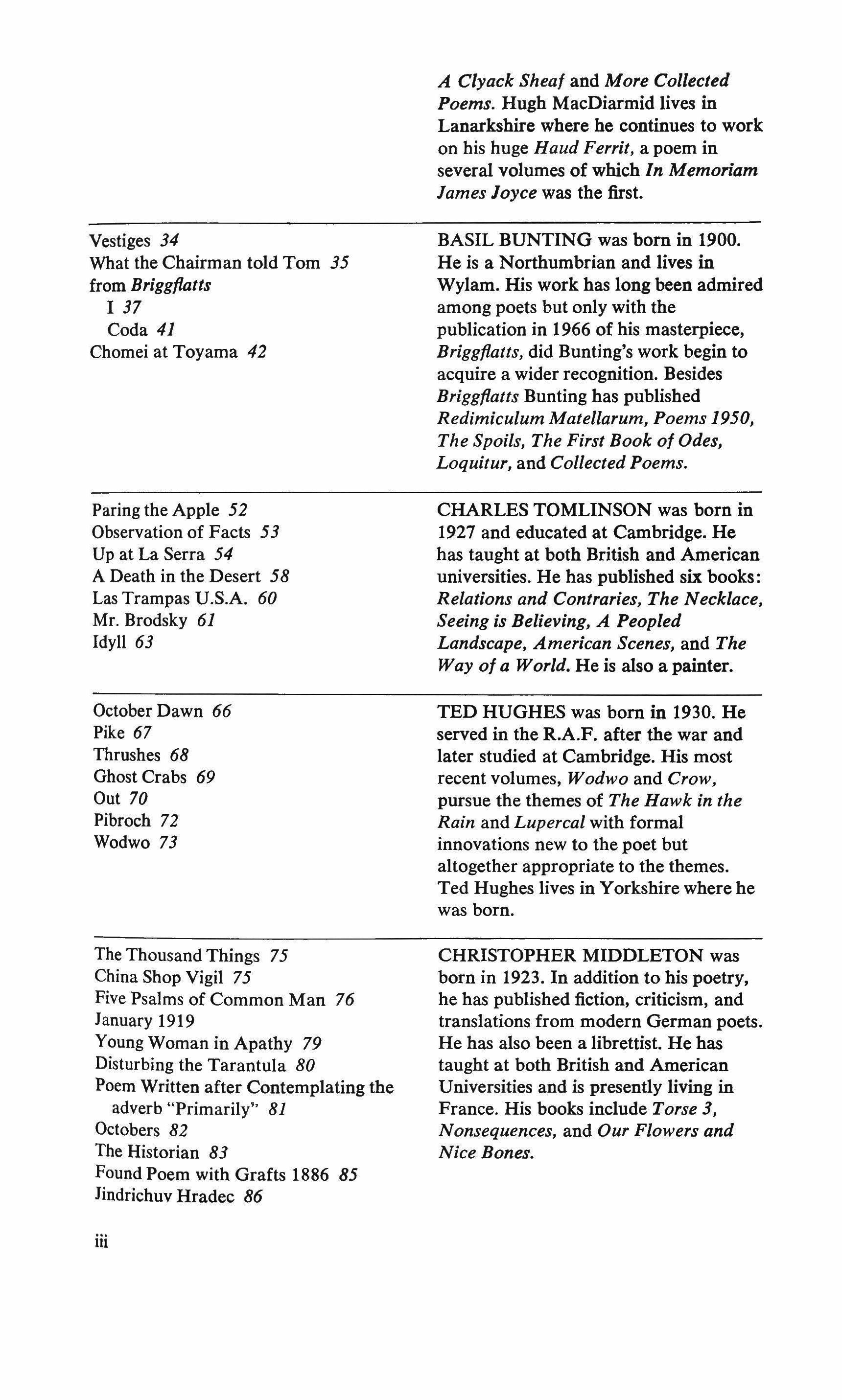
Paring the Apple 52
Observation of Facts 53
Up at La Serra 54
A Death in the Desert 58
Las Trampas U.S.A. 60
Mr. Brodsky 61
Idyll 63
October Dawn 66
Pike 67
Thrushes 68
Ghost Crabs 69
Out 70
Pibroch 72
Wodwo 73
The Thousand Things 75
China Shop Vigil 75
Five Psalms of Common Man 76
January 1919
Young Woman in Apathy 79
Disturbing the Tarantula 80
Poem Written after Contemplating the adverb "Primarily" 81
Octobers 82
The Historian 83
Found Poem with Grafts 1886 85
Jindrichuv Hradec 86
A Clyack Sheaf and More Collected Poems. Hugh MacDiarmid lives in Lanarkshire where he continues to work on his huge Haud Ferrit, a poem in several volumes of which In Memoriam lames loyce was the first.
BASIL BUNTING was born in 1900. He is a Northumbrian and lives in Wylam. His work has long been admired among poets but only with the publication in 1966 of his masterpiece, Briggflatts, did Bunting's work begin to acquire a wider recognition. Besides Briggflatts Bunting has published Redimiculum Matellarum, Poems 1950, The Spoils, The First Book of Odes, Loquitur, and Collected Poems.
CHARLES TOMLINSON was born in 1927 and educated at Cambridge. He has taught at both British and American universities. He has published six books: Relations and Contraries, The Necklace, Seeing is Believing, A Peopled Landscape, American Scenes, and The Way of a World. He is also a painter.
TED HUGHES was born in 1930. He served in the R.A.F. after the war and later studied at Cambridge. His most recent volumes, Wodwo and Crow, pursue the themes of The Hawk in the Rain and Lupercal with formal innovations new to the poet but altogether appropriate to the themes. Ted Hughes lives in Yorkshire where he was born.
CHRISTOPHER MIDDLETON was born in 1923. In addition to his poetry, he has published fiction, criticism, and translations from modern German poets. He has also been a librettist. He has taught at both British and American Universities and is presently living in France. His books include Torse 3, Nonsequences, and Our Flowers and Nice Bones.
iii
Drop 87
Early Warning 88
The Twelve Hotels 90 Against the Sun 93
At Hiinegg 98

Twenty Words. Twenty Days 105
City 125
Ring of Waves 144
Prints and Photos 145
Print: Le Circus Marine
Sea-Poppy 1 No. 11
Sea-Poppy 2 KY
Photo: Sundial in Landscape
Photo: Sundial in Detail
Photo: Stem and Stern
Photo: The Land's Shadows
Photo: Wave/ave
Photo: Signpost Poem
Photo: Song/wind/wood Line Boats 161 Green Waters 162
from Patrocleia 164 from Pax 173 iv
GEORGE MacBETH was born in Scotland in 1932 and educated at Oxford. As a talks producer for the B.B.C. his enthusiasm for innovative work has provided and continues to provide a forum and an audience for new poetry in Britain. He has published six collections of poems: The Broken Places, A Doomsday Book, The Colour of Blood, The Night of Stones, A War Quartet, and The Burning Cone. He has also edited three anthologies for Penguin, the remarkable Penguin Book of Sick Verse among them.
GAEL TURNBULL was born in Edinburgh in 1928. He is a physician doing general practice and anaesthetics in Worcestershire. He has published two volumes of poems, A Trampoline and Scantlings.
ROY FISHER was born in 1931 and lives in Birmingham where he works as a jazz pianist. Fisher has published City, The Memorial Fountain, Ten Interiors & Various Figures, The Collected Poems 1968, and an experimental prose volume called The Ship's Orchestra.
IAN HAMILTON FINLAY was born in 1925. He has made poems, stories, and plays, as well as poem/prints and poems in various materials such as glass, wood, and stone. Among some twenty-five books and pamphlets, many printed by his own Wild Hawthorn Press, are The Dancers Inherit the Party, Glasgow Beasts, Cythera, Ocean Stripe Series 5, and Rhymes for Lemons. Mr. Finlay is presently assembling a Selected Poems. He lives in Lanarkshire, in Scotland.
CHRISTOPHER LOGUE was born in 1926 and lives in London. In the early Sixties he received a grant from the Bollingen Foundation to translate part
The Barbarians 178 from Identities: I, IV, VII 178 from The Administration oi Things: I, II, VI, VIII 182 To Redistort a Weltanschauung 185
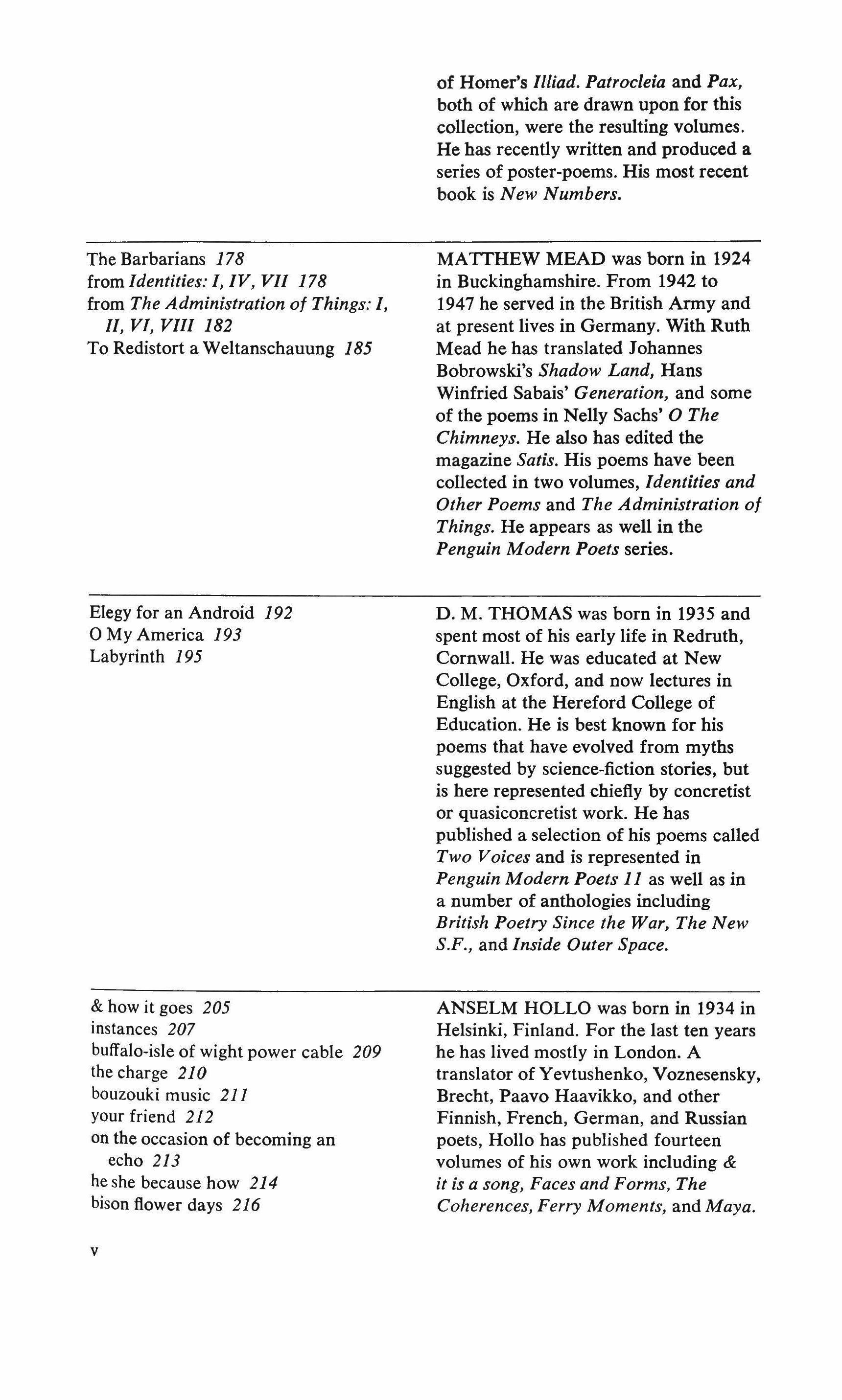
Elegy for an Android 192 o My America 193 Labyrinth 195
& how it goes 205 instances 207 buffalo-isle of wight power cable 209 the charge 210 bouzouki music 211 your friend 212 on the occasion of becoming an echo 213 heshe because how 214 bison flower days 216 v
of Homer's llliad. Patrocleia and Pax, both of which are drawn upon for this collection, were the resulting volumes. He has recently written and produced a series of poster-poems. His most recent book is New Numbers.
MATIHEW MEAD was born in 1924 in Buckinghamshire. From 1942 to 1947 he served in the British Army and at present lives in Germany. With Ruth Mead he has translated Johannes Bobrowski's Shadow Land, Hans Winfried Sabais' Generation, and some of the poems in Nelly Sachs' 0 The Chimneys. He also has edited the magazine Satis. His poems have been collected in two volumes, Identities and Other Poems and The Administration oi Things. He appears as well in the Penguin Modern Poets series.
D. M. THOMAS was born in 1935 and spent most of his early life in Redruth, Cornwall. He was educated at New College, Oxford, and now lectures in English at the Hereford College of Education. He is best known for his poems that have evolved from myths suggested by science-fiction stories, but is here represented chiefly by concretist or quasiconcretist work. He has published a selection of his poems called Two Voices and is represented in Penguin Modern Poets 11 as well as in a number of anthologies including British Poetry Since the War, The New S.F., and Inside Outer Space.
ANSELM HOLLO was born in 1934 in Helsinki, Finland. For the last ten years he has lived mostly in London. A translator of Yevtushenko, Voznesensky, Brecht, Paavo Haavikko, and other Finnish, French, German, and Russian poets, Hollo has published fourteen volumes of his own work including & it is a song, Faces and Forms, The Coherences, Ferry Moments, and Maya.
The Street 218
Beyond Breath 219
Facts 220
Old Mill, Newton St. Cyres 221
Inventory/Intinerary 222
The Amana Colonies 223
Persistent Narrative 224
After a Journey 225
The Stone Poems 225
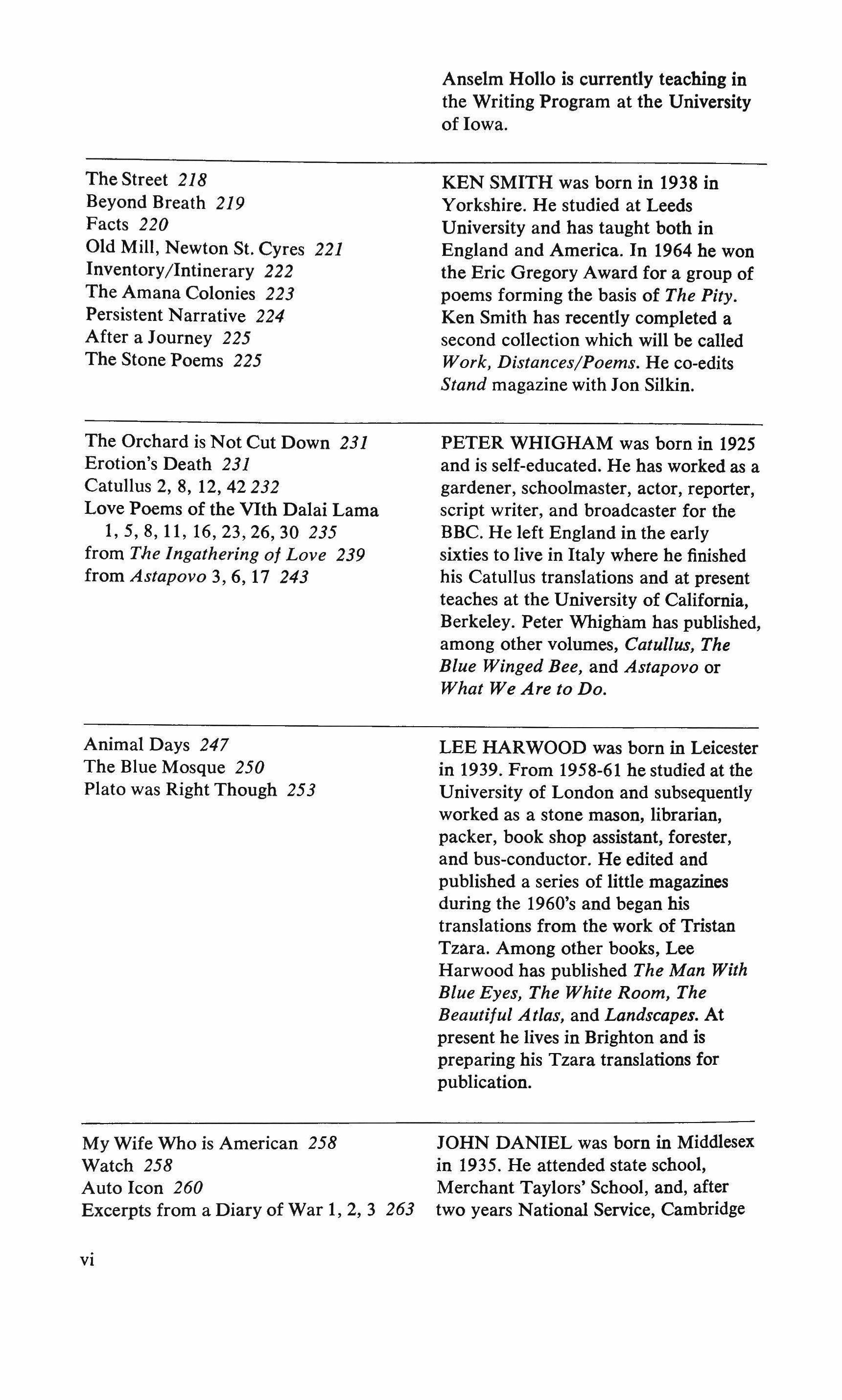
The Orchard is Not Cut Down 231
Erotion's Death 231
Catullus 2, 8, 12,42232
Love Poems of the VIth Dalai Lama 1,5,8,11,16,23,26,30235 from The Ingathering of Love 239 from Astapovo 3, 6, 17 243
Animal Days 247
The Blue Mosque 250 Plato was Right Though 253
My Wife Who is American 258
Watch 258
Auto Icon 260
Excerpts from a Diary of War 1, 2, 3 263
Anselm Hollo is currently teaching in the Writing Program at the University of Iowa.
KEN SMITH was born in 1938 in Yorkshire. He studied at Leeds University and has taught both in England and America. In 1964 he won the Eric Gregory Award for a group of poems forming the basis of The Pity. Ken Smith has recently completed a second collection which will be called Work, Distances/Poems. He co-edits Stand magazine with Jon Silkin.
PETER WHIGHAM was born in 1925 and is self-educated. He has worked as a gardener, schoolmaster, actor, reporter, script writer, and broadcaster for the BBC. He left England in the early sixties to live in Italy where he finished his Catullus translations and at present teaches at the University of California, Berkeley. Peter Whigham has published, among other volumes, Catullus, The Blue Winged Bee, and Astapovo or What We Are to Do.
LEE HARWOOD was born in Leicester in 1939. From 1958-61 he studied at the University of London and subsequently worked as a stone mason, librarian, packer, book shop assistant, forester, and bus-conductor. He edited and published a series of little magazines during the 1960's and began his translations from the work of Tristan Tzara, Among other books, Lee Harwood has published The Man With Blue Eyes, The White Room, The Beautiful Atlas, and Landscapes. At present he lives in Brighton and is preparing his Tzara translations for publication.
JOHN DANIEL was born in Middlesex in 1935. He attended state school, Merchant Taylors' School, and, after two years National Service, Cambridge
vi
Of 91 Men Leaving an Underground
Station 265
Injury to Insured 266
Phrases for Everyday Use by the British in India 267
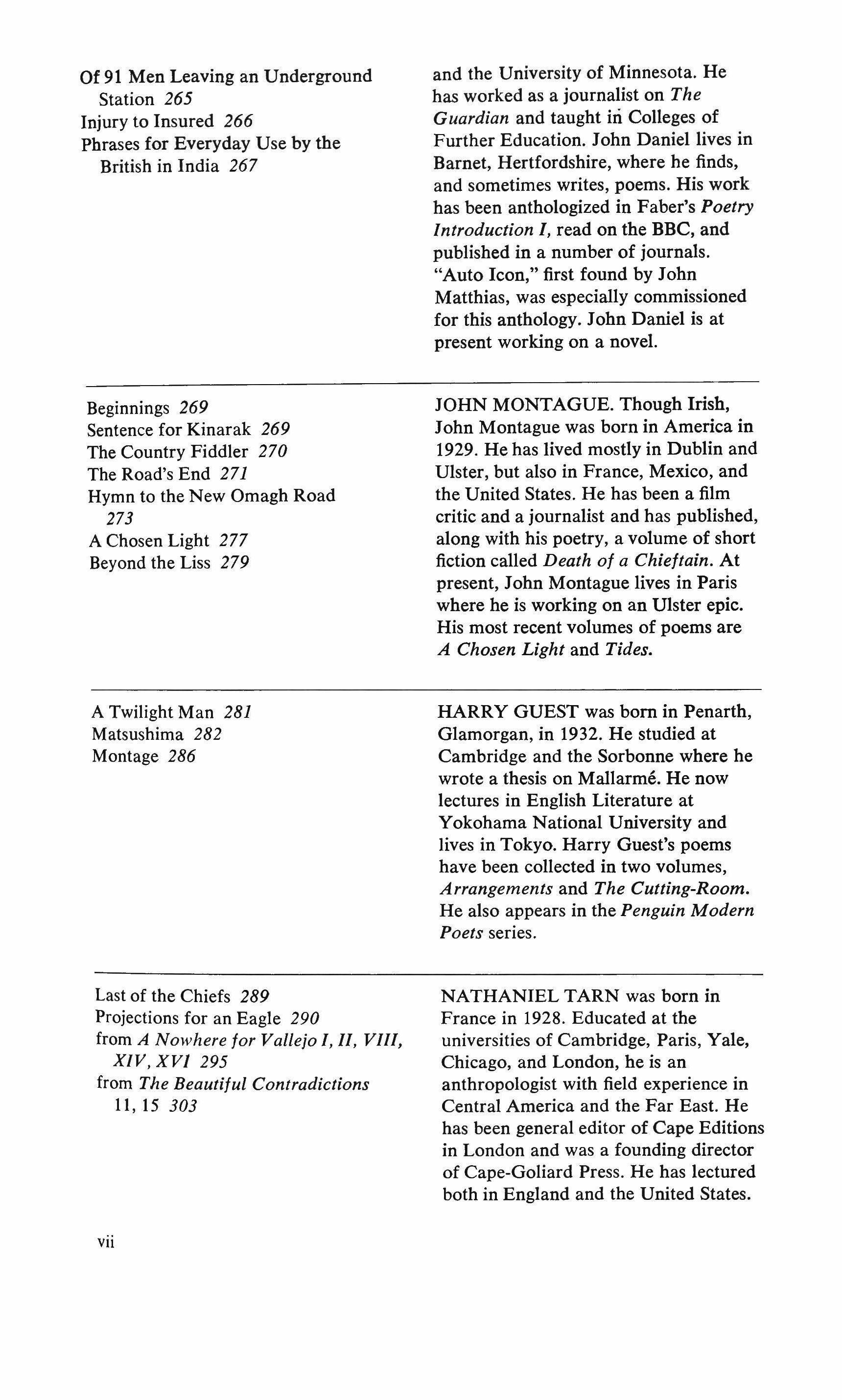
Beginnings 269
Sentence for Kinarak 269
The Country Fiddler 270
The Road's End 271
Hymn to the New Omagh Road 273
A Chosen Light 277 Beyond the Liss 279
A Twilight Man 281 Matsushima 282 Montage 286
Last of the Chiefs 289
Projections for an Eagle 290
from A Nowhere for Vallejo I, II, VIII, XIV, XV1 295 from The Beautiful Contradictions 11, 15 303
and the University of Minnesota. He has worked as a journalist on The Guardian and taught iri Colleges of Further Education. John Daniel lives in Barnet, Hertfordshire, where he finds, and sometimes writes, poems. His work has been anthologized in Faber's Poetry Introduction I, read on the BBC, and published in a number of journals. "Auto Icon," first found by John Matthias, was especially commissioned for this anthology. John Daniel is at present working on a novel.
JOHN MONTAGUE. Though Irish, John Montague was born in America in 1929. He has lived mostly in Dublin and Ulster, but also in France, Mexico, and the United States. He has been a film critic and a journalist and has published, along with his poetry, a volume of short fiction called Death of a Chieftain. At present, John Montague lives in Paris where he is working on an Ulster epic. His most recent volumes of poems are A Chosen Light and Tides.
HARRY GUEST was born in Penarth, Glamorgan, in 1932. He studied at Cambridge and the Sorbonne where he wrote a thesis on Mallarme, He now lectures in English Literature at Yokohama National University and lives in Tokyo. Harry Guest's poems have been collected in two volumes, Arrangements and The Cutting-Room. He also appears in the Penguin Modern Poets series.
NATHANIEL TARN was born in France in 1928. Educated at the universities of Cambridge, Paris, Yale, Chicago, and London, he is an anthropologist with field experience in Central America and the Far East. He has been general editor of Cape Editions in London and was a founding director of Cape-Goliard Press. He has lectured both in England and the United States.
vii
North Africa Breakdown 310
Hot Day at the Races 310
Here in Polynia 311
You Were Wearing Blue 312
Sliding Two Mirrors 312
There are Lime Trees in Leaf on the Promenade 313
Not Under Holly or Green Boughs 315 Six Days 316

Bard 321
Blame 321 from Person 322 Japan 324 from Christ 325 from Ichor 326 from Hiroshima 328
Acknowledgments 336
Nathaniel Tarn has published five volumes of poetry: Old Savage/Young City, Where Babylon Ends, The Beautiful Contradictions, October, and A Nowhere for Vallejo. He has also done some translations from the Spanish, chiefly from the poetry of Pablo Neruda.
TOM RAWORTH was born in 1934 of Anglo-Irish parentage. He has been an insurance clerk, laborer, assistant transport manager, continental telephonist, and editor of the magazine Outburst. Tom Raworth has published four volumes of poems, The Relation Ship, The Big Green Day, Lion Lion, and, with John Esam and Anselm Hollo, Haiku. He is at present studying LatinAmerican Literature at the University of Essex.
GAYIN BANTOCK was born near Birmingham in 1939. He attended New College, Oxford from 1960-64 where he wrote his 7,000 line epic poem Christ. Since Christ, Gavin Bantock has written four long poems and is at present working on a fifth. His second book, A New Thing Breathing, was published in 1969. He teaches at Reitaku University in Japan.
Foreword

There is a contemporary British poetry which is modern; for a while that seemed to be in doubt. Perhaps, in America at least, it's still in doubt. In a preface to a fairly typical anthology of recent poetry in open forms, the editors write: "We decided to keep it American because we knew American and because, with a few exceptions nothing much has happened in English poetry since Lawrence laid down his pen and died." The introduction to another-just as typical, just as parochial-has it: "While most English poetry, whatever its imagery, sounds very much like English poetry written fifty years ago, much American poetry sounds like something new The remarks are condescending and flippant: a friend of mine likes to call this kind of talk "American Literary Jingoism" -which it is. It's not enough to "know American." But the attitude is widespread among American poets, editors, and teachers; worse, it's often fed by the British themselves. I have assembled this anthology because I admire a good number of British poets whose work is insufficiently known in this country. Because the work of these poets is insufficiently known British poetry is too often thought to be genteel, reactionary, and anti-experimental. Too often "British" means old or tired in America, "contemporary" rather than "modern," Philip Larkin rather than Tom Raworth. In fact, the best British poets are refining and extending the work of the modernist revolution in the same way their American contemporaries are.
I had thought at first to include only the younger poets, but a growing irritation over the neglect in this country of Jones, Bunting, and MacDiarmid prompted me to begin the anthology with their poems and, once I had decided to do that, to include as well the work of several fine poets whose English reputations were made in the 1950's. There are not,
ix

therefore, as many new poets represented as I had at first hoped. The book has aged a bit-but thereby it has acquired a longer memory. That, and a history; which is to say a form. In the first poem perplexed legionaries guard a Jerusalem wall. Dimly and darkly they looked forward-to us, our world. In the last poem that world is scourged. Between the two is the business of living, of living and of making: anaphora, anamnesis, anathemata.
But someone is bound to quarrel with my ordering of the material. After, say, George MacBeth-perhaps even after Bunting-the structure may seem arbitrary. "Hiroshima," if it was going to come at all, had to come last. Further, the conclusion of any book ought to be strong-and in this one, some 400 pages, that meant keeping Tarn and Raworth and Bantock grouped together at the end. The concrete sections required some distance between them. So did Harwood and Guest, for example; and Hollo and Raworth. Also people doing very heavy things: Hughes, Fisher, Mead, Smith, Tarn. The essential principle was variety and change of pace.
There are omissions which I regret (Volume Two would be easy), and some of these will be obvious ones. I intend no disrespect. While there was clearly no room for poets whose work contradicts the thrust and argument of the anthology and contributes, however good in kind it may be, to American misconceptions about British poetry, there should have been room for others whom I expect a number of readers will miss. Given the space, I made my decisions. I should also note that I have excluded certain poets whose poetry moves me very much when I hear it read aloud or set to music but which, naked on the page, unperformed, dies. I hope, like all of the poets here assembled, that the reader will read the poems in this book aloud. But I include nothing which cannot live on the page.
I admit, finally, as most anthologists ought, to some eccentricities of taste and some odd enthusiasms. I hope they will be contagious. J. M.
JOHN MATTHIAS is an American poet who has spent a good deal of time in England. His first collection of poetry, BUCYRUS, was published in 1971 by The Swallow Press. He teaches literature and creative writing at Notre Dame University.
x
Introduction
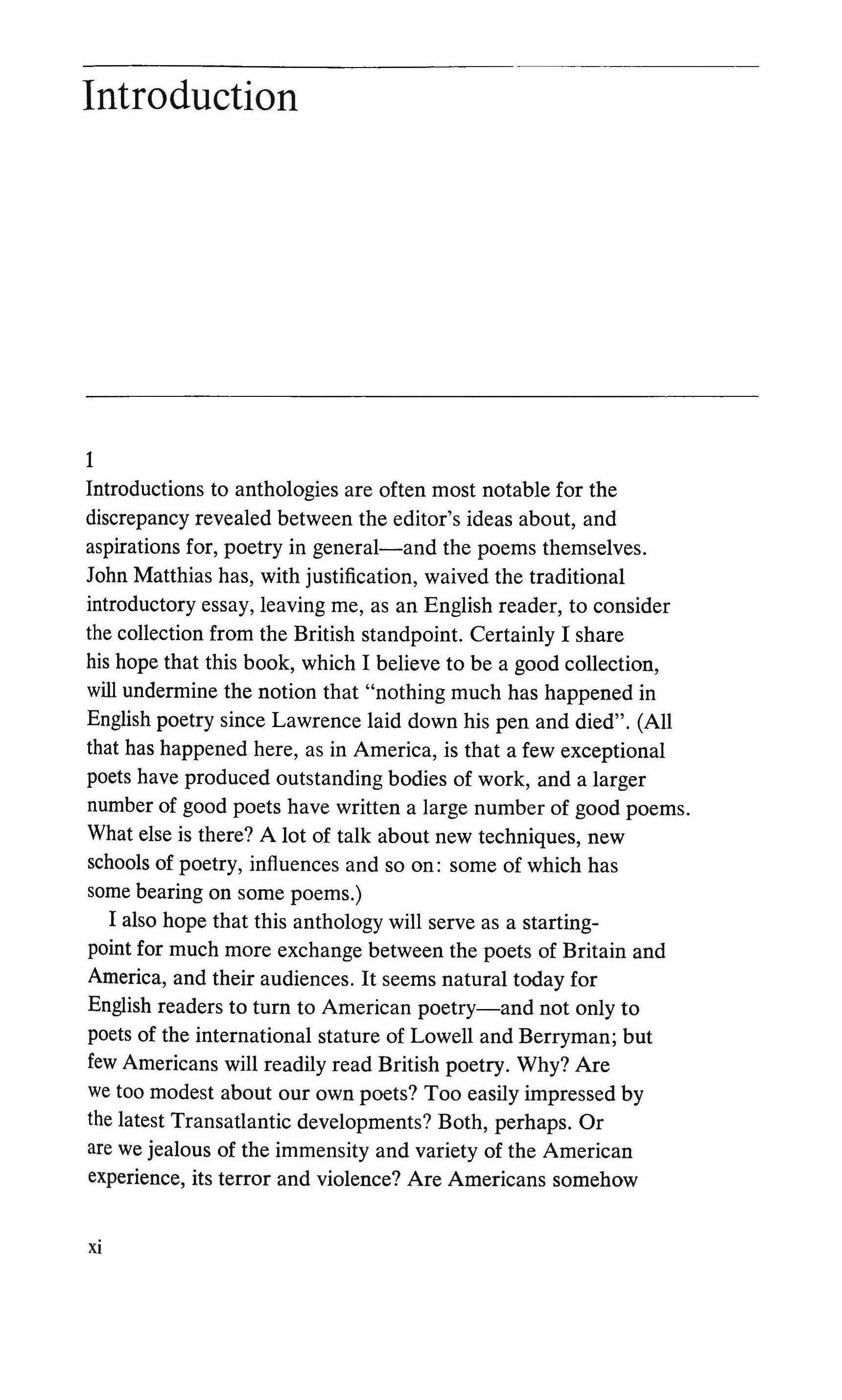
Introductions to anthologies are often most notable for the discrepancy revealed between the editor's ideas about, and aspirations for, poetry in general-and the poems themselves. John Matthias has, with justification, waived the traditional introductory essay, leaving me, as an English reader, to consider the collection from the British standpoint. Certainly I share his hope that this book, which I believe to be a good collection, will undermine the notion that "nothing much has happened in English poetry since Lawrence laid down his pen and died". (All that has happened here, as in America, is that a few exceptional poets have produced outstanding bodies of work, and a larger number of good poets have written a large number of good poems. What else is there? A lot of talk about new techniques, new schools of poetry, influences and so on: some of which has some bearing on some poems.)
I also hope that this anthology will serve as a startingpoint for much more exchange between the poets of Britain and America, and their audiences. It seems natural today for English readers to turn to American poetry-and not only to poets of the international stature of Lowell and Berryman; but few Americans will readily read British poetry. Why? Are we too modest about our own poets? Too easily impressed by the latest Transatlantic developments? Both, perhaps. Or are we jealous of the immensity and variety of the American experience, its terror and violence? Are Americans somehow
1
xi
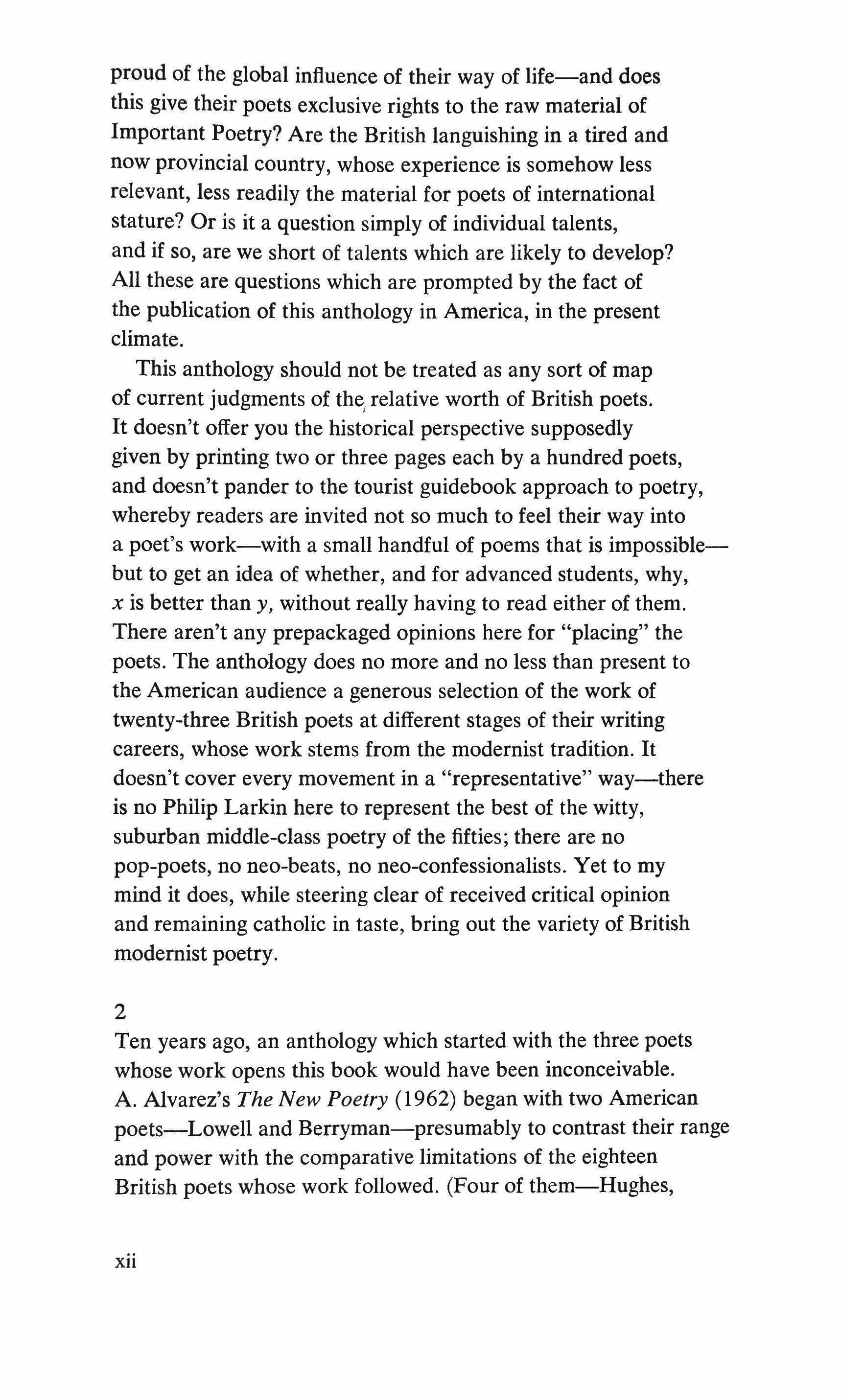
proud of the global influence of their way of life-and does this give their poets exclusive rights to the raw material of Important Poetry? Are the British languishing in a tired and now provincial country, whose experience is somehow less relevant, less readily the material for poets of international stature? Or is it a question simply of individual talents, and if so, are we short of talents which are likely to develop? All these are questions which are prompted by the fact of the publication of this anthology in America, in the present climate.
This anthology should not be treated as any sort of map of current judgments of the, relative worth of British poets. It doesn't offer you the historical perspective supposedly given by printing two or three pages each by a hundred poets, and doesn't pander to the tourist guidebook approach to poetry, whereby readers are invited not so much to feel their way into a poet's work-with a small handful of poems that is impossiblebut to get an idea of whether, and for advanced students, why, x is better than y, without really having to read either of them. There aren't any prepackaged opinions here for "placing" the poets. The anthology does no more and no less than present to the American audience a generous selection of the work of twenty-three British poets at different stages of their writing careers, whose work stems from the modernist tradition. It doesn't cover every movement in a "representative" way-there is no Philip Larkin here to represent the best of the witty, suburban middle-class poetry of the fifties; there are no pop-poets, no neo-beats, no neo-confessionalists. Yet to my mind it does, while steering clear of received critical opinion and remaining catholic in taste, bring out the variety of British modernist poetry.
2
Ten years ago, an anthology which started with the three poets whose work opens this book would have been inconceivable. A. Alvarez's The New Poetry (1962) began with two American poets-Lowell and Berryman-presumably to contrast their range and power with the comparative limitations of the eighteen British poets whose work followed. (Four of them-Hughes,
xii

Middleton, Tomlinson and MacBeth-are in this collection.)
Modernism, it seemed, had dried up in Britain, and the typical poets of the fifties had entered a safety-first period: their poems were formal, detachedly observant, attempting to use wit and irony to create verse of social reportage. This was a reaction to the welter of imitation Dylan Thomas in the hectic post-war period-the neo-romantic poets, alias "The New Apocalypse". The name of the reaction was The Movement. This was the sort of response The Movement's typical poetry evoked: "at times I have felt appreciatively that she probably washes her hands and puts on new white gloves before she starts to write" (Kenneth Allott on Elizabeth Jennings). Kingsley Amis typifies the anti-romantic, anti-aesthetic approach with lines like:
Should poets bicycle-pump the human heart Or squash it fiat?
and said, in 1955, that "nobody wants any more poems on the grander themes for a few years". All this might have been different had not young poets of exceptional promise such as Sidney Keyes and Keith Douglas been killed in their twenties in the last stages of the war. Bunting was unknown in England at this time; David Jones published infrequently, and was nobody's cup of tea; and MacDiarmid has always been treated rather as a mad Scotsman by the English. With hindsight, Ted Hughes and Charles Tomlinson were clearly the most individual new voices of the late fifties; and Tomlinson was more appreciated in America than in England at the time.
"Sometimes I wonder if England ever came to modern art at all," wrote Donald Hall in 1965, introducing his revision of The Faber Book of Modern Verse. "While Stravinsky and Picasso and Henry Moore-to mention one Englishman at leastwere inventing forms and techniques, W. H. Auden was 'experimenting' with sonnets and off-rhyme and Anglo-Saxon metres. Of course I am unfair to Auden, but I do not think I am unfair to the history of modern poetry in English. In the sense that Spain and Latin America and France and Germany had modernist poetsnew forms, and new experiences of the spirit-perhaps England and America are only beginning." Perhaps: or are we beginning to pick up where poets of the earlier part of the century left
xiii
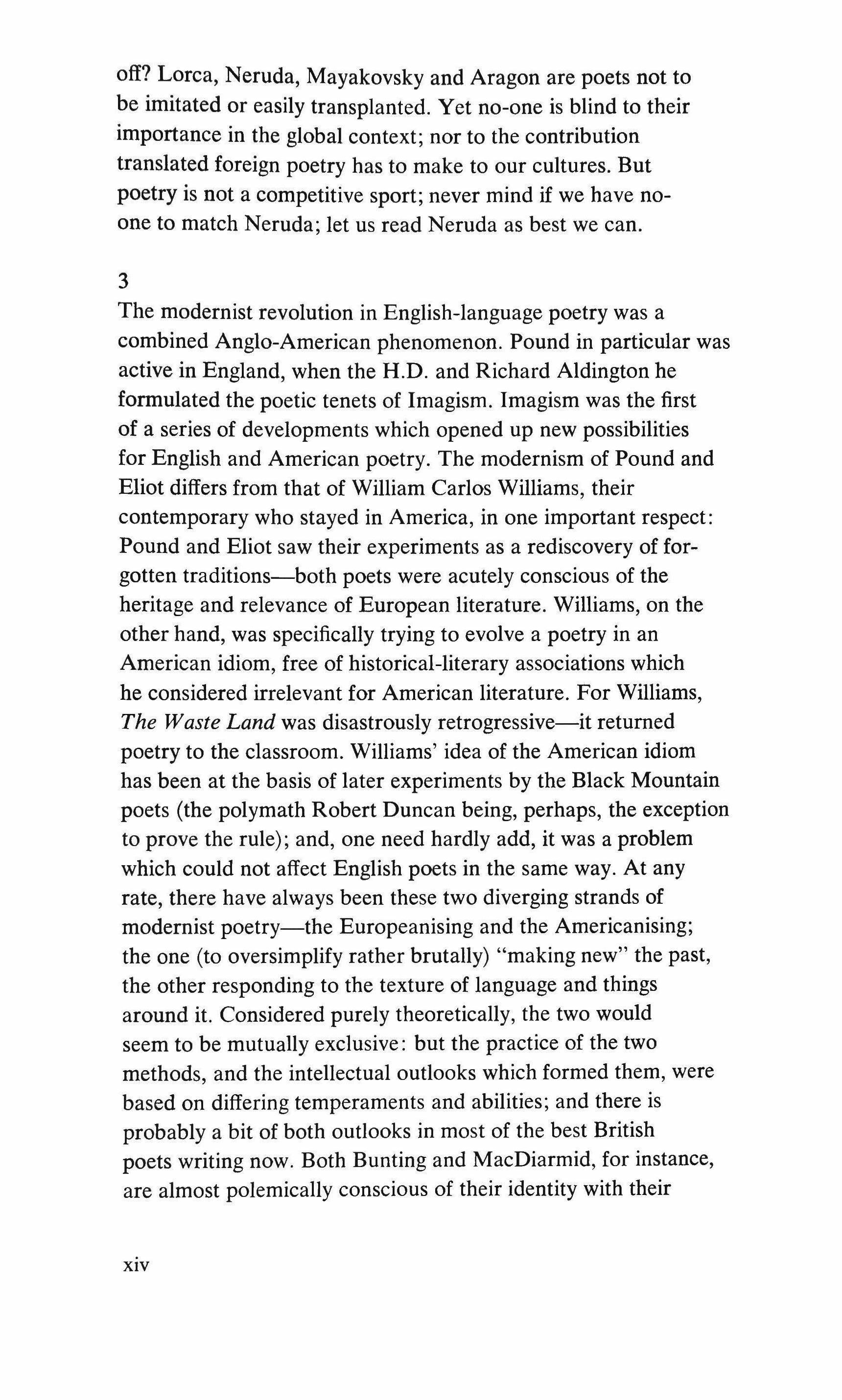
off? Lorca, Neruda, Mayakovsky and Aragon are poets not to be imitated or easily transplanted. Yet no-one is blind to their importance in the global context; nor to the contribution translated foreign poetry has to make to our cultures. But poetry is not a competitive sport; never mind if we have noone to match Neruda; let us read Neruda as best we can.
3
The modernist revolution in English-language poetry was a combined Anglo-American phenomenon. Pound in particular was active in England, when the H.D. and Richard Aldington he formulated the poetic tenets of Imagism. Imagism was the first of a series of developments which opened up new possibilities for English and American poetry. The modernism of Pound and Eliot differs from that of William Carlos Williams, their contemporary who stayed in America, in one important respect: Pound and Eliot saw their experiments as a rediscovery of forgotten traditions-both poets were acutely conscious of the heritage and relevance of European literature. Williams, on the other hand, was specifically trying to evolve a poetry in an American idiom, free of historical-literary associations which he considered irrelevant for American literature. For Williams, The Waste Land was disastrously retrogressive-it returned poetry to the classroom. Williams' idea of the American idiom has been at the basis of later experiments by the Black Mountain poets (the polymath Robert Duncan being, perhaps, the exception to prove the rule); and, one need hardly add, it was a problem which could not affect English poets in the same way. At any rate, there have always been these two diverging strands of modernist poetry-the Europeanising and the Americanising; the one (to oversimplify rather brutally) "making new" the past, the other responding to the texture of language and things around it. Considered purely theoretically, the two would seem to be mutually exclusive: but the practice of the two methods, and the intellectual outlooks which formed them, were based on differing temperaments and abilities; and there is probably a bit of both outlooks in most of the best British poets writing now. Both Bunting and MacDiarmid, for instance, are almost polemically conscious of their identity with their
XIV

regions-MacDiarmid politically so, as a Scots nationalist, Bunting more linguistically ("Southrons would maul the music of many lines in Briggftatts").
In an interview (Akros magazine, April 1970), Duncan Glen put this to MacDiarmid-"In a way Eliot, with his Tradition and the Individual Talent, and Carlos Williams, with his belief in the future of the American idiom-both of them are in you in a way, aren't they? You have gone not only for a Scottish idiom but also for reuniting Scotland with the European tradition, although I don't know if you'd accept Eliot's belief in the individual talent working within that tradition." MacDiarmid: "No. I go much nearer Eliot, of course, than I do William Carlos Williams, but my man is Pound, definitely. Eliot, after all, showed a narrowing tendency but Pound opened out all along the line, took in more and more."
4
It is more than fifty years since the first period of experimental ferment in poetry in the 1910s; revolutions and wars have intervened, and we are nearer our somewhat less than brave new world. Consider for a moment Britain's position in the world at this point of time. Most of her colonies, bar a rock and an island or two, were shed some time ago. With the growth of America, Russia and the spectre of China, Britain has declined as a force in international affairs. Sometimes the country seems, even to the British, like some sort of cultural and political museum. Unlike America, Britain has no such dilemmas as the Vietnam war to tax its resources and divide its conscience; nor such desperate social problems as the ghettoes and racial conflicts arising from oppression of a tenth of its people. Britain has not suffered the convulsions which have split Eastern Europe, oppressed the people of Russia, and established fascist regimes in Spain, Portugal and Greece. As a Hungarian poet said to me recently-England is basically a happy country. That is a comparative judgment, of course. I don't wish to imply that Britain is a social paradise; only that our problems are less obvious, and as yet on a much smaller scale. Gradually, Britain is identifying with Europe; and whether or not it enters the European Economic Community-which would
xv
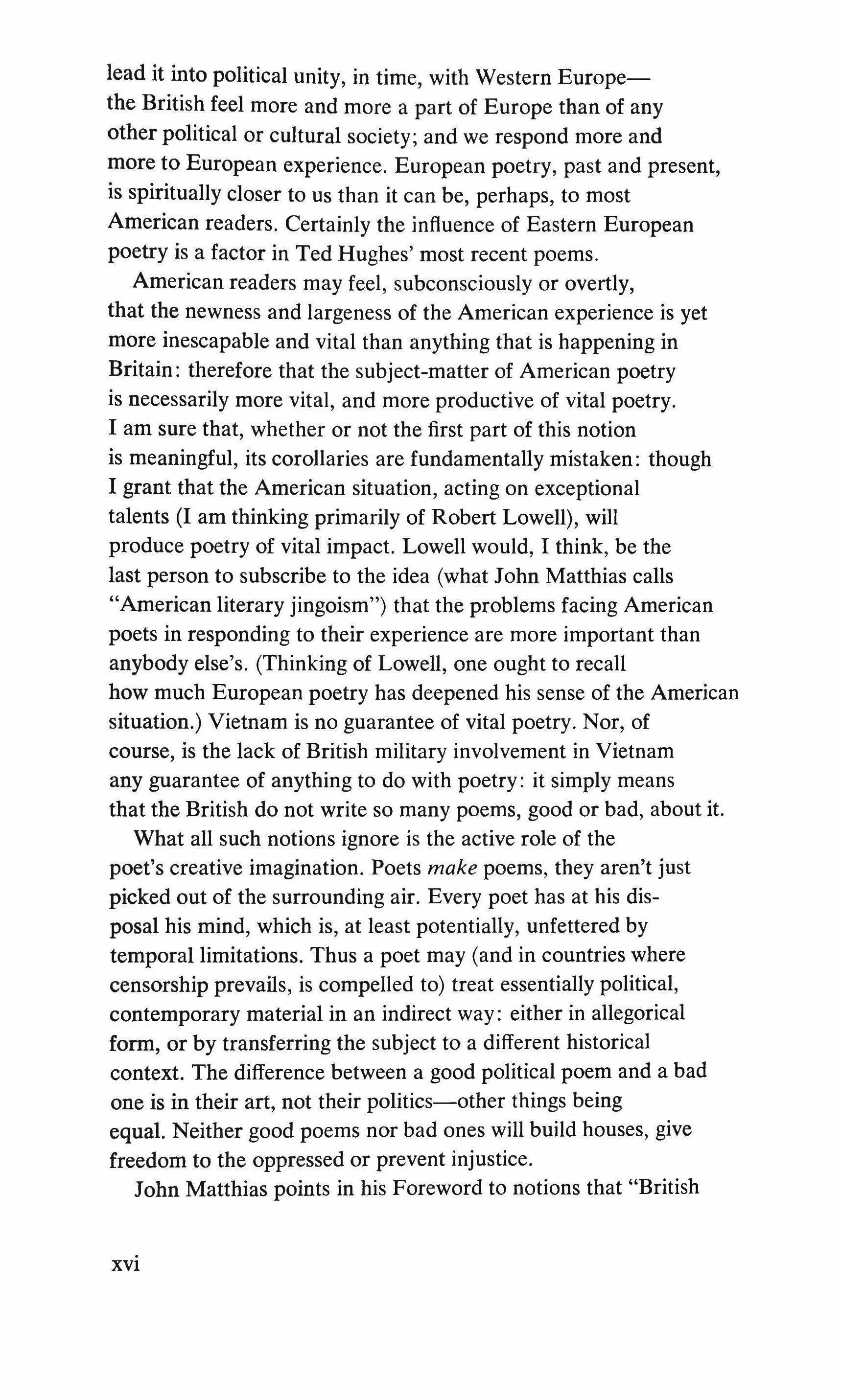
lead it into political unity, in time, with Western Europethe British feel more and more a part of Europe than of any other political or cultural society; and we respond more and more to European experience. European poetry, past and present, is spiritually closer to us than it can be, perhaps, to most American readers. Certainly the influence of Eastern European poetry is a factor in Ted Hughes' most recent poems. American readers may feel, subconsciously or overtly, that the newness and largeness of the American experience is yet more inescapable and vital than anything that is happening in Britain: therefore that the subject-matter of American poetry is necessarily more vital, and more productive of vital poetry. I am sure that, whether or not the first part of this notion is meaningful, its corollaries are fundamentally mistaken: though I grant that the American situation, acting on exceptional talents (I am thinking primarily of Robert Lowell), will produce poetry of vital impact. Lowell would, 1 think, be the last person to subscribe to the idea (what John Matthias calls "American literary jingoism") that the problems facing American poets in responding to their experience are more important than anybody else's. (Thinking of Lowell, one ought to recall how much European poetry has deepened his sense of the American situation.) Vietnam is no guarantee of vital poetry. Nor, of course, is the lack of British military involvement in Vietnam any guarantee of anything to do with poetry: it simply means that the British do not write so many poems, good or bad, about it. What all such notions ignore is the active role of the poet's creative imagination. Poets make poems, they aren't just picked out of the surrounding air. Every poet has at his disposal his mind, which is, at least potentially, unfettered by temporal limitations. Thus a poet may (and in countries where censorship prevails, is compelled to) treat essentially political, contemporary material in an indirect way: either in allegorical form, or by transferring the subject to a different historical context. The difference between a good political poem and a bad one is in their art, not their politics-other things being equal. Neither good poems nor bad ones will build houses, give freedom to the oppressed or prevent injustice.
John Matthias points in his Foreword to notions that "British
XVI
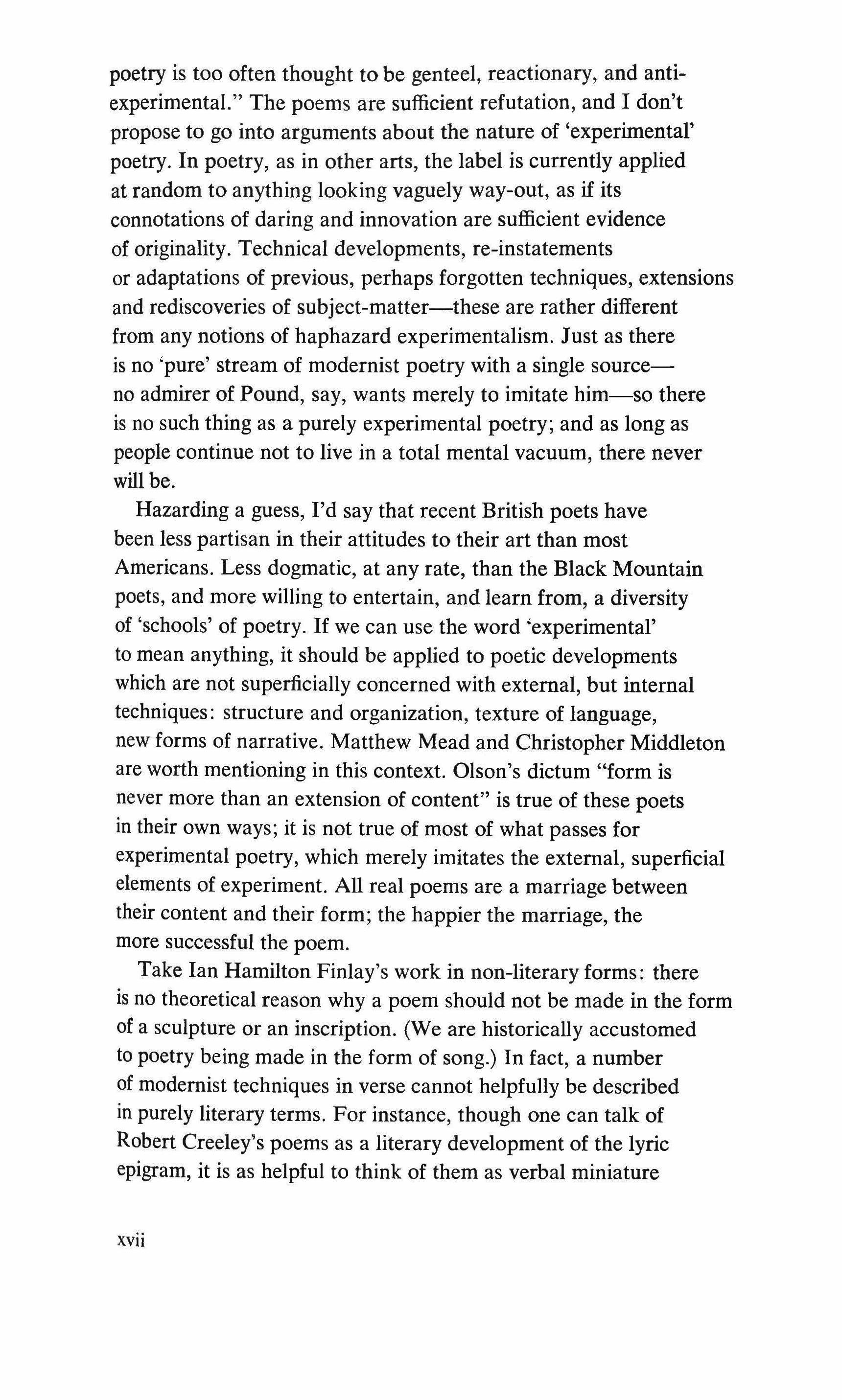
poetry is too often thought to be genteel, reactionary, and antiexperimental." The poems are sufficient refutation, and I don't propose to go into arguments about the nature of 'experimental' poetry. In poetry, as in other arts, the label is currently applied at random to anything looking vaguely way-out, as if its connotations of daring and innovation are sufficient evidence of originality. Technical developments, re-instatements or adaptations of previous, perhaps forgotten techniques, extensions and rediscoveries of subject-matter-these are rather different from any notions of haphazard experimentalism. Just as there is no 'pure' stream of modernist poetry with a single sourceno admirer of Pound, say, wants merely to imitate him-so there is no such thing as a purely experimental poetry; and as long as people continue not to live in a total mental vacuum, there never will be.
Hazarding a guess, I'd say that recent British poets have been less partisan in their attitudes to their art than most Americans. Less dogmatic, at any rate, than the Black Mountain poets, and more willing to entertain, and learn from, a diversity of 'schools' of poetry. If we can use the word 'experimental' to mean anything, it should be applied to poetic developments which are not superficially concerned with external, but internal techniques: structure and organization, texture of language, new forms of narrative. Matthew Mead and Christopher Middleton are worth mentioning in this context. Olson's dictum "form is never more than an extension of content" is true of these poets in their own ways; it is not true of most of what passes for experimental poetry, which merely imitates the external, superficial elements of experiment. All real poems are a marriage between their content and their form; the happier the marriage, the more successful the poem.
Take Ian Hamilton Finlay's work in non-literary forms: there is no theoretical reason why a poem should not be made in the form of a sculpture or an inscription. (We are historically accustomed to poetry being made in the form of song.) In fact, a number of modernist techniques in verse cannot helpfully be described in purely literary terms. For instance, though one can talk of Robert Creeley's poems as a literary development of the lyric epigram, it is as helpful to think of them as verbal miniature
xvii
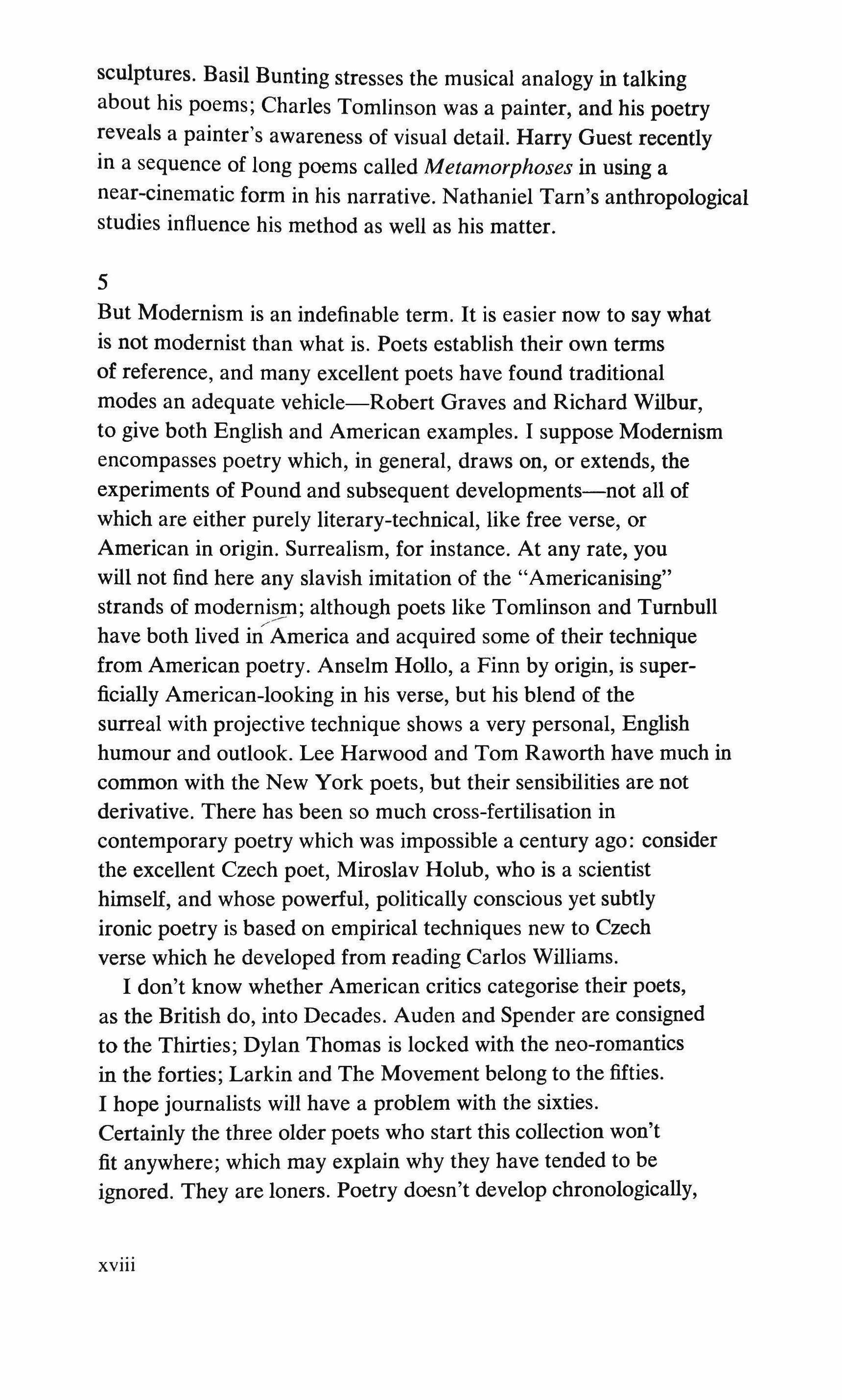
sculptures. Basil Bunting stresses the musical analogy in talking about his poems; Charles Tomlinson was a painter, and his poetry reveals a painter's awareness of visual detail. Harry Guest recently in a sequence of long poems called Metamorphoses in using a near-cinematic form in his narrative. Nathaniel Tarn's anthropological studies influence his method as well as his matter.
5
But Modernism is an indefinable term. It is easier now to say what is not modernist than what is. Poets establish their own terms of reference, and many excellent poets have found traditional modes an adequate vehicle-Robert Graves and Richard Wilbur, to give both English and American examples. I suppose Modernism encompasses poetry which, in general, draws on, or extends, the experiments of Pound and subsequent developments-not all of which are either purely literary-technical, like free verse, or American in origin. Surrealism, for instance. At any rate, you will not find here any slavish imitation of the "Americanising" strands of modernism; although poets like Tomlinson and Turnbull /-have both lived in America and acquired some of their technique from American poetry. Anselm Hollo, a Finn by origin, is superficially American-looking in his verse, but his blend of the surreal with projective technique shows a very personal, English humour and outlook. Lee Harwood and Tom Raworth have much in common with the New York poets, but their sensibilities are not derivative. There has been so much cross-fertilisation in contemporary poetry which was impossible a century ago: consider the excellent Czech poet, Miroslav Holub, who is a scientist himself, and whose powerful, politically conscious yet subtly ironic poetry is based on empirical techniques new to Czech verse which he developed from reading Carlos Williams. I don't know whether American critics categorise their poets, as the British do, into Decades. Auden and Spender are consigned to the Thirties; Dylan Thomas is locked with the neo-romantics in the forties; Larkin and The Movement belong to the fifties. I hope journalists will have a problem with the sixties. Certainly the three older poets who start this collection won't fit anywhere; which may explain why they have tended to be ignored. They are loners. Poetry doesn't develop chronologically,
xviii
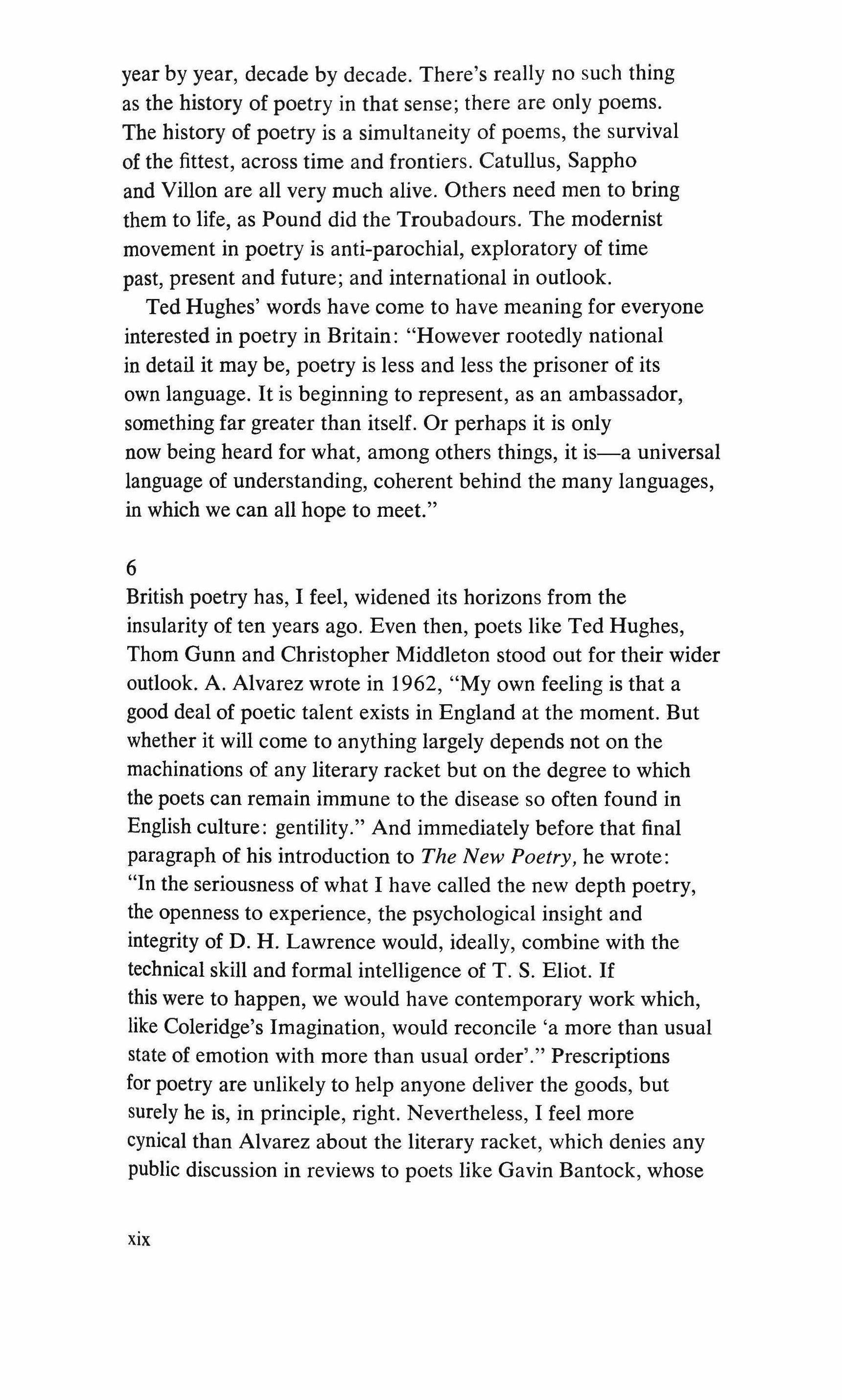
year by year, decade by decade. There's really no such thing as the history of poetry in that sense; there are only poems. The history of poetry is a simultaneity of poems, the survival of the fittest, across time and frontiers. Catullus, Sappho and Villon are all very much alive. Others need men to bring them to life, as Pound did the Troubadours. The modernist movement in poetry is anti-parochial, exploratory of time past, present and future; and international in outlook.
Ted Hughes' words have come to have meaning for everyone interested in poetry in Britain: "However rootedly national in detail it may be, poetry is less and less the prisoner of its own language. It is beginning to represent, as an ambassador, something far greater than itself. Or perhaps it is only now being heard for what, among others things, it is-a universal language of understanding, coherent behind the many languages, in which we can all hope to meet."
6
British poetry has, I feel, widened its horizons from the insularity of ten years ago. Even then, poets like Ted Hughes, Thorn Gunn and Christopher Middleton stood out for their wider outlook. A. Alvarez wrote in 1962, "My own feeling is that a good deal of poetic talent exists in England at the moment. But whether it will come to anything largely depends not on the machinations of any literary racket but on the degree to which the poets can remain immune to the disease so often found in English culture: gentility." And immediately before that final paragraph of his introduction to The New Poetry, he wrote: "In the seriousness of what I have called the new depth poetry, the openness to experience, the psychological insight and integrity of D. H. Lawrence would, ideally, combine with the technical skill and formal intelligence of T. S. Eliot. If this were to happen, we would have contemporary work which, like Coleridge's Imagination, would reconcile 'a more than usual state of emotion with more than usual order'." Prescriptions for poetry are unlikely to help anyone deliver the goods, but surely he is, in principle, right. Nevertheless, I feel more cynical than Alvarez about the literary racket, which denies any public discussion in reviews to poets like Gavin Bantock, whose
xix
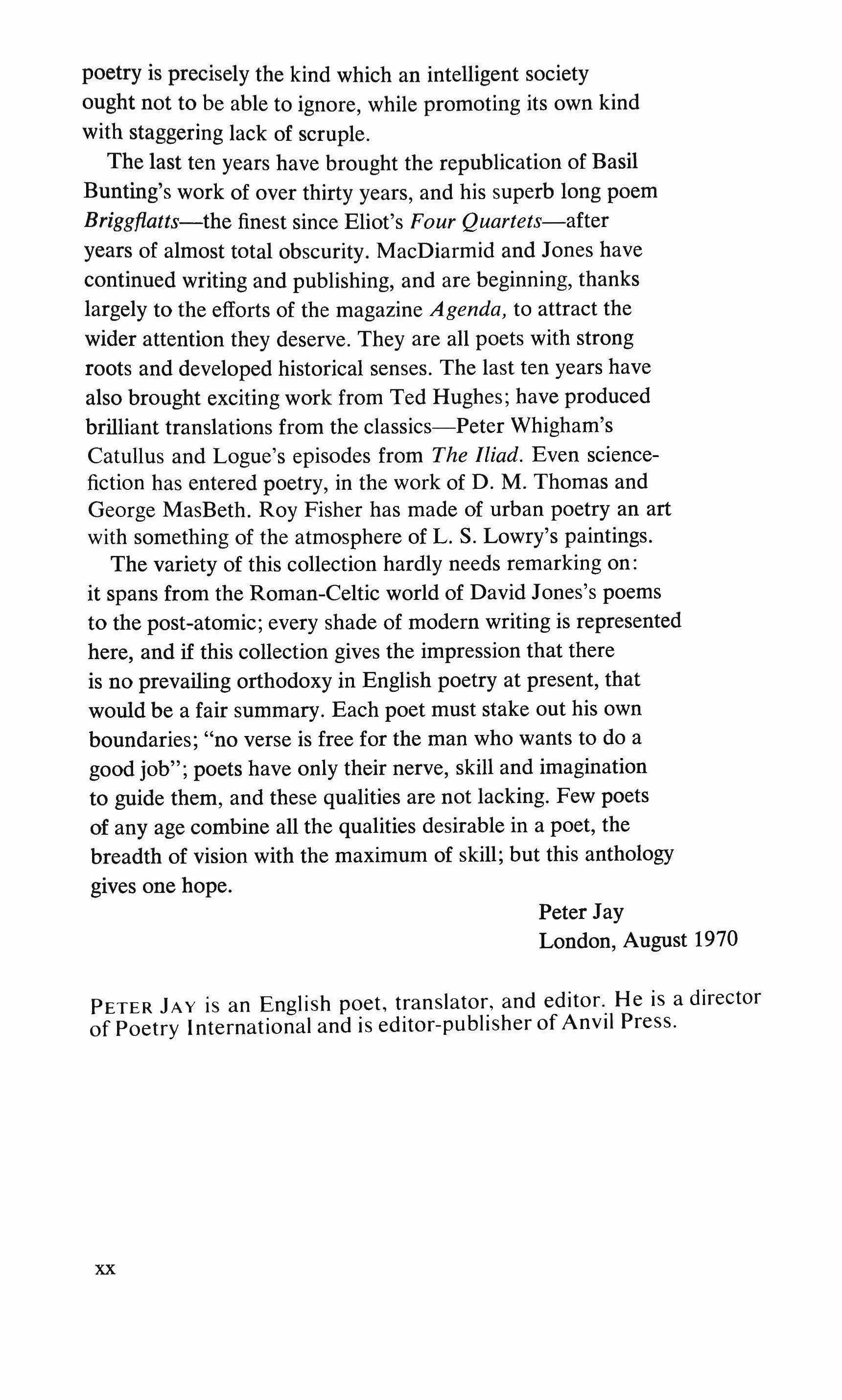
poetry is precisely the kind which an intelligent society ought not to be able to ignore, while promoting its own kind with staggering lack of scruple.
The last ten years have brought the republication of Basil Bunting's work of over thirty years, and his superb long poem Briggflatts-the finest since Eliot's Four Quartets-after years of almost total obscurity. MacDiarmid and Jones have continued writing and publishing, and are beginning, thanks largely to the efforts of the magazine Agenda, to attract the wider attention they deserve. They are all poets with strong roots and developed historical senses. The last ten years have also brought exciting work from Ted Hughes; have produced brilliant translations from the classics-Peter Whigham's Catullus and Logue's episodes from The Iliad. Even sciencefiction has entered poetry, in the work of D. M. Thomas and George MasBeth. Roy Fisher has made of urban poetry an art with something of the atmosphere of L. S. Lowry's paintings.
The variety of this collection hardly needs remarking on: it spans from the Roman-Celtic world of David Jones's poems to the post-atomic; every shade of modern writing is represented here, and if this collection gives the impression that there is no prevailing orthodoxy in English poetry at present, that would be a fair summary. Each poet must stake out his own boundaries; "no verse is free for the man who wants to do a good job"; poets have only their nerve, skill and imagination to guide them, and these qualities are not lacking. Few poets of any age combine all the qualities desirable in a poet, the breadth of vision with the maximum of skill; but this anthology gives one hope.
Peter Jay London, August 1970
PETER JA y is an English poet, translator, and editor. He is a director of Poetry International and is editor-publisher of Anvil Press.
xx
DAVID JONES

The Wall
We don't know the ins and outs how should we? how could we?
It's not for the likes of you and me to cogitate high policy or to guess the inscrutable economy of the pontifex from the circuit of the agger from the traverse of the wall.
But you see a thing or two in our walk of life walking the compass of the vallum walking for twenty years of nights round and round and back & fro on the walls that contain the world.
You see a thing or two, you think a thing or two, in our walk of life, walking for twenty years, by day, by night, doing the rounds on the walls that maintain the world on the hard tread of the silex on the heavy tread of the mound up in the traversed out-work, stepping it at the alert, down on the via quintana stepping it double-quick by numbers to break y'r tiro-heart dug in wrong side the limes or walled in back at depot?
it's evens, more or less as far as jumping to it goes.
But what about the Omphalos there's the place for the proud walkers where the terminal gate arcs for the sections in column
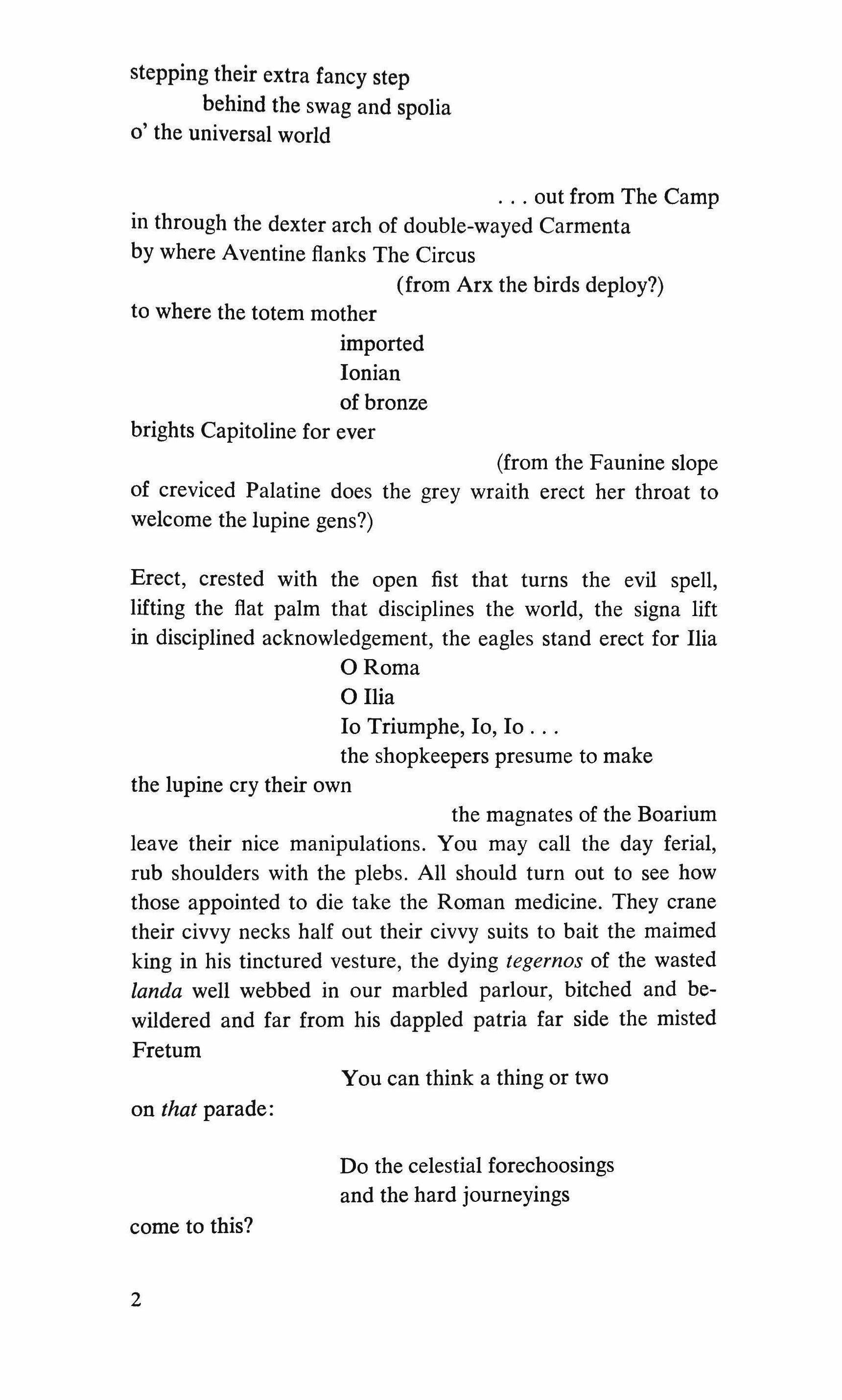
stepping their extra fancy step behind the swag and spolia 0' the universal world
out from The Camp in through the dexter arch of double-wayed Carmenta by where Aventine flanks The Circus (from Arx the birds deploy?) to where the totem mother imported Ionian of bronze brights Capitoline for ever
(from the Faunine slope of creviced Palatine does the grey wraith erect her throat to welcome the lupine gens?)
Erect, crested with the open fist that turns the evil spell, lifting the flat palm that disciplines the world, the signa lift in disciplined acknowledgement, the eagles stand erect for Ilia o Roma o Ilia
10 Triumphe, 10, 10 the shopkeepers presume to make the lupine cry their own
the magnates of the Boarium leave their nice manipulations. You may call the day ferial, rub shoulders with the plebs. All should turn out to see how those appointed to die take the Roman medicine. They crane their civvy necks half out their civvy suits to bait the maimed king in his tinctured vesture, the dying tegernos of the wasted landa well webbed in our marbled parlour, bitched and bewildered and far from his dappled patria far side the misted Fretum
You can think a thing or two on that parade:
Do the celestial forechoosings and the hard journeyings come to this?
2

Did the empyreal fires hallow the chosen womb to tabernacle founders of emporia?
Were the august conjoinings was the troia'd wandering achieved
did the sallow ducts of Luperca nourish the lily white boys was Electra chose from the seven stars in the sky did Ilia bear fruit to the Strider was she found the handmaid of the Lar
did the augurs inaugurate, did the Clarissimi steady the transverse rods, did they align the plummets carefully, did they check the bearing attentively, was the templum dead true at the median intersection
did the white unequal pair labour the yoke, tread the holy circuit
did they, so early in the marls of Cispadana show forth, foretoken the rudiments of our order
when the precursors at the valley-sites made survey of the loam, plotted the trapezoids on the sodden piles, digged the sacred pits, before the beginning
did they square the hill-sites for the hut-circles, did the hill-groups look to each other, were the hostile strong-points one by one, made co-ordinate did Quirinal with Viminal call to the Quadrata
did the fence of Tullius embrace the mixed kindreds did the magic wall (that keeps the walls) describe the orbit did that wall contain a world 3
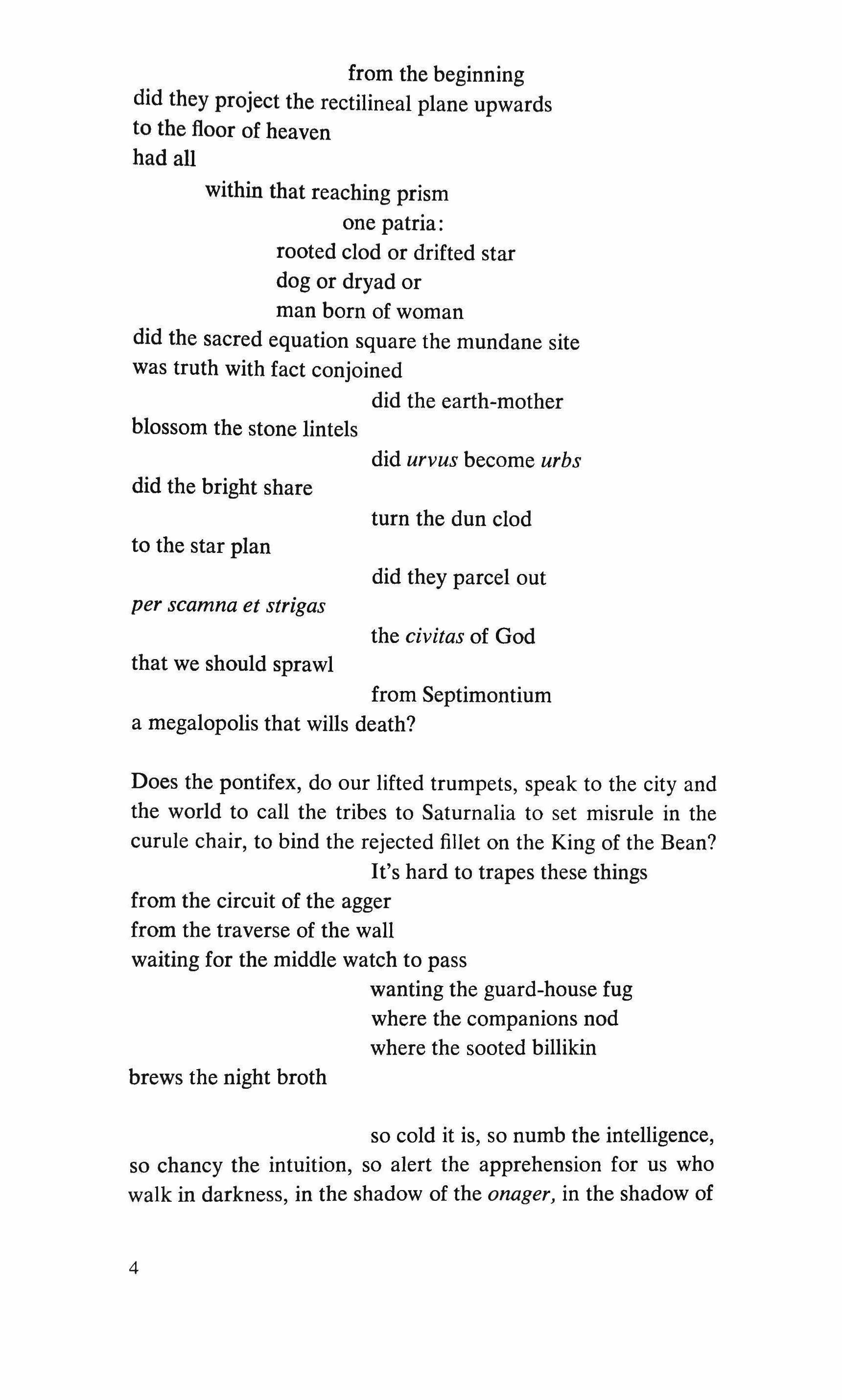
from the beginning did they project the rectilineal plane upwards to the floor of heaven had all within that reaching prism one patria: rooted clod or drifted star dog or dryad or man born of woman did the sacred equation square the mundane site was truth with fact conjoined did the earth-mother blossom the stone lintels
did urvus become urbs did the bright share
turn the dun clod to the star plan
did they parcel out per scamna et strigas
the civitas of God that we should sprawl from Septimontium a megalopolis that wills death?
Does the pontifex, do our lifted trumpets, speak to the city and the world to call the tribes to Saturnalia to set misrule in the curule chair, to bind the rejected fillet on the King of the Bean? It's hard to trapes these things from the circuit of the agger from the traverse of the wall waiting for the middle watch to pass wanting the guard-house fug where the companions nod where the sooted billikin brews the night broth
so cold it is, so numb the intelligence, so chancy the intuition, so alert the apprehension for us who walk in darkness, in the shadow of the onager, in the shadow of
4
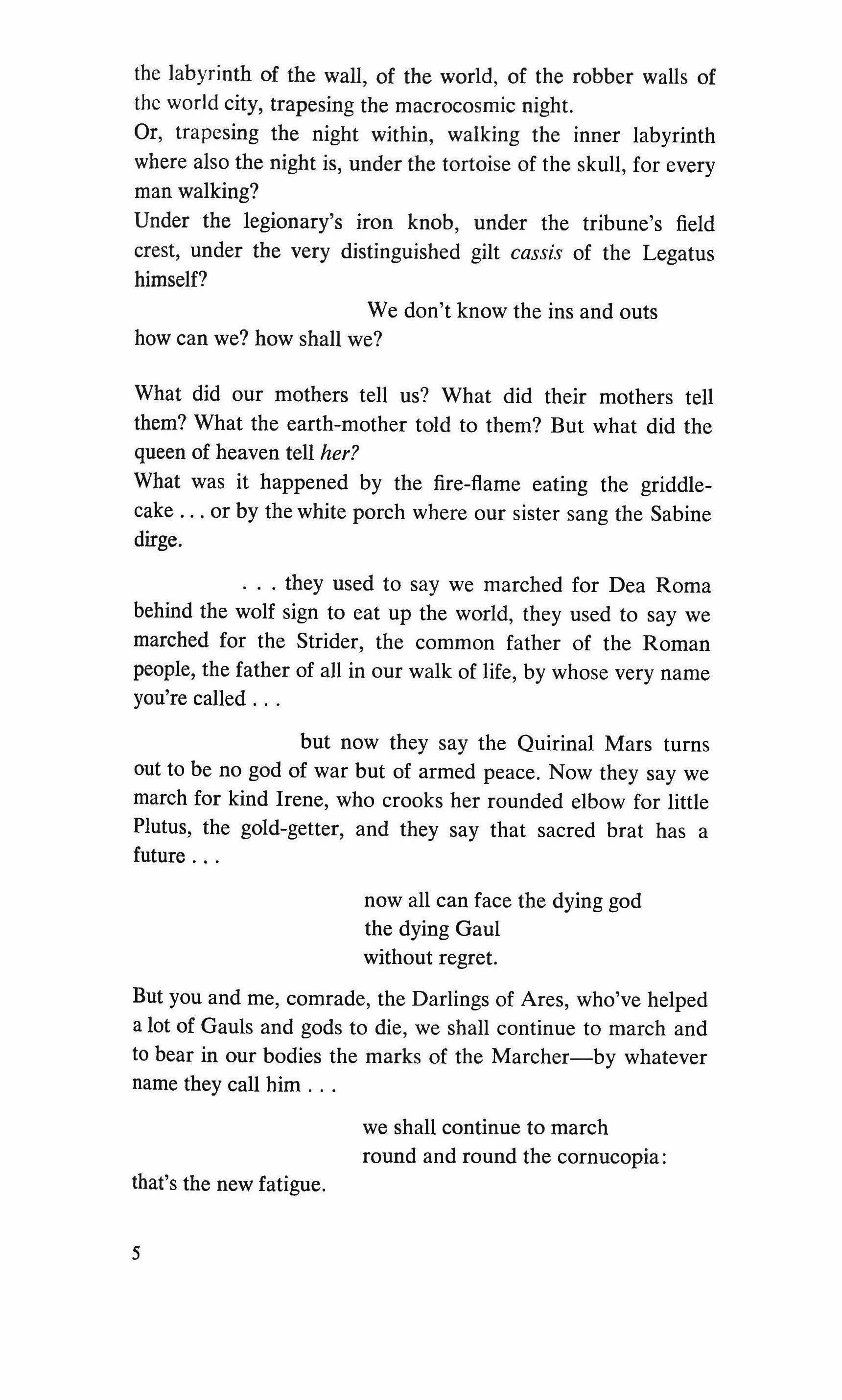
the labyrinth of the wall, of the world, of the robber walls of the world city, trapesing the macrocosmic night. Or, trapesing the night within, walking the inner labyrinth where also the night is, under the tortoise of the skull, for every man walking?
Under the legionary's iron knob, under the tribune's field crest, under the very distinguished gilt cassis of the Legatus himself?
We don't know the ins and outs how can we? how shall we?
What did our mothers tell us? What did their mothers tell them? What the earth-mother told to them? But what did the queen of heaven tell her?
What was it happened by the fire-flame eating the griddlecake or by the white porch where our sister sang the Sabine dirge.
they used to say we marched for Dea Roma behind the wolf sign to eat up the world, they used to say we marched for the Strider, the common father of the Roman people, the father of all in our walk of life, by whose very name you're called
but now they say the Quirinal Mars turns out to be no god of war but of armed peace. Now they say we march for kind Irene, who crooks her rounded elbow for little Plutus, the gold-getter, and they say that sacred brat has a future
now all can face the dying god the dying Gaul without regret.
But you and me, comrade, the Darlings of Ares, who've helped a lot of Gauls and gods to die, we shall continue to march and to bear in our bodies the marks of the Marcher-by whatever name they call him
we shall continue to march round and round the cornucopia: that's the new fatigue.
5

Two sections from The Anathemata
Angle-Land
Did he strike soundings off Vecta Insula? or was it already the gavelkind igland? Did he lie by in the East Road?
was it a kindly numen of the Sleeve that headed him clear of South Sand Head?
Did he shelter in the Small Downs?
Keeping close in, did he feel his way between the Flats and the Brake?
But, what was her draught, and, what was the ocean doing? Did he stand on toward the Gull? did his second mate sound with more than care?
was it perforce or Fortuna's rudder, circumstance or superb pilotage or clean oblation that sheered him from smother (the unseen necropolis banking to starboard of her).
Or was it she
Sea-born and Sea-star whose own, easy and free the pious matlos are or, was it a whim of Poseidon's (master 0' the cinque masters 0' lodemanage) whose own the Island's approaches are that kept her?
Was the Foreland? was the Elbow? under fog. He might have been deeped in the Oaze! Or by the brumous numen drawn on or in preclear visibility by the invisible wind laboured it might have been Dogger or Well to bank her a mound
6
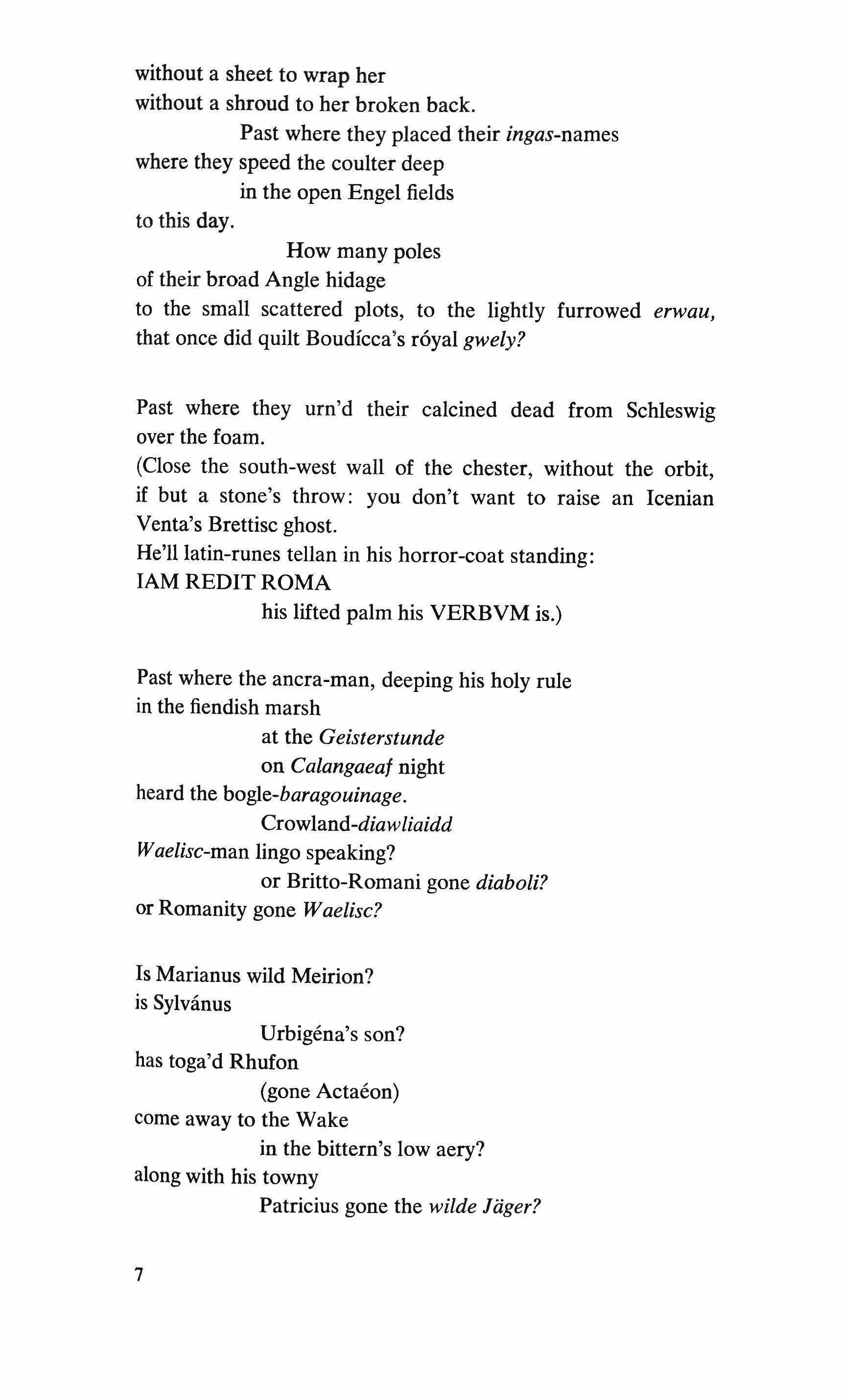
without a sheet to wrap her without a shroud to her broken back.
Past where they placed their ingas-names where they speed the coulter deep in the open Engel fields to this day.
How many poles of their broad Angle hidage to the small scattered plots, to the lightly furrowed erwau, that once did quilt Boudicca's royal gwely?
Past where they urn'd their calcined dead from Schleswig over the foam.
(Close the south-west wall of the chester, without the orbit, if but a stone's throw: you don't want to raise an Icenian Venta's Brettisc ghost. He'll latin-runes tellan in his horror-coat standing: lAM REDIT ROMA his lifted palm his VERBVM is.)
Past where the ancra-man, deeping his holy rule in the fiendish marsh at the Geisterstunde on Calangaeaf night heard the bogle-baragouinage.
Crowland-diawliaidd Waelisc-man lingo speaking? or Britto-Romani gone diaboli? or Romanity gone Waelisc?
Is Marianus wild Meirion? is Sylvanus
Urbigena's son? has toga'd Rhufon (gone Actaeon) come away to the Wake in the bittern's low aery? along with his towny Patricius gone the wilde Iiiger?
7
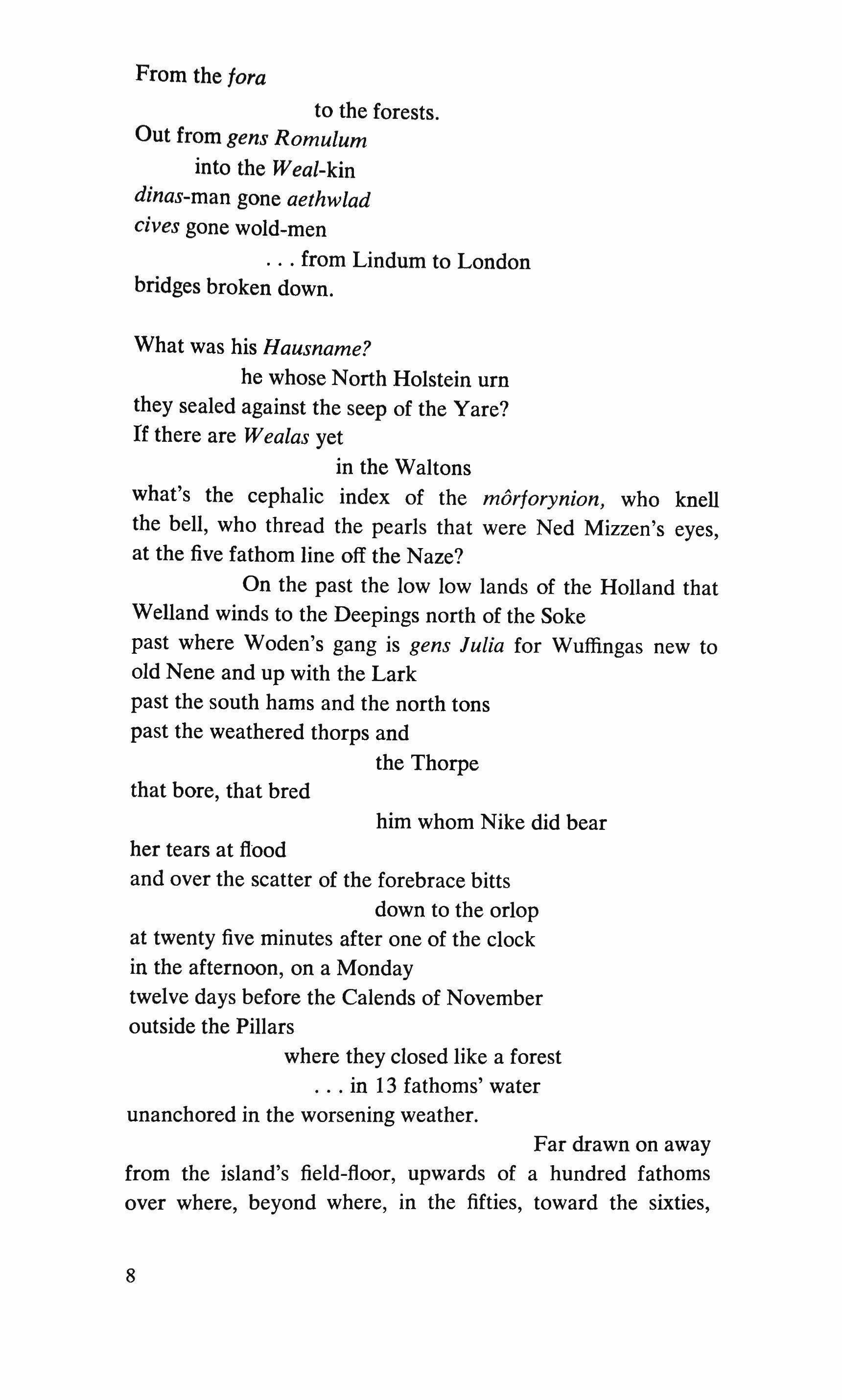
From the fora to the forests. Out from gens Romulum into the Weal-kin dinas-man gone aethwlad cives gone wold-men from Lindum to London bridges broken down.
What was his Hausname?
he whose North Holstein urn they sealed against the seep of the Yare? If there are Wealas yet in the Waltons what's the cephalic index of the morjorynion, who knell the bell, who thread the pearls that were Ned Mizzen's eyes, at the five fathom line off the Naze?
On the past the low low lands of the Holland that WeIland winds to the Deepings north of the Soke past where Woden's gang is gens Julia for Wuffingas new to old Nene and up with the Lark past the south hams and the north tons past the weathered thorps and the Thorpe that bore, that bred him whom Nike did bear her tears at flood and over the scatter of the forebrace bitts down to the orlop at twenty five minutes after one of the clock in the afternoon, on a Monday twelve days before the Calends of November outside the Pillars
where they closed like a forest in 13 fathoms' water unanchored in the worsening weather.
Far drawn on away from the island's field-floor, upwards of a hundred fathoms over where, beyond where, in the fifties, toward the sixties,
8
north latitude
all our easting waters are confluent with the fathering river and tributary to him: where Tamesis, Great Ouse, Tyne from the Wall's end, demarking Tweed, Forth that winds the middle march, Tummel and wide looping Tay (that laps the wading files when Birnam boughs deploy toward Dunsinane-out toward the Goat Flats).
Spey of the Symbol stones and Ness from the serpentine mere all mingle Rhenus-flow and are oned with him in Cronos-meer.
I speak of before the whale-roads or the keel-paths were from Orcades to the fiord-havens, or the greyed green wastes that they strictly grid quadrate and number on the sea-green Quadratkarte one eight six one G for the fratricides of the latter-day, from east-shore of Iceland his Nerwegen (0 Balin 0 Balan! how blood you both the Brudersee toward the last phase of our dear West.)
Redriff

Or did he make the estuary? was the Cant smiling and the Knock smooth? Did our Tidal Father bear him by Lower Hope to Half Reach? Did he berth in the Greenland or was she moored in the Pool? Did he tie up across the water or did she toss at the Surrey shore?
9
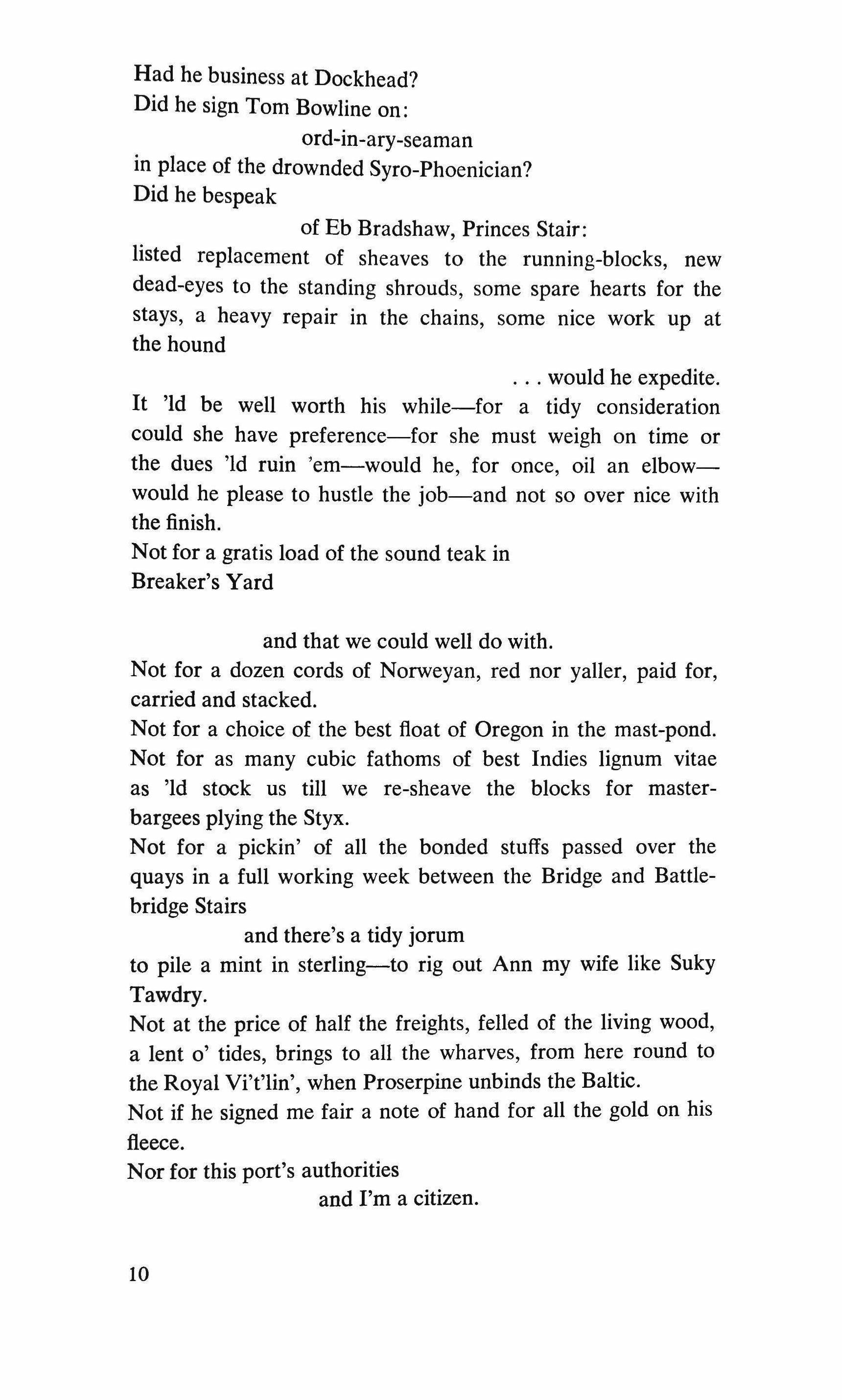
Had he business at Dockhead? Did he sign Tom Bowline on: ord-in-ary-seaman in place of the drownded Syro-Phoenician? Did he bespeak
of Eb Bradshaw, Princes Stair: listed replacement of sheaves to the running-blocks, new dead-eyes to the standing shrouds, some spare hearts for the stays, a heavy repair in the chains, some nice work up at the hound would he expedite. It 'ld be well worth his while-for a tidy consideration could she have preference-for she must weigh on time or the dues 'ld ruin 'em-would he, for once, oil an elbowwould he please to hustle the job-and not so over nice with the finish.
Not for a gratis load of the sound teak in Breaker's Yard and that we could well do with. Not for a dozen cords of Norweyan, red nor yaller, paid for, carried and stacked.
Not for a choice of the best float of Oregon in the mast-pond. Not for as many cubic fathoms of best Indies lignum vitae as 'ld stock us till we re-sheave the blocks for masterbargees plying the Styx.
Not for a pickin' of all the bonded stuffs passed over the quays in a full working week between the Bridge and Battlebridge Stairs and there's a tidy jorum to pile a mint in sterling-to rig out Ann my wife like Suky Tawdry.
Not at the price of half the freights, felled of the living wood, a lent 0' tides, brings to all the wharves, from here round to the Royal Vi't'lin', when Proserpine unbinds the Baltic. Not if he signed me fair a note of hand for all the gold on his fleece.
Nor for this port's authorities and I'm a citizen.
10
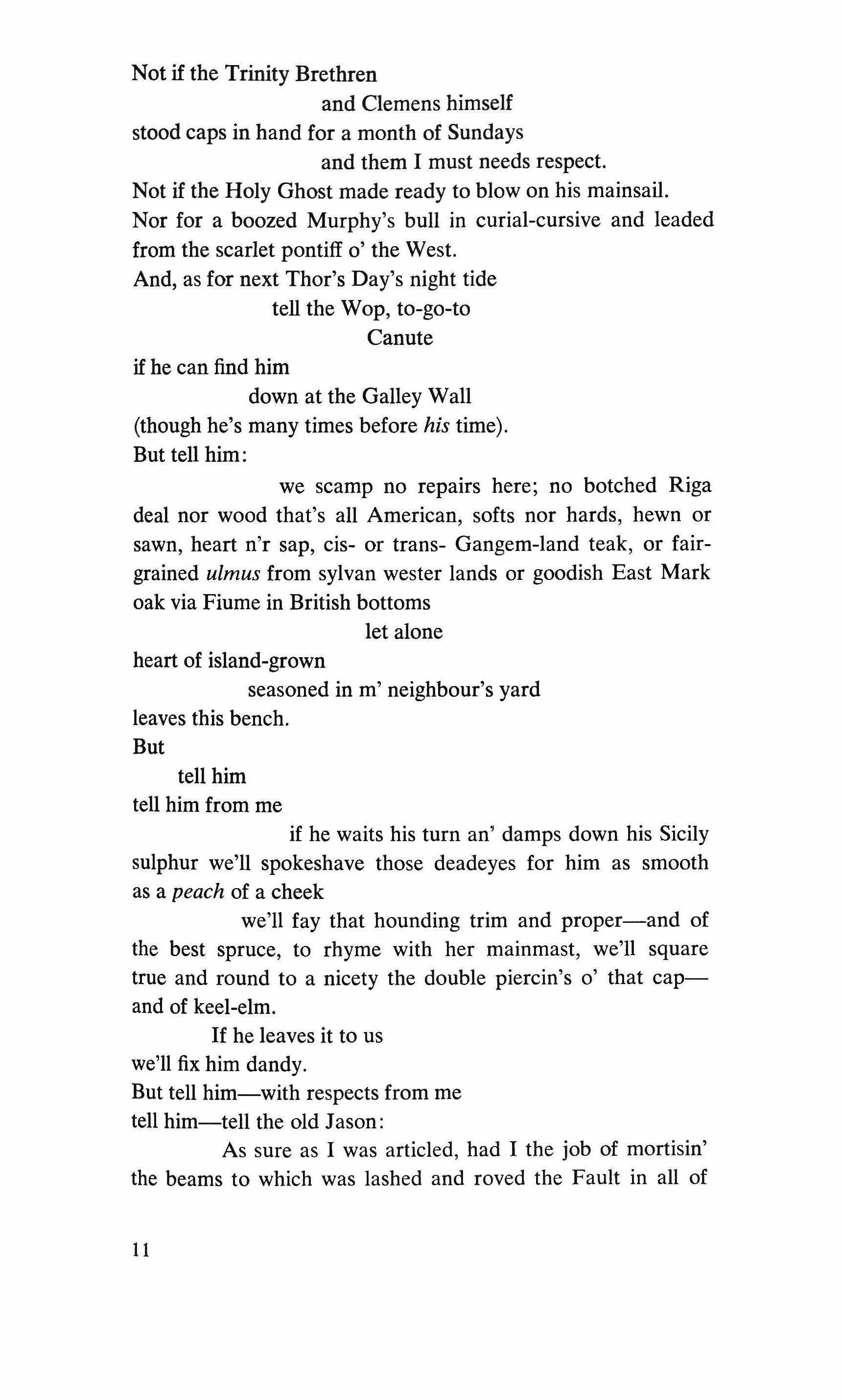
Not if the Trinity Brethren and Clemens himself stood caps in hand for a month of Sundays and them I must needs respect.
Not if the Holy Ghost made ready to blow on his mainsail.
Nor for a boozed Murphy's bull in curial-cursive and leaded from the scarlet pontiff 0' the West.
And, as for next Thor's Day's night tide tell the Wop, to-go-to Canute
if he can find him
down at the Galley Wall (though he's many times before his time).
But tell him:
we scamp no repairs here; no botched Riga deal nor wood that's all American, softs nor hards, hewn or sawn, heart n'r sap, cis- or trans- Gangem-Iand teak, or fairgrained ulmus from sylvan wester lands or goodish East Mark oak via Fiume in British bottoms let alone
heart of island-grown seasoned in m' neighbour's yard leaves this bench.
But tell him tell him from me
if he waits his turn an' damps down his Sicily sulphur we'll spokeshave those deadeyes for him as smooth as a peach of a cheek
we'll fay that hounding trim and proper-and of the best spruce, to rhyme with her mainmast, we'll square true and round to a nicety the double piercin's 0' that capand of keel-elm.
If he leaves it to us we'll fix him dandy.
But tell him-with respects from me tell him-tell the old Jason:
As sure as I was articled, had I the job of mortisin' the beams to which was lashed and roved the Fault in all of
11
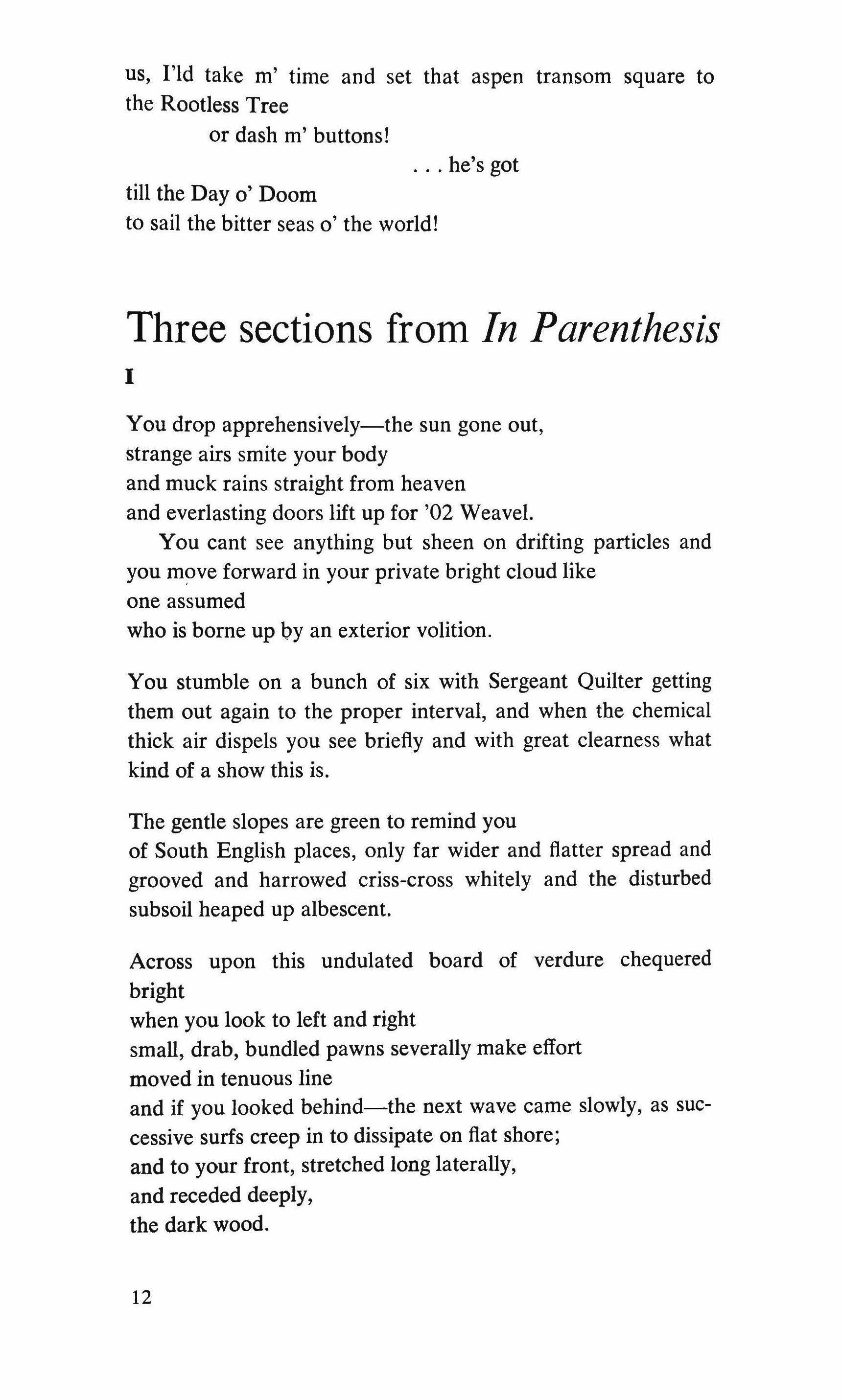
us, I'ld take m' time and set that aspen transom square to the Rootless Tree or dash m' buttons!
he's got till the Day 0' Doom to sail the bitter seas 0' the world!
Three sections from In Parenthesis
I
You drop apprehensively-the sun gone out, strange airs smite your body and muck rains straight from heaven and everlasting doors lift up for '02 Weavel, You cant see anything but sheen on drifting particles and you move forward in your private bright cloud like one assumed who is borne up by an exterior volition.
You stumble on a bunch of six with Sergeant Quilter getting them out again to the proper interval, and when the chemical thick air dispels you see briefly and with great clearness what kind of a show this is.
The gentle slopes are green to remind you of South English places, only far wider and flatter spread and grooved and harrowed criss-cross whitely and the disturbed subsoil heaped up albescent.
Across upon this undulated board of verdure chequered bright when you look to left and right small, drab, bundled pawns severally make effort moved in tenuous line and if you looked behind-the next wave came slowly, as successive surfs creep in to dissipate on flat shore; and to your front, stretched long laterally, and receded deeply, the dark wood.
12
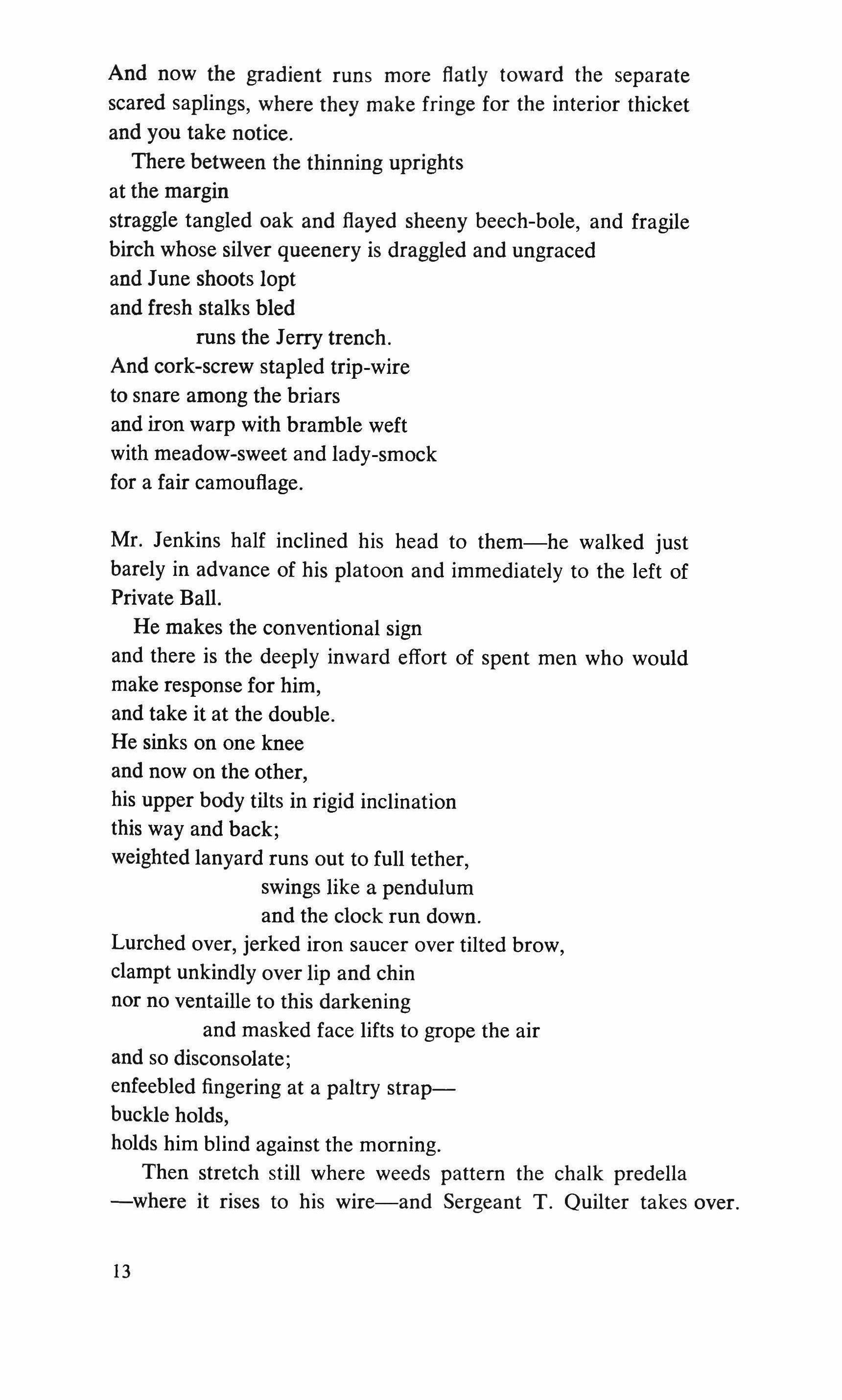
And now the gradient runs more flatly toward the separate scared saplings, where they make fringe for the interior thicket and you take notice.
There between the thinning uprights at the margin straggle tangled oak and flayed sheeny beech-bole, and fragile birch whose silver queenery is draggled and ungraced and June shoots lopt and fresh stalks bled runs the Jerry trench. And cork-screw stapled trip-wire to snare among the briars and iron warp with bramble weft with meadow-sweet and lady-smock for a fair camouflage.
Mr. Jenkins half inclined his head to them-he walked just barely in advance of his platoon and immediately to the left of Private Ball.
He makes the conventional sign and there is the deeply inward effort of spent men who would make response for him, and take it at the double. He sinks on one knee and now on the other, his upper body tilts in rigid inclination this way and back; weighted lanyard runs out to full tether, swings like a pendulum and the clock run down.
Lurched over, jerked iron saucer over tilted brow, clampt unkindly over lip and chin nor no ventaille to this darkening and masked face lifts to grope the air and so disconsolate; enfeebled fingering at a paltry strapbuckle holds, holds him blind against the morning. Then stretch still where weeds pattern the chalk predella -where it rises to his wire-and Sergeant T. Quilter takes over.
13
Lift gently Dai, gentleness befits his gun-shot wound in the lower bowel-go easy-easee at the slope-and mind him -wait for this one and slippy-an' twelve inch an' all-beating up for his counterattack and-that packet on the Aid-Post.
Lower you lower you-some old cows have malhanded little bleeders for a mother's son.
Lower you lower you prize Maria Hunt, an' gammyfingered upland Gamalin - down cantcher - low - hands away me ducky-down on hands on hands down and flattened belly and face pressed and curroodle mother earth she's kind:
Pray her hide you in her deeps she's only refuge against this ferocious pursuer terribly questing.
Maiden of the digged places let our cry come unto thee. Mam, moder, mother of me Mother of Christ under the tree reduce our dimensional vulnerability to the minimumcover the spines of us let us creep back dark-bellied where he can't see don't let it.
There, there, it can't, won't hurt-nothing shall harm my beautiful.
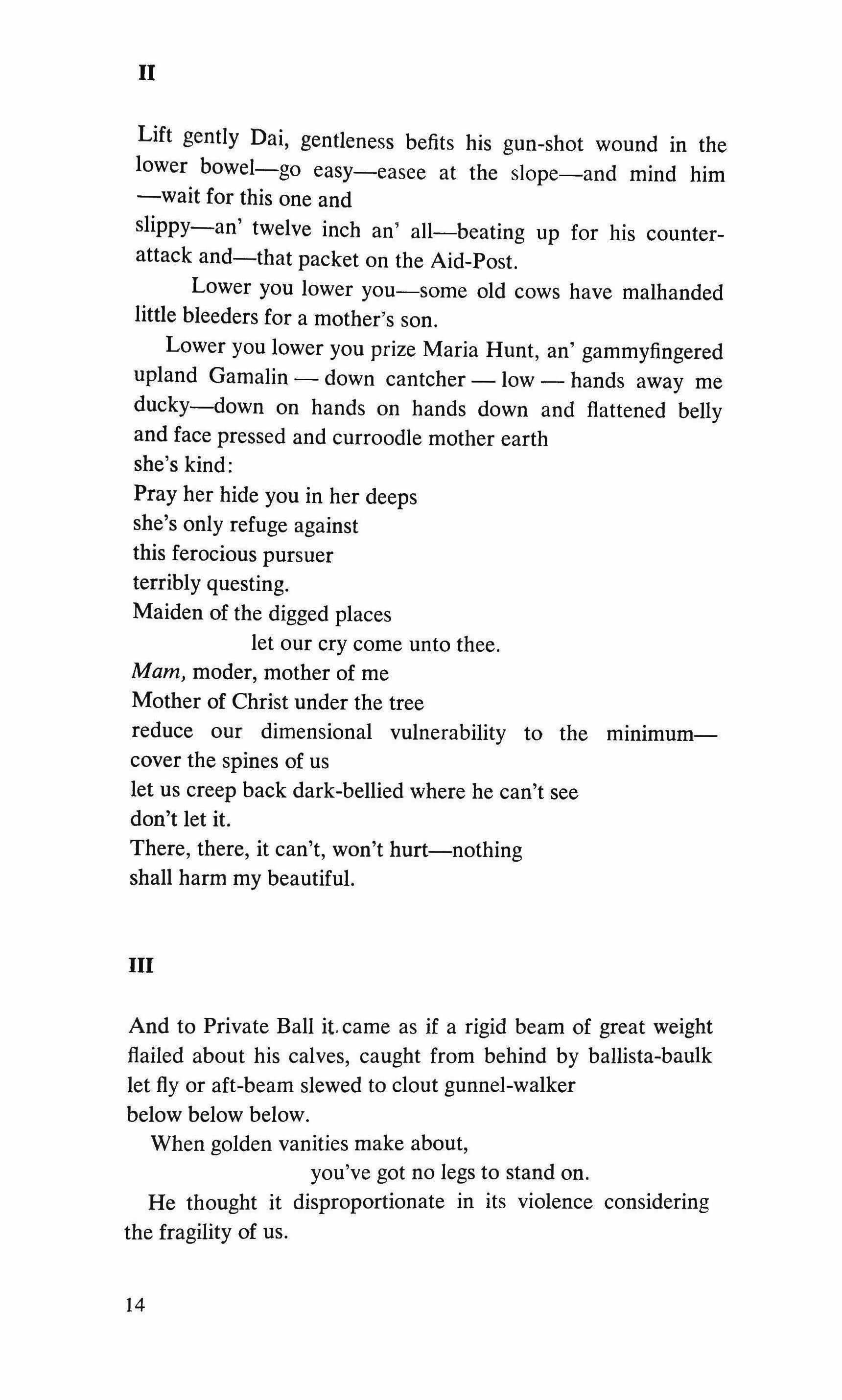
III
And to Private Ball it. came as if a rigid beam of great weight flailed about his calves, caught from behind by ballista-baulk let fly or aft-beam slewed to clout gunnel-walker below below below. When golden vanities make about, you've got no legs to stand on. He thought it disproportionate in its violence considering the fragility of us.
II
14
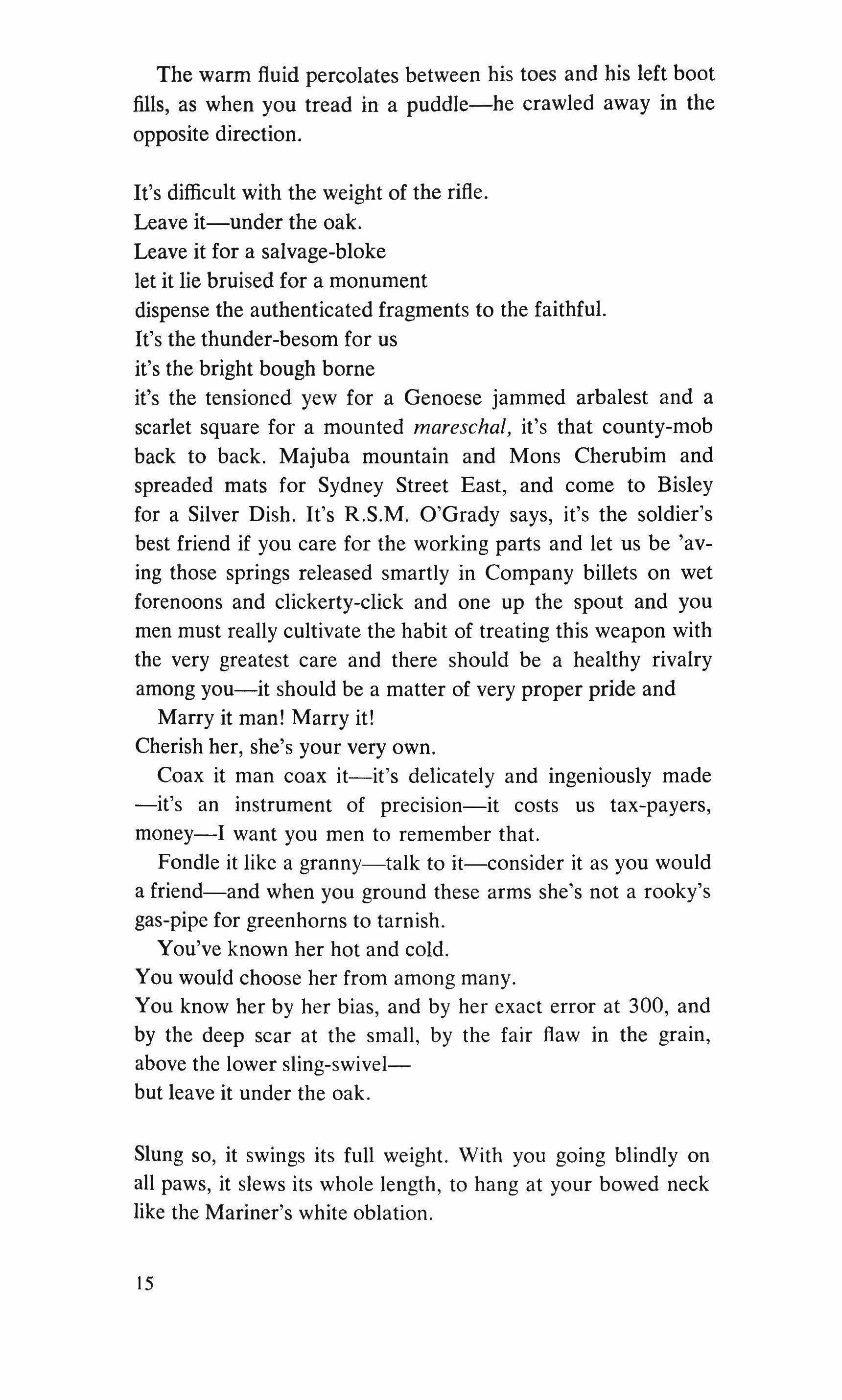
The warm fluid percolates between his toes and his left boot fills, as when you tread in a puddle-he crawled away in the opposite direction.
It's difficult with the weight of the rifle.
Leave it-under the oak. Leave it for a salvage-bloke
let it lie bruised for a monument
dispense the authenticated fragments to the faithful. It's the thunder-besom for us
it's the bright bough borne
it's the tensioned yew for a Genoese jammed arbalest and a scarlet square for a mounted mareschal, it's that county-mob back to back. Majuba mountain and Mons Cherubim and spreaded mats for Sydney Street East, and come to Bisley for a Silver Dish. It's R.S.M. O'Grady says, it's the soldier's best friend if you care for the working parts and let us be 'aving those springs released smartly in Company billets on wet forenoons and c1ickerty-c1ick and one up the spout and you men must really cultivate the habit of treating this weapon with the very greatest care and there should be a healthy rivalry among you-it should be a matter of very proper pride and Marry it man! Marry it!
Cherish her, she's your very own.
Coax it man coax it-it's delicately and ingeniously made -it's an instrument of precision-it costs us tax-payers, money-I want you men to remember that.
Fondle it like a granny-talk to it-consider it as you would a friend-and when you ground these arms she's not a rooky's gas-pipe for greenhorns to tarnish.
You've known her hot and cold. You would choose her from among many. You know her by her bias, and by her exact error at 300, and by the deep scar at the small, by the fair flaw in the grain, above the lower sling-swivelbut leave it under the oak.
Slung so, it swings its full weight. With you going blindly on all paws, it slews its whole length, to hang at your bowed neck like the Mariner's white oblation.
15
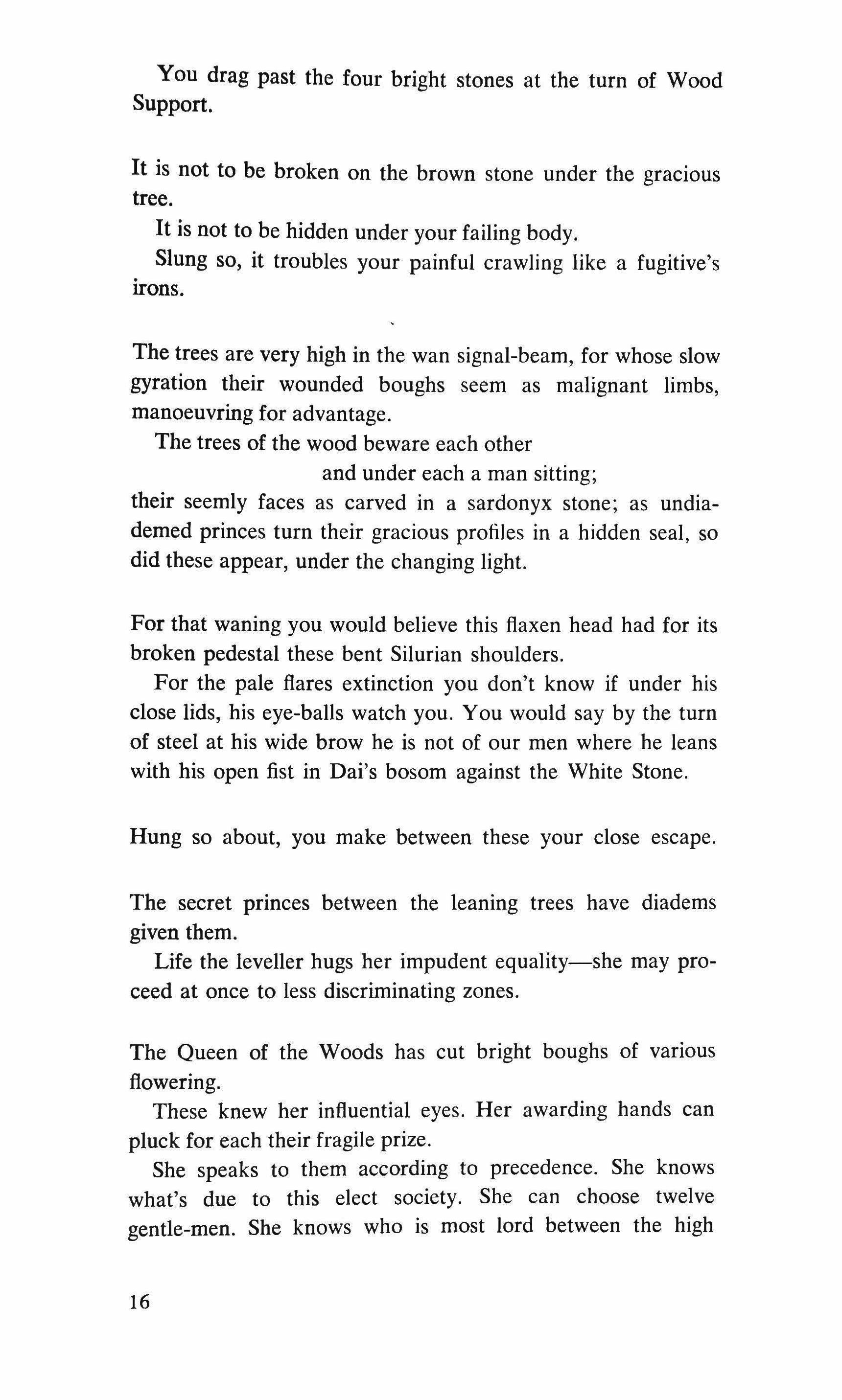
You drag past the four bright stones at the turn of Wood Support.
It is not to be broken on the brown stone under the gracious tree.
It is not to be hidden under your failing body.
Slung so, it troubles your painful crawling like a fugitive's irons.
The trees are very high in the wan signal-beam, for whose slow gyration their wounded boughs seem as malignant limbs, manoeuvring for advantage.
The trees of the wood beware each other and under each a man sitting; their seemly faces as carved in a sardonyx stone; as undiademed princes turn their gracious profiles in a hidden seal, so did these appear, under the changing light.
For that waning you would believe this flaxen head had for its broken pedestal these bent Silurian shoulders.
For the pale flares extinction you don't know if under his close lids, his eye-balls watch you. You would say by the turn of steel at his wide brow he is not of our men where he leans with his open fist in Dai's bosom against the White Stone.
Hung so about, you make between these your close escape.
The secret princes between the leaning trees have diadems given them.
Life the leveller hugs her impudent equality-she may proceed at once to less discriminating zones.
The Queen of the Woods has cut bright boughs of various flowering.
These knew her influential eyes. Her awarding hands can pluck for each their fragile prize.
She speaks to them according to precedence. She knows what's due to this elect society. She can choose twelve gentle-men. She knows who is most lord between the high
16
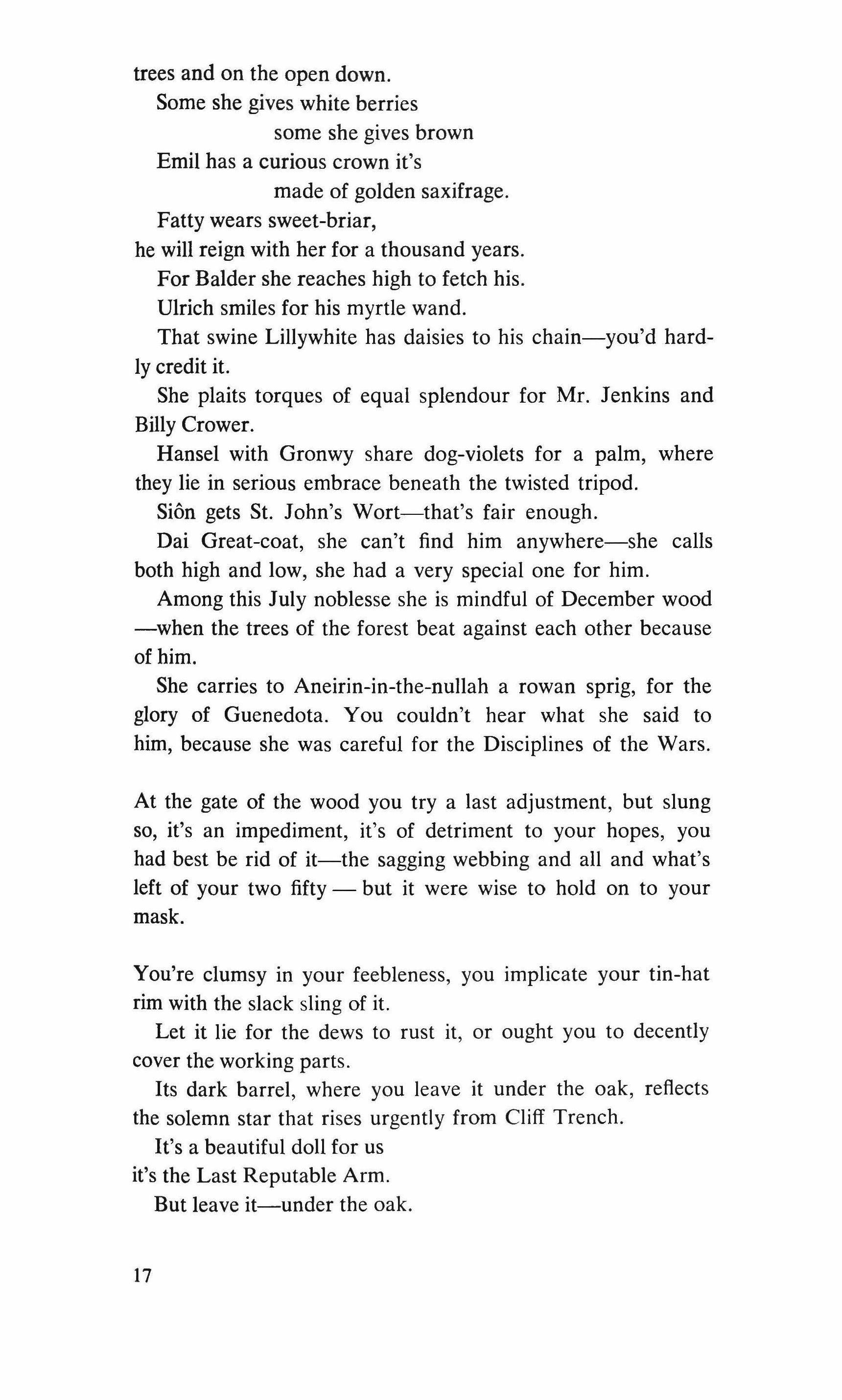
trees and on the open down.
Some she gives white berries some she gives brown
Emil has a curious crown it's made of golden saxifrage.
Fatty wears sweet-briar, he will reign with her for a thousand years.
For Balder she reaches high to fetch his.
Ulrich smiles for his myrtle wand.
That swine Lillywhite has daisies to his chain-you'd hardly credit it.
She plaits torques of equal splendour for Mr. Jenkins and Billy Crower.
Hansel with Gronwy share dog-violets for a palm, where they lie in serious embrace beneath the twisted tripod.
Sian gets St. John's Wort-that's fair enough.
Dai Great-coat, she can't find him anywhere-she calls both high and low, she had a very special one for him.
Among this July noblesse she is mindful of December wood -when the trees of the forest beat against each other because of him.
She carries to Aneirin-in-the-nullah a rowan sprig, for the glory of Guenedota. You couldn't hear what she said to him, because she was careful for the Disciplines of the Wars.
At the gate of the wood you try a last adjustment, but slung so, it's an impediment, it's of detriment to your hopes, you had best be rid of it-the sagging webbing and all and what's left of your two fifty - but it were wise to hold on to your mask.
You're clumsy in your feebleness, you implicate your tin-hat rim with the slack sling of it.
Let it lie for the dews to rust it, or ought you to decently cover the working parts.
Its dark barrel, where you leave it under the oak, reflects the solemn star that rises urgently from Cliff Trench.
It's a beautiful doll for us it's the Last Reputable Arm.
But leave it-under the oak.
17

leave it for a Cook's tourist to the Devastated Areas and crawl as far as you can and wait for the bearers.
Mrs. Willy Hartington has learned to draw sheets and so has Miss Melpomene; and on the south lawns, men walk in red white and blue under the cedars and by every green tree and beside comfortable waters.
But why dont the bastards comeBearers!-stret-cher bear-errs! or do they devide the spoils at the Aid-Post.
But how many men do you suppose could bear away a third of us:
drag just a little further-he yet may counter-attack.
Lie still under the oak next to the Jerry and Sergeant Jerry Coke.
The feet of the reserves going up tread level with your forehead; and no word for you; they whisper one with another; pass on, inward; these latest succours: green Kimmerii to bear up the war.
Oeth and Annoeth's hosts they were who in that night grew younger men younger striplings.
The geste says this and the man who was on the field and who wrote the book the man who does not know this has not understood anything.
18
HUGH MacDIARMID

o wha's the bride?
o wha's the bride that cairries the bunch 0' thistles blinterin' white?
Her cuckold bridegroom little dreids What he sall ken this nieht.
For closer than gudeman can come And closer to'r than hersel', Wha didna need her maidenheid Has wrocht his purpose fell.
o wha's been here afore me, lass, And hoo did he get in?
-A man that deed or was I born This evil thing has din.
And left, as it were on a corpse, Your maidenheid to me?
-Nae lass, gudeman, sin' Time began 'S hed ony mair to gi'e.
But I can gi'e ye kindness, lad, And a pair 0' willin' hands, And you sall ha'e my breists like stars, My limbs like willow wands.
And on my lips ye'll heed nae mair, And in my hair forget, The seed 0' a' the men that in My virgin womb ha'e met
19
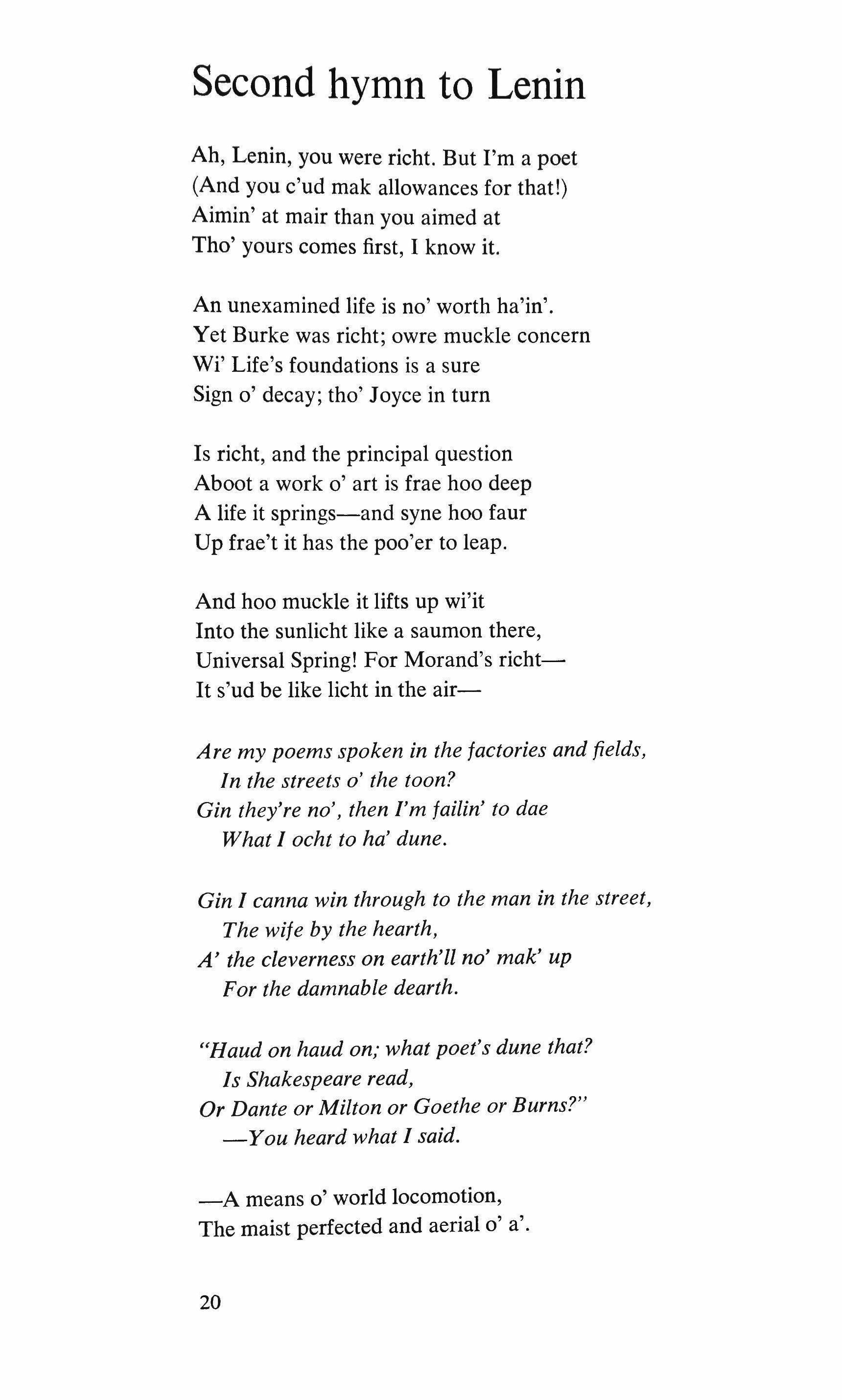
Second hymn to Lenin
Ah, Lenin, you were richt. But I'm a poet (And you c'ud mak allowances for that!)
Aimin' at mair than you aimed at Tho' yours comes first, I know it.
An unexamined life is no' worth ha'in'. Yet Burke was richt; owre muckle concern Wi' Life's foundations is a sure Sign 0' decay; tho' Joyce in turn
Is richt, and the principal question Aboot a work 0' art is frae hoo deep
A life it springs-and syne hoo faur Up frae't it has the poo'er to leap.
And hoo muckle it lifts up wi'it Into the sunlicht like a saumon there, Universal Spring! For Morand's richtIt s'ud be like licht in the air-
Are my poems spoken in the factories and fields, In the streets 0' the toon?
Gin they're no', then I'm failin' to dae What I ocht to ha' dune.
Gin I canna win through to the man in the street, The wife by the hearth, A' the cleverness on earth'll no' mak' up For the damnable dearth.
"Baud on haud on; what poet's dune that? Is Shakespeare read, Or Dante or Milton or Goethe or Burns?" -You heard what I said.
-A means 0' world locomotion, The maist perfected and aerial 0' a'.
20

Lenin's name's gane owre the haill earth, But the names 0' the ithers?-Ha!
What hidie-hole 0' the vineyard d'they scart
Wi' minds like the look on a hen's face, Morand, Joyce, Burke, and the rest That e'er wrote; me noo in like case?
Great poets hardly onybody kens o'?
Geniuses like a man talkin' t'm sel'?
Nonsense! They're nocht 0' the sort Their character's easy to tell.
They're nocht but romantic rebels
Strikin' dilletante poses;
Trotsky-Christ, no' wi' a croon 0' thorns
But a wreath 0' paper roses.
A' that's great is free and expansive. What ha' they expanded tae?
They've affected nocht but a fringe 0' mankind in ony way.
Barbarian saviour 0' civilization
Hoo weel ye kent (we're owre dull witted)
Naething is dune save as we ha'e Means to en's transparently fitted.
Poetry like politics maun cut
The cackle and pursue real ends, Unerringly as Lenin, and to that Its nature better tends.
Wi' Lenin's vision equal poet's gift And what unparalleled force was there!
Nocht in a' literature wi' that Begins to compare.
Nae simple rhymes for silly folk
But the haill art, as Lenin gied
21

Nae Marx-without-tears to workin' men
But the fu' course insteed.
Organic constructional work, Practicality, and work by degrees; First things first; and poetry in tum '11 be built by these.
You saw it faur off when you thocht 0' mass-education yet. Hoo lang till they rise to Pushkin? And that's but a fit!
Oh, it's nonsense, nonsense, nonsense, Nonsense at this time 0' day
That breid-and-butter problems S'ud be in ony man's way.
They s'ud be like the tails we tint On leavin' the monkey stage; A' maist folk fash aboot's alike Primaeval to oor age.
We're grown-ups that haena yet Put bairnly things aside -A' that's material and moralAnd oor new state descried.
Sport, love, and parentage, Trade, politics, and law
S'ud be nae mair to us than braith We hardly ken we draw.
Freein' oor poo'ers for greater things, And fegs there's plenty 0' them, Tho' who's still trammelt in alow Canna be tenty 0' them-
In the meantime Montehus' sangsBut as you were ready to tine
22
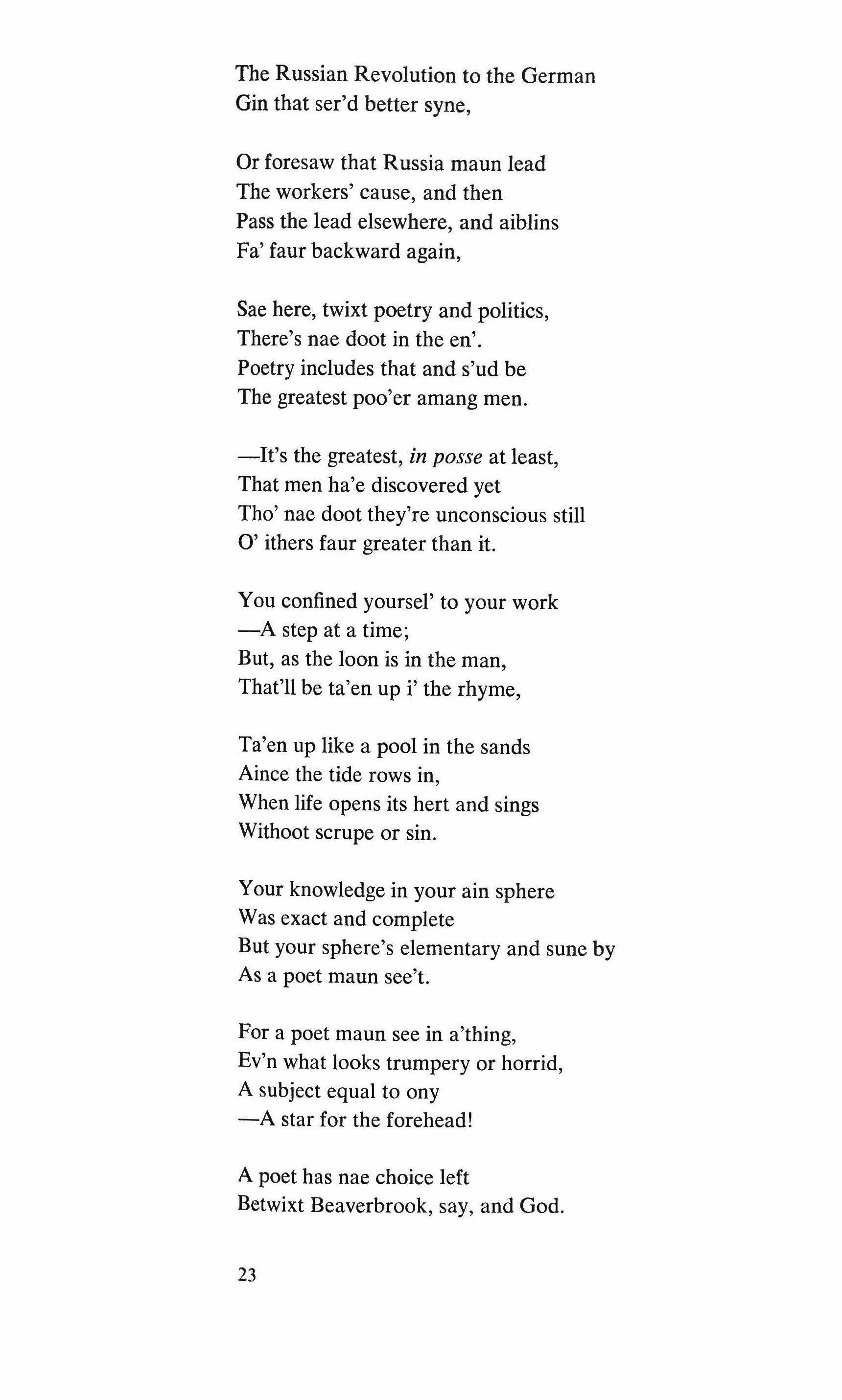
The Russian Revolution to the German Gin that ser'd better syne,
Or foresaw that Russia maun lead The workers' cause, and then Pass the lead elsewhere, and aiblins Fa' faur backward again,
Sae here, twixt poetry and politics, There's nae doot in the en'.
Poetry includes that and s'ud be The greatest poo'er amang men.
-It's the greatest, in posse at least, That men ha'e discovered yet Tho' nae doot they're unconscious still 0' ithers faur greater than it.
You confined yoursel' to your work -A step at a time; But, as the loon is in the man, That'll be ta'en up i' the rhyme,
Ta'en up like a pool in the sands Aince the tide rows in, When life opens its hert and sings Withoot scrupe or sin.
Your knowledge in your ain sphere Was exact and complete
But your sphere's elementary and sune by As a poet maun see't.
For a poet maun see in a'thing, Ev'n what looks trumpery or horrid, A subject equal to any -A star for the forehead!
A poet has nae choice left Betwixt Beaverbrook, say, and God.
23

Jimmy Thomas or you, A cat, carnation, or clod.
He daurna turn awa' frae ocht For a single act 0' neglect And straucht he may fa' frae grace And be void 0' effect.
Disinterestedness, Oor profoundest word yet, But how far yont even that The sense 0' anything's set!
The inward necessity yont Ony laws 0' cause The intellect conceives That a'thing has!
Freend, foe; past, present, future; Success, failure; joy, fear; Life, Death; and a'thing else, For us, are equal here.
Male, female; quick or deid, Let us fike nae mair; The deep line o'cleavage Disna lie there.
Black in the pit the miner is, The shepherd reid on the hill, And I'm wi' them baith until The end of mankind, I wis.
Whatever their jobs a' men are ane
In life, and syne in daith (Tho' it's sma' patience I can ha'e Wi' life's ideas 0' that by the way) And he's nae poet but kens it, faith, And ony job but the hardest's ta'en.
24

The sailor gangs owre the curve 0' the sea, The hoosewiie's thrang in the wash-tub, And whatna rhyme can I find but hub, And what else can poetry be?
The core 0' a' activity, Changin't in accordance wi' Its inward necessity And mede 0' integrity.
Unremittin', relentless, Organized to the last degree, Ah, Lenin, politics is bairns' play To what this maun be!
From In Memoriam James Joyce
'The world is fast bound in the snares of Varuna'
The world is fast bound in the snares of Varuna -'Cords consisting of serpents', according to Kulluka (Pasaih sarpa-rajjughih). The winkings of men's eyes Are all numbered by him; he wields the universe As gamesters handle dice. These are the unexampled days of false witness-a barbarous regime which gives power over life and death To an oligarchy of brigands and adventurers, Without security from vexation by irresponsible tyrants, Without protection of the home against the aggression of criminal bands, Without impartial justice, without dignity. We are denied all the deepest needs of men who do not wish To sink to the level of the beasts-condemned
To a life deprived of its salt.
Already, everywhere, The speed-up, the 'church work,' the lead poisoning,
25

The strain that drives men nuts. The art of teaching fish by slow degrees To live without water.
Men cheaper than safety
-Human relations have never sunk so low.
'The meaninglessness of the individual Apart from his communal framework,'
The men in power who are worth no more Than an equal number of cockroaches, Unconcerned about values, Indifferent to human quality
Or jealous and implacably hostile to it, Full of the tyranny of coarse minds and degraded souls; The abominable clap-trap and politicians' rhetoric, The tawdry talk about the 'King' and 'the King's lieges' And 'the Government' and 'the British people'; The concentration camps, the cat 0' nine tails, The law more lawless than any criminal, The beatings-up by the police, The countless thuggeries of Jacks-in-office, The vile society woman, infernal parasites, The endless sadism, Gorilla-rule, The live men hanging in the plaza With butcher's hooks through their jaws
-And everywhere the worship of 'efficiency,'
Of whatever 'works' no matter to what ends, The general feeling that if a thing 'Runs like a machine' it is all right
-That there can be no higher praise; Mechanical authoritarianism, A Lord Lloyd thinking 'the whole method of conference Adverse to efficient government'
-Those (as Leonard Woolf has said) Who question the authority of the machine, Who claim the right to do what they want And to be governed by themselves, Condemned as rebels and extremists Against whose claims to freedom of soul It is the primary duty of all loyal citizens
26
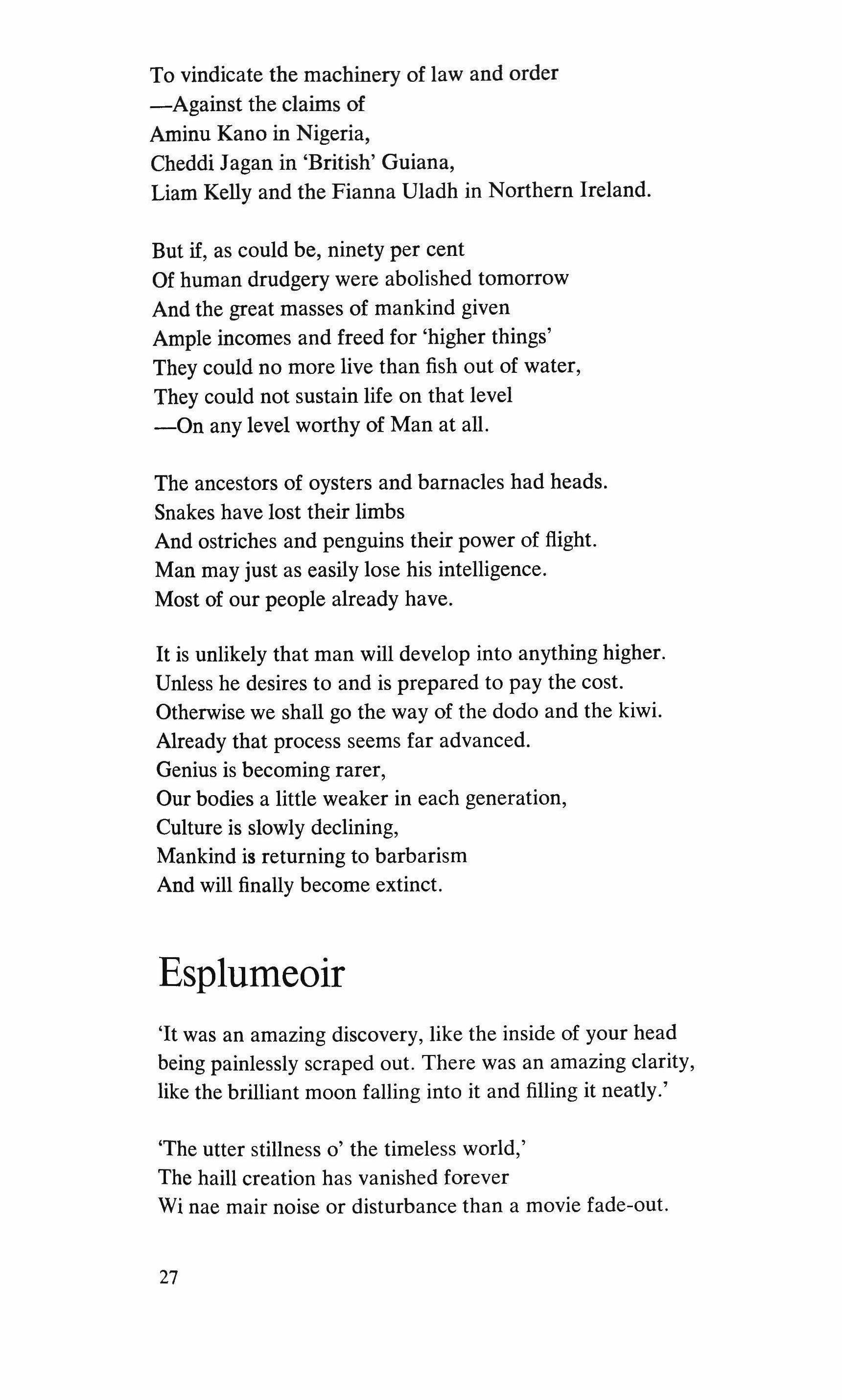
To vindicate the machinery of law and order -Against the claims of Aminu Kano in Nigeria, Cheddi Jagan in 'British' Guiana, Liam Kelly and the Fianna Uladh in Northern Ireland.
But if, as could be, ninety per cent Of human drudgery were abolished tomorrow And the great masses of mankind given Ample incomes and freed for 'higher things' They could no more live than fish out of water, They could not sustain life on that level -On any level worthy of Man at all.
The ancestors of oysters and barnacles had heads. Snakes have lost their limbs And ostriches and penguins their power of flight. Man may just as easily lose his intelligence. Most of our people already have.
It is unlikely that man will develop into anything higher. Unless he desires to and is prepared to pay the cost. Otherwise we shall go the way of the dodo and the kiwi. Already that process seems far advanced. Genius is becoming rarer, Our bodies a little weaker in each generation, Culture is slowly declining, Mankind is returning to barbarism And will finally become extinct.
Esplumeoir
'It was an amazing discovery, like the inside of your head being painlessly scraped out. There was an amazing clarity, like the brilliant moon falling into it and filling it neatly.'
'The utter stillness 0' the timeless world,' The haill creation has vanished forever Wi nae mair noise or disturbance than a movie fade-out.
27
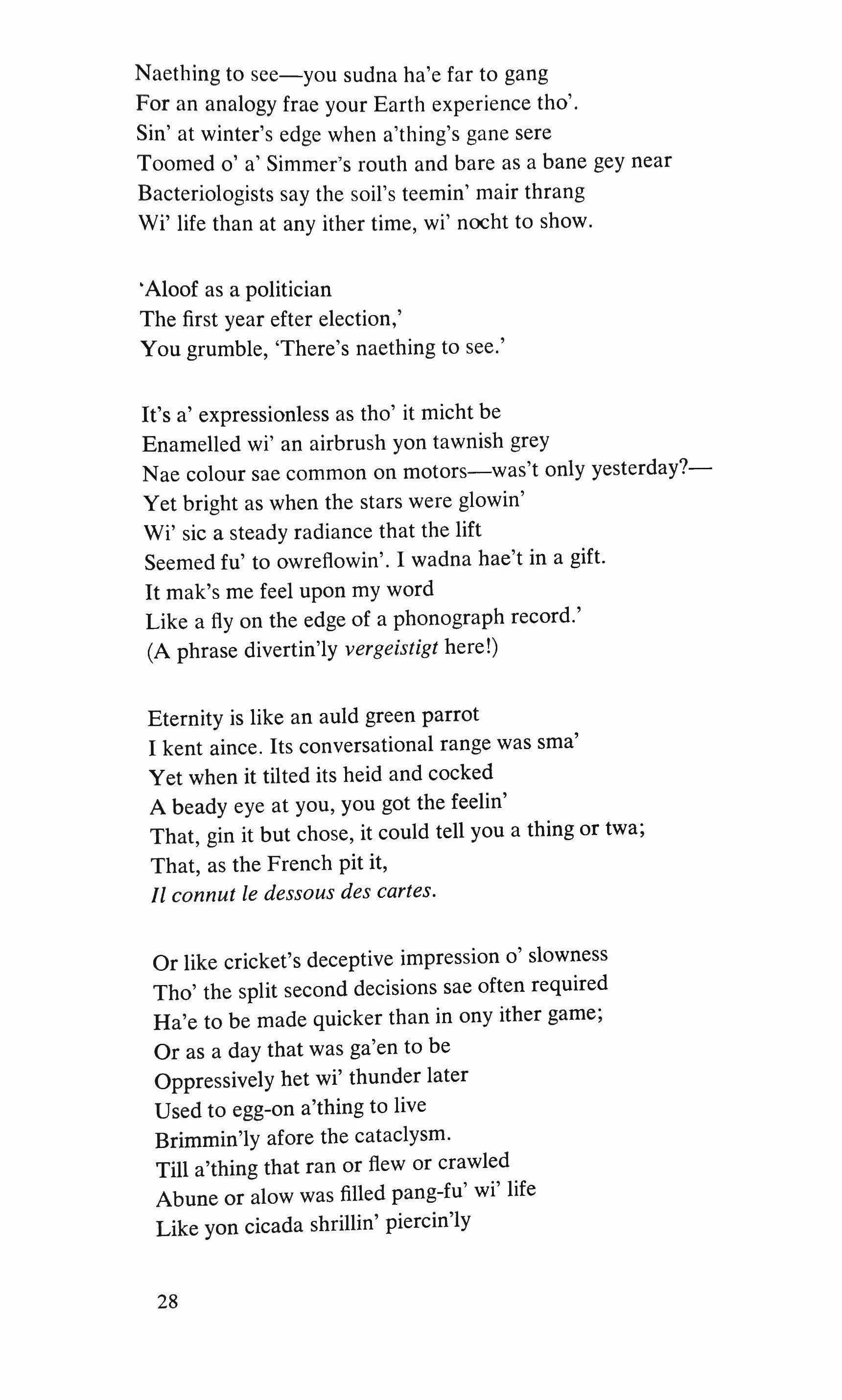
Naething to see-you sudna ha'e far to gang
For an analogy frae your Earth experience tho'. Sin' at winter's edge when a'thing's gane sere
Toomed 0' a' Simmer's routh and bare as a bane gey near
Bacteriologists say the soil's teemin' mair thrang Wi' life than at any ither time, wi' nocht to show.
'Aloof as a politician
The first year efter election,' You grumble, 'There's naething to see.'
It's a' expressionless as tho' it micht be
Enamelled wi' an airbrush yon tawnish grey
Nae colour sae common on motors-was't only yesterday?
Yet bright as when the stars were glowin' Wi' sic a steady radiance that the lift
Seemed fu' to owreflowin'. I wadna hae't in a gift.
It mak's me feel upon my word
Like a fly on the edge of a phonograph record.' (A phrase divertin'ly vergeistigt here!)
Eternity is like an auld green parrot
I kent aince. Its conversational range was sma'
Yet when it tilted its heid and cocked
A beady eye at you, you got the feelin' That, gin it but chose, it could tell you a thing or twa; That, as the French pit it, Il connut le dessous des cartes.
Or like cricket's deceptive impression 0' slowness
Tho' the split second decisions sae often required
Ha'e to be made quicker than in ony ither game; Or as a day that was ga'en to be Oppressively het wi' thunder later
Used to egg-on a'thing to live Brimmin'ly afore the cataclysm.
Till a'thing that ran or flew or crawled
Abune or alow was filled pang-fu' wi' life
Like yon cicada shrillin' piercin'ly
28
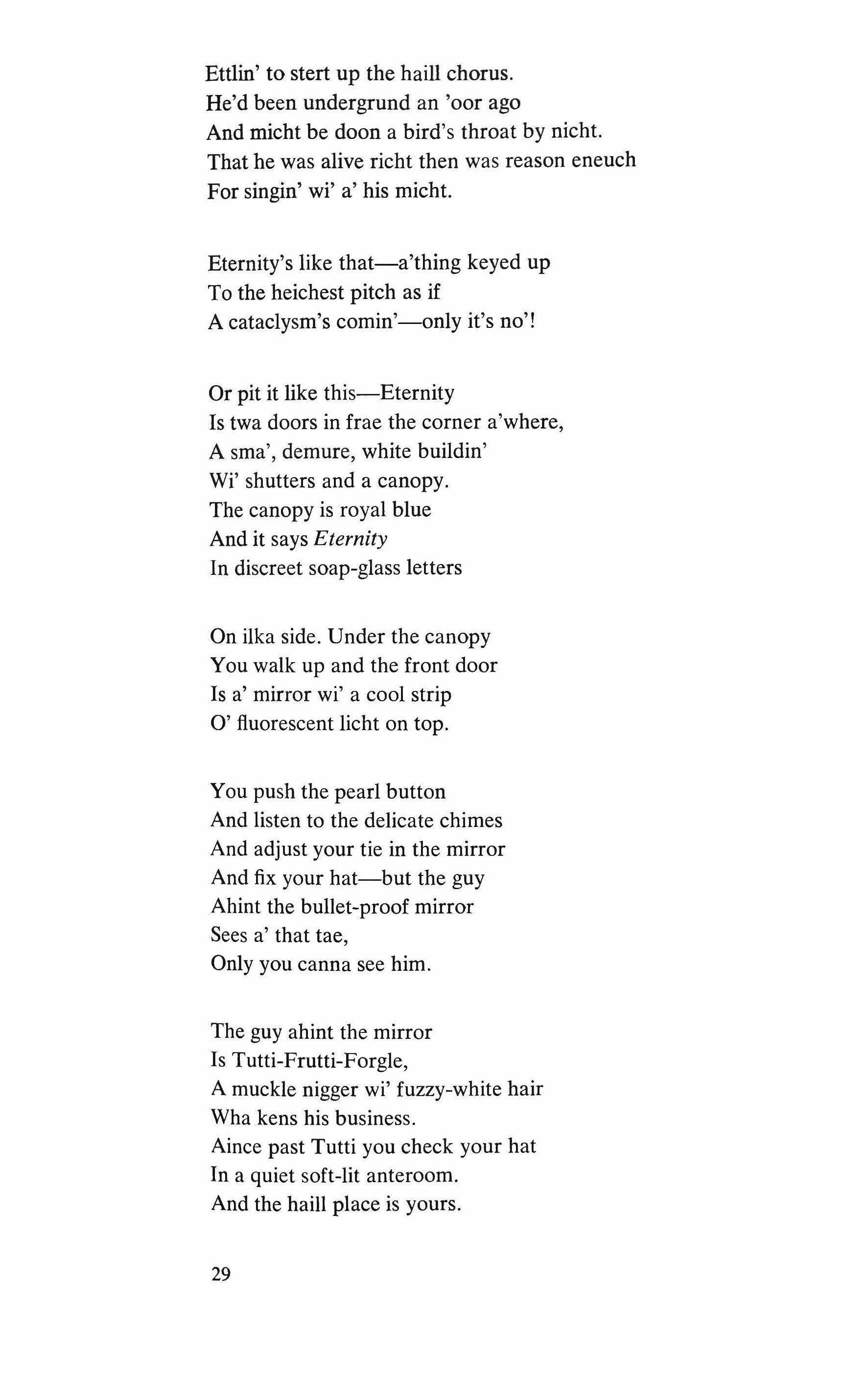
Ettlin' to stert up the haill chorus. He'd been undergrund an 'oar ago And micht be doon a bird's throat by nicht. That he was alive richt then was reason eneuch For singin' wi' a' his micht.
Eternity's like that-a'thing keyed up To the heichest pitch as if A cataclysm's comin'-only it's no'!
Or pit it like this-Eternity Is twa doors in frae the corner a'where, A sma', demure, white buildin' Wi' shutters and a canopy. The canopy is royal blue And it says Eternity In discreet soap-glass letters
On ilka side. Under the canopy You walk up and the front door Is a' mirror wi' a cool strip 0' fluorescent licht on top.
You push the pearl button And listen to the delicate chimes And adjust your tie in the mirror And fix your hat-but the guy Ahint the bullet-proof mirror Sees a' that tae, Only you canna see him.
The guy ahint the mirror Is Tutti-Frutti-Forgle, A muckle nigger wi' fuzzy-white hair Wha kens his business. Aince past Tutti you check your hat In a quiet soft-lit anteroom. And the haill place is yours.
29
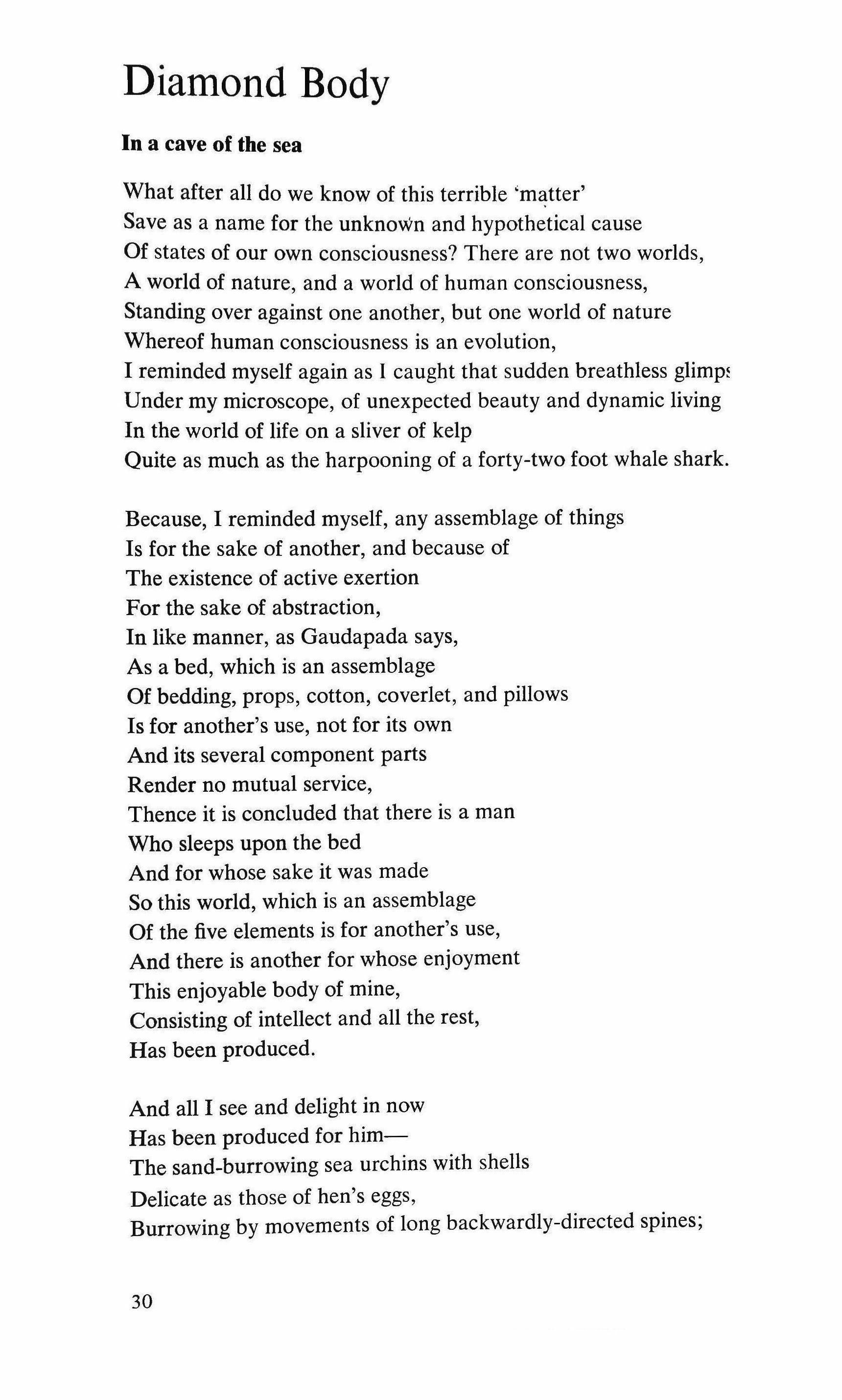
Diamond Body
In a cave of the sea
What after all do we know of this terrible 'matter'
Save as a name for the unknown and hypothetical cause Of states of our own consciousness? There are not two worlds, A world of nature, and a world of human consciousness, Standing over against one another, but one world of nature
Whereof human consciousness is an evolution, I reminded myself again as I caught that sudden breathless glirnps Under my microscope, of unexpected beauty and dynamic living In the world of life on a sliver of kelp
Quite as much as the harpooning of a forty-two foot whale shark.
Because, I reminded myself, any assemblage of things Is for the sake of another, and because of The existence of active exertion
For the sake of abstraction, In like manner, as Gaudapada says, As a bed, which is an assemblage Of bedding, props, cotton, coverlet, and pillows Is for another's use, not for its own
And its several component parts Render no mutual service,
Thence it is concluded that there is a man Who sleeps upon the bed
And for whose sake it was made
So this world, which is an assemblage Of the five elements is for another's use, And there is another for whose enjoyment
This enjoyable body of mine, Consisting of intellect and all the rest, Has been produced.
And all I see and delight in now Has been produced for him-
The sand-burrowing sea urchins with shells
Delicate as those of hen's eggs, Burrowing by movements of long backwardly-directed spines;
30
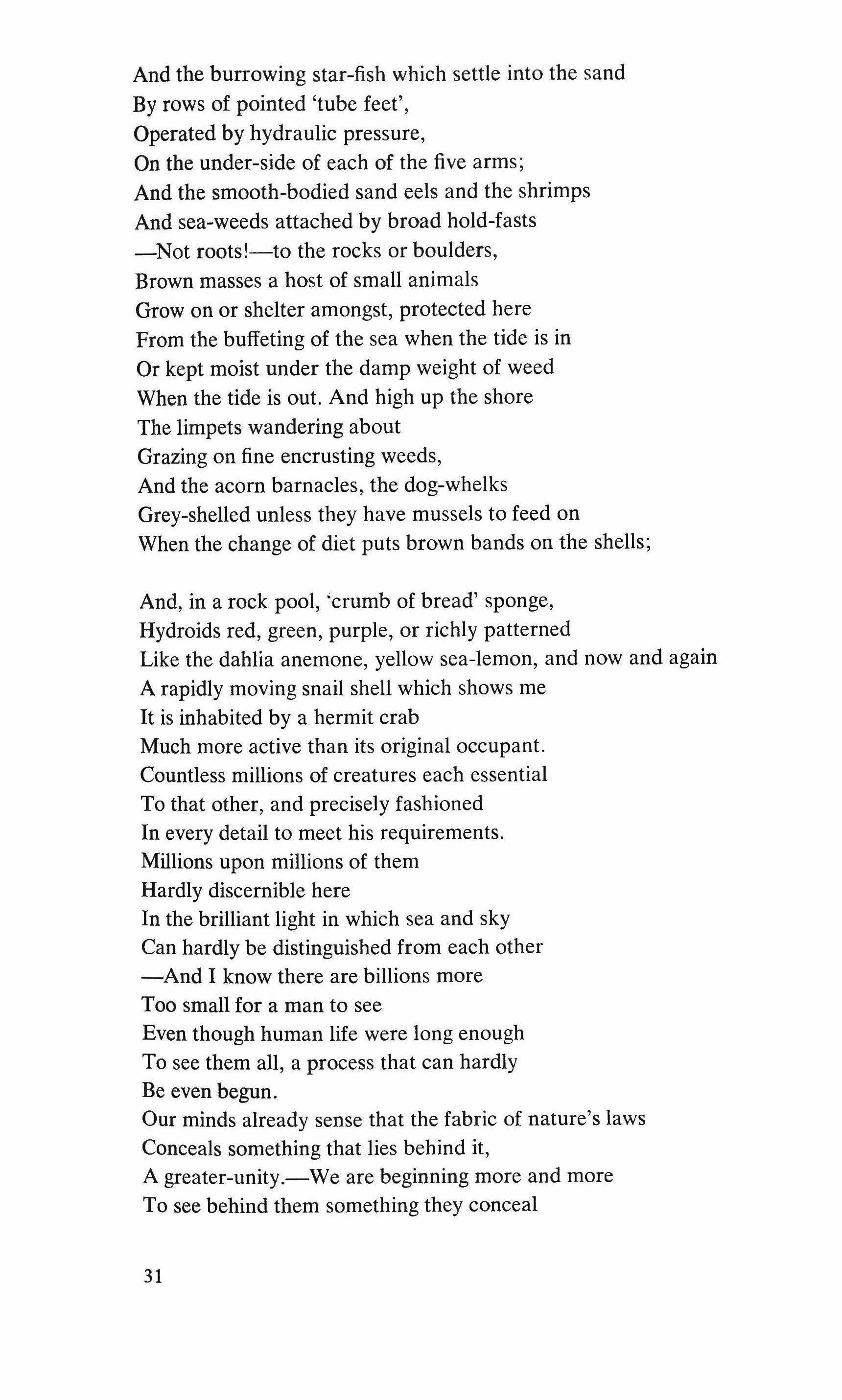
And the burrowing star-fish which settle into the sand
By rows of pointed 'tube feet',
Operated by hydraulic pressure,
On the under-side of each of the five arms;
And the smooth-bodied sand eels and the shrimps
And sea-weeds attached by broad hold-fasts
-Not roots!-to the rocks or boulders, Brown masses a host of small animals
Grow on or shelter amongst, protected here
From the buffeting of the sea when the tide is in Or kept moist under the damp weight of weed
When the tide is out. And high up the shore
The limpets wandering about
Grazing on fine encrusting weeds,
And the acorn barnacles, the dog-whelks
Grey-shelled unless they have mussels to feed on
When the change of diet puts brown bands on the shells;
And, in a rock pool, 'crumb of bread' sponge, Hydroids red, green, purple, or richly patterned
Like the dahlia anemone, yellow sea-lemon, and now and again
A rapidly moving snail shell which shows me
It is inhabited by a hermit crab
Much more active than its original occupant.
Countless millions of creatures each essential
To that other, and precisely fashioned
In every detail to meet his requirements.
Millions upon millions of them
Hardly discernible here
In the brilliant light in which sea and sky Can hardly be distinguished from each other
-And I know there are billions more
Too small for a man to see
Even though human life were long enough
To see them all, a process that can hardly Be even begun.
Our minds already sense that the fabric of nature's laws Conceals something that lies behind it,
A greater-unity.-We are beginning more and more
To see behind them something they conceal
31

For the most part cunningly
With their outward appearances, By hoodwinking man with a facade
Quite different from what it actually covers.
I am convinced that behind this too
There is another and many more.
Today we are breaking up the chaste
Ever-deceptive phenomena of Nature
And reassembling them according to our will.
We look through matter, and the day is not far distant
When we shall be able to cleave
Through her oscillating mass as if it were air.
Matter is something which man still
At most tolerates, but does not recognise.
Here in the brilliant light, where the mandala is almost complete,
The circumference of a blinding diamond broken
Only by a few points and dashes of darkness yet,
The shapes and figures created by the fire of the spirit
Are only empty forms and colours. It is not necessary to confuse
The dull glow of such figures with the pure white light
Of the divine body of truth, nor to project
The light of the highest consciousness into concretized figures,
But to have the consciousness withdrawn, as if
To some sphere beyond the world where it is
At once empty and not empty,
The centre of gravity of the whole personality
Transferred from the conscious centre of the ego
To a sort of hypothetical point
Between the conscious and the unconscious,
The complete abolition of the original
Undifferentiated state of subject and object; Thus through the certainty that something lives through me
Rather than I myself live
A man bridges the gap between instinct and spirit, And takes hold upon life, attacks life,
In a more profound sense than before.
In the reconciliation of the differentiated And the inferior function, the "great Tao
-The meaning of the world' is discovered.
32

Crossing the island I see the tail of my coat
Wave back and forth and know It is the waves of the sea on my beach. And now I am in the cave. A moment ago I saw the broad leather-brown belts of the tangleweed, And the minute forms that fix themselves In soft carmine lace-stencils upon the shingle, The notched wrack gemmed with lime-white bead-shells Showing like pearls on a dark braid, And minute life in a million forms.
And I saw the tide come crawling Through the rocky labyrinths of approach With flux and reflux-making inch upon inch In an almost imperceptible progress.
But now I know it is the earth
And not the water that is unstable, For at every rise and fall of the pellucid tide It seems as though it were the shingle
And the waving forest of sea-growth That moves-and not the water!
And, after all, there is no illusion, But seeming deception prefigures truth, For it is a matter of physiographical knowledge That in the long passages of time The water remains-and the land ebbs and flows.
I have achieved the diamond body.
33
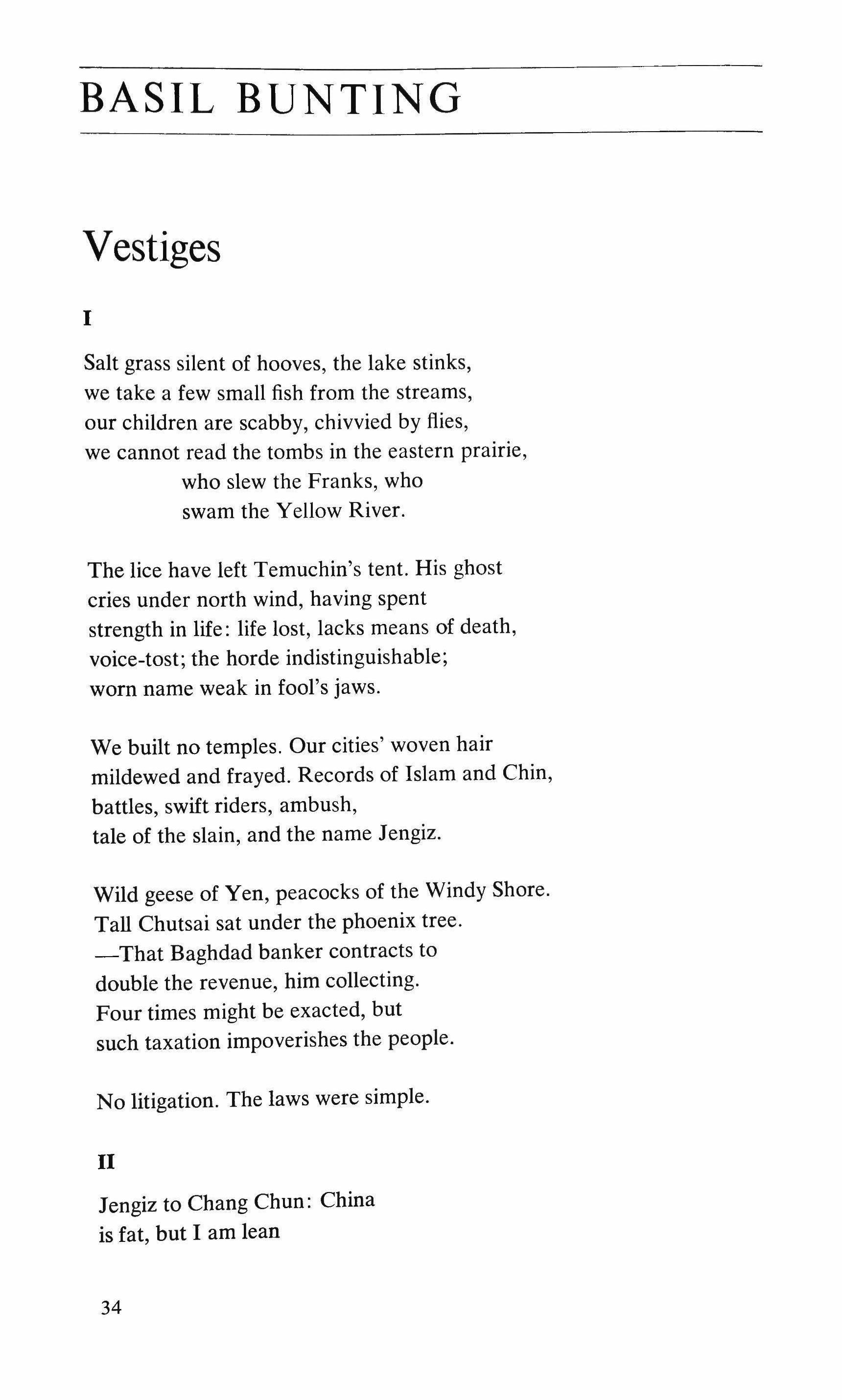
BASIL BUNTING
Vestiges
I
Salt grass silent of hooves, the lake stinks, we take a few small fish from the streams, our children are scabby, chivvied by flies, we cannot read the tombs in the eastern prairie, who slew the Franks, who swam the Yellow River.
The lice have left Temuchin's tent. His ghost cries under north wind, having spent strength in life: life lost, lacks means of death, voice-tost; the horde indistinguishable; worn name weak in fool's jaws.
We built no temples. Our cities' woven hair mildewed and frayed. Records of Islam and Chin, battles, swift riders, ambush, tale of the slain, and the name Jengiz.
Wild geese of Yen, peacocks of the Windy Shore. Tall Chutsai sat under the phoenix tree. -That Baghdad banker contracts to double the revenue, him collecting. Four times might be exacted, but such taxation impoverishes the people.
No litigation. The laws were simple. II
Jengiz to Chang Chun: China is fat, but I am lean
34
eating soldier's food, lacking learning. In seven years
I brought most of the world under one law. The Lords of Cathay hesitate and fall.
Amidst these disorders I distrust my talents. To cross a river boats and rudders, to keep the empire in order poets and sages, but I have not found nine for a cabinet, not three. I have fasted and washed. Come.
Chang: I am old not wise nor virtuous, nor likely to be much use. My appearance is parched, my body weak. I set out at once.
And to Liu Chung Lu, Jengiz: Get an escort and a good cart, and the girls can be sent on separately if he insists.
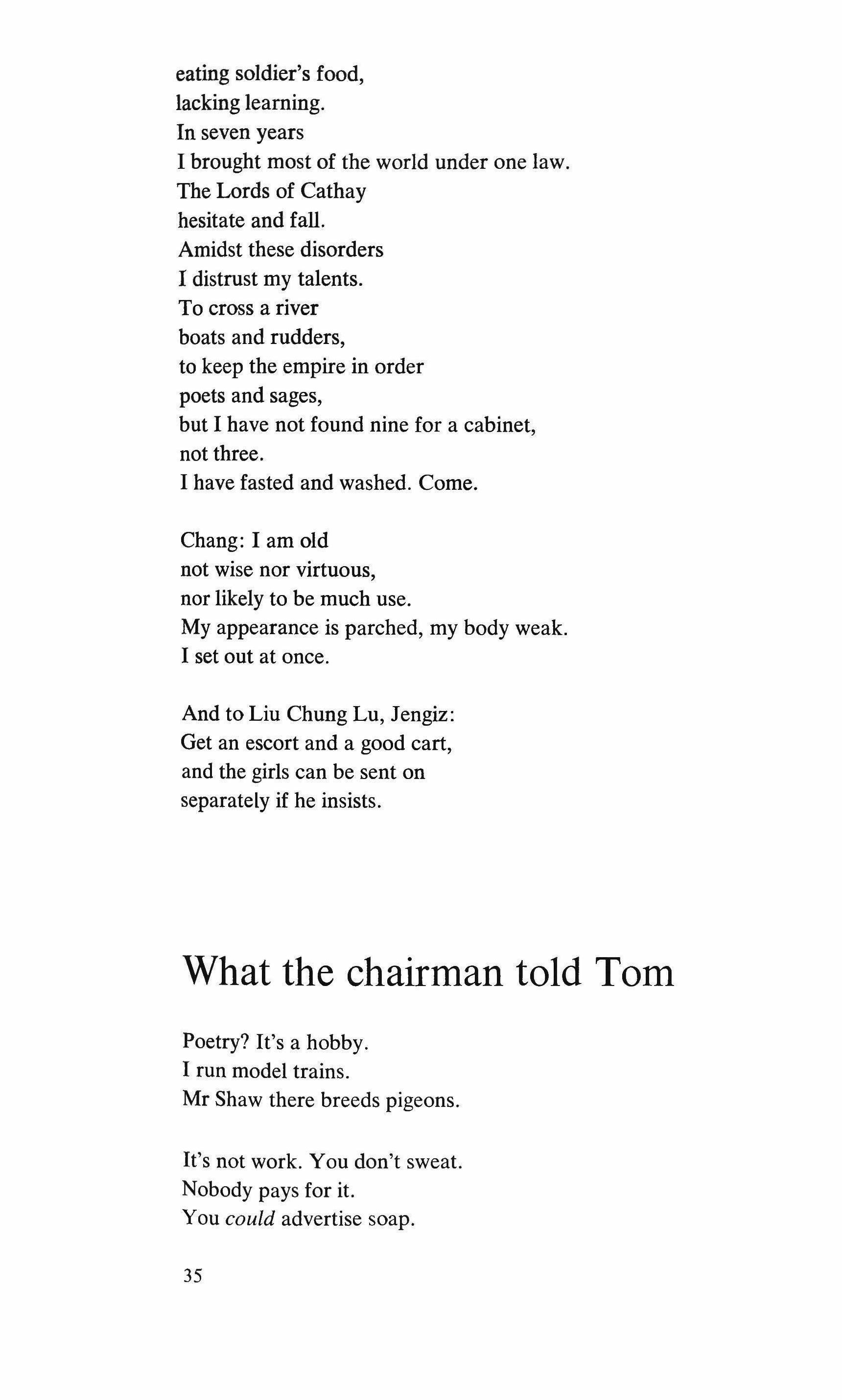
What the chairman told Tom
Poetry? It's a hobby. I run model trains. Mr Shaw there breeds pigeons.
It's not work. You don't sweat. Nobody pays for it. You could advertise soap.
35
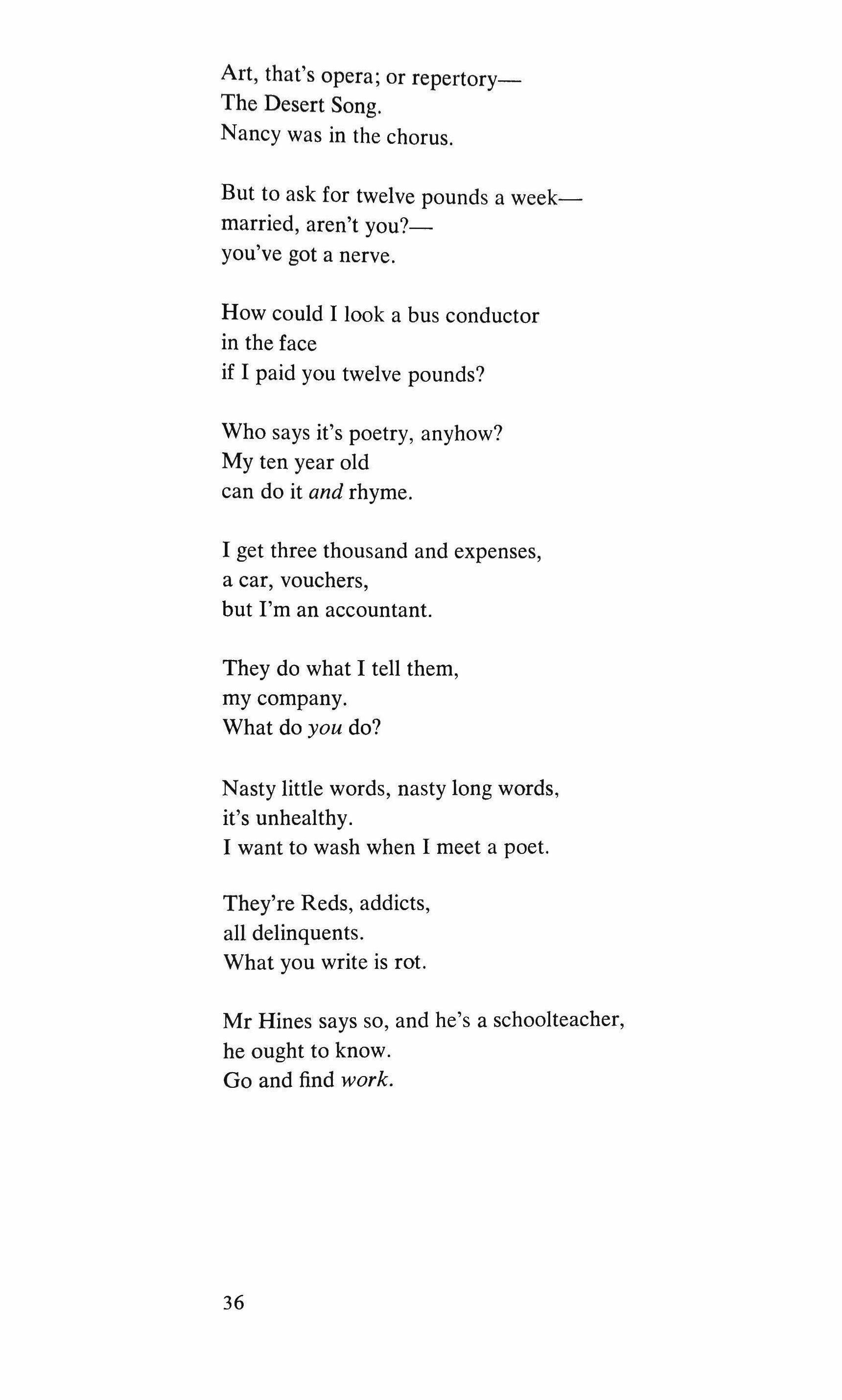
Art, that's opera; or repertoryThe Desert Song. Nancy was in the chorus.
But to ask for twelve pounds a weekmarried, aren't you?you've got a nerve.
How could I look a bus conductor in the face if I paid you twelve pounds?
Who says it's poetry, anyhow? My ten year old can do it and rhyme.
I get three thousand and expenses, a car, vouchers, but I'm an accountant.
They do what I tell them, my company. What do you do?
Nasty little words, nasty long words, it's unhealthy. I want to wash when I meet a poet.
They're Reds, addicts, all delinquents. What you write is rot.
Mr Hines says so, and he's a schoolteacher, he ought to know. Go and find work.
36
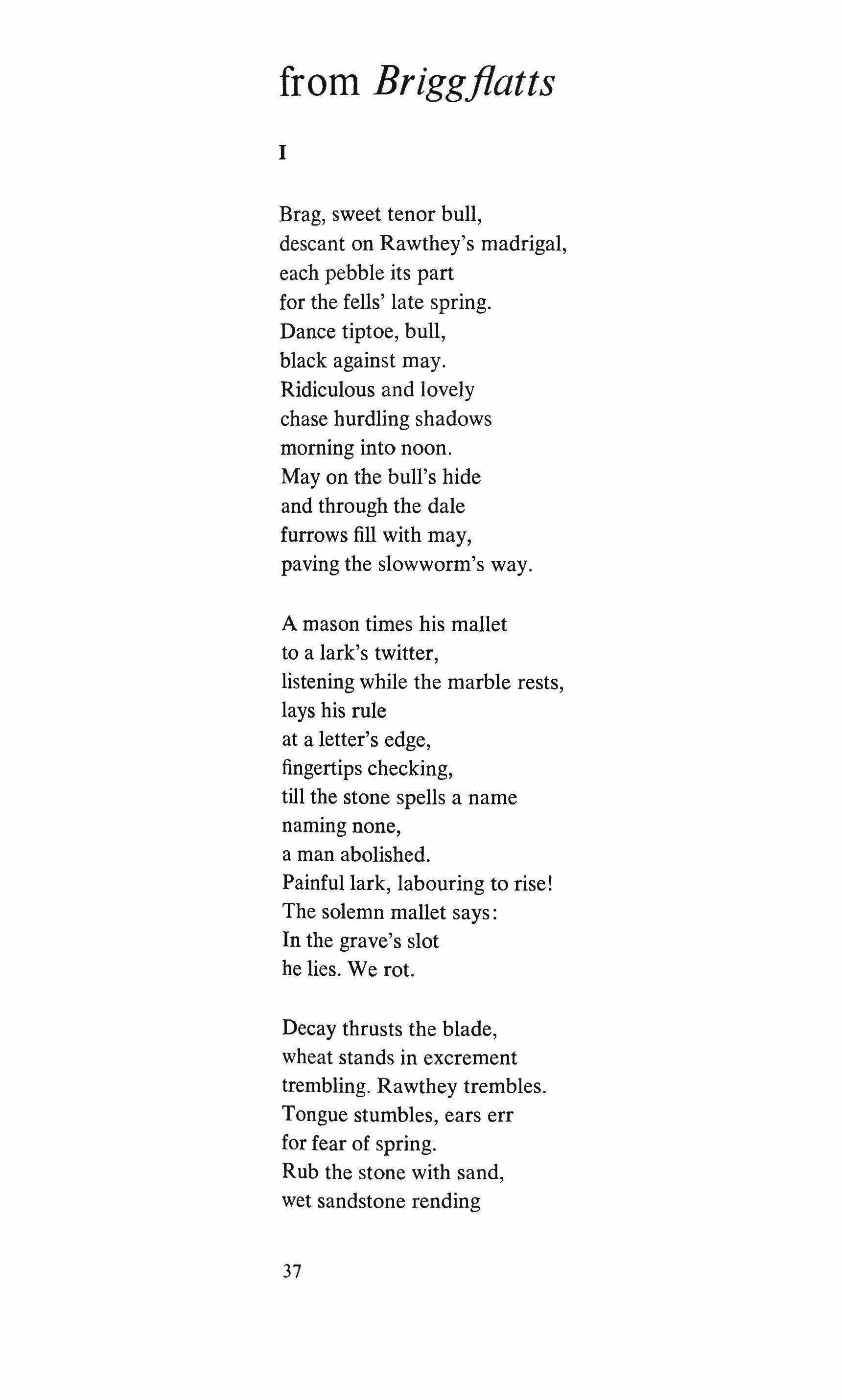
from Briggflatts
I
Brag, sweet tenor bull, descant on Rawthey's madrigal, each pebble its part for the fells' late spring. Dance tiptoe, bull, black against may. Ridiculous and lovely chase hurdling shadows morning into noon. May on the bull's hide and through the dale furrows fill with may, paving the slowworm's way.
A mason times his mallet to a lark's twitter, listening while the marble rests, lays his rule at a letter's edge, fingertips checking, till the stone spells a name naming none, a man abolished.
Painful lark, labouring to rise! The solemn mallet says: In the grave's slot he lies. We rot.
Decay thrusts the blade, wheat stands in excrement trembling. Rawthey trembles. Tongue stumbles, ears err for fear of spring. Rub the stone with sand, wet sandstone rending
37
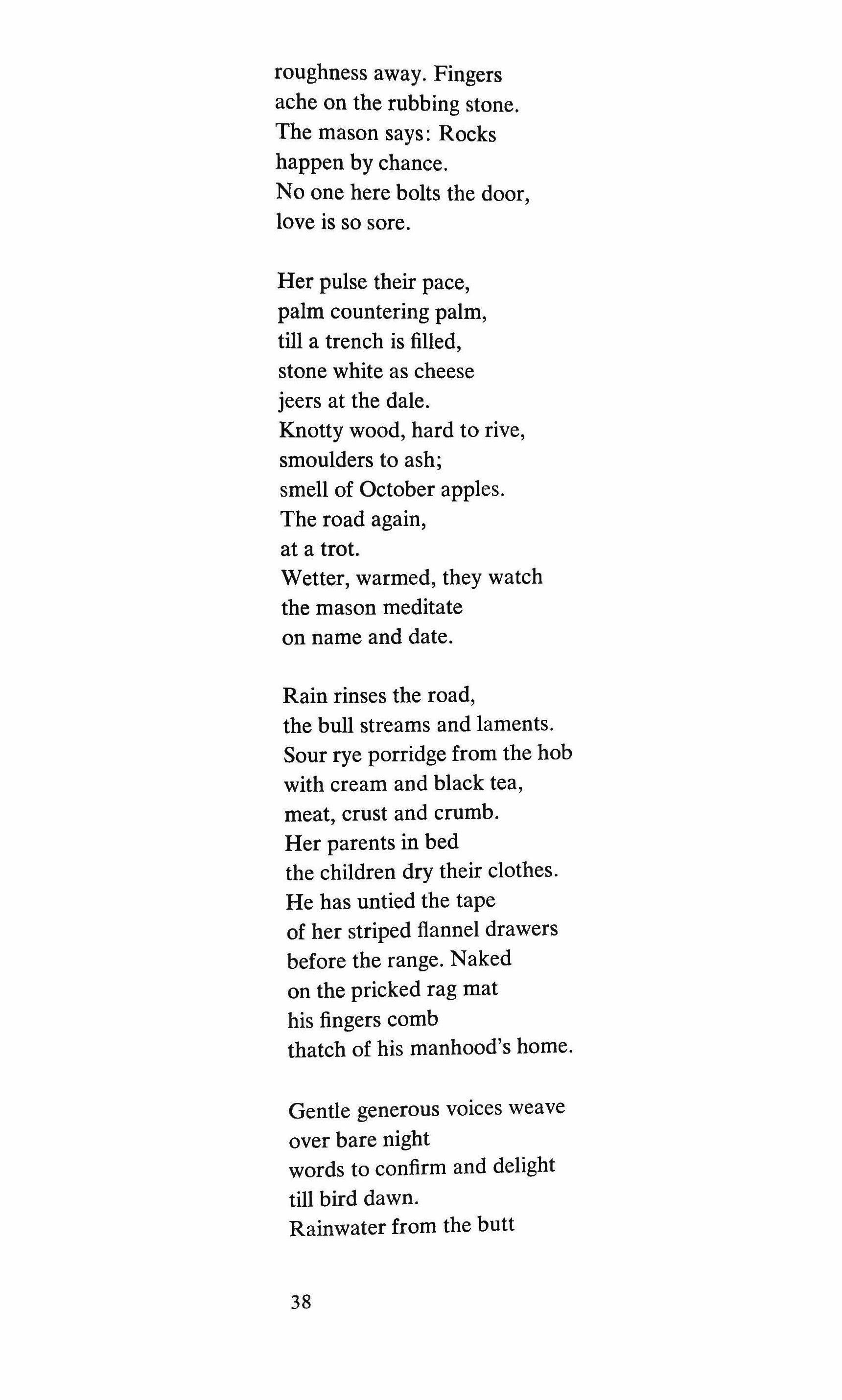
roughness away. Fingers ache on the rubbing stone. The mason says: Rocks happen by chance. No one here bolts the door love is so sore.
Her pulse their pace, palm countering palm, till a trench is filled, stone white as cheese jeers at the dale. Knotty wood, hard to rive, smoulders to ash; smell of October apples. The road again, at a trot.
Wetter, warmed, they watch the mason meditate on name and date.
Rain rinses the road, the bull streams and laments. Sour rye porridge from the hob with cream and black tea, meat, crust and crumb. Her parents in bed the children dry their clothes. He has untied the tape of her striped flannel drawers before the range. Naked on the pricked rag mat his fingers comb thatch of his manhood's home.
Gentle generous voices weave over bare night words to confirm and delight till bird dawn. Rainwater from the butt
38

she fetches and flannel to wash him inch by inch, kissing the pebbles. Shining slowworm part of the marvel. The mason stirs: Words!
Pens are too light. Take a chisel to write.
Stone smooth as skin, cold as the dead they load on a low lorry by night. The moon sits on the fell but it will rain.
Under sacks on the stone two children lie, hear the horse stale, the mason whistle, harness mutter to shaft, felloe to axle squeak, rut thud the rim, crushed grit.
Stocking to stocking, jersey to jersey, head to a hard arm, they kiss under the rain, bruised by their marble bed. In Garsdale, dawn; at Hawes, tea from the can. Rain stops, sacks steam in the sun, they sit up. Copper-wire moustache, sea-reflecting eyes and Baltic plainsong speech declare: By such rocks men killed Bloodaxe.
Fierce blood throbs in his tongue, lean words. Skulls cropped for steel caps
39
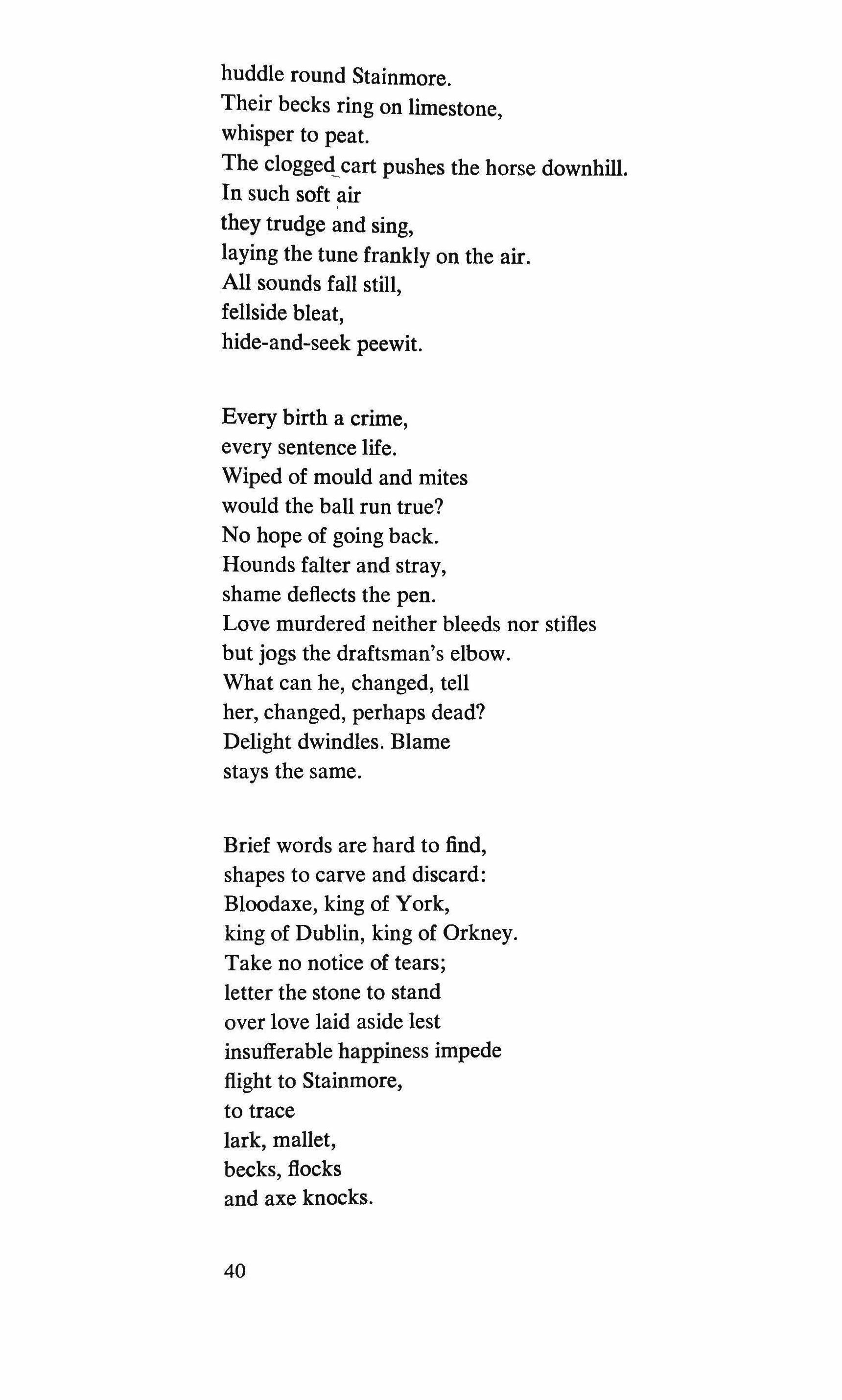
huddle round Stainmore. Their becks ring on limestone, whisper to peat. The clogged cart pushes the horse downhill. In such soft air they trudge and sing, laying the tune frankly on the air. All sounds fall still, fellside bleat, hide-and-seek peewit.
Every birth a crime, every sentence life. Wiped of mould and mites would the ball run true? No hope of going back. Hounds falter and stray, shame deflects the pen. Love murdered neither bleeds nor stifles but jogs the draftsman's elbow. What can he, changed, tell her, changed, perhaps dead? Delight dwindles. Blame stays the same.
Brief words are hard to find, shapes to carve and discard: Bloodaxe, king of York, king of Dublin, king of Orkney. Take no notice of tears; letter the stone to stand over love laid aside lest insufferable happiness impede flight to Stainmore, to trace lark, mallet, becks, flocks and axe knocks.
40
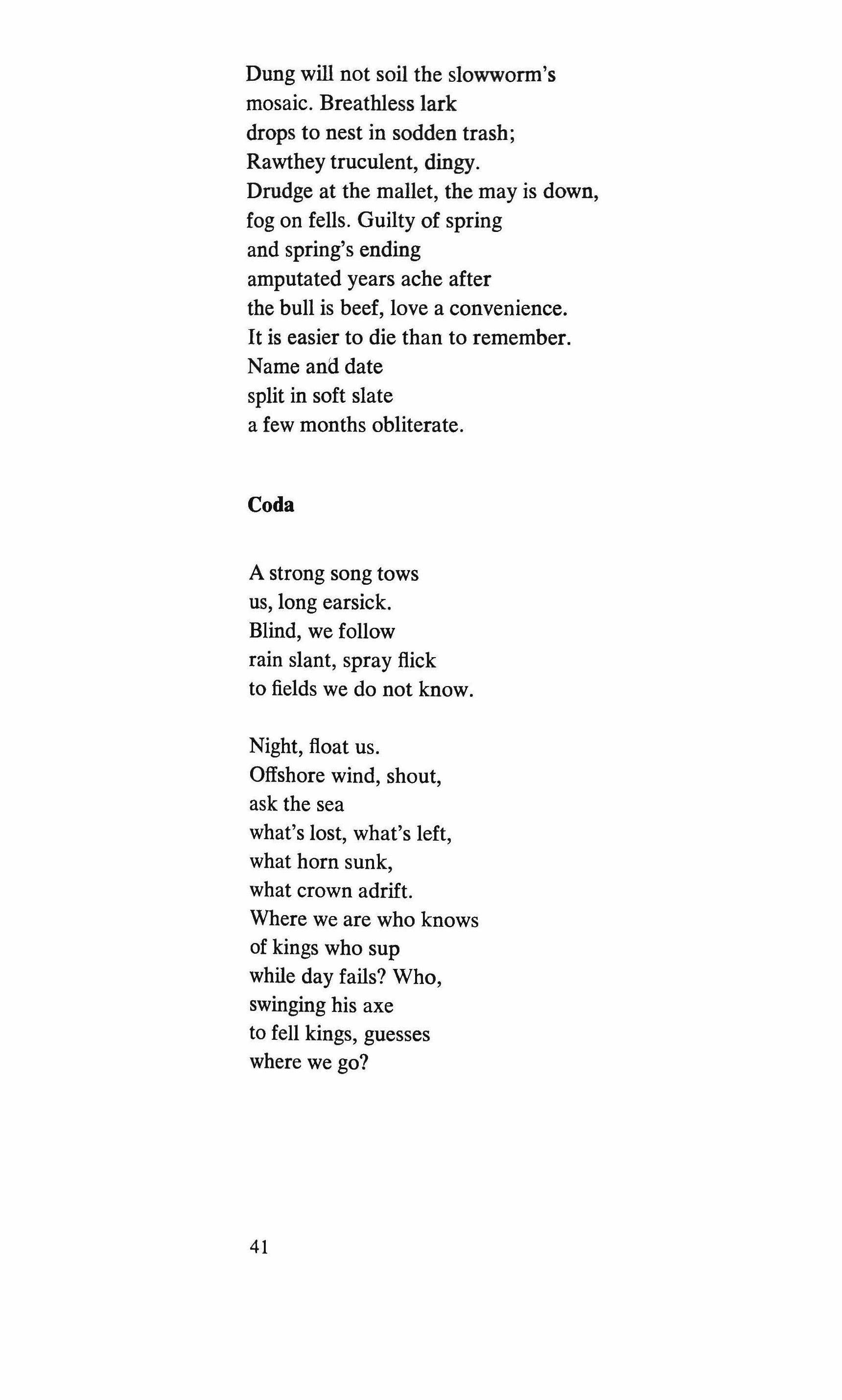
Dung will not soil the slowworm's mosaic. Breathless lark drops to nest in sodden trash; Rawthey truculent, dingy. Drudge at the mallet, the may is down, fog on fells. Guilty of spring and spring's ending amputated years ache after the bull is beef, love a convenience. It is easier to die than to remember. Name and date split in soft slate a few months obliterate.
Coda
A strong song tows us, long earsick. Blind, we follow rain slant, spray flick to fields we do not know.
Night, float us. Offshore wind, shout, ask the sea what's lost, what's left, what horn sunk, what crown adrift. Where we are who knows of kings who sup while day fails? Who, swinging his axe to fell kings, guesses where we go?
41
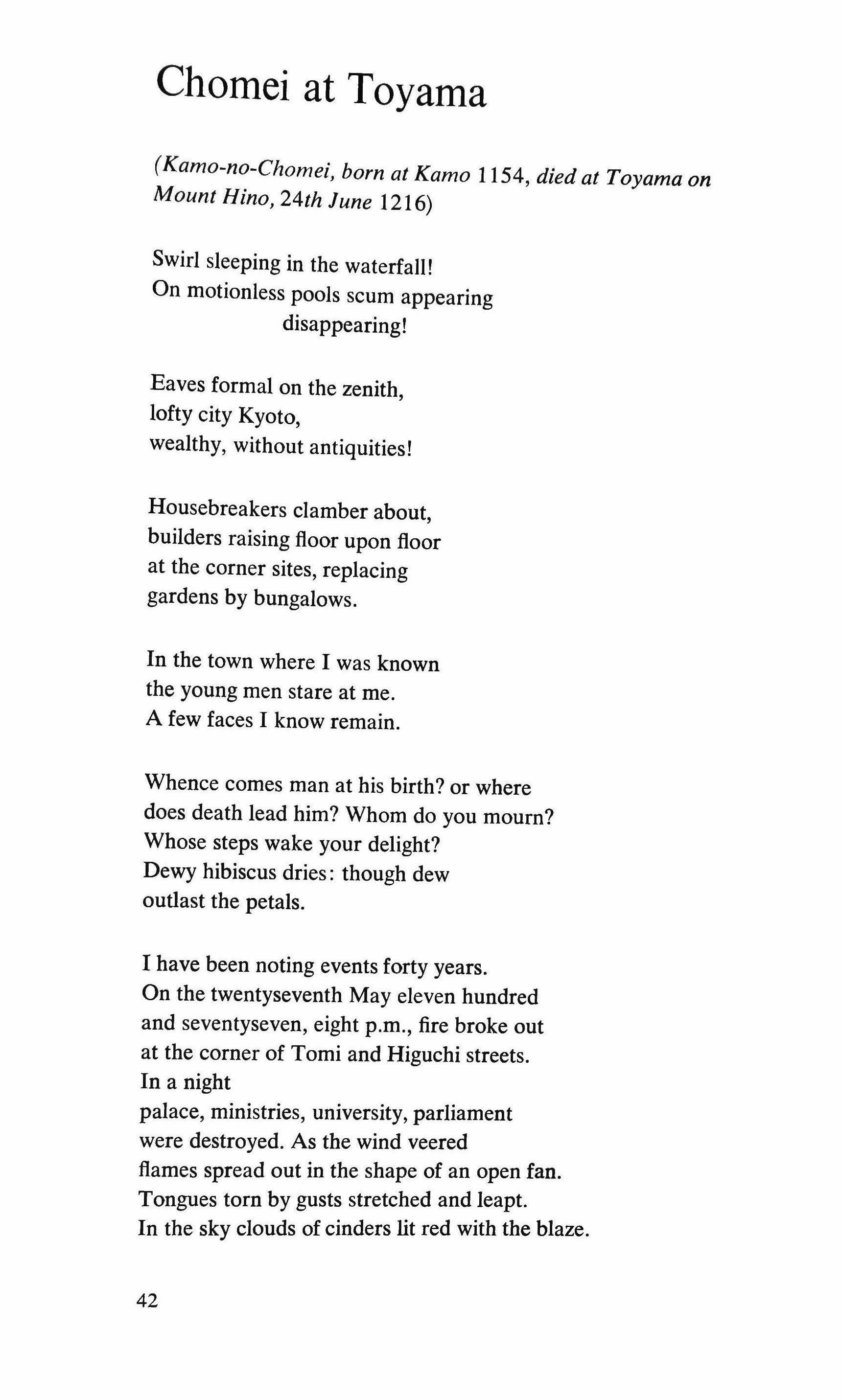
Chomei at Toyama
(Kamo-no-Chomei, born at Kamo 1154, died at Toyama on Mount Hino, 24th June 1216)
Swirl sleeping in the waterfall! On motionless pools scum appearing disappearing!
Eaves formal on the zenith, lofty city Kyoto, wealthy, without antiquities!
Housebreakers clamber about, builders raising floor upon floor at the corner sites, replacing gardens by bungalows.
In the town where I was known the young men stare at me. A few faces I know remain.
Whence comes man at his birth? or where does death lead him? Whom do you mourn? Whose steps wake your delight? Dewy hibiscus dries: though dew outlast the petals.
I have been noting events forty years. On the twentyseventh May eleven hundred and seventyseven, eight p.m., fire broke out at the corner of Tomi and Higuchi streets. In a night palace, ministries, university, parliament were destroyed. As the wind veered flames spread out in the shape of an open fan. Tongues torn by gusts stretched and leapt. In the sky clouds of cinders lit red with the blaze.
42

Some choked, some burned, some barely escaped. Sixteen great officials lost houses and very many poor. A third of the city burned; several thousands died; and of beasts, limitless numbers.
Men are fools to invest in real estate.
Three years less three days later a wind starting near the outer boulevard broke a path a quarter mile across to Sixth Avenue. Not a house stood. Some were felled whole, some in splinters; some had left great beams upright in the ground and round about lay rooves scattered where the wind flung them. Flocks of furniture in the air, everything flat fluttered like dead leaves. A dust like fog or smoke, you could hear nothing for the roar, buiera infernal!
Lamed some, wounded some. This cyclone turned southwest.
Massacre without cause.
Portent?
The same year thunderbolted change of capital, fixed here, Kyoto, for ages. Nothing compelled the change nor was it an easy matter but the grumbling was disproportionate. We moved, those with jobs or wanting jobs or hangers on of the rest, in haste haste fretting to be the first. Rooftrees overhanging empty rooms; dismounted: floating down the river. The soil returned to heath.
43
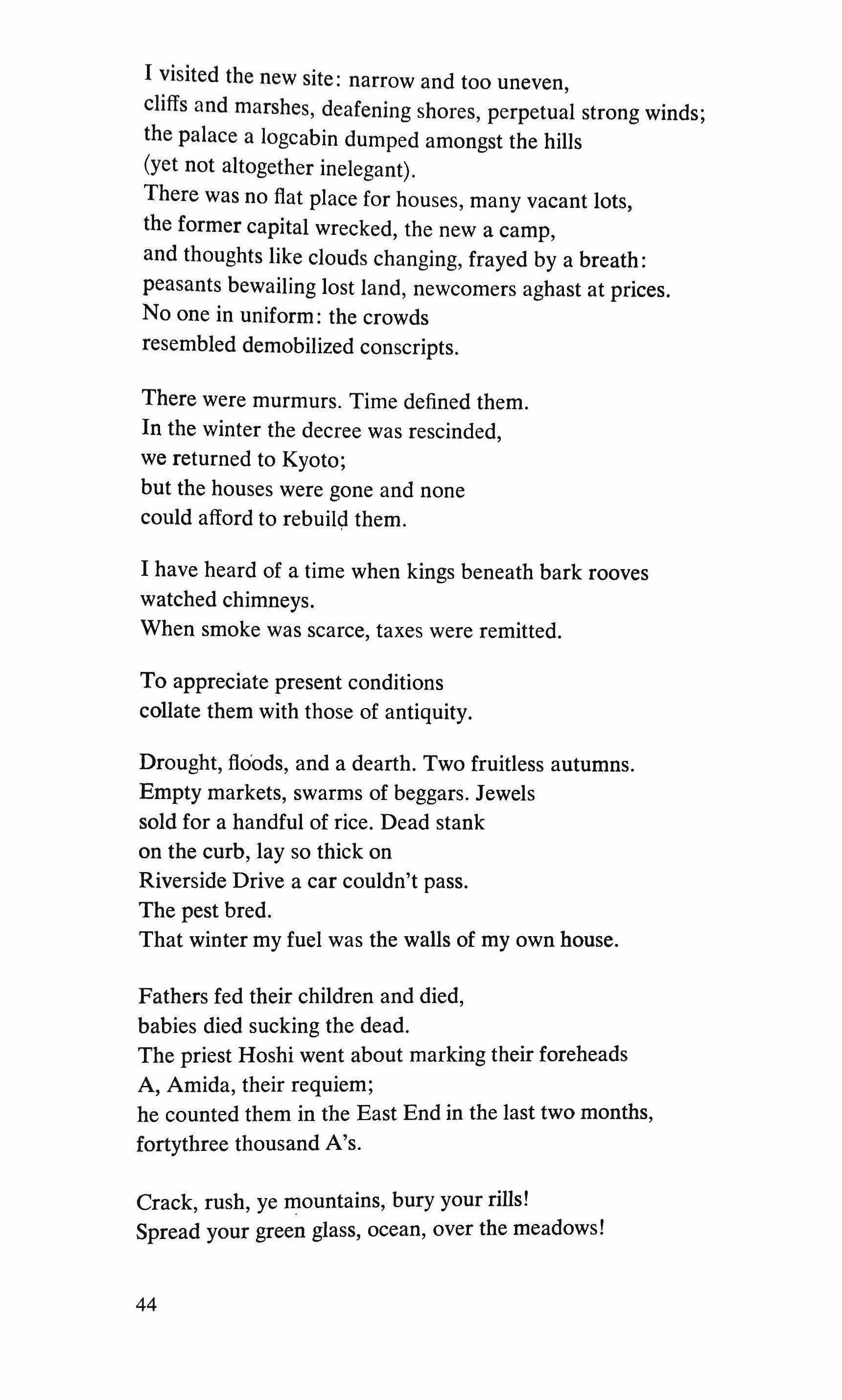
I visited the new site: narrow and too uneven, cliffs and marshes, deafening shores, perpetual strong winds; the palace a logcabin dumped amongst the hills (yet not altogether inelegant).
There was no flat place for houses, many vacant lots, the former capital wrecked, the new a camp, and thoughts like clouds changing, frayed by a breath: peasants bewailing lost land, newcomers aghast at prices. No one in uniform: the crowds resembled demobilized conscripts.
There were murmurs. Time defined them. In the winter the decree was rescinded, we returned to Kyoto; but the houses were gone and none could afford to rebuild them.
I have heard of a time when kings beneath bark rooves watched chimneys. When smoke was scarce, taxes were remitted.
To appreciate present conditions collate them with those of antiquity.
Drought, floods, and a dearth. Two fruitless autumns. Empty markets, swarms of beggars. Jewels sold for a handful of rice. Dead stank on the curb, lay so thick on Riverside Drive a car couldn't pass. The pest bred.
That winter my fuel was the walls of my own house.
Fathers fed their children and died, babies died sucking the dead. The priest Hoshi went about marking their foreheads
A, Amida, their requiem; he counted them in the East End in the last two months, fortythree thousand A's.
Crack, rush, ye mountains, bury your rills! Spread your green glass, ocean, over the meadows!
44
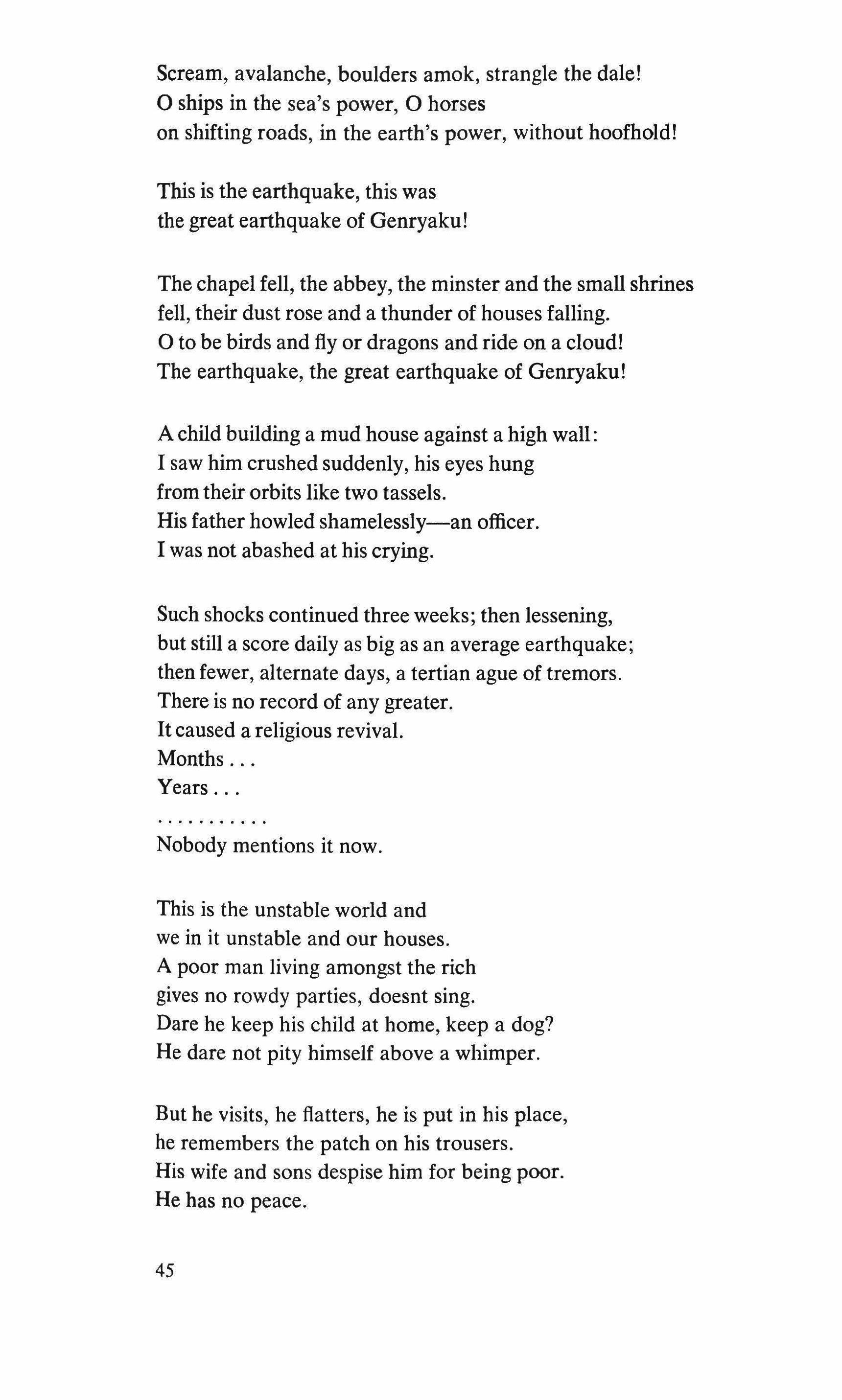
Scream, avalanche, boulders amok, strangle the dale!
o ships in the sea's power, 0 horses on shifting roads, in the earth's power, without hoofhold!
This is the earthquake, this was the great earthquake of Genryaku!
The chapel fell, the abbey, the minster and the small shrines fell, their dust rose and a thunder of houses falling. o to be birds and fly or dragons and ride on a cloud! The earthquake, the great earthquake of Genryaku!
A child building a mud house against a high wall: I saw him crushed suddenly, his eyes hung from their orbits like two tassels. His father howled shamelessly-an officer. I was not abashed at his crying.
Such shocks continued three weeks; then lessening, but still a score daily as big as an average earthquake; then fewer, alternate days, a tertian ague of tremors. There is no record of any greater. It caused a religious revival.
Months Years
Nobody mentions it now.
This is the unstable world and we in it unstable and our houses.
A poor man living amongst the rich gives no rowdy parties, doesnt sing. Dare he keep his child at home, keep a dog? He dare not pity himself above a whimper.
But he visits, he flatters, he is put in his place, he remembers the patch on his trousers. His wife and sons despise him for being poor. He has no peace.
45
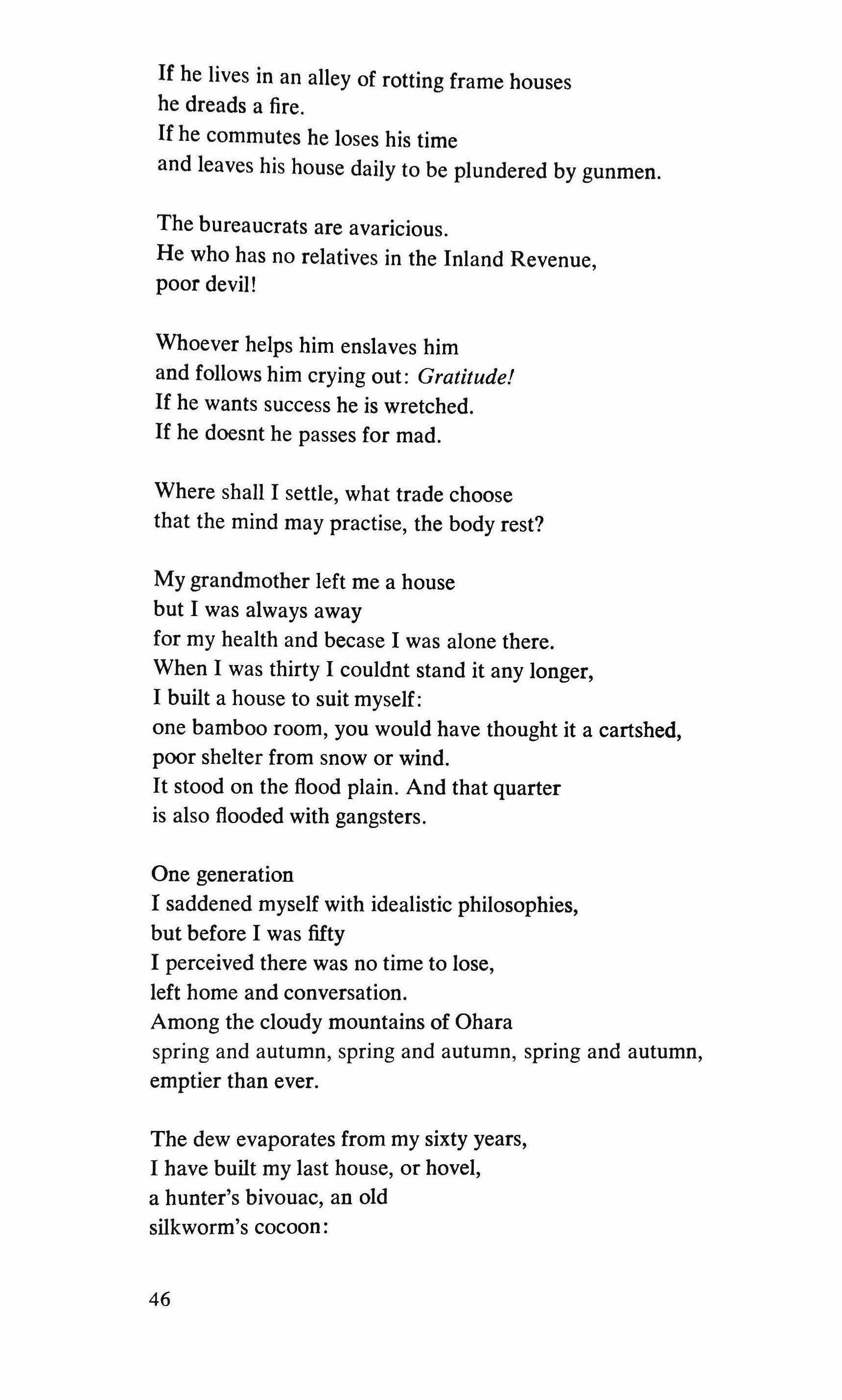
If he lives in an alley of rotting frame houses he dreads a fire. If he commutes he loses his time and leaves his house daily to be plundered by gunmen.
The bureaucrats are avaricious. He who has no relatives in the Inland Revenue, poor devil!
Whoever helps him enslaves him and follows him crying out: Gratitude! If he wants success he is wretched. If he doesnt he passes for mad.
Where shall I settle, what trade choose that the mind may practise, the body rest?
My grandmother left me a house but I was always away for my health and becase I was alone there. When I was thirty I couldnt stand it any longer, I built a house to suit myself: one bamboo room, you would have thought it a cartshed, poor shelter from snow or wind. It stood on the flood plain. And that quarter is also flooded with gangsters.
One generation
I saddened myself with idealistic philosophies, but before I was fifty I perceived there was no time to lose, left home and conversation.
Among the cloudy mountains of Ohara spring and autumn, spring and autumn, spring and autumn, emptier than ever.
The dew evaporates from my sixty years, I have built my last house, or hovel, a hunter's bivouac, an old silkworm's cocoon:
46

ten feet by ten, seven high: and I, reckoning it a lodging not a dwelling, omitted the usual foundation ceremony.
I have filled the frames with clay, set hinges at the corners: easy to take it down and carry it away when I get bored with this place. Two barrowloads of junk and the cost of a man to shove the barrow, no trouble at all.
Since I have trodden Hino mountain noon has beaten through the awning over my bamboo balcony, evening shone on Amida.
I have shelved my books above the window, lute and mandolin near at hand, piled bracken and a little straw for bedding, a smooth desk where the light falls, stove for bramblewood.
I have gathered stones, fitted stones for a cistern, laid bamboo pipes. No woodstack, wood enough in the thicket.
Toyama, snug in the creepers!
Toyama, deep in the dense gully, open westward whence the dead ride out of Eden squatting on blue clouds of wistaria.
(Its scent drifts west to Amida.)
Summer? Cuckoo's Follow, follow-to harvest Purgatory hill! Fall? The nightgrasshopper will shrill Fickle life!
Snow will thicken on the doorstep, melt like a drift of sins. No friend to break silence, no one will be shocked if I neglect the rite. There's a Lent of commandments kept where there's no way to break them.
47

A ripple of white water after a boat shining water after the boats Mansami saw rowing at daybreak at Okinoya.
Between the maple leaf and the canefiower murmurs the afternoon-Po Lo-tien saying goodbye on the verge of Jinyo river. (I am playing scales on my mandolin.)
Be limber, my fingers, I am going to play Autumn Wind to the pines, I am going to play Hastening Brook to the water. I am no player but there's nobody listening, 1 do it for my own amusement.
Sixteen and sixty, I and the gamekeeper's boy, one zest and equal, chewing tsubana buds, one zest and equal, persimmon, pricklypear, ears of sweetcorn pilfered from Valley Farm.
The view from the summit: sky bent over Kyoto, picnic villages, Fushimi and Toba: a very economical way of enjoying yourself. Thought runs along the crest, climbs Sumiyama; beyond Kasatori it visits the great church, goes on pilgrimage to Ishiyama (no need to foot it!) or the graves of poets, of Semimaru who said: Somehow or other we scuttle through a lifetime. Somehow or other neither palace nor straw-hut is quite satisfactory.
Not emptyhanded, with cherryblossom, with red maple as the season gives it to decorate my Buddha or offer a sprig at a time to chancecomers, home!
A fine moonlit night, 1 sit at the window with a headful of old verses.
48
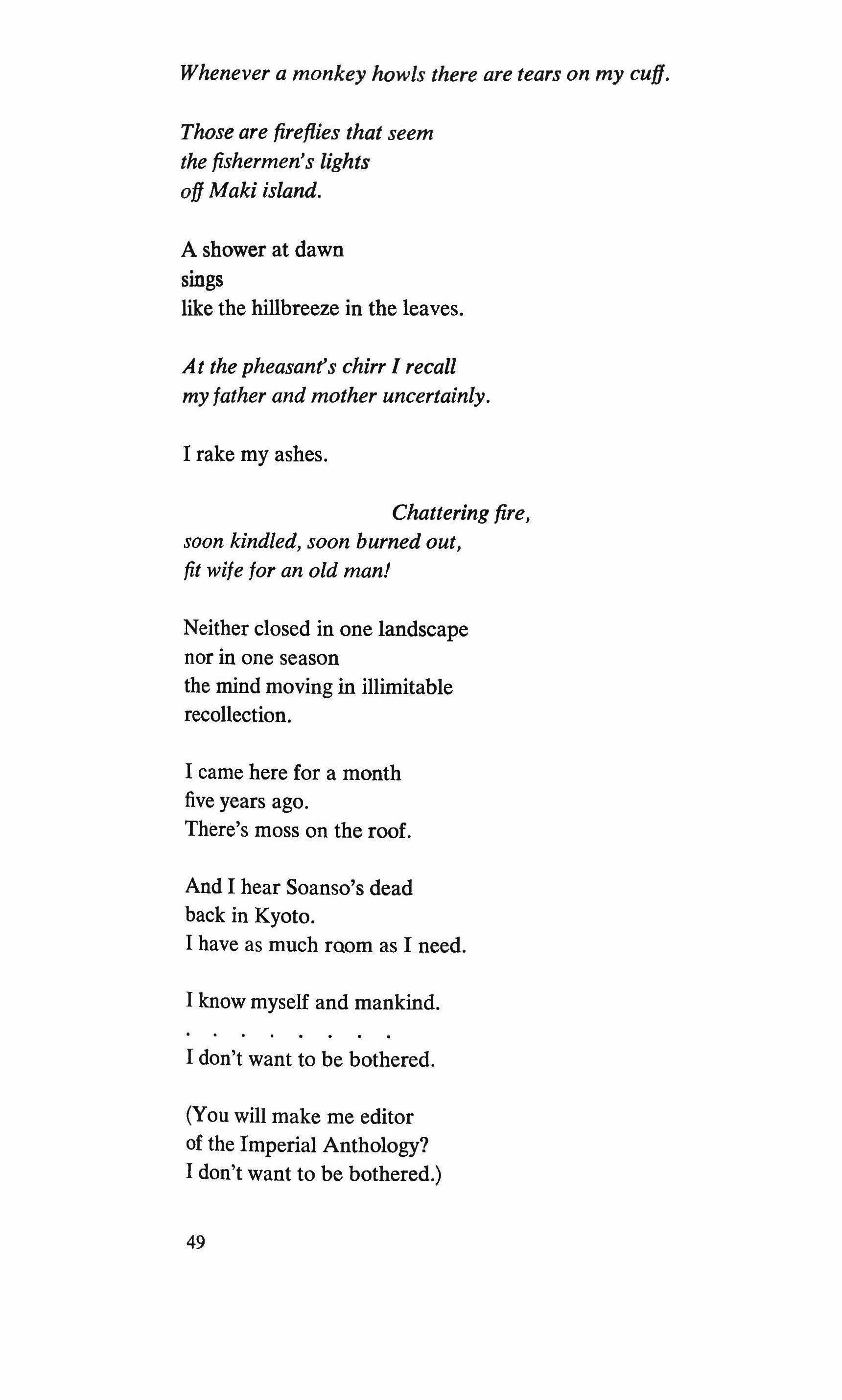
Whenever a monkey howls there are tears on my cuD.
Those are fireflies that seem the fishermen's lights off Maki island.
A shower at dawn sings like the hillbreeze in the leaves.
At the pheasant's chirr I recall my father and mother uncertainly.
I rake my ashes.
Chattering fire, soon kindled, soon burned out, fit wife for an old man!
Neither closed in one landscape nor in one season the mind moving in illimitable recollection.
I came here for a month five years ago. There's moss on the roof.
And I hear Soanso's dead back in Kyoto.
I have as much room as I need.
I know myself and mankind.
I don't want to be bothered.
(You will make me editor of the Imperial Anthology? I don't want to be bothered.)
49
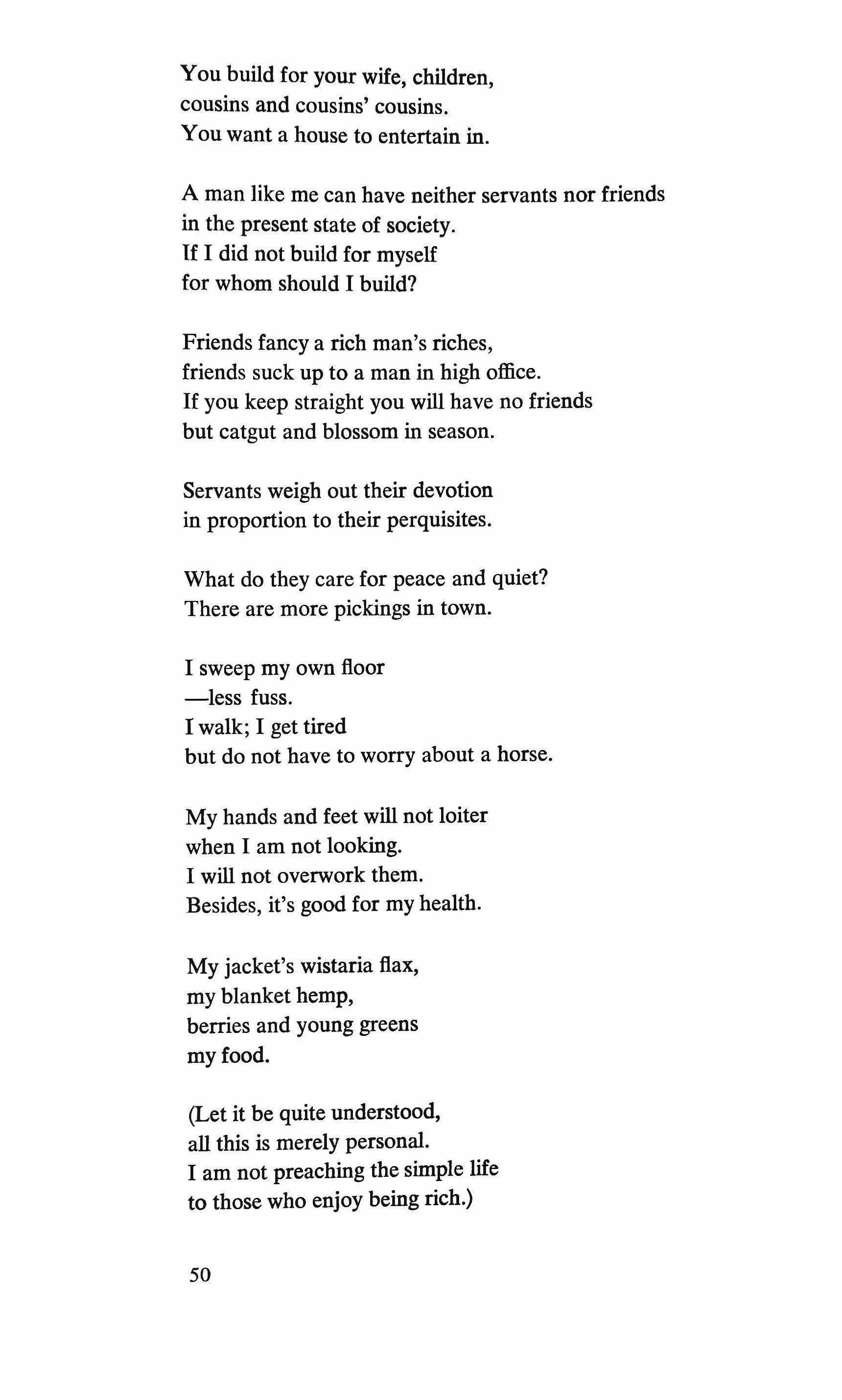
You build for your wife, children, cousins and cousins' cousins. You want a house to entertain in.
A man like me can have neither servants nor friends in the present state of society. If I did not build for myself for whom should I build?
Friends fancy a rich man's riches, friends suck up to a man in high office. If you keep straight you will have no friends but catgut and blossom in season.
Servants weigh out their devotion in proportion to their perquisites.
What do they care for peace and quiet? There are more pickings in town.
I sweep my own floor -less fuss.
I walk; I get tired but do not have to worry about a horse.
My hands and feet will not loiter when I am not looking. I will not overwork them. Besides, it's good for my health.
My jacket's wistaria flax, my blanket hemp, berries and young greens my food.
(Let it be quite understood, all this is merely personal. I am not preaching the simple life to those who enjoy being rich.)
50

1 am shifting rivermist, not to be trusted. 1 do not ask anything extraordinary of myself. 1 like a nap after dinner and to see the seasons come round in good order.
Hankering, vexation and apathy, that's the run of the world. Hankering, vexation and apathy, keeping a carriage wont cure it.
Keeping a man in livery wont cure it. Keeping a private fortress wont cure it. These things satisfy no craving, Hankering, vexation and apathy
1 am out of place in the capital, people take me for a beggar, as you would be out of place in this sort of life, you are so-I regret it-so welded to your vulgarity.
The moonshadow merges with darkness on the clifIpath, a tricky turn near ahead.
Oh! There's nothing to complain about. Buddha says: 'None of the world is good.' 1 am fond of my hut
I have renounced the world; have a saintly appearance.
1 do not enjoy being poor, I've a passionate nature. My tongue clacked a few prayers.
51

CHARLES TOMLINSON
Paring the apple
There are portraits and still-lives.
And there is paring the apple.
And then? Paring it slowly, From under cool-yellow Cold-white emerging. And ?
The spring of concentric peel
Unwinding off white, The blade hidden, dividing.
There are portraits and still-lives And the first, because "human" Does not excell the second, and Neither is less weighted With a human gesture, than paring the apple With a human stillness.
The cool blade
Severs between coolness, apple-rind Compelling a recognition.
52
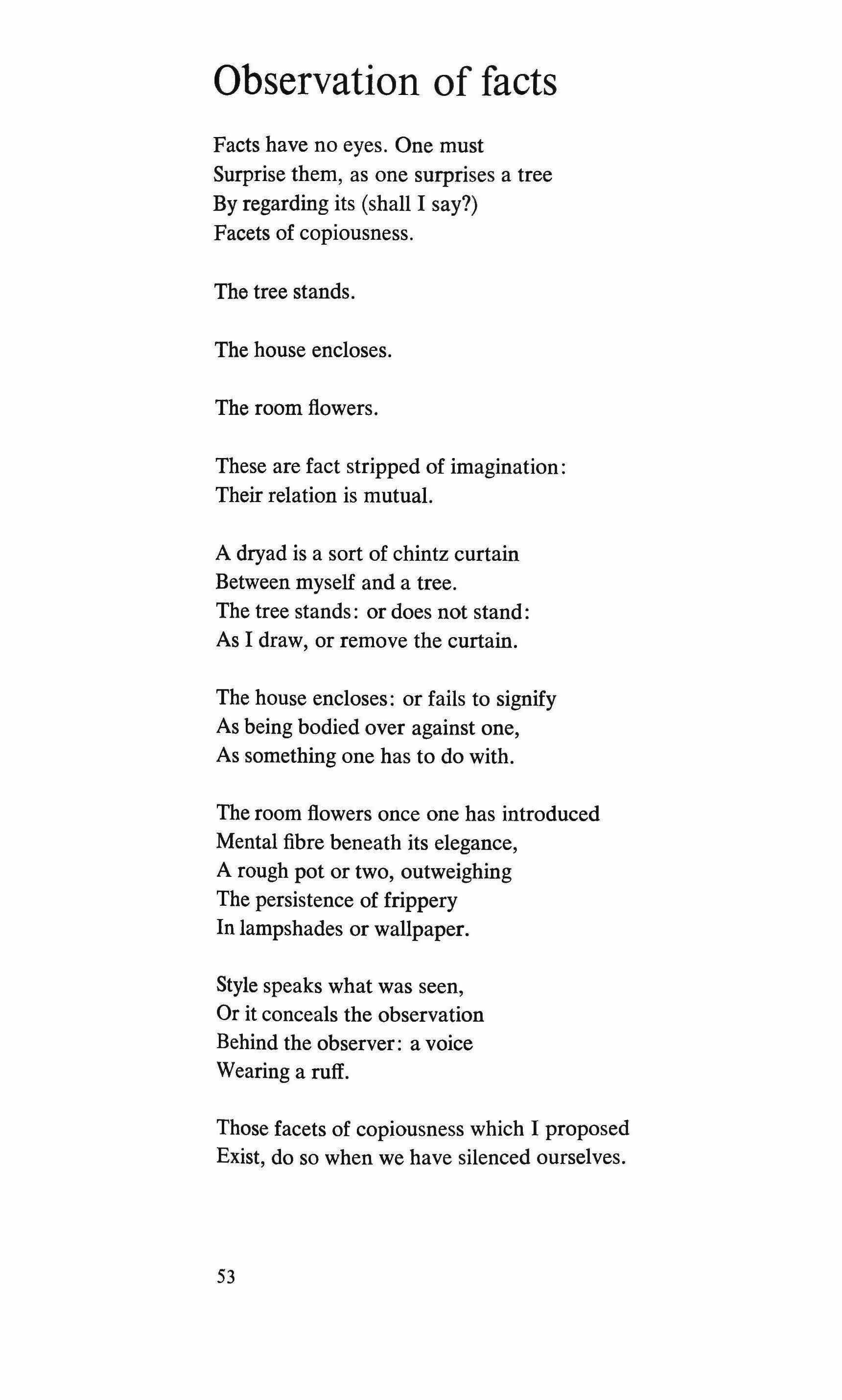
Observation of facts
Facts have no eyes. One must Surprise them, as one surprises a tree By regarding its (shall I say?) Facets of copiousness.
The tree stands.
The house encloses.
The room flowers.
These are fact stripped of imagination: Their relation is mutual.
A dryad is a sort of chintz curtain Between myself and a tree.
The tree stands: or does not stand: As I draw, or remove the curtain.
The house encloses: or fails to signify As being bodied over against one, As something one has to do with.
The room flowers once one has introduced Mental fibre beneath its elegance, A rough pot or two, outweighing The persistence of frippery In lampshades or wallpaper.
Style speaks what was seen, Or it conceals the observation Behind the observer: a voice Wearing a ruff.
Those facets of copiousness which I proposed Exist, do so when we have silenced ourselves.
53

Up at La Serra
THE shadow ran before it lengthening and a wave went over. Distance did not obscure the machine of nature: you could watch it squander and recompose itself all day, the shadow-run the sway of the necessity down there at the cliff-base crushing white from blue. Come in by the arch under the campanile parrocchiale and the exasperation of the water followed you, its Soldi, soldi unpicking the hill-top peace insistently. He knew, at twenty all the deprivations such a place stored for the man who had no more to offer than a sheaf of verse in the style of Quasimodo. Came the moment, he would tell it in a poem without rancour, a lucid testament above his name Paolo
Bertolani -Ciao, Paolo! -Ciao
Giorgino!
54

He would put them all in itGiorgino going over the hill to look for labour; the grinder of knives and scissors waiting to come up, until someone would hoist his wheel on to a back, already hooped to take it, so you thought the weight must crack the curvature. And then: Beppino and Beppino friends who had in common nothing except their names and friendship; and the sister of the one who played the accordion and under all the Soldi, soldi, sacra conversazione del maredella madre. Sometimes the men had an air of stupefaction: La Madre: it was the women there won in a truceless enmity. At home a sepia-green Madonna di Foligno shared the wall with the October calendarLenin looked out of it, Mao blessing the tractors and you told
55

the visitors:
Weare not communists although we call ourselves communists we are what you English would call socialists. He believed that God was a hypothesis, that the party would bring in a synthesis, that he would edit the local paper for them, or perhaps go northward to Milan; or would he grow as the others had-son to the putana-madonna in the curse, chafed by the maternal knot and by the dream of faithlessness, uncalloused hands, lace, white at the windows of the sailors' brothels in the port five miles away? Soldisoldisome worked at the naval yards and some, like him were left between the time the olives turned from green to black and the harvest of the grapes, idle except for hacking wood. Those with an acre of good land had vines, had wine and self-respect. Some carried down crickets to the garden of the mad Englishwoman
56
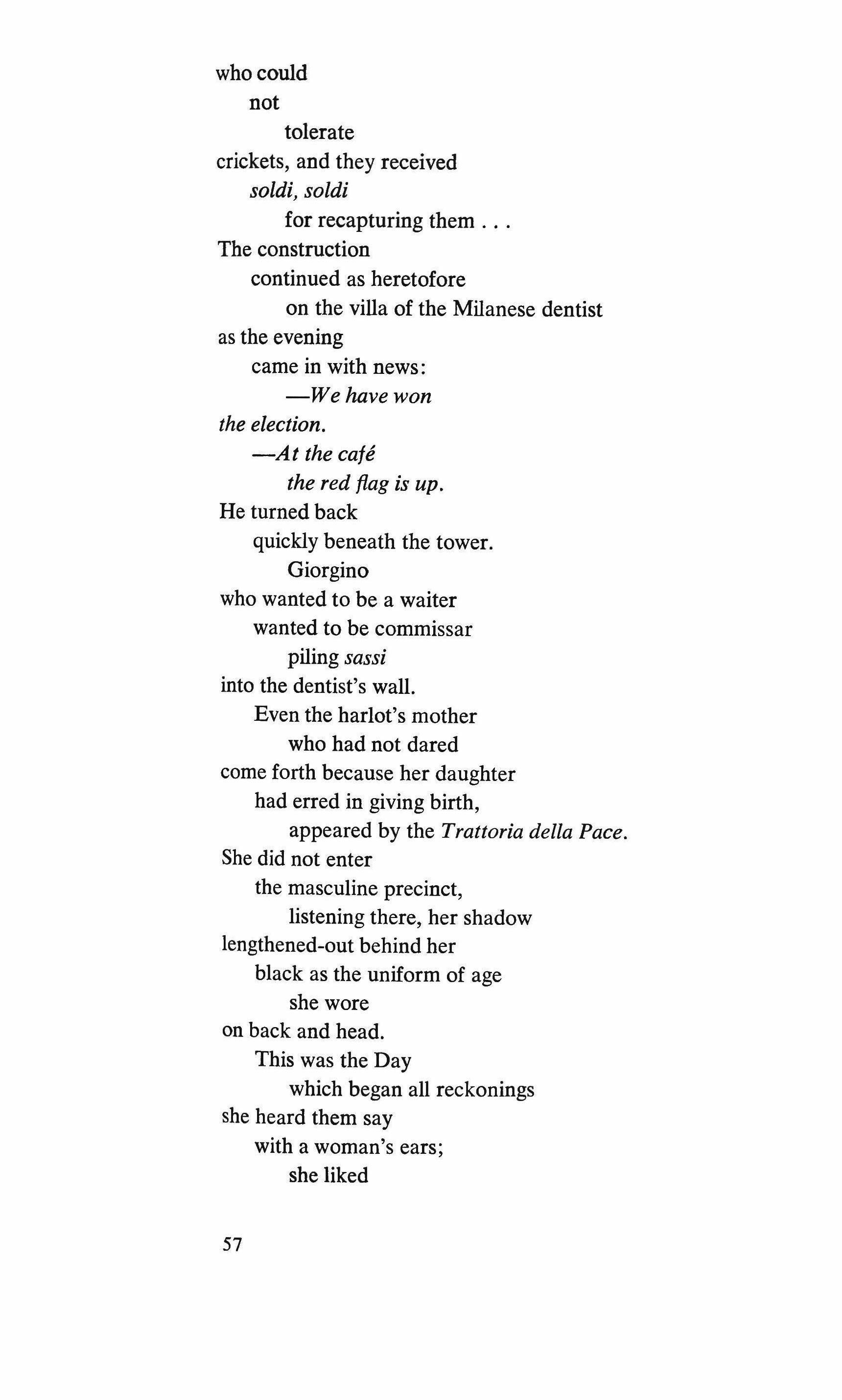
who could not tolerate crickets, and they received soldi, soldi for recapturing them The construction continued as heretofore on the villa of the Milanese dentist as the evening came in with news:
-We have won the election.
-At the caie the red flag is up. He turned back quickly beneath the tower.
Giorgino
who wanted to be a waiter wanted to be commissar piling sassi into the dentist's wall. Even the harlot's mother who had not dared come forth because her daughter had erred in giving birth, appeared by the Trattoria della Pace. She did not enter the masculine precinct, listening there, her shadow lengthened-out behind her black as the uniform of age she wore on back and head.
This was the Day which began all reckonings she heard them say with a woman's ears; she liked
57
the music from the wireless. The padre pulled at his unheeded angelus and the Day went down behind the town in the bay below where-come the seasonthey would be preparing with striped umbrellas, for the stranieri and milanesitreason so readily compounded by the promiscuous stir on the iridescent sliding water. He had sought the clear air of the cliff.
-Salve, Giorgino -Salve Paolo, have you heard that we have won the election? -I am writing a poem about it: it will begin here, with the cliff and with the sea following its morning shadow in.
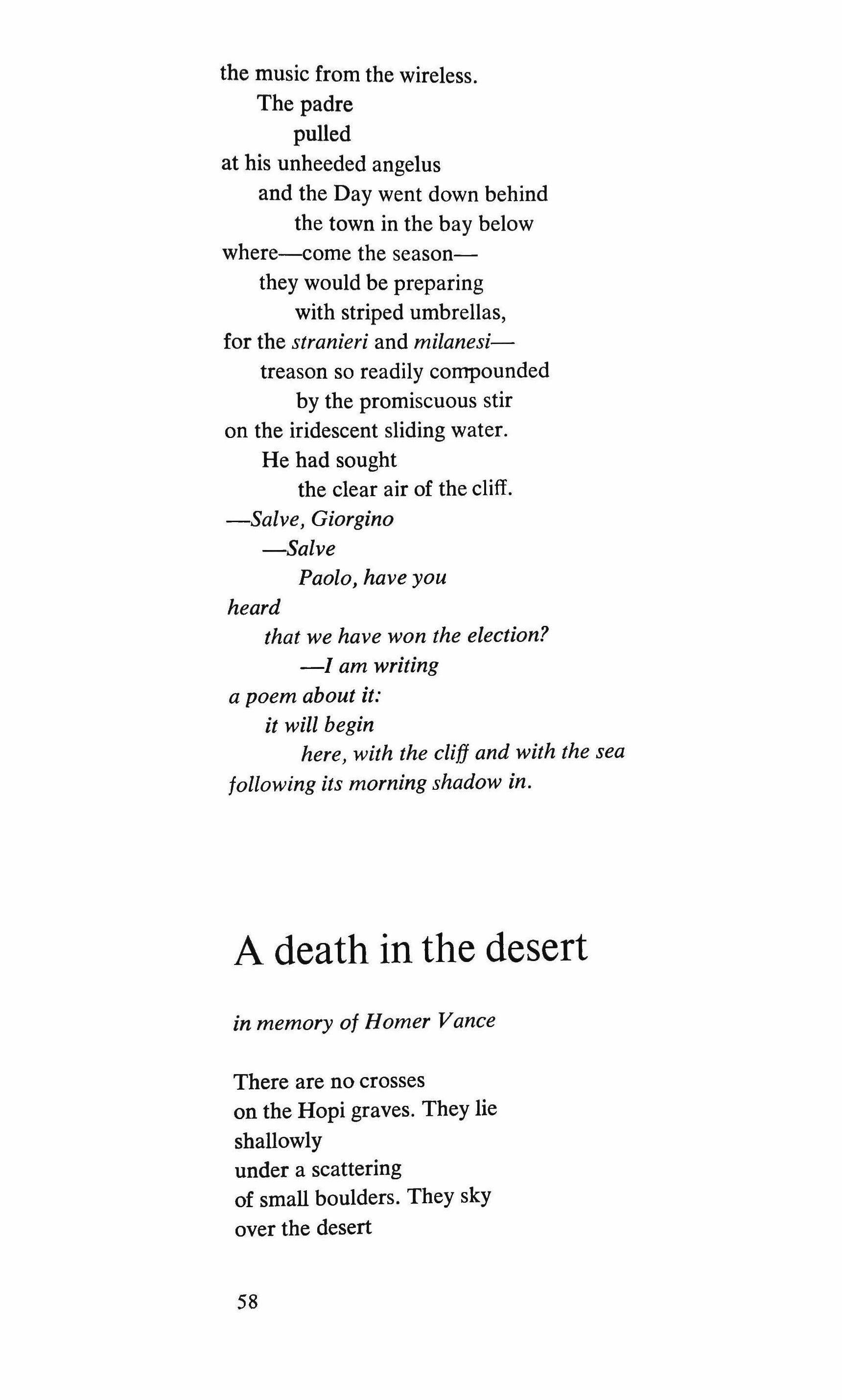
A
death in the desert
in memory of Homer Vance
There are no crosses on the Hopi graves. They lie shallowly under a scattering of small boulders. They sky over the desert
58

with its sand-grain stars and the immense equality between desert and desert sky, seem a scope and ritual enough to stem death and to be its equal.
'Homer is the name,' said the old Hopi doll-maker. I met him in summer. He was dead when I came back that autumn. He had sat like an Olympian in his cool room on the rock-roof of the world, beyond the snatch of circumstance and was to die beating a burro out of his corn-patch.
And nobody climbs the dry collapsing ledges down to the place to stand in solitary, sharpened reflection save for that swaying moon-face.
Somebody finding nobody there found gold also: gold gone, he (stark in his own redundancy) must needs go too and here, sun-warped and riddled by moon, decays his house which nobody occupies.
59

Las Trampas U.S.A.
for Robert and Priscilla Bunker
I go through hollyhocks in a dry garden, up to the house, knock, then ask in English for the key to Las Trampas church. The old woman says in Spanish: I do not speak English so I say: Where is the church key in Spanish. -You see those three men working: you ask them. She goes in, I go on preparing to ask them in Spanish: Hi, they say in American. Hello I say and ask them in English where is the key to the church and they say: He has it gesturing to a fourth man working hoeing a corn-field nearby, and to him (in Spanish): Where is the church key? And he: I have it.-O.K.
60
they say in Spanish-American: You bring it (and to me in English) He'll bring it. You wait for him by the church door. Thank you, I say and they reply in American You're welcome. I go once more and await in shadow the key: he who brings it is not he of the hoe, but one of the three men working, who with a Castilian grace ushers me in to this place of coolness out of the August sun.

Mr. Brodsky
I had heard before, of an American who would have preferred to be an Indian; but not until Mr. Brodsky, of one whose professed and long pondered-on passion was to become a Scot, who even sent for haggis and oatcakes across continent.
61

Having read him in Cambridge English a verse or two from MacDiarmid, I was invited to repeat the reading before a Burns Night Gathering where the Balmoral Pipers of Albuquerque would play in the haggis out of its New York tin.
Of course, I said No. No. I could not go and then
half-regretted I had not been. But to console and cure the wish, came Mr. Brodsky, bringing his pipes and played until the immense, distended bladder of leather seemed it could barely contain its watertears (idle tears) for the bridal of Annie Laurie and Morton J. Brodsky. A bagpipe in a dwelling is a resonant instrument and there he stood lost in the gorse the heather or whatever six thousand miles and more from the infection's source, in our neo-New Mexican parlour where I had heard before of an
American who would have preferred to be merely an Indian
62
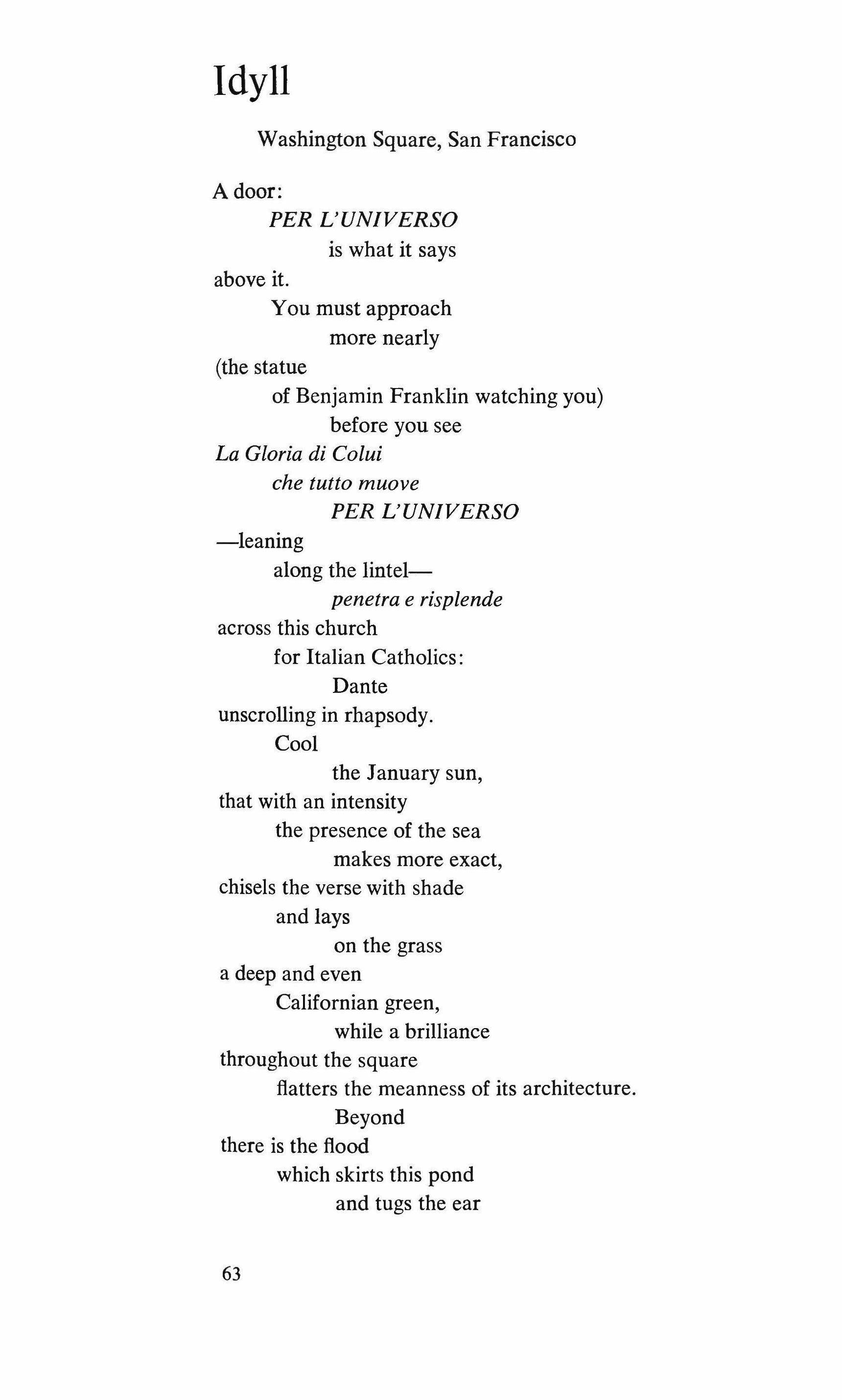
Washington Square, San Francisco
A door:
PER L'UNIVERSO is what it says above it.
You must approach more nearly (the statue of Benjamin Franklin watching you) before you see La Gloria di Colui che tutto muove
PER L'UNIVERSO -leaning along the lintelpenetra e risplende across this church for Italian Catholics: Dante unscrolling in rhapsody. Cool the January sun, that with an intensity the presence of the sea makes more exact, chisels the verse with shade and lays on the grass a deep and even Californian green, while a brilliance throughout the square flatters the meanness of its architecture. Beyond there is the flood which skirts this pond and tugs the ear
Idyll
63
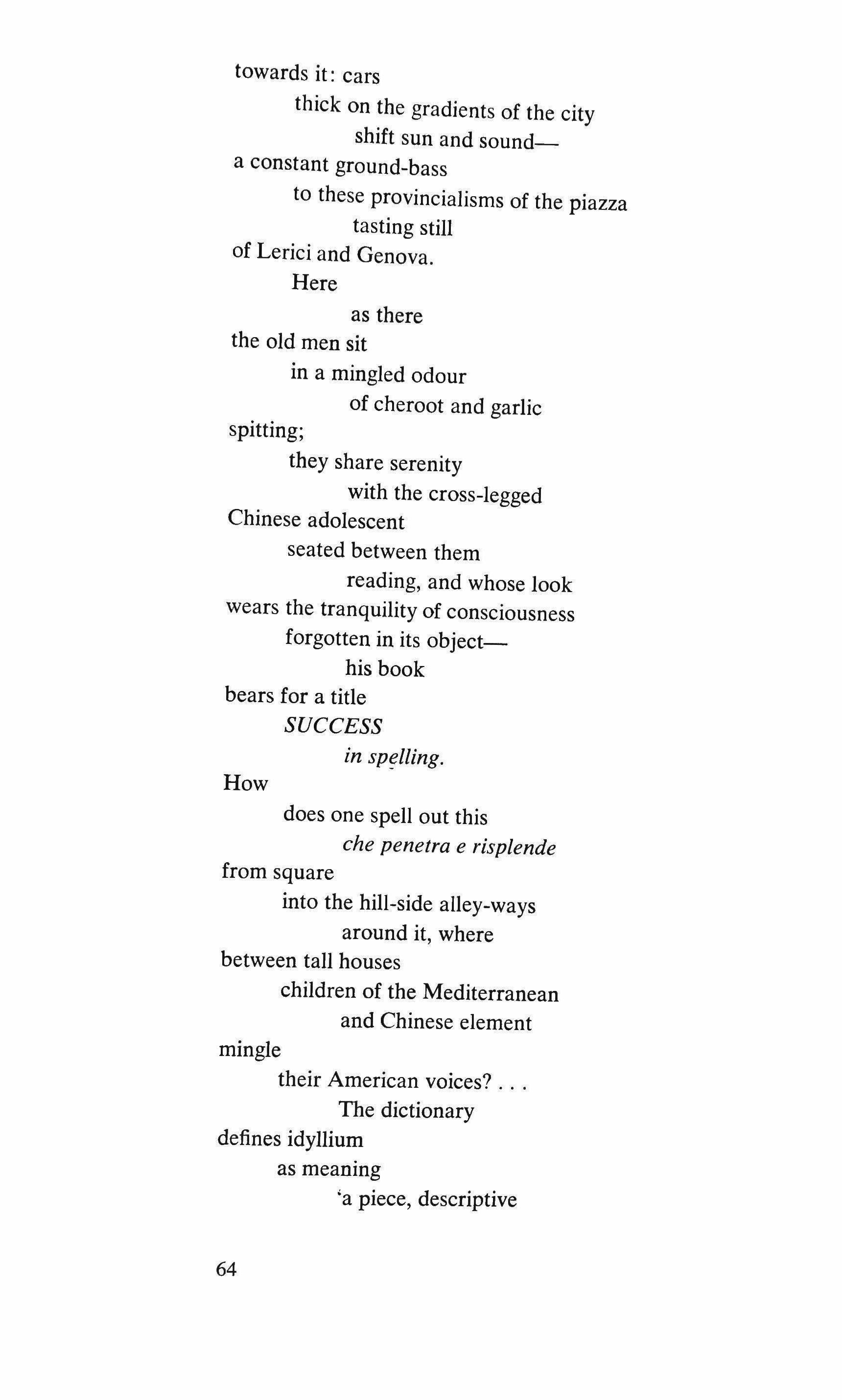
towards it: cars thick on the gradients of the city shift sun and sounda constant ground-bass to these provincialisms of the piazza tasting still of Lerici and Genova.
Here as there the old men sit in a mingled odour of cheroot and garlic spitting; they share serenity with the cross-legged Chinese adolescent seated between them reading, and whose look wears the tranquility of consciousness forgotten in its objecthis book bears for a title SUCCESS in spelling,
How does one spell out this che penetra e risplende from square into the hill-side alley-ways around it, where between tall houses children of the Mediterranean and Chinese element mingle their American voices? The dictionary defines idyllium as meaning 'a piece, descriptive
64
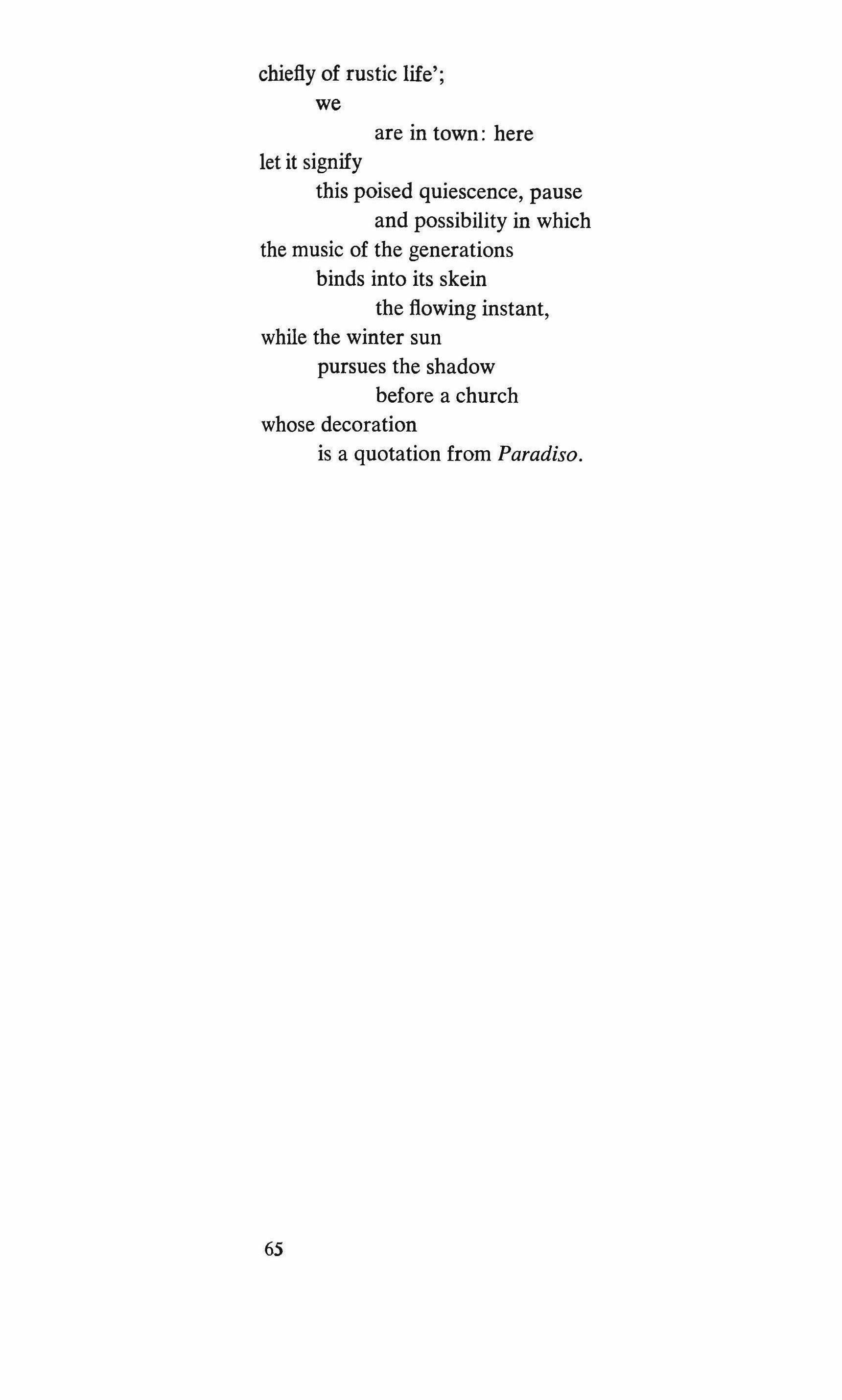
we are in town: here let it signify this poised quiescence, pause and possibility in which the music of the generations binds into its skein the flowing instant, while the winter sun pursues the shadow before a church whose decoration is a quotation from Paradiso.
chiefly of rustic life';
65
TED HUGHES
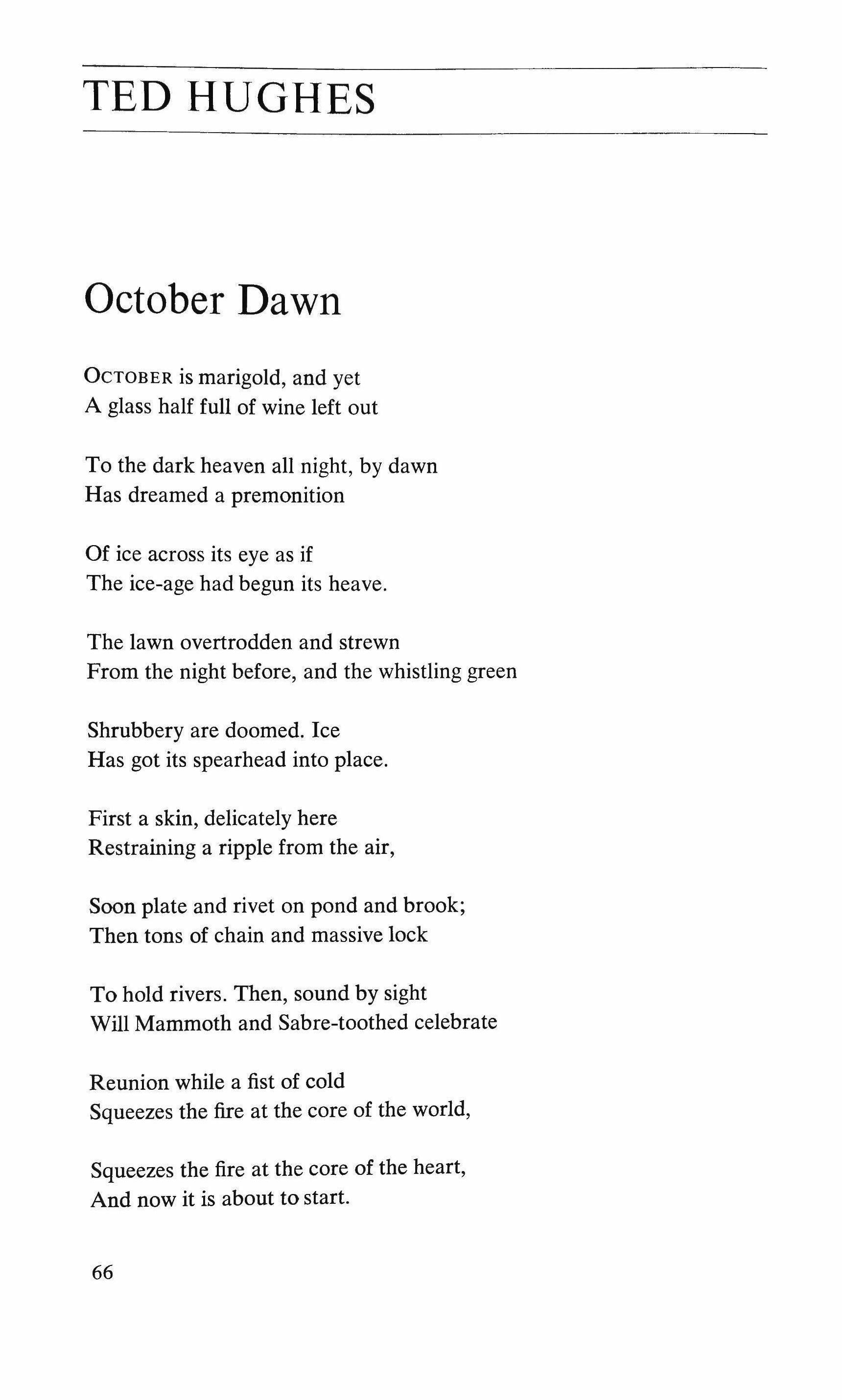
October Dawn
OCTOBER is marigold, and yet
A glass half full of wine left out
To the dark heaven all night, by dawn Has dreamed a premonition
Of ice across its eye as if The ice-age had begun its heave.
The lawn overtrodden and strewn
From the night before, and the whistling green
Shrubbery are doomed. Ice Has got its spearhead into place.
First a skin, delicately here Restraining a ripple from the air,
Soon plate and rivet on pond and brook; Then tons of chain and massive lock
To hold rivers. Then, sound by sight Will Mammoth and Sabre-toothed celebrate
Reunion while a fist of cold
Squeezes the fire at the core of the world,
Squeezes the fire at the core of the heart, And now it is about to start.
66

Pike, three inches long, perfect
Pike in all parts, green tigering the gold. Killers from the egg: the malevolent aged grin. They dance on the surface among the flies.
Or move, stunned by their own grandeur, Over a bed of emerald, silhouette Of submarine delicacy and horror, A hundred feet long in their world.
In ponds, under the heat-struck lily padsGloom of their stillness:
Logged on last year's black leaves, watching upwards. Or hung in an amber cavern of weeds.
The jaws' hooked clamp and fangs
Not to be changed at this date; A life subdued to its instrument; The gills kneading quietly, and the pectorals.
Three we kept behind glass, Jungled in weed: three inches, four, And four and a half: fed fry to themSuddenly there were two. Finally one
With a sag belly and the grin it was born with. And indeed they spare nobody.
Two, six pounds each, over two feet long, High and dry and dead in the willow-herb-
One jammed past its gills down the other's gullet: The outside eye stared: as a vice locks
The same iron in this eye
Though its film shrank in death.
The pond I fished, fifty yards across, Whose lilies and muscular tench
Pike
67

Had outlasted every visible stone
Of the monastery that planted them-
Stilled legendary depth:
It was as deep as England. It held
Pike too immense to stir, so immense and old
That past nightfall I dared not cast
But silently cast and fished
With the hair frozen on my head
For what might move, for what eye might move.
The still splashes on the dark pond,
Owls hushing the floating woods
Frail on my ear against the dream
Darkness beneath night's darkness had freed,
That rose slowly towards me, watching.
Thrushes
TERRIFYING are the attent sleek thrushes on the lawn,
More coiled steel than living-a poised
Dark deadly eye, those delicate legs
Triggered to stirrings beyond sense-with a start, a bounce, a stab
Overtake the instant and drag out some writhing thing.
No indolent procrastinations and no yawning stares, No sighs or head-scratchings. Nothing but bounce and stab
And a ravening second.
Is it their single-mind-sized skulls, or a trained
Body, or genius, or a nestful of brats
Gives their days this bullet and automatic
Purpose? Mozart's brain had it, and the shark's mouth
That hungers down the blood-smell even to a leak of its own
Side and devouring of itself: efficiency which Strikes too streamlined for any doubt to pluck at it
Or obstruction deflect.
68
With a man it is otherwise. Heroism on horseback, Outstripping his desk-diary at a broad desk, Carving at a tiny ivory ornament
For years: his act worships itself-while for him, Though he bends to be blent in the prayer, how loud and above what Furious spaces of fire do the distracting devils
Orgy and hosannah, under what wilderness
Of black silent water weep.
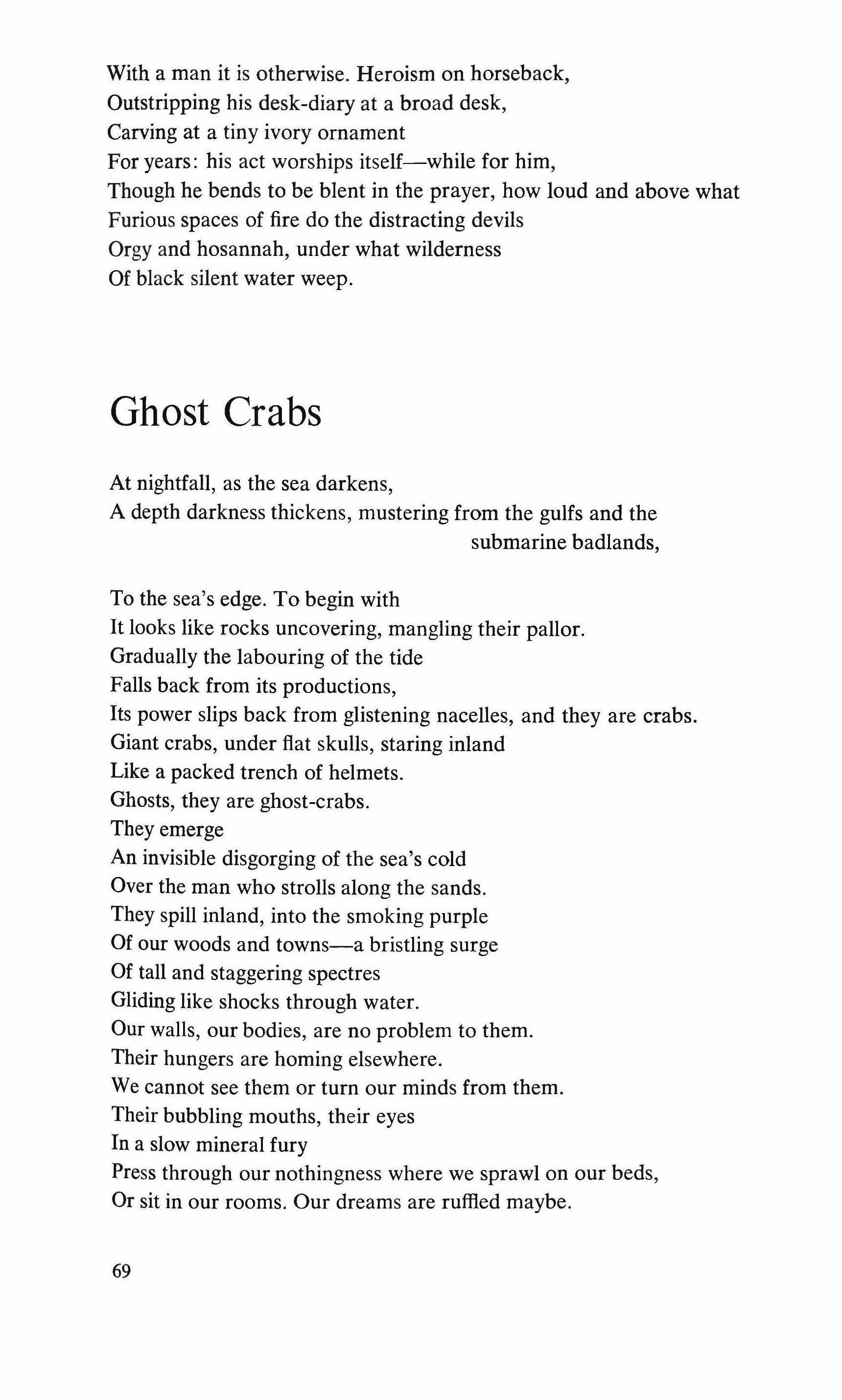
Ghost Crabs
At nightfall, as the sea darkens,
A depth darkness thickens, mustering from the gulfs and the submarine badlands,
To the sea's edge. To begin with It looks like rocks uncovering, mangling their pallor.
Gradually the labouring of the tide
Falls back from its productions, Its power slips back from glistening nacelles, and they are crabs.
Giant crabs, under flat skulls, staring inland
Like a packed trench of helmets.
Ghosts, they are ghost-crabs.
They emerge
An invisible disgorging of the sea's cold
Over the man who strolls along the sands.
They spill inland, into the smoking purple
Of our woods and towns-a bristling surge
Of tall and staggering spectres
Gliding like shocks through water.
Our walls, our bodies, are no problem to them.
Their hungers are homing elsewhere.
We cannot see them or turn our minds from them.
Their bubbling mouths, their eyes
In a slow mineral fury
Press through our nothingness where we sprawl on our beds, Or sit in our rooms. Our dreams are ruffled maybe.
69
Or we jerk awake to the world of our possessions
With a gasp, in a sweat burst, brains jamming blind Into the bulb-light. Sometimes, for minutes, a sliding Staring
Thickness of silence
Presses between us. These crabs own this world.
All night, around us or through us, They stalk each other, they fasten on to each other, They mount each other, they tear each other to pieces, They utterly exhaust each other.
They are the powers of this world.
We are their bacteria, Dying their lives and living their deaths.
At dawn, they sidle back under the sea's edge.
They are the turmoil of history, the convulsion
In the roots of blood, in the cycles of concurrence.
To them, our cluttered countries are empty battleground.
All day they recuperate under the sea.
Their singing is like a thin sea-wind flexing in the rocks of a headland, Where only crabs listen.
They are God's only toys.

Out
I
The dream time
My father sat in his chair recovering
From the four-year mastication by gunfire and mud, Body buffeted wordless, estranged by long soaking In the colours of mutilation.
His outer perforations
Were valiantly healed, but he and the hearth-fire, its blood-flicker
On biscuit-bowl and piano and table-leg, Moved into strong and stronger possession Of minute after minute, as the clock's tiny cog
70
Laboured and on the thread of his listening
Dragged him bodily from under
The mortised four-year strata of dead Englishmen He belonged with. He felt his limbs clearing With every slight, gingerish movement. While I, small and four, Lay on the carpet as his luckless double, His memory's buried, immovable anchor, Amongjawbones and blown-off boots, tree-stumps, shellcases and craters, Under rain that goes on drumming its rods and thickening Its kingdom, which the sun has abandoned, and where nobody Can ever again move from shelter.
II
The dead man in his cave beginning to sweat; The melting bronze visor of flesh Of the mother in the baby-furnace-
Nobody believes, it Could be nothing, all Undergo smiling at The lulling of blood in Their ears, their ears, their ears, their eyes Are only drops of water and even the dead man suddenly Sits up and sneezes-Atishoo!
Then the nurse wraps him up, smiling, And, though faintly, the mother is smiling, And it's just another baby.
As after being blasted to bits
The reassembled infantryman Tentatively totters out, gazing around with the eyes Of an exhausted clerk.
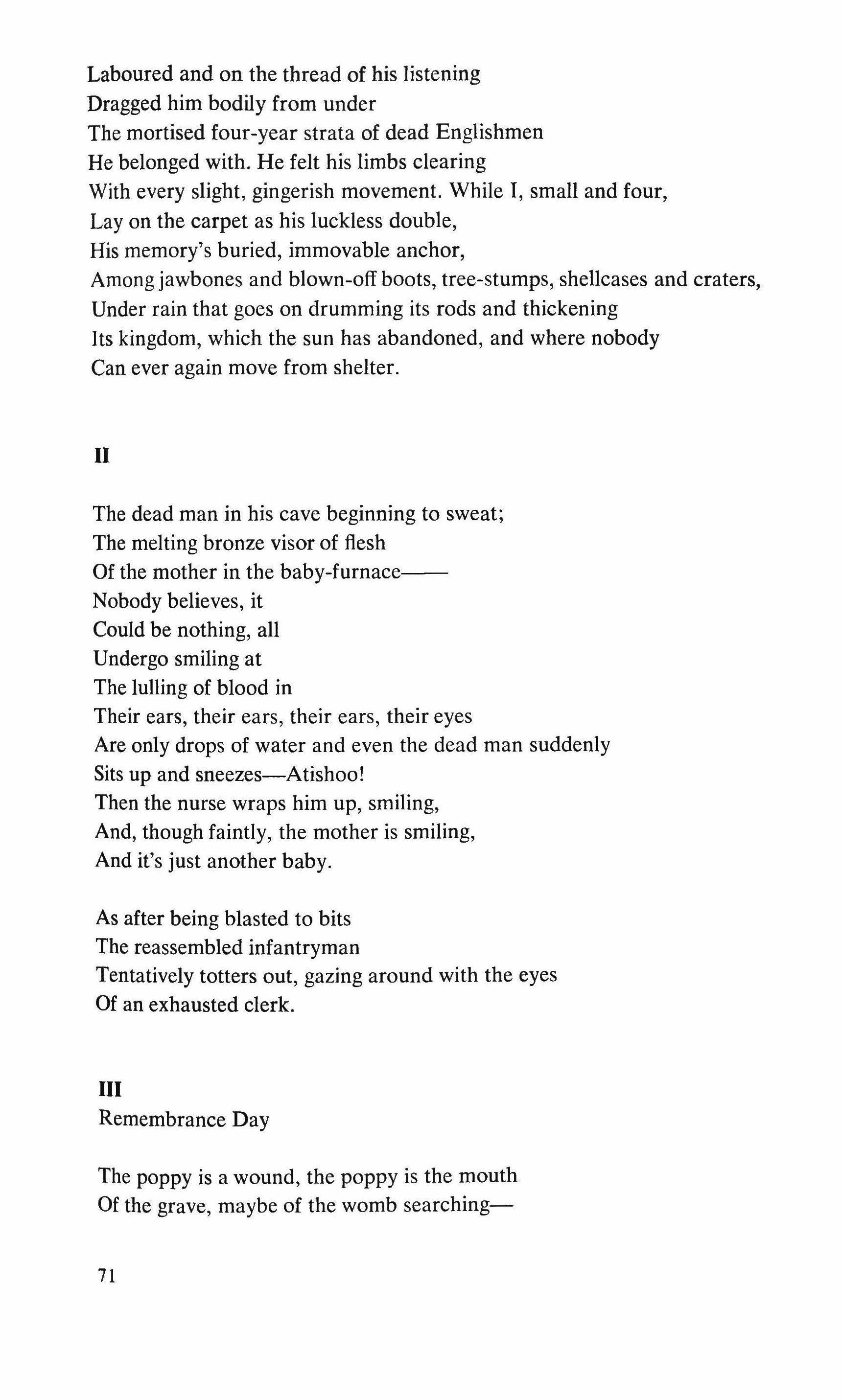
III Remembrance Day
The poppy is a wound, the poppy is the mouth Of the grave, maybe of the womb searching-
71
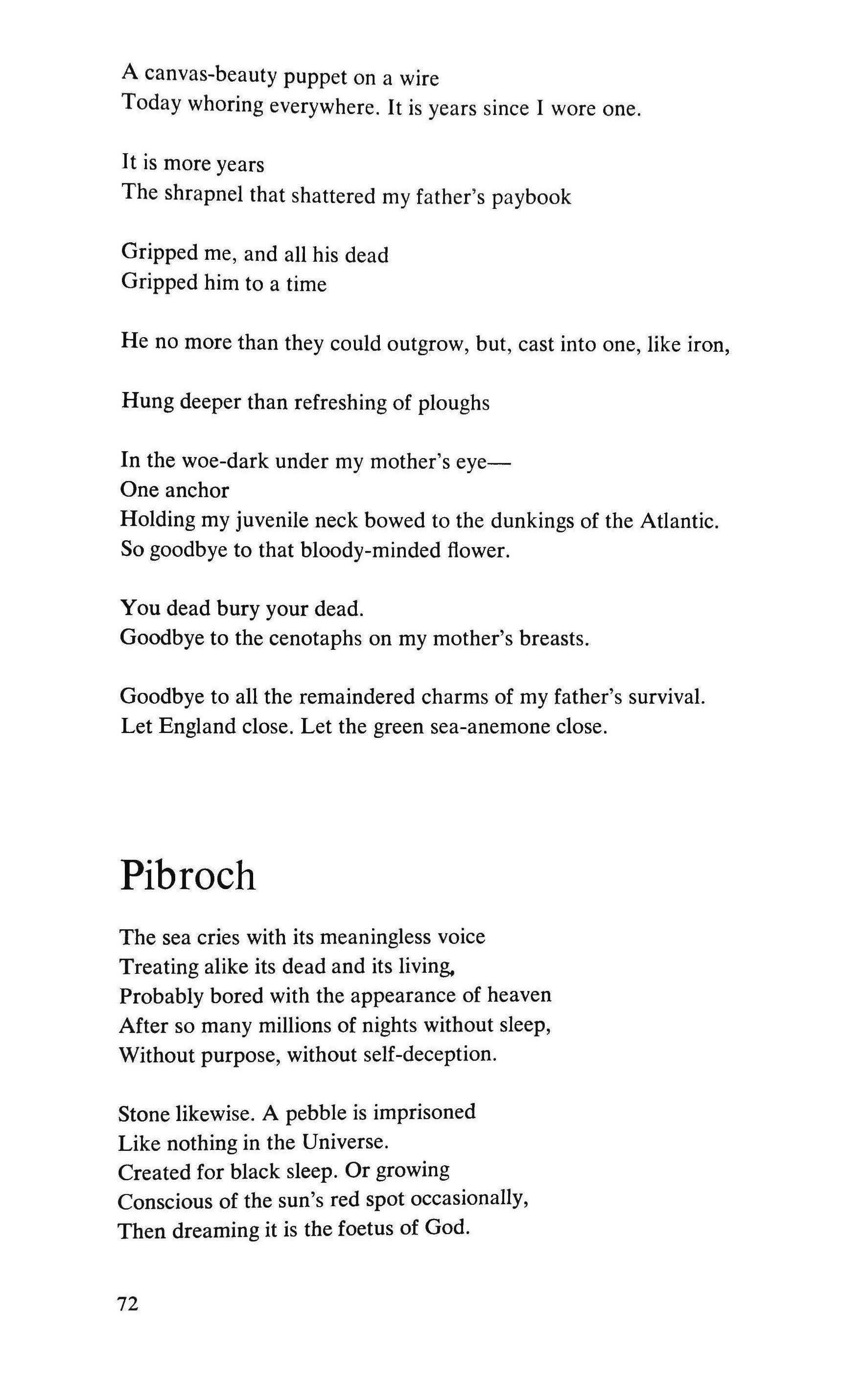
A canvas-beauty puppet on a wire
Today whoring everywhere. It is years since I wore one.
It is more years
The shrapnel that shattered my father's paybook
Gripped me, and all his dead
Gripped him to a time
He no more than they could outgrow, but, cast into one, like iron,
Hung deeper than refreshing of ploughs
In the woe-dark under my mother's eye
One anchor
Holding my juvenile neck bowed to the dunkings of the Atlantic. So goodbye to that bloody-minded flower.
You dead bury your dead. Goodbye to the cenotaphs on my mother's breasts.
Goodbye to all the remaindered charms of my father's survival. Let England close. Let the green sea-anemone close.
Pibroch
The sea cries with its meaningless voice
Treating alike its dead and its living, Probably bored with the appearance of heaven
After so many millions of nights without sleep, Without purpose, without self-deception.
Stone likewise. A pebble is imprisoned
Like nothing in the Universe.
Created for black sleep. Or growing
Conscious of the sun's red spot occasionally, Then dreaming it is the foetus of God.
72
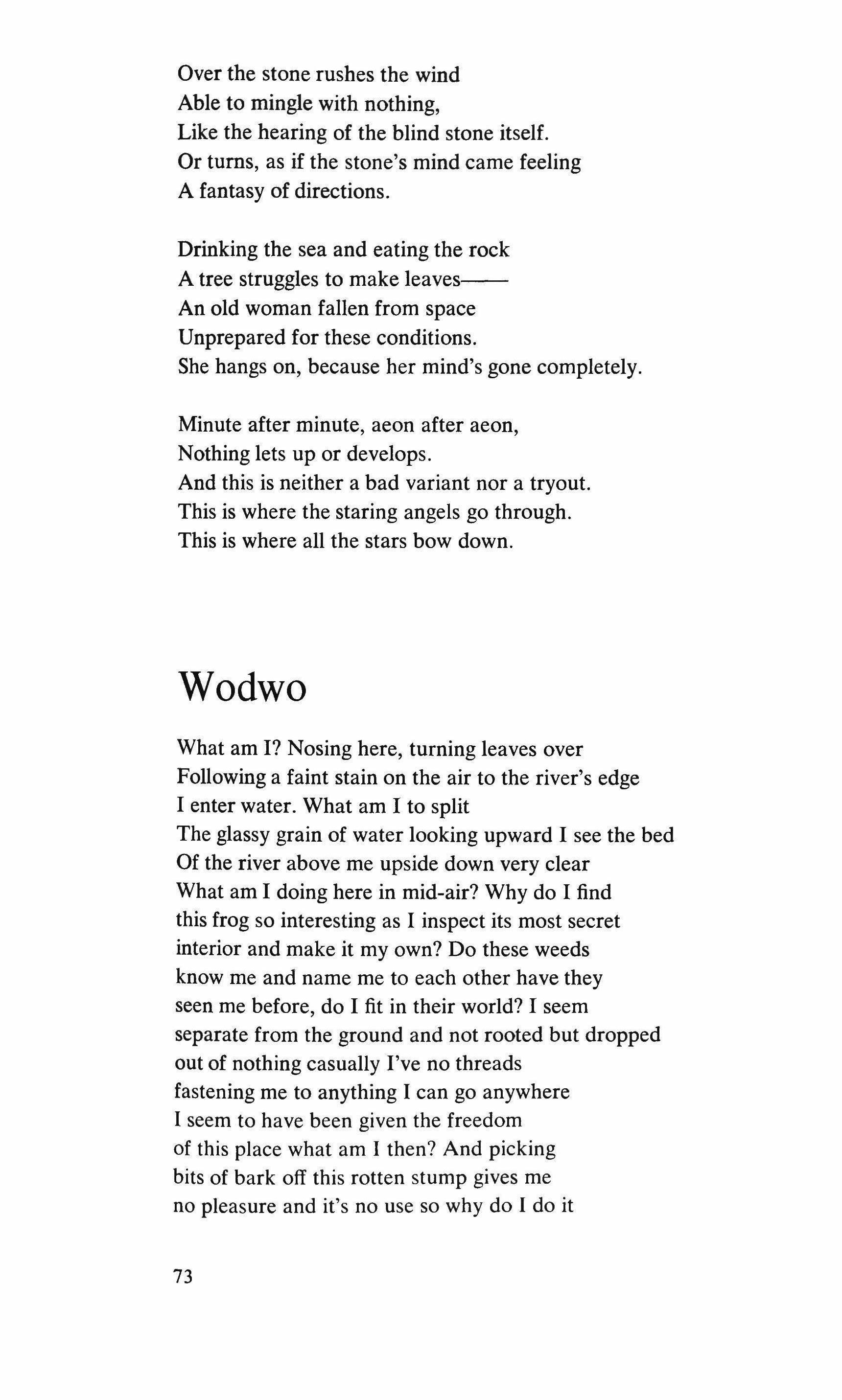
Over the stone rushes the wind
Able to mingle with nothing,
Like the hearing of the blind stone itself. Or turns, as if the stone's mind came feeling A fantasy of directions.
Drinking the sea and eating the rock
A tree struggles to make leaves-
An old woman fallen from space Unprepared for these conditions. She hangs on, because her mind's gone completely.
Minute after minute, aeon after aeon, Nothing lets up or develops. And this is neither a bad variant nor a tryout. This is where the staring angels go through. This is where all the stars bow down.
Wodwo
What am I? Nosing here, turning leaves over Following a faint stain on the air to the river's edge 1 enter water. What am 1 to split The glassy grain of water looking upward 1 see the bed Of the river above me upside down very clear What am 1 doing here in mid-air? Why do 1 find this frog so interesting as I inspect its most secret interior and make it my own? Do these weeds know me and name me to each other have they seen me before, do I fit in their world? 1 seem separate from the ground and not rooted but dropped out of nothing casually I've no threads fastening me to anything I can go anywhere I seem to have been given the freedom of this place what am I then? And picking bits of bark off this rotten stump gives me no pleasure and it's no use so why do I do it
73
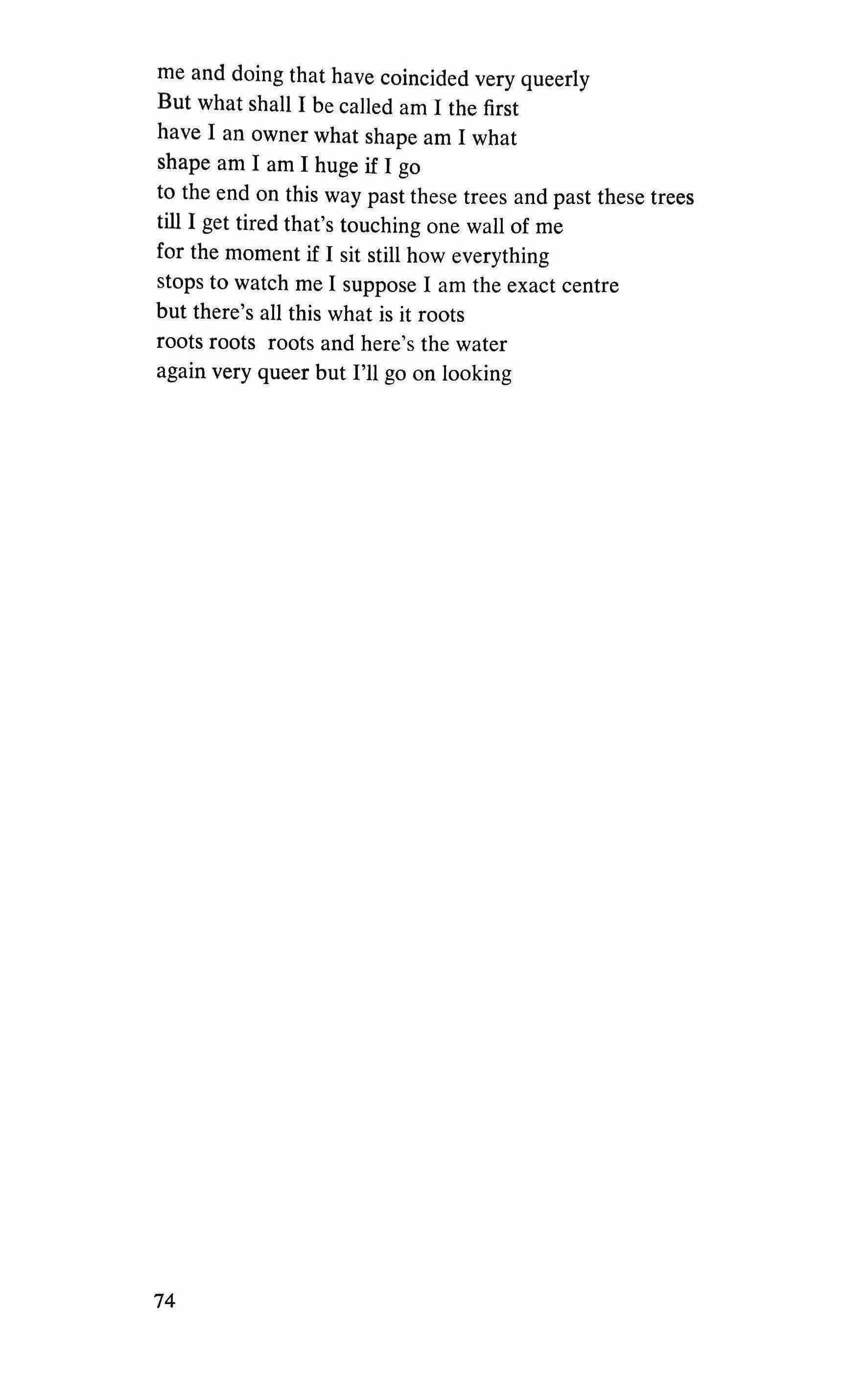
me and doing that have coincided very queerly But what shall I be called am I the first have I an owner what shape am I what shape am I am I huge if I go to the end on this way past these trees and past these trees till I get tired that's touching one wall of me for the moment if I sit still how everything stops to watch me I suppose I am the exact centre but there's all this what is it roots roots roots roots and here's the water again very queer but I'll go on looking
74

CHRISTOPHER MIDDELTON
The thousand things
Dry vine leaves burn in an angle of the wall. Dry vine leaves and a sheet of paper, overhung by the green vine.
From an open grate in an angle of the wall dry vine leaves and dead flies send smoke up into the green vine where grape clusters go ignored by lizards. Dry vine leaves and a few dead flies on fire and a Spanish toffee spat into an angle of the wall make a smell that calls to mind the thousand things. Dead flies go, paper curls and flares, Spanish toffee sizzles and the smell has soon gone over the wall.
A naked child jumps over the threshold, waving a green spray of leaves of vine.
China shop vigil
Useful these bowls may be; what fatness makes the hollows glow, their shadows bossed and plump.
Precisely there a wheel whirling backward flattens them. Knuckles whiten on copper: headless men are hammering drums.
75
Cup and teapot may be such comforters: small jaws mincing chatter over the bad blood between us once.
When baking began, the air in jugs frothed for milk, or lupins. Now mob is crushed by mob, what fatness but in wild places,
where some half dozen dusty mindful men drinking from gourd or canvas huddle, and can speak at last of the good rain.
Five psalms of common man
'Je n'aime pas Ie dimanche'
1

Whisky whipping g-string Jaguar megaton sometimes a 'purely rational human being'
it's me they tell of yonder sea devoid of amber it's me they tell of column and haunting song
noncommittal me my mumble eaten by the explosions of clocks and winds without routine
not fountains not millennia of light inextinguishable ebbing through column and throat with its wombwombwomb
come my pet my demagogue excruciate me watching yonder fountain douse the yolky dunes
2
THE creatures of coal have looked for you all over; the creatures of tea heard a snatch of song, it was not you.
76

The creatures of smoke have looked for you all over; the creatures of tar saw a tree, it was not you.
The hand was not you, nor the hairy ear; the belly was not you, nor the anklebone.
The eyeball was not you. Tongue and teeth and jawbone were not you. The creatures of hair have looked for you all over; the creatures of snow touched a locked door, it was not you.
The creatures of paper have looked for you all over; the creatures of steel smelled thick wallets, it was not you.
These creatures wanted to be free to look for you; and all the time you looked to be free of their want for you.
3
W. N. P. BarbeIIion (pseudonymous)
March 1915
sees 'on the top of an empty omnibus a little heap of dirty used-up bus tickets collected by chance in the corner' felt sick the number of persons the number of miles the number of buses at all times the number of voices the number of voices not speaking to one another perplexity without surprise
Avenues Madison Shaftesbury Opera the number of heart beats without number
77

the sick one is he on whom his desire advances asking why
the sick one is he who has begun all over again not waiting not 'waiting that hour which ripens to their doom'
he speaks (Adolf Eichmann Apri11961) 'in starchy, clerkish language full of abstractions pedantry euphemism'
4
My blind wife kicking in her flesh of flies. My blind wife in her ring of ribs beating me flat. But no shard of keg shall cool my last bones.
The flies were dancing in their ring. Their ring was dancing in the flies. The ring desired by the nature of flies.
Stomach eyes packing it all in tight. Knotted wings kicking in a glue film. Ghosted in glue was the nature of eyes.
Revolt severe if sieved for its ghost of motive. Air without motive rubbing in the arid throat. My blind wife I warm to the coolness of bones.
5
Order imagined against fear is not order. Saith man. Fear imagined against order. only negates or does not negate existing order. Out of a rumbling of hollows an order is born to negate another existing order of fear.
Nights broken before they end, interrupting the millennia of my vigilance, saith man.
78
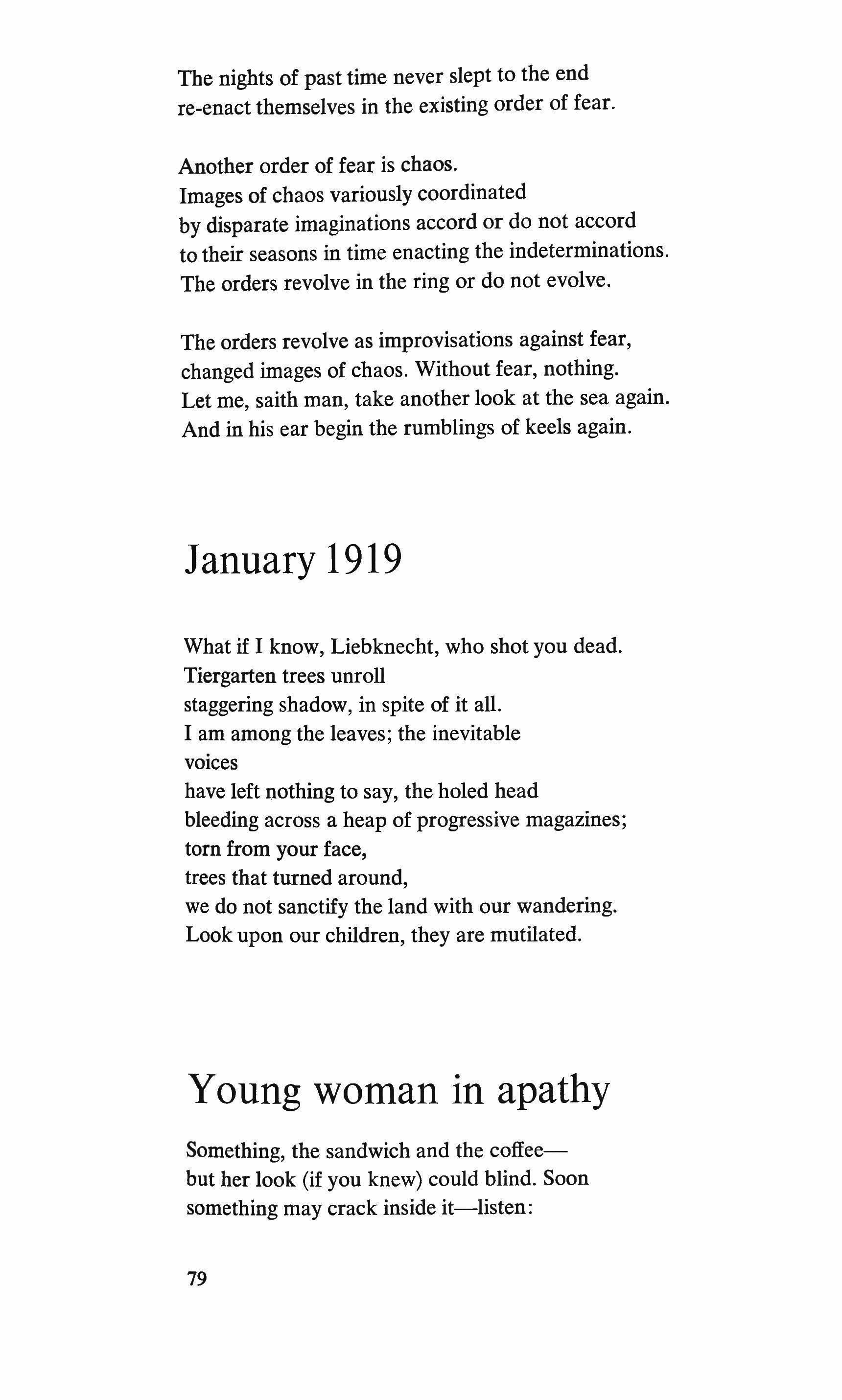
The nights of past time never slept to the end re-enact themselves in the existing order of fear.
Another order of fear is chaos. Images of chaos variously coordinated by disparate imaginations accord or do not accord to their seasons in time enacting the indeterminations. The orders revolve in the ring or do not evolve. The orders revolve as improvisations against fear, changed images of chaos. Without fear, nothing. Let me, saith man, take another look at the sea again. And in his ear begin the rumblings of keels again.
January 1919
What if I know, Liebknecht, who shot you dead. Tiergarten trees unroll staggering shadow, in spite of it all. I am among the leaves; the inevitable voices have left nothing to say, the holed head bleeding across a heap of progressive magazines; torn from your face, trees that turned around, we do not sanctify the land with our wandering. Look upon our children, they are mutilated.
Young woman in apathy
Something, the sandwich and the coffeebut her look (if you knew) could blind. Soon something may crack inside it-listen:
79

over her cup, still as desolate, the misty ovals make nothing of her trees and men; unholed ice, and she shooting under the ice out of no-
where; no star (to feed on sandwich), not a faint star, even, who'll sneak into averted vision-caryatid!-
what in all the world is company? what is it? Blood bawling its lies back at an impromptu '0 I am so unhappy,' or some such? Even 'it's
me' pretends, fools no one, lets go the least sound
collapsing the pediment, and she-suffocated in a heap under her stone gods.
Disturbing the tarantula
The door a maze of shadow, peach leaves veining its wood colour, and cobwebs broken breathing ah ah as it is pushed opentwo hands at a ladder shook free the tarantula, it slid black and fizzing to a rung above eye-level, knees jack knives, 80
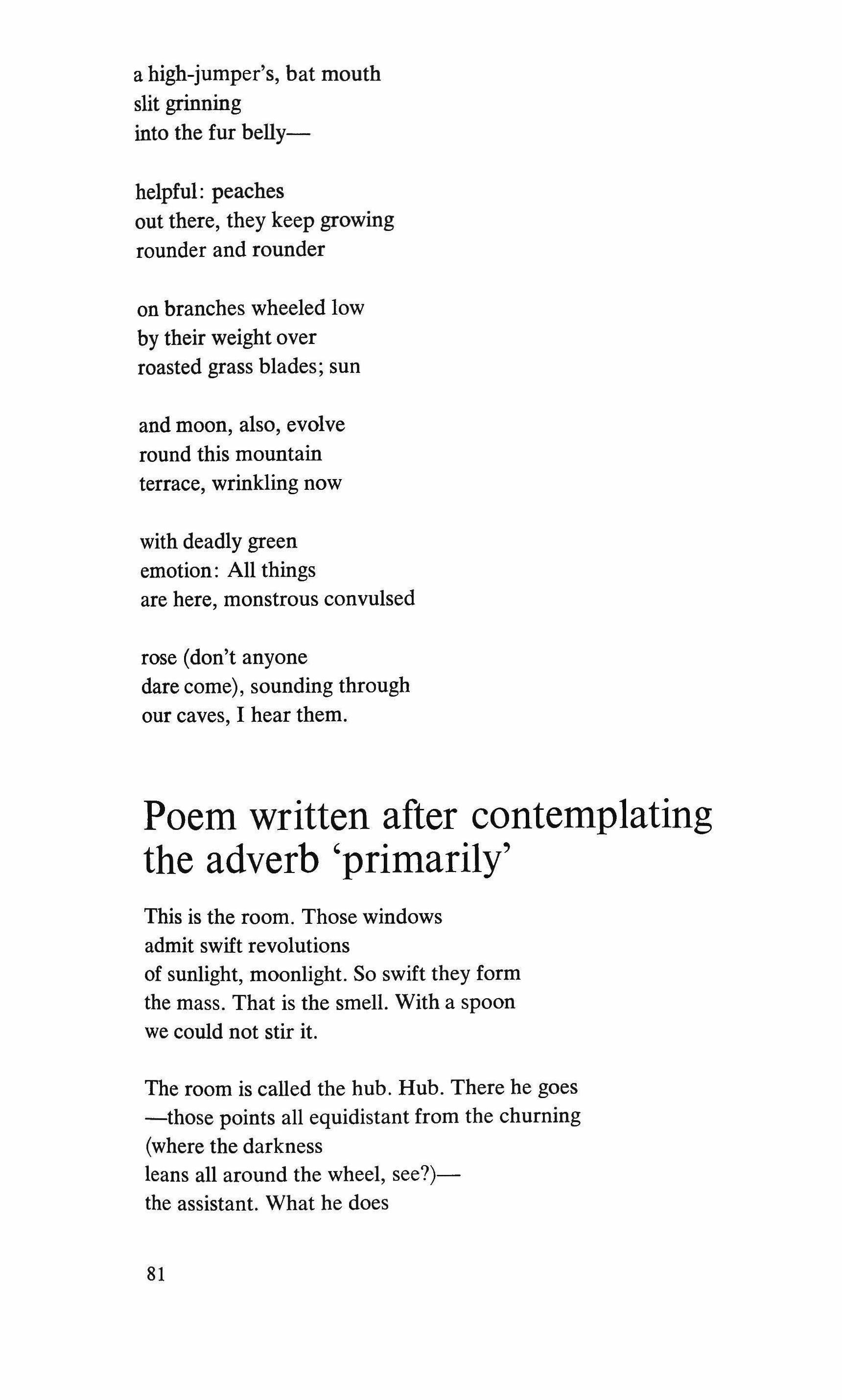
a high-jumper's, bat mouth slit grinning into the fur belly-
helpful: peaches out there, they keep growing rounder and rounder
on branches wheeled low by their weight over roasted grass blades; sun and moon, also, evolve round this mountain terrace, wrinkling now with deadly green emotion: All things are here, monstrous convulsed rose (don't anyone dare come), sounding through our caves, I hear them.
Poem written after contemplating the adverb 'primarily'
This is the room. Those windows admit swift revolutions of sunlight, moonlight. So swift they form the mass. That is the smell. With a spoon we could not stir it.
The room is called the hub. Hub. There he goes -those points all equidistant from the churning (where the darkness leans all around the wheel, see?)the assistant. What he does
81
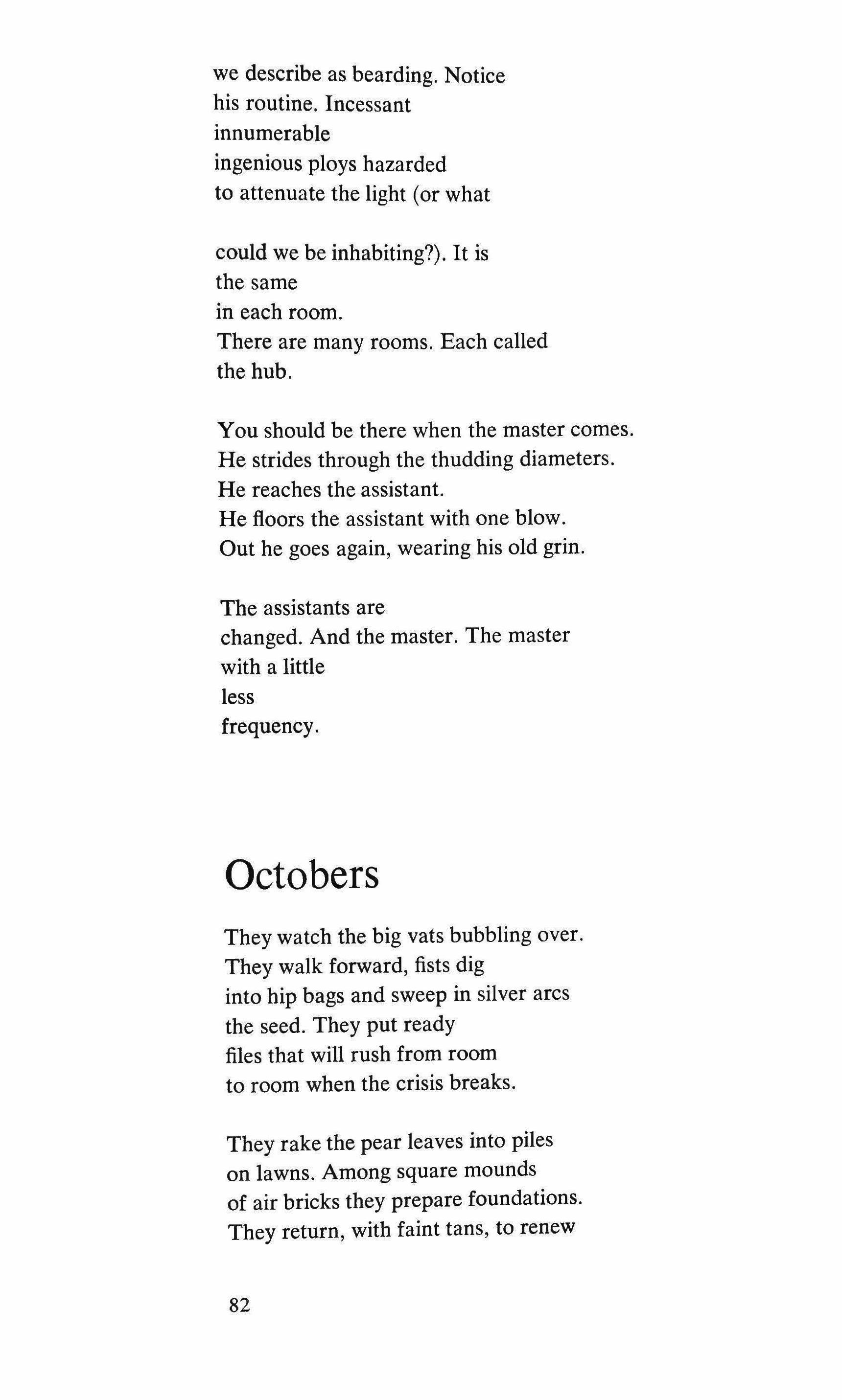
we describe as bearding. Notice his routine. Incessant innumerable ingenious ploys hazarded to attenuate the light (or what could we be inhabiting?). It is the same in each room.
There are many rooms. Each called the hub.
You should be there when the master comes. He strides through the thudding diameters. He reaches the assistant. He floors the assistant with one blow. Out he goes again, wearing his old grin. The assistants are changed. And the master. The master with a little less frequency.
Octobers
They watch the big vats bubbling over. They walk forward, fists dig into hip bags and sweep in silver arcs the seed. They put ready files that will rush from room to room when the crisis breaks.
They rake the pear leaves into piles on lawns. Among square mounds of air bricks they prepare foundations. They return, with faint tans, to renew
82
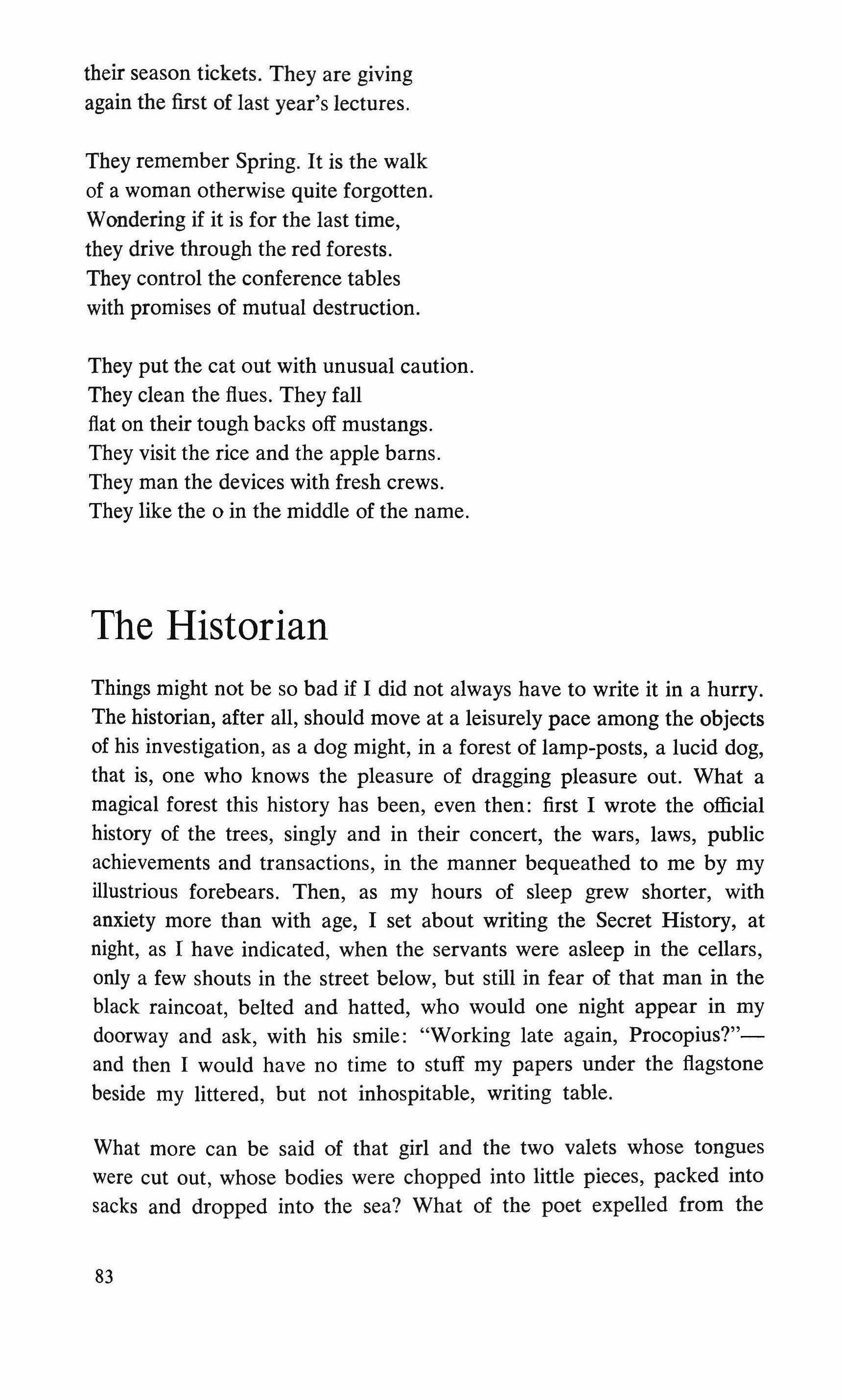
their season tickets. They are giving again the first of last year's lectures.
They remember Spring. It is the walk of a woman otherwise quite forgotten. Wondering if it is for the last time, they drive through the red forests. They control the conference tables with promises of mutual destruction.
They put the cat out with unusual caution. They clean the flues. They fall flat on their tough backs off mustangs. They visit the rice and the apple barns. They man the devices with fresh crews. They like the 0 in the middle of the name.
The Historian
Things might not be so bad if I did not always have to write it in a hurry. The historian, after all, should move at a leisurely pace among the objects of his investigation, as a dog might, in a forest of lamp-posts, a lucid dog, that is, one who knows the pleasure of dragging pleasure out. What a magical forest this history has been, even then: first I wrote the official history of the trees, singly and in their concert, the wars, laws, public achievements and transactions, in the manner bequeathed to me by my illustrious forebears. Then, as my hours of sleep grew shorter, with anxiety more than with age, I set about writing the Secret History, at night, as I have indicated, when the servants were asleep in the cellars, only a few shouts in the street below, but still in fear of that man in the black raincoat, belted and hatted, who would one night appear in my doorway and ask, with his smile: "Working late again, Procopius?"and then I would have no time to stuff my papers under the flagstone beside my littered, but not inhospitable, writing table.
What more can be said of that girl and the two valets whose tongues were cut out, whose bodies were chopped into little pieces, packed into sacks and dropped into the sea? What of the poet expelled from the
83

city, living now in the woods (with his second wife)-when he told the story of his friend's ludicrous funeral, the coffin too heavy, the factions struggling with flags and wreaths to claim the corpse as an advocate of their particular lies, was he laughing or crying?
I wrote the Histories in order to buy time for the writing of the Secret History. And the Secret History had to be told in a hurry; I cannot exist in this suspense for long, though it can be, for an old man, almost as exhilarating as an early love-affair, all the same. How two-faced one is, especially when facing oneself. The doctor says that I am ill. Yes. They said this of that other poet, in whose will it was written: "Let no man say that I perished because of some sickness during these years. It was their brutality which killed me, the torment of their lies, the fear which stopped my heart whenever a door would creak."
I remember Theodosius well, not a pleasant fellow, to be sure; but it was an injustice to tie him up in that cell like a donkey, with the tether tight around his throat, four months at a manger, standing there in his excrements. Once he had gone safely mad, they let him go; and he died. I am told that Theodora used to come and bray at him, when she could find the time, lift up her skirts and wiggle her bottom at him, and she had him flogged if he declined to look at her: lack of due respect.
I cannot help laughing when I think of the astrologers whom they mounted on camels and drove through the streets for the mob to jeer at. Old men. Justinian's face is said to turn, at times, into a shapeless lump of flesh: no eyes, eyebrows, nose or anything. To think of that lump buzzing with plans for the killing of thousands. They uproot entire populations, weeping children, the tenderness of old women, worshippers of different gods, gods of the streams, winds, of the earth, and march them at planting-time from their villages into faraway camps of special huts where there is nothing to do but die. No, he does not even plan it. He does whatever comes into the lump, according to the circumstances. In the name of the laws. For the acquisition and storage of riches. For the few and no questions. It all makes the young men and women somewhat more irrational than is good for our society. Our society is probably destroyed, anyhow. Never again to sleep, never again to screw, in security. Was he laughing, or was he crying, that man in his hide-out, when he told the story of the funeral? It is still mysterious here, still real, here in this room of mine. They are
84
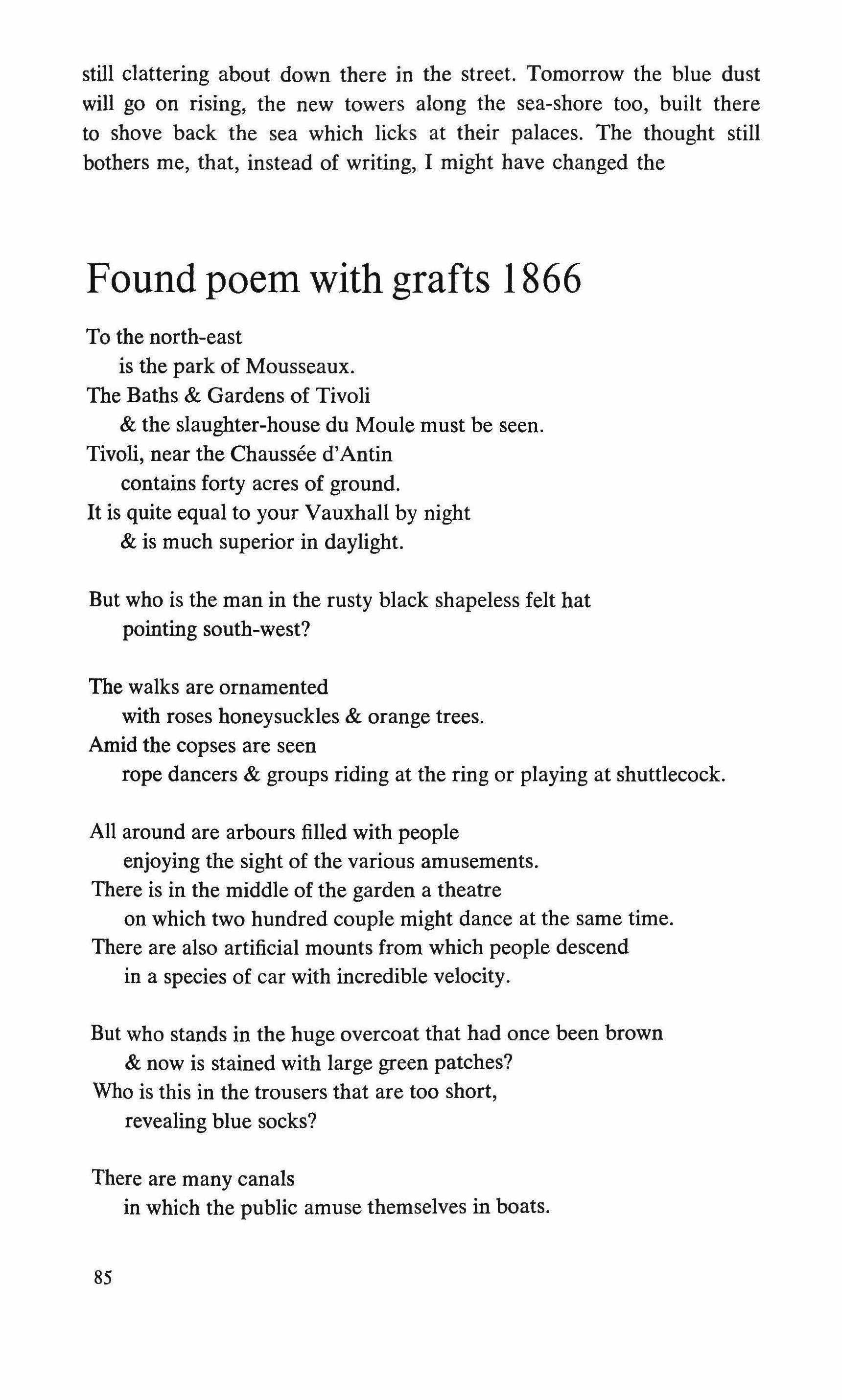
still clattering about down there in the street. Tomorrow the blue dust will go on rising, the new towers along the sea-shore too, built there to shove back the sea which licks at their palaces. The thought still bothers me, that, instead of writing, I might have changed the
Found poem with grafts 1866
To the north-east is the park of Mousseaux. The Baths & Gardens of Tivoli & the slaughter-house du Moule must be seen. Tivoli, near the Chaussee d'Antin contains forty acres of ground. It is quite equal to your Vauxhall by night & is much superior in daylight.
But who is the man in the rusty black shapeless felt hat pointing south-west?
The walks are ornamented with roses honeysuckles & orange trees. Amid the copses are seen rope dancers & groups riding at the ring or playing at shuttlecock.
All around are arbours filled with people enjoying the sight of the various amusements. There is in the middle of the garden a theatre on which two hundred couple might dance at the same time. There are also artificial mounts from which people descend in a species of car with incredible velocity.
But who stands in the huge overcoat that had once been brown & now is stained with large green patches? Who is this in the trousers that are too short, revealing blue socks?
There are many canals in which the public amuse themselves in boats.
85
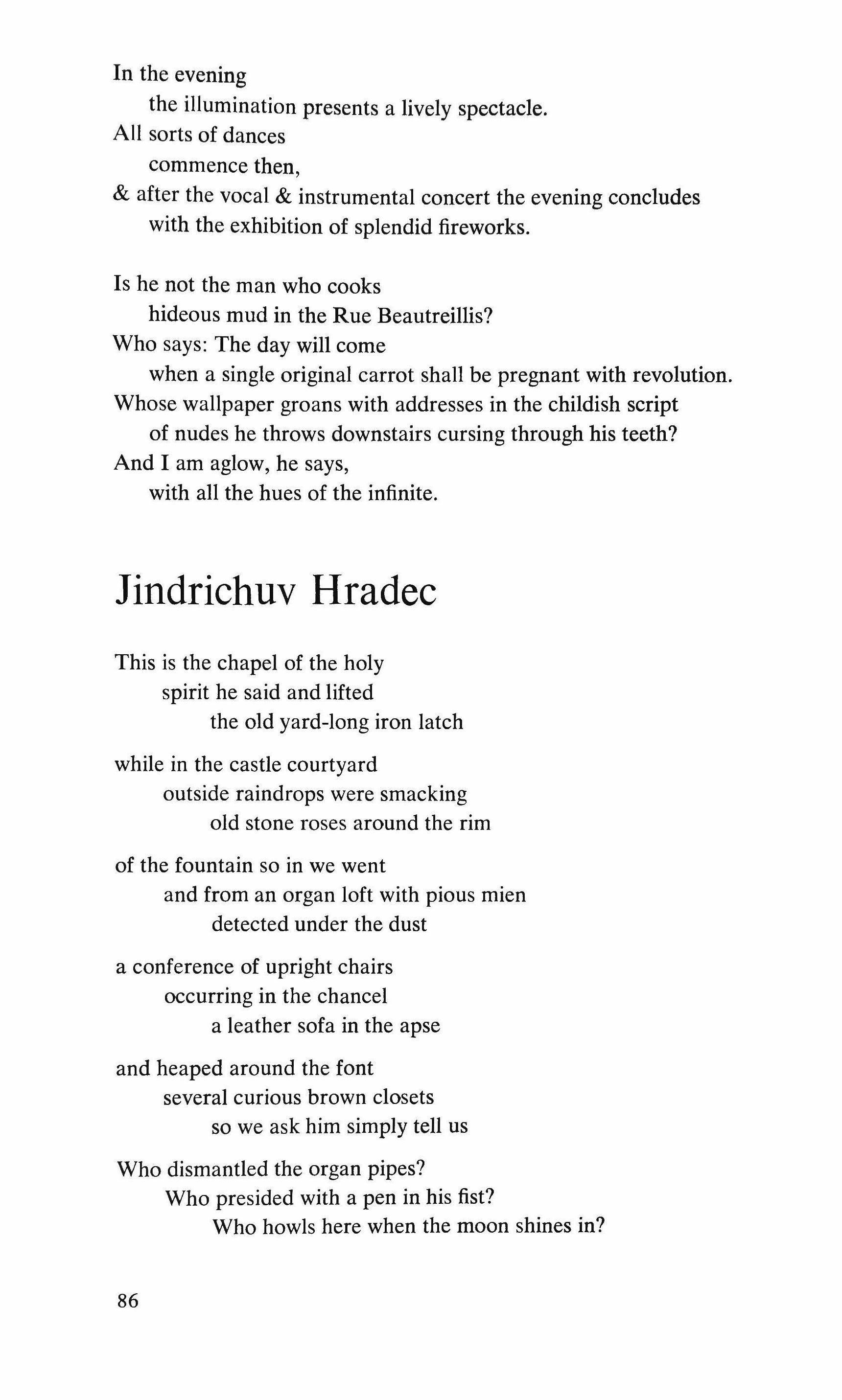
In the evening the illumination presents a lively spectacle. All sorts of dances commence then, & after the vocal & instrumental concert the evening concludes with the exhibition of splendid fireworks.
Is he not the man who cooks hideous mud in the Rue Beautreillis?
Who says: The day will come when a single original carrot shall be pregnant with revolution. Whose wallpaper groans with addresses in the childish script of nudes he throws downstairs cursing through his teeth? And I am aglow, he says, with all the hues of the infinite.
lindrichuv Hradec
This is the chapel of the holy spirit he said and lifted the old yard-long iron latch while in the castle courtyard outside raindrops were smacking old stone roses around the rim of the fountain so in we went and from an organ loft with pious mien detected under the dust a conference of upright chairs occurring in the chancel a leather sofa in the apse and heaped around the font several curious brown closets so we ask him simply tell us
Who dismantled the organ pipes? Who presided with a pen in his fist? Who howls here when the moon shines in?
86
GEORGE MacBETH
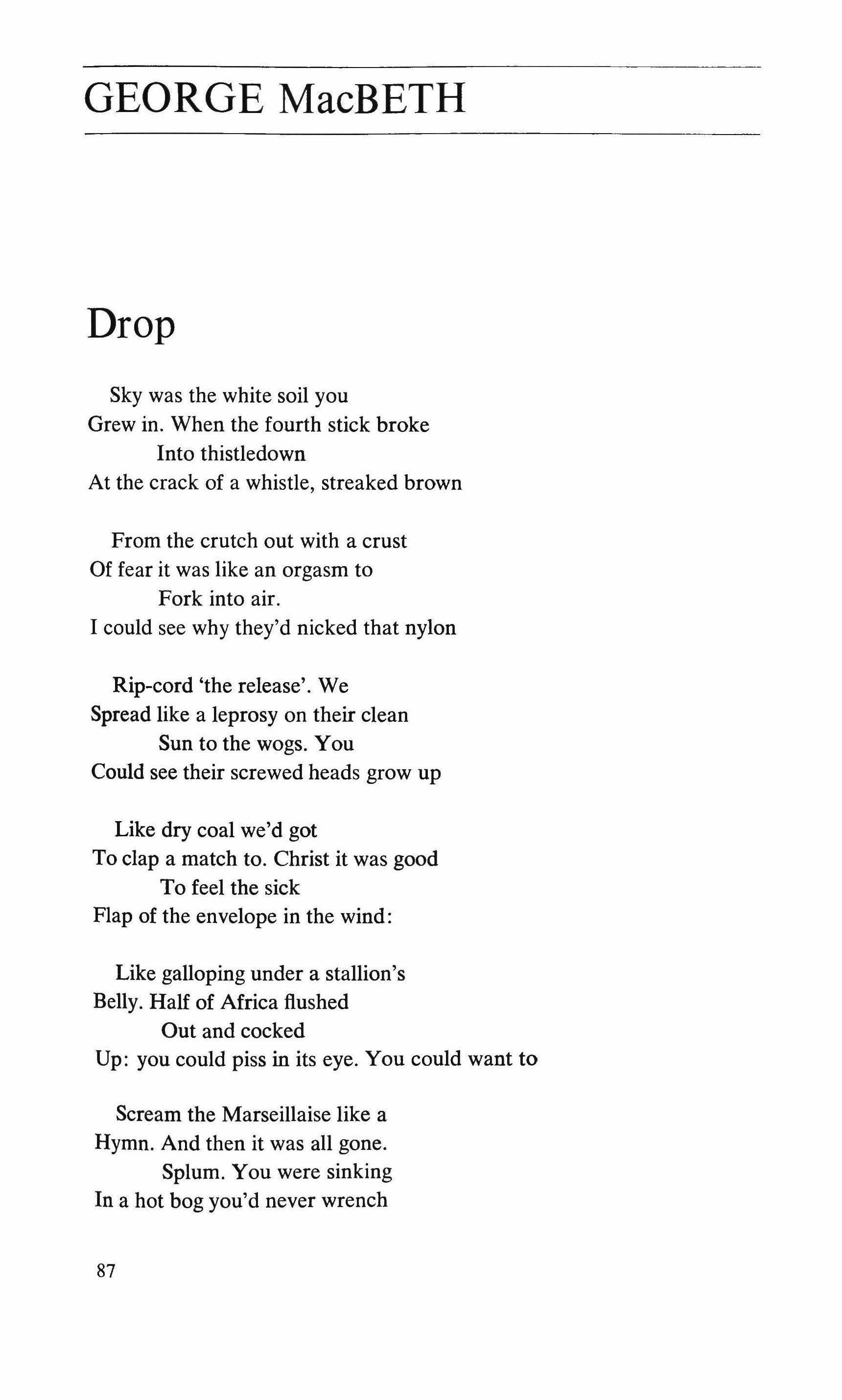
Drop
Sky was the white soil you
Grew in. When the fourth stick broke Into thistledown
At the crack of a whistle, streaked brown
From the crutch out with a crust
Of fear it was like an orgasm to Fork into air.
I could see why they'd nicked that nylon
Rip-cord 'the release'. We Spread like a leprosy on their clean Sun to the wogs. You Could see their screwed heads grow up
Like dry coal we'd got To clap a match to. Christ it was good To feel the sick Flap of the envelope in the wind:
Like galloping under a stallion's Belly. Half of Africa flushed Out and cocked
Up: you could piss in its eye. You could want to
Scream the Marseillaise like a Hymn. And then it was all gone. Splum. You were sinking In a hot bog you'd never wrench
87
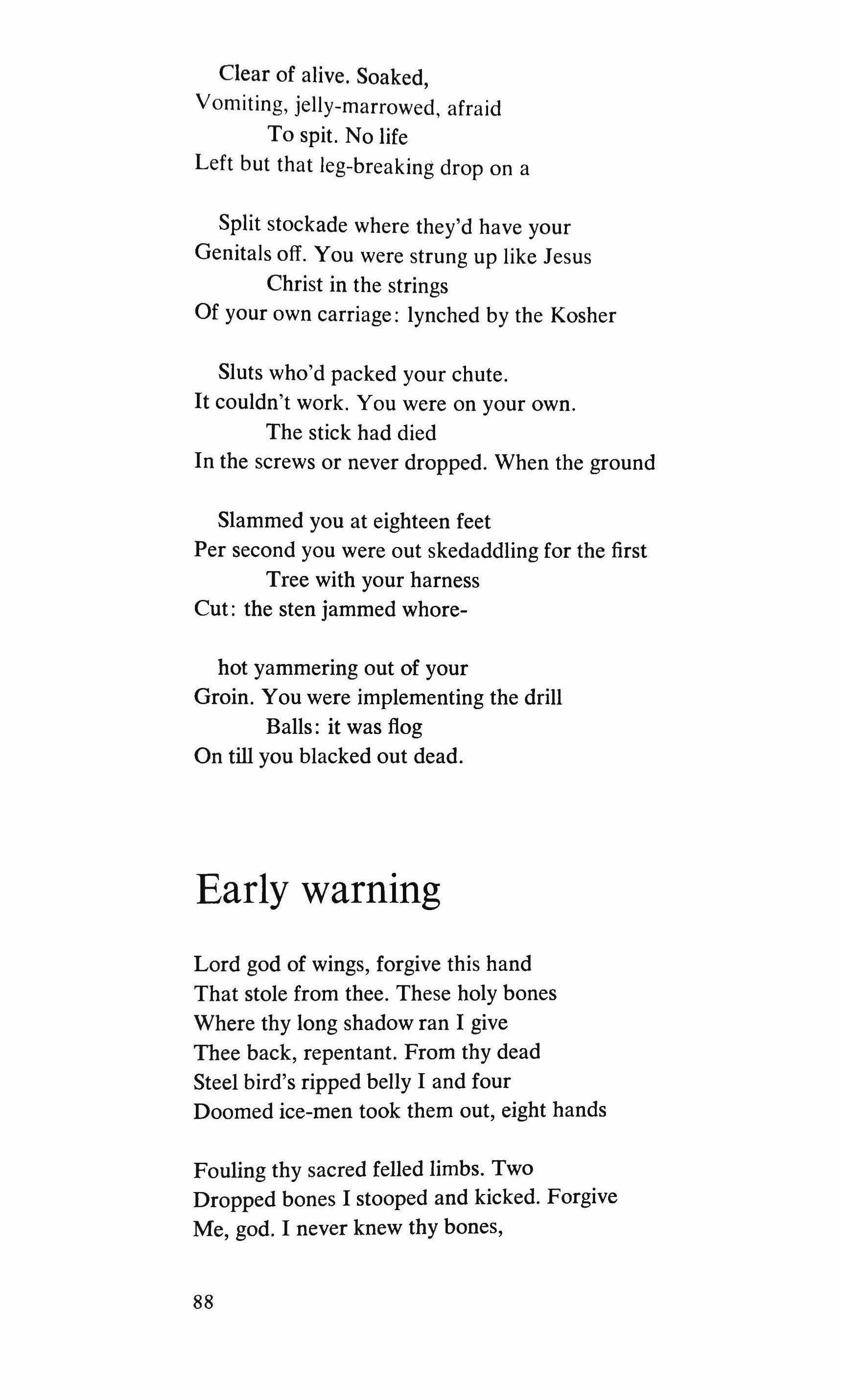
Clear of alive. Soaked
Vomiting, jelly-marrowed, afraid
To spit. No life
Left but that leg-breaking drop on a
Split stockade where they'd have your Genitals off. You were strung up like Jesus Christ in the strings
Of your own carriage: lynched by the Kosher
Sluts who'd packed your chute. It couldn't work. You were on your own. The stick had died
In the screws or never dropped. When the ground
Slammed you at eighteen feet
Per second you were out skedaddling for the first Tree with your harness
Cut: the sten jammed whorehot yammering out of your Groin. You were implementing the drill Balls: it was flog
On till you blacked out dead.
Early warning
Lord god of wings, forgive this hand That stole from thee. These holy bones Where thy long shadow ran I give Thee back, repentant. From thy dead
Steel bird's ripped belly I and four
Doomed ice-men took them out, eight hands
Fouling thy sacred felled limbs. Two Dropped bones I stooped and kicked. Forgive Me, god. I never knew thy bones,
88
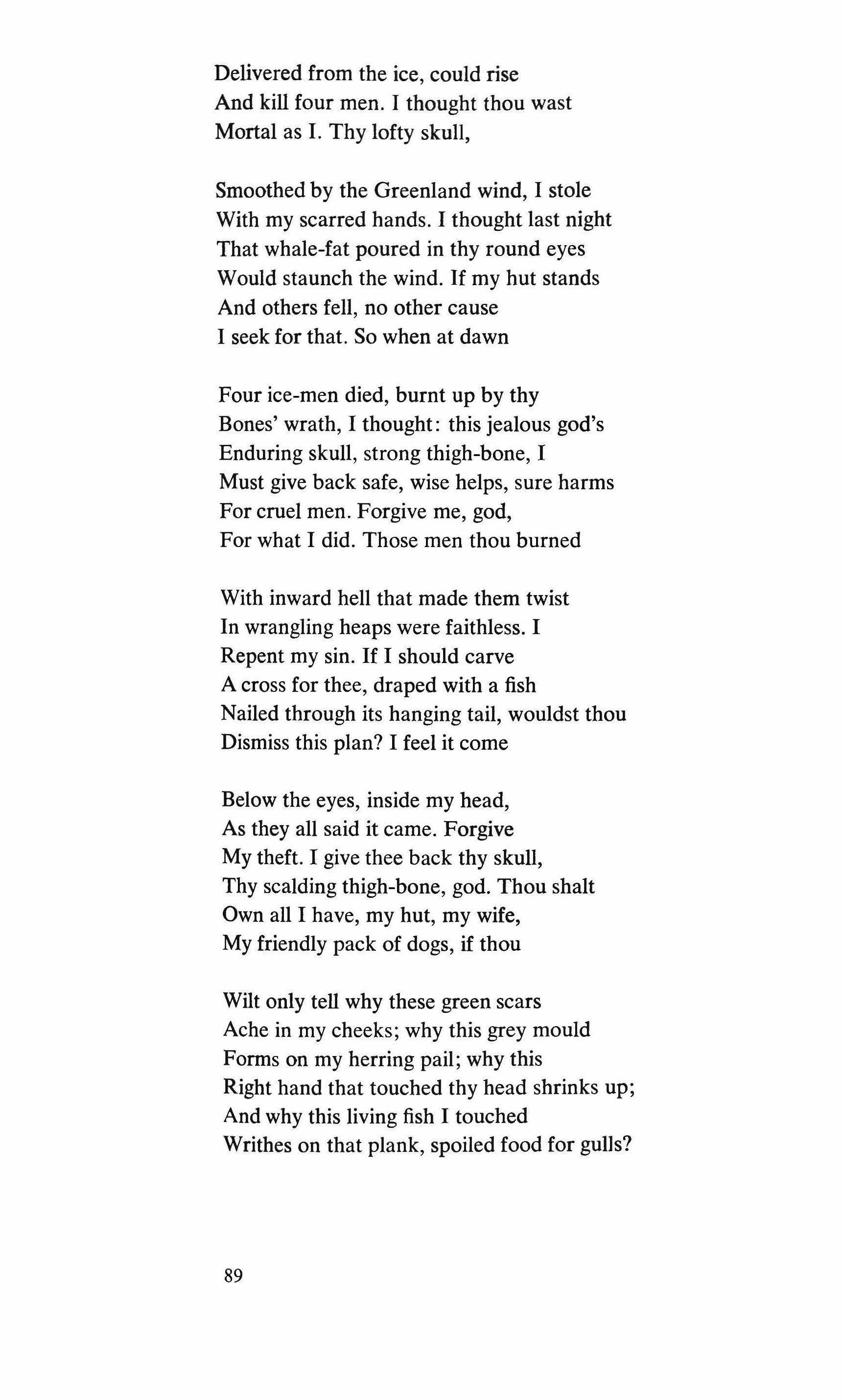
Delivered from the ice, could rise And kill four men. I thought thou wast Mortal as I. Thy lofty skull,
Smoothed by the Greenland wind, I stole With my scarred hands. I thought last night That whale-fat poured in thy round eyes Would staunch the wind. If my hut stands And others fell, no other cause I seek for that. So when at dawn
Four ice-men died, burnt up by thy Bones' wrath, I thought: this jealous god's Enduring skull, strong thigh-bone, I Must give back safe, wise helps, sure harms For cruel men. Forgive me, god, For what I did. Those men thou burned
With inward hell that made them twist In wrangling heaps were faithless. I Repent my sin. If I should carve A cross for thee, draped with a fish Nailed through its hanging tail, wouldst thou Dismiss this plan? I feel it come
Below the eyes, inside my head, As they all said it came. Forgive My theft. I give thee back thy skull, Thy scalding thigh-bone, god. Thou shalt Own all I have, my hut, my wife, My friendly pack of dogs, if thou
Wilt only tell why these green scars Ache in my cheeks; why this grey mould Forms on my herring pail; why this Right hand that touched thy head shrinks up; And why this living fish I touched Writhes on that plank, spoiled food for gulls?
89
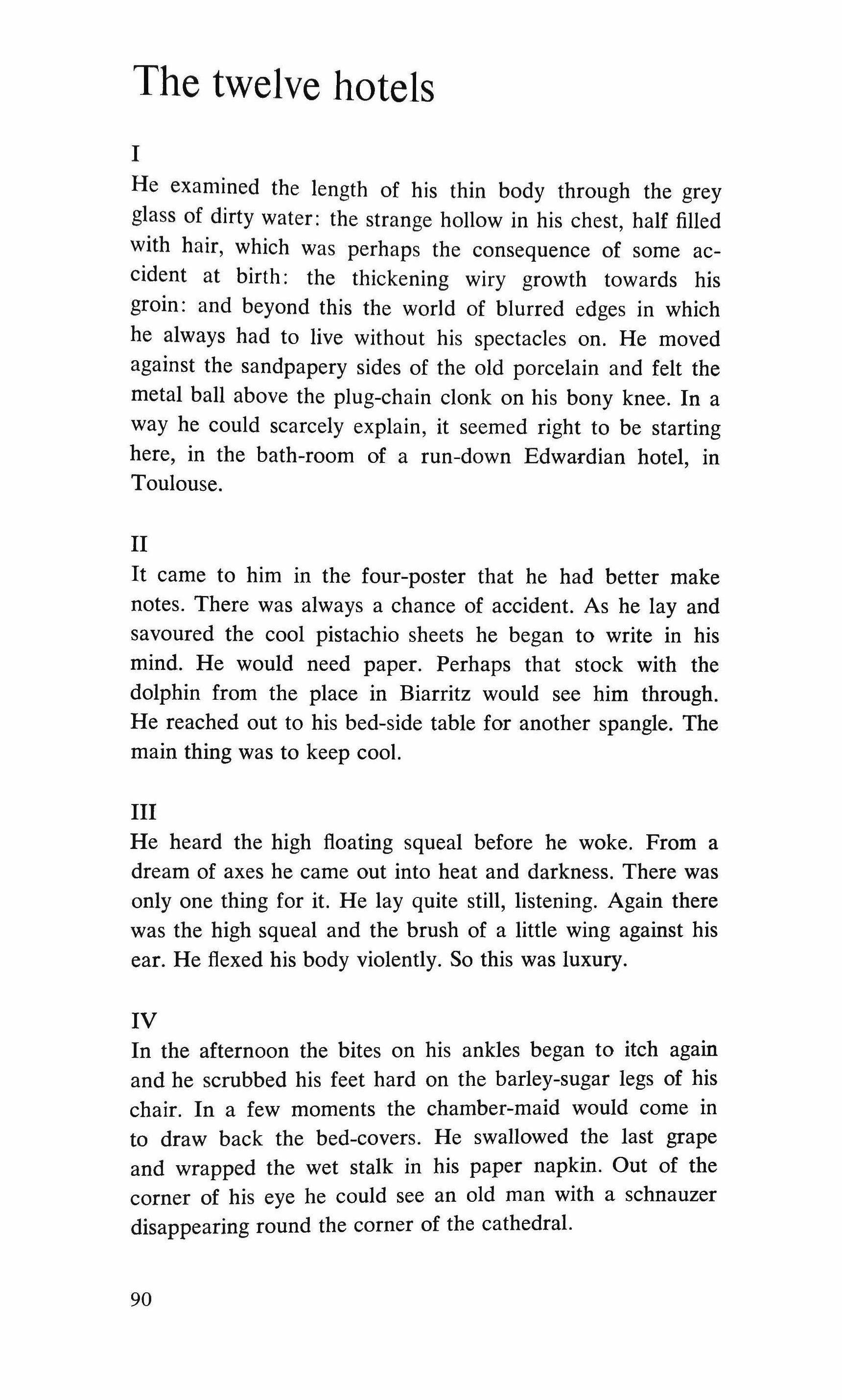
The twelve hotels
I
He examined the length of his thin body through the grey glass of dirty water: the strange hollow in his chest, half filled with hair, which was perhaps the consequence of some accident at birth: the thickening wiry growth towards his groin: and beyond this the world of blurred edges in which he always had to live without his spectacles on. He moved against the sandpapery sides of the old porcelain and felt the metal ball above the plug-chain clonk on his bony knee. In a way he could scarcely explain, it seemed right to be starting here, in the bath-room of a run-down Edwardian hotel, in Toulouse.
II
It came to him in the four-poster that he had better make notes. There was always a chance of accident. As he lay and savoured the cool pistachio sheets he began to write in his mind. He would need paper. Perhaps that stock with the dolphin from the place in Biarritz would see him through. He reached out to his bed-side table for another spangle. The main thing was to keep cool.
III
He heard the high floating squeal before he woke. From a dream of axes he came out into heat and darkness. There was only one thing for it. He lay quite still, listening. Again there was the high squeal and the brush of a little wing against his ear. He flexed his body violently. So this was luxury.
IV
In the afternoon the bites on his ankles began to itch again and he scrubbed his feet hard on the barley-sugar legs of his chair. In a few moments the chamber-maid would come in to draw back the bed-covers. He swallowed the last grape and wrapped the wet stalk in his paper napkin. Out of the corner of his eye he could see an old man with a schnauzer disappearing round the corner of the cathedral.
90
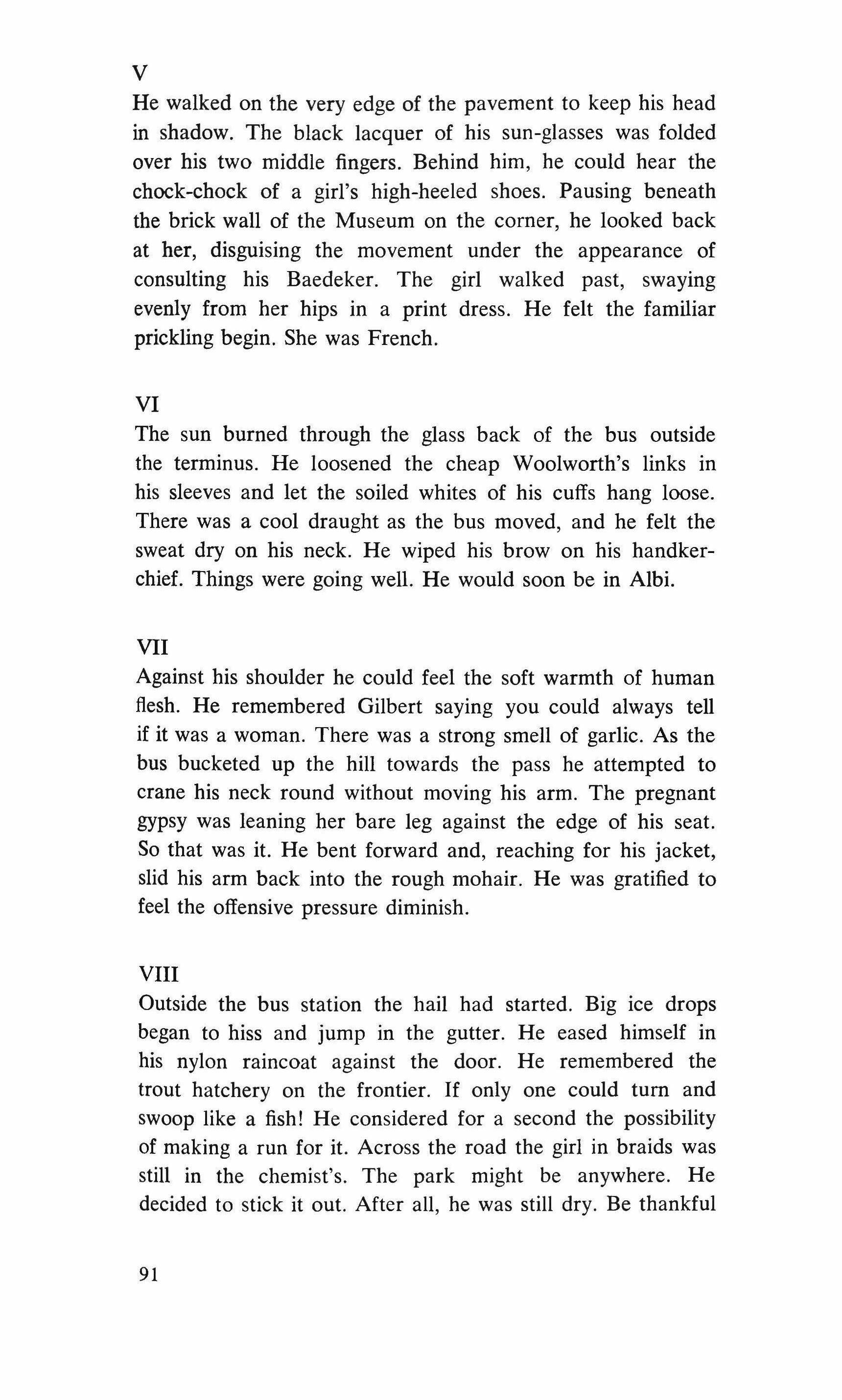
V
He walked on the very edge of the pavement to keep his head in shadow. The black lacquer of his sun-glasses was folded over his two middle fingers. Behind him, he could hear the chock-chock of a girl's high-heeled shoes. Pausing beneath the brick wall of the Museum on the corner, he looked back at her, disguising the movement under the appearance of consulting his Baedeker. The girl walked past, swaying evenly from her hips in a print dress. He felt the familiar prickling begin. She was French.
VI
The sun burned through the glass back of the bus outside the terminus. He loosened the cheap Woolworth's links in his sleeves and let the soiled whites of his cuffs hang loose. There was a cool draught as the bus moved, and he felt the sweat dry on his neck. He wiped his brow on his handkerchief. Things were going well. He would soon be in Albi.
VII
Against his shoulder he could feel the soft warmth of human flesh. He remembered Gilbert saying you could always tell if it was a woman. There was a strong smell of garlic. As the bus bucketed up the hill towards the pass he attempted to crane his neck round without moving his arm. The pregnant gypsy was leaning her bare leg against the edge of his seat. So that was it. He bent forward and, reaching for his jacket, slid his arm back into the rough mohair. He was gratified to feel the offensive pressure diminish.
VIII
Outside the bus station the hail had started. Big ice drops began to hiss and jump in the gutter. He eased himself in his nylon raincoat against the door. He remembered the trout hatchery on the frontier. If only one could turn and swoop like a fish! He considered for a second the possibility of making a run for it. Across the road the girl in braids was still in the chemist's. The park might be anywhere. He decided to stick it out. After all, he was still dry. Be thankful
91

for something, he said to himself, as he watched the big driver pulling his gloves on.
IX
He was walking now on dense cones between the pine-trees. Through the dappled sunlight he could see the German tourist at the edge of the lake. That Tyrolean hat and the lederhosen were unmistakeable. But why should the man need to carry his dispatch case for a day in the mountains? The problem bothered him, but he knew it made no difference. He felt for the slack knot of his tie and had started to straighten it before he remembered where he was. For the first time in Andorra he smiled.
X
When the chance came he went down on one knee in the gravel, remembering to flick his precise crease away from the point of pressure. He closed his left eye, sighted along the parapet. Somewhere below him a man's voice was shouting in Italian. He could feel his hands quiver and pressed them more tightly together to hold the cool metal steady. The four towers were clearly outlined inside the yellow rectangle. He swung to his left. The priest had quickened his step. He was almost running now. There would scarcely be time before he reached the barbican. Without thinking, he squeezed the button. It closed with a slow hizz. He looked down at the dial. The distance needle was fixed at eight inches. The priest was already as far as the first tower. God damn those bloody snails, he thought.
XI
It was getting late. Below and to his left a man stood up in his seat, waving his arms and occasionally slapping his fist in his hands as if making a speech. Two or three cushions had already been thrown into the ring. He felt for the packet of polo mints in his pocket and slit off the top one with a circular incision of his nail. He would have to try almost immediately. He watched Zurita go in over the horns and come out again with the sword still in his hand. He slipped the mint between his teeth. It was now or never. He rose,
92
flung his coat to the other shoulder and began to edge along the row. Two pairs of silk stockings. A child's bare knees. A kilt. He had passed the point of danger almost before he noticed it. The Spaniards were still waiting for the kill.
XII
What was he trying to do, he asked himself, as the train moved way from the platform. Create a mystery out of nothing, was that it? Surely there was a line of Michael's about that. He tried to remember. The sweating woman opposite yawned, throwing her head back on the sticky leather. Across the aisle the girl was still looking down into her lap. It helps, he thought, it helps. Outside the window the black grids of the Hydro-Electric Plant at Foix were silhouetted against the sunset.
Against the sun
Malta 1565/1940 I
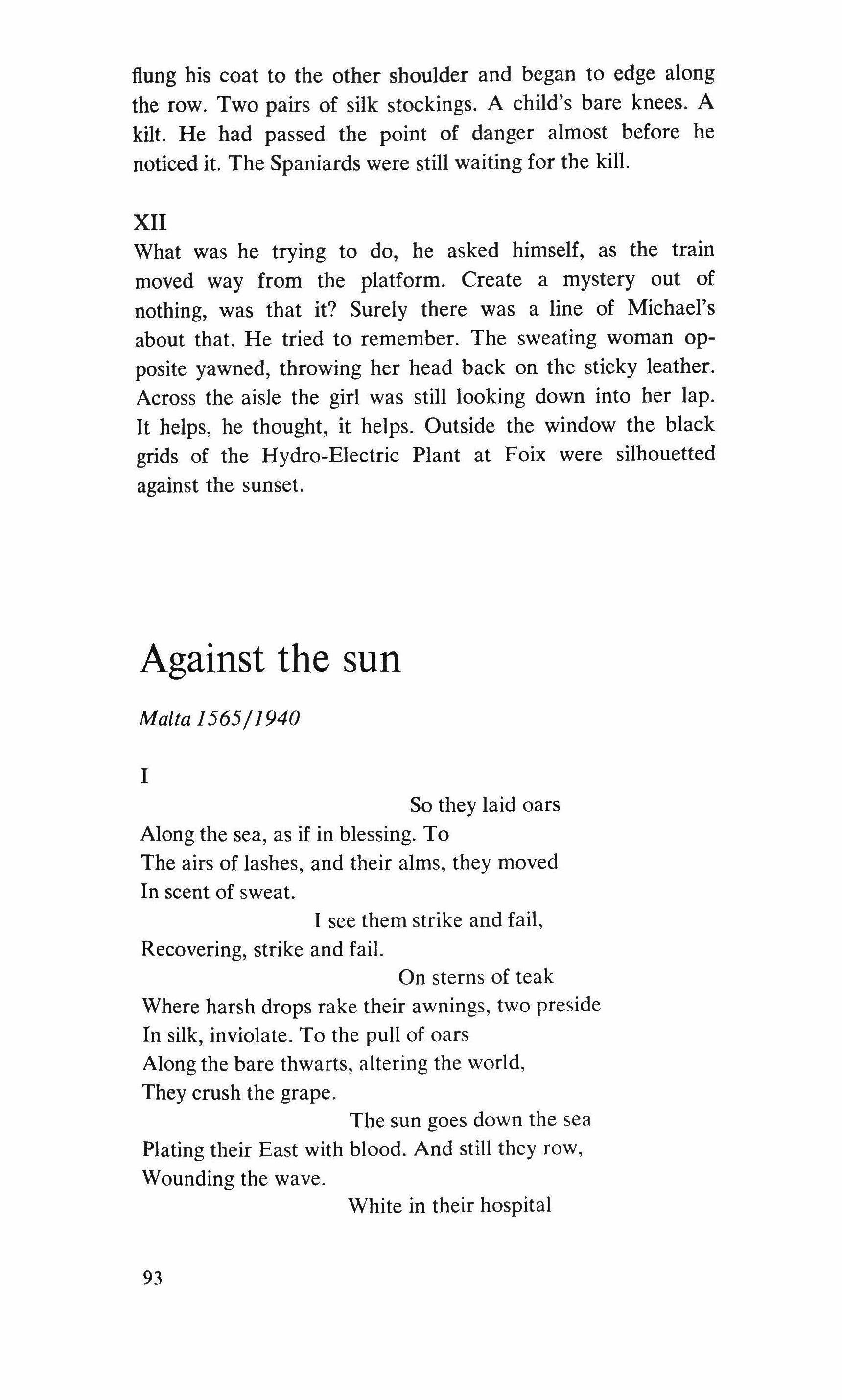
So they laid oars
Along the sea, as if in blessing. To The airs of lashes, and their alms, they moved In scent of sweat.
I see them strike and fail, Recovering, strike and fail.
On sterns of teak
Where harsh drops rake their awnings, two preside In silk, inviolate. To the pull of oars
Along the bare thwarts, altering the world, They crush the grape.
The sun goes down the sea
Plating their East with blood. And still they row, Wounding the wave.
White in their hospital
93
The cold bread served on silver to the sick Shines in the light. I see the long bells pitch Over the islands, and the pious kneel, Praying.
Under their awnings here they kneel, Doing some service.
The long whips lick at them With tongues of night. Wine soaked in Christian bread Absolves their lips. If any spit or die Their bodies marry salt. In all that sweat, In order, and rebellion, sick in soul, The slaves are power.
So the galleys move Into what wind there is.
II

I hear their wings
Freshening over Corsica. The guns Along the grey ships arch and waver. To The scream of air soon lead will faIl like rain And pit the stone.
I see their clean grey eyes Behind the wings, mounting in honour. One Lifts a gloved hand.
The screws turn. Black as crows Against the sun, they mount the beaten sky, Drilling the clouds with fire to clear the sea And lead their ships.
With paired wings, three remain Holding the gold walls.
Empire was all for them Whom these oppose. Unclassed by age or skin Their duty moves in eye and ear. All dive As one in slow flight.
Now, below crossed arms
I see the skeleton of one stripped bare And made a show. No stones, no shells remain Richer in bare defiance.
94
And so in brine
They sank the bridge of chains.

From fort to fort
The brass links bore their chill defiance to The fire of Asia.
This shall rise, and rust,
Only when every flag I see in the East Rots in our Sacristy, he swore, and crossed The bare steel in his groin.
Under the waves
It dredged and fell, blocking the harbour. There, Locked up in calm, the Christian ships lay, beached With splayed oars, like split melon.
One
With gouged pits down its hull had weathered fire In quelling Tunis. One had lain in Rhodes Gored by the shells. There, blood of Turkey lurked Under the hatches, gobbling to be clear And rise in crescent fury.
Shrink their feed, He said, and screw them from the sun.
I give
This isle a cross, another said. Its flame Withstood a night of wings.
Against their heart
All pluck and wear it, hearing in the sun
The wings descending, once again the wings Descending.
There, where the lightning struck And ranged all day, the cold star still remained, Fish on the stone.
Salt licked their lips, the sea Sprayed them with shells.
If any still believed His oar might cross the stiff bay, he was bone
III
IV
95
Crossed in the water when he sailed.
At their posts
Men drank and burned, staunching their wounds with brine
And sterile cloths. Where surgeons lived, they came With cautery and metal.
If the surgeons died, They pitched their bodies in the trench. Unburied, The rotten flesh swelled, burning in the sun Against their pummelled clay.
And wind, Lifting hot silks, connived with death. Disease, Essence of slow death, spiralled.
v

On the floor of the nave
Where knights in coloured stone lay in their arms
Two dropped a body. There it was dark, and stale As lard with burnt out wax.
An old woman paused, Lighting a candle, to look up.
It was
His nephew, one said, and ran back.
Between
The flags, beyond the coil of guns, Hands parted, he was penned in tactics. He Is dead, he died well, someone said.
He came
In marred steel, breathless. As he crossed himself Beside the dead skin, she held up her flame Over the face.
One effigy of war
In wax and blood, with rough hands gripped in grief, Stuck in his mind from Rhodes. A man could paint The Baptist with his hacked head off, and miss A mother in the shade.
He touched her hand, Sour in the groin with dead seed. For your pains,
96
He said, and gave her gold.
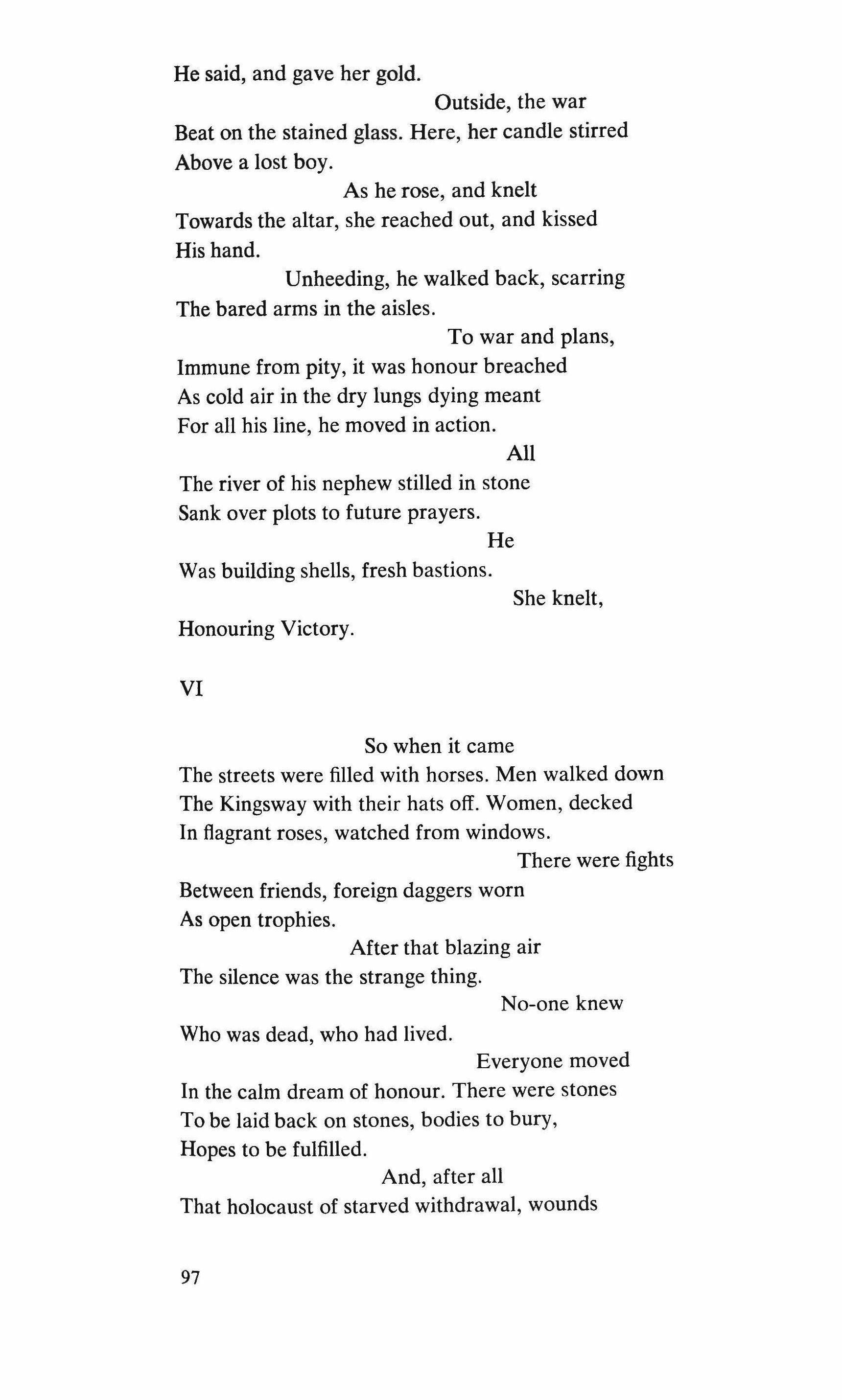
Outside, the war
Beat on the stained glass. Here, her candle stirred Above a lost boy.
As he rose, and knelt
Towards the altar, she reached out, and kissed His hand.
Unheeding, he walked back, scarring
The bared arms in the aisles.
To war and plans,
Immune from pity, it was honour breached
As cold air in the dry lungs dying meant
For all his line, he moved in action.
All
The river of his nephew stilled in stone
Sank over plots to future prayers.
He
Was building shells, fresh bastions.
She knelt, Honouring Victory.
VI
So when it came
The streets were filled with horses. Men walked down
The Kingsway with their hats off. Women, decked In flagrant roses, watched from windows.
There were fights
Between friends, foreign daggers worn
As open trophies.
After that blazing air
The silence was the strange thing.
Who was dead, who had lived.
No-one knew
Everyone moved
In the calm dream of honour. There were stones
To be laid back on stones, bodies to bury, Hopes to be fulfilled.
And, after all
That holocaust of starved withdrawal, wounds
97
Licked and re-opened, ordinary grief
At private scores.
Watching the last few gulls Grey in the dockyard, hearing bald-headed men
Telling the stories, I return again
To the Armoury.
Here the heroic wars Blaze in their oiled shields.
Here the impregnable dream Halts on the islands in its final haze.
At Hunegg
on the Thunersee, circa 1901
1
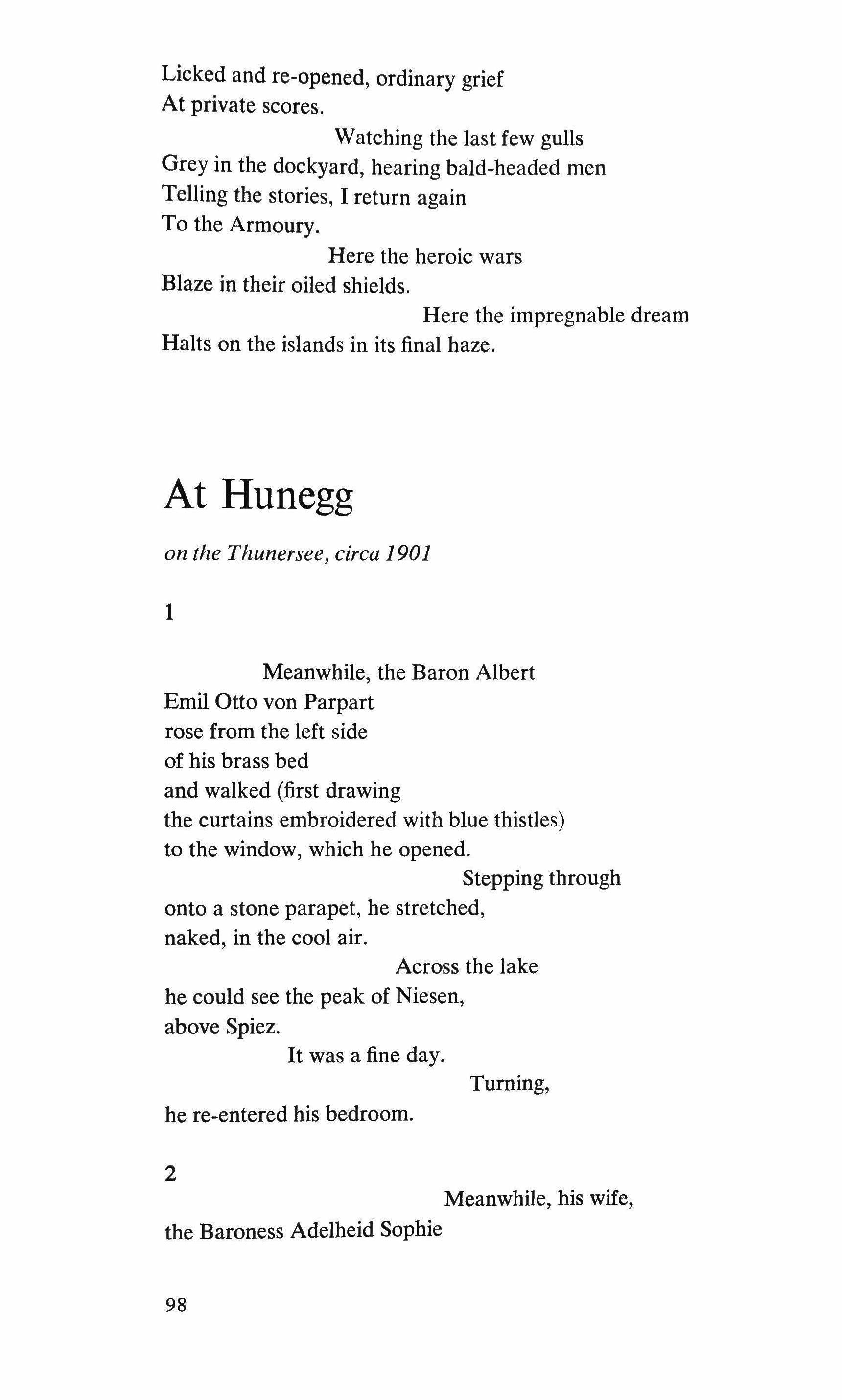
Meanwhile, the Baron Albert Emil Otto von Parpart rose from the left side of his brass bed and walked (first drawing the curtains embroidered with blue thistles) to the window, which he opened.
Stepping through onto a stone parapet, he stretched, naked, in the cool air.
Across the lake
he could see the peak of Niesen, above Spiez. It was a fine day.
Turning, he re-entered his bedroom.
2
Meanwhile, his wife, the Baroness Adelheid Sophie
98

Margaretta nee von Bonstetten, rose from the right side of his brass bed, which was also hers, and walked (first drawing the curtains embroidered with blue thistles) to her dressing-room.
There,
beneath a cylindrical, brass chandelier fashioned with rosettes, she waited, seated naked at her white dressing-table, until such time as the Baron should have washed.
(There was only one bathroom.)
3
Meanwhile, the Baron, having greeted the day, proceeded to the glory of his ablutions.
Passing through the first of several mahogany doors, he arrived, almost a little breathless, on the upper level of his bathroom.
There he settled, with some ceremony, his naked buttocks on the lowered oak of his English water-closet.
Evacuating at his bare ease, the detritus of the evening's brilliance into clear water, he rose (as Christ) a second time, and flushed what was left of himself to the lake of Thun.
Through a linked series of ingenious pipes, it fell down forty feet of landscaped elegance to amaze the perch.
4
Meanwhile, the Baron, unmindful of these metallic services,
99
bent down to the sheet steel of his hip-bath.
Kneeling in this, as to the pew in their chapel his ancestors, he absolved himself, with much grunting, and a little exercise, of the body's dirt, which is the sins of the flesh.
So cleansed, upright at the mirror above the hand-basin, in a white bath-robe, the Baron shaved.
A little blood flecked the marble as he picked off some alert prominence in the noble chin.
He dabbed at the shorn skin.
5
Meanwhile, his wife, having thought over the day's impressing obligations, containing her luxuriant wastes, as best she might, on plaited cane, grew restive.
He was longer than usual. She sulked.
6
Meanwhile, the Baron, having freed the temple of his deserts, the body, of the night's adhesions, descended to the second level of his bathroom.
Throwing aside the bath-robe, he began the slow process of powdering himself.
Thereafter,
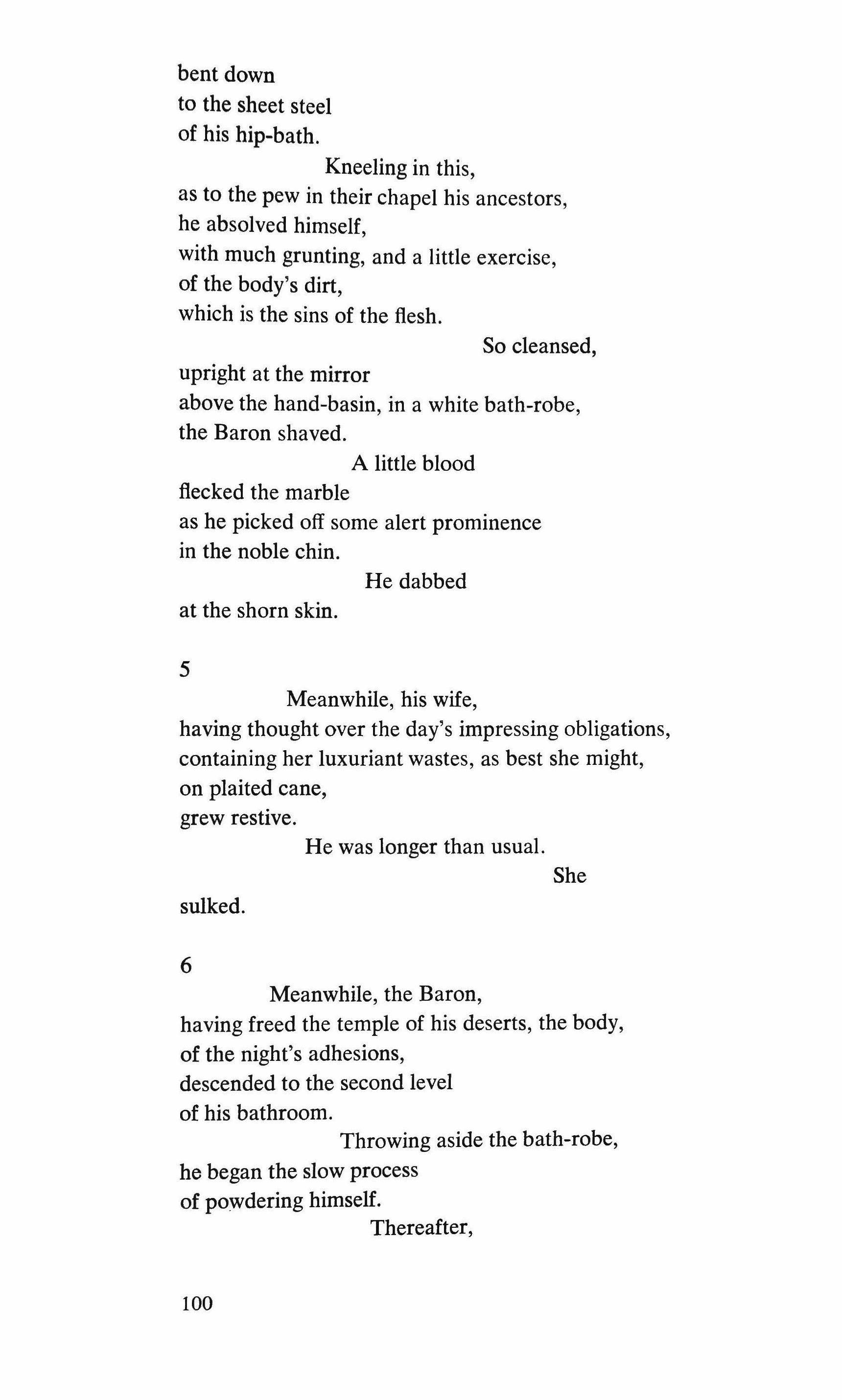
100
again naked, he strode to his dressing-room.
On the glass-topped table, beside his riding-boots, a manual of Gymnastic Exercises lay open. He tugged the tasselled bell-pull in the door-way to inform his wife her way was clear.
With a sigh, she moved, at some speed, and in perfumed openness, to the seat of her relief.
Meanwhile, the Baron
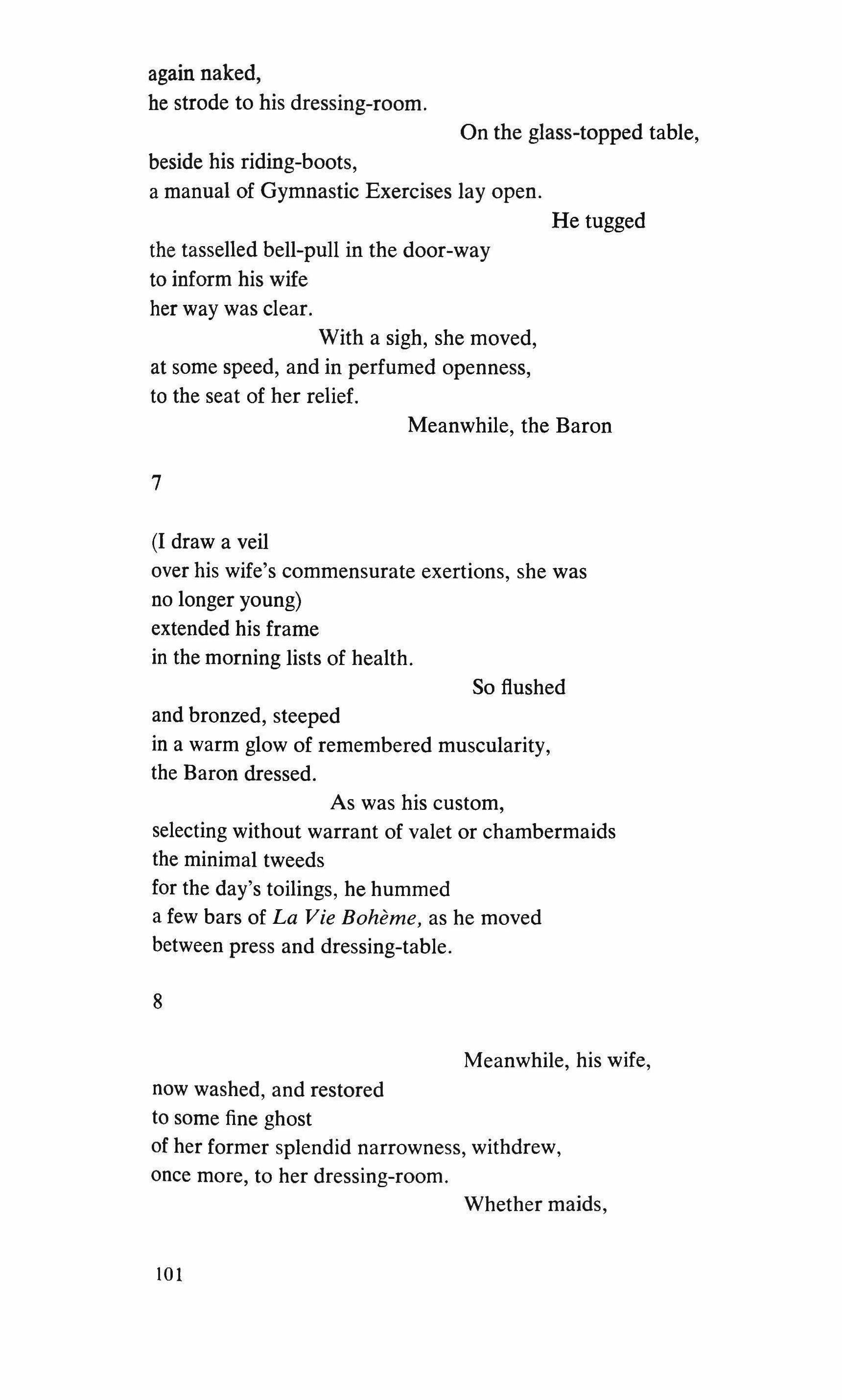
7
(1 draw a veil over his wife's commensurate exertions, she was no longer young) extended his frame in the morning lists of health.
So flushed and bronzed, steeped in a warm glow of remembered muscularity, the Baron dressed.
As was his custom, selecting without warrant of valet or chambermaids the minimal tweeds for the day's toilings, he hummed a few bars of La Vie Boheme, as he moved between press and dressing-table.
8
Meanwhile, his wife, now washed, and restored to some fine ghost of her former splendid narrowness, withdrew, once more, to her dressing-room.
Whether maids,
101
masseurs, or her own mere sleight of hand, had achieved such miracles as had been achieved, discretion conceals.
In her clothes, thrown on with care, though quickly, she presented a firm spectacle.
9
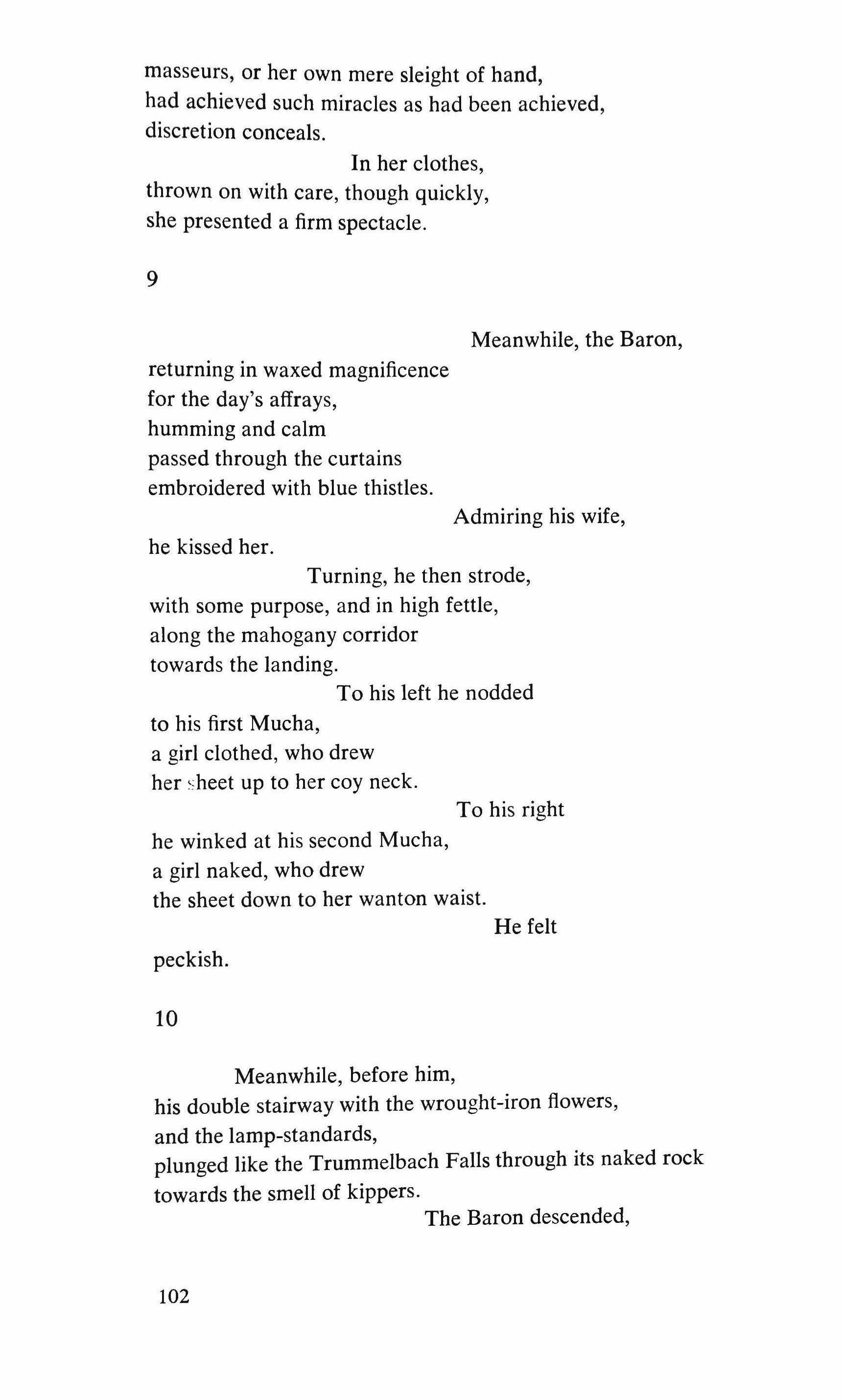
Meanwhile, the Baron, returning in waxed magnificence for the day's affrays, humming and calm passed through the curtains embroidered with blue thistles.
Admiring his wife, he kissed her.
Turning, he then strode, with some purpose, and in high fettle, along the mahogany corridor towards the landing.
To his left he nodded to his first Mucha, a girl clothed, who drew her sheet up to her coy neck.
To his right he winked at his second Mucha, a girl naked, who drew the sheet down to her wanton waist. He felt peckish.
10
Meanwhile, before him, his double stairway with the wrought-iron flowers, and the lamp-standards, plunged like the Trummelbach Falls through its naked rock towards the smell of kippers. The Baron descended,
102

as do the angels, even, sometimes, to the satisfaction of the fleshly appetities.
On the shell terrace, in the sound of falling water, the Baron attended, opening his letters with an ivory paper-knife, to all intents and purposes amused, his wife's delayed arrival.
It was the year of Jugendstil.
A vase by Lalique drooped a florescence of contrived water-lilies above his bending head. 11
Meanwhile, his wife, already tapping the yew balustrade in some distemper with her manicured nails, was on her way to join him.
Knowing this, and the minutiae of her habits to the last detail, the Baron rose.
Ringing for breakfast, he allowed the perfect Swiss clock of the world to resume motion, as it would continue to do, without interruption, for exactly thirteen years, four months, and one day.
Knowing this, too, perhaps, or having arranged it, as so many other things, the Baron ate, without sparing, cheese, rolls, marmalade, eggs, meat and honey-cake, and, when he had finished, wiped his mouth on his napkin, belched, and, with a perfect conscience, shot himself through the brain.
103
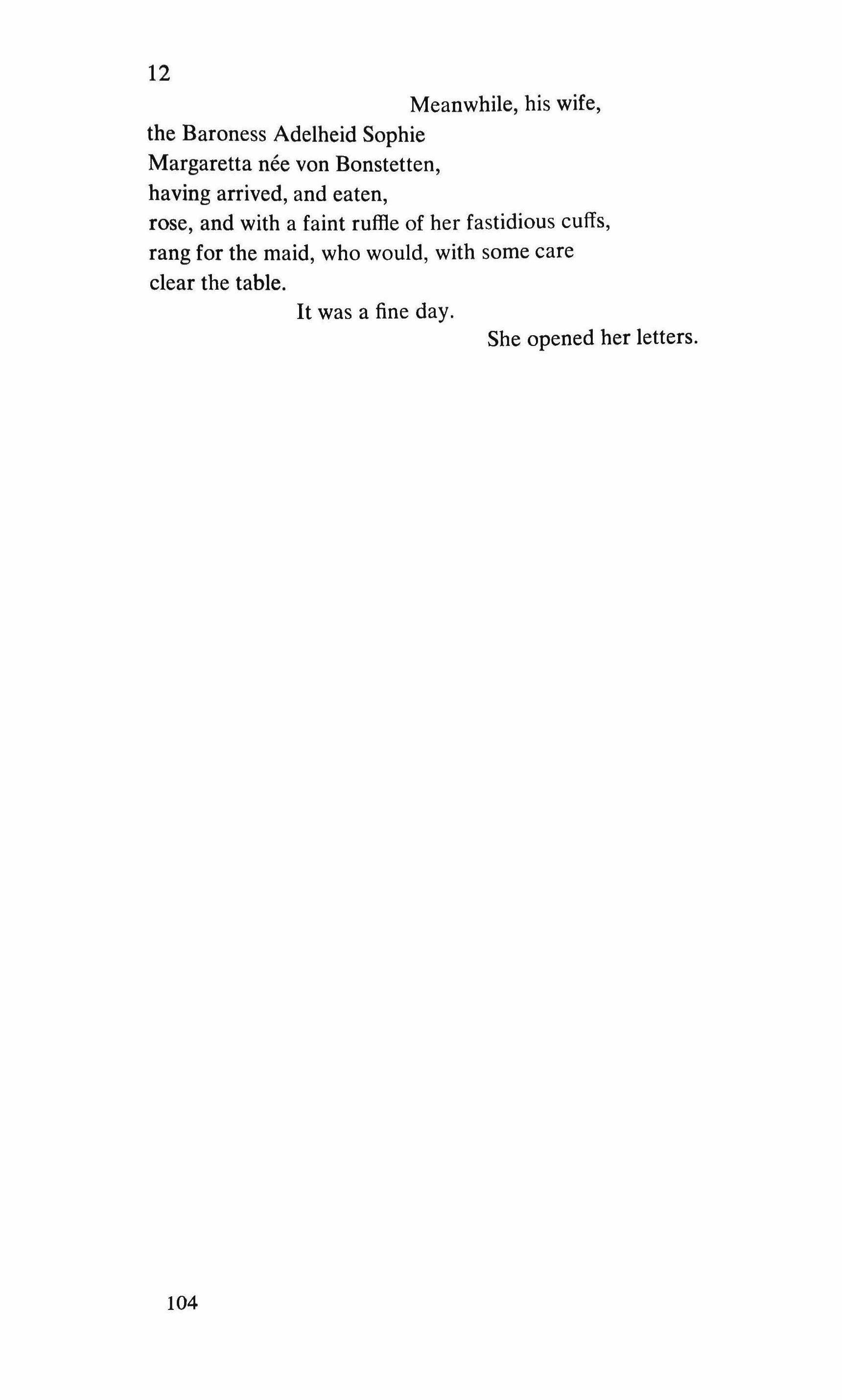
Meanwhile, his wife, the Baroness Adelheid Sophie Margaretta nee von Bonstetten, having arrived, and eaten, rose, and with a faint ruffle of her fastidious cuffs, rang for the maid, who would, with some care clear the table. It was a fine day. She opened her letters.
12
104
GAEL TURNBULL
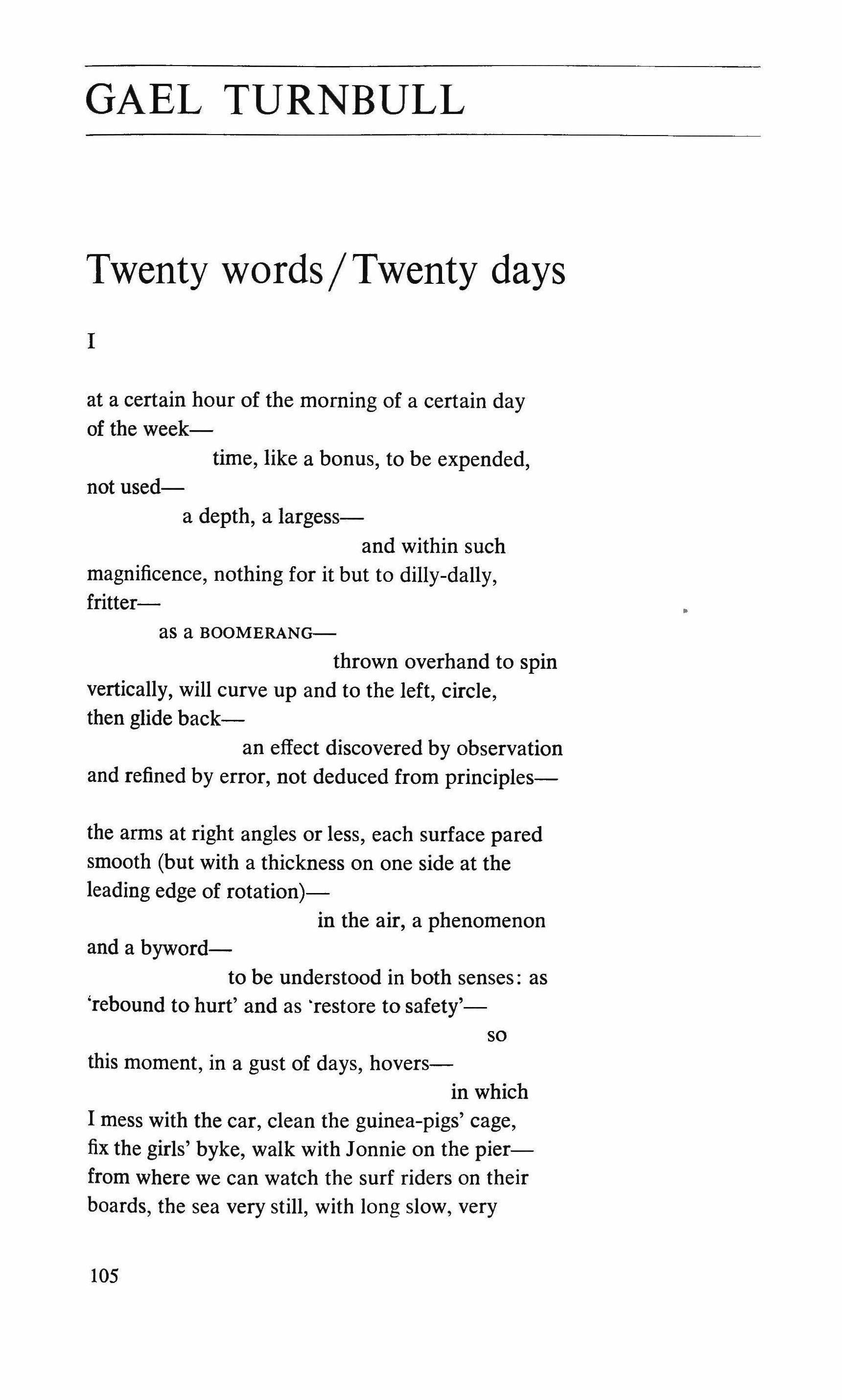
Twenty words/Twenty days
Iat a certain hour of the morning of a certain day of the weektime, like a bonus, to be expended, not used-
a depth, a largessand within such magnificence, nothing for it but to dilly-dally, fritteras a BOOMERANGthrown overhand to spin vertically, will curve up and to the left, circle, then glide back-
an effect discovered by observation and refined by error, not deduced from principlesthe arms at right angles or less, each surface pared smooth (but with a thickness on one side at the leading edge of rotation)in the air, a phenomenon and a bywordto be understood in both senses: as 'rebound to hurt' and as 'restore to safety'so this moment, in a gust of days, hoversin which I mess with the car, clean the guinea-pigs' cage, fix the girls' byke, walk with Jonnie on the pierfrom where we can watch the surf riders on their boards, the sea very still, with long slow, very
105
slow breakers-
coiling, uncoiling, recoilingreturning, turning upon the shore-
II
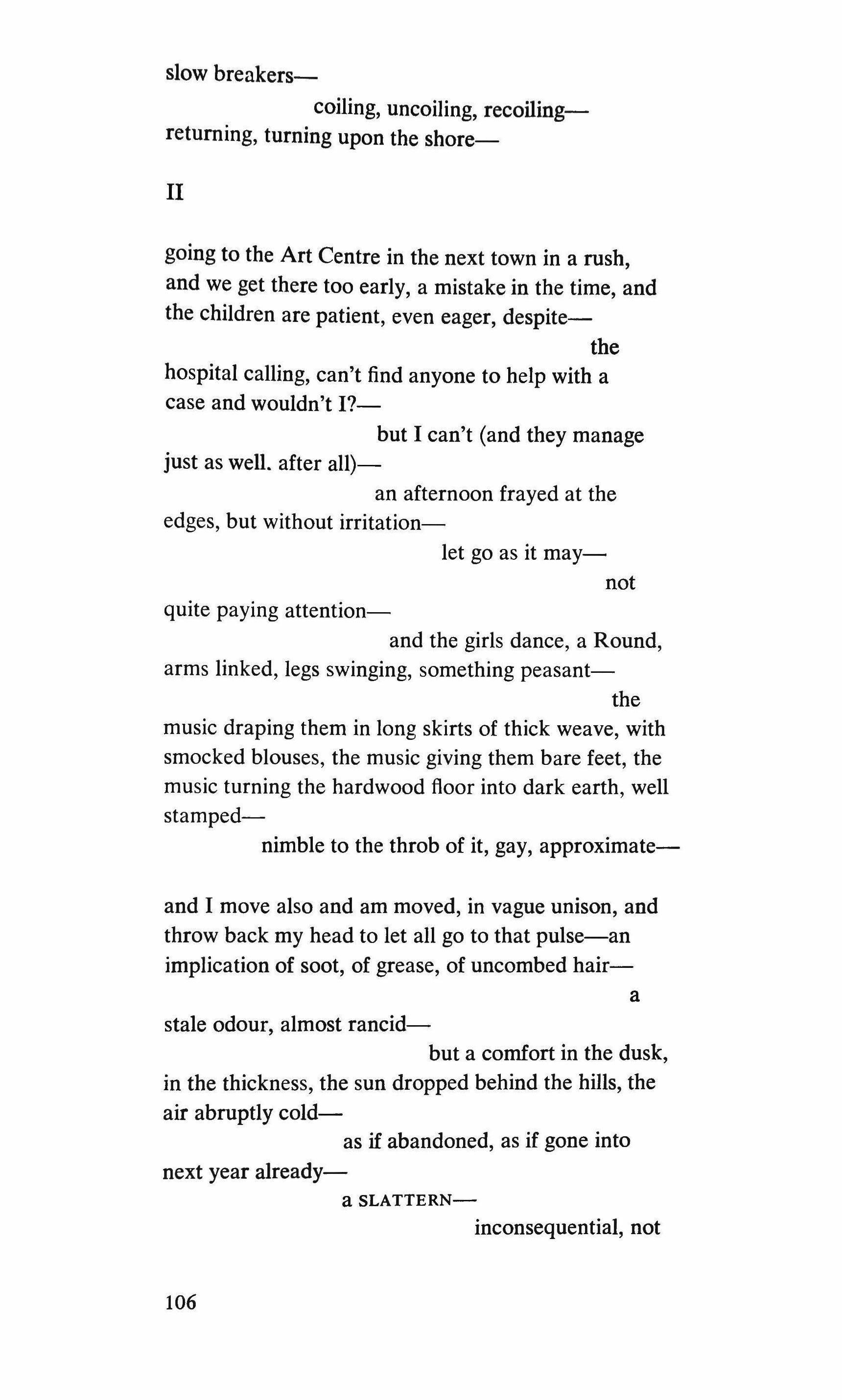
going to the Art Centre in the next town in a rush, and we get there too early, a mistake in the time, and the children are patient, even eager, despitethe hospital calling, can't find anyone to help with a case and wouldn't I?but 1 can't (and they manage just as well. after all)an afternoon frayed at the edges, but without irritationlet go as it maynot quite paying attentionand the girls dance, a Round, arms linked, legs swinging, something peasantthe music draping them in long skirts of thick weave, with smocked blouses, the music giving them bare feet, the music turning the hardwood floor into dark earth, well stampednimble to the throb of it, gay, approximateand 1 move also and am moved, in vague unison, and throw back my head to let all go to that pulse-an implication of soot, of grease, of uncombed haira stale odour, almost rancidbut a comfort in the dusk, in the thickness, the sun dropped behind the hills, the air abruptly coldas if abandoned, as if gone into next year alreadya SLATTERNinconsequential, not
106

straight in the eyelacking somethingif not lacking charmIII
a world awry as I read-
a letter from a friend-
from a presbyterian standpoint what I'm doing is unthinkable-from a French standpoint it's simply poorly handled-but from the standpoint of authentic something or other it's right and I don't regret and myself snagged, almost throttled, as if I had been the onebut which one?-
". we hiked all through the Sierras, living for three weeks off the fish attempted to break it off, but she had restored to me a sense of joy and I was at a loss without her to see my wife suffering was also unbearable " as a cord pulled together-
a DRAWSTRINGand I, in reply, tumbling words, with nothing to say, nothingexcept, "Yes, of course of course, yes and I know and I couldn't and can eager, eager for the bait, that source and lure, there at the bottom of the bagthe loop pulled tight, lifted into dark by the hand of the hunterthe fabric taut as I strainmyself taken, snaredby a thin line straggled on paper-
107
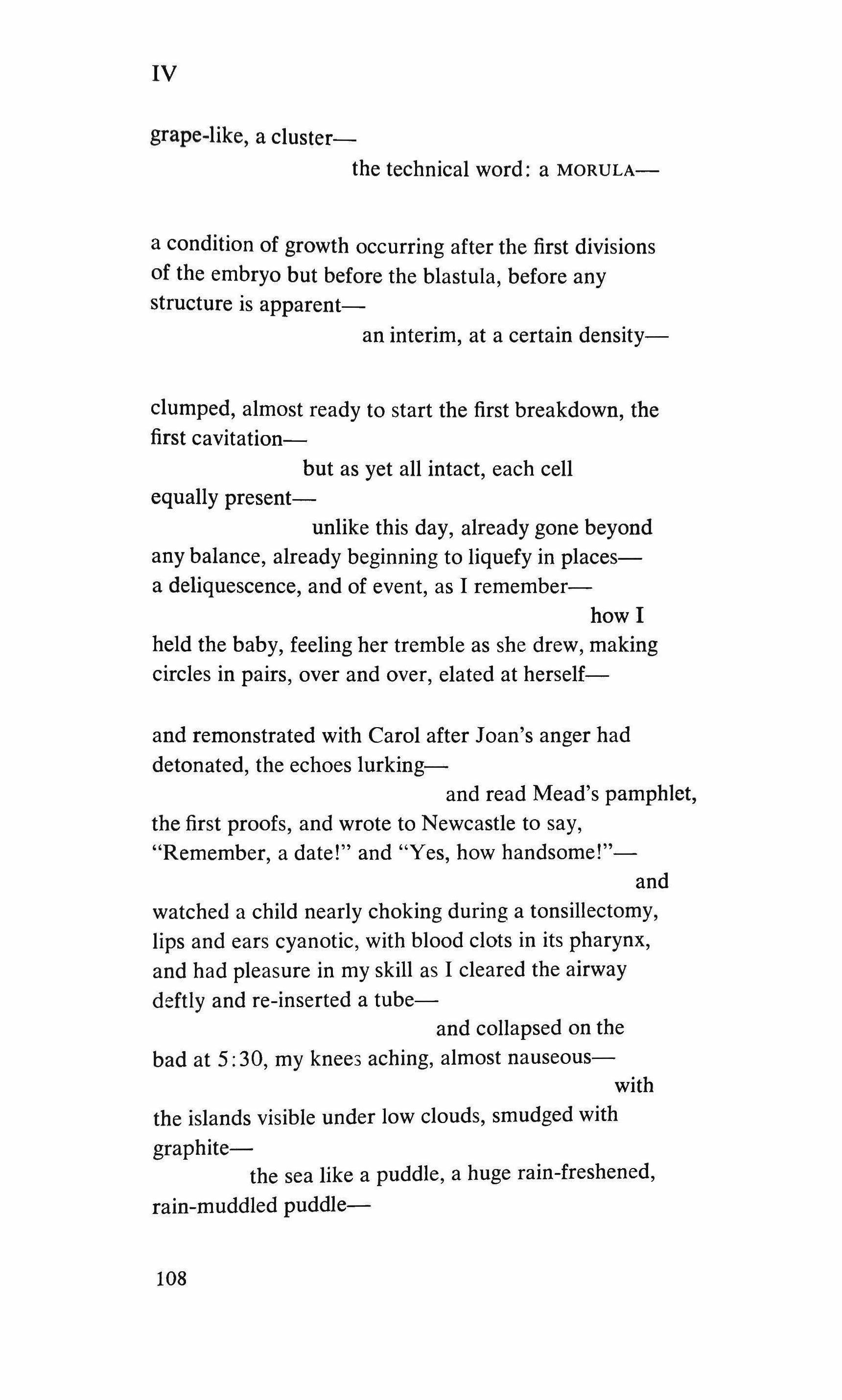
grape-like, a clusterthe technical word: a MORULAa condition of growth occurring after the first divisions of the embryo but before the blastula, before any structure is apparentan interim, at a certain densityclumped, almost ready to start the first breakdown, the first cavitationbut as yet all intact, each cell equally presentunlike this day, already gone beyond any balance, already beginning to liquefy in placesa deliquescence, and of event, as I rememberhowl held the baby, feeling her tremble as she drew, making circles in pairs, over and over, elated at herselfand remonstrated with Carol after Joan's anger had detonated, the echoes lurkingand read Mead's pamphlet, the first proofs, and wrote to Newcastle to say, "Remember, a date!" and "Yes, how handsome!"and watched a child nearly choking during a tonsillectomy, lips and ears cyanotic, with blood clots in its pharynx, and had pleasure in my skill as I cleared the airway deftly and re-inserted a tubeand collapsed on the bad at 5: 30, my knees aching, almost nauseouswith the islands visible under low clouds, smudged with graphitethe sea like a puddle, a huge rain-freshened, rain-muddled puddle-
IV
108
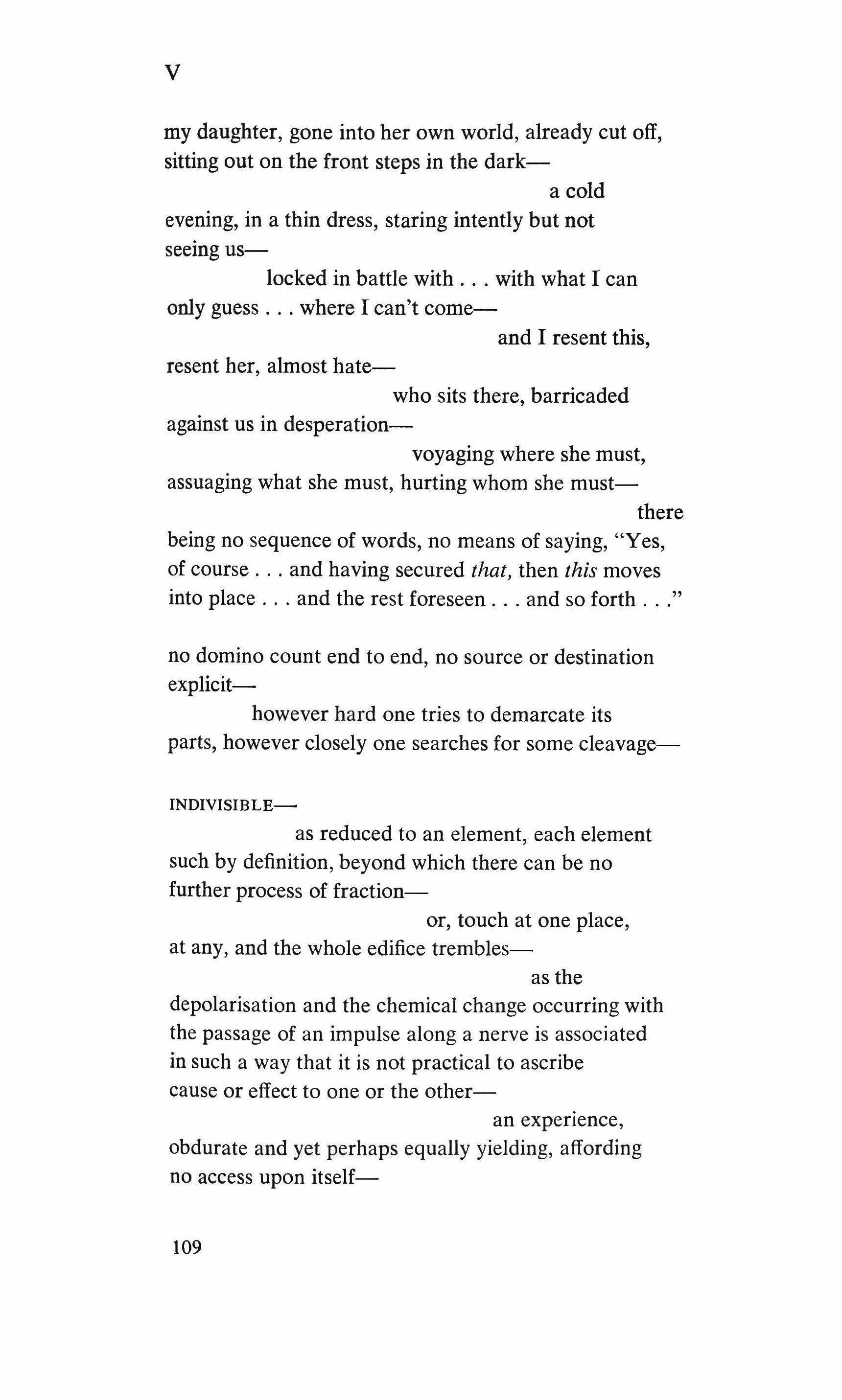
my daughter, gone into her own world, already cut off, sitting out on the front steps in the darka cold evening, in a thin dress, staring intently but not seemguslocked in battle with with what I can only guess where I can't comeand I resent this, resent her, almost hatewho sits there, barricaded against us in desperationvoyaging where she must, assuaging what she must, hurting whom she mustthere
being no sequence of words, no means of saying, "Yes, of course and having secured that, then this moves into place and the rest foreseen and so forth
no domino count end to end, no source or destination explicithowever hard one tries to demarcate its parts, however closely one searches for some cleavage-
INDIVISIBLE-
as reduced to an element, each element such by definition, beyond which there can be no further process of fractionor, touch at one place, at any, and the whole edifice tremblesas the depolarisation and the chemical change occurring with the passage of an impulse along a nerve is associated in such a way that it is not practical to ascribe cause or effect to one or the other-
an experience, obdurate and yet perhaps equally yielding, affording no access upon itself-
v
109
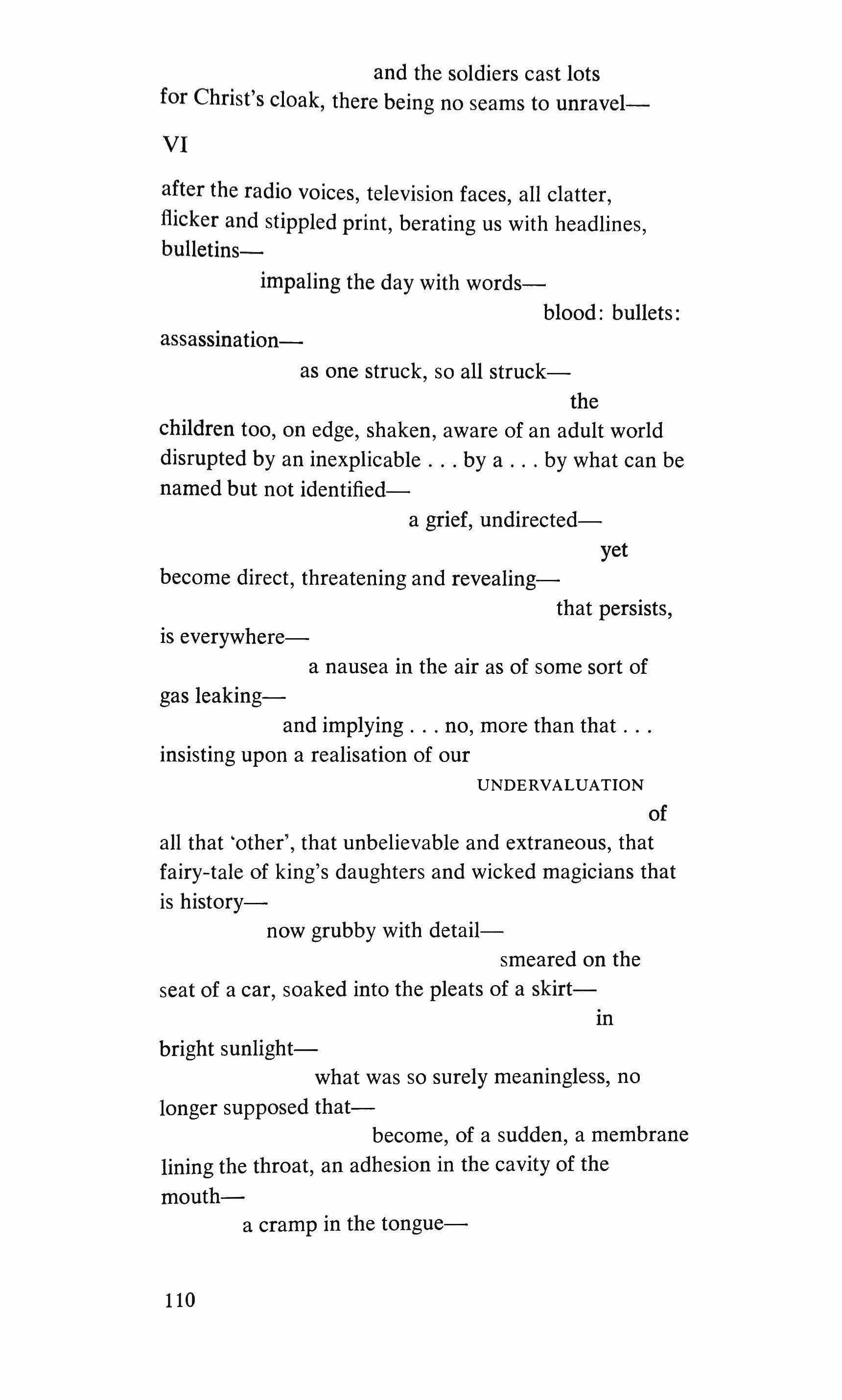
and the soldiers cast lots for Christ's cloak, there being no seams to unravelVI
after the radio voices, television faces, all clatter, flicker and stippled print, berating us with headlines, bulletins-
impaling the day with wordsblood: bullets: assassinationas one struck, so all struckthe children too, on edge, shaken, aware of an adult world disrupted by an inexplicable by a by what can be named but not identifieda grief, undirectedyet become direct, threatening and revealingthat persists, is everywherea nausea in the air as of some sort of gas leakingand implying no, more than that insisting upon a realisation of our UNDERVALUATION of all that 'other', that unbelievable and extraneous, that fairy-tale of king's daughters and wicked magicians that is historynow grubby with detailsmeared on the seat of a car, soaked into the pleats of a skirtill bright sunlightwhat was so surely meaningless, no longer supposed thatbecome, of a sudden, a membrane lining the throat, an adhesion in the cavity of the moutha cramp in the tongue-
110

urgent, requires an answer, a query:
can you think of some gay title for the reading ?" at once, it's no problembut instead, I think of my forefathers, namesakes, Borderers, near Jedburgh and Melrose, and one day every tenth man hanged for cattle stealing, on 'general principles' and 'as a caution'that father mine, was he one of the ninein-between, his luck good?ah, great luck, to survive to write this and foresee-
myself, in a far place, a future time-
an APPARITION-
a thousand miles, a few weeks hence, all planned, where and when, and I anticipatethat self, there, genial, speaking as if with knowledge, to whom others attend, a public occasion, with crowded facesasking to be shown to be held to be astonishedas birds in migrationas cattle thievesand to be gaythat is: apt, which means both relevant to the material and having an impulse within itself, an identity as to phrasea pressure and a presenceand happy, that is: containing joy and contained byas this evening: the sunset, a fine twilight, clear air, with a cobblestone drift of rose-petal cloudsas my thought moves, is ableappears obvious,
VII
111

hits squarefills out the sky of this paperand repliesVIII
described by Miss Ann Dart, as he was visiting Bristol, while still a youth: Turner-
not like other young people but singular and very silent no facility for friendship but never other than pleasant seemed uneducated, difficult to understand sometimes going out sketching before breakfast and again after supper desirous of nothing but improvement in his art " a
VALENCY-
defined as: an expression in terms of small digits of an ability to unite with other like integersa ratio, denoting specificity, an exactionand at approximately 5: 45 p.m. a child brought in to the hospital that had tripped, struck her headnot much more than dazed at first, then slowly lapsing, until rapidly depressed, the breathing almost arrested-
"linear fracture of the skull in the left temporoparietal area"
a decision, and with decisionto surgery, each of us in place, to accomplish what must bean incision-
at 4: 17 p.m. the fault exposed, a torn artery ligated, a clot removed, the brain free to expandwithout words or only of triviabonded by
112
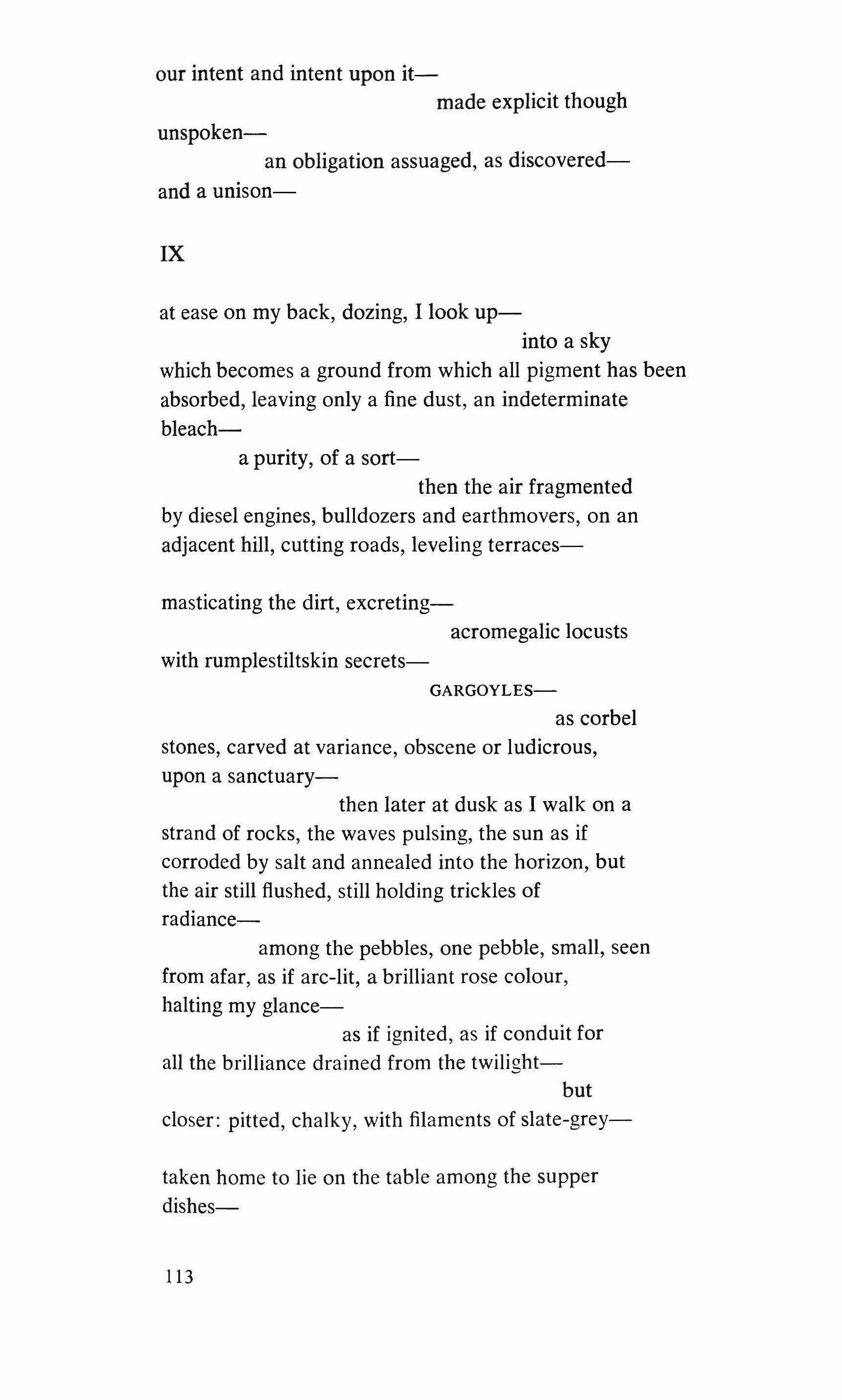
our intent and intent upon itmade explicit though unspokenan obligation assuaged, as discoveredand a unison-
IX
at ease on my back, dozing, I look upinto a sky which becomes a ground from which all pigment has been absorbed, leaving only a fine dust, an indeterminate bleacha purity, of a sortthen the air fragmented by diesel engines, bulldozers and earthmovers, on an adjacent hill, cutting roads, leveling terracesmasticating the dirt, excretingacromegalic locusts with rumplestiltskin secrets-
GARGOYLESas corbel stones, carved at variance, obscene or ludicrous, upon a sanctuarythen later at dusk as I walk on a strand of rocks, the waves pulsing, the sun as if corroded by salt and annealed into the horizon, but the air still flushed, still holding trickles of radianceamong the pebbles, one pebble, small, seen from afar, as if arc-lit, a brilliant rose colour, halting my glanceas if ignited, as if conduit for all the brilliance drained from the twilightbut closer: pitted, chalky, with filaments of slate-greytaken home to lie on the table among the supper dishes-
113
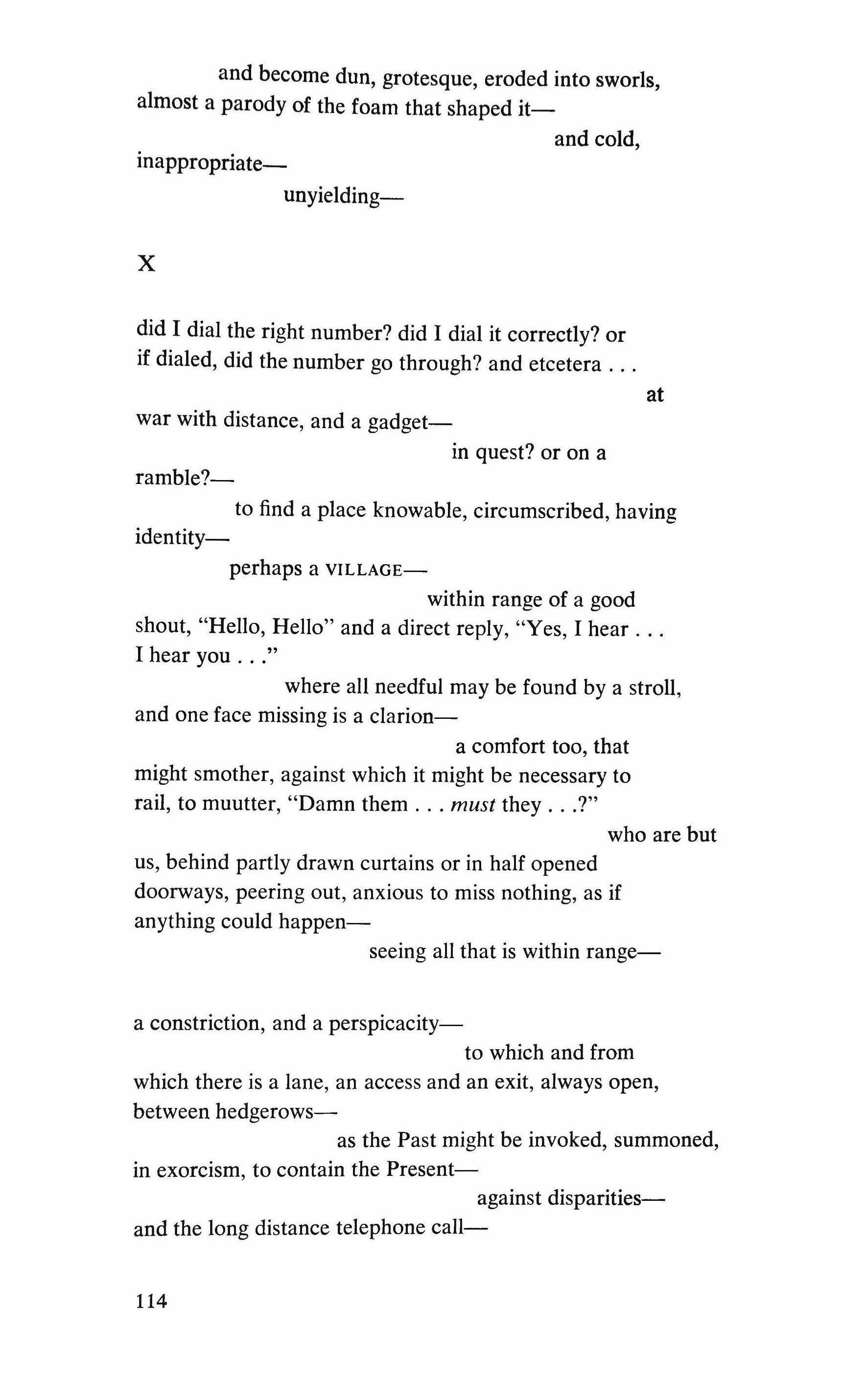
and become dun, grotesque, eroded into sworls, almost a parody of the foam that shaped itand cold, inappropriateunyieldingx
did I dial the right number? did I dial it correctly? or if dialed, did the number go through? and etcetera at war with distance, and a gadgetin quest? or on a ramble?-
to find a place knowable, circumscribed, having identityperhaps a VILLAGE-
within range of a good shout, "Hello, Hello" and a direct reply, "Yes, I hear I hear you
where all needful may be found by a stroll, and one face missing is a clarion-
a comfort too, that might smother, against which it might be necessary to 'I "0 h h?" ral to muutter, amn t em, must t ey who are but us, behind partly drawn curtains or in half opened doorways, peering out, anxious to miss nothing, as if anything could happen-
seeing all that is within rangea constriction, and a perspicacityto which and from which there is a lane, an access and an exit, always open, between hedgerowsas the Past might be invoked, summoned, in exorcism, to contain the Presentagainst disparitiesand the long distance telephone call-
114

a white object floating on the river, though its whole surface is light against the water, yet the reflection has not any light but on the contrary is dark and not only darker, but the reflection appears longer than the object which occasions it perhaps often seen but not hitherto remarkeda peculiarityas a catalyst, the reaction proceedingIRREVERSIBLEand heat, as a bonus supplied, an excess of energy liberatedor absorbedand I, with a friend, suddenly aware that I'm talking more rapidly than I was, as if to convince someone (perhaps myself) of an opinion that I've swallowed, a refrainof injustice in the courts, a man hung in error, documented, palpable, gross, and not yet even partially acknowledgedwith conviction as fuel, as acceleration, my face flushed, and my wordsa reflection of lightnow darkdisproportionatepast recallXII of or having to do with a method of helping to bring out ideas latent in the mindfrom the Greek, literally, 'obstetric'-
XI
115
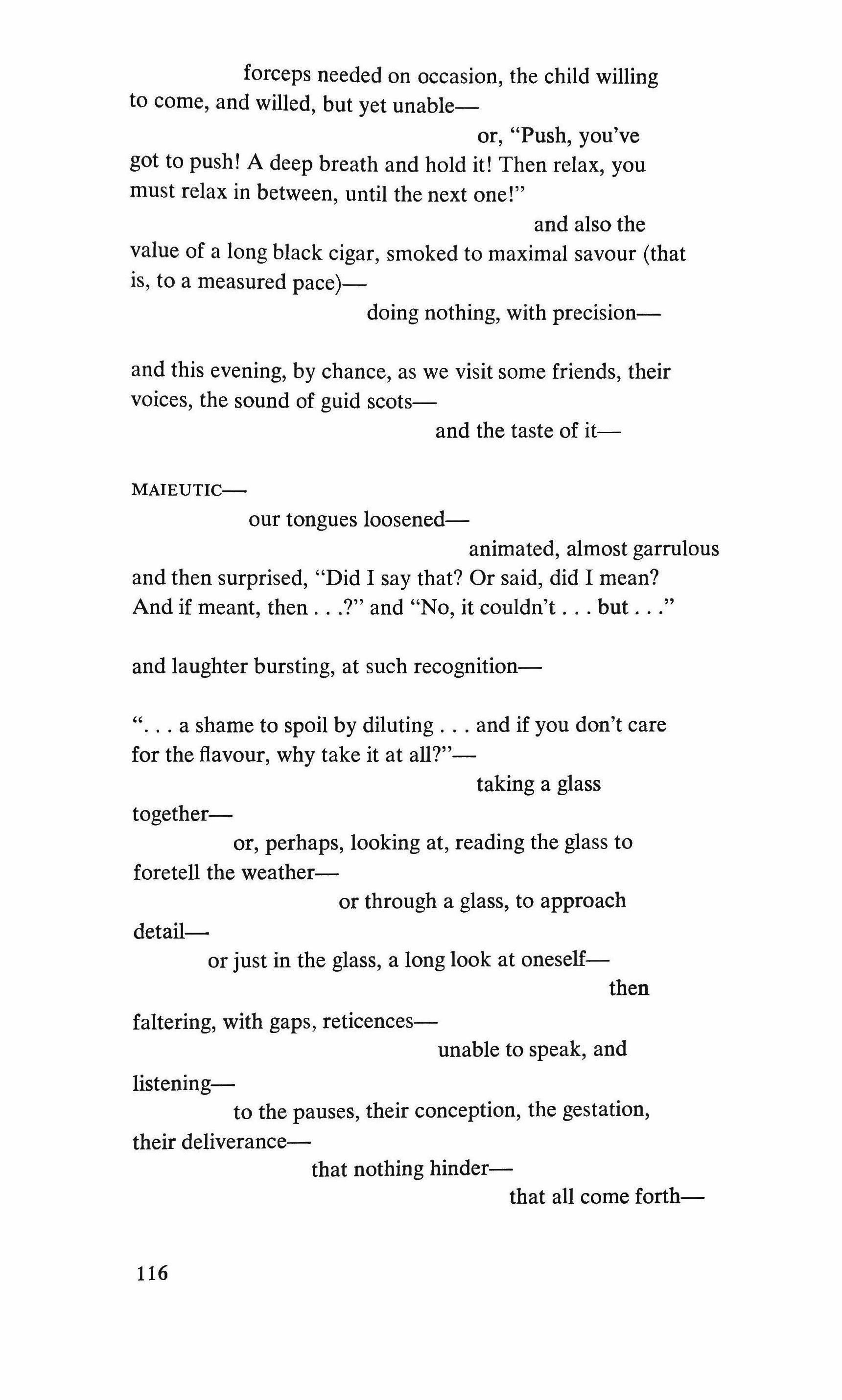
forceps needed on occasion, the child willing to come, and willed, but yet unableor "Push you've got to push! A deep breath and hold it! Then relax, you must relax in between, until the next one!" and also the value of a long black cigar, smoked to maximal savour (that is, to a measured pace)doing nothing, with precisionand this evening, by chance, as we visit some friends, their voices, the sound of guid scotsand the taste of it-
MAIEUTICour tongues loosenedanimated, almost garrulous and then surprised, "Did I say that? Or said, did I mean? And if meant, then ?" and "No, it couldn't but and laughter bursting, at such recognitiona shame to spoil by diluting and if you don't care for the flavour, why take it at all?"taking a glass togetheror, perhaps, looking at, reading the glass to foretell the weatheror through a glass, to approach detailor just in the glass, a long look at oneselfthen faltering, with gaps, reticencesunable to speak, and listeningto the pauses, their conception, the gestation, their deliverancethat nothing hinderthat all come forth-
116
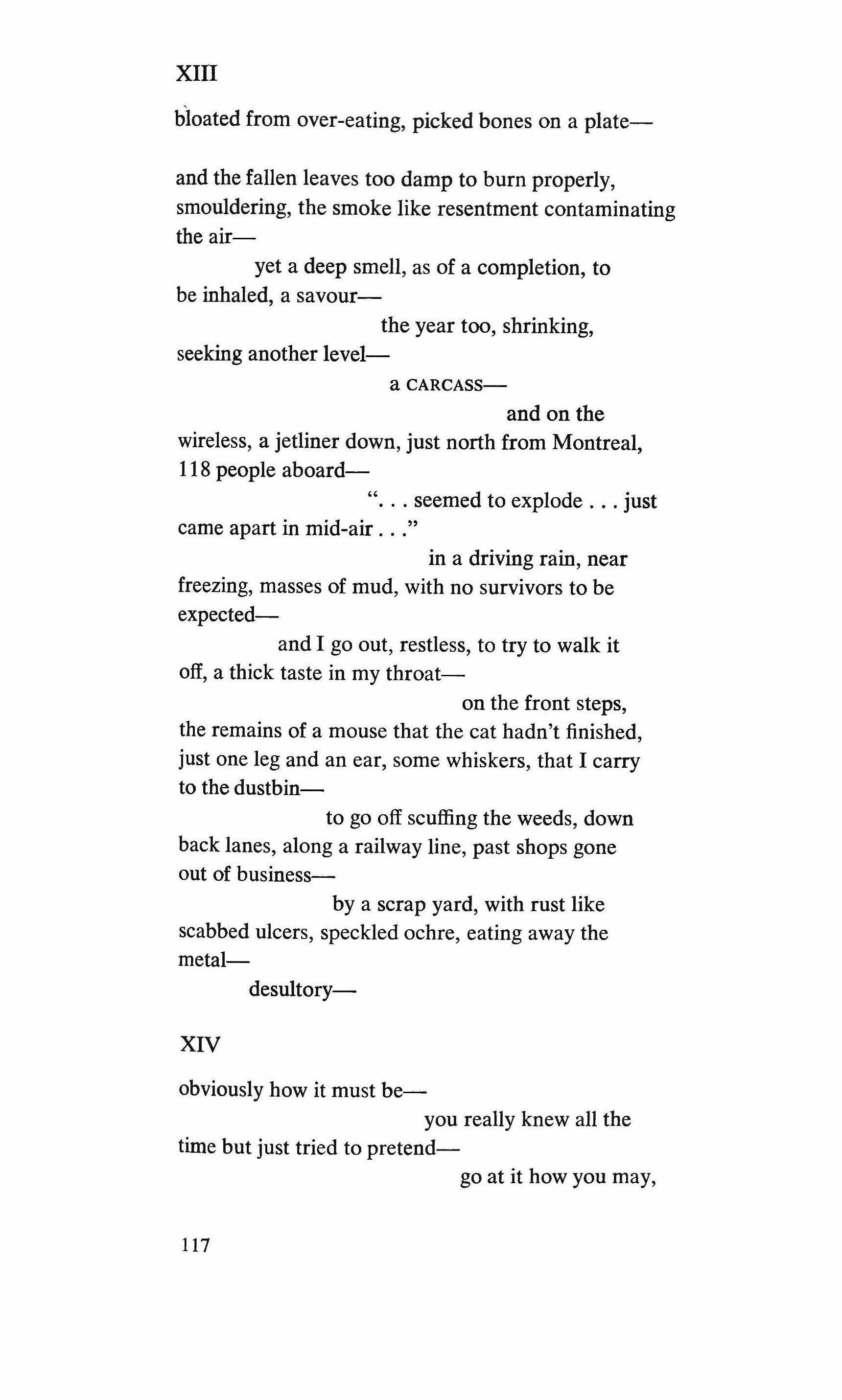
bloated from over-eating, picked bones on a plateand the fallen leaves too damp to burn properly, smouldering, the smoke like resentment contaminating the air-
yet a deep smell, as of a completion, to be inhaled, a savourthe year too, shrinking, seeking another levela CARCASSand on the wireless, a jetliner down, just north from Montreal, 118 people aboard-
seemed to explode just came apart in mid-air
in a driving rain, near freezing, masses of mud, with no survivors to be expected-
and I go out, restless, to try to walk it off, a thick taste in my throat-
on the front steps, the remains of a mouse that the cat hadn't finished, just one leg and an ear, some whiskers, that I carry to the dustbin-
to go off scuffing the weeds, down back lanes, along a railway line, past shops gone out of businessby a scrap yard, with rust like scabbed ulcers, speckled ochre, eating away the metal-
desultory-
XIV
obviously how it must beyou really knew all the time but just tried to pretendgo at it how you may,
XIII
117
it will end up the same-
strident, a voice from a box: a man protection, the effective protection he needs, with three times the power of any other deodorant, ."
did you have to be told?-
a NINCOMPOOP!and Jean-Louis
Barrault, in 'Les Enfants du Paradis', lugubrious, in front of a raucous crowd, with unguent limbs, drooping sleeves, pantaloons-
moving as if to move were to betray all (and yet his only hope, his hope of what?)and his eyes as if the lids were shut tightly but behind rather than in front of his eyeballs so that at first glance he appeared to be looking out but in fact was looking in, and had shut his eyes at that sight-
yes, there he was, a posture!and you, where have you been ,? nodding ,?-
a silly ass, to suppose that the answers aren't given at the back of the bookan utter goof, to expect anything-
more than the obvious-

"I'm sure I can find a thing of some kind, a good kind of thing to do with my string"
the forward path of the poet into the labyrinthnot
a poet, be it noted, but the poet, that ftourishbut
Theseus used his to find his way backan INTELLECTUALISM-
xv
118
as a prism to spread the light for its parts (but looked through one sees only a jumble)a great fankle, sometimes, to be unravelled-
or a spider, hanging its web for what might be snared, arrogant in patience, and stickyor a or a
child, collecting bits of twine, knotting them end to end-
(how big will it get?)-
"with a big ball of string I could do anything!"
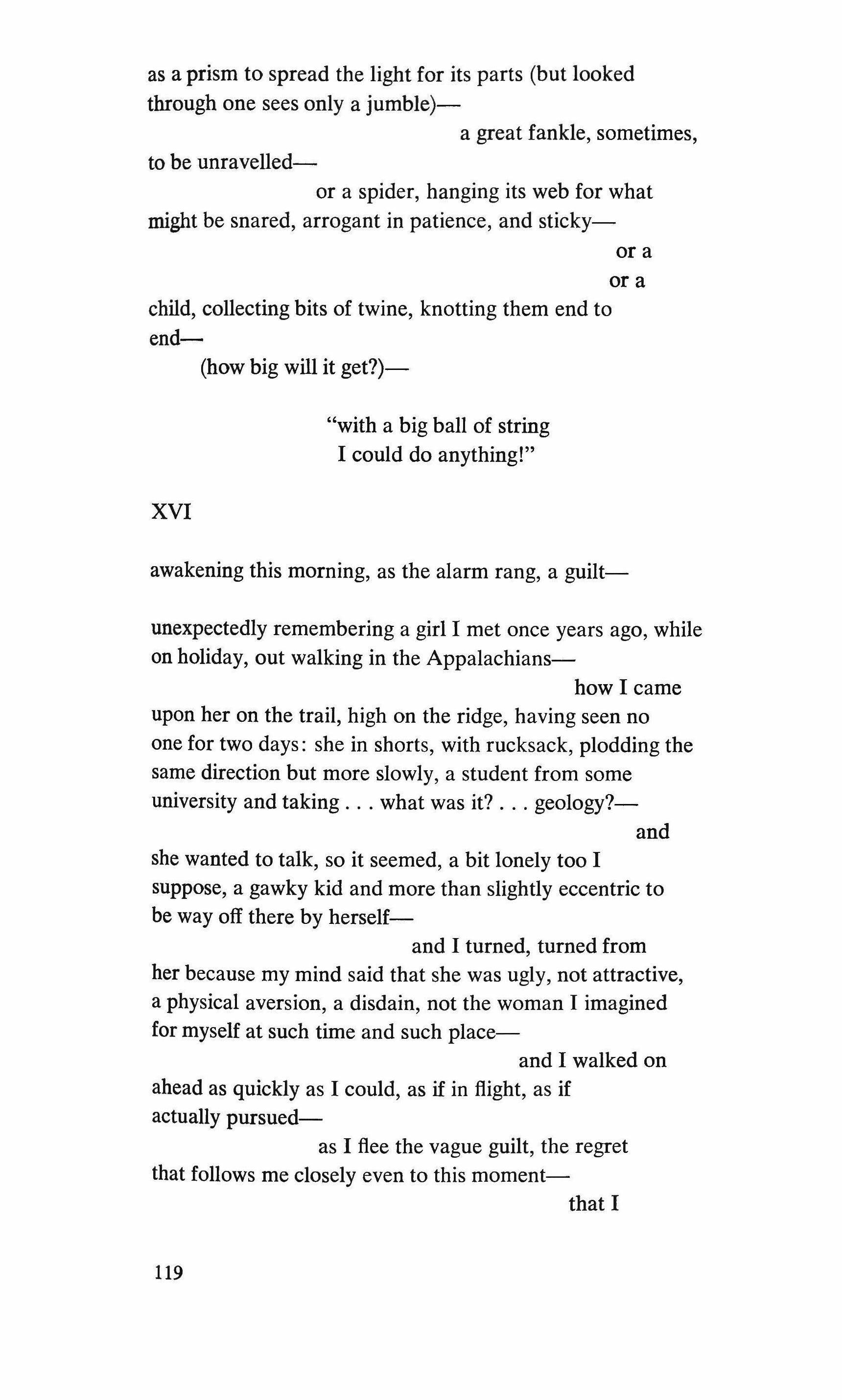
XVI
awakening this morning, as the alarm rang, a guilt-
unexpectedly remembering a girl I met once years ago, while on holiday, out walking in the Appalachianshow I came upon her on the trail, high on the ridge, having seen no one for two days: she in shorts, with rucksack, plodding the same direction but more slowly, a student from some university and taking what was it? geology?and she wanted to talk, so it seemed, a bit lonely too I suppose, a gawky kid and more than slightly eccentric to be way off there by herselfand I turned, turned from her because my mind said that she was ugly, not attractive, a physical aversion, a disdain, not the woman I imagined for myself at such time and such placeand I walked on ahead as quickly as I could, as if in flight, as if actually pursuedas I flee the vague guilt, the regret that follows me closely even to this momentthat I
119
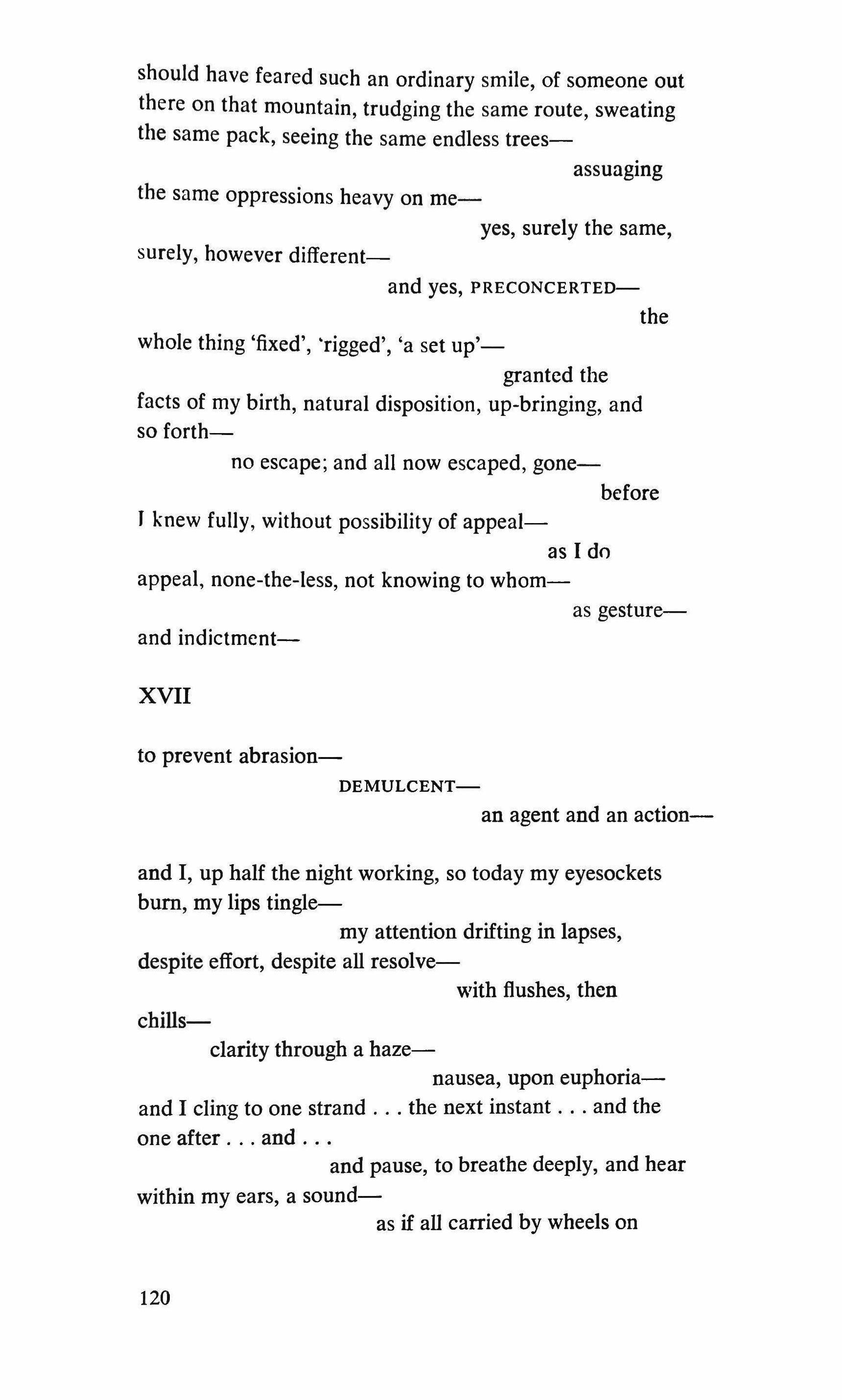
should have feared such an ordinary smile, of someone out there on that mountain, trudging the same route, sweating the same pack, seeing the same endless treesassuaging the same oppressions heavy on meyes, surely the same, surely, however differentand yes, PRECONCERTEDthe whole thing 'fixed', 'rigged', 'a set up'granted the facts of my birth, natural disposition, up-bringing, and so forth-
no escape; and all now escaped, gonebefore
J knew fully, without possibility of appealas I do appeal, none-the-less, not knowing to whomas gestureand indictment-
XVII to prevent abrasion
DEMULCENTan agent and an action-
and I, up half the night working, so today my eyesockets bum, my lips tinglemy attention drifting in lapses, despite effort, despite all resolvewith flushes, then chillsclarity through a hazenausea, upon euphoriaand I cling to one strand the next instant and the one after and and pause, to breathe deeply, and hear within my ears, a soundas if all carried by wheels on
120
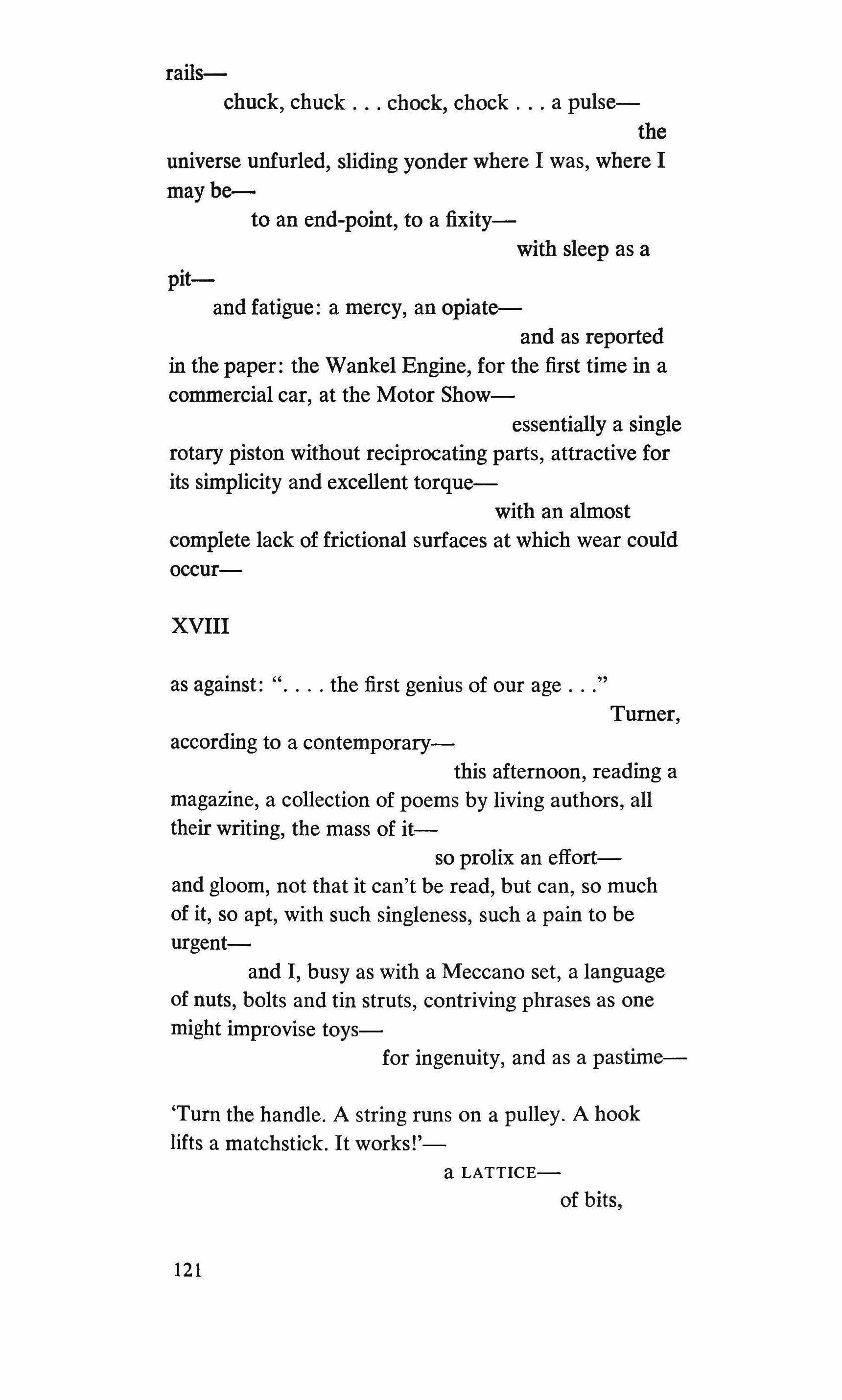
railschuck, chuck chock, chock a pulsethe universe unfurled, sliding yonder where I was, where I maybeto an end-point, to a fixitywith sleep as a pitand fatigue: a mercy, an opiateand as reported in the paper: the Wankel Engine, for the first time in a commercial car, at the Motor Showessentially a single rotary piston without reciprocating parts, attractive for its simplicity and excellent torquewith an almost complete lack of frictional surfaces at which wear could occur-
XVIII
inst. hfi ius of as agams: t erst gemus 0 our age Turner, according to a contemporarythis afternoon, reading a magazine, a collection of poems by living authors, all their writing, the mass of it-
so prolix an effortand gloom, not that it can't be read, but can, so much of it, so apt, with such singleness, such a pain to be urgentand I, busy as with a Meccano set, a language of nuts, bolts and tin struts, contriving phrases as one might improvise toysfor ingenuity, and as a pastime-
'Turn the handle. A string runs on a pulley. A hook lifts a matchstick. It works!'a LATTICEof bits,
121

lacking better, a patchwork-
the 'English Medium'-
where the texture of the pigment is determined not merely by the brush but by what is given up as the strokes dry, by what is lost from the papera purity; but in that, without body, without protection against air, against lightso that what we have now in the galleries, mostly but hintseven Ruskin, in his old age, saying, have lost something of their radiance, my Turners though the best, in that sort, are but shadows of the day rising up, of the sun shining through vapour through interstices of cloud in crannies, the light precipitate as dew the colours flared as against: Watercolour, - with blue and yellow close together in some places, instead of green" one critic grumbled, "as if that could fool anyone
XIX
Weyland Smith, worker in iron, shoer of horses, linker of chain-mail, himself perhaps chaineda captive, a refugee, and said to be lame, perhaps hamstrung when taken, who toils for a masterby the Ridgeway on the Berkshire Downs, a ruined Long Barrow, ringed with elm, once used as a forge and given his name, where the turf is alive under foot and the granular stones, dark as rain clouds on the horizon, lie half submerged where they have tumbledand I remember it today, Pay Day, collecting my cheque, my ration, to be used and hoarded-
I sign for it, a slave's markyet bread in my mouth,
122
and a roof-
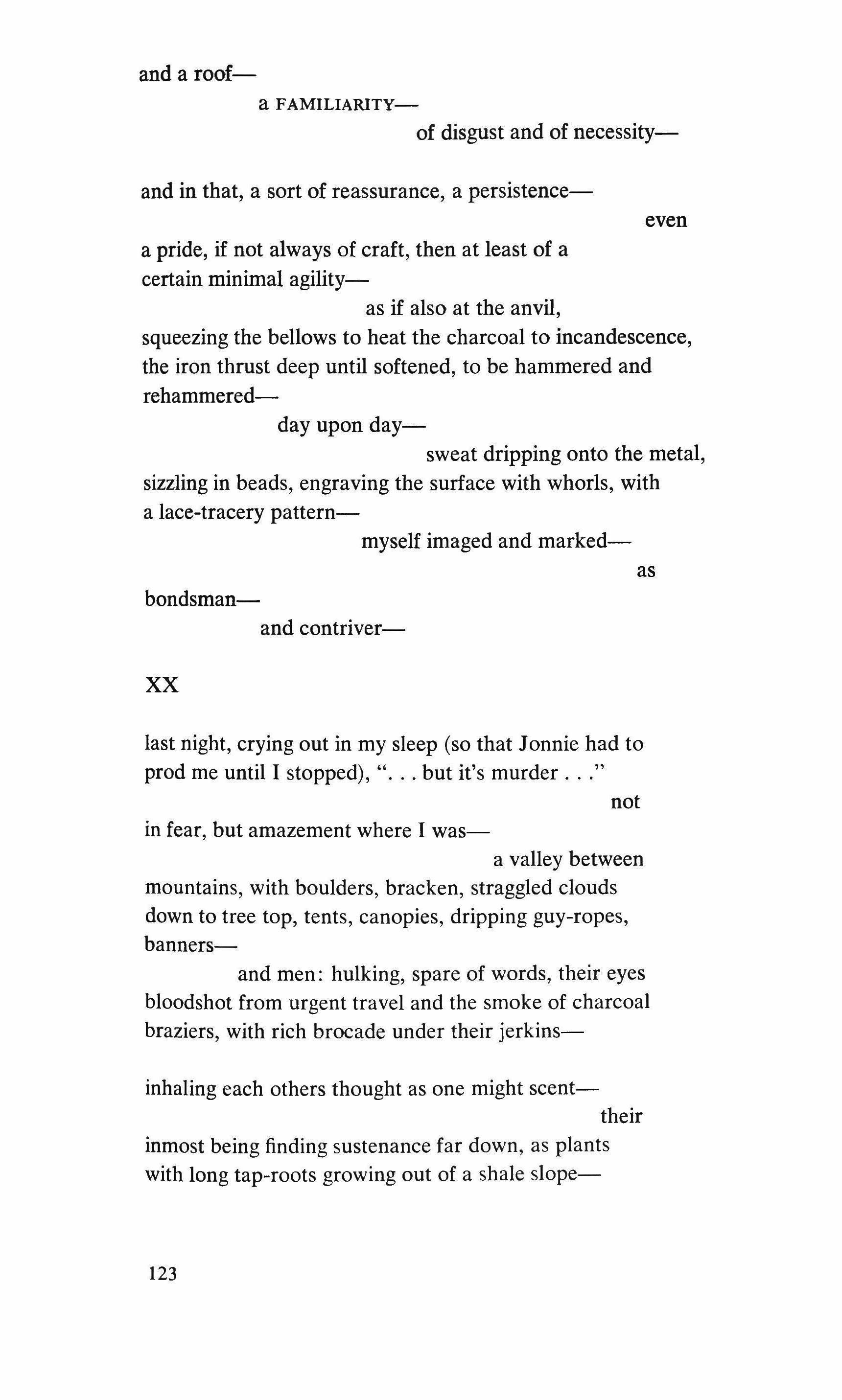
of disgust and of necessity-
and in that, a sort of reassurance, a persistenceeven a pride, if not always of craft, then at least of a certain minimal agilityas if also at the anvil, squeezing the bellows to heat the charcoal to incandescence, the iron thrust deep until softened, to be hammered and rehammered-
day upon day-
sweat dripping onto the metal, sizzling in beads, engraving the surface with whorls, with a lace-tracery patternmyself imaged and markedas bondsmanand contriver-
xx last night, crying out in my sleep (so that Jonnie had to prod me until I stopped), but it's murder not in fear, but amazement where I wasa valley between mountains, with boulders, bracken, straggled clouds down to tree top, tents, canopies, dripping guy-ropes, bannersand men: hulking, spare of words, their eyes bloodshot from urgent travel and the smoke of charcoal braziers, with rich brocade under their jerkinsinhaling each others thought as one might scenttheir inmost being finding sustenance far down, as plants with long tap-roots growing out of a shale slope-
a FAMILIARlTY-
123
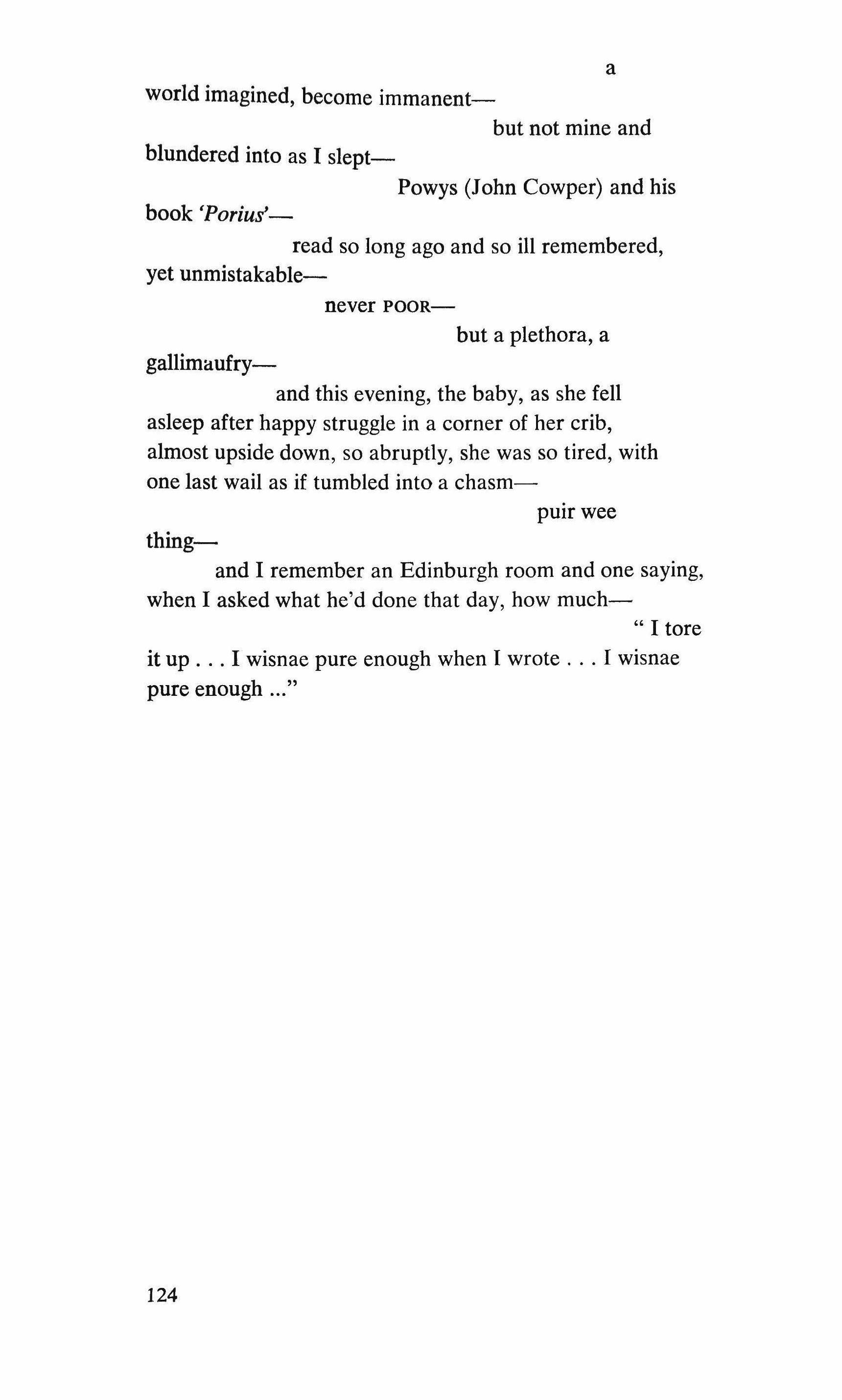
a
world imagined, become immanentbut not mine and blundered into as I sleptPowys (John Cowper) and his book tPorius'-
read so long ago and so ill remembered, yet unmistakable-
never POORbut a plethora, a gallimaufryand this evening, the baby, as she fell asleep after happy struggle in a corner of her crib, almost upside down, so abruptly, she was so tired, with one last wail as if tumbled into a chasmpuir wee thingand I remember an Edinburgh room and one saying, when I asked what he'd done that day, how muchI tore it up I wisnae pure enough when I wrote I wisnae h " pure enoug
124
ROY FISHER
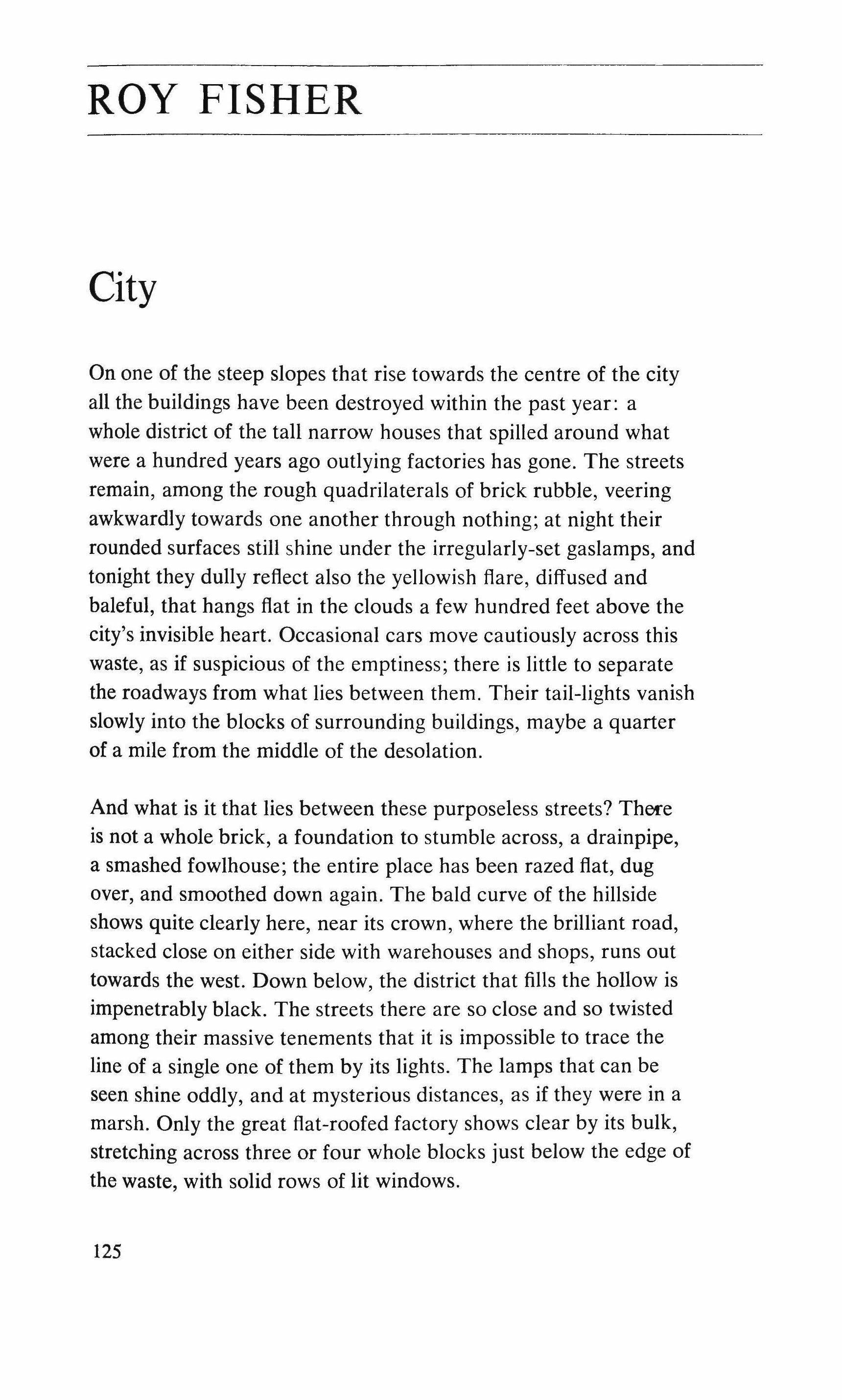
City
On one of the steep slopes that rise towards the centre of the city all the buildings have been destroyed within the past year: a whole district of the tall narrow houses that spilled around what were a hundred years ago outlying factories has gone. The streets remain, among the rough quadrilaterals of brick rubble, veering awkwardly towards one another through nothing; at night their rounded surfaces still shine under the irregularly-set gaslamps, and tonight they dully reflect also the yellowish flare, diffused and baleful, that hangs flat in the clouds a few hundred feet above the city's invisible heart. Occasional cars move cautiously across this waste, as if suspicious of the emptiness; there is little to separate the roadways from what lies between them. Their tail-lights vanish slowly into the blocks of surrounding buildings, maybe a quarter of a mile from the middle of the desolation.
And what is it that lies between these purposeless streets? There is not a whole brick, a foundation to stumble across, a drainpipe, a smashed fowlhouse; the entire place has been razed flat, dug over, and smoothed down again. The bald curve of the hillside shows quite clearly here, near its crown, where the brilliant road, stacked close on either side with warehouses and shops, runs out towards the west. Down below, the district that fills the hollow is impenetrably black. The streets there are so close and so twisted among their massive tenements that it is impossible to trace the line of a single one of them by its lights. The lamps that can be seen shine oddly, and at mysterious distances, as if they were in a marsh. Only the great flat-roofed factory shows clear by its bulk, stretching across three or four whole blocks just below the edge of the waste, with solid rows of lit windows.
125
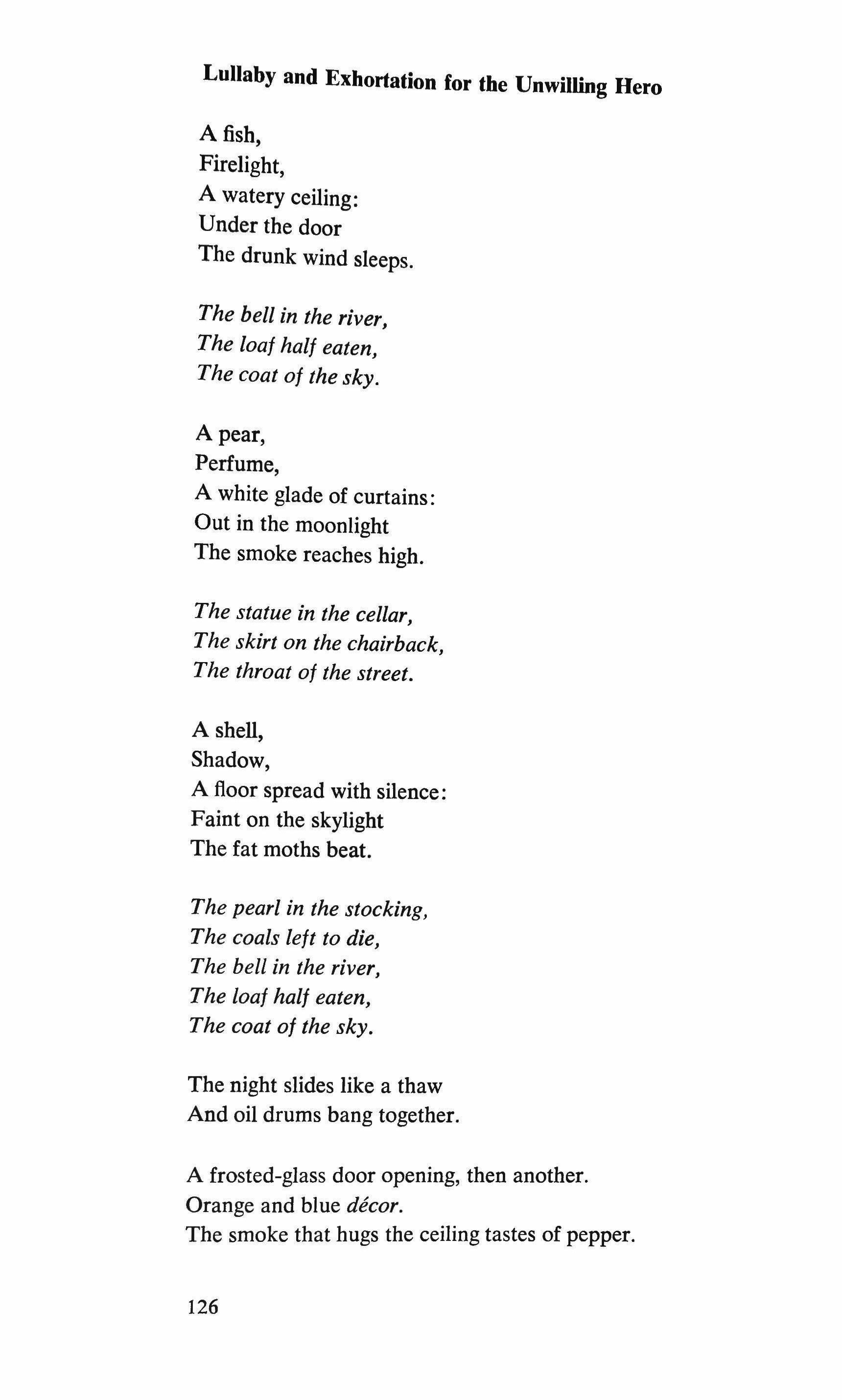
A fish, Firelight, A watery ceiling: Under the door
The drunk wind sleeps.
The bell in the river, The loaf half eaten, The coat of the sky.
A pear, Perfume, A white glade of curtains: Out in the moonlight The smoke reaches high.
The statue in the cellar, The skirt on the chairback, The throat of the street.
A shell, Shadow,
A floor spread with silence: Faint on the skylight The fat moths beat.
The pearl in the stocking, The coals left to die,
The bell in the river, The loaf half eaten, The coat of the sky.
The night slides like a thaw And oil drums bang together.
A frosted-glass door opening, then another. Orange and blue decor.
The smoke that hugs the ceiling tastes of pepper.
Lullaby and Exhortation for the Unwilling Hero
126
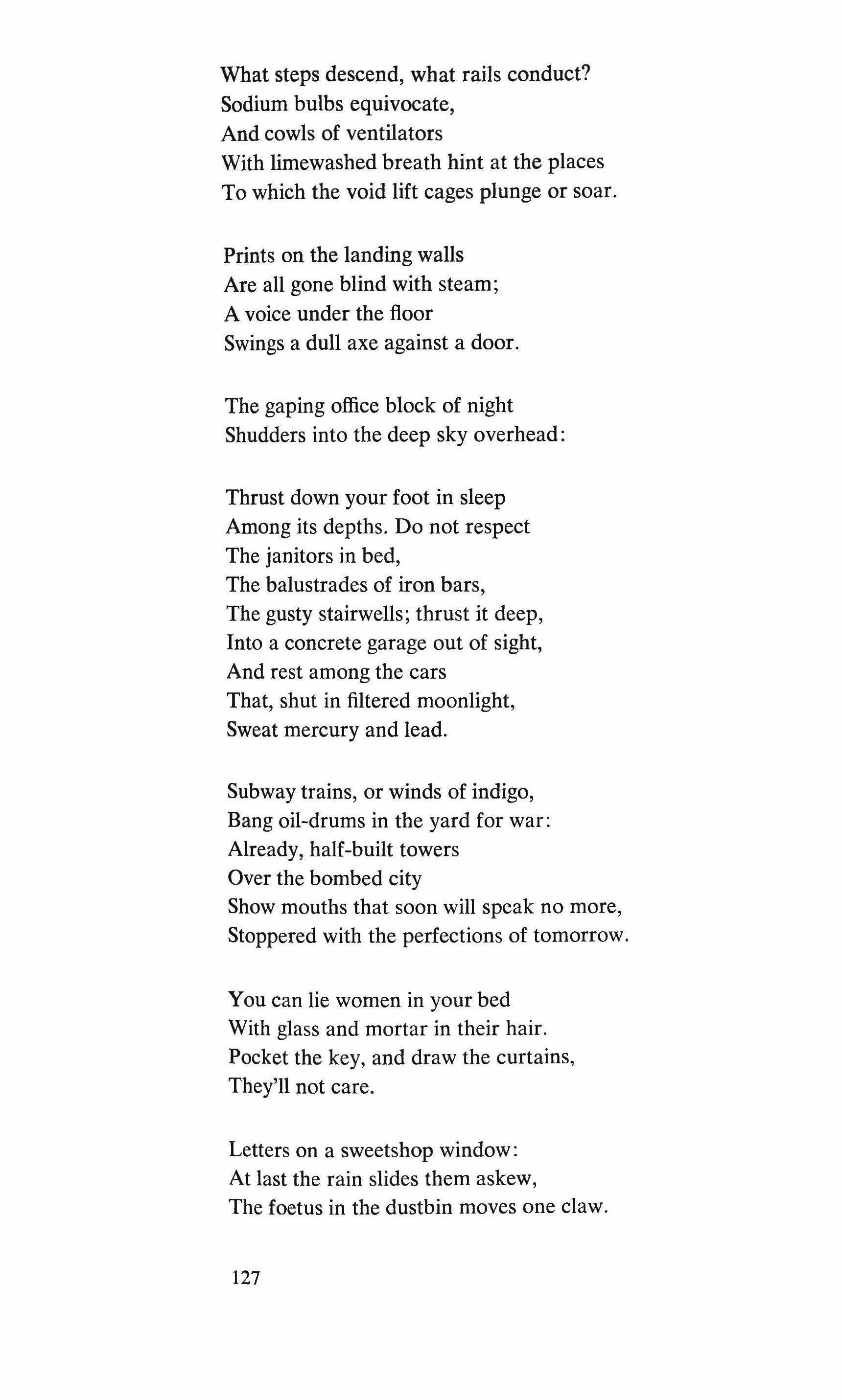
What steps descend, what rails conduct?
Sodium bulbs equivocate, And cowls of ventilators
With limewashed breath hint at the places To which the void lift cages plunge or soar.
Prints on the landing walls
Are all gone blind with steam; A voice under the floor
Swings a dull axe against a door.
The gaping office block of night Shudders into the deep sky overhead:
Thrust down your foot in sleep
Among its depths. Do not respect The janitors in bed, The balustrades of iron bars, The gusty stairwells; thrust it deep, Into a concrete garage out of sight, And rest among the cars
That, shut in filtered moonlight, Sweat mercury and lead.
Subway trains, or winds of indigo, Bang oil-drums in the yard for war: Already, half-built towers
Over the bombed city
Show mouths that soon will speak no more, Stoppered with the perfections of tomorrow.
You can lie women in your bed
With glass and mortar in their hair. Pocket the key, and draw the curtains, They'll not care.
Letters on a sweetshop window: At last the rain slides them askew, The foetus in the dustbin moves one claw.
127

And from the locomotive
That's halted on the viaduct
A last white rag of steam
Blows ghostly across the gardens. When you wake, what will you do?
Under the floorboards of your dream
Gun barrels rolled in lint
Jockey the rooms this way and that. Across the suburbs, squares of colour gleam: Swaddled in pink and apricot, The people are 'making love'
Those are bright points that flicker Softly, and vanish one by one.
Your telegraphic fingers mutter the world. What will they reach for when your sleep is done?
The hiss of tyres along the gutter, Odours of polish in the air;
A car sleeps in the neighbouring room, A wardrobe by its radiator.
The rumbling canisters beat for you
Who are a room now altogether bare, An open mouth pressed outwards against life, Tasting the sleepers' breath, The palms of hands, discarded shoes, Lilac wood, the blade of a breadknife.
Before dawn in the sidings, Over whose even tracks
Fat cooling towers caress the sky, The rows of trucks
Extend: black, white, White, grey, white, black, Black, white, black, grey, Marshalled like building blocks:
Women are never far away.
In the century that has passed since this city has become great, it has twice laid itself out in the shape of a wheel. The ghost of the
128
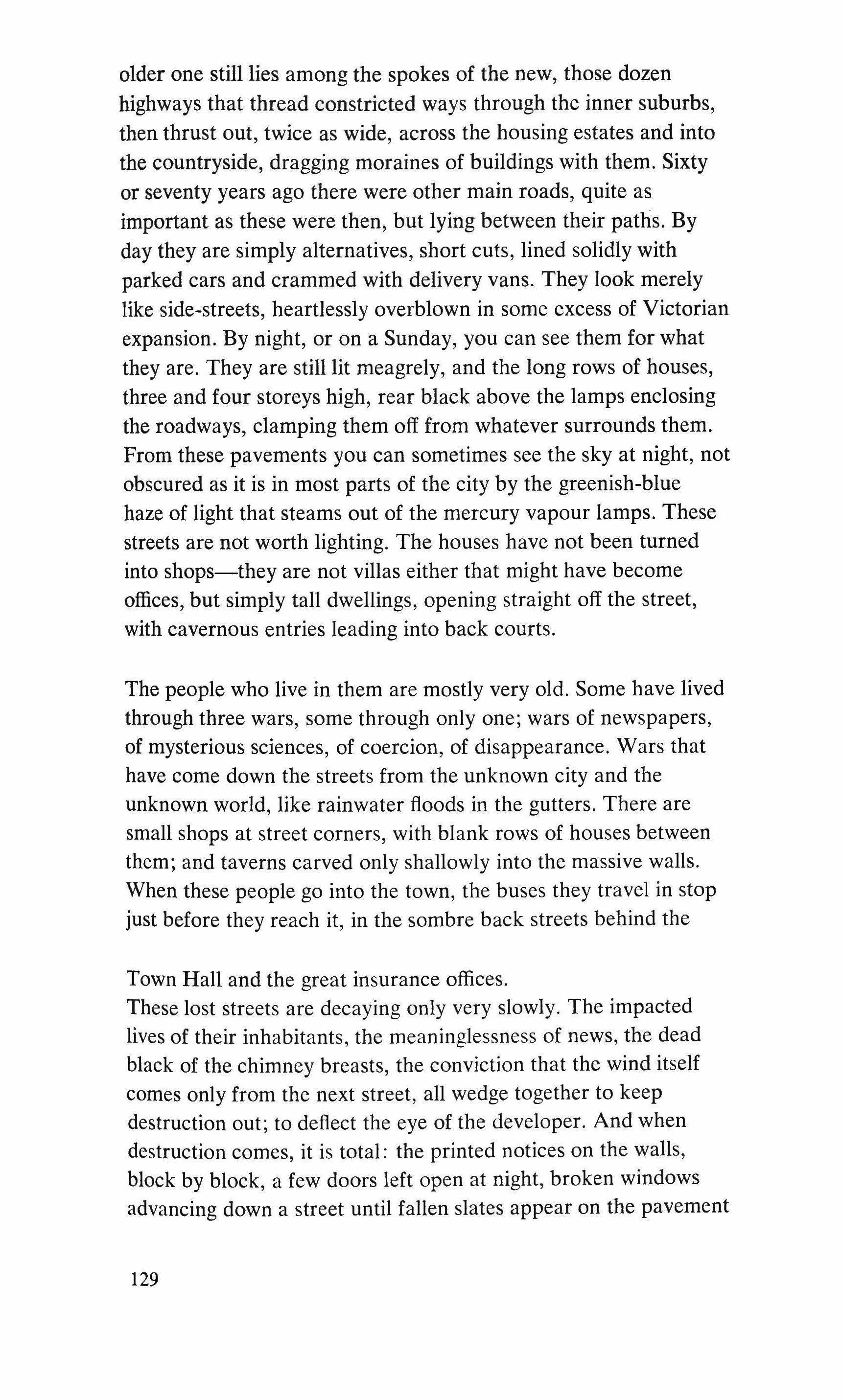
older one still lies among the spokes of the new, those dozen highways that thread constricted ways through the inner suburbs, then thrust out, twice as wide, across the housing estates and into the countryside, dragging moraines of buildings with them. Sixty or seventy years ago there were other main roads, quite as important as these were then, but lying between their paths. By day they are simply alternatives, short cuts, lined solidly with parked cars and crammed with delivery vans. They look merely like side-streets, heartlessly overblown in some excess of Victorian expansion. By night, or on a Sunday, you can see them for what they are. They are still lit meagrely, and the long rows of houses, three and four storeys high, rear black above the lamps enclosing the roadways, clamping them off from whatever surrounds them. From these pavements you can sometimes see the sky at night, not obscured as it is in most parts of the city by the greenish-blue haze of light that steams out of the mercury vapour lamps. These streets are not worth lighting. The houses have not been turned into shops-they are not villas either that might have become offices, but simply tall dwellings, opening straight off the street, with cavernous entries leading into back courts.
The people who live in them are mostly very old. Some have lived through three wars, some through only one; wars of newspapers, of mysterious sciences, of coercion, of disappearance. Wars that have come down the streets from the unknown city and the unknown world, like rainwater floods in the gutters. There are small shops at street corners, with blank rows of houses between them; and taverns carved only shallowly into the massive walls. When these people go into the town, the buses they travel in stop just before they reach it, in the sombre back streets behind the
Town Hall and the great insurance offices.
These lost streets are decaying only very slowly. The impacted lives of their inhabitants, the meaninglessness of news, the dead black of the chimney breasts, the conviction that the wind itself comes only from the next street, all wedge together to keep destruction out; to deflect the eye of the developer. And when destruction comes, it is total: the printed notices on the walls, block by block, a few doors left open at night, broken windows advancing down a street until fallen slates appear on the pavement
129
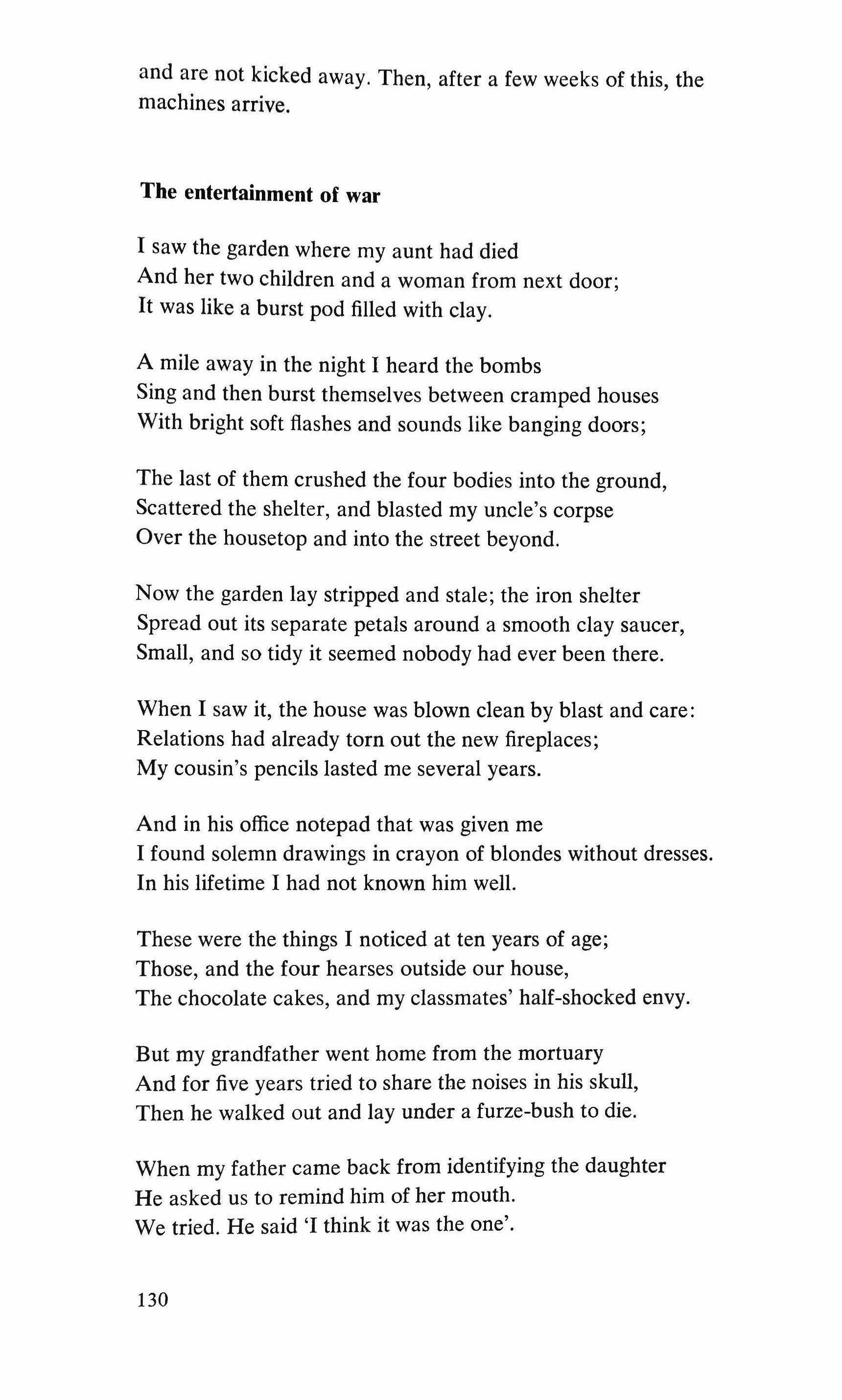
and are not kicked away. Then after a few weeks of this the machines arrive.
The entertainment of war
I saw the garden where my aunt had died
And her two children and a woman from next door; It was like a burst pod filled with clay.
A mile away in the night I heard the bombs Sing and then burst themselves between cramped houses With bright soft flashes and sounds like banging doors;
The last of them crushed the four bodies into the ground, Scattered the shelter, and blasted my uncle's corpse Over the housetop and into the street beyond.
Now the garden lay stripped and stale; the iron shelter Spread out its separate petals around a smooth clay saucer, Small, and so tidy it seemed nobody had ever been there.
When I saw it, the house was blown clean by blast and care: Relations had already torn out the new fireplaces; My cousin's pencils lasted me several years.
And in his office notepad that was given me I found solemn drawings in crayon of blondes without dresses. In his lifetime I had not known him well.
These were the things I noticed at ten years of age; Those, and the four hearses outside our house, The chocolate cakes, and my classmates' half-shocked envy.
But my grandfather went home from the mortuary And for five years tried to share the noises in his skull, Then he walked out and lay under a furze-bush to die.
When my father came back from identifying the daughter He asked us to remind him of her mouth. We tried. He said 'I think it was the one'.
130
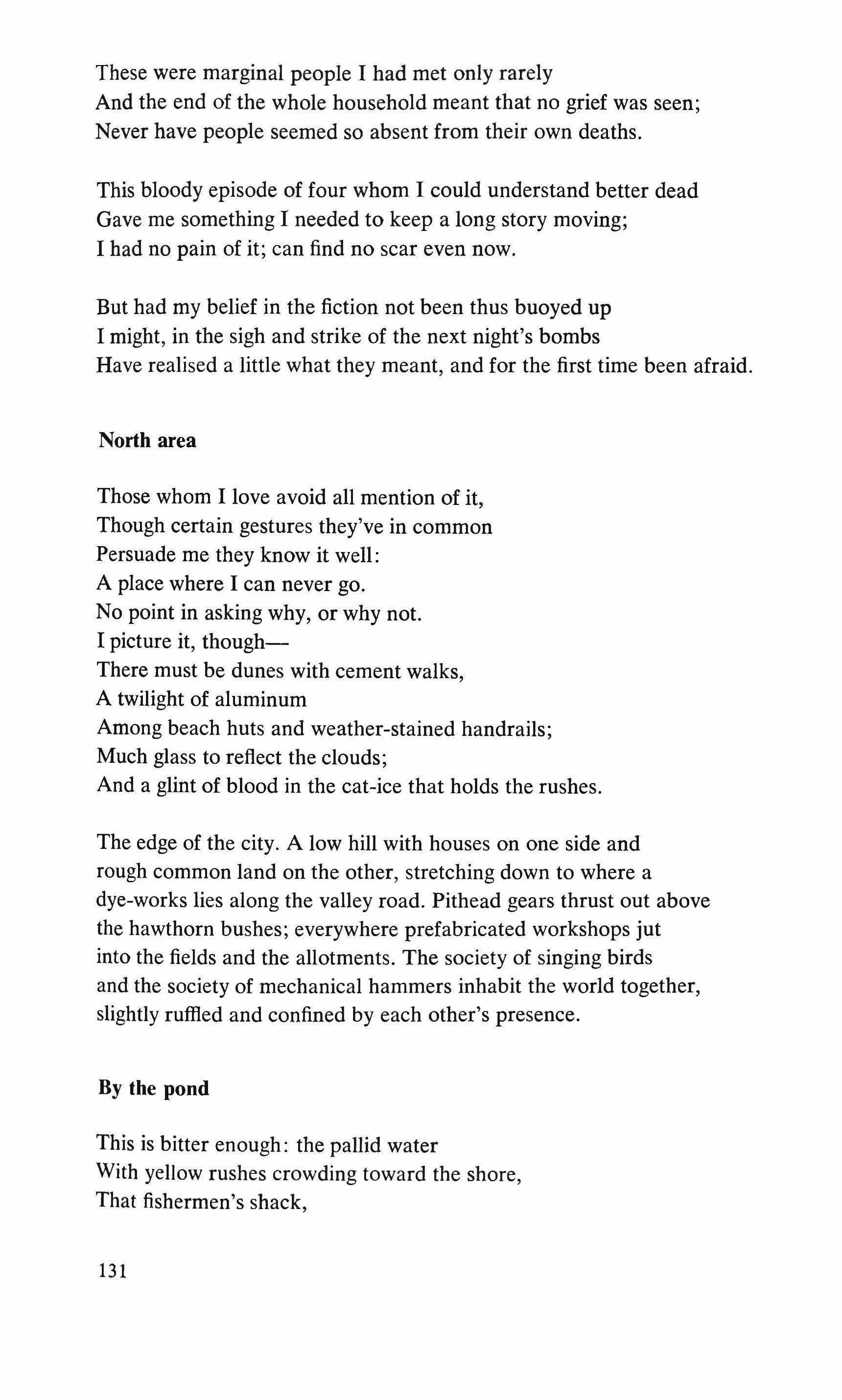
These were marginal people I had met only rarely And the end of the whole household meant that no grief was seen; Never have people seemed so absent from their own deaths.
This bloody episode of four whom I could understand better dead Gave me something I needed to keep a long story moving; I had no pain of it; can find no scar even now.
But had my belief in the fiction not been thus buoyed up I might, in the sigh and strike of the next night's bombs Have realised a little what they meant, and for the first time been afraid.
North area
Those whom I love avoid all mention of it, Though certain gestures they've in common Persuade me they know it well: A place where I can never go. No point in asking why, or why not. I picture it, thoughThere must be dunes with cement walks, A twilight of aluminum Among beach huts and weather-stained handrails; Much glass to reflect the clouds; And a glint of blood in the cat-ice that holds the rushes.
The edge of the city. A low hill with houses on one side and rough common land on the other, stretching down to where a dye-works lies along the valley road. Pithead gears thrust out above the hawthorn bushes; everywhere prefabricated workshops jut into the fields and the allotments. The society of singing birds and the society of mechanical hammers inhabit the world together, slightly ruffled and confined by each other's presence.
By the pond
This is bitter enough: the pallid water
With yellow rushes crowding toward the shore, That fishermen's shack,
131
The pit-mound's taut and staring wire fences, The ashen sky. All these can serve as conscience. For the rest, I'll live.

Brick-dust in sunlight. That is what I see now in the city, a dry epic flavour, whose air is human breath. A place of walls made straight with plumbline and trowel, to dessicate and crumble in the sun and smoke. Blistered paint on cisterns and girders, cracking to show the priming. Old men spit on the paving slabs, little boys urinate; and the sun dries it as it dries out patches of damp on plaster facings to leave misshapen stains. I look for things here that make old men and dead men seem young. Things which have escaped, the landscapes of many childhoods.
Wharves, the oldest parts of factories, tarred gable ends rearing to take the sun over lower roofs. Soot, sunlight, brick-dust; and the breath that tastes of them.
At the time when the great streets were thrust out along the old highroads and trackways, the houses shouldering towards the country and the back streets filling in the widening spaces between them like webbed membranes, the power of will in the town was more open, less speciously democratic, than it is now. There were, of course, cottage railway stations, a jail that pretended to be a castle out of Grimm, public urinals surrounded by screens of cast-iron lacework painted green and scarlet; but there was also an arrogant ponderous architecture that dwarfed and terrified the people by its sheer size and functional brutality: the workhouses and the older hospitals, the thick-walled abattoir, the long vaulted market-halls, the striding canal bridges and railway viaducts. Brunel was welcome here. Compared with these structures the straight white blocks and concrete roadways of today are a fairground, a clear dream just before waking, the creation of salesmen rather than of engineers. The new city is bred out of a hard will, but as it appears, it shows itself a little ingratiating, a place of arcades, passages, easy ascents, good light. The eyes twinkle, beseech and veil themselves; the full, hard mouth, the broad jaw-these are no longer made visible to all.
132
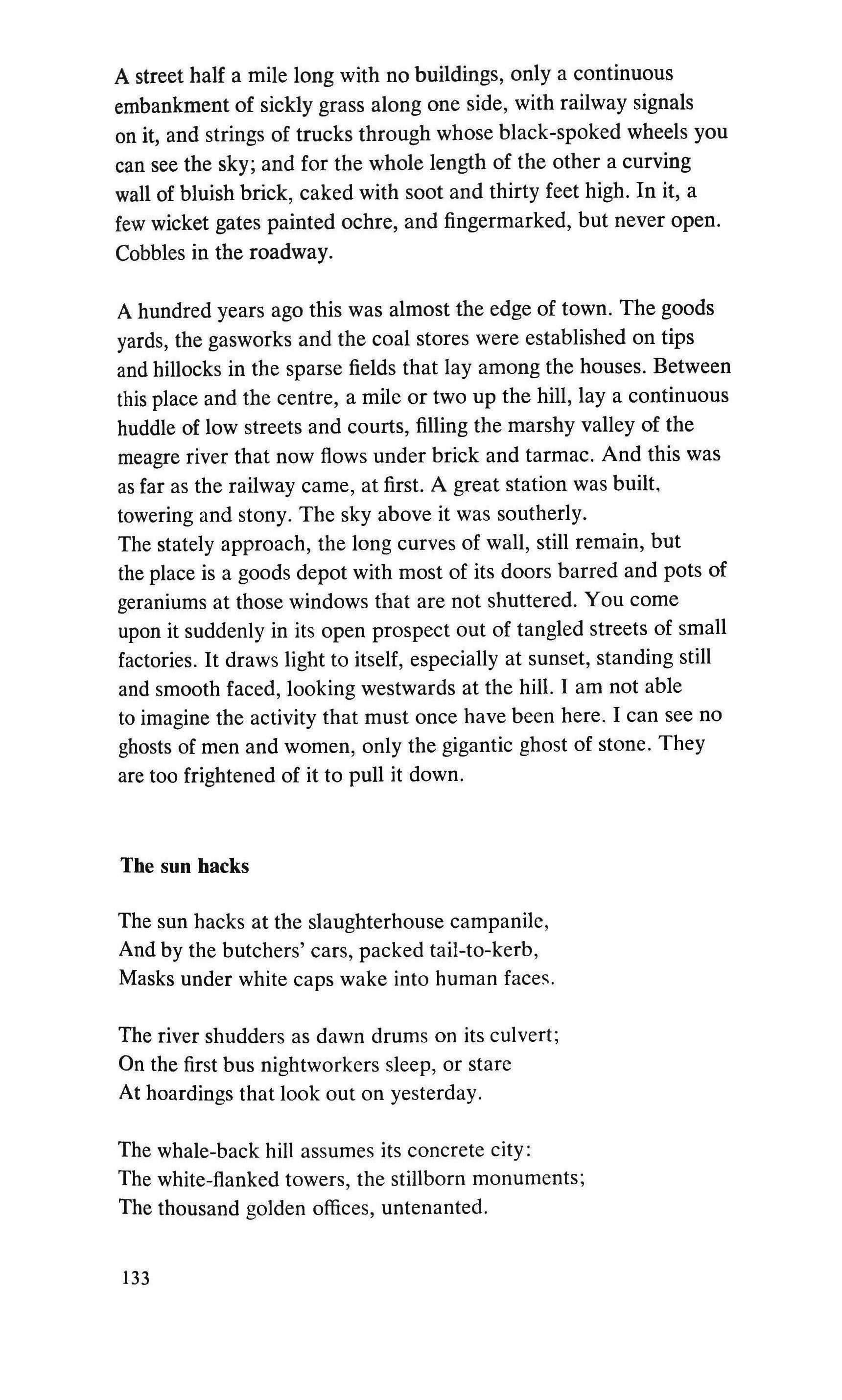
A street half a mile long with no buildings, only a continuous embankment of sickly grass along one side, with railway signals on it, and strings of trucks through whose black-spoked wheels you can see the sky; and for the whole length of the other a curving wall of bluish brick, caked with soot and thirty feet high. In it, a few wicket gates painted ochre, and fingermarked, but never open. Cobbles in the roadway.
A hundred years ago this was almost the edge of town. The goods yards, the gasworks and the coal stores were established on tips and hillocks in the sparse fields that lay among the houses. Between this place and the centre, a mile or two up the hill, lay a continuous huddle of low streets and courts, filling the marshy valley of the meagre river that now flows under brick and tarmac. And this was as far as the railway came, at first. A great station was built, towering and stony. The sky above it was southerly. The stately approach, the long curves of wall, still remain, but the place is a goods depot with most of its doors barred and pots of geraniums at those windows that are not shuttered. You come upon it suddenly in its open prospect out of tangled streets of small factories. It draws light to itself, especially at sunset, standing still and smooth faced, looking westwards at the hill. I am not able to imagine the activity that must once have been here. I can see no ghosts of men and women, only the gigantic ghost of stone. They are too frightened of it to pull it down.
The sun hacks
The sun hacks at the slaughterhouse campanile, And by the butchers' cars, packed tail-to-kerb, Masks under white caps wake into human faces.
The river shudders as dawn drums on its culvert; On the first bus nightworkers sleep, or stare At hoardings that look out on yesterday.
The whale-back hill assumes its concrete city: The white-flanked towers, the stillborn monuments; The thousand golden offices, untenanted.
133
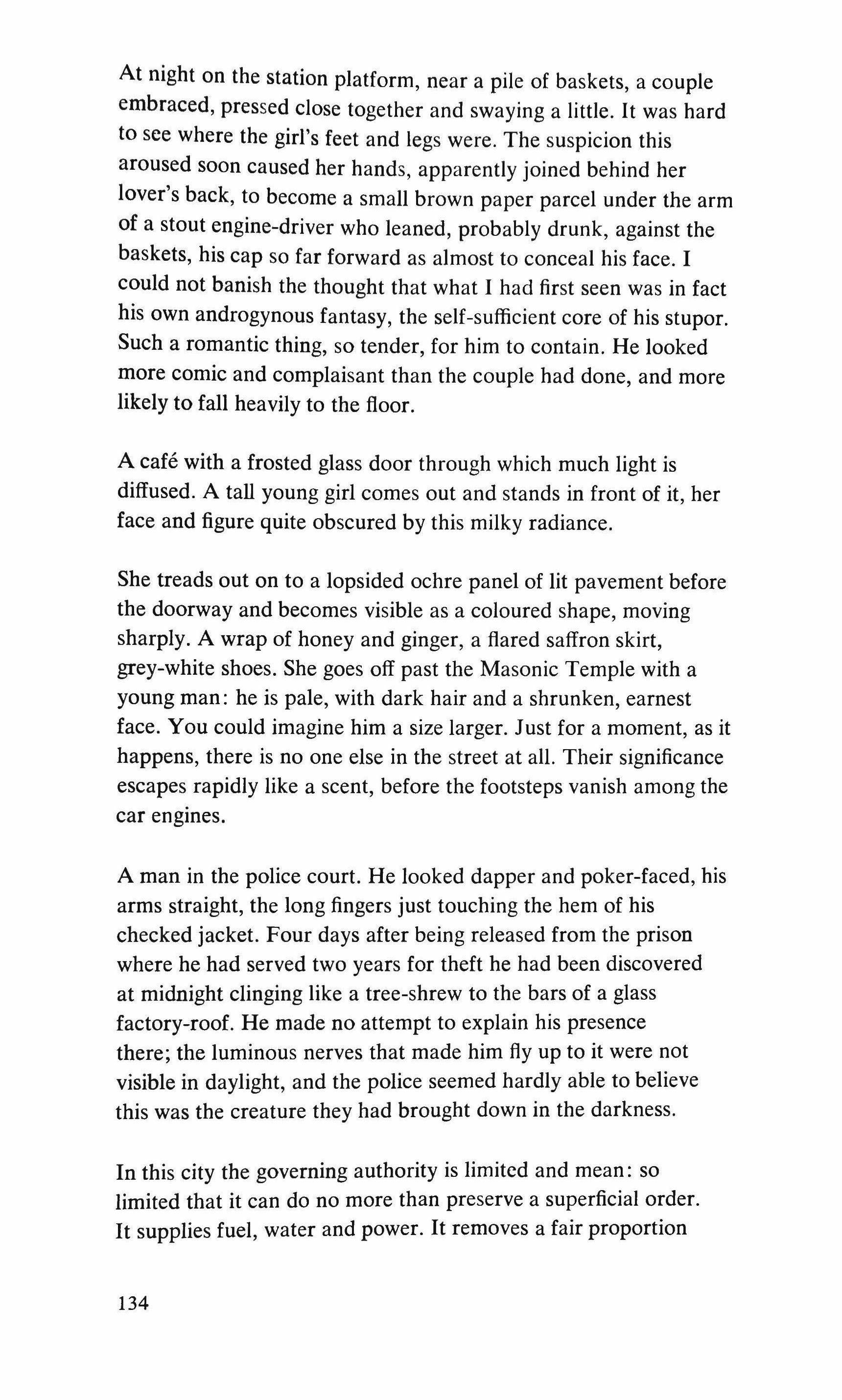
At night on the station platform, near a pile of baskets, a couple embraced, pressed close together and swaying a little. It was hard to see where the girl's feet and legs were. The suspicion this aroused soon caused her hands, apparently joined behind her lover's back, to become a small brown paper parcel under the arm of a stout engine-driver who leaned, probably drunk, against the baskets, his cap so far forward as almost to conceal his face. I could not banish the thought that what I had first seen was in fact his own androgynous fantasy, the self-sufficient core of his stupor. Such a romantic thing, so tender, for him to contain. He looked more comic and complaisant than the couple had done, and more likely to fall heavily to the floor.
A cafe with a frosted glass door through which much light is diffused. A tall young girl comes out and stands in front of it, her face and figure quite obscured by this milky radiance.
She treads out on to a lopsided ochre panel of lit pavement before the doorway and becomes visible as a coloured shape, moving sharply. A wrap of honey and ginger, a flared saffron skirt, grey-white shoes. She goes off past the Masonic Temple with a young man: he is pale, with dark hair and a shrunken, earnest face. You could imagine him a size larger. Just for a moment, as it happens, there is no one else in the street at all. Their significance escapes rapidly like a scent, before the footsteps vanish among the car engines.
A man in the police court. He looked dapper and poker-faced, his arms straight, the long fingers just touching the hem of his checked jacket. Four days after being released from the prison where he had served two years for theft he had been discovered at midnight clinging like a tree-shrew to the bars of a glass factory-roof. He made no attempt to explain his presence there; the luminous nerves that made him fly up to it were not visible in daylight, and the police seemed hardly able to believe this was the creature they had brought down in the darkness.
In this city the governing authority is limited and mean: so limited that it can do no more than preserve a superficial order. It supplies fuel, water and power. It removes a fair proportion
134
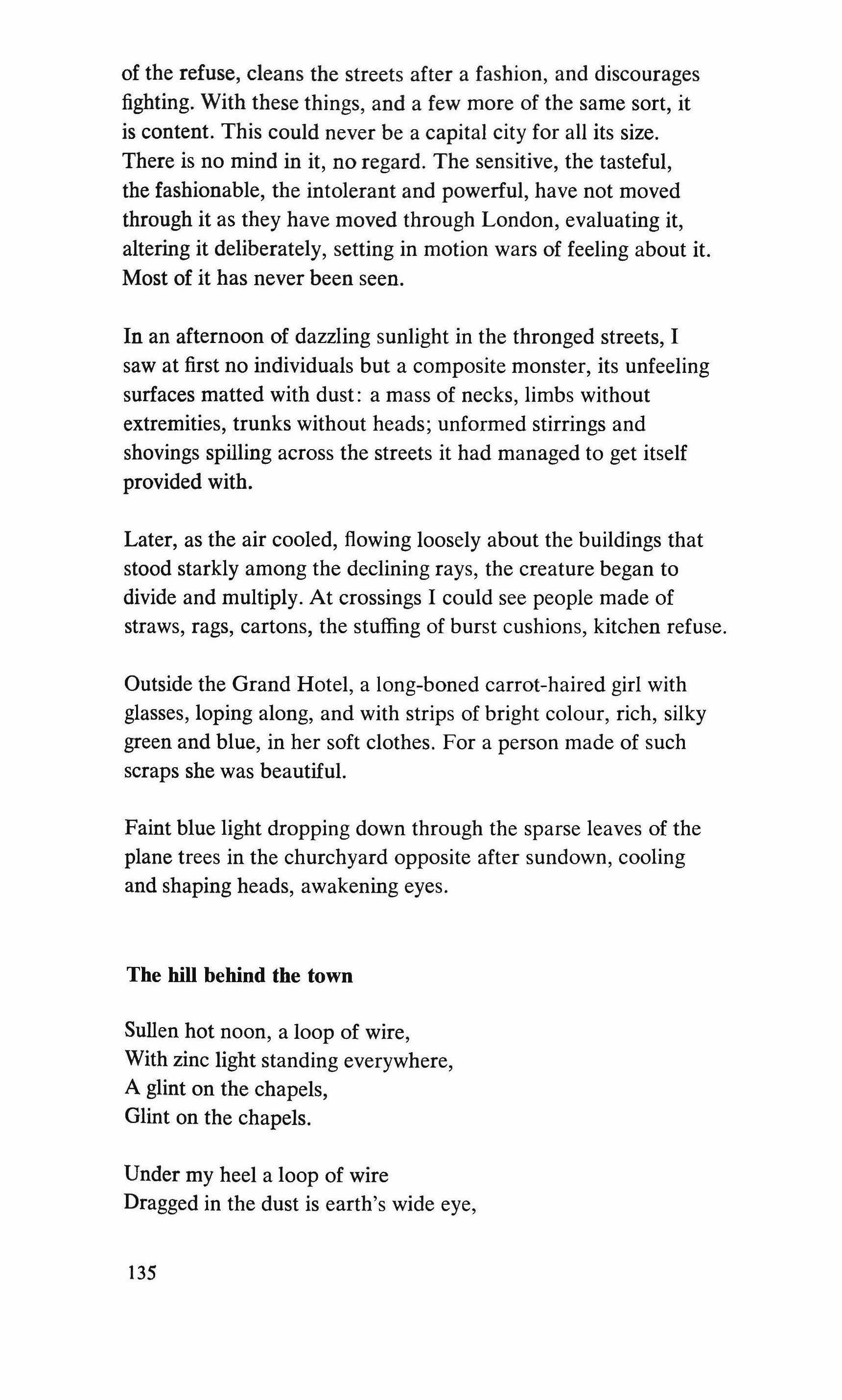
of the refuse, cleans the streets after a fashion, and discourages fighting. With these things, and a few more of the same sort, it is content. This could never be a capital city for all its size. There is no mind in it, no regard. The sensitive, the tasteful, the fashionable, the intolerant and powerful, have not moved through it as they have moved through London, evaluating it, altering it deliberately, setting in motion wars of feeling about it. Most of it has never been seen.
In an afternoon of dazzling sunlight in the thronged streets, I saw at first no individuals but a composite monster, its unfeeling surfaces matted with dust: a mass of necks, limbs without extremities, trunks without heads; unformed stirrings and shovings spilling across the streets it had managed to get itself provided with.
Later, as the air cooled, flowing loosely about the buildings that stood starkly among the declining rays, the creature began to divide and multiply. At crossings I could see people made of straws, rags, cartons, the stuffing of burst cushions, kitchen refuse.
Outside the Grand Hotel, a long-boned carrot-haired girl with glasses, loping along, and with strips of bright colour, rich, silky green and blue, in her soft clothes. For a person made of such scraps she was beautiful.
Faint blue light dropping down through the sparse leaves of the plane trees in the churchyard opposite after sundown, cooling and shaping heads, awakening eyes.
The hill behind the town
Sullen hot noon, a loop of wire, With zinc light standing everywhere, A glint on the chapels, Glint on the chapels.
Under my heel a loop of wire Dragged in the dust is earth's wide eye,
135
Unseen for days, Unseen days.
Geranium-wattled, fenced in wire, Caged white cockerels crowd near And stretch red throats
Stretch red throats;
Their cries tear grievous through taut wire, Drowned in tanks of factory sirens
At sullen noon, Sullen hot noon.
The day's on end; a loop of wire
Kicked from the dust's bleak daylight leaves
A blind white world, Blind white world.
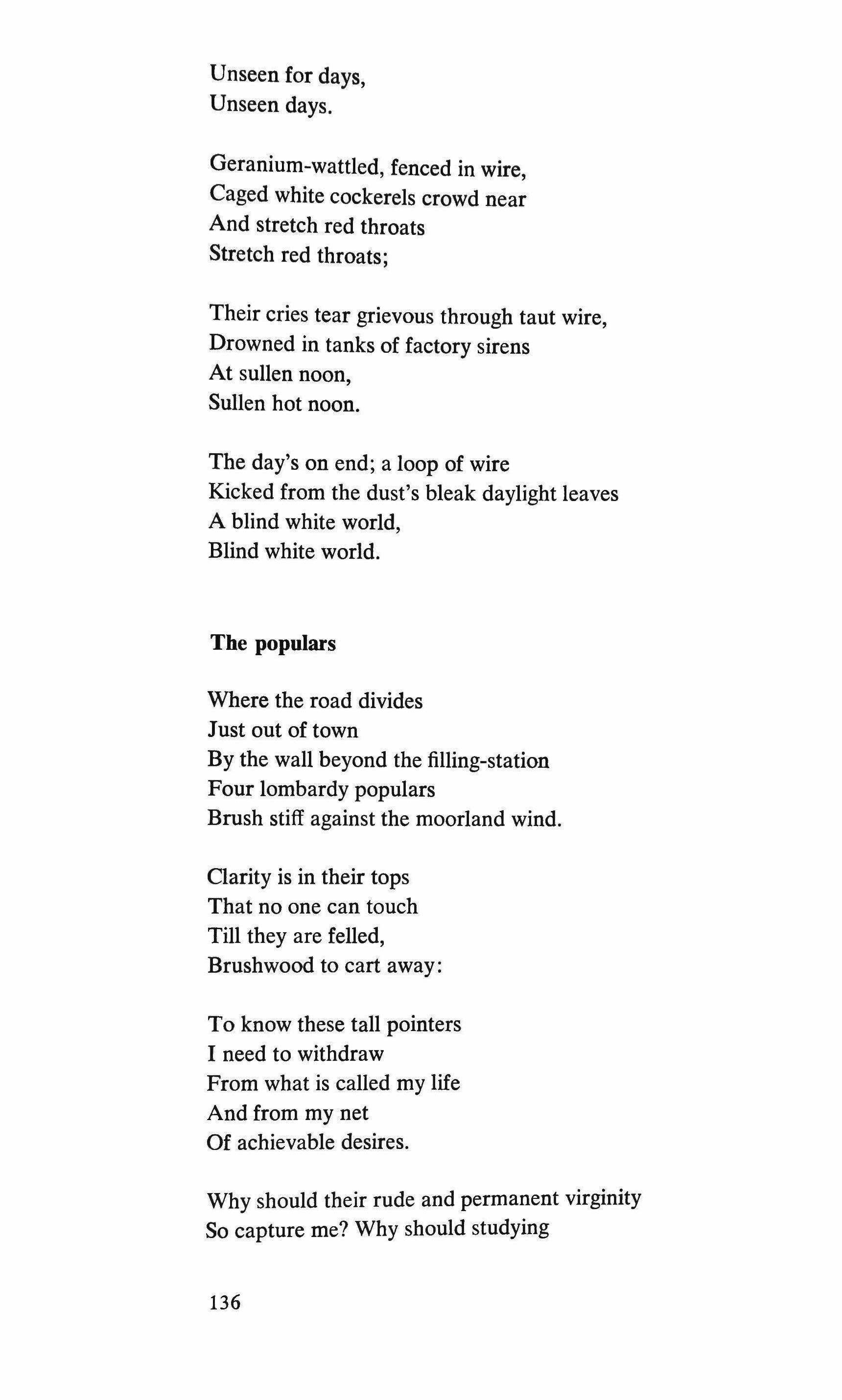
The populars
Where the road divides
Just out of town
By the wall beyond the filling-station
Four lombardy populars
Brush stiff against the moorland wind.
Clarity is in their tops
That no one can touch Till they are felled, Brushwood to cart away:
To know these tall pointers I need to withdraw
From what is called my life And from my net Of achievable desires.
Why should their rude and permanent virginity
So capture me? Why should studying
136
These lacunae of possibility
Relax the iron templates of obligation
Leaving me simply Man?
All I have done, or can do Is prisoned in its act:
I think I am afraid of becoming A cemetery of performance.
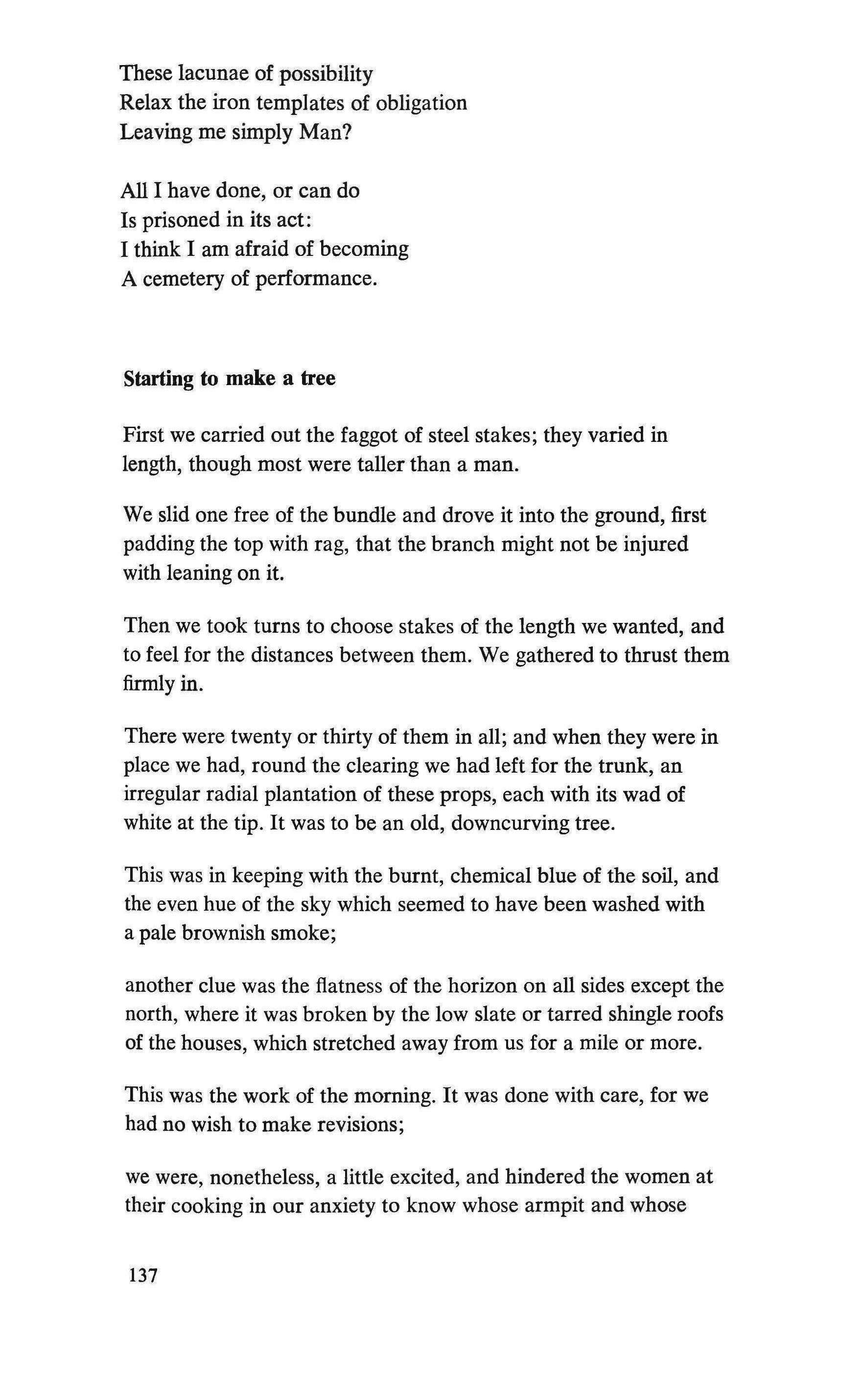
Starting to make a tree
First we carried out the faggot of steel stakes; they varied in length, though most were taller than a man.
We slid one free of the bundle and drove it into the ground, first padding the top with rag, that the branch might not be injured with leaning on it.
Then we took turns to choose stakes of the length we wanted, and to feel for the distances between them. We gathered to thrust them firmly in.
There were twenty or thirty of them in all; and when they were in place we had, round the clearing we had left for the trunk, an irregular radial plantation of these props, each with its wad of white at the tip. It was to be an old, downcurving tree.
This was in keeping with the burnt, chemical blue of the soil, and the even hue of the sky which seemed to have been washed with a pale brownish smoke;
another clue was the flatness of the horizon on all sides except the north, where it was broken by the low slate or tarred shingle roofs of the houses, which stretched away from us for a mile or more.
This was the work of the morning. It was done with care, for we had no wish to make revisions;
we were, nonetheless, a little excited, and hindered the women at their cooking in our anxiety to know whose armpit and whose
137

groin would help us most in the modelling of the bole, and the thrust of the boughs.
That done, we spent the early dusk of the afternoon gathering materials from the nearest houses; and there was plenty:
a great flock mattress; two carved chairs; cement; chicken-wire; tarpaulin; a smashed barrel; lead piping; leather of all kinds; and many small things.
In the evening we sat late, and discussed how we could best use them. Our tree was to be very beautiful.
Yet whenever I see that some of these people around me are bodily in love, I feel it is my own energy, my own hope, tension and sense of time in hand, that have gathered and vanished down that dark drain; it is I who am left, shivering and exhausted, to try and kick the lid back into place so that I can go on without the fear of being able to feel only vertically, like a blind wall, or thickly, like the tyres of a bus.
Lovers turn to me faces of innocence where I would expect wariness. They have disappeared for entire hours into the lit holes of life, instead of lying stunned on its surface as I, and so many, do for so long; or instead of raising their heads cautiously and scenting the manifold airs that blow through the streets.
The city asleep. In it there are shadows that are sulphurous, tanks of black bile. The glitter on the roadways is the deceptive ore than shines on coal.
The last buses have left the centre; the pallid faces of the crowd looked like pods, filled by a gusty summer that had come too late for plenty.
Silvered rails that guide pedestrians at street corners stand useless. Towards midnight, or at whatever hour the sky descends with its full iron weight, the ceilings drop lower everywhere; each light is partial, and proper only to its place. There is no longer any general light, only particular lights that overlap.
138
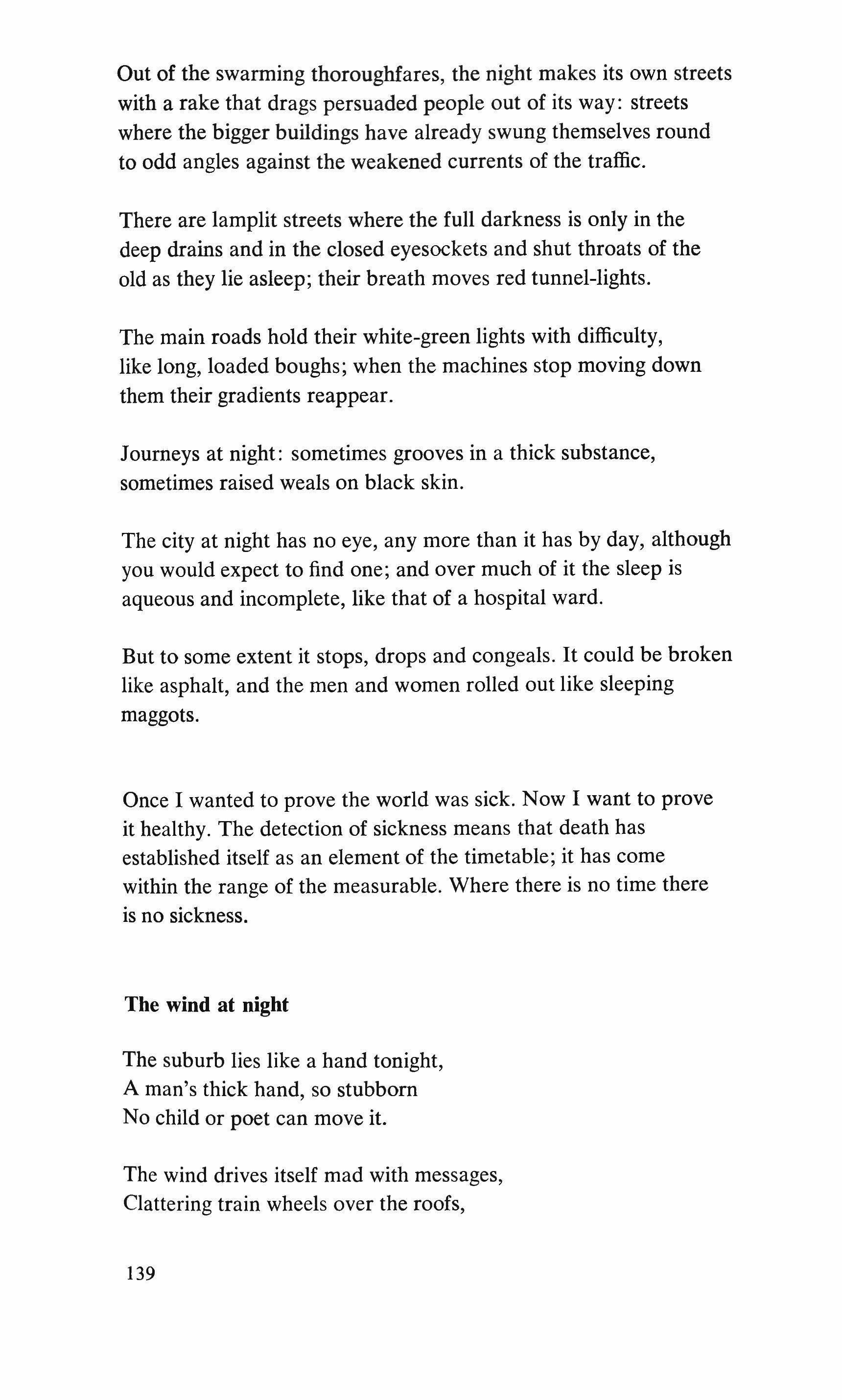
Out of the swarming thoroughfares, the night makes its own streets with a rake that drags persuaded people out of its way: streets where the bigger buildings have already swung themselves round to odd angles against the weakened currents of the traffic.
There are lamplit streets where the full darkness is only in the deep drains and in the closed eyesockets and shut throats of the old as they lie asleep; their breath moves red tunnel-lights.
The main roads hold their white-green lights with difficulty, like long, loaded boughs; when the machines stop moving down them their gradients reappear.
Journeys at night: sometimes grooves in a thick substance, sometimes raised weals on black skin.
The city at night has no eye, any more than it has by day, although you would expect to find one; and over much of it the sleep is aqueous and incomplete, like that of a hospital ward.
But to some extent it stops, drops and congeals. It could be broken like asphalt, and the men and women rolled out like sleeping maggots.
Once I wanted to prove the world was sick. Now I want to prove it healthy. The detection of sickness means that death has established itself as an element of the timetable; it has come within the range of the measurable. Where there is no time there is no sickness.
The wind at night
The suburb lies like a hand tonight, A man's thick hand, so stubborn No child or poet can move it.
The wind drives itself mad with messages, Clattering train wheels over the roofs,
139
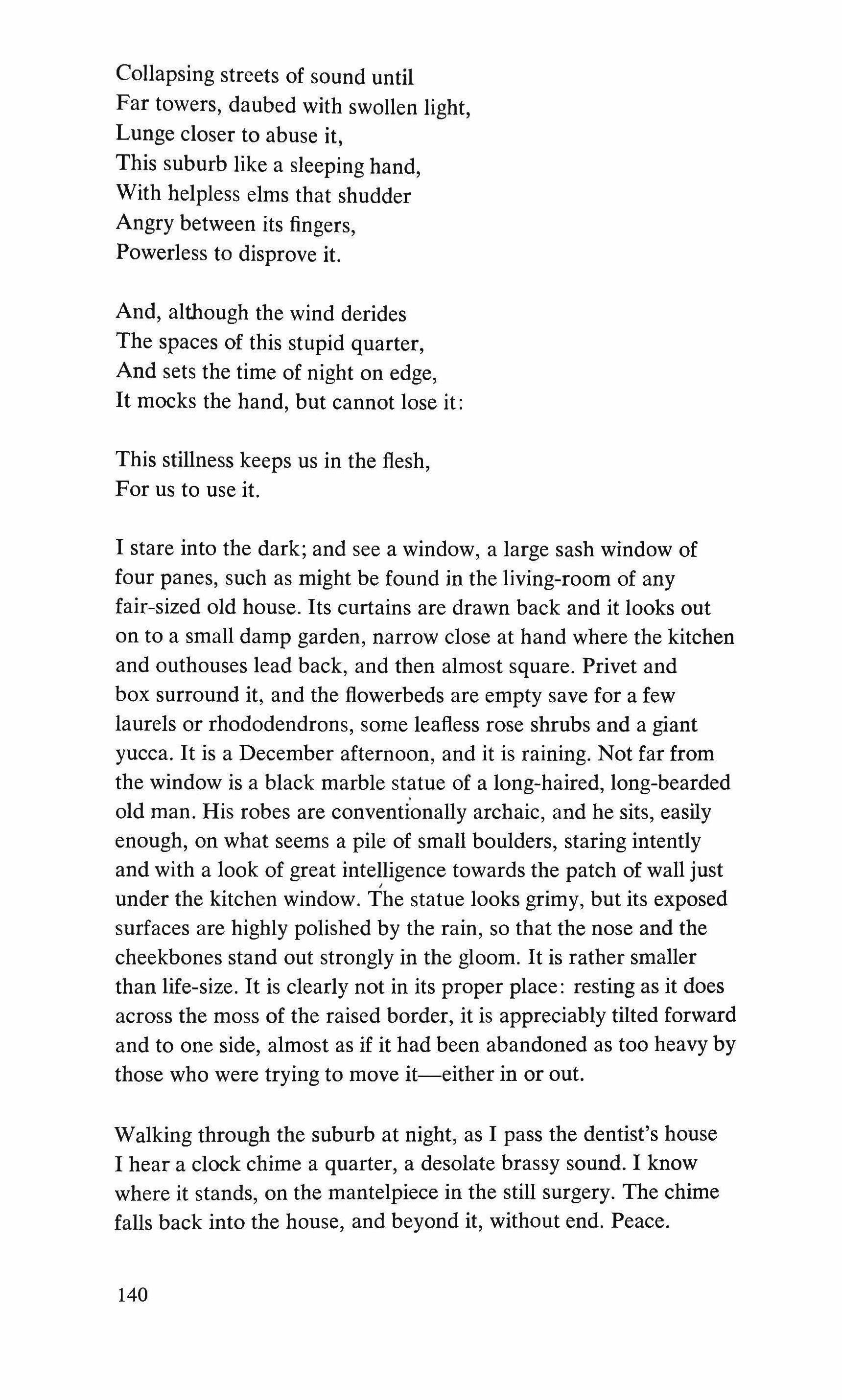
Collapsing streets of sound until Far towers, daubed with swollen light, Lunge closer to abuse it,
This suburb like a sleeping hand, With helpless elms that shudder Angry between its fingers, Powerless to disprove it.
And, although the wind derides
The spaces of this stupid quarter, And sets the time of night on edge, It mocks the hand, but cannot lose it:
This stillness keeps us in the flesh, For us to use it.
I stare into the dark; and see a window, a large sash window of four panes, such as might be found in the living-room of any fair-sized old house. Its curtains are drawn back and it looks out on to a small damp garden, narrow close at hand where the kitchen and outhouses lead back, and then almost square. Privet and box surround it, and the flowerbeds are empty save for a few laurels or rhododendrons, some leafless rose shrubs and a giant yucca. It is a December afternoon, and it is raining. Not far from the window is a black marble statue of a long-haired, long-bearded old man. His robes are conventionally archaic, and he sits, easily enough, on what seems a pile of small boulders, staring intently and with a look of great intelligence towards the patch of wall just under the kitchen window. The statue looks grimy, but its exposed surfaces are highly polished by the rain, so that the nose and the cheekbones stand out strongly in the gloom. It is rather smaller than life-size. It is clearly not in its proper place: resting as it does across the moss of the raised border, it is appreciably tilted forward and to one side, almost as if it had been abandoned as too heavy by those who were trying to move it-either in or out.
Walking through the suburb at night, as I pass the dentist's house
I hear a clock chime a quarter, a desolate brassy sound. I know where it stands, on the mantelpiece in the still surgery. The chime falls back into the house, and beyond it, without end. Peace.
140
I sense the simple nakedness of these tiers of sleeping men and women beneath whose windows I pass. I imagine it in its own setting, a mean bathroom in a house no longer new, a bathroom with plank panelling, painted a peculiar shade of green by an amateur, and badly preserved. It is full of steam, so much as to obscure the yellow light and hide the high, patched ceiling. In this dream, standing quiet, the private image of the householder or his wife, damp and clean.
I see this as it might be floating in the dark, as if the twinkling point of a distant street-lamp had blown in closer, swelling and softening to a foggy oval. I can call up a series of such glimpses that need have no end, for they are all the bodies of strangers. Some are deformed or diseased, some are ashamed, but the peace of humility and weakness is there in them all.
I have often felt myself to be vicious, in living so much by the eye, yet among so many people. I can be afraid that the egg of light through which I see these bodies might present itself as a keyhole. Yet I can find no sadism in the way I see them now. They are warm-fleshed, yet their shapes have the minuscule, remote morality of some mediaeval woodcut of the Expulsion: an eternally startled Adam, a permanently bemused Eve. I see them as homunculi, moving privately each in a softly lit fruit in a nocturnal tree. I can consider without scorn or envy the well-found bedrooms I pass, walnut and rose-pink, altars of tidy, dark-haired women, bare-backed, wifely. Even in these I can see order.
I come quite often now upon a sort of ecstasy, a rag of light blowing among the things I know, making me feel I am not the one for whom it was intended, that I have inadvertently been looking through another's eyes and have seen what I cannot receive.
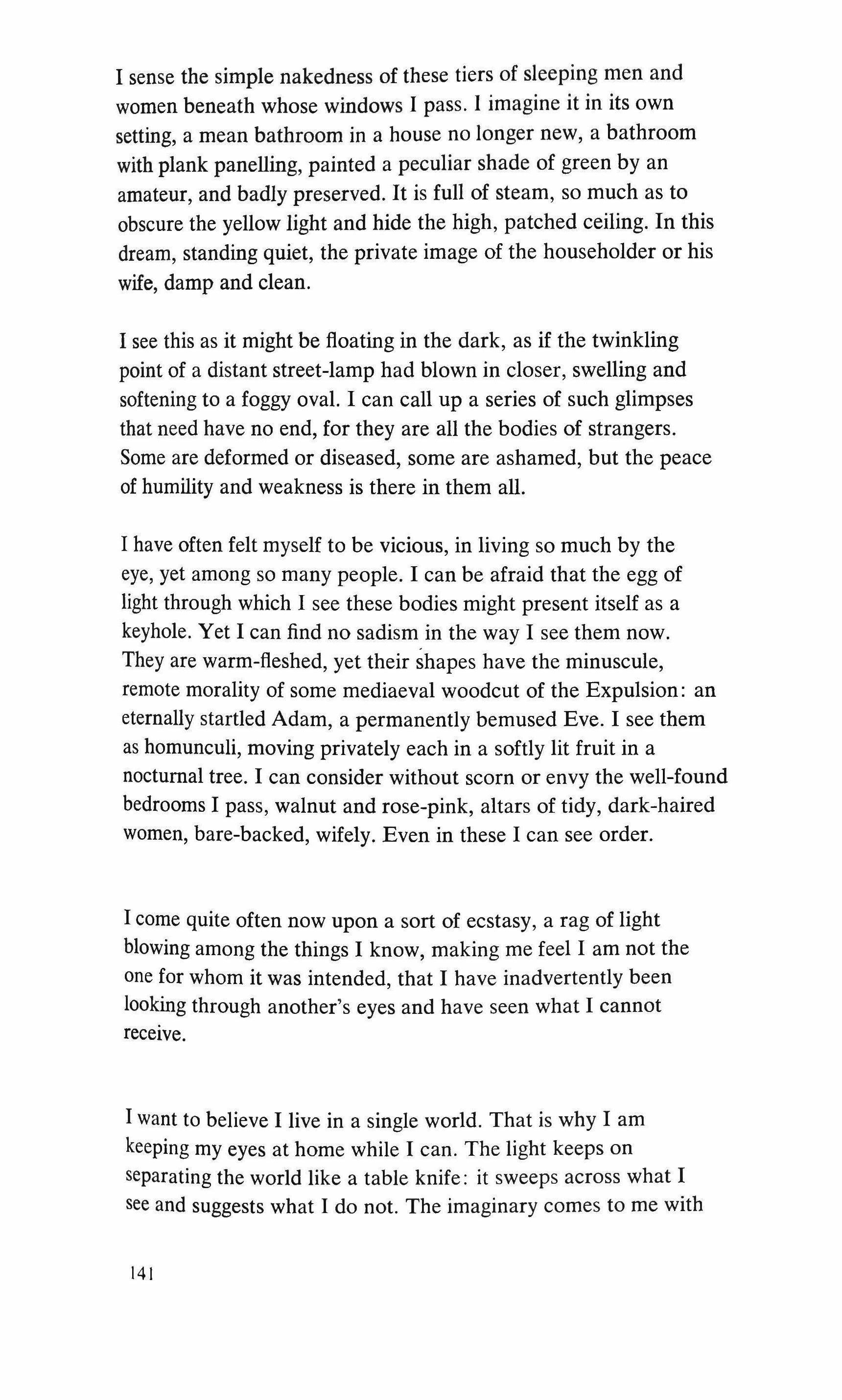
I want to believe I live in a single world. That is why I am keeping my eyes at home while I can. The light keeps on separating the world like a table knife: it sweeps across what I see and suggests what I do not. The imaginary comes to me with
141
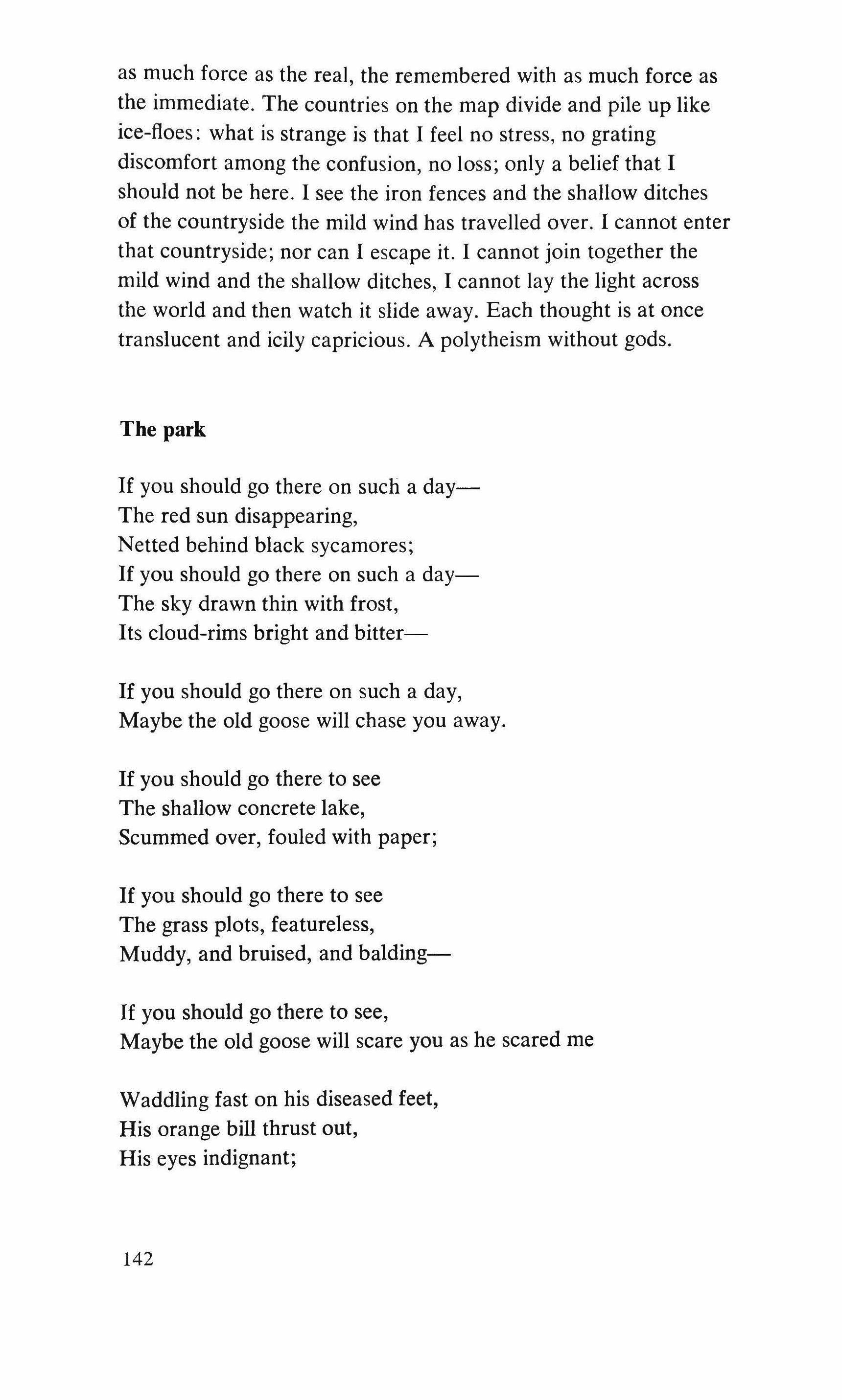
as much force as the real, the remembered with as much force as the immediate. The countries on the map divide and pile up like ice-floes: what is strange is that I feel no stress, no grating discomfort among the confusion, no loss; only a belief that I should not be here. I see the iron fences and the shallow ditches of the countryside the mild wind has travelled over. I cannot enter that countryside; nor can I escape it. I cannot join together the mild wind and the shallow ditches, I cannot lay the light across the world and then watch it slide away. Each thought is at once translucent and icily capricious. A polytheism without gods.
The park
If you should go there on such a dayThe red sun disappearing, Netted behind black sycamores; If you should go there on such a dayThe sky drawn thin with frost, Its cloud-rims bright and bitter-
If you should go there on such a day, Maybe the old goose will chase you away.
If you should go there to see
The shallow concrete lake, Scummed over, fouled with paper;
If you should go there to see The grass plots, featureless, Muddy, and bruised, and balding-
If you should go there to see, Maybe the old goose will scare you as he scared me
Waddling fast on his diseased feet, His orange bill thrust out, His eyes indignant; 142

Waddling fast on his diseased feet, His once-ornamental feathers Baggy, and smeared with winter-
Waddling fast on his diseased feet, The old goose will one day reach death; and be unfit to eat.
And when the goose is dead, then we Can say we're able, at last, No longer hindered from going;
And when the goose is dead, then we Have the chance, if we still want it, To wander the park at leisure;
-Oh, when excuse is dead, then we Must visit there, most diligently.
143
IAN HAMILTON FINLAY
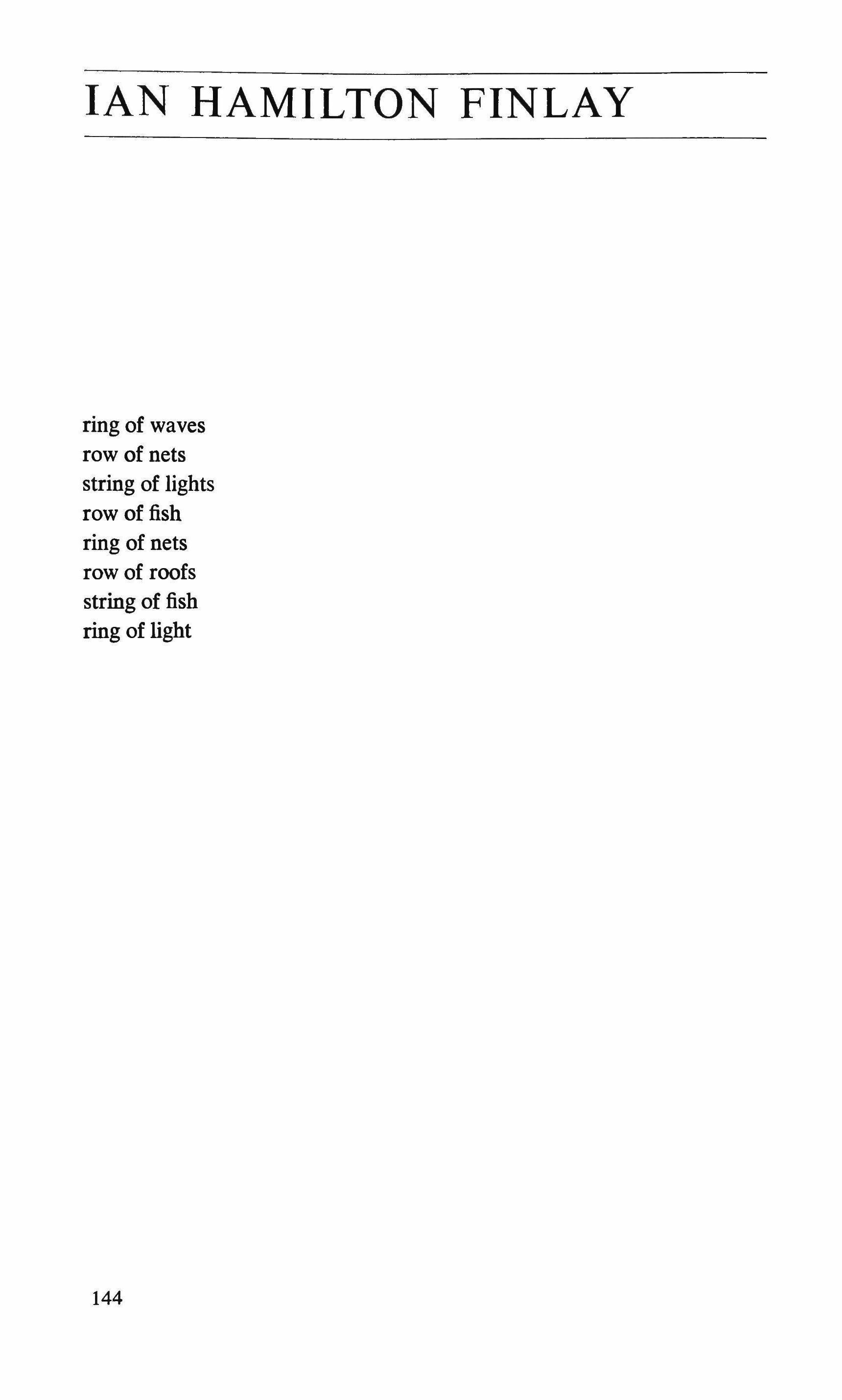
ring of waves
row of nets
string of lights
row of fish
ring of nets
row of roofs
string of fish ring of light
144
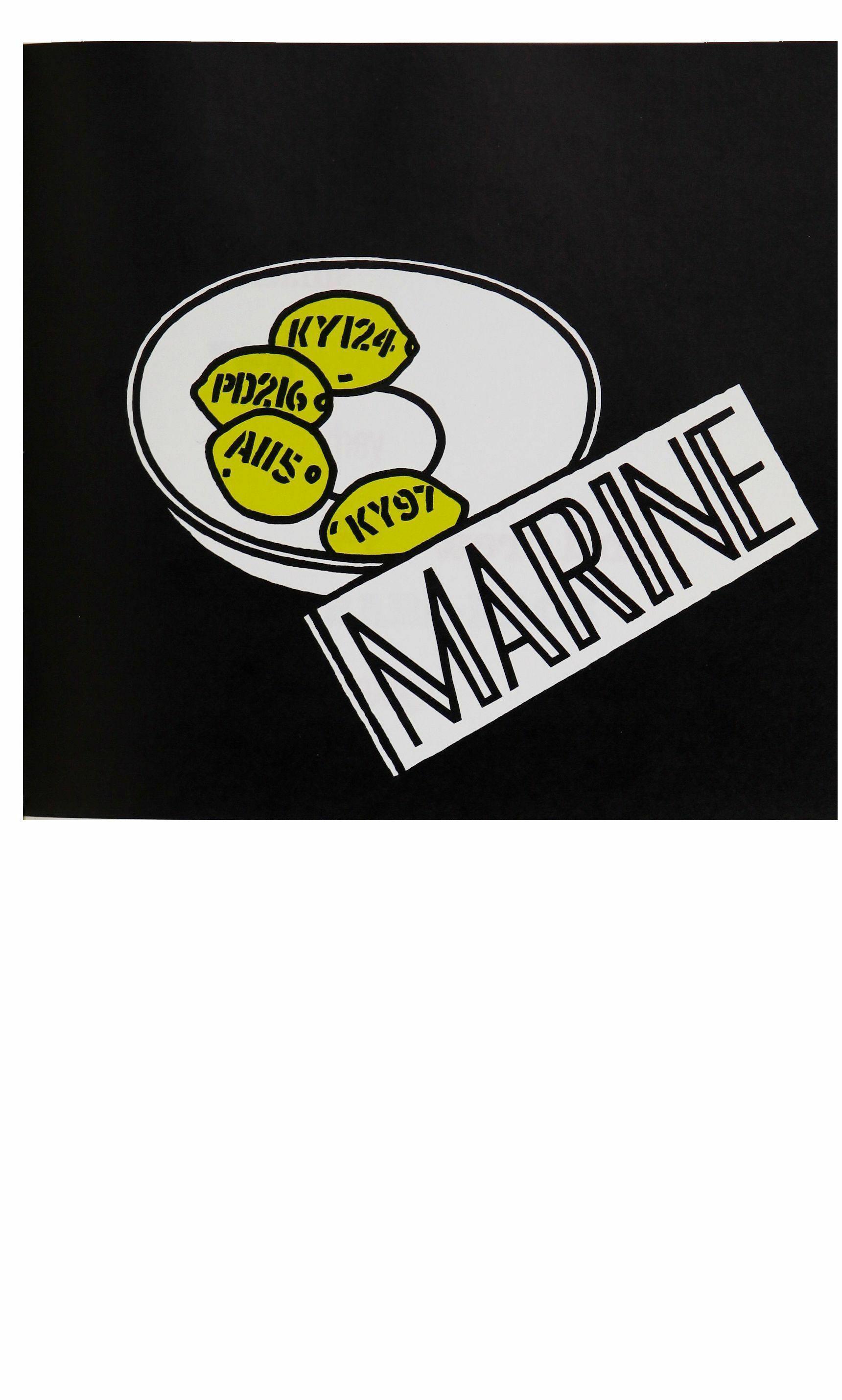
Ie circus!! smack K47 and crew
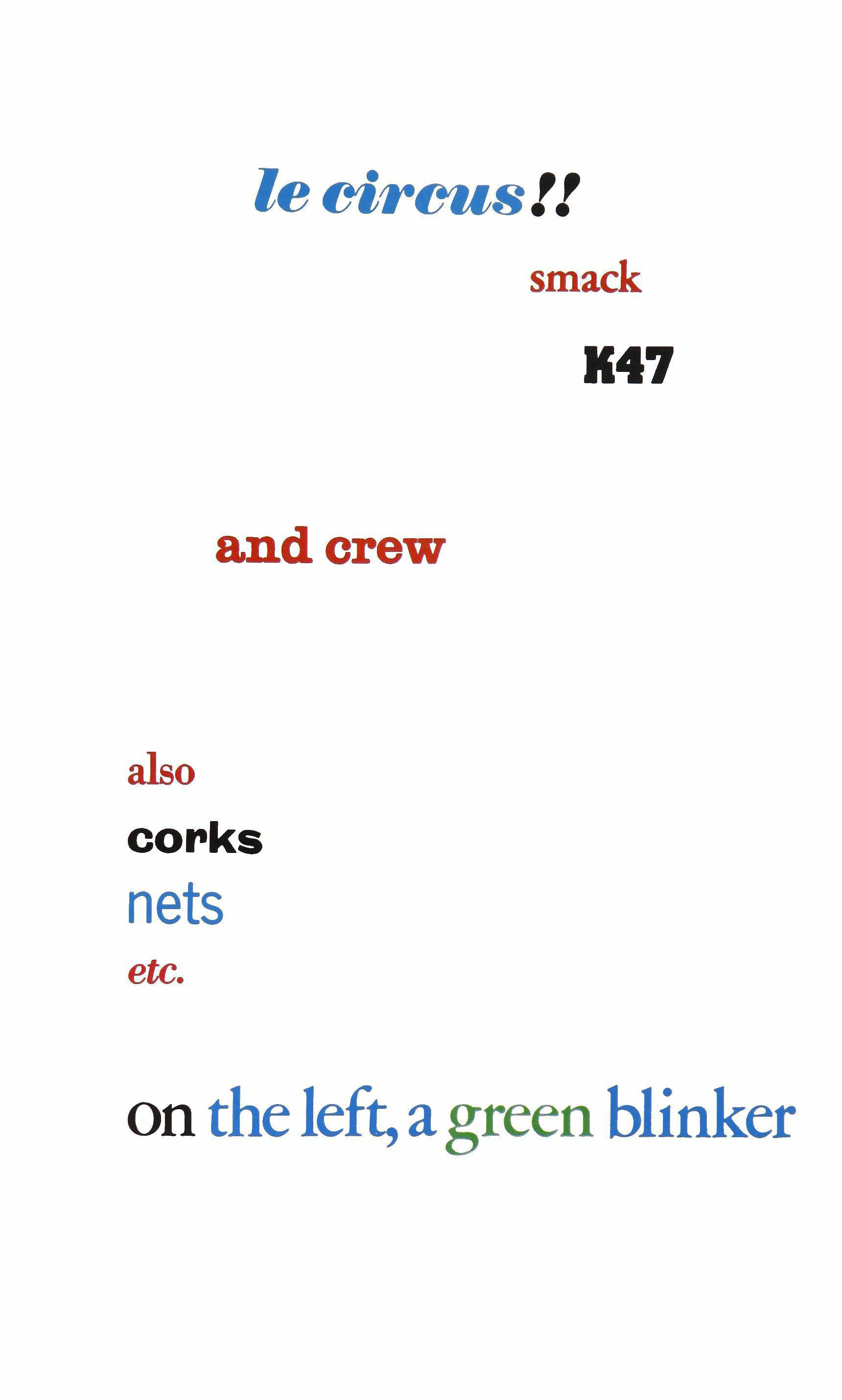
also corks nets etc.
on theleft, a green blinker
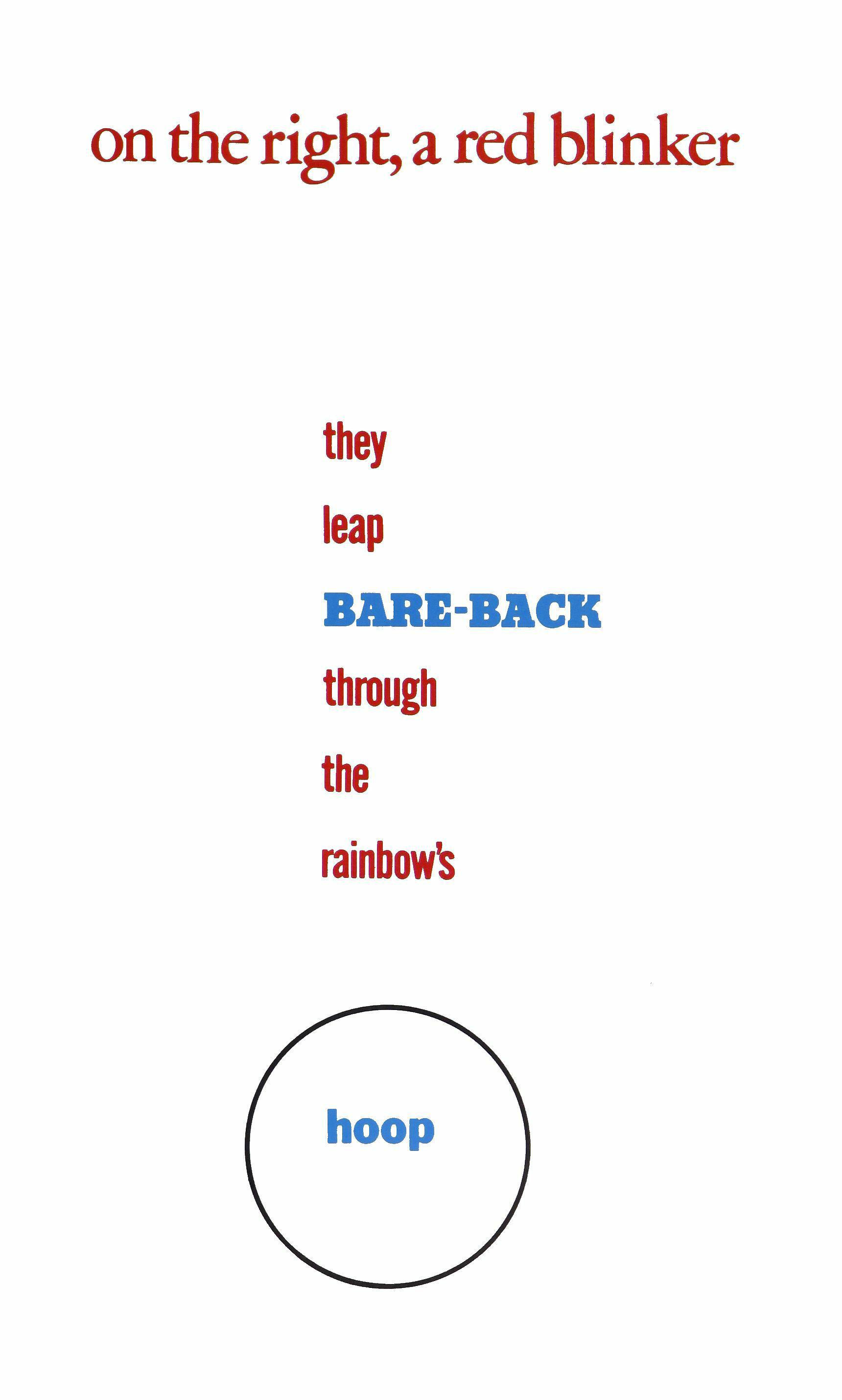
on theright, a red blinker they leap
BARB-BACK through the rainbow's hoop
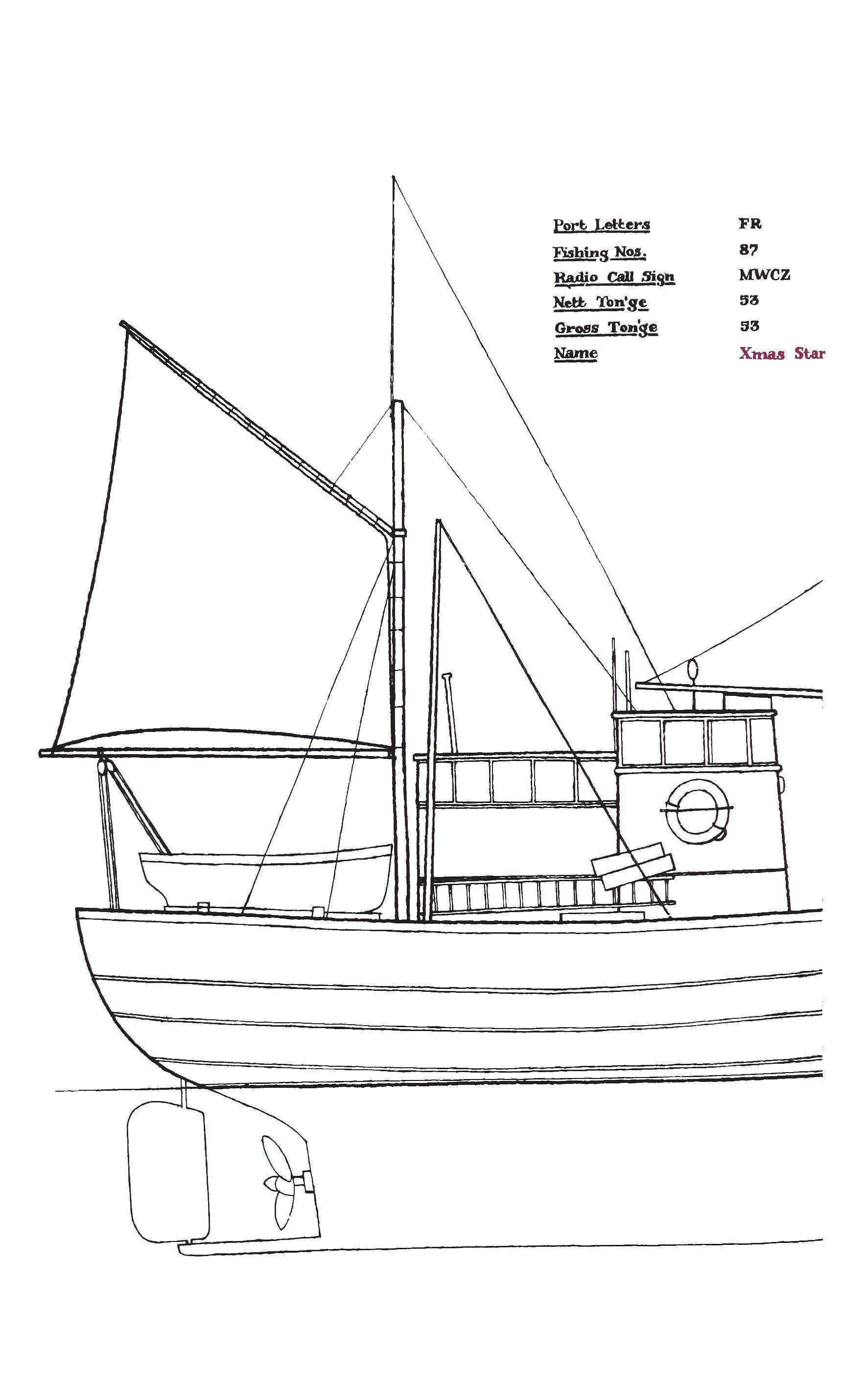 Port. Le!hr,s FiabinS NOJi. �o cau SiS!! Nett lOn's!.
Port. Le!hr,s FiabinS NOJi. �o cau SiS!! Nett lOn's!.
FRo 8? MWCZ 5<5 33 X1t1il8 Star
Gl"OBB TonlJ.!_ �
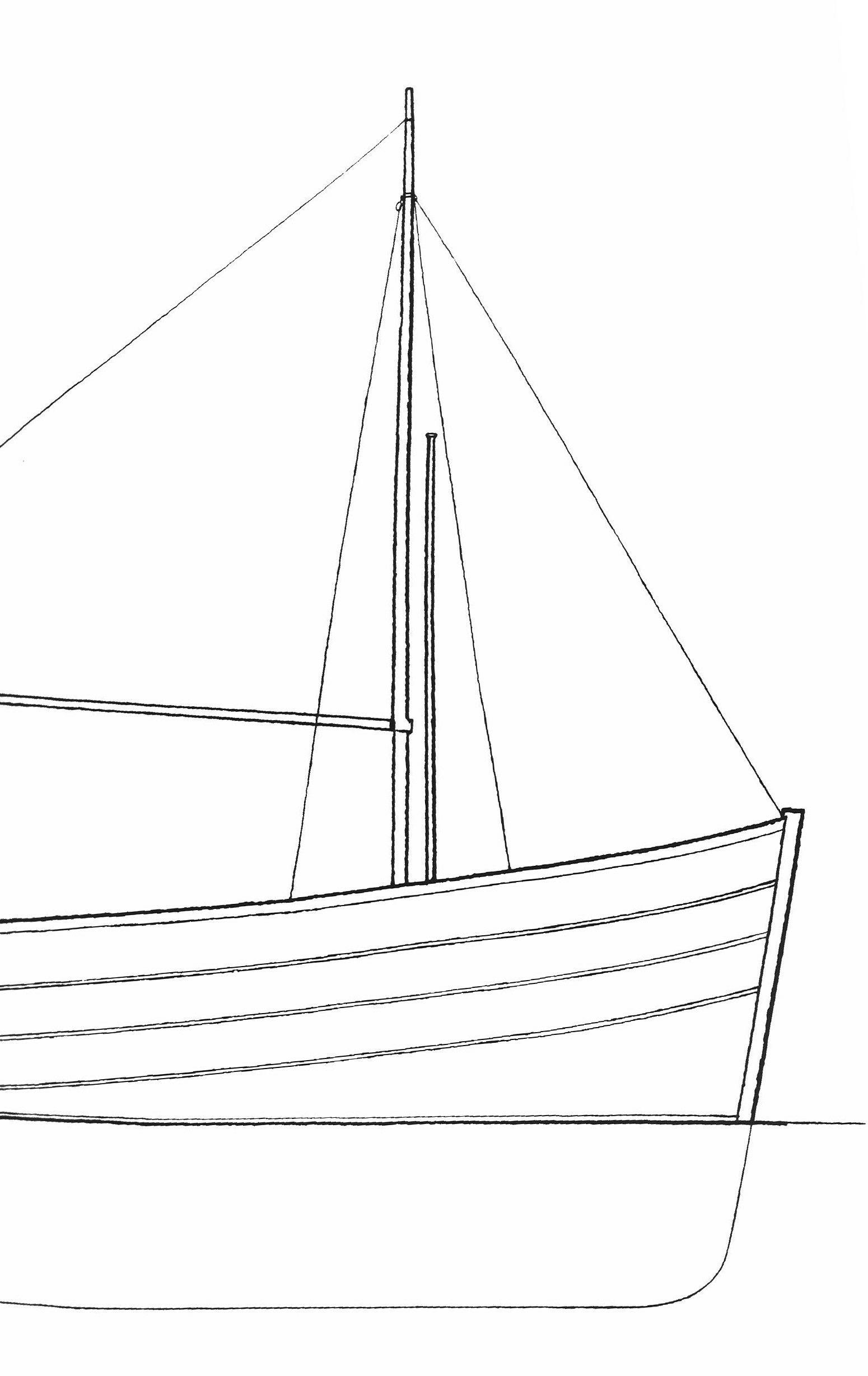
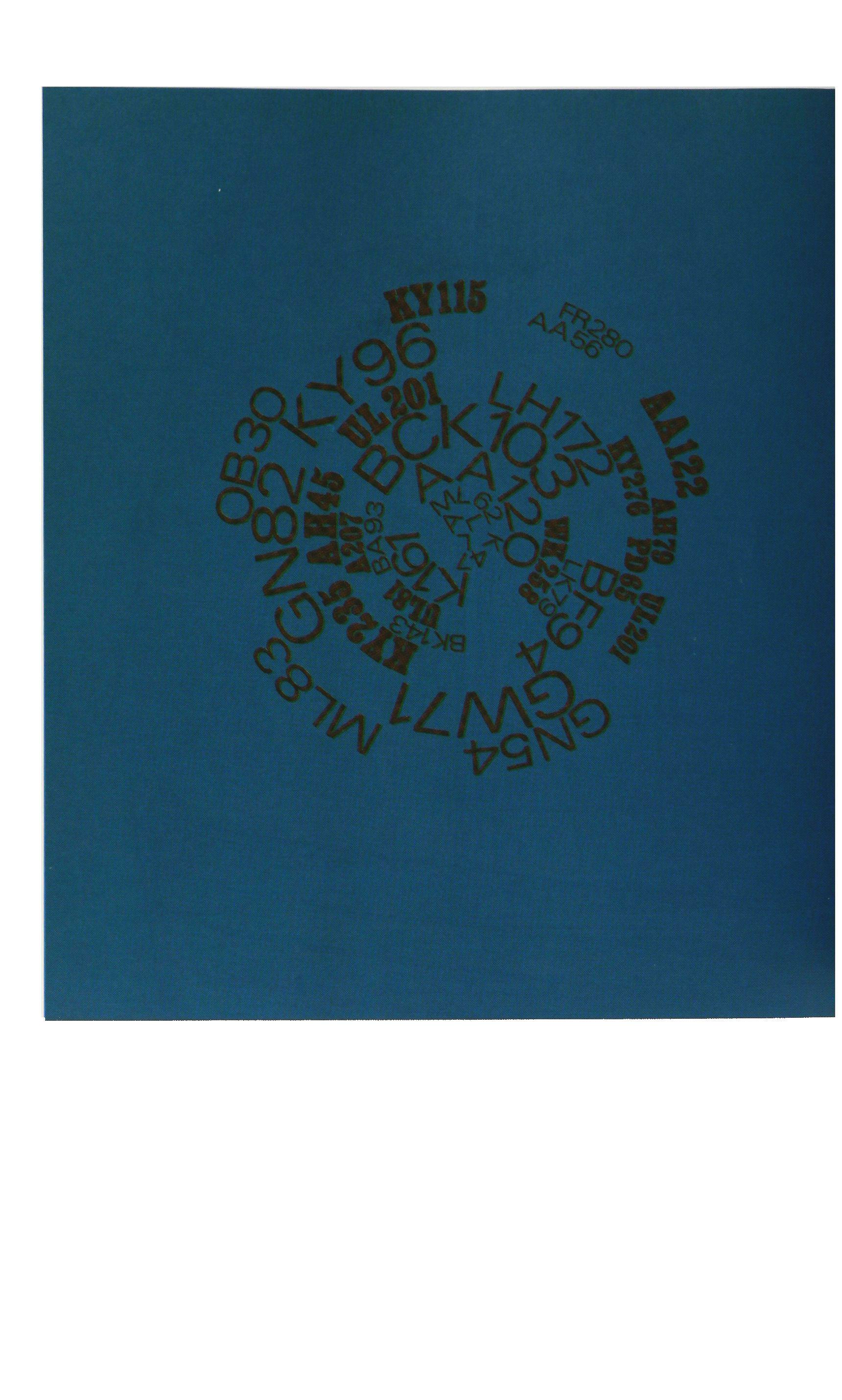


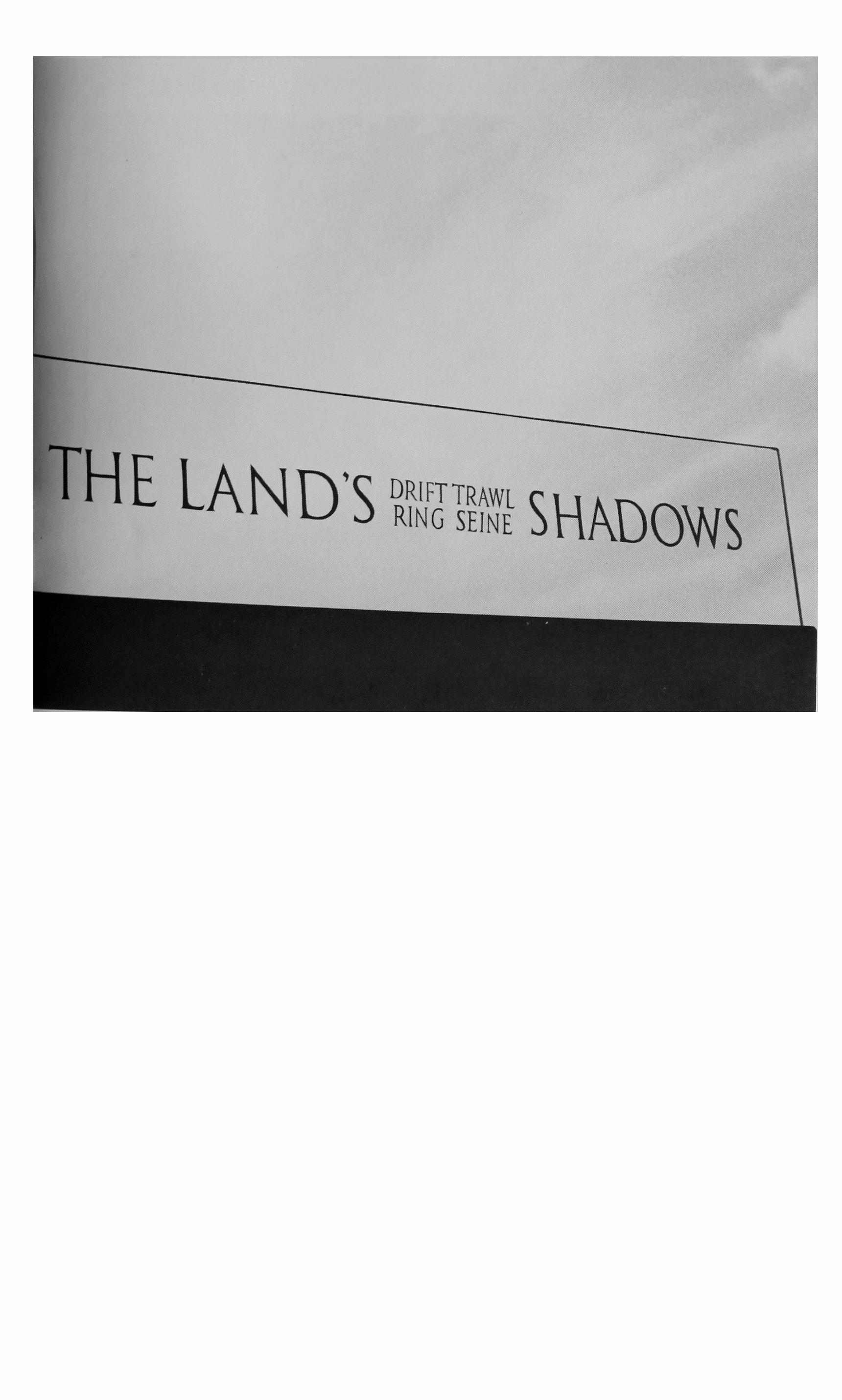
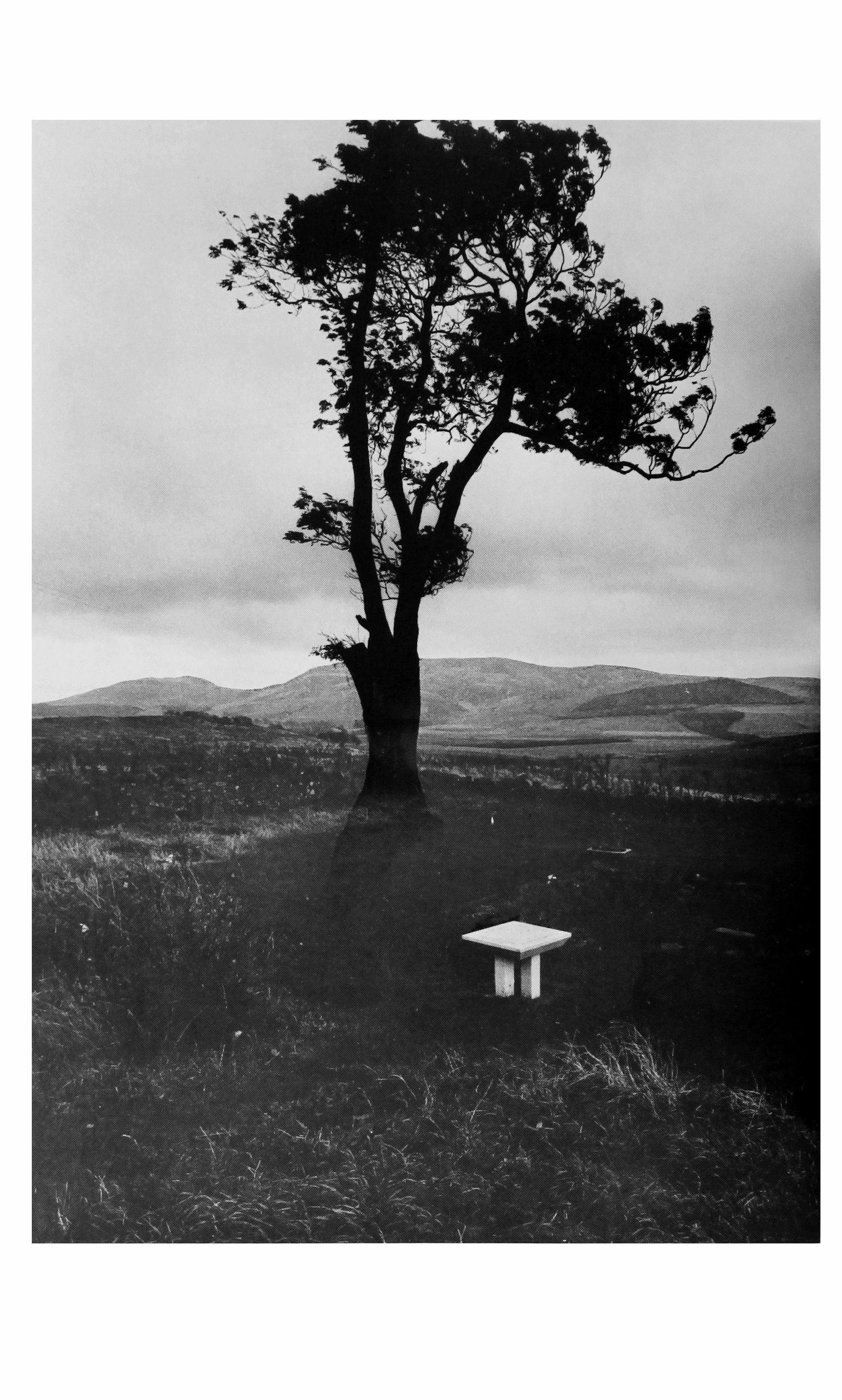


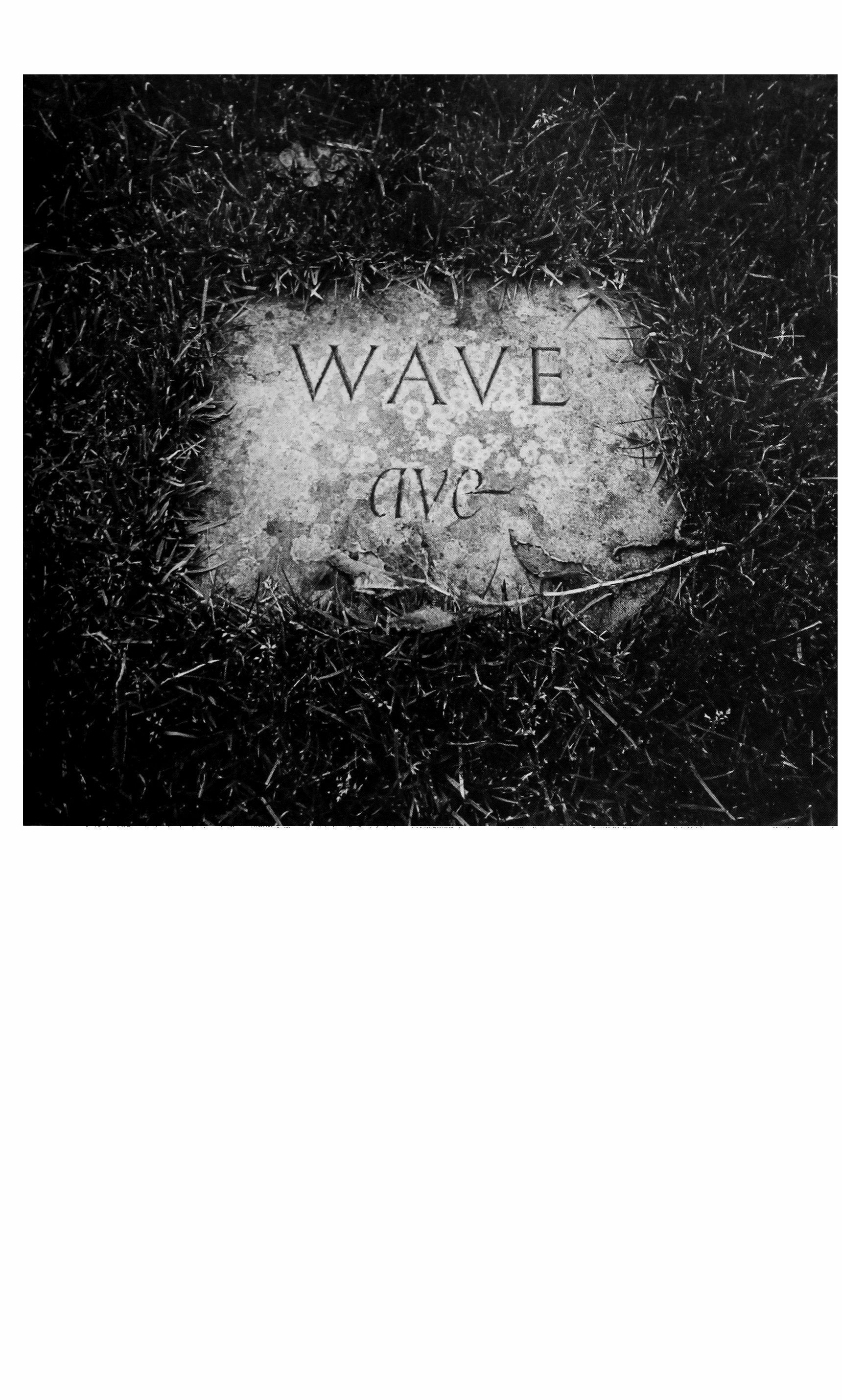
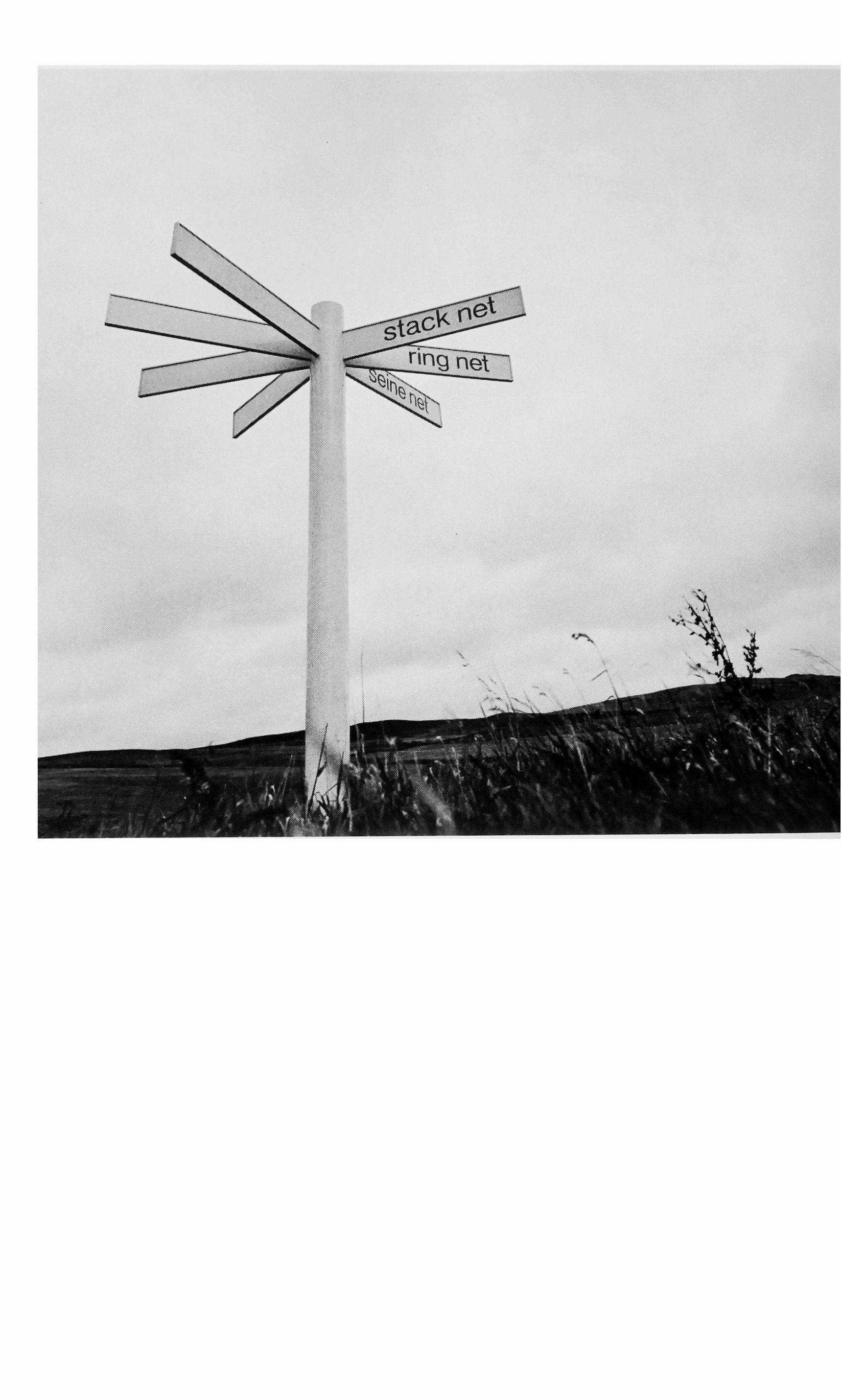
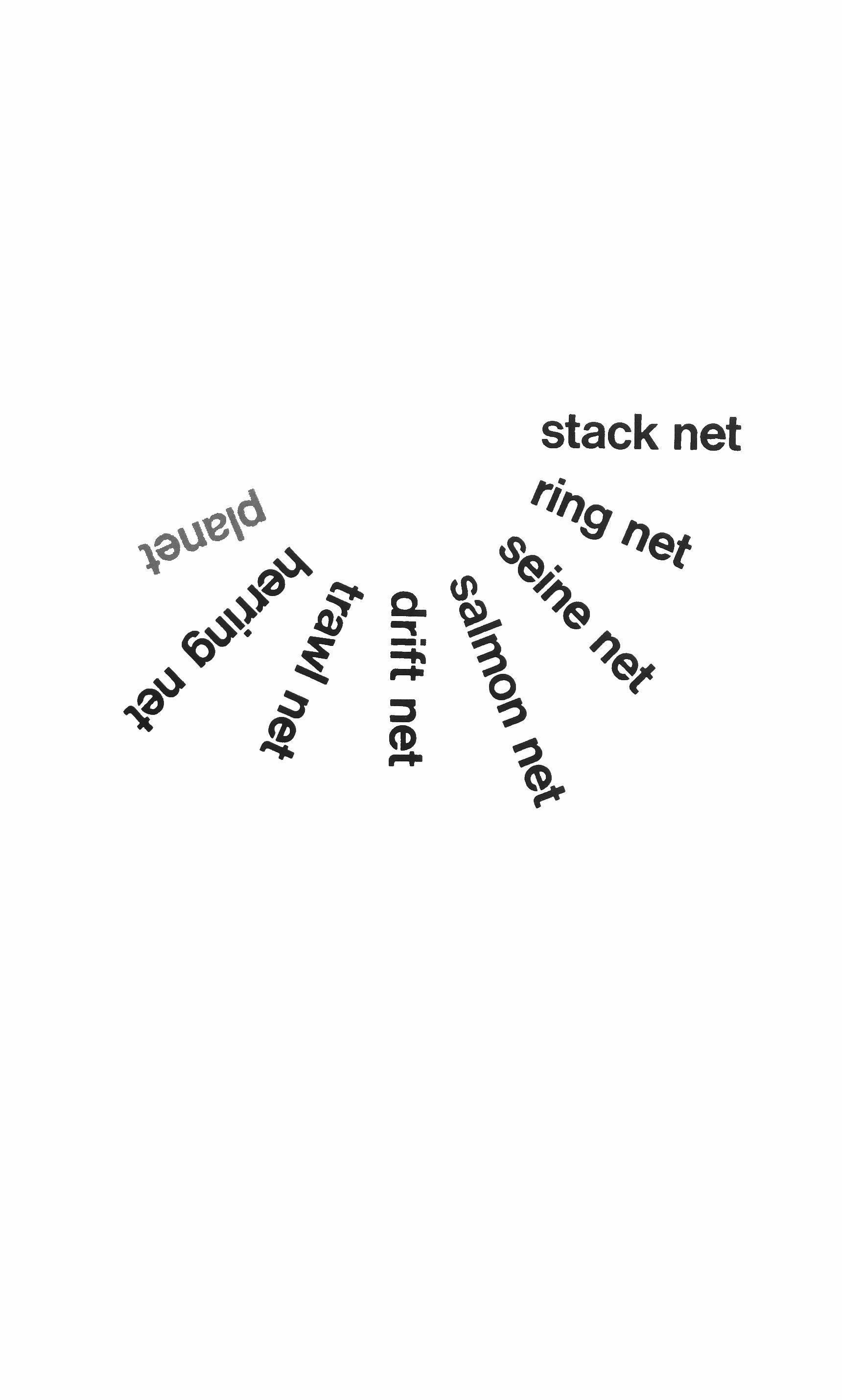
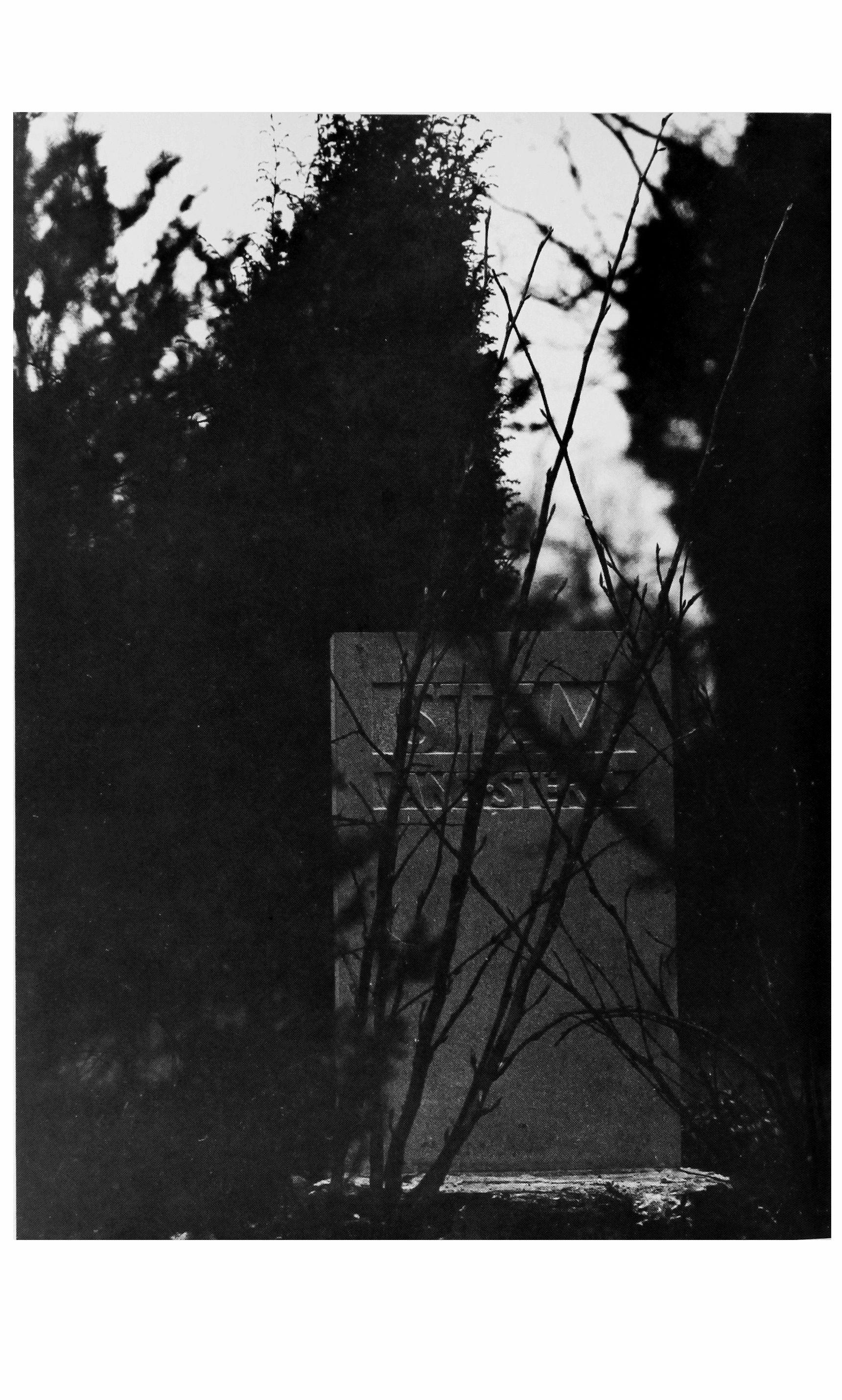
longliner longliner longliner
longliner longliner longliner longliner longliner
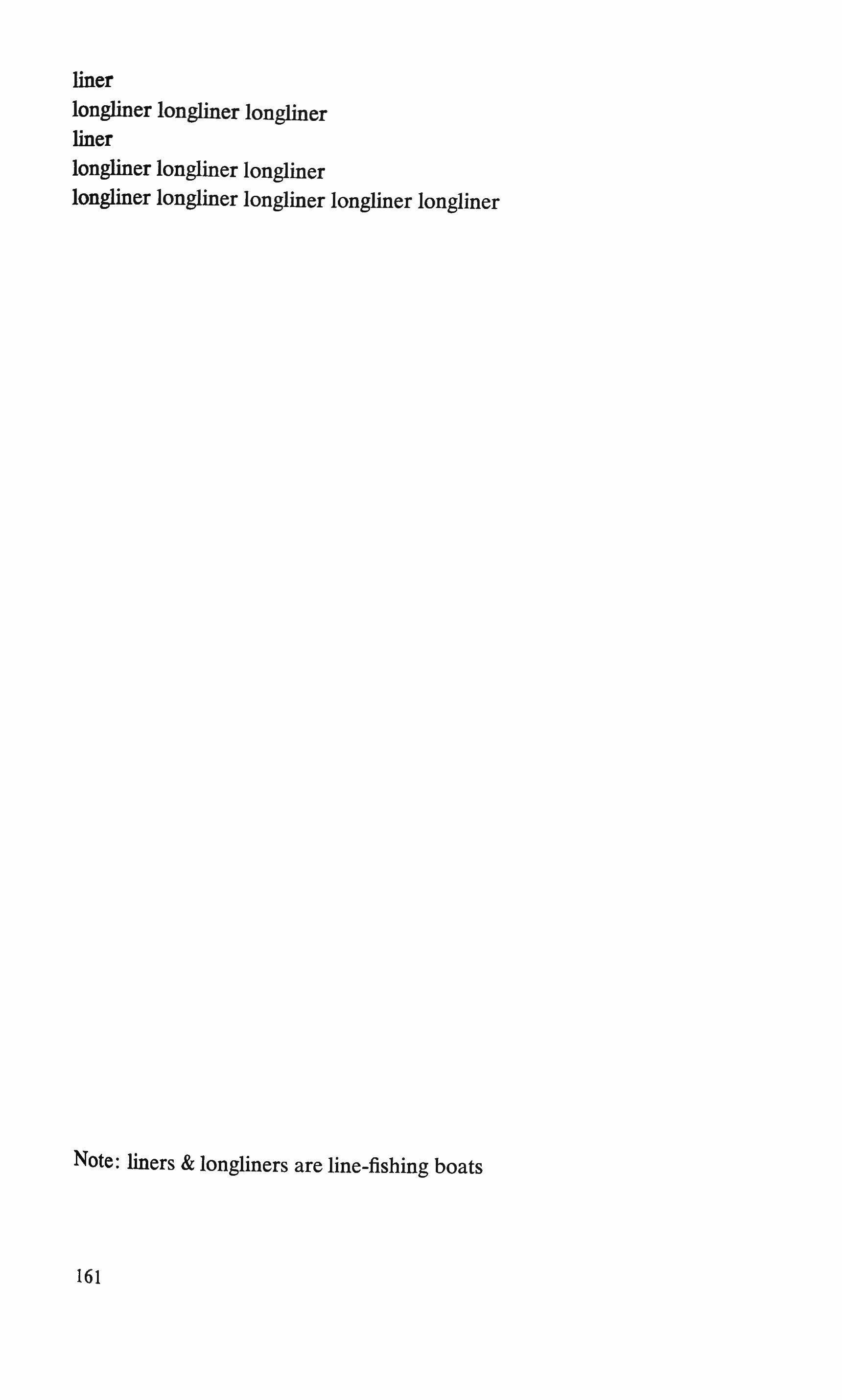
Note: liners & longliners are line-fishing boats
liner
longlinerlonglinerlongliner liner
161
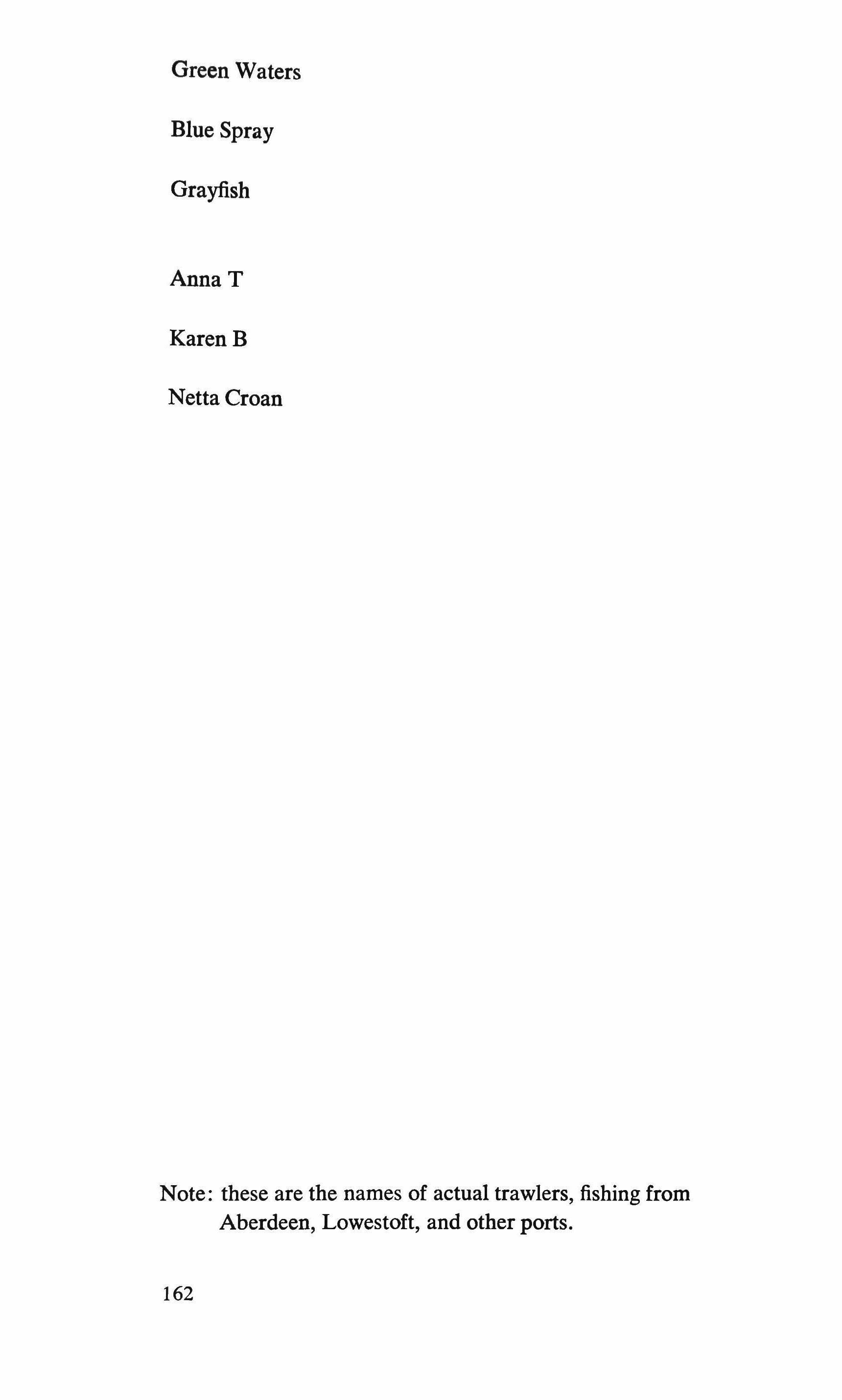
Note: these are the names of actual trawlers, fishing from Aberdeen, Lowestoft, and other ports.
Green Waters Blue Spray Grayfish AnnaT
KarenB
NettaCroan
162
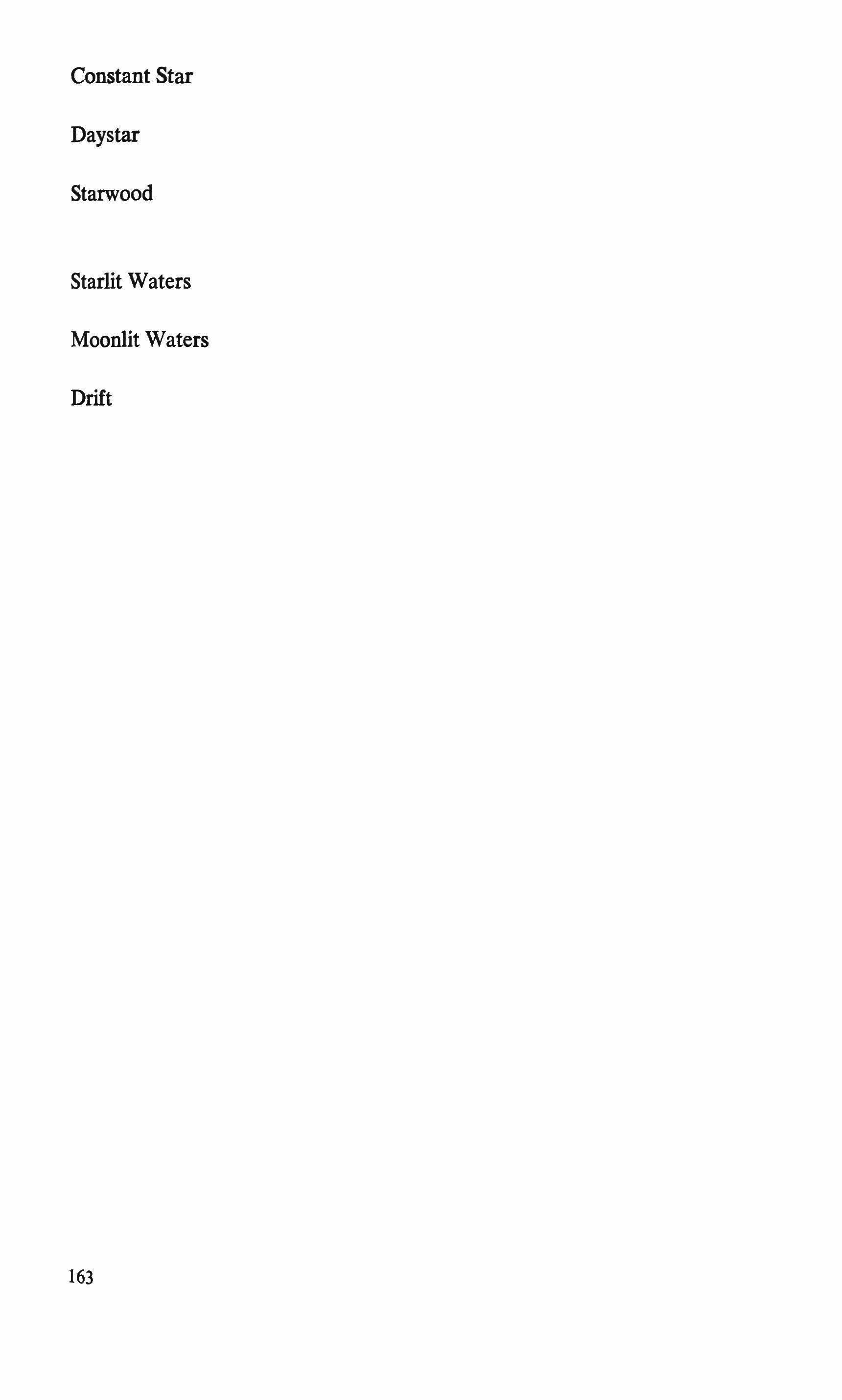
Constant Star Daystar Starwood
Moonlit
Drift 163
Starlit Waters
Waters
CHRISTOPHER LOGUE
Two sections from Patrocleia (Book XVI ofHomer's Iliad)
I
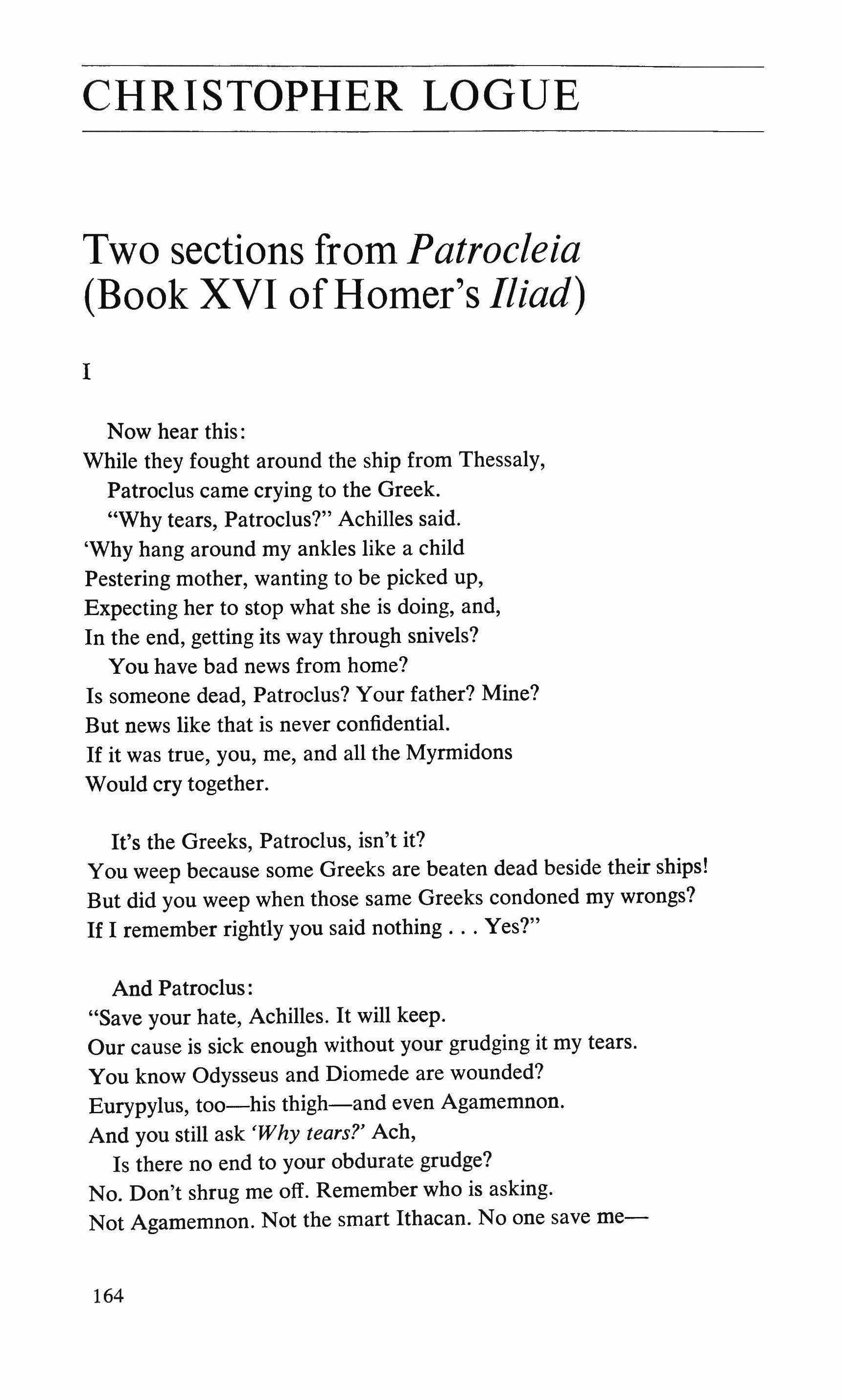
Now hear this:
While they fought around the ship from Thessaly, Patroclus came crying to the Greek. "Why tears, Patroclus?" Achilles said. 'Why hang around my ankles like a child Pestering mother, wanting to be picked up, Expecting her to stop what she is doing, and, In the end, getting its way through snivels? You have bad news from home? Is someone dead, Patroclus? Your father? Mine? But news like that is never confidential. If it was true, you, me, and all the Myrmidons Would cry together.
It's the Greeks, Patroc1us, isn't it?
You weep because some Greeks are beaten dead beside their ships! But did you weep when those same Greeks condoned my wrongs? If I remember rightly you said nothing Yes?"
And Patroclus:
"Save your hate, Achilles. It will keep. Our cause is sick enough without your grudging it my tears. You know Odysseus and Diomede are wounded? Eurypylus, too-his thigh-and even Agamemnon. And you still ask 'Why tears?' Ach, Is there no end to your obdurate grudge? No. Don't shrug me off. Remember who is asking. Not Agamemnon. Not the smart Ithacan. No one save me-
164
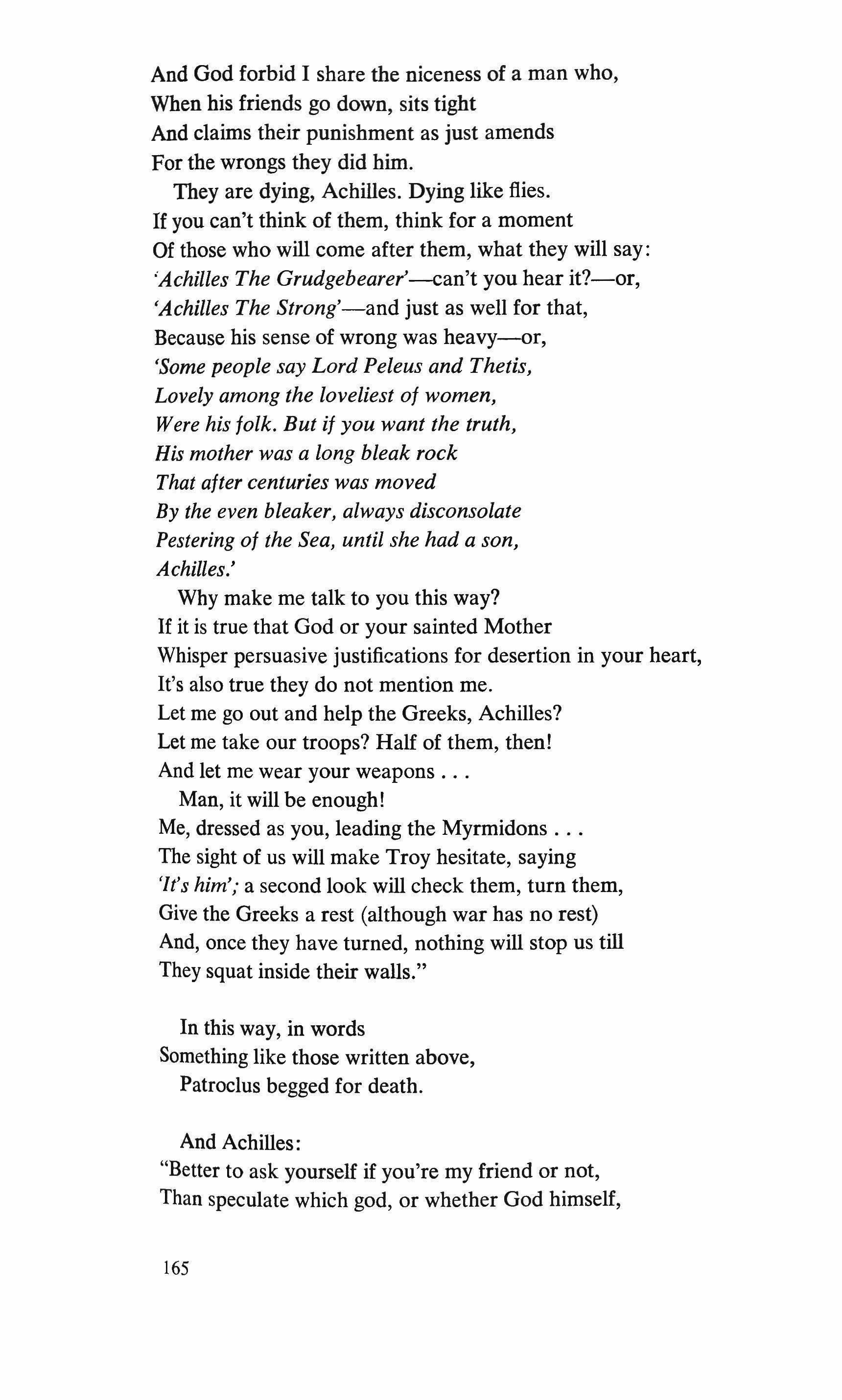
And God forbid I share the niceness of a man who, When his friends go down, sits tight And claims their punishment as just amends For the wrongs they did him. They are dying, Achilles. Dying like flies. If you can't think of them, think for a moment Of those who will come after them, what they will say: 'Achilles The Grudgebearer'-can't you hear it?-or, 'Achilles The Strong'-and just as well for that, Because his sense of wrong was heavy-or, 'Some people say Lord Peleus and Thetis, Lovely among the loveliest of women, Were his folk. But if you want the truth, His mother was a long bleak rock
That after centuries was moved
By the even bleaker, always disconsolate Pestering of the Sea, until she had a son, Achilles.'
Why make me talk to you this way?
If it is true that God or your sainted Mother Whisper persuasive justifications for desertion in your heart, It's also true they do not mention me.
Let me go out and help the Greeks, Achilles? Let me take our troops? Half of them, then! And let me wear your weapons Man, it will be enough!
Me, dressed as you, leading the Myrmidons The sight of us will make Troy hesitate, saying 'It's him'; a second look will check them, turn them, Give the Greeks a rest (although war has no rest) And, once they have turned, nothing will stop us till They squat inside their walls."
In this way, in words Something like those written above, Patroc1us begged for death.
And Achilles:
"Better to ask yourself if you're my friend or not, Than speculate which god, or whether God himself,
165
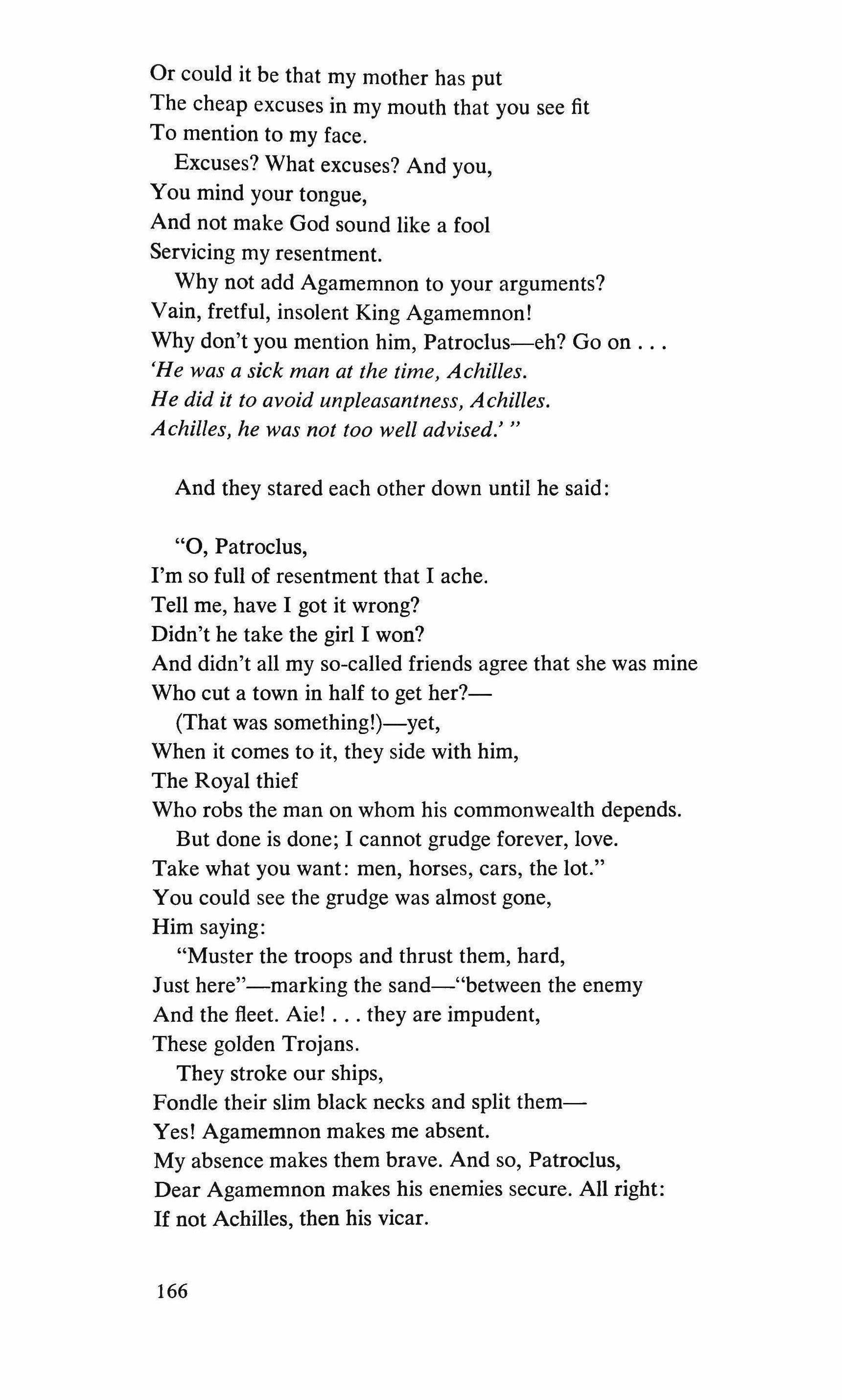
Or could it be that my mother has put The cheap excuses in my mouth that you see fit To mention to my face.
Excuses? What excuses? And you, You mind your tongue, And not make God sound like a fool Servicing my resentment. Why not add Agamemnon to your arguments? Vain, fretful, insolent King Agamemnon! Why don't you mention him, Patroc1us-eh? Go on 'He was a sick man at the time, Achilles. He did it to avoid unpleasantness, Achilles. Achilles, he was not too well advised.'
And they stared each other down until he said:
"0, Patroc1us, I'm so full of resentment that I ache.
Tell me, have I got it wrong? Didn't he take the girl I won? And didn't all my so-called friends agree that she was mine Who cut a town in half to get her?(That was something!)-yet, When it comes to it, they side with him, The Royal thief Who robs the man on whom his commonwealth depends. But done is done; I cannot grudge forever, love. Take what you want: men, horses, cars, the lot." You could see the grudge was almost gone, Him saying: "Muster the troops and thrust them, hard, Just here"-marking the sand-"between the enemy And the fleet. Aie! they are impudent, These golden Trojans. They stroke our ships, Fondle their slim black necks and split themYes! Agamemnon makes me absent. My absence makes them brave. And so, Patroclus, Dear Agamemnon makes his enemies secure. All right: If not Achilles, then his vicar.
166
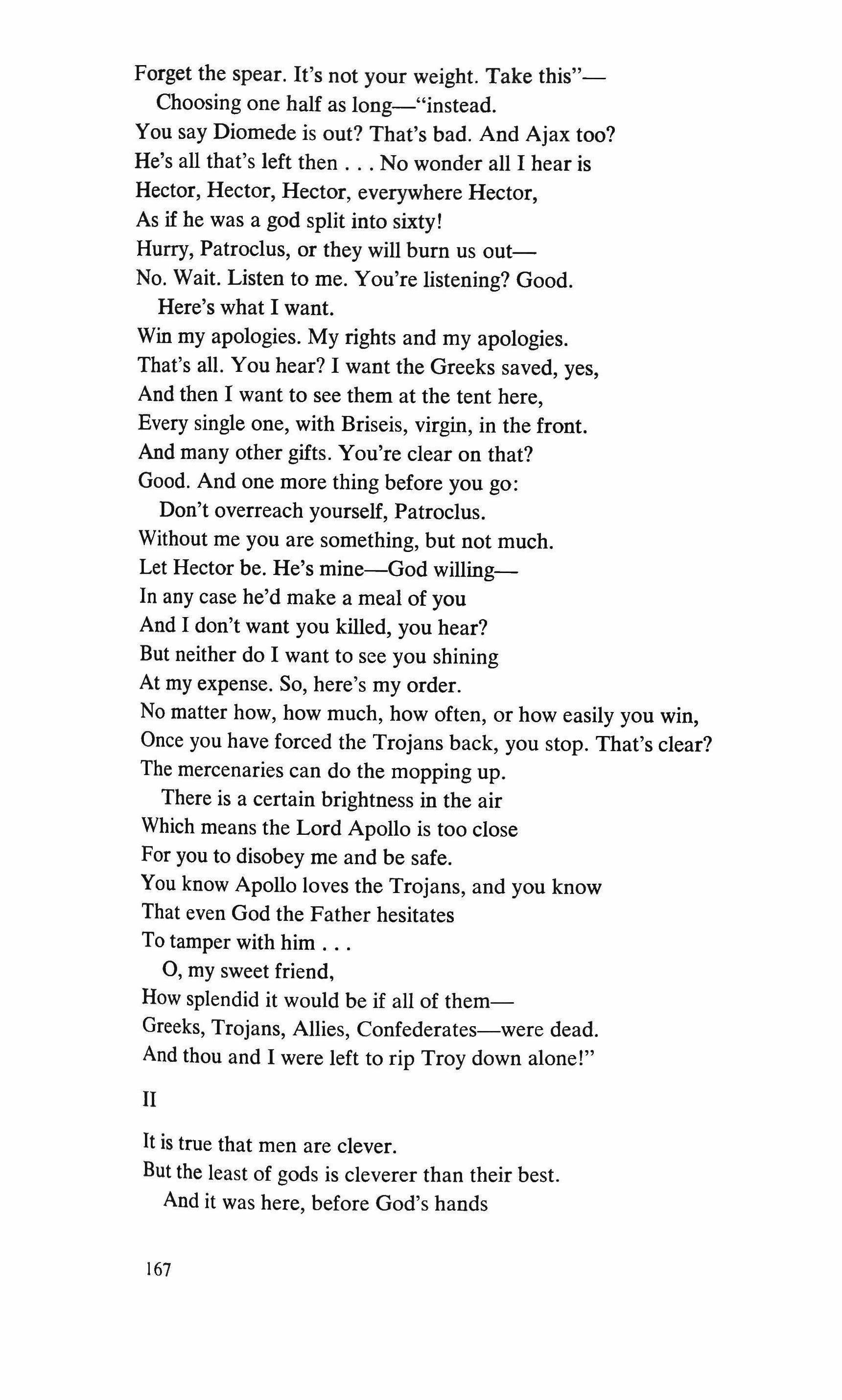
Forget the spear. It's not your weight. Take this"Choosing one half as long-"instead. You say Diomede is out? That's bad. And Ajax too? He's all that's left then No wonder all I hear is Hector, Hector, Hector, everywhere Hector, As if he was a god split into sixty! Hurry, Patroclus, or they will burn us outNo. Wait. Listen to me. You're listening? Good. Here's what I want. Win my apologies. My rights and my apologies. That's all. You hear? I want the Greeks saved, yes, And then I want to see them at the tent here, Every single one, with Briseis, virgin, in the front. And many other gifts. You're clear on that? Good. And one more thing before you go: Don't overreach yourself, Patroclus. Without me you are something, but not much. Let Hector be. He's mine-God willingIn any case he'd make a meal of you And I don't want you killed, you hear? But neither do I want to see you shining At my expense. So, here's my order. No matter how, how much, how often, or how easily you win, Once you have forced the Trojans back, you stop. That's clear? The mercenaries can do the mopping up. There is a certain brightness in the air Which means the Lord Apollo is too close For you to disobey me and be safe. You know Apollo loves the Trojans, and you know That even God the Father hesitates To tamper with him 0, my sweet friend, How splendid it would be if all of themGreeks, Trojans, Allies, Confederates-were dead. And thou and I were left to rip Troy down alone!"
II
It is true that men are clever. But the least of gods is cleverer than their best. And it was here, before God's hands
167
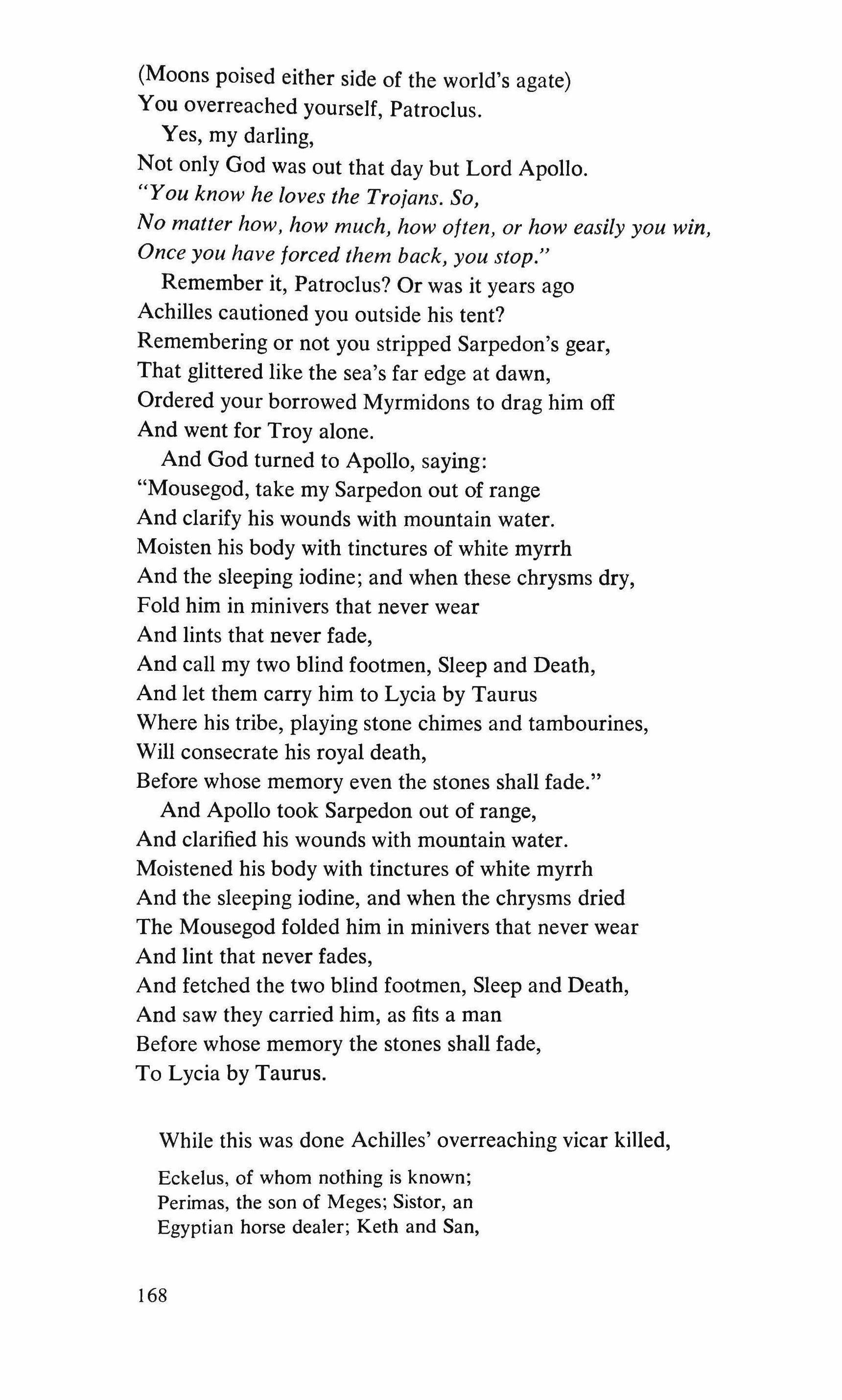
(Moons poised either side of the world's agate)
You overreached yourself, Patroclus. Yes, my darling,
Not only God was out that day but Lord Apollo. "You know he loves the Trojans. So,
No matter how, how much, how often, or how easily you win, Once you have forced them back, you stop."
Remember it, Patroclus? Or was it years ago Achilles cautioned you outside his tent?
Remembering or not you stripped Sarpedon's gear, That glittered like the sea's far edge at dawn, Ordered your borrowed Myrmidons to drag him off And went for Troy alone.
And God turned to Apollo, saying: "Mousegod, take my Sarpedon out of range
And clarify his wounds with mountain water.
Moisten his body with tinctures of white myrrh
And the sleeping iodine; and when these chrysms dry, Fold him in minivers that never wear
And lints that never fade, And call my two blind footmen, Sleep and Death, And let them carry him to Lycia by Taurus
Where his tribe, playing stone chimes and tambourines, Will consecrate his royal death, Before whose memory even the stones shall fade."
And Apollo took Sarpedon out of range, And clarified his wounds with mountain water.
Moistened his body with tinctures of white myrrh
And the sleeping iodine, and when the chrysms dried
The Mousegod folded him in minivers that never wear
And lint that never fades, And fetched the two blind footmen, Sleep and Death, And saw they carried him, as fits a man Before whose memory the stones shall fade, To Lycia by Taurus.
While this was done Achilles' overreaching vicar killed, Eckelus, of whom nothing is known; Perimas, the son of Meges; Sistor, an Egyptian horse dealer; Keth and San,
168
slaves to the former; Krates, a silversmith from Cyme; Doron, a regular; Pilarty, a cook; Fanes, Geyan, & Mastor, farriers; Toris, a merchant slaver.
Three times Patroclus climbed Troy's wall.
Three times his fingers scraped the parapet. Three times and every time he tried it on
The smiling Mousegod flicked him back.
But when he came a fourth, last time, The smile was gone.
Instead, from parapet to plain to beach-head, on,
Across the rucked, sunlit Aegean, the Mousegod's voice
Loud as ten thousand crying together-
Cried
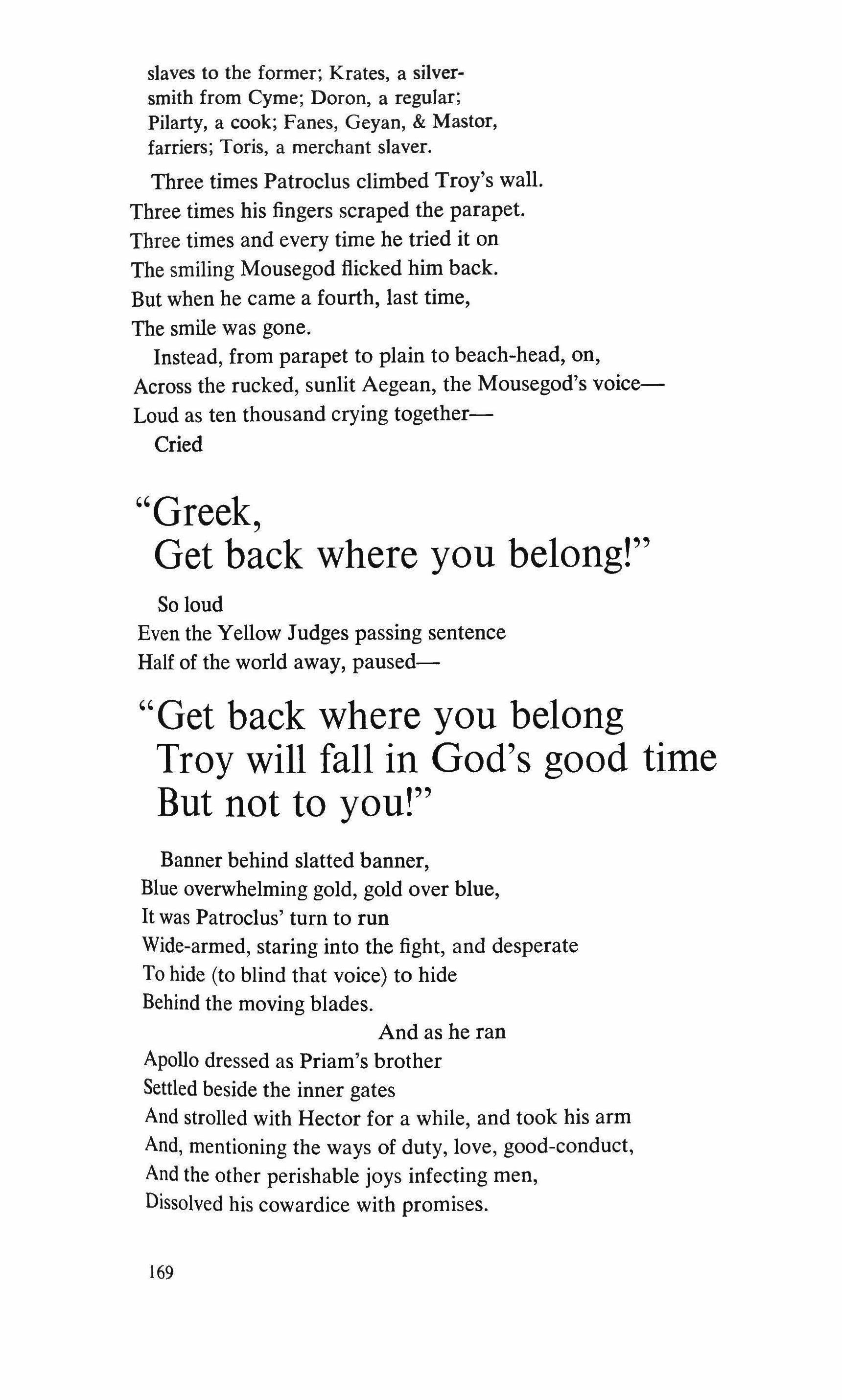
"Greek , Get back where you belong!"
So loud
Even the Yellow Judges passing sentence
Half of the world away, paused-
"Get back where you belong Troy will fall in God's good time But not to you!"
Banner behind slatted banner,
Blue overwhelming gold, gold over blue, It was Patroclus' turn to run
Wide-armed, staring into the fight, and desperate
To hide (to blind that voice) to hide Behind the moving blades.
And as he ran
Apollo dressed as Priam's brother
Settled beside the inner gates
And strolled with Hector for a while, and took his arm
And, mentioning the ways of duty, love, good-conduct, And the other perishable joys infecting men, Dissolved his cowardice with promises.
169
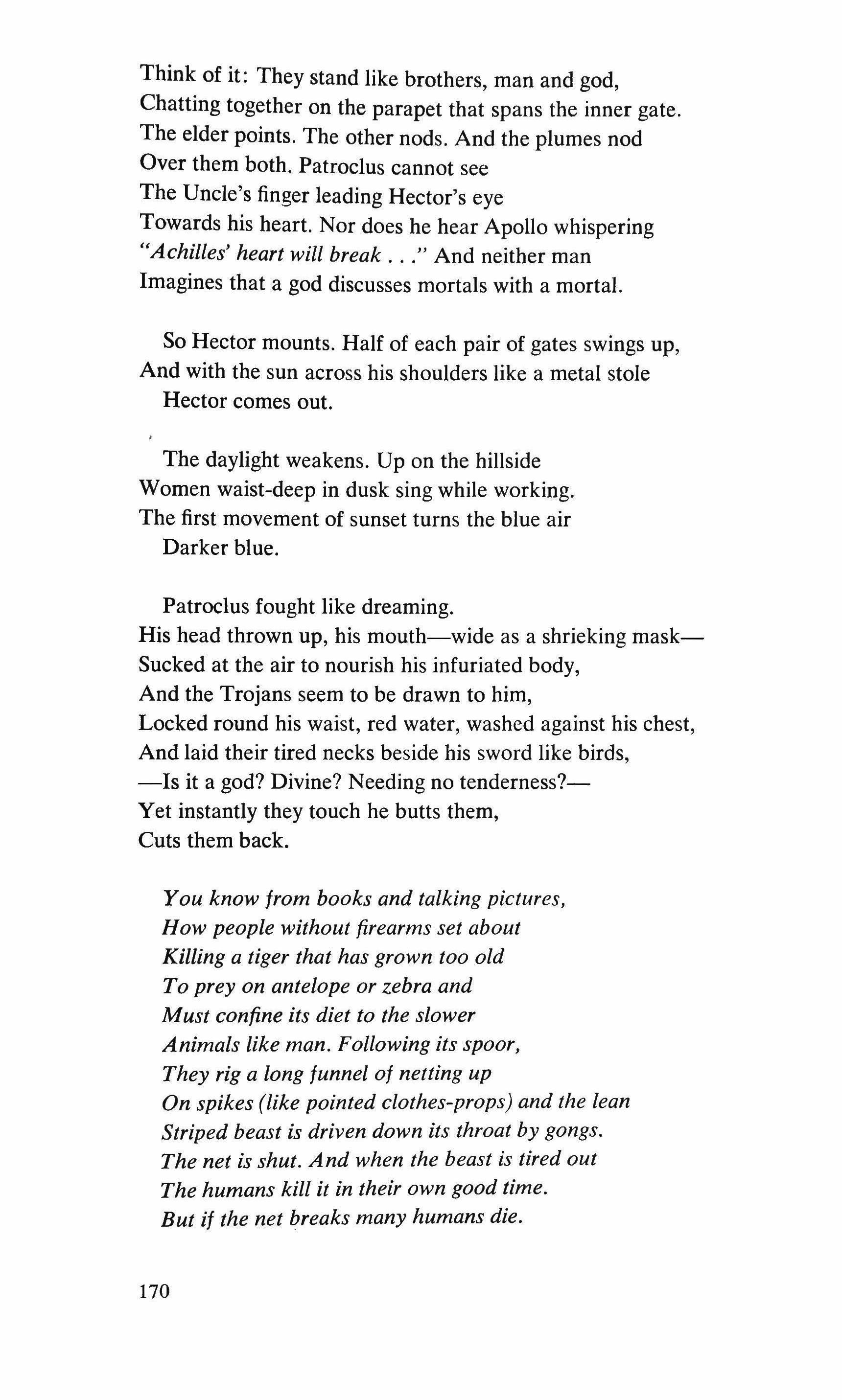
Think of it: They stand like brothers, man and god, Chatting together on the parapet that spans the inner gate. The elder points. The other nods. And the plumes nod Over them both. Patroclus cannot see The Uncle's finger leading Hector's eye
Towards his heart. Nor does he hear Apollo whispering "Achilles' heart will break And neither man Imagines that a god discusses mortals with a mortal.
So Hector mounts. Half of each pair of gates swings up, And with the sun across his shoulders like a metal stole Hector comes out.
The daylight weakens. Up on the hillside
Women waist-deep in dusk sing while working. The first movement of sunset turns the blue air Darker blue.
Patroclus fought like dreaming. His head thrown up, his mouth-wide as a shrieking maskSucked at the air to nourish his infuriated body, And the Trojans seem to be drawn to him, Locked round his waist, red water, washed against his chest, And laid their tired necks beside his sword like birds, -Is it a god? Divine? Needing no tenderness?Yet instantly they touch he butts them, Cuts them back.
You know from books and talking pictures, How people without firearms set about Killing a tiger that has grown too old
To prey on antelope or zebra and Must confine its diet to the slower Animals like man. Following its spoor, They rig a long funnel of netting up
On spikes (like pointed clothes-props) and the lean Striped beast is driven down its throat by gongs. The net is shut. And when the beast is tired out
The humans kill it in their own good time. But if the net breaks many humans die.
170

Likewise Patroclus broke among the Trojans. A set of zealous bones covered with flesh, Finished with bronze, dipped in blood, And the whole being inspired by ferocity.
-Kill them!
My sweet Patroclus, -Kill them!
As many as you can, For
Coming behind you in the dusk you felt -What was it?-felt the darkness part and then
Apollo!
Who had been patient with you, Struck.
His hand came out of the east, And in his wrist lay eternity. And every atom of his mythic weight Was poised between his fist and bent left leg, And it hit the small of your back, Patroclus Your eyes leant out. Achilles' helmet rang Far and away beneath the cannon-bones of enemy horses, And Achilles' breastplate (five copper plys Mastered with even bronze) split like a pod. And you were footless staggering amazed Between the clumps of dying, dying yourself, Dazed by the brilliance in your eyes And the noise, like weirs heard far away.
So you staggered, blind eyes open, Dabbling your astounded fingers in the vomit On your chest.
And all the Trojans lay and stared at you, Propped themselves up and stared at you,
171

Feeling themselves as blest as you felt cursed. All of them just lay and stared
Except a boy called Euphorbus. He took his chance and cast. The javeline went through both your calves, Stitching your knees together, and you fell (Not noticing the pain) and tried to crawl Towards the fleet, and-even now-snatching Euphorbus' ankle-Ah!-and got it? No
Not a boy's ankle that you got, But Hector's
Standing above you, His bronze mask smiling down into your face, Putting his spear through ach, and saying, "Why tears, Patroclus?
Did you hope to melt Troy down And make our women carry home the ingots for you?
I can imagine it!
You and your marvellous Achilles sitting, Him with his upright finger wagging, saying, 'Don't show your face in here again, Patroclus, Unless it's red with Hector's blood.' You fool.
You weak, impudent, silly little fool." And Patroclus, Shaking his voice out of his body, says "Big mouth, Remember it took three of you to kill me. A god, a boy, and last of all, a hero!
I can hear Death
Calling my name and yet, Somehow it sounds like 'Hector'
And when I close my eyes I see Achilles' face with Death's voice coming out of it."
Saying these things Patroclus died. And as his soul went through the sand like water, Hector withdrew his spear and said "Perhaps." 172
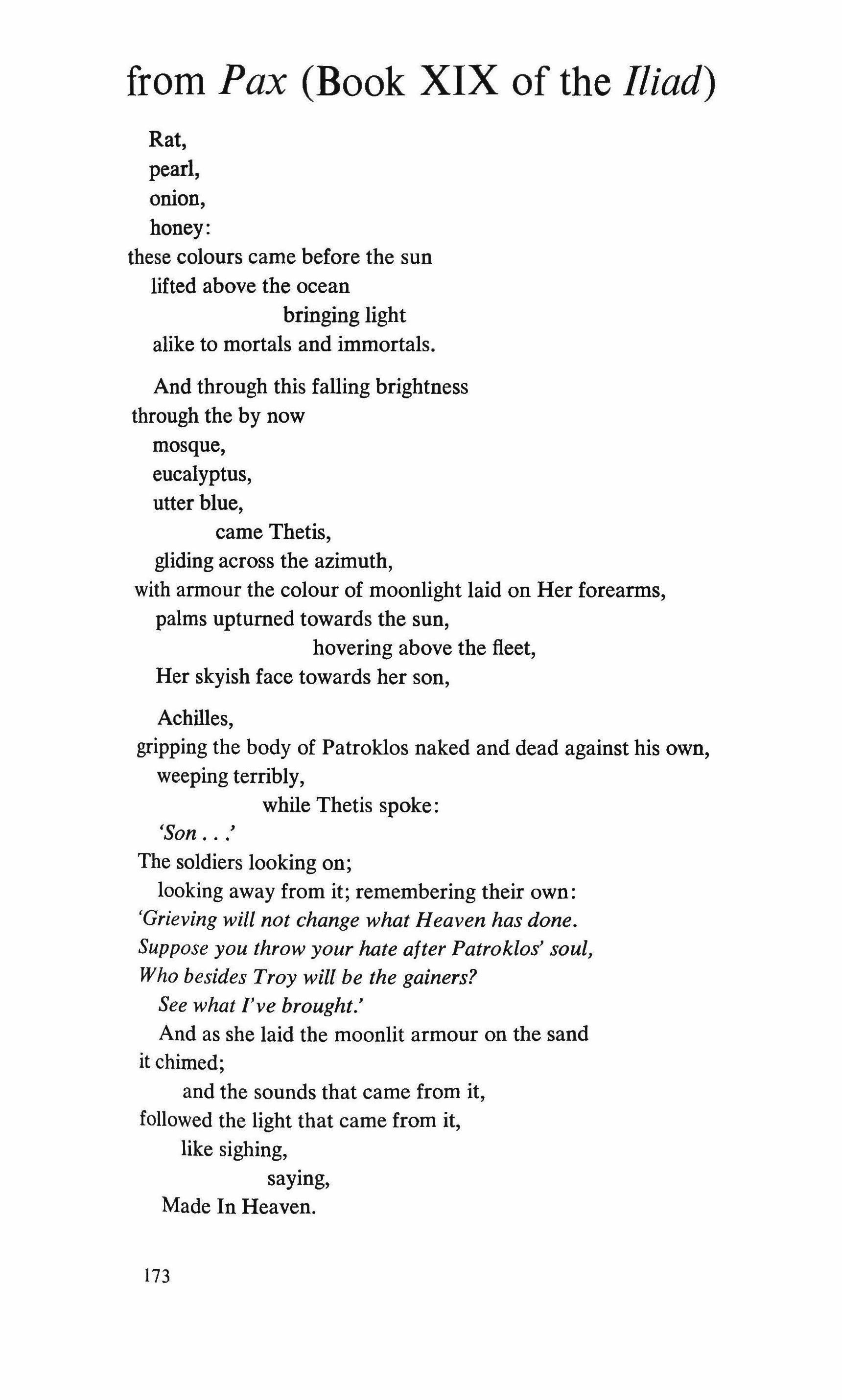
from Pax (Book XIX of the Iliad)
Rat, pearl, onion, honey: these colours came before the sun lifted above the ocean bringing light alike to mortals and immortals.
And through this falling brightness through the by now mosque, eucalyptus, utter blue, came Thetis, gliding across the azimuth, with armour the colour of moonlight laid on Her forearms, palms upturned towards the sun, hovering above the fleet, Her skyish face towards her son, Achilles, gripping the body of Patroklos naked and dead against his own, weeping terribly, while Thetis spoke: 'Son .'
The soldiers looking on; looking away from it; remembering their own: 'Grieving will not change what Heaven has done. Suppose you throw your hate after Patroklos' soul, Who besides Troy will be the gainers? See what I've brought.'
And as she laid the moonlit armour on the sand it chimed; and the sounds that came from it, followed the light that came from it, like sighing, saying, Made In Heaven.
173

And those who had the neck to watch Achilles weep could not look now. Nobody looked. They were afraid.
Except Achilles. Looked, lifted a piece of it between his hands; turned it; tested the weight of it; then, spun the holy tungsten like a star between his knees, slitting his eyes against the flare, some said, by other thought the hatred shuttered by his lids, made him protect the metal.
His eyes like furnace doors ajar.
When he had got its weight and let its industry console his grief a bit, 'I'll fight' he said. Simple as that. 'I'll fight.'
And so Troy fell.
'But while I fight what will become of this'Patroklos-'Mother?
'Inside an hour a thousand slimy things will burrow. And if the fight drags on his flesh will swarm like water boiling.' And She: 'Son, while you fight Nothing shall taint him, Sun will not touch him, Nor the slimy things.'
Promising this she slid rare ickors in the seven born openings of Patroklos' head, making his carrion radiant.
And her Achilles went to make amends, walking alone beside the broken lace that hung over the sea's green fist.
The sea that is always counting.
Ever since men began in time, time and
174
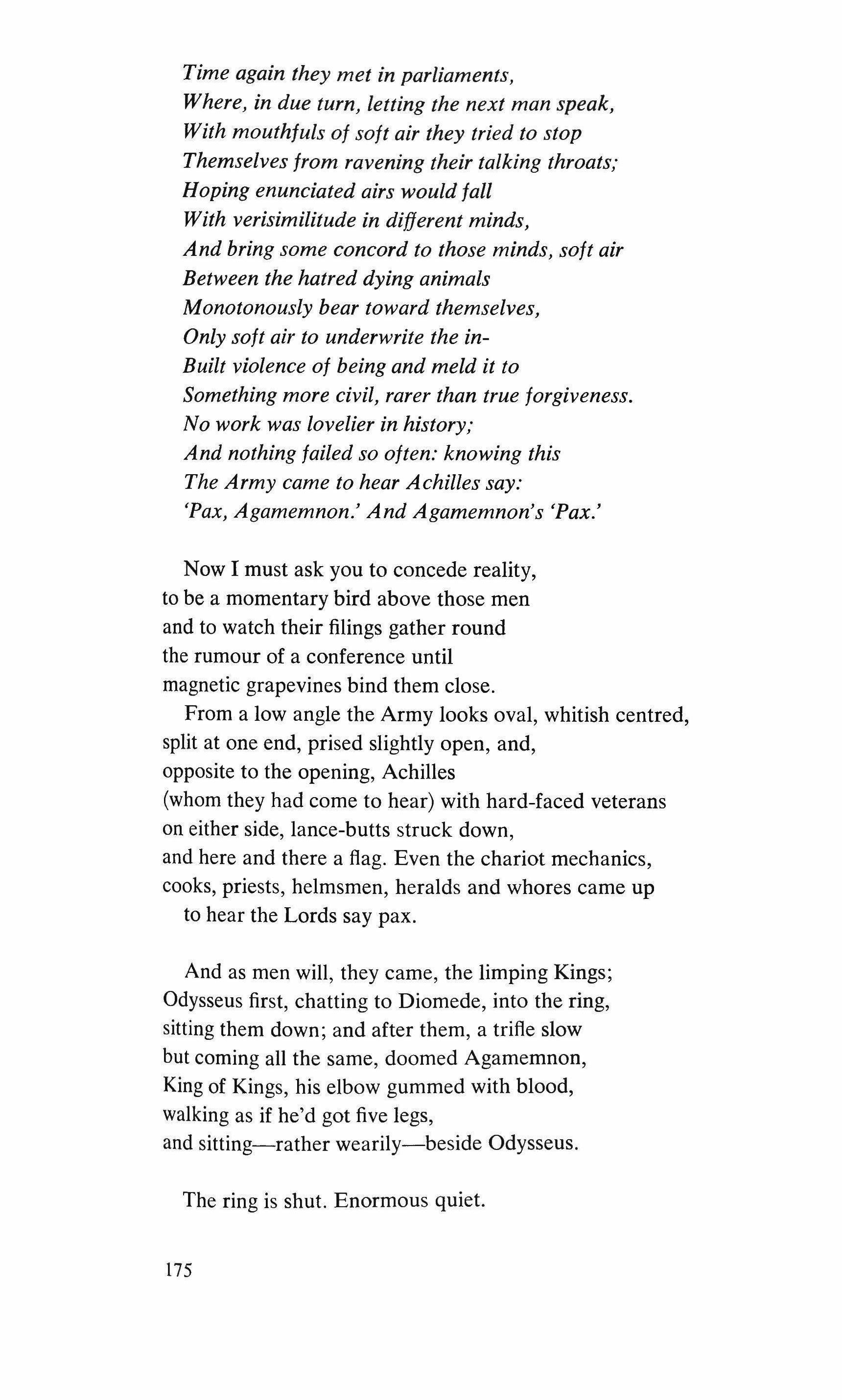
Time again they met in parliaments, Where, in due turn, letting the next man speak, With mouthfuls of soft air they tried to stop Themselves from ravening their talking throats; Hoping enunciated airs would fall With verisimilitude in different minds, And bring some concord to those minds, soft air
Between the hatred dying animals
Monotonously bear toward themselves, Only soft air to underwrite the inBuilt violence of being and meld it to Something more civil, rarer than true forgiveness. No work was lovelier in history; And nothing failed so often: knowing this The Army came to hear Achilles say: 'Pax, Agamemnon.' And Agamemnon's 'Pax.'
Now I must ask you to concede reality, to be a momentary bird above those men and to watch their filings gather round the rumour of a conference until magnetic grapevines bind them close. From a low angle the Army looks oval, whitish centred, split at one end, prised slightly open, and, opposite to the opening, Achilles (whom they had come to hear) with hard-faced veterans on either side, lance-butts struck down, and here and there a flag. Even the chariot mechanics, cooks, priests, helmsmen, heralds and whores came up to hear the Lords say pax.
And as men will, they came, the limping Kings; Odysseus first, chatting to Diomede, into the ring, sitting them down; and after them, a trifle slow but coming all the same, doomed Agamemnon, King of Kings, his elbow gummed with blood, walking as if he'd got five legs, and sitting-rather wearily-beside Odysseus.
The ring is shut. Enormous quiet.
175
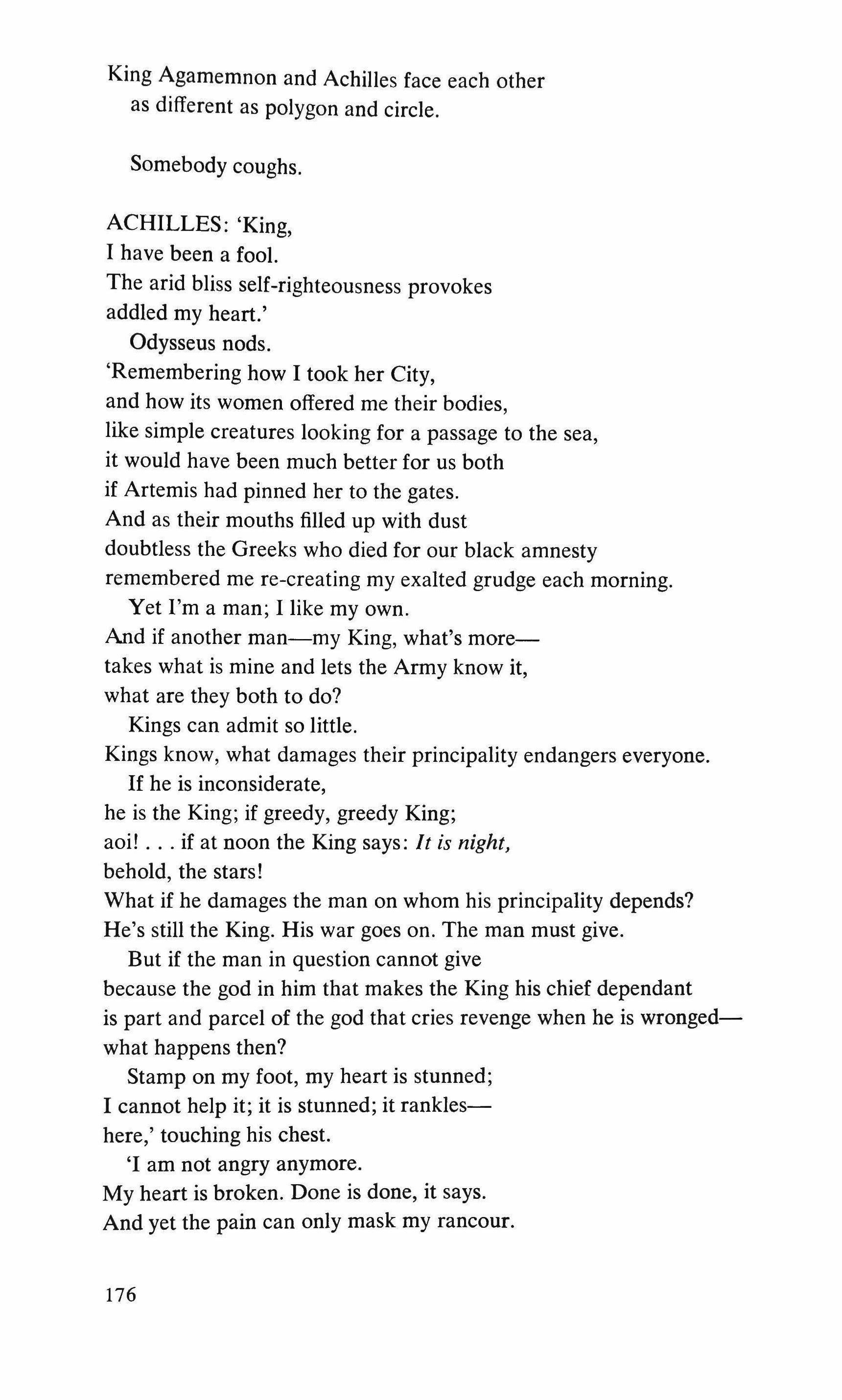
King Agamemnon and Achilles face each other as different as polygon and circle.
Somebody coughs.
ACHILLES: 'King, I have been a fool.
The arid bliss self-righteousness provokes addled my heart.'
Odysseus nods.
'Remembering how I took her City, and how its women offered me their bodies, like simple creatures looking for a passage to the sea, it would have been much better for us both if Artemis had pinned her to the gates. And as their mouths filled up with dust doubtless the Greeks who died for our black amnesty remembered me re-creating my exalted grudge each morning.
Yet I'm a man; I like my own.
And if another man-my King, what's moretakes what is mine and lets the Army know it, what are they both to do?
Kings can admit so little. Kings know, what damages their principality endangers everyone. If he is inconsiderate, he is the King; if greedy, greedy King; aoi! if at noon the King says: It is night, behold, the stars!
What if he damages the man on whom his principality depends? He's still the King. His war goes on. The man must give.
But if the man in question cannot give because the god in him that makes the King his chief dependant is part and parcel of the god that cries revenge when he is wrongedwhat happens then?
Stamp on my foot, my heart is stunned; 1 cannot help it; it is stunned; it rankleshere,' touching his chest.
'I am not angry anymore. My heart is broken. Done is done, it says. And yet the pain can only mask my rancour.
176
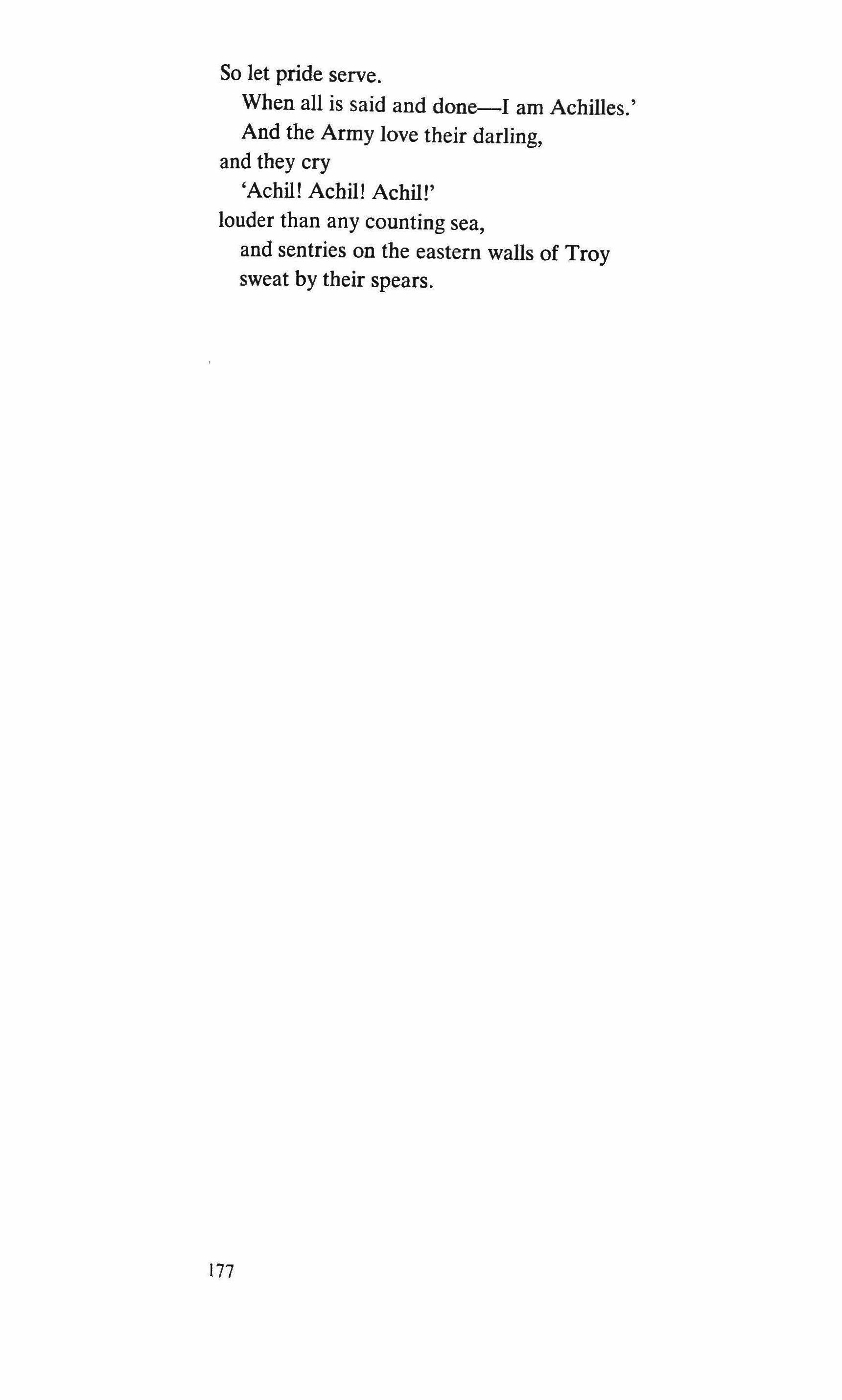
So let pride serve. When all is said and done-I am Achilles.' And the Army love their darling, and they cry 'AchiI! AchiI! AchiI!' louder than any counting sea, and sentries on the eastern walls of Troy sweat by their spears.
177
MATTHEW MEAD
The barbarians
If the victors were magnificent!
They are dazed by a splendour of broken palaces; Cracked floors are the smoothest they have walked. More beautiful than their goddess (I have seen her in effigy, scowling) And our underfed women (bitches!) the common girls
They keep in their quarters.
Their commander is a squat devil, Strong and cunning in a shabby coat; He rides the city
With an armed guard and a rumour.
1 think they will stay here, Learning the streets, picnicking by the lake. The wind drops and the dust settles. They will walk among old tombs
Looking for ancestors.
From identities
I After Paeschendale
After Katyn
After Auschwitz
After Kronstadt
We stand here
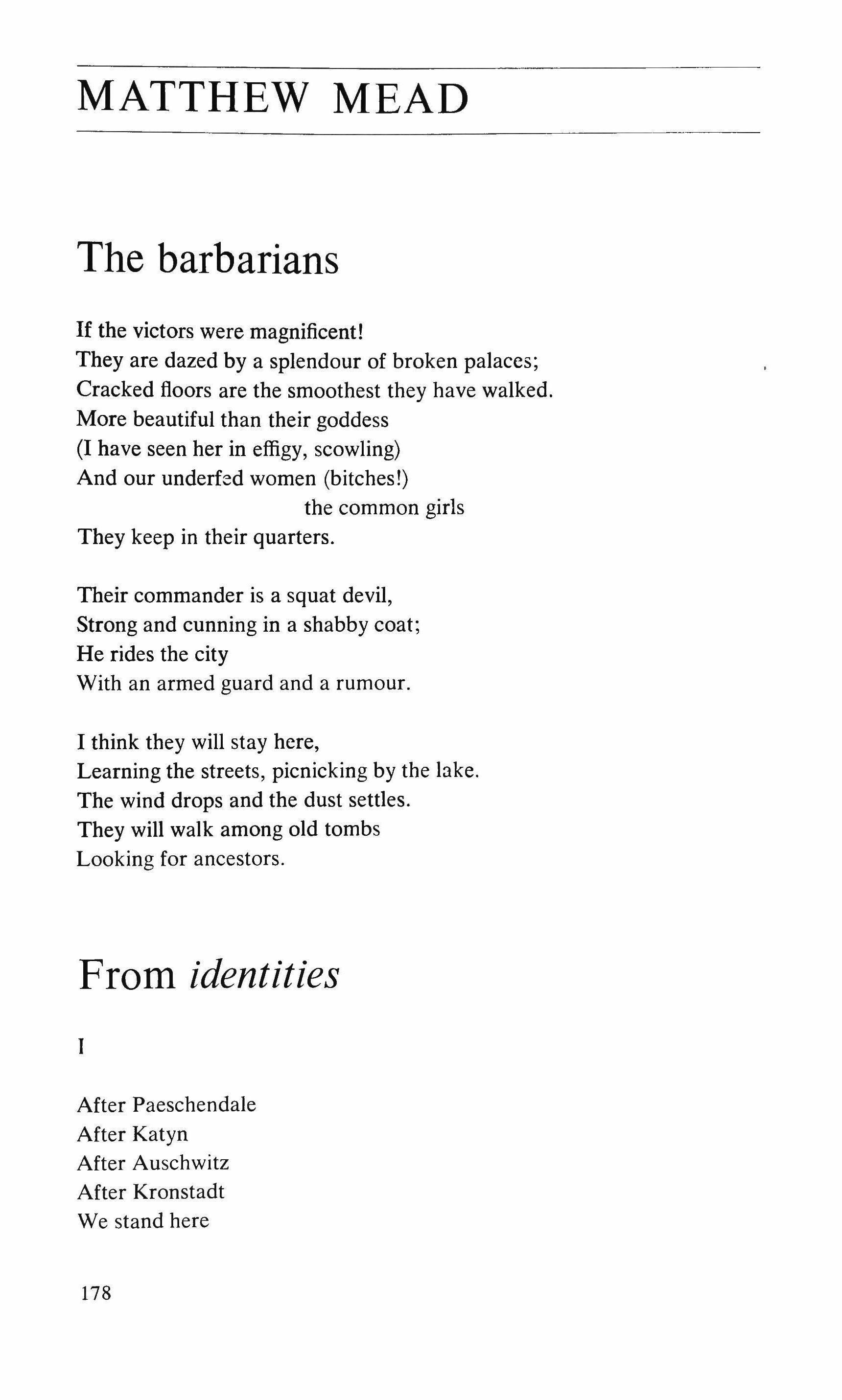
178

After Asquith
After Beria
After Noske
We stand here
What footfall?
What valley what field what forest What streets in the morning sun
After the streets of Nagasaki? Mask, persona, Alias, pseudonym; We stand here.
Why should we flee Jahveh? Where are the lightnings, The scorched prophets? 'In millions of hearts 'burns the inextinguishable 'flame of his word.'.
Apollo: carven flame. Christ by candlelight.
And that he mount the unbuilt steps To the unraised altar with sky for roof and star for pinnacle sumus in fide
We stand here. We stand in the press. We stand here alone.
IV We stand here. Statisti.
My pills are good pills rustle and chink container and carton and can
179

all cars are good cars but our cars are sacred the next scream you hear will be MAN.
'there is no such THING as saturation point'
My pills are good pills interim interim dreams you can drive in your sleep hand washes hand our after-death service washes bone-white and bone-deep.
'for Christ's sake, Stan, TRY and be a merchant'
Buy it today that agglutinous yellow matches the STYLE of your heart our workers sweat at contented machine tools producing the part of a part.
'buy him and THEN he'll buy you'
Mixed in a minute served in a second slashes the stomach for days interim interim listprice and discount traders must follow the phrase.
'for all practical purposes YOU ARE the product'
My pills are good pills my self's a good self complete with a soul to consume last thing at night
180
ANp BANISH THE IMAGES
don't just say 'Dreadful' say 'Doom'.
We stand here for all practical purposes for christ's sake or near offer. At our heels a question-mark in our heads the moon.
VII
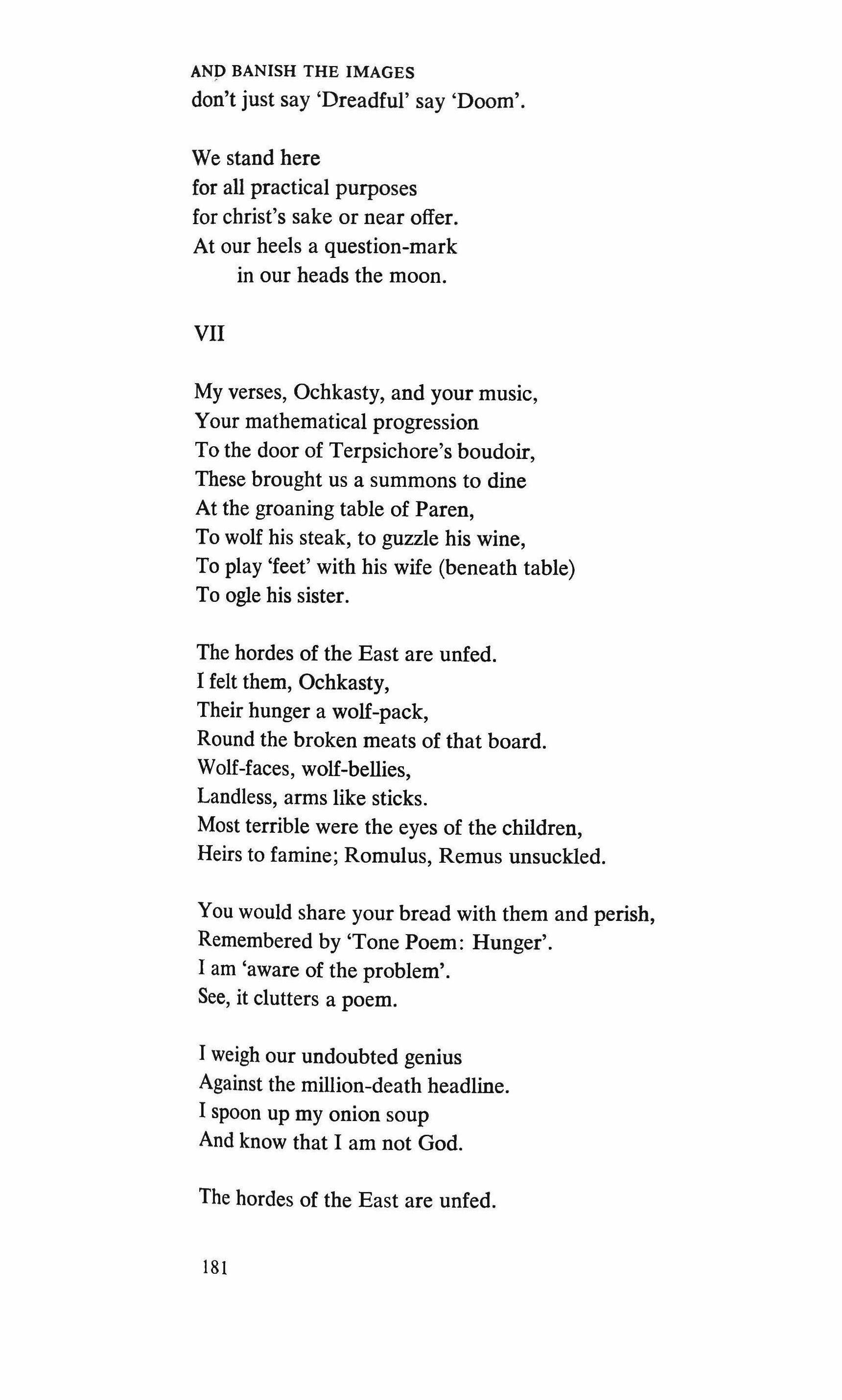
My verses, Ochkasty, and your music, Your mathematical progression To the door of Terpsichore's boudoir, These brought us a summons to dine
At the groaning table of Paren, To wolf his steak, to guzzle his wine, To play 'feet' with his wife (beneath table) To ogle his sister.
The hordes of the East are unfed. I felt them, Ochkasty, Their hunger a wolf-pack, Round the broken meats of that board. Wolf-faces, wolf-bellies, Landless, arms like sticks. Most terrible were the eyes of the children, Heirs to famine; Romulus, Remus unsuckled.
You would share your bread with them and perish, Remembered by 'Tone Poem: Hunger'. I am 'aware of the problem'. See, it clutters a poem.
I weigh our undoubted genius Against the million-death headline.
I spoon up my onion soup And know that I am not God.
The hordes of the East are unfed.
181
If 10 herself has failed them let us despatch
With teats and feeding bottles
Paren to lands of morning
He serves a very good dinner.
He may meet cannibals.
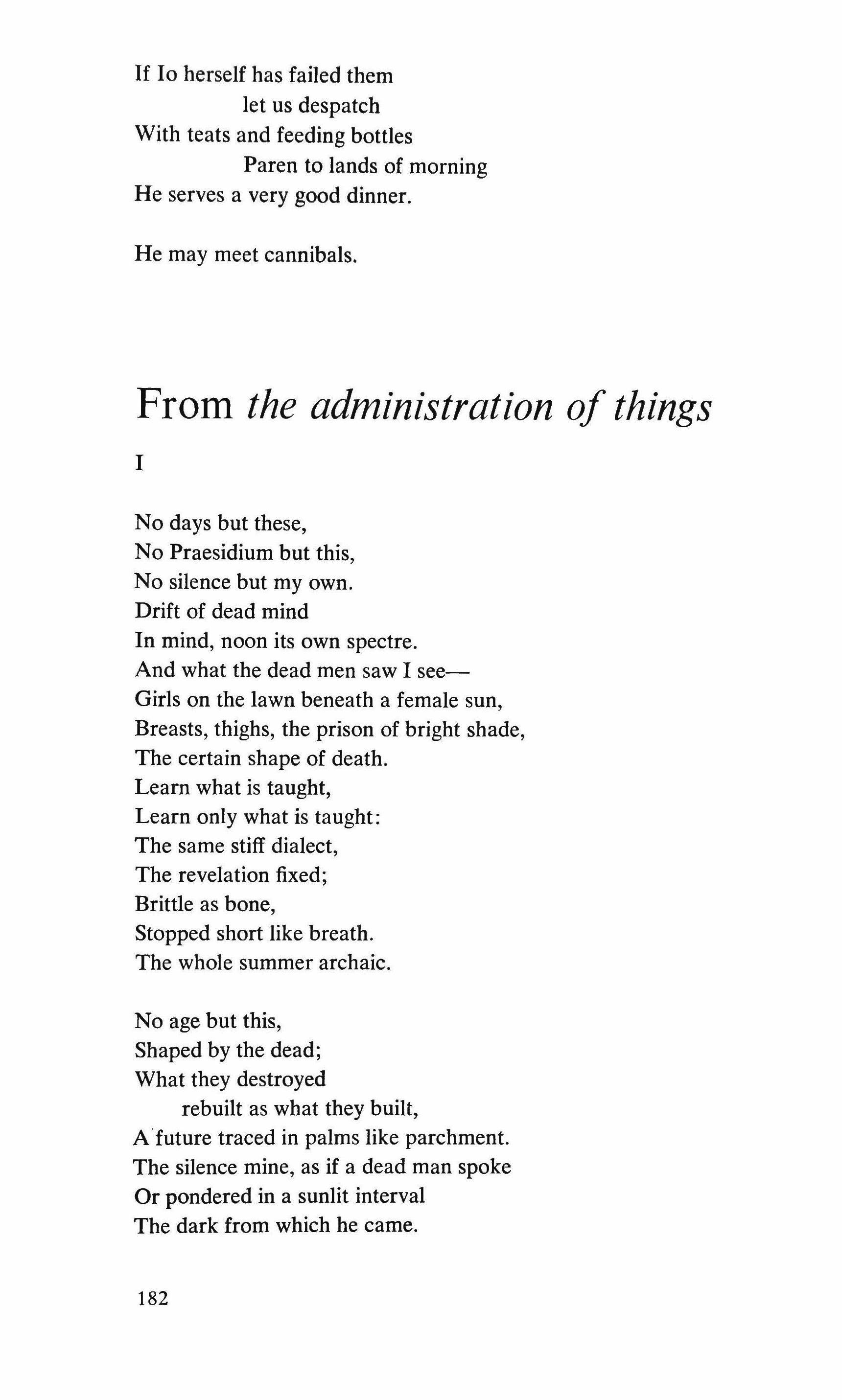
From the administration of things
I
No days but these, No Praesidium but this, No silence but my own. Drift of dead mind
In mind, noon its own spectre. And what the dead men saw I seeGirls on the lawn beneath a female sun, Breasts, thighs, the prison of bright shade, The certain shape of death.
Learn what is taught, Learn only what is taught: The same stiff dialect, The revelation fixed; Brittle as bone, Stopped short like breath. The whole summer archaic.
No age but this, Shaped by the dead; What they destroyed rebuilt as what they built, A future traced in palms like parchment. The silence mine, as if a dead man spoke Or pondered in a sunlit interval The dark from which he came.
182
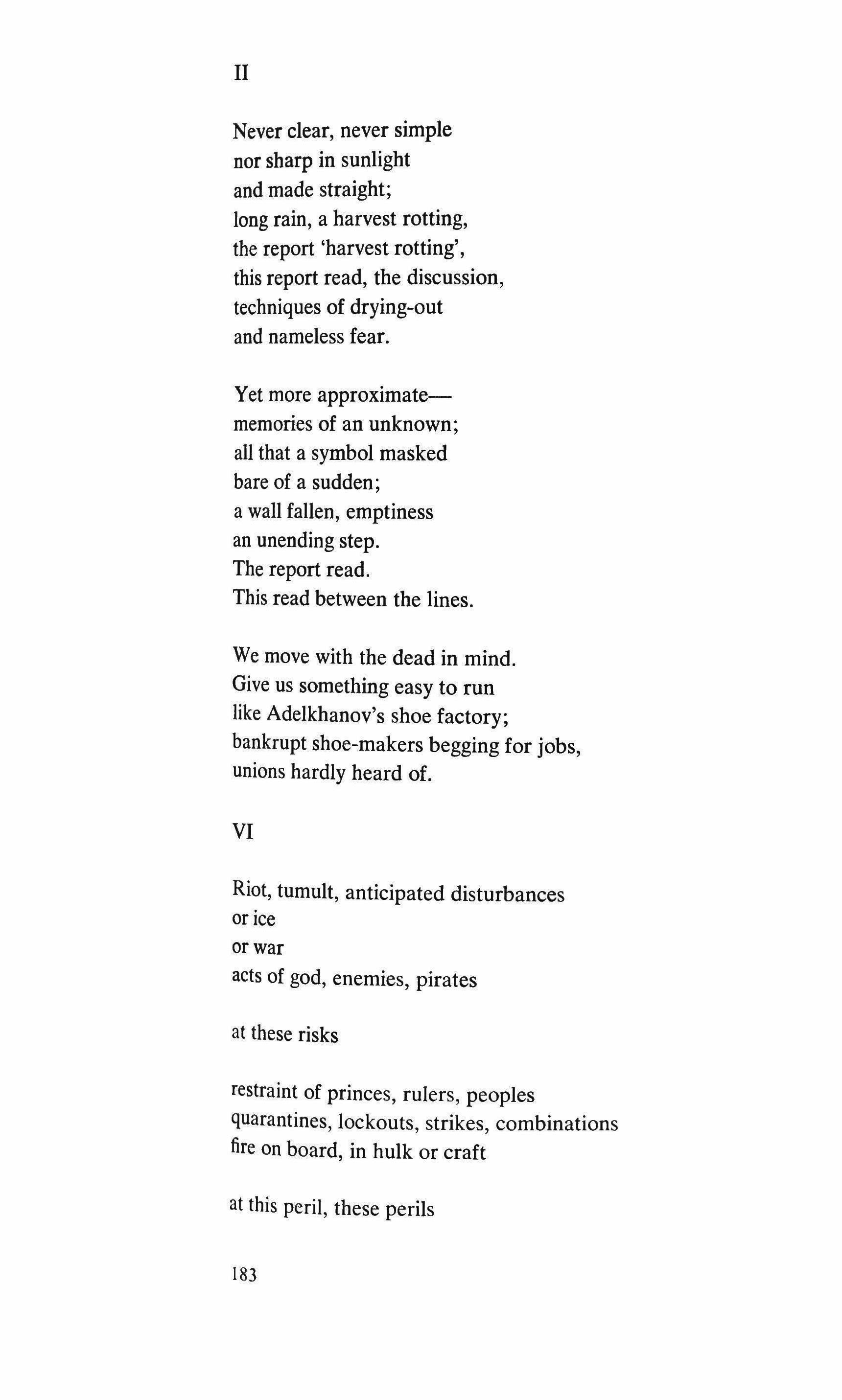
Never clear, never simple nor sharp in sunlight and made straight; long rain, a harvest rotting, the report 'harvest rotting', this report read, the discussion, techniques of drying-out and nameless fear.
Yet more approximatememories of an unknown; all that a symbol masked bare of a sudden; a wall fallen, emptiness an unending step. The report read. This read between the lines.
We move with the dead in mind. Give us something easy to run like Adelkhanov's shoe factory; bankrupt shoe-makers begging for jobs, unions hardly heard of.
VI
Riot, tumult, anticipated disturbances or ice or war acts of god, enemies, pirates at these risks
restraint of princes, rulers, peoples quarantines, lockouts, strikes, combinations fire on board, in hulk or craft
at this peril, these perils
II
183

or from any act, neglect, default whatsoever or ice or war
proceeding by any route, however circuitous or as near thereto as she may safely get.
Send us on something easy like a run to Ithaca.
VIII
Sword or stealth, strength or ancient blood, Conqueror, elect or heir-however you come, Have no compassion. Curl the lip, Let the eye grow cold.
Who more brutal than we Who less compassionate What colder eyes than ours Who more unflinching Facing the endless faces
Ours the command
The calm of copper noon The Sind in blossom
An ante-natal clinic In Deolali South
To rule. A grievous scourge. We move with the dead in mind. Time kills the dead, Time and the death of memory. A dark: simplicities of Adieu and Anon.
184
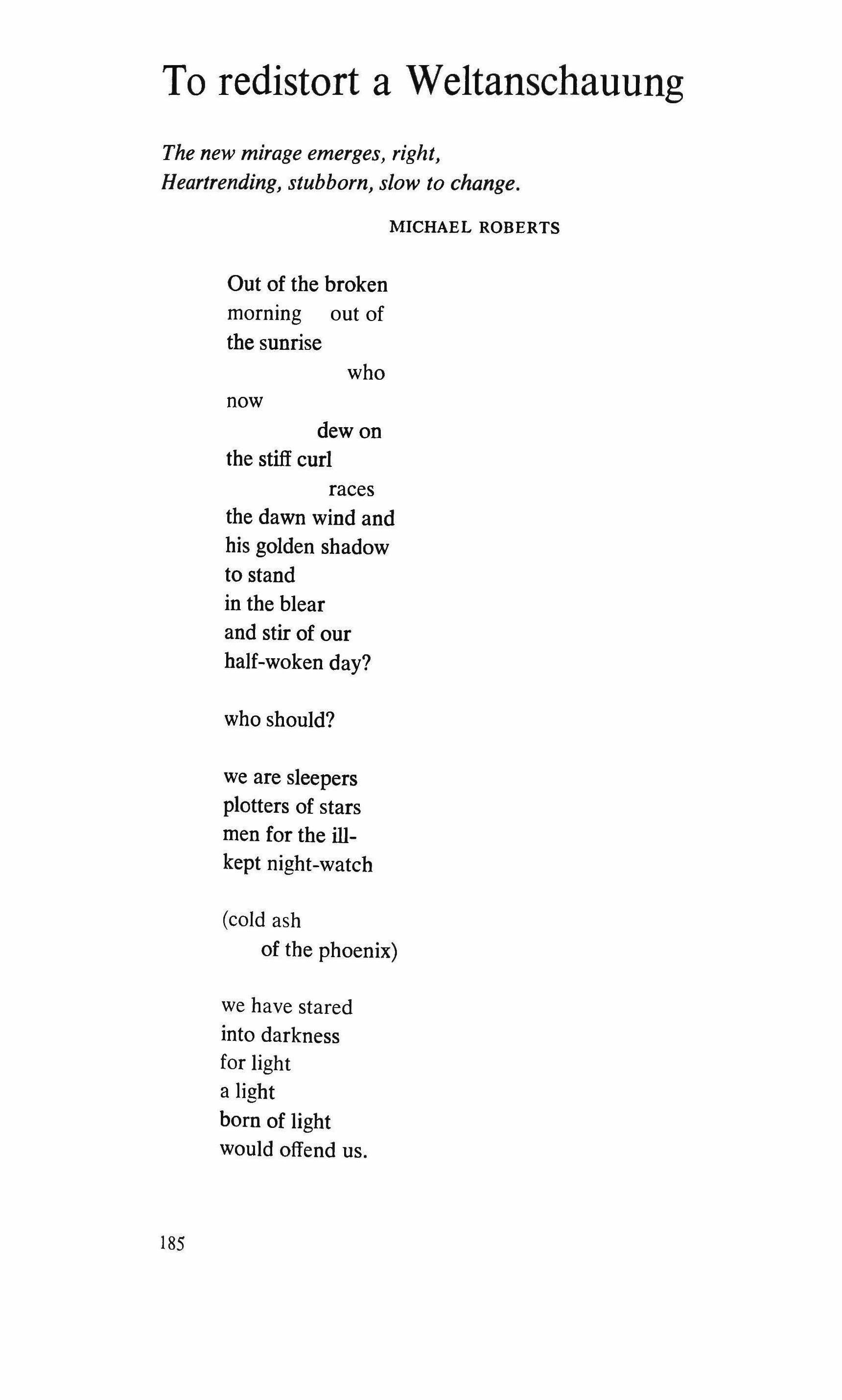
To redistort a Weltanschauung
The new mirage emerges, right, Heartrending, stubborn, slow to change.
MICHAEL ROBERTS
Out of the broken mornmg out of the sunrise who now dew on the stiff curl races the dawn wind and his golden shadow to stand in the blear and stir of our half-woken day? who should?
we are sleepers plotters of stars men for the illkept night-watch (cold ash of the phoenix)
we have stared into darkness for light a light born of light would offend us.
185

Who from the 'motherless' fire
now leaps to bum bleached curl and profiled flame
down the cold dawn of our day to set for everlasting day a light on earth?
The dayspring bubbled. We spat into it.
They sit with primitive nuclear weapons aimed on Lepsinsk Kopal
That they may not in mucksweat coat-skirts aswirl chophaired and almond-eyed
that they may not bravado masking an awe of supermarket-temples diffidence thrust aside and all else to be slaked that they may not arrive distance and death in their eyes
the 'defenders of Europe 'for four hundred years'
186
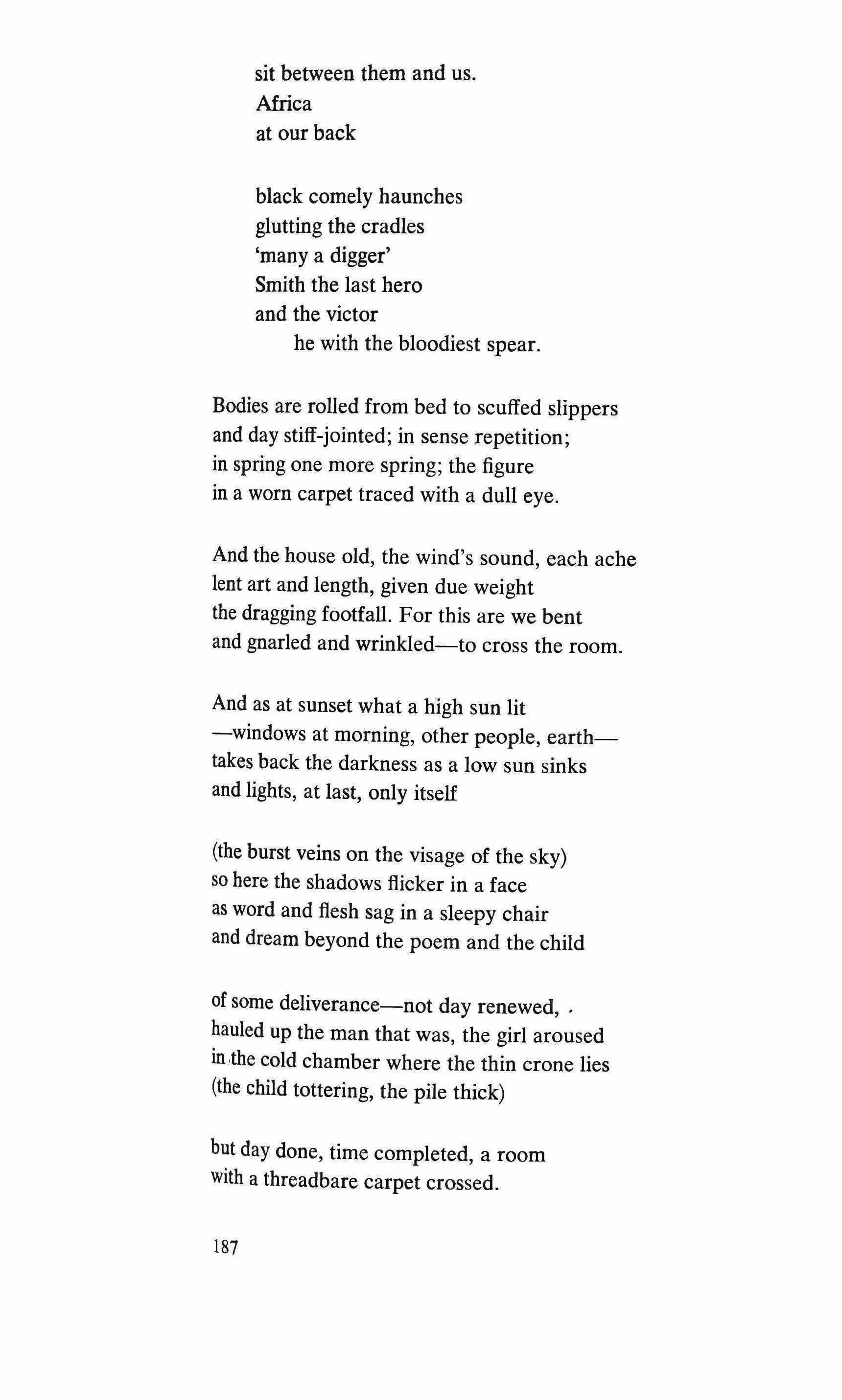
sit between them and us.
Africa at our back
black comely haunches glutting the cradles 'many a digger' Smith the last hero and the victor he with the bloodiest spear.
Bodies are rolled from bed to scuffed slippers and day stiff-jointed; in sense repetition; in spring one more spring; the figure in a worn carpet traced with a dull eye.
And the house old, the wind's sound, each ache lent art and length, given due weight the dragging footfall. For this are we bent and gnarled and wrinkled-to cross the room.
And as at sunset what a high sun lit -windows at morning, other people, earthtakes back the darkness as a low sun sinks and lights, at last, only itself
(the burst veins on the visage of the sky) so here the shadows flicker in a face as word and flesh sag in a sleepy chair and dream beyond the poem and the child of some deliverance-not day renewed, hauled up the man that was, the girl aroused inthe cold chamber where the thin crone lies (the child tottering, the pile thick)
but day done, time completed, a room with a threadbare carpet crossed.
187
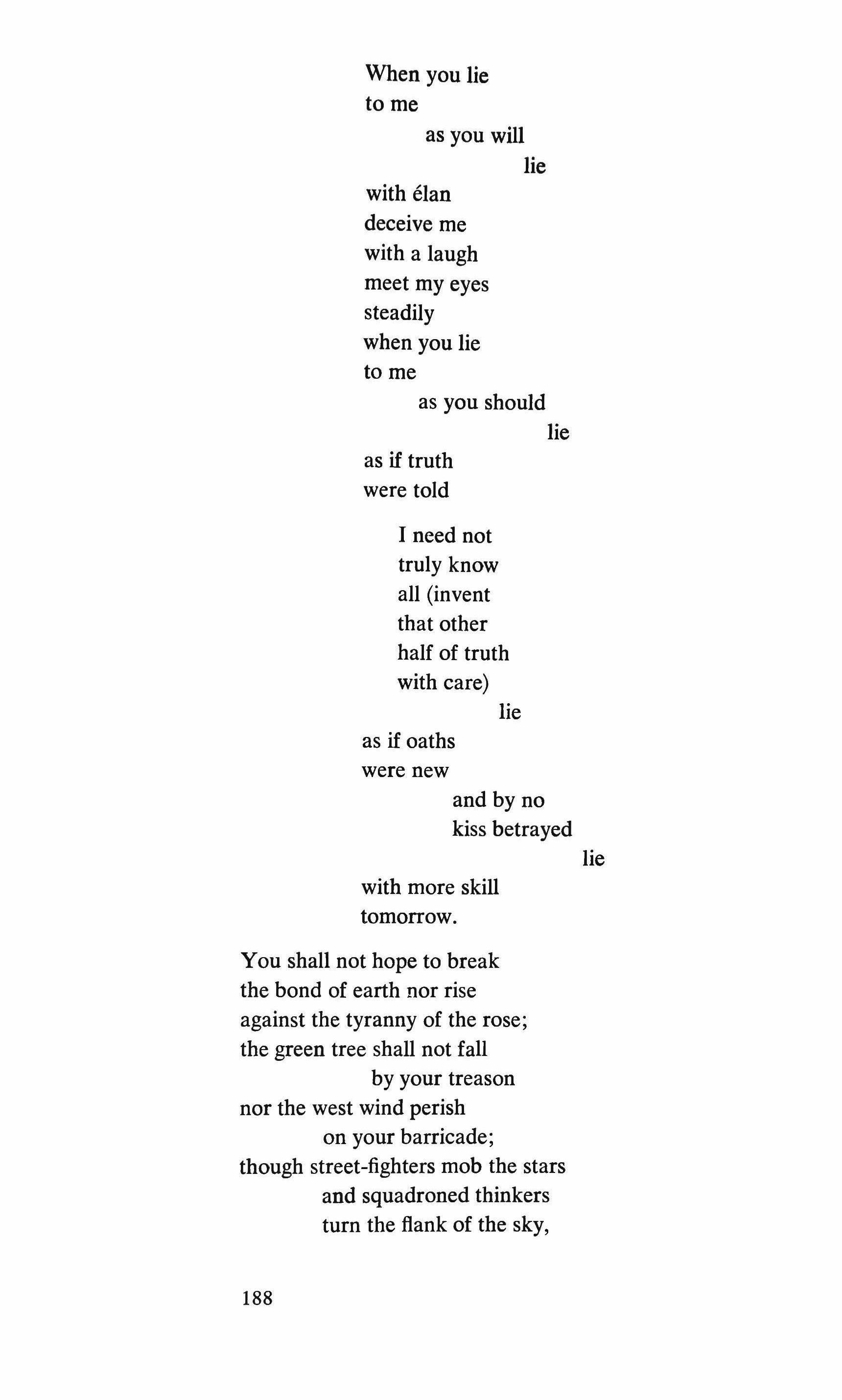
When you lie tome as you will lie with elan deceive me with a laugh meet my eyes steadily when you lie tome as you should lie as if truth were told I need not truly know all (invent that other half of truth with care) lie as if oaths were new and by no kiss betrayed lie with more skill tomorrow.
You shall not hope to break the bond of earth nor rise against the tyranny of the rose; the green tree shall not fall by your treason nor the west wind perish on your barricade; though street-fighters mob the stars and squadroned thinkers turn the flank of the sky,
188
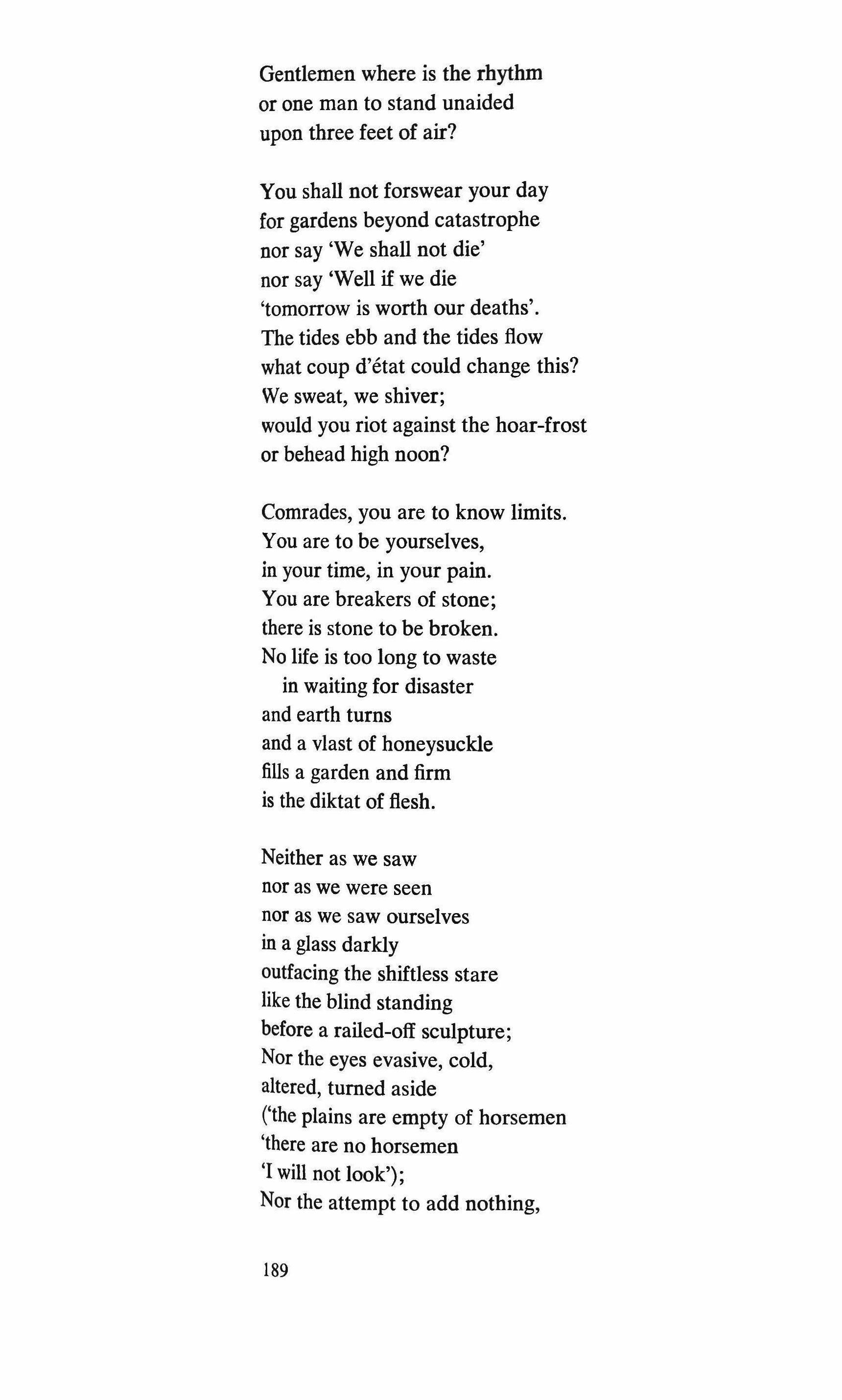
Gentlemen where is the rhythm or one man to stand unaided upon three feet of air?
You shall not forswear your day for gardens beyond catastrophe nor say 'We shall not die' nor say 'Well if we die 'tomorrow is worth our deaths'. The tides ebb and the tides flow what coup d'etat could change this? We sweat, we shiver; would you riot against the hoar-frost or behead high noon?
Comrades, you are to know limits. You are to be yourselves, in your time, in your pain. You are breakers of stone; there is stone to be broken. No life is too long to waste in waiting for disaster and earth turns and a vlast of honeysuckle fills a garden and firm is the diktat of flesh.
Neither as we saw nor as we were seen nor as we saw ourselves in a glass darkly outfacing the shiftless stare like the blind standing before a railed-off sculpture; Nor the eyes evasive, cold, altered, turned aside ('the plains are empty of horsemen 'there are no horsemen 'I will not look'); Nor the attempt to add nothing,
189
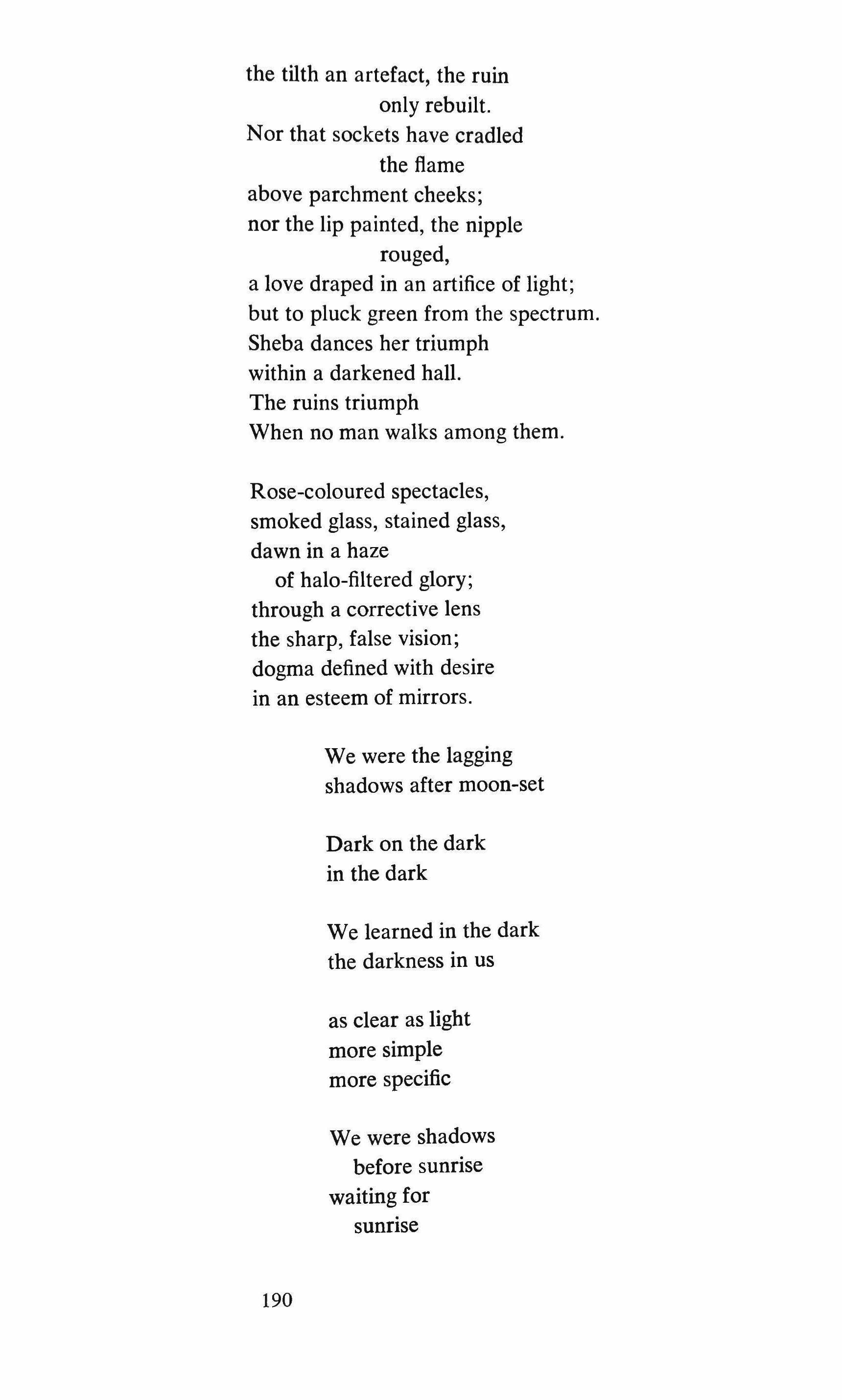
the tilth an artefact, the ruin only rebuilt. Nor that sockets have cradled the flame above parchment cheeks; nor the lip painted, the nipple rouged, a love draped in an artifice of light; but to pluck green from the spectrum. Sheba dances her triumph within a darkened hall. The ruins triumph When no man walks among them.
Rose-coloured spectacles, smoked glass, stained glass, dawn in a haze of halo-filtered glory; through a corrective lens the sharp, false vision; dogma defined with desire in an esteem of mirrors.
We were the lagging shadows after moon-set
Dark on the dark in the dark
We learned in the dark the darkness in us
as clear as light more simple more specific
We were shadows before sunrise waiting for sunrise
190
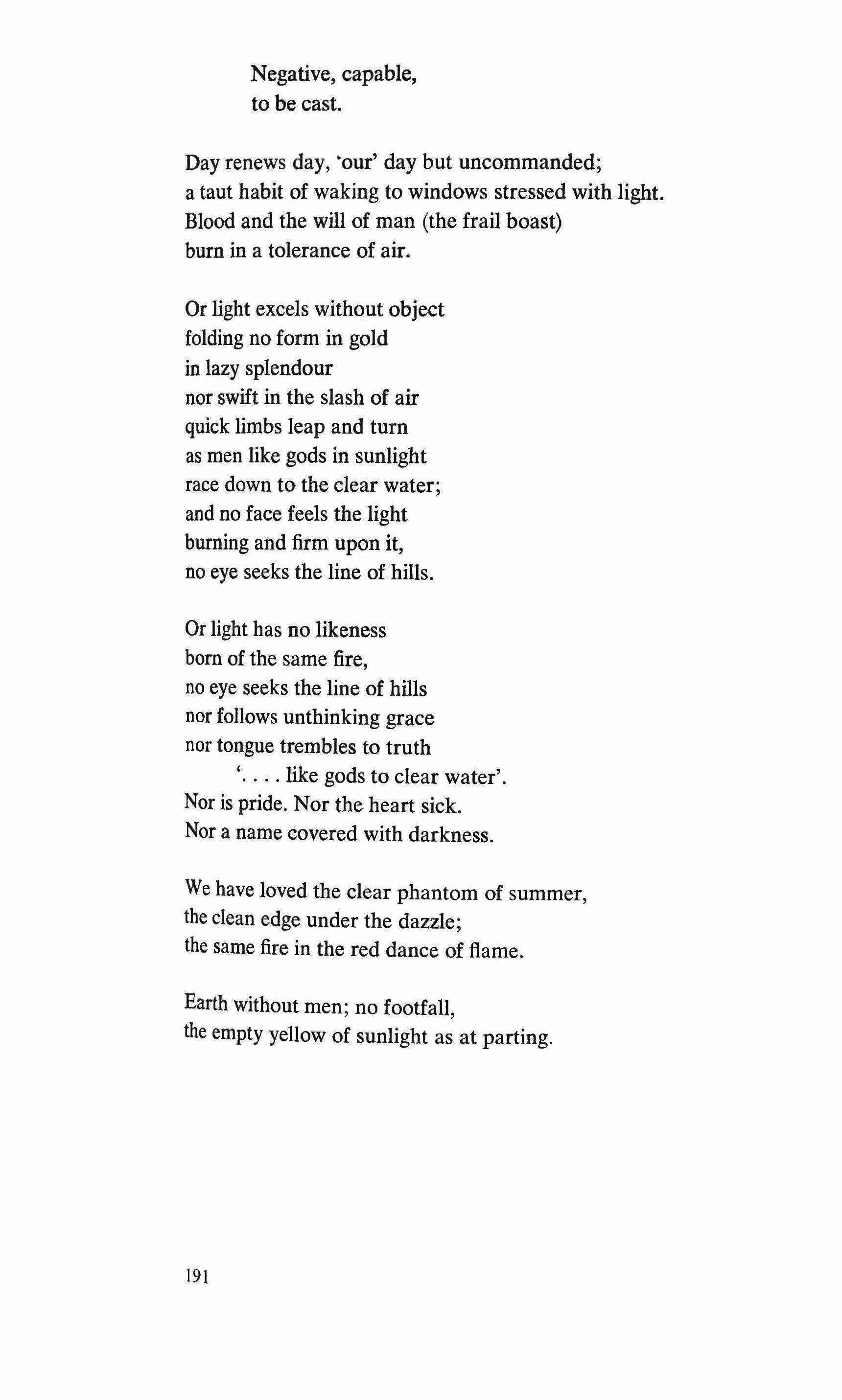
Negative, capable, to be cast.
Day renews day, 'our' day but uncommanded; a taut habit of waking to windows stressed with light. Blood and the will of man (the frail boast) burn in a tolerance of air.
Or light excels without object folding no form in gold in lazy splendour nor swift in the slash of air quick limbs leap and turn as men like gods in sunlight race down to the clear water; and no face feels the light burning and firm upon it, no eye seeks the line of hills.
Or light has no likeness born of the same fire, no eye seeks the line of hills nor follows unthinking grace nor tongue trembles to truth ' like gods to clear water'. Nor is pride. Nor the heart sick. Nor a name covered with darkness.
We have loved the clear phantom of summer, the clean edge under the dazzle; the same fire in the red dance of flame.
Earth without men; no footfall, the empty yellow of sunlight as at parting.
191
D. M. THOMAS
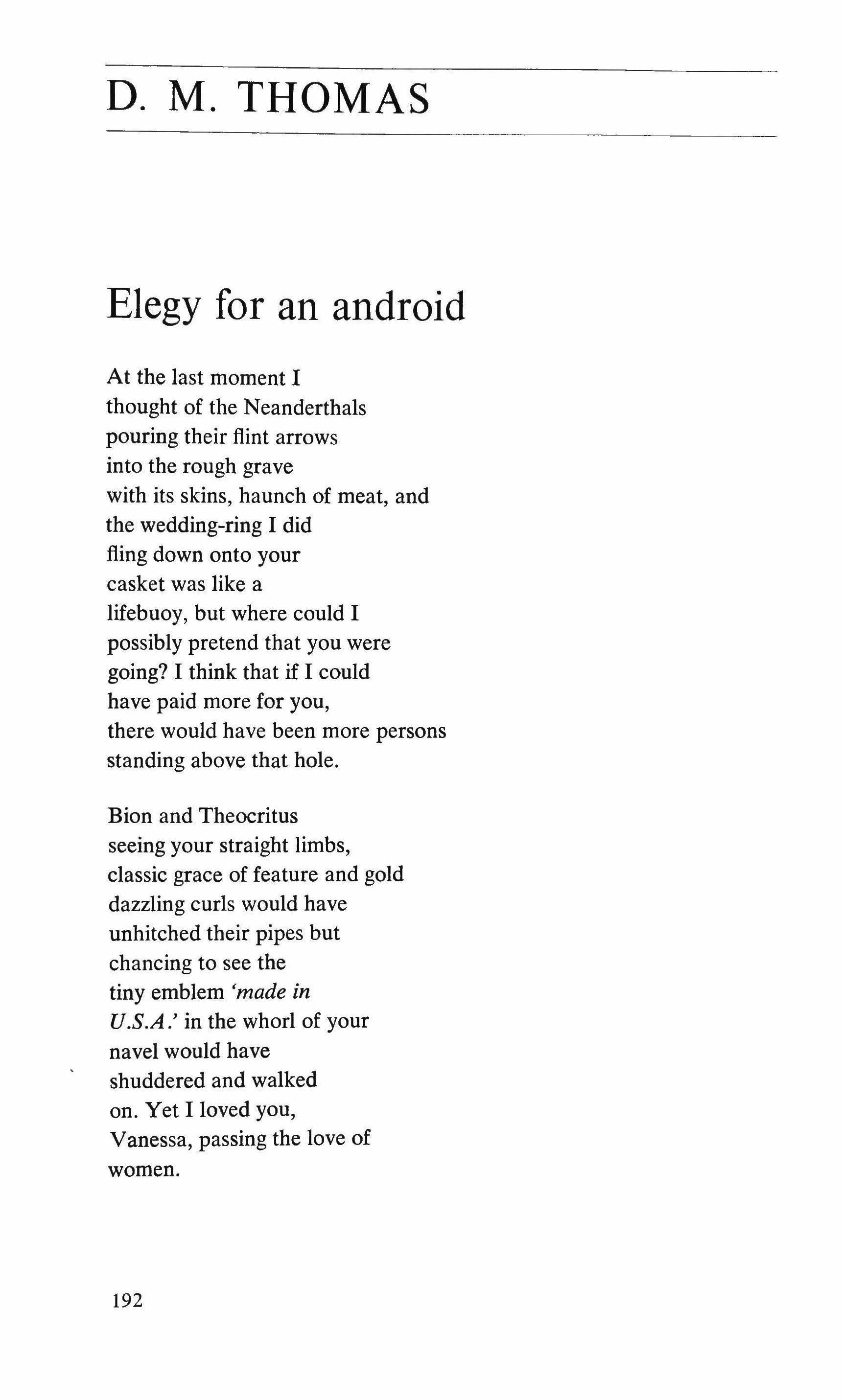
Elegy for an android
At the last moment I thought of the Neanderthals pouring their flint arrows into the rough grave with its skins, haunch of meat, and the wedding-ring I did fling down onto your casket was like a lifebuoy, but where could I possibly pretend that you were going? I think that if I could have paid more for you, there would have been more persons standing above that hole.
Bion and Theocritus
seeing your straight limbs, classic grace of feature and gold dazzling curls would have unhitched their pipes but chancing to see the tiny emblem 'made in U.S.A.' in the whorl of your navel would have shuddered and walked on. Yet I loved you, Vanessa, passing the love of women.
192
o my America
'0 my America, my Newfoundland!"
What worked for Donne-their Tudor lips hooked by that finespun line -a dozen reefs to pilgrim through, then More, -freezes
Jan to an Ellis
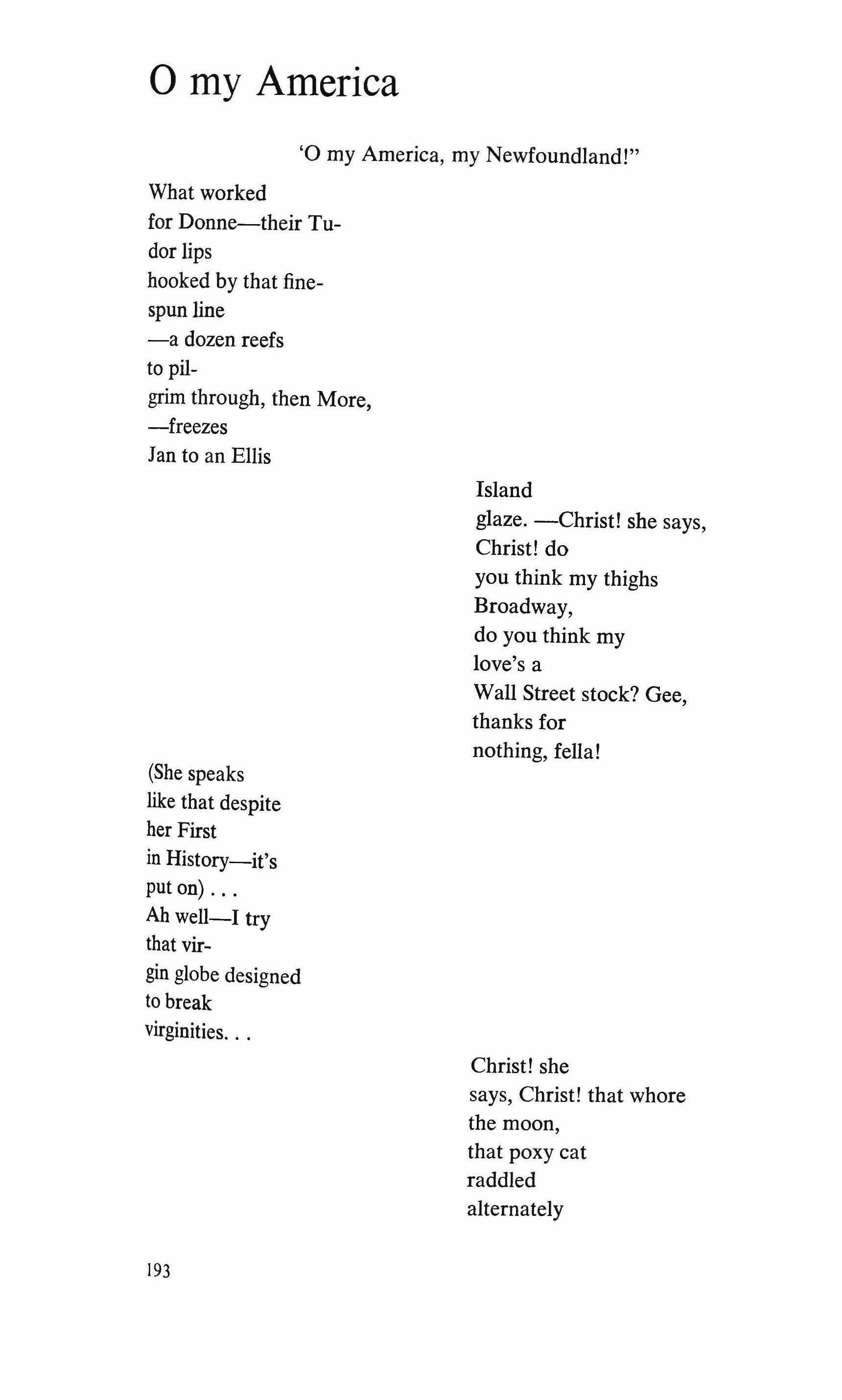
Island glaze. -Christ! she says, Christ! do you think my thighs Broadway, do you think my love's a Wall Street stock? Gee, thanks for nothing, fella!
(She speaks like that despite her First in History-it's put on)
Ah well-I try that virgin globe designed to break virginities.
Christ! she says, Christ! that whore the moon, that poxy cat raddled alternately
193
by Reds and neo-Fascist jerks. Oh swell-that's me!

-whirls down the road prospecting night, gloating on quartz, lets stream her fine washed gold I throw my last, call her bright star. Her laughter rings,
AmI no more? boy, how you flatter me! She points a gay finger at faint star-dense Andromeda. In there's a billion Jan's!
-0 Jan, you are more wild, untouchable, than Newfoundland, than moon, than star! Only a quasar is so radiantly beyond us. -Christ! says Jan. Christ! (tenderly)
194
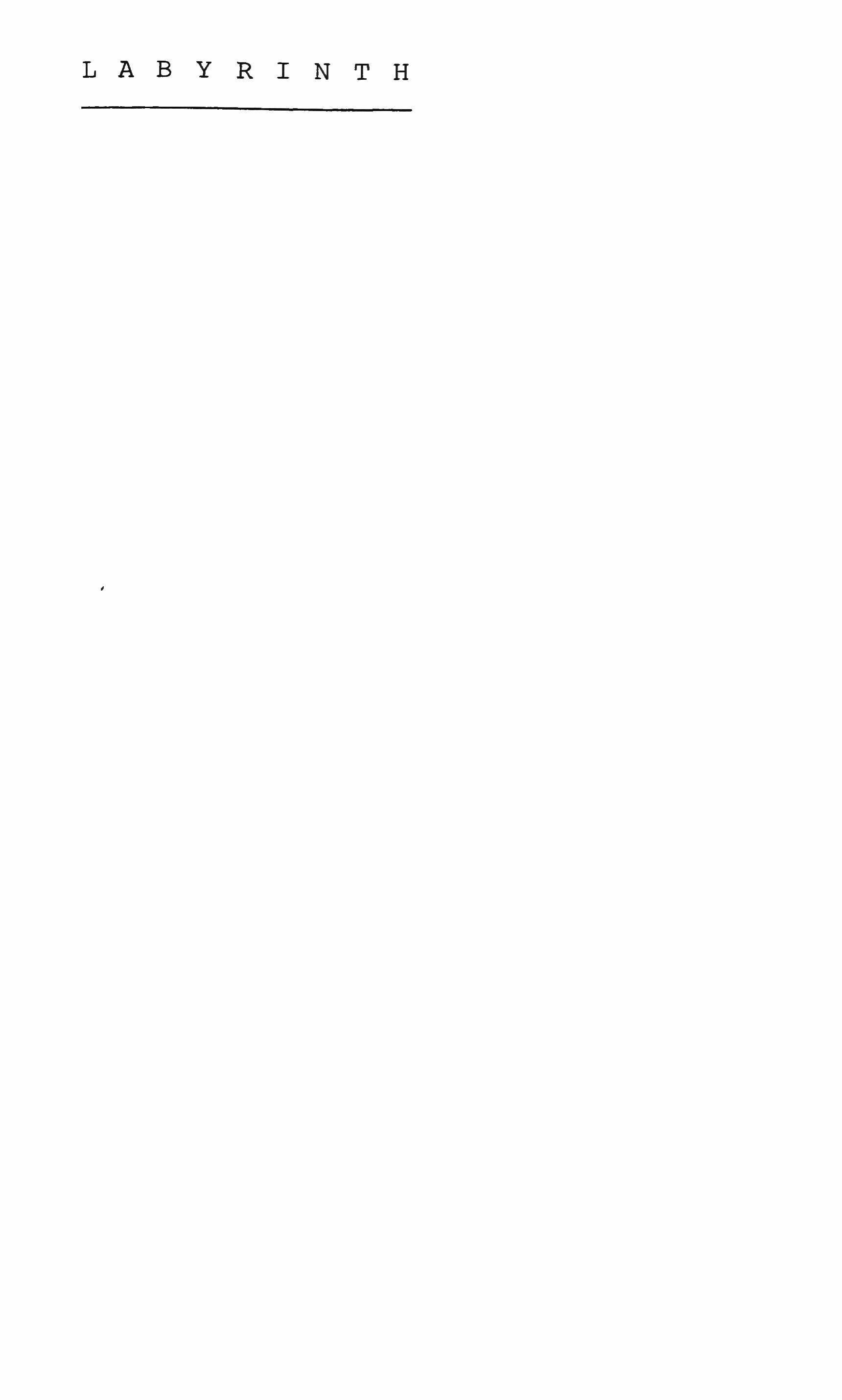
LAB Y R I NTH
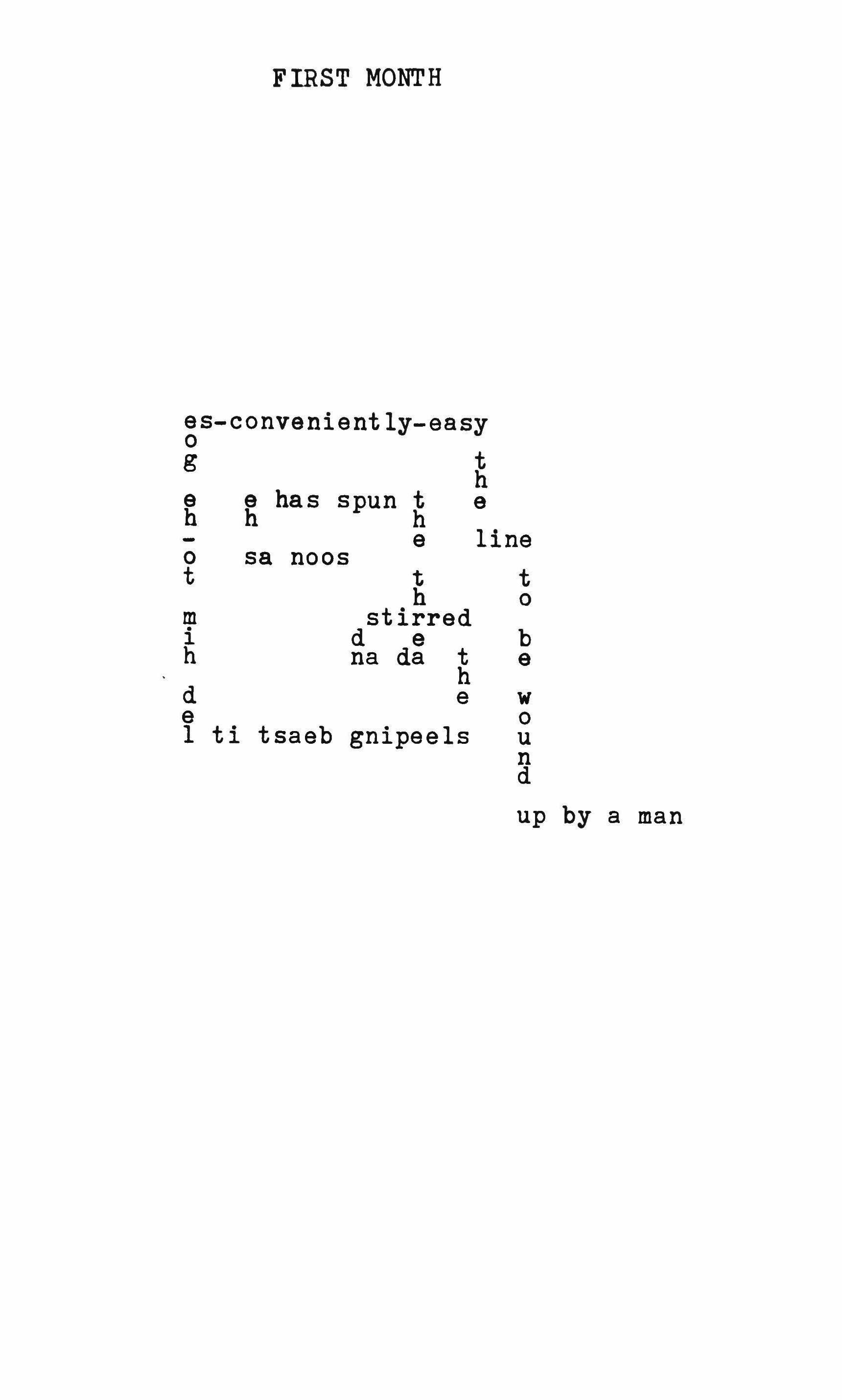
es-conveniently-easy
0 g t h e g has spun t e h h e line
0 sa noos t t t h 0
m stirred i d e b h na da t e h d e w e 0 1 ti tsaeb gnipeels u n d up by a man
FIRST
MONTH
SECOND MONTH
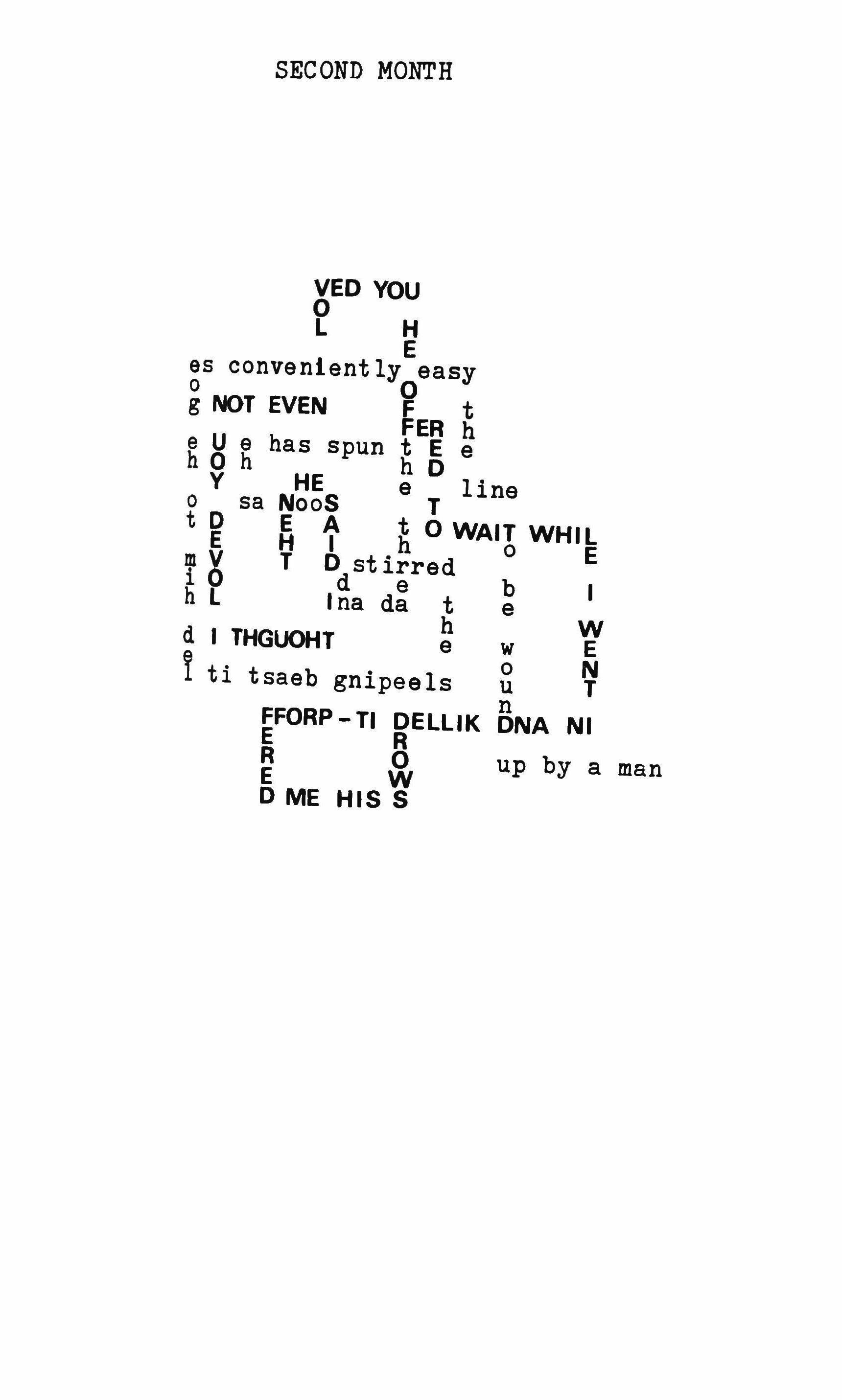
as conveniently easy
o 0 g NOT EVEN �ER �
e U e has spun tEe h 0 h h 0 Y HE e line
o sa NooS T tOE A th 0 WAIT WHI L E H I 0 E m V T 0 st irred 10 deb I h L Ina da t e h W d I THGUOHT ewE eoN 1 ti tsaeb gnipeels
H
E
n FFORP
OELLIK DNA NI E R R 0 E W o ME HIS S VEO YOU o L
u T
- TI
up by a man
THIRD MONTH

WRITHE-AND W H
YM HCI
T S I W T H C
W N I ved you o � �
eS COnvanlantly aasy o N 0 g noT aven fTO THINK AIN far h T a u e has spun t a e H h 0 h h d A Y he a line T sa noos t a a t 0 wait Whi 1 h i h 0 H a t d stirred I NE dab i ina da t Pa h L d i thguoht a Aw e Yo 1 ti tsaeb gnipaels Eu On dellik dna ni r A o Sup by a w me his s A o t d a rp v 1 0 h 1 l I U B
AYl./ZA 5 0 M A A 5 LRE: IHT DNALSI SIHT NO DLIHC fforp ti e r e d w a n t man
�
A
�
�
FOURTH
MONTH
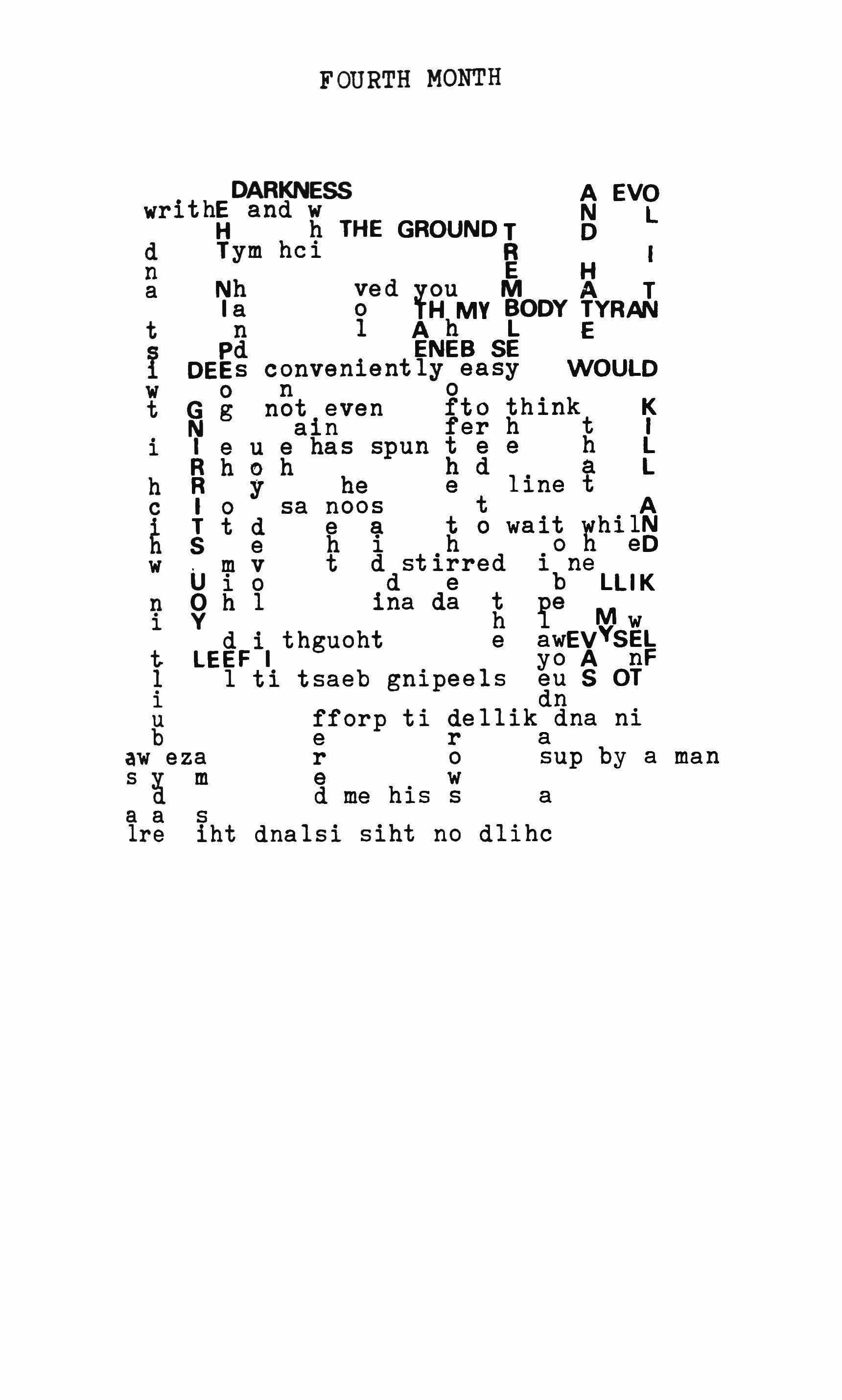
DARKNESS A EVO
writhE and W N L H h THE GROUND T 0 Tym hei R I E H
Nh
ved you MAT I a 0 TH MY BODY TYRAN t n 1 Ah L E
$ Pd ENEB SE 1 DEEs conveniently easy won 0
t G g not even fto think N ain fer h t i leu e has spun tee h
Rho h h d a
h R Y he e line t
c I 0 sa noos t A
iTt d e a th 0 wait whilN
w � v t d stirred i ne
h 5 e h i 0 h eO
U 1 0 deb LLIK
h 1 ina da t �e M w d i thguoht e awEVYSEL
t LEEF I yo A nF 1 1 ti tsaeb gnipeels eu 5 OT i dn u fforp ti dellik dna ni b era aw eza r 0 sup by a s y mew a. d me his s d n a WOULD a a a s
Ire iht dnalsi siht no dlihe
�
�
K
L man
I L
FIFTH MONTH
LEAVING YOU LOOK W
darkness E a evo
N writhe and w LL IF THERE I n 1
o h h the ground t S d
d tym hci rA i
C n e NY T H I NG Y
I a nh
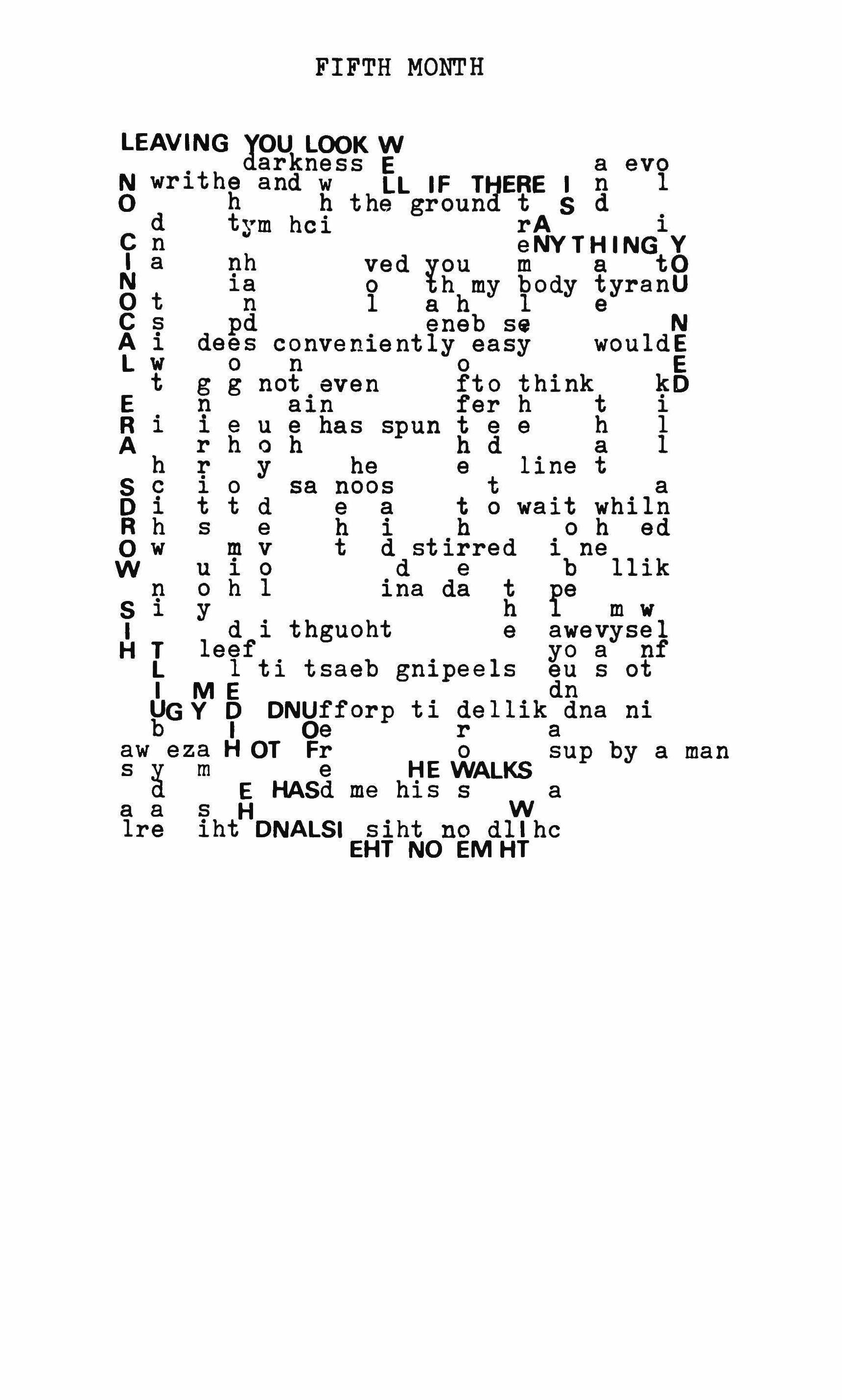
ved you m a to
N ia 0 th my body tyranU
o t n 1 a h 1 e
C s pd eneb se N
A idees conveniently easy wouldE
L won 0 E
t g g not even fto think kD
E n ain fer h t i
R i i e u e has spun tee h 1
A rho h h d a 1
h r y he e line t
sci 0 sa noos t a
o itt d eat 0 wait whiln
R h s e h i h 0 h ed
o w � v t d stirred i ne
W u 1. 0 deb llik
n 0 h 1 ina da t pe
Si y hI mw
I d i thguoht e awevysel
H r le1fti tsaeb gnipeels �� � orf
I M E dn
UGY 0 DNUfforp ti de l l.Lk dna ni b I Oe r a
aw eza H OT Fr 0 sup by a man
s y m e HE WALKS a E HASd me his s a a aSH W
Ire iht DNALSI siht no dllhc EHT NO EM HT
SIXTH

MONTH
leaving you look w aarkness e a evo
n writhe and w 11 if there i n 1
OOM EH h h the ground t 5 d
N d T tym hci r a i
Si a R nh
�c n e nything y
ved you m a to n 0 ia 0 th my body tyranu
Mo t n 1 a hIe
Yc s E pd SS eneb se a i Cdees conveniEntly easy
Sl w A 0 n N 0
o t Fg g not even' fto think
Re n ain LENOLfer h t
Rr i Vi e u e has spun tee h
Os Rr h 0 h Eh d a
W h Gr y he He 1 i ne t
Is c Ni 0 sa noos T Ht a
Nd i At t d e a tTo wait whiln
Gr h s e h i hlW ST 0 h ed
o wS m v t d stirred Si ne
MM • u i 0 d e R b llik
o nR 0 h 1 ina da t Upe
Ts i� s h B1 m w
Hi d i thguoht e awevysel
Eh t T 1eef Lyo a nf
R lA 1 ti tsaeb gnipeels Leu s ot iF M e Udn
C ugVNd dnufforp ti delliK dna ni o b Ui oe r Sa law ezaSh ot ir 0 sup by a man
Sls y m e he walksY a E e hasd me his s Ma a a sHTh w
SIre iht dna lsi siht no dliHc T eht no em htT
RETCH OUT TO FILL THE LABYRIN n woulde e kd i 1 1
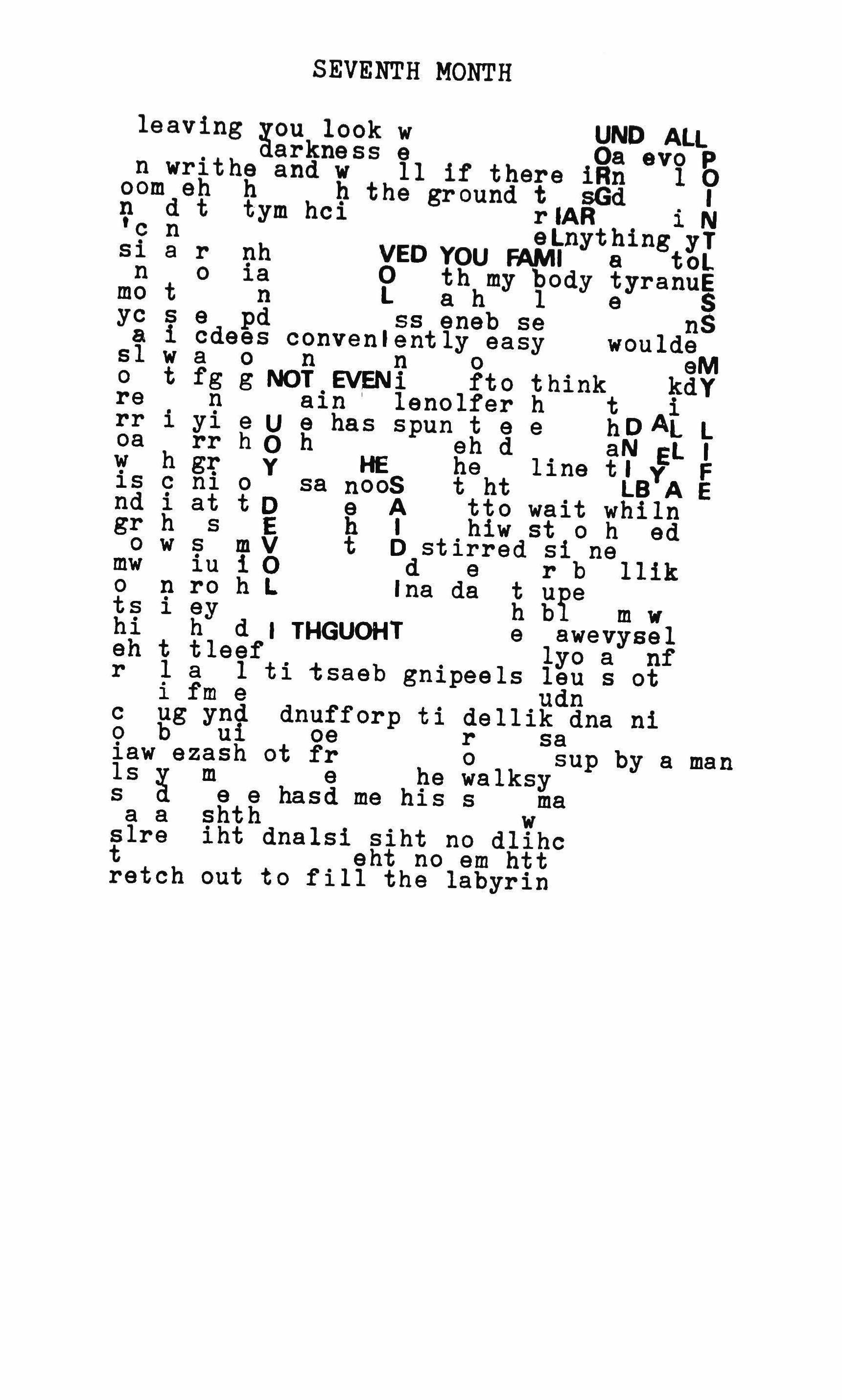
SEVENTH MONTH
leaving IOU look w UND ALL aarkness e Oa eva P
n writhe and w 11 if there iRn 1 0
oom eh h h the ground t sGd I
n d t tym hei rlAR i N
'e n eLnything yT
si a r nh VEO YOU FAMI a taL
n a ia 0 th my body tyranuE
mo t n L a hIe S
ye s e pd 5S eneb se nS a i cdees conveniently easy woulde
sl w a 0 n n 0 eM
o t fg g NOT EVENi fto think kdY
re n ain' Ienolfer h t i
rr i yi e U e has spun tee h 0 Al L
oa h rr h 0 h eh d aN eL I w g:r y HE he line t I Y F is c nl 0 sa nooS t ht LB A E
nd i at tOe A tto wait whiln
gr h s E h I hi w st 0 h ed
o w s m V t 0 st irred si ne
mw iu i 0 d e r b 11 ik
o n ro h L Ina da t upe
ts i ey h bl m w
hi h d I THGUOHT e awevysel eh t tleef lyo a nf rIa 1 ti tsaeb gnipeels leu s ot i fm e udn
c ug ynd dnufforp ti dellik dna ni o b ui oe r sa iaw ezash ot fr 0 sup by a man
Is I m e he walksy
s a e e hasd me his s ma
a a shth w
sIre iht dna lsi siht no dlihc t eht no em htt retch out to fill the labyrin
EIGHTH MONTH
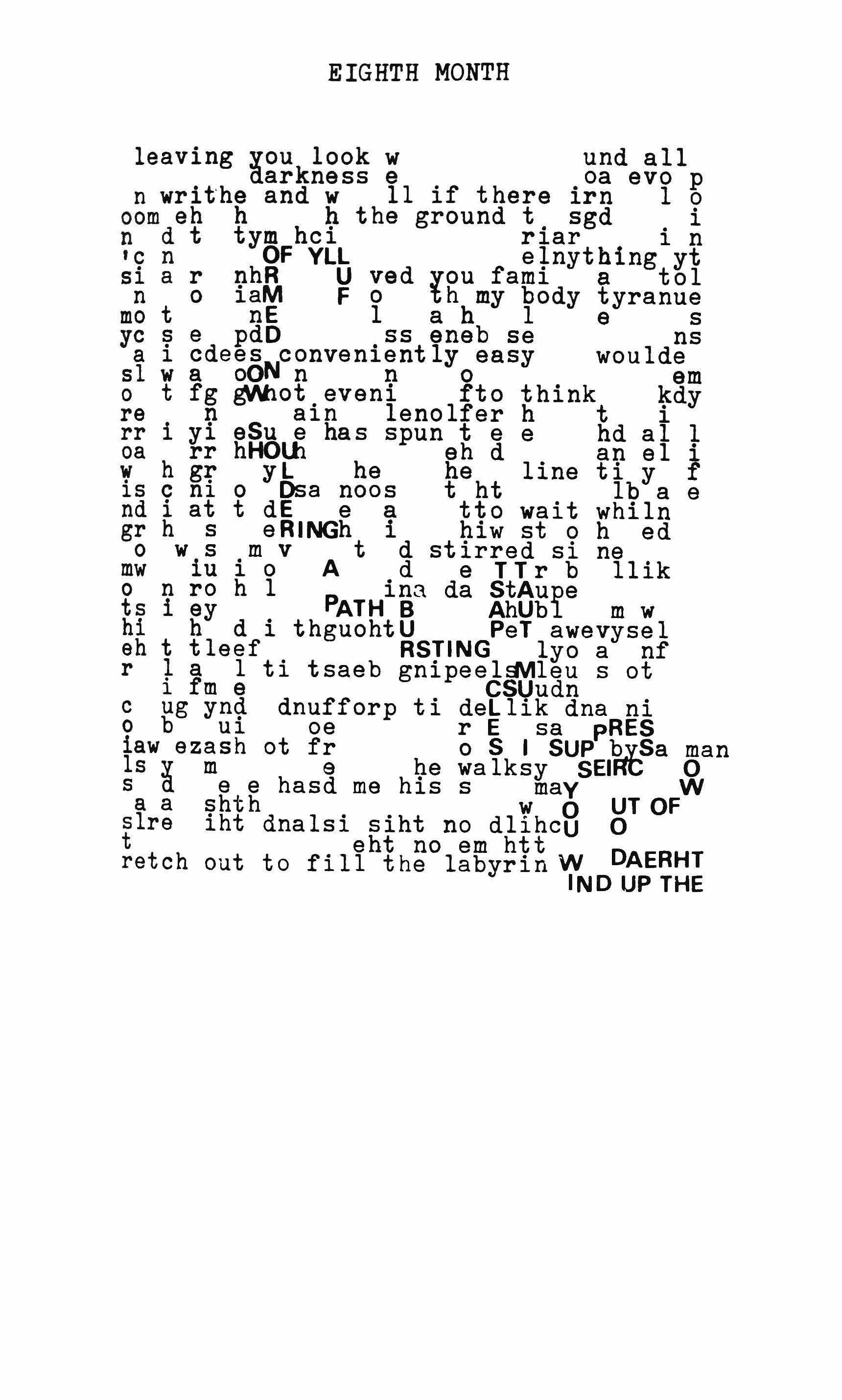
leaving you look w und all aarkness e oa evo p
n writhe and w 11 if there irn 1 0
oom eh h h the ground t sgd i
n d t tym hci riar i n
'c n OF YLL elnything yt
5i a r nhR U ved you fami a tol
n 0 iaM F 0 t h my body tyranue
mo t nE 1 a hIe 5
yc 5 e pdD 55 eneb se ns
51 w a 00 n n 0 em
a i cdeesNconveniently easy woulde
o t fg �ot eveni fto think kdy
re n ain lenolfer h t i
rr i yi eSu e has spun tee hd al 1
oa rr hHOlh eh d an el i
w h gr yL he he line ti y f is <; ni 0 Dsa noos t ht Lb a e
nd 1 at t dE e a tto wait whiln
gr h 5 e R I NGh i hi w st 0 h e d
o w 5 m v t d stirred si ne
mw i u i 0 A d e T T r b 11 i k
o n ro hlp ina da StAupe ts i ey �TH B AhUbl m w hi h d i thguohtU PeT awevysel eh t t leef RSTING lyo a nf
r � a 1 ti tsaeb gnipeel�leu 5 ot 1 fm e CSUudn
c ug ynd dnufforp ti deLlik dna ni
o b ui oe r E sa pRES iaw ezash ot fr 0 S I SUP QySa man
15 s m e he wa lksy SEIRC 0
5 a. e e hasd me his 5 may W
a asht h w 0 UT OF sIre iht dna lsi siht no dlihcU 0 t eht no em htt retch out to fill the labyrin W DAERHT IND UP THE
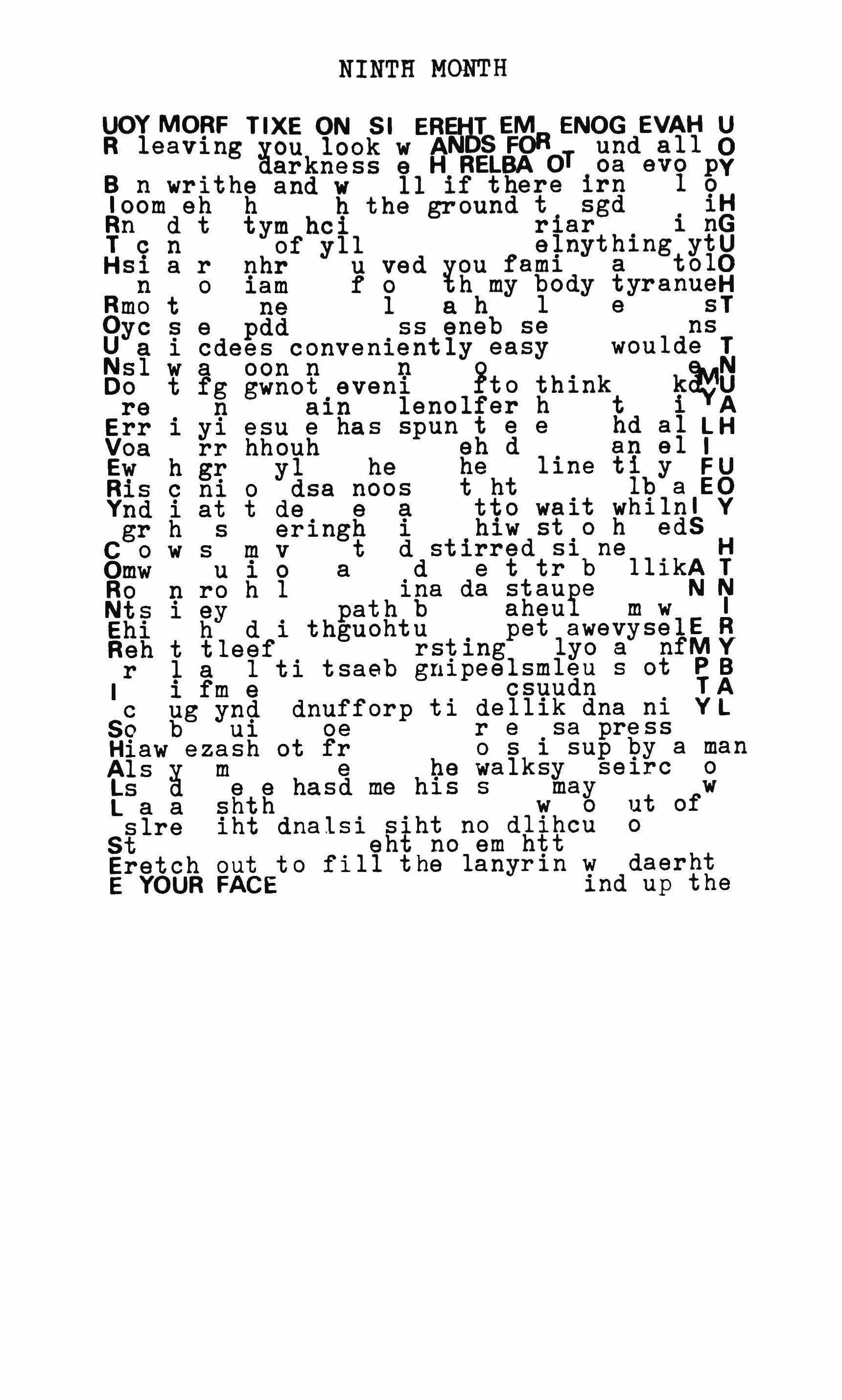
NINTH MONTH
UOY MORF TIXE ON SI EREHT EM ENOG EVAH U
R leaving yOU look w ANDS FOR iT und all 0 aarkness e H RELBA 0 oa evo py
B n writhe and w 11 if there irn 1 0
loom eh h h the ground t sgd iH
Rn d t tym hci riar i nG
T c n of yll elnything ytu
Hsi a r nhr u ved you fami a tolO n 0 iam f 0 th my body tyranueH
Rmo t ne 1 a hIe sT
Oyc 5 e pdd 55 eneb se ns
U a i cdees conveniently easy woulde T
Nsl w a oon n n Q
Do t fg gwnot eveni fto think k U re n ain lenolfer h t i A
Err i yi esu e has spun tee hd al LH
Voa rr hhouh eh d an e1 I
Ew h gr y 1 he he 1 i ne t i Y F U
Ris c ni 0 dsa noos t ht Ib a EO
Ynd i at t de e a tto wait whilnl Y gr h 5 eringh i hiw st 0 h edS
Cow 5 m v t d stirred si ne H
Omw u i 0 a d e t tr b 11ikA T
Ro n ro h 1 ina da staupe N N
Nts i ey path b aheul m w I
Ehi h d i thguohtu pet awevyselE R
Reh t tleef rsting lyo a nfMY
rIa 1 ti tsaeb gnipeelsmleu S ot P B
I i fm e csuudn T A
c ug yn9- dnufforp tide 11 ik dna ni Y L
So b Ul oe r e sa press
Hiaw ezash at fr a 5 i sup by a man
Als y m e he wa1ksy seirc a
Ls a e e hasd me his s may w
L a a shth w 0 ut of sIre iht dna lsi siht no dlihcu 0
St eht no em htt
Eretch out to fill the lanyrin w daerht
E YOUR FACE ind up the
�N
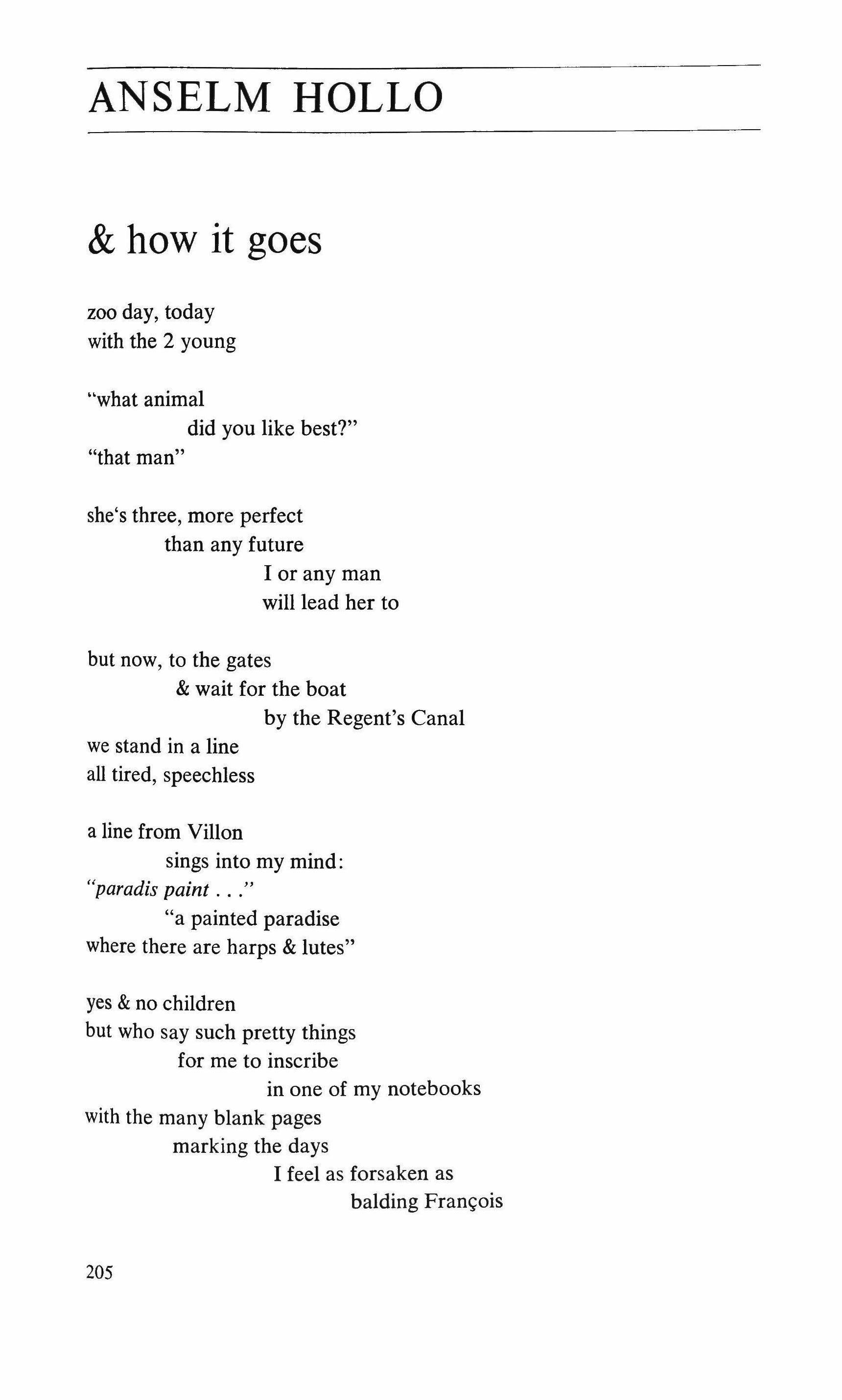
ANSELM HOLLO
& how it goes
zoo day, today with the 2 young
"what animal did you like best?" "that man"
she's three, more perfect than any future
lor any man will lead her to
but now, to the gates & wait for the boat by the Regent's Canal we stand in a line all tired, speechless
a line from Villon sings into my mind: "paradis paint "a painted paradise where there are harps & lutes"
yes & no children but who say such pretty things for me to inscribe
in one of my notebooks with the many blank pages marking the days I feel as forsaken as balding Francois
205
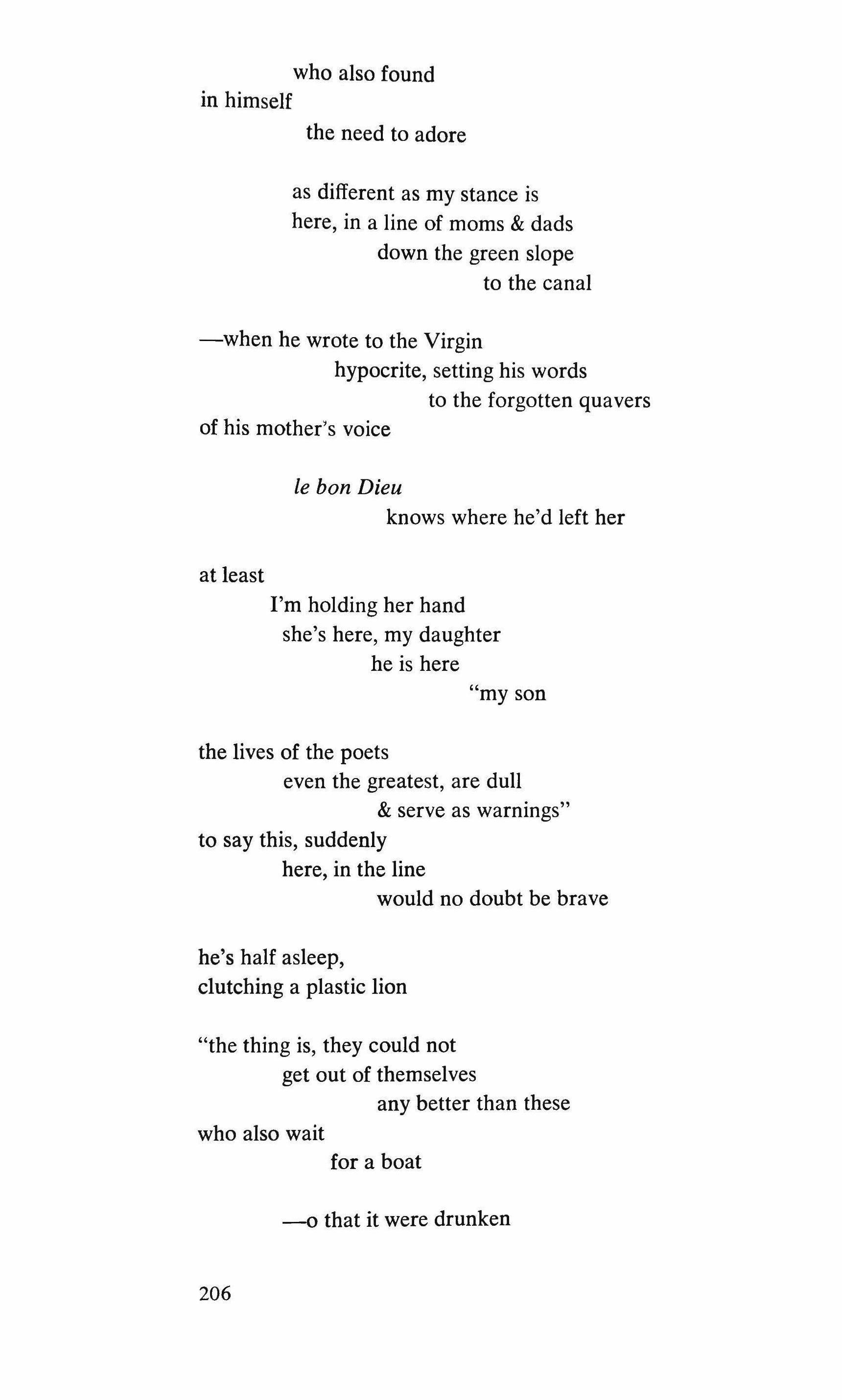
who also found in himself the need to adore
as different as my stance is here, in a line of moms & dads down the green slope to the canal -when he wrote to the Virgin hypocrite, setting his words to the forgotten quavers of his mother's voice
Ie bon Dieu knows where he'd left her at least
I'm holding her hand she's here, my daughter he is here
"my son the lives of the poets even the greatest, are dull & serve as warnings" to say this, suddenly here, in the line would no doubt be brave he's half asleep, clutching a plastic lion "the thing is, they could not get out of themselves any better than these who also wait for a boat
-0 that it were drunken
206

on what wild seasthey didn't
even try, just griped about it or made little idols for brighter moments
the boat has arrived & there,
the elephant's trumpet, farewell
her weight on my knees his head on my shoulder here we go
we, best-loved animals one, two, three & as Illuminated as we'll ever be
Instances
i nice place ya got here the Messenger said to her whose island it was but the boss give an order: let the guy sail back to his own ii there he sat by the shore
207
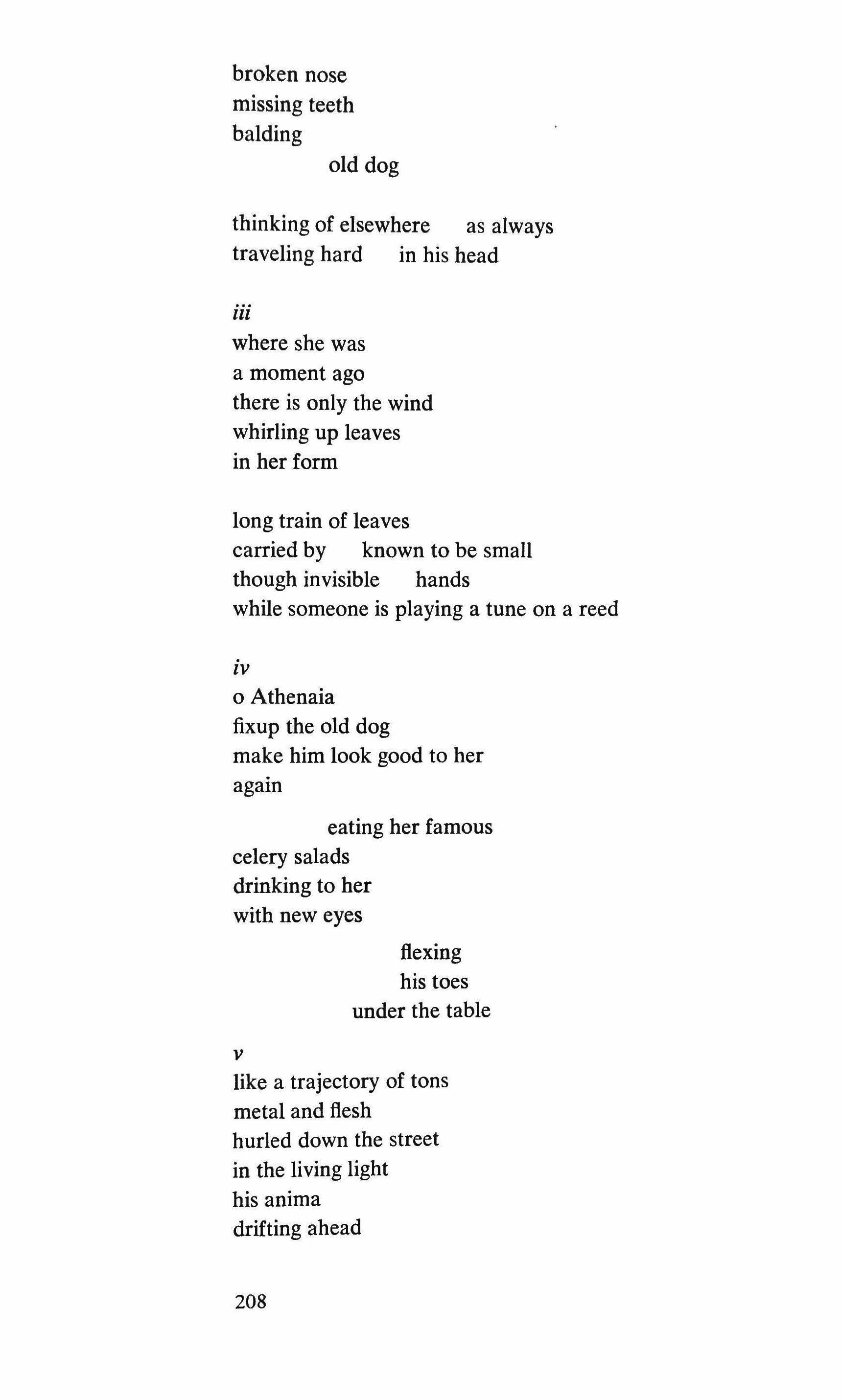
broken nose missing teeth balding
old dog
thinking of elsewhere as always traveling hard in his head
iii where she was a moment ago there is only the wind whirling up leaves in her form
long train of leaves carried by known to be small though invisible hands while someone is playing a tune on a reed
iv o Athenaia fixup the old dog make him look good to her again
eating her famous celery salads drinking to her with new eyes flexing his toes under the table
v like a trajectory of tons metal and flesh hurled down the street in the living light his anima drifting ahead
208
leading him into it and through
when he got to the other side people looked different than he had thought
vi came up from the cave patted him told him time now to go "who said I wanted to go?"
vii
who walk in back of the back of the real "beside you" the term intersection a crude imitation of what they are your known dead are your gods beautiful but inaccurate metaphors of themselves who comes has words for it will be worshiped as men on horses in Malinche's country.

Buffalo-isle of wight power cable
writing a letter he said "this instant in time" but what was that instant if not where they were
209
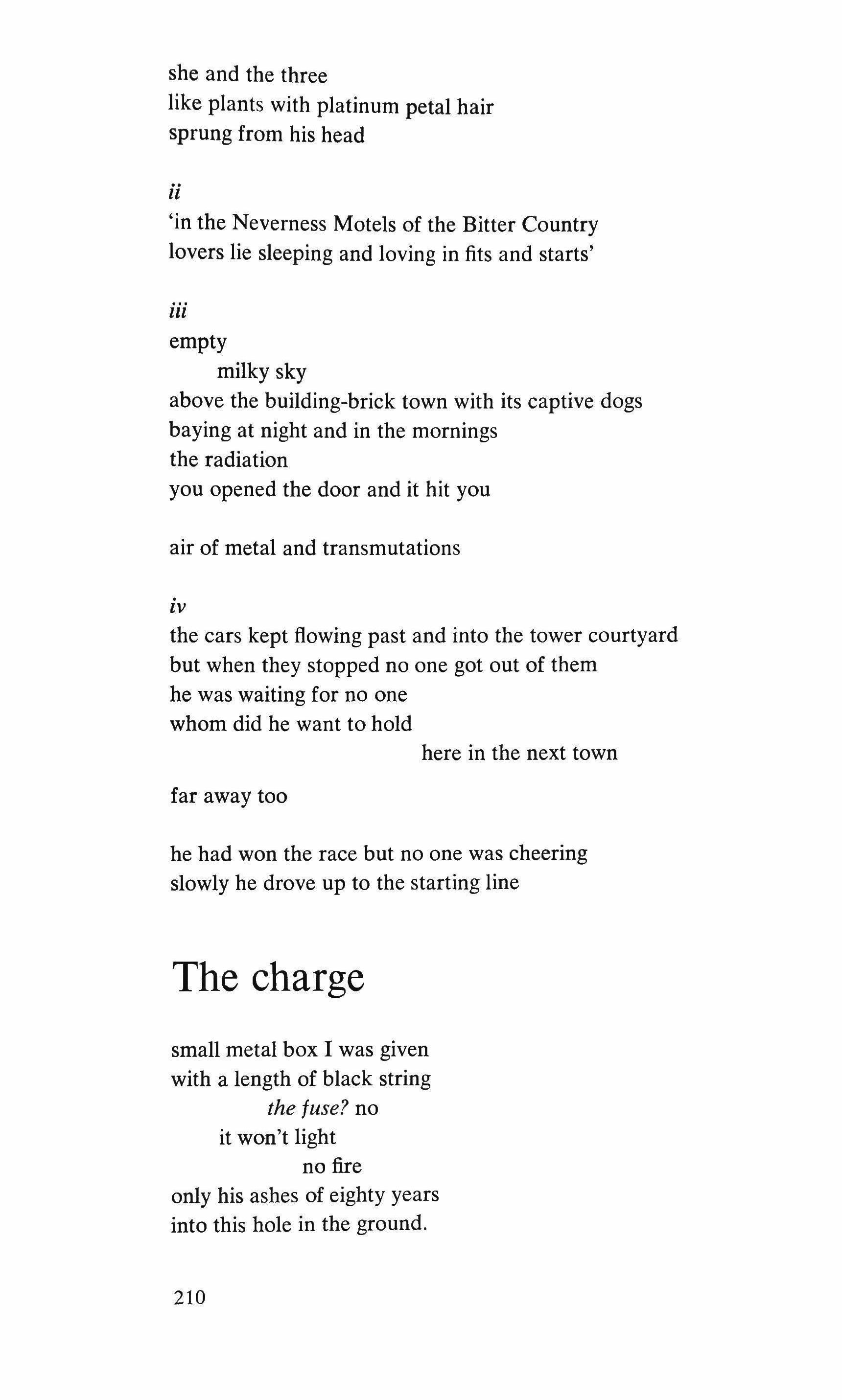
she and the three like plants with platinum petal hair sprung from his head
ii 'in the Neverness Motels of the Bitter Country lovers lie sleeping and loving in fits and starts'
iii empty milky sky
above the building-brick town with its captive dogs baying at night and in the mornings the radiation you opened the door and it hit you air of metal and transmutations
iv the cars kept flowing past and into the tower courtyard but when they stopped no one got out of them he was waiting for no one whom did he want to hold here in the next town
far away too
he had won the race but no one was cheering slowly he drove up to the starting line
The charge
small metal box I was given with a length of black string the fuse? no it won't light no fire only his ashes of eighty years into this hole in the ground.
210

burial the law demands in his cold country
can't keep your ancestors on a shelf nor give them to wind sun and rain they must be dug under mummies bones rotting flesh even ashes go into the ground.
hold the string gently it slides across my palm goes slack. son bury your father is the law. a scholar he had the face of a chieftain it haunts me the sense of that hole being far too small to contain what I left there.
Bouzouki music
1 Odysseus was ein Sitzriese 'a sitting giant' one who looks tall at table see him now through Nausicaa's eyes shambling forth and into her eyes out of those shrubs by the shore
211
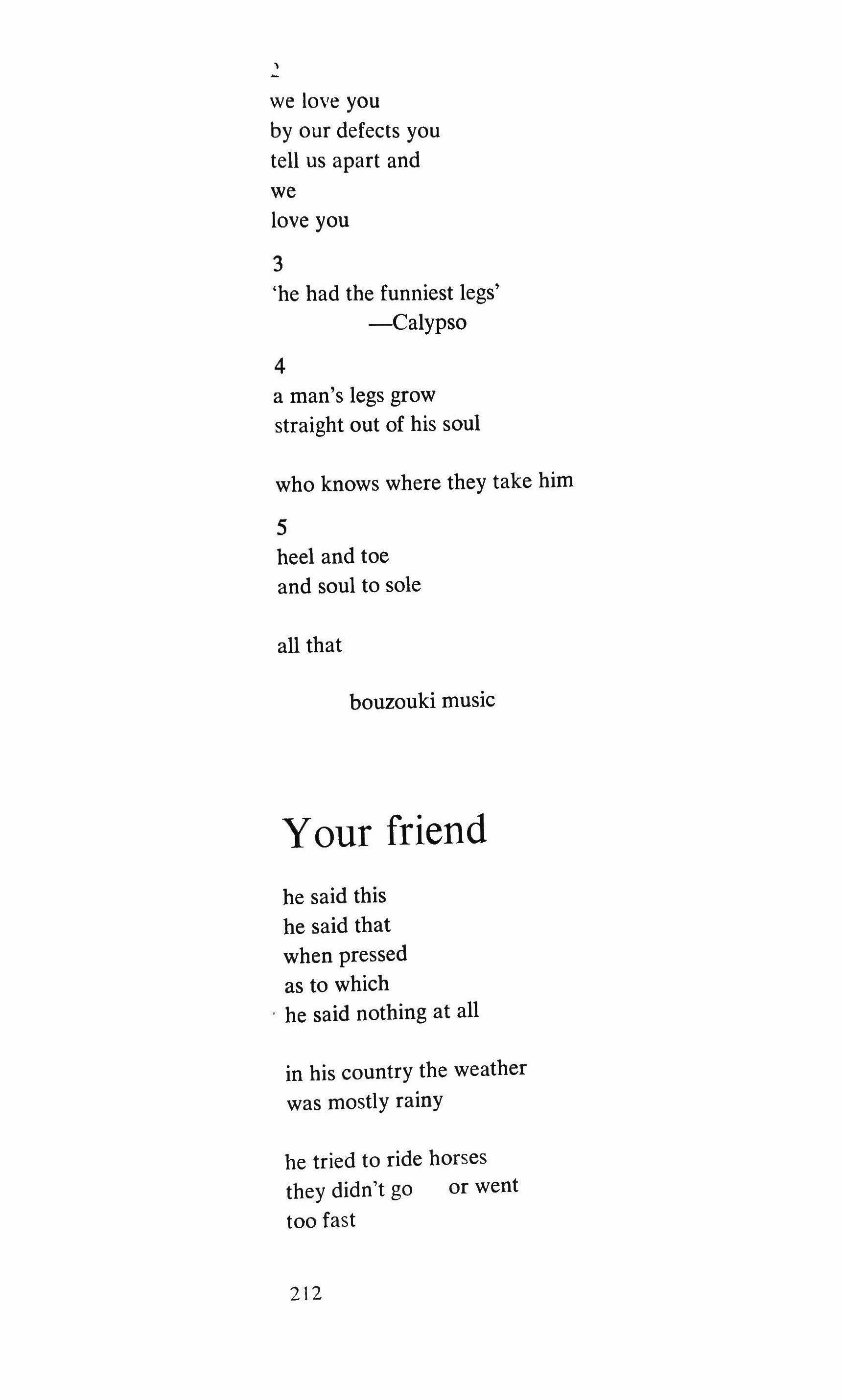
we love you by our defects you tell us apart and we love you 3 'he had the funniest legs' -Calypso 4 a man's legs grow straight out of his soul who knows where they take him 5 heel and toe and soul to sole all that bouzouki music Your friend he said this he said that when pressed as to which he said nothing at all in his country the weather was mostly rainy he tried to ride horses they didn't go or went too fast 212
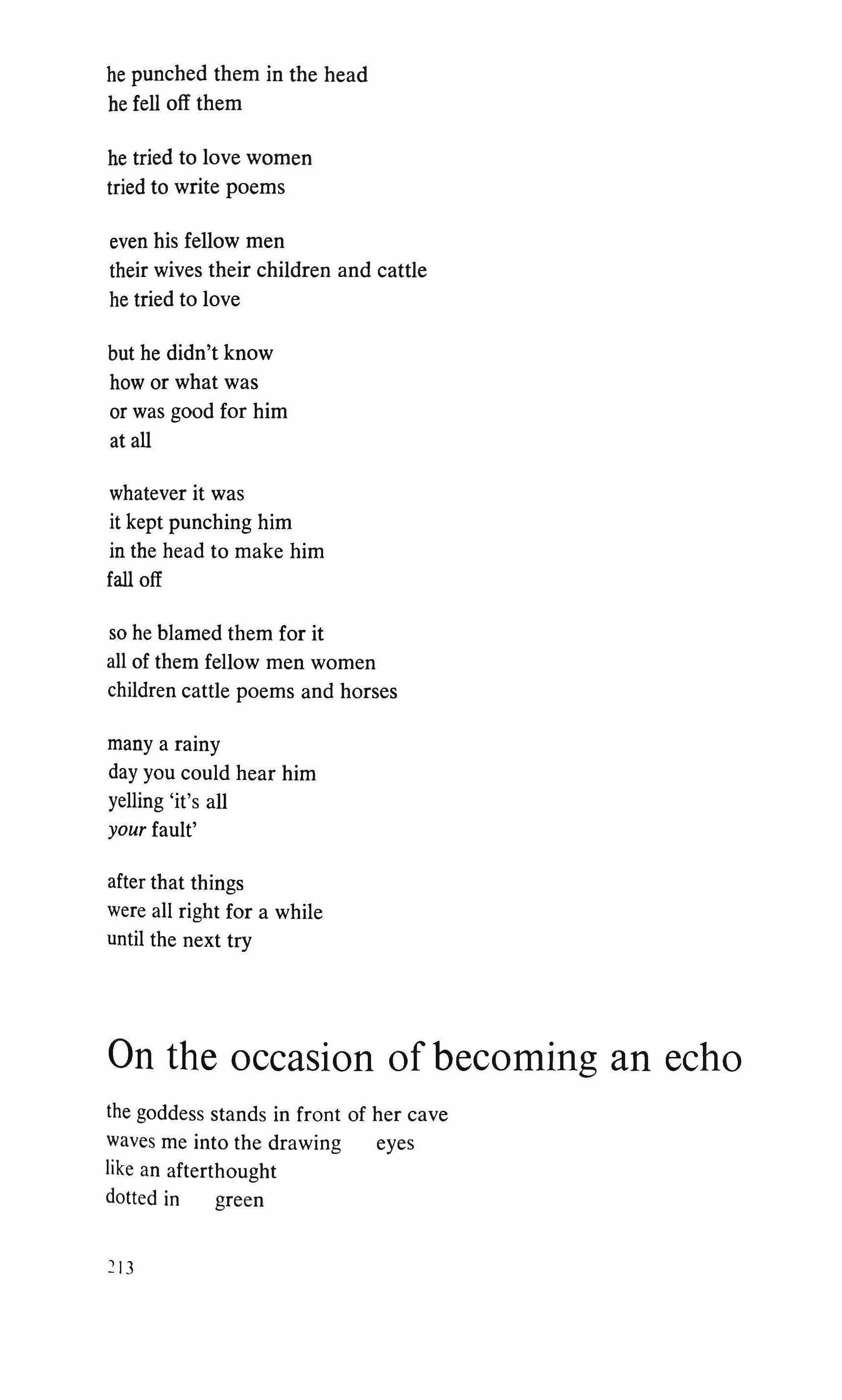
he punched them in the head be fell off them
he tried to love women tried to write poems
even his fellow men their wives their children and cattle he tried to love
but he didn't know how or what was or was good for him at all
whatever it was it kept punching him in the head to make him fall off
so he blamed them for it all of them fellow men women children cattle poems and horses
many a rainy day you could hear him yelling 'it's all your fault'
after that things were all right for a while until the next try
On the occasion of becoming an echo
the goddess stands in front of her cave waves me into the drawing eyes like an afterthought dotted in green
�13
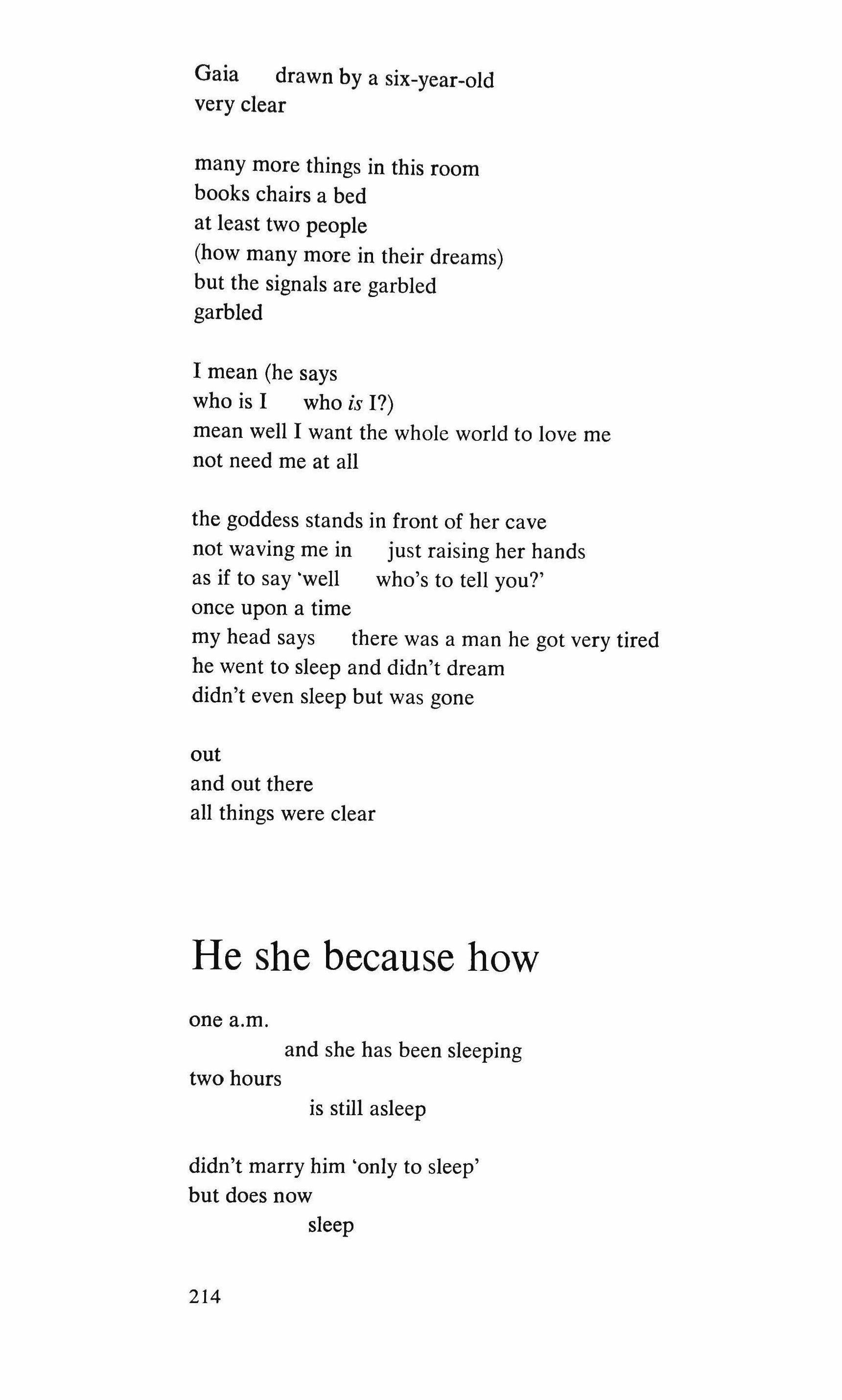
Gaia drawn by a six-year-old very clear
many more things in this room books chairs a bed at least two people (how many more in their dreams) but the signals are garbled garbled
I mean (he says who is I who is I?) mean well 1 want the whole world to love me not need me at all the goddess stands in front of her cave not waving me in just raising her hands as if to say 'well who's to tell you?' once upon a time my head says there was a man he got very tired he went to sleep and didn't dream didn't even sleep but was gone out and out there all things were clear
He
she because how
one a.m. and she has been sleeping two hours is still asleep didn't marry him 'only to sleep' but does now sleep 214

because she's tired because be's been unkind? because
feeling her bones through her sleep on the floor in their other room
because she's her kind of woman because he's his kind of man
and because she is sleeping he's writing moving a few of his smaller bones
words like love and hurt kindness unkindness blindness
ecstasy jealousy anger sweetness that too sweetness of making it with you bow do those words hang together how does his hand move the pen
how do he (plus) she (equals) it hang together on their still beautiful (though in his case slightly bent) frames?
two a.m. questions now make him sleepy too he'll go wake her up they won't feel the same
215
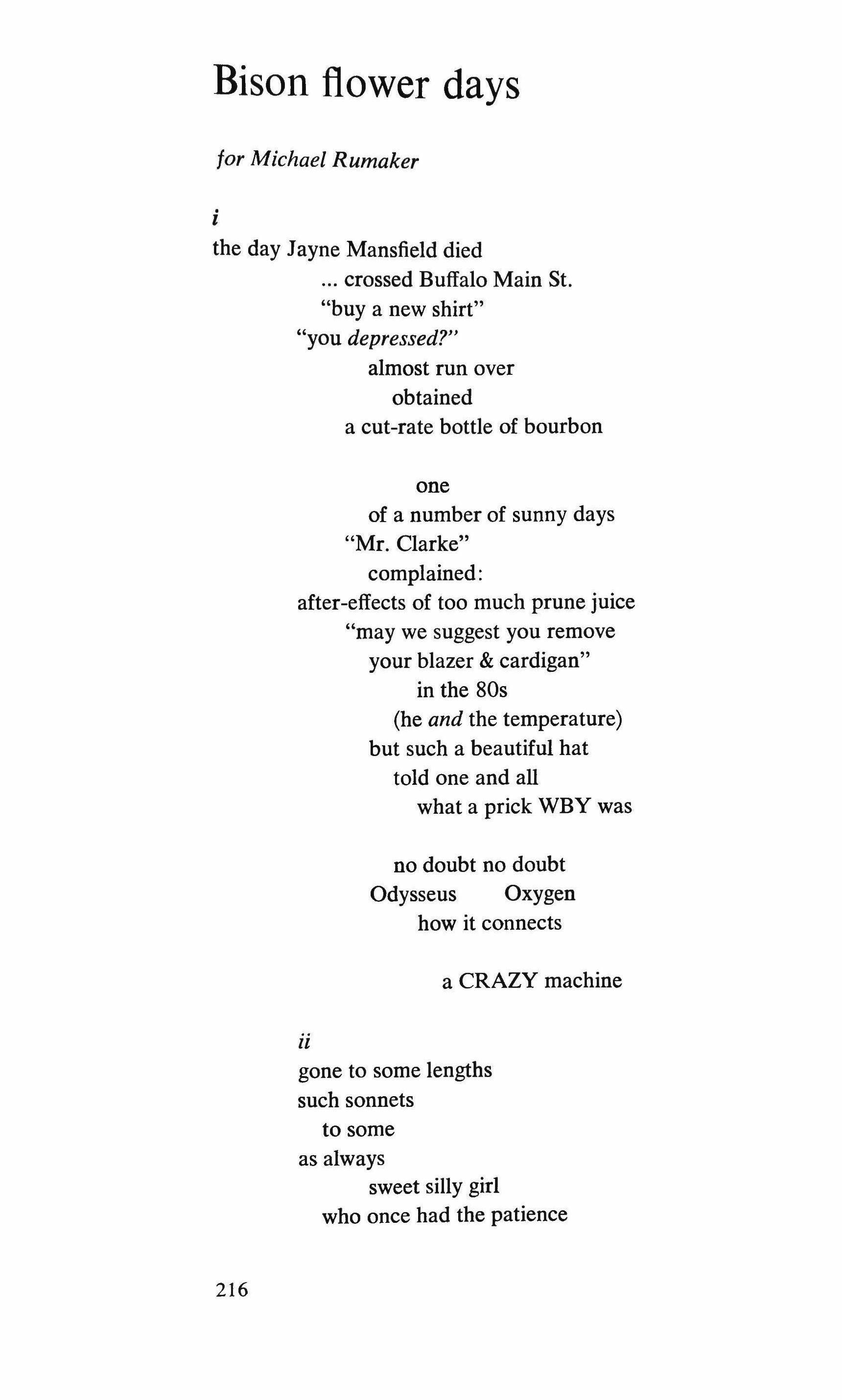
Bison flower days
for Michael Rumaker
i the day Jayne Mansfield died crossed Buffalo Main St. "buy a new shirt" "you depressed?" almost run over obtained a cut-rate bottle of bourbon one of a number of sunny days "Mr. Clarke" complained: after-effects of too much prune juice "may we suggest you remove your blazer & cardigan" in the 80s (he and the temperature) but such a beautiful hat told one and all what a prick WBY was no doubt no doubt Odysseus Oxygen how it connects a CRAZY machine ii gone to some lengths such sonnets to some as always sweet silly girl who once had the patience
216
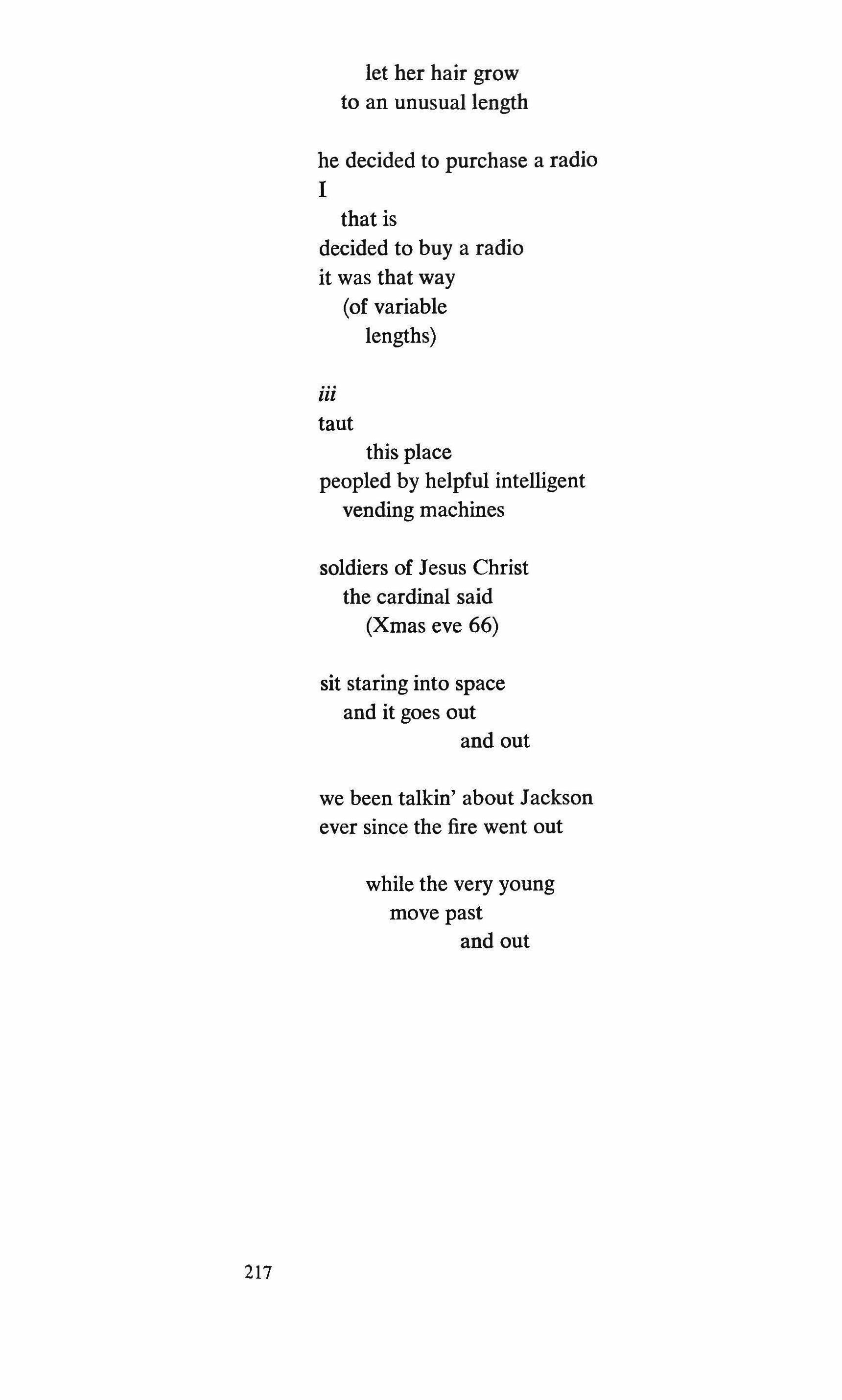
let her hair grow to an unusual length
he decided to purchase a radio I that is decided to buy a radio it was that way (of variable lengths)
iii taut this place peopled by helpful intelligent vending machines
soldiers of Jesus Christ the cardinal said (Xmas eve 66)
sit staring into space and it goes out and out
we been talkin' about Jackson ever since the fire went out while the very young move past and out
217
KEN SMITH
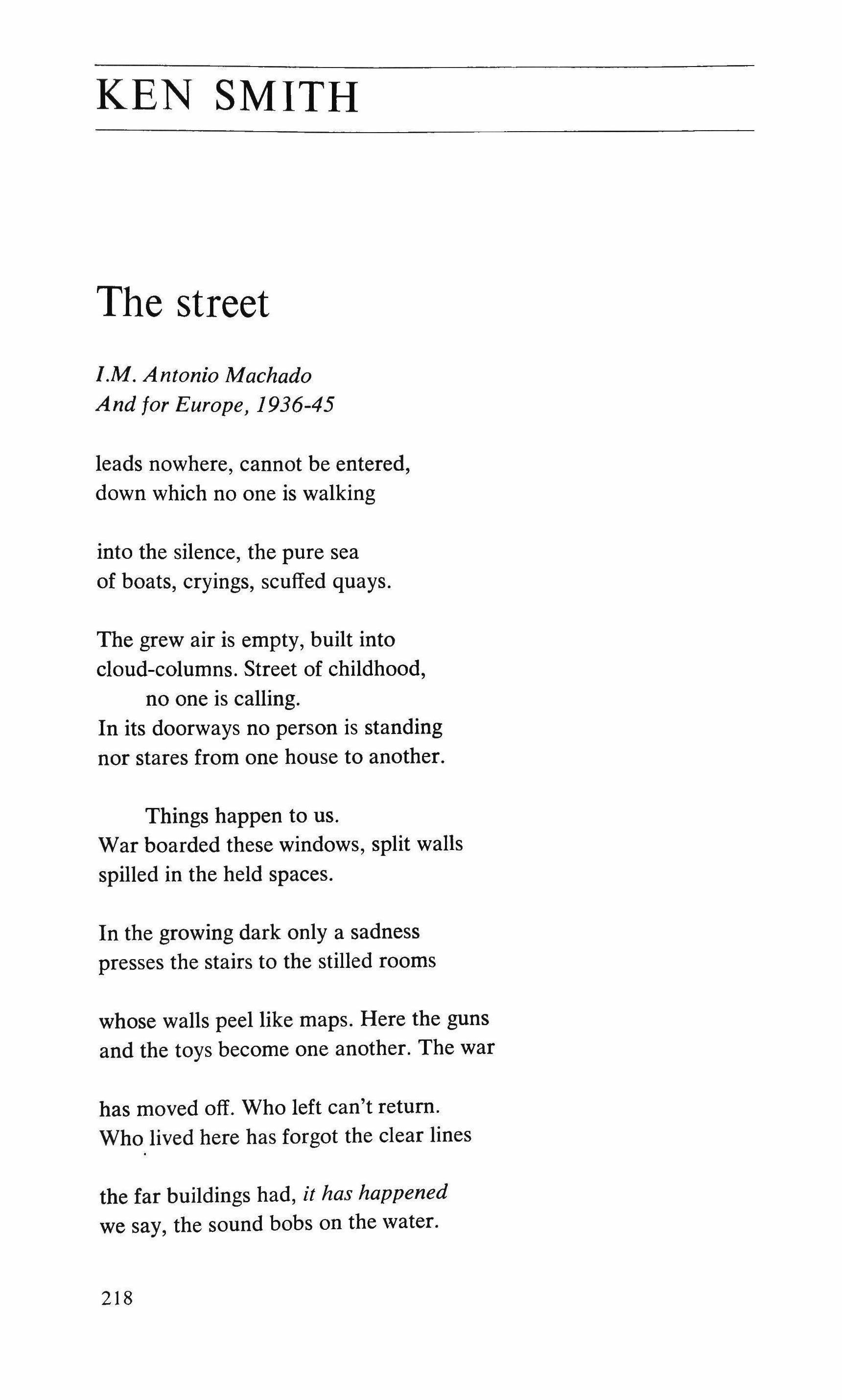
The street
I.M. Antonio Machado
And for Europe, 1936-45
leads nowhere, cannot be entered, down which no one is walking
into the silence, the pure sea of boats, cryings, scuffed quays.
The grew air is empty, built into cloud-columns. Street of childhood, no one is calling. In its doorways no person is standing nor stares from one house to another.
Things happen to us.
War boarded these windows, split walls spilled in the held spaces.
In the growing dark only a sadness presses the stairs to the stilled rooms whose walls peel like maps. Here the guns and the toys become one another. The war has moved off. Who left can't return. Who lived here has forgot the clear lines
the far buildings had, it has happened we say, the sound bobs on the water.
218
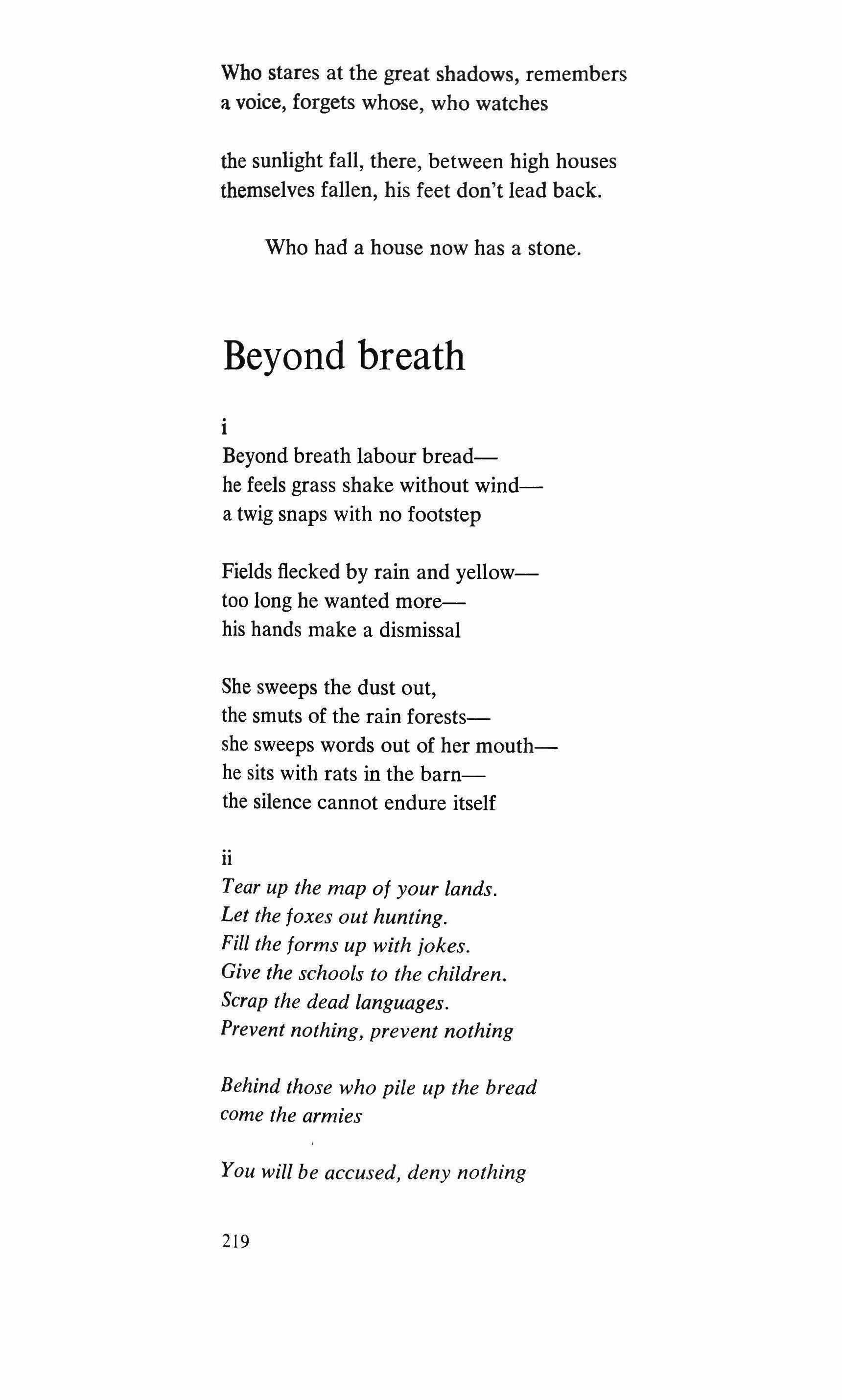
Who stares at the great shadows, remembers a voice, forgets whose, who watches the sunlight fall, there, between high houses themselves fallen, his feet don't lead back.
Who had a house now has a stone.
Beyond breath
i Beyond breath labour breadhe feels grass shake without winda twig snaps with no footstep
Fields flecked by rain and yellowtoo long he wanted morehis hands make a dismissal
She sweeps the dust out, the smuts of the rain forestsshe sweeps words out of her mouthhe sits with rats in the barnthe silence cannot endure itself
ii
Tear up the map of your lands. Let the foxes out hunting. Fill the forms up with jokes. Give the schools to the children. Scrap the dead languages. Prevent nothing, prevent nothing
Behind those who pile up the bread come the armies
You will be accused, deny nothing
219

Facts
Reading about Machado teaching in dreary Baez I looked from my book finding myself on the wrong bus in the wrong road in the wrong town
Elsewhere
walking through the gaslight I was on the wrong platform in the wrong country
It was still raining on an evening in March with the same wind blowing but I stepped down into the wrong century the wrong planet I said looking at Russia and America
Well then, I accept the wrong universe but I do not attach myself; my textbooks yawn up at me: 8 Henries, 6 wives. I learn the facts and don't count the dead with no claim on us
And only afterwards think how the sea makes a mouth between continents under the frail blown seeds of men leaving for China, and Columbus, stepping ashore, who gaped at the wrong Indians
220
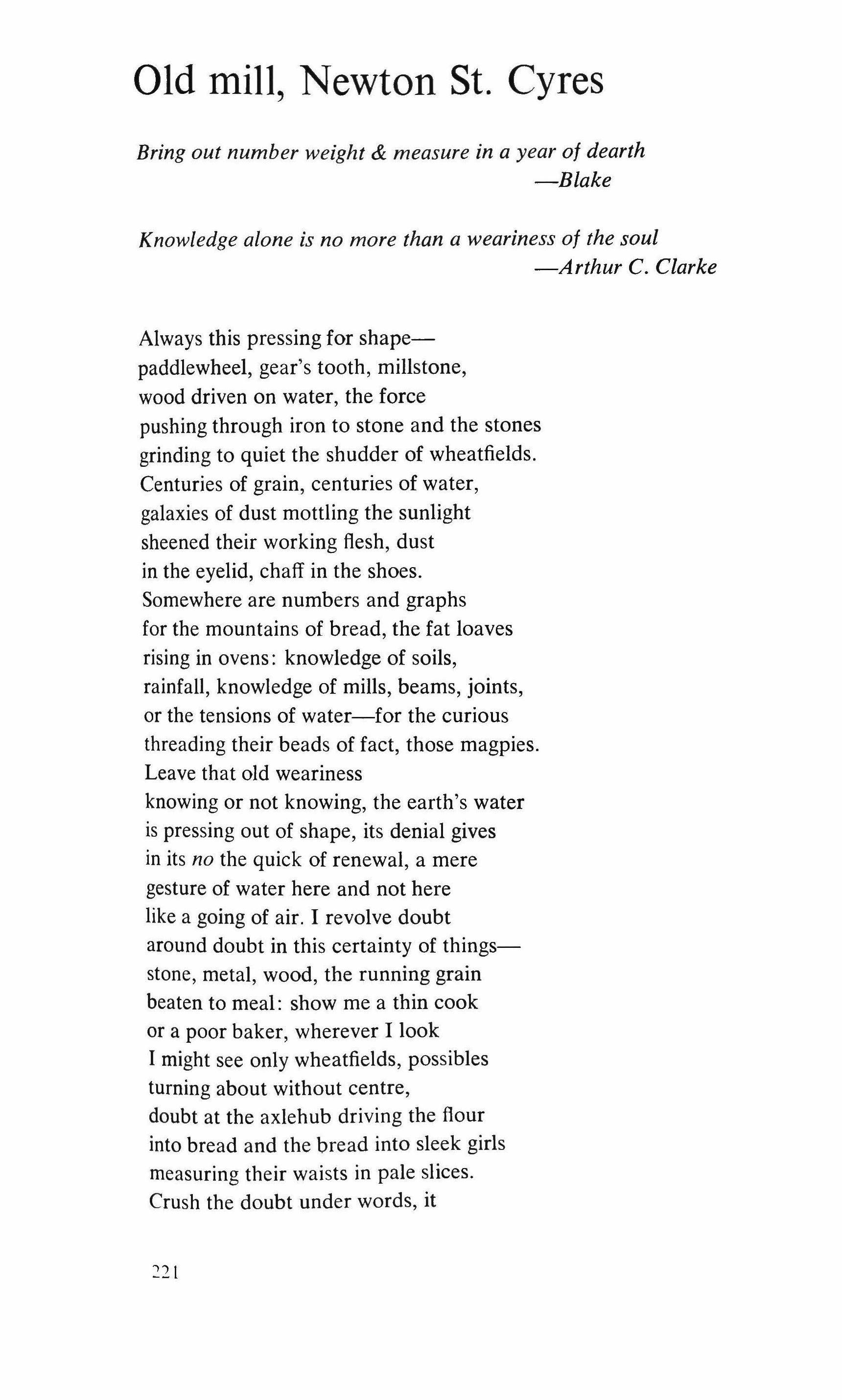
Old mill, Newton St. Cyres
Bring out number weight & measure in a year of dearth -Blake
Knowledge alone is no more than a weariness of the soul -Arthur C. Clarke
Always this pressing for shapepaddlewheel, gear's tooth, millstone, wood driven on water, the force pushing through iron to stone and the stones grinding to quiet the shudder of wheatfields. Centuries of grain, centuries of water, galaxies of dust mottling the sunlight sheened their working flesh, dust in the eyelid, chaff in the shoes. Somewhere are numbers and graphs for the mountains of bread, the fat loaves rising in ovens: knowledge of soils, rainfall, knowledge of mills, beams, joints, or the tensions of water-for the curious threading their beads of fact, those magpies. Leave that old weariness knowing or not knowing, the earth's water is pressing out of shape, its denial gives in its no the quick of renewal, a mere gesture of water here and not here like a going of air. I revolve doubt around doubt in this certainty of thingsstone, metal, wood, the running grain beaten to meal: show me a thin cook or a poor baker, wherever I look I might see only wheatfields, possibles turning about without centre, doubt at the axlehub driving the flour into bread and the bread into sleek girls measuring their waists in pale slices. Crush the doubt under words, it
221
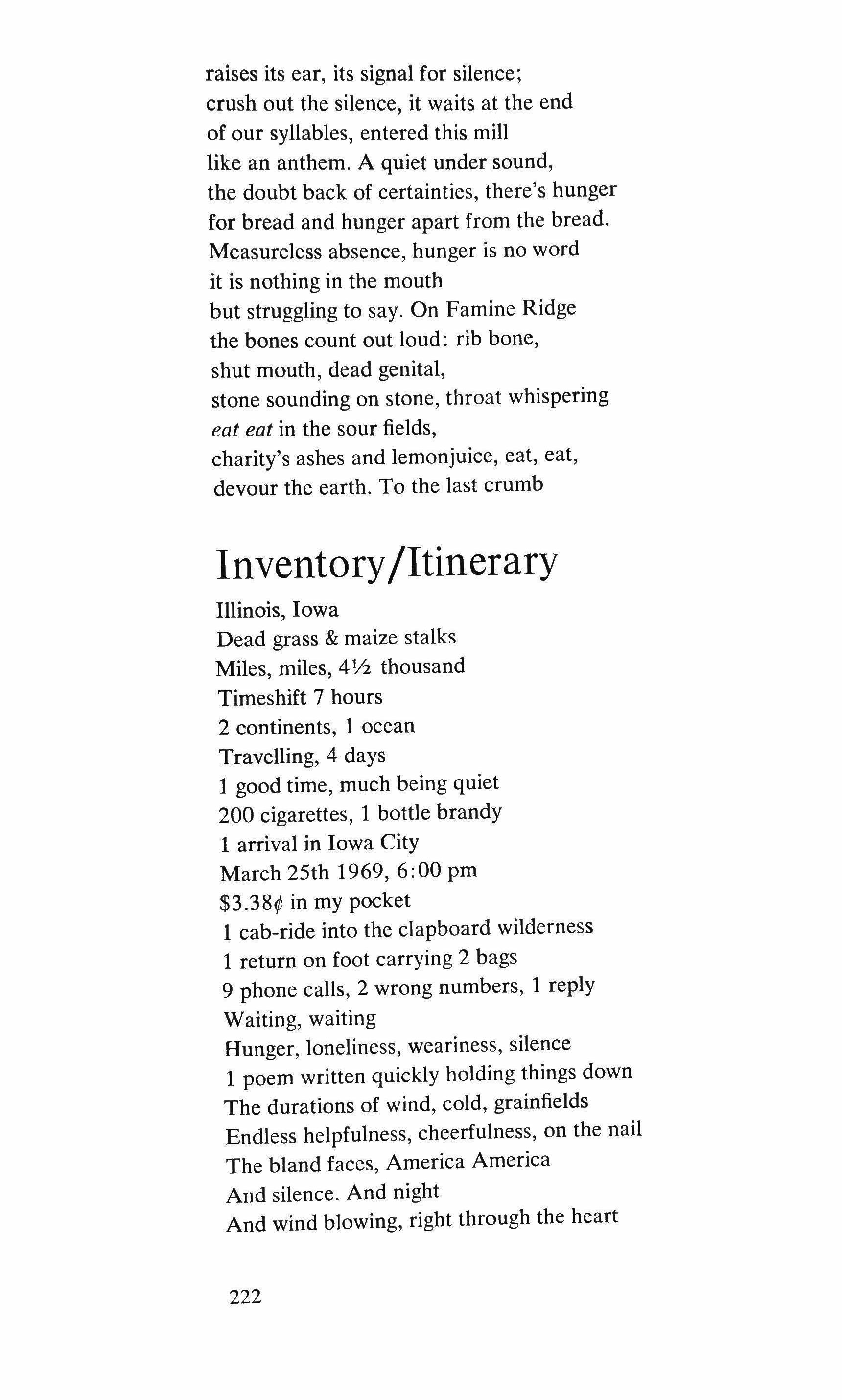
raises its ear, its signal for silence; crush out the silence, it waits at the end of our syllables, entered this mill like an anthem. A quiet under sound, the doubt back of certainties, there's hunger for bread and hunger apart from the bread. Measureless absence, hunger is no word it is nothing in the mouth but struggling to say. On Famine Ridge the bones count out loud: rib bone, shut mouth, dead genital, stone sounding on stone, throat whispering eat eat in the sour fields, charity's ashes and lemonjuice, eat, eat, devour the earth. To the last crumb
Inventory/Itinerary
Illinois, Iowa
Dead grass & maize stalks
Miles, miles, 4Yz thousand
Timeshift 7 hours
2 continents, 1 ocean
Travelling, 4 days
1 good time, much being quiet
200 cigarettes, 1 bottle brandy
1 arrival in Iowa City
March 25th 1969,6:00 pm
$3.38¢ in my pocket
1 cab-ride into the clapboard wilderness
1 return on foot carrying 2 bags
9 phone calls, 2 wrong numbers, 1 reply
Waiting, waiting Hunger, loneliness, weariness, silence
1 poem written quickly holding things down
The durations of wind, cold, grainfields
Endless helpfulness, cheerfulness, on the nail
The bland faces, America America
And silence. And night
And wind blowing, right through the heart
222
The Amana Colonies
Founded 1855 in Iowa by a group calling themselves Inspirationists originated in Germany about 1714. The immigrants 'according to His laws and His requirements in our own consciences' attempted a community sharing work and wealth equally that persisted up to the Depression but that exists now as tourist bait close to Interstate 80: "one of the midwest's most historic and recent attractions"

1
Fortitude, endurance, amana: remain faithful. We survive the sea and the great silences. Under God and the blue sky we share all we have.
Amana-we put a spade to the wilderness.
Amana-skill of our hands on the new turned land.
Amana-the word is our breath, we share, we survive the woods that are gone where the redmen went hearing the rain speak. Amana, the corn roots, cattle and vines, mortise and tenon, coins and sweat run together. Amana, our work and our bread.
Amana. The voice within each of us speaks
2
In the turning of wood or habit of speech that old life may whisper, a black dress fluttered in wind, wooden shoes in the snow, poverty chewing its nails, winter and summer. Will nothing of sharing survive, the cry of what was weathered away in the guidebook. Erosion is paint from an aerosol can, visitors sniffing repeating authentic authentica word in the mouth. We make and we sell, We share our dead root, we dream of endurances
3
What prints mark butterchurn, spinning-wheel, what is a scythe's use, how held, what sweats
223
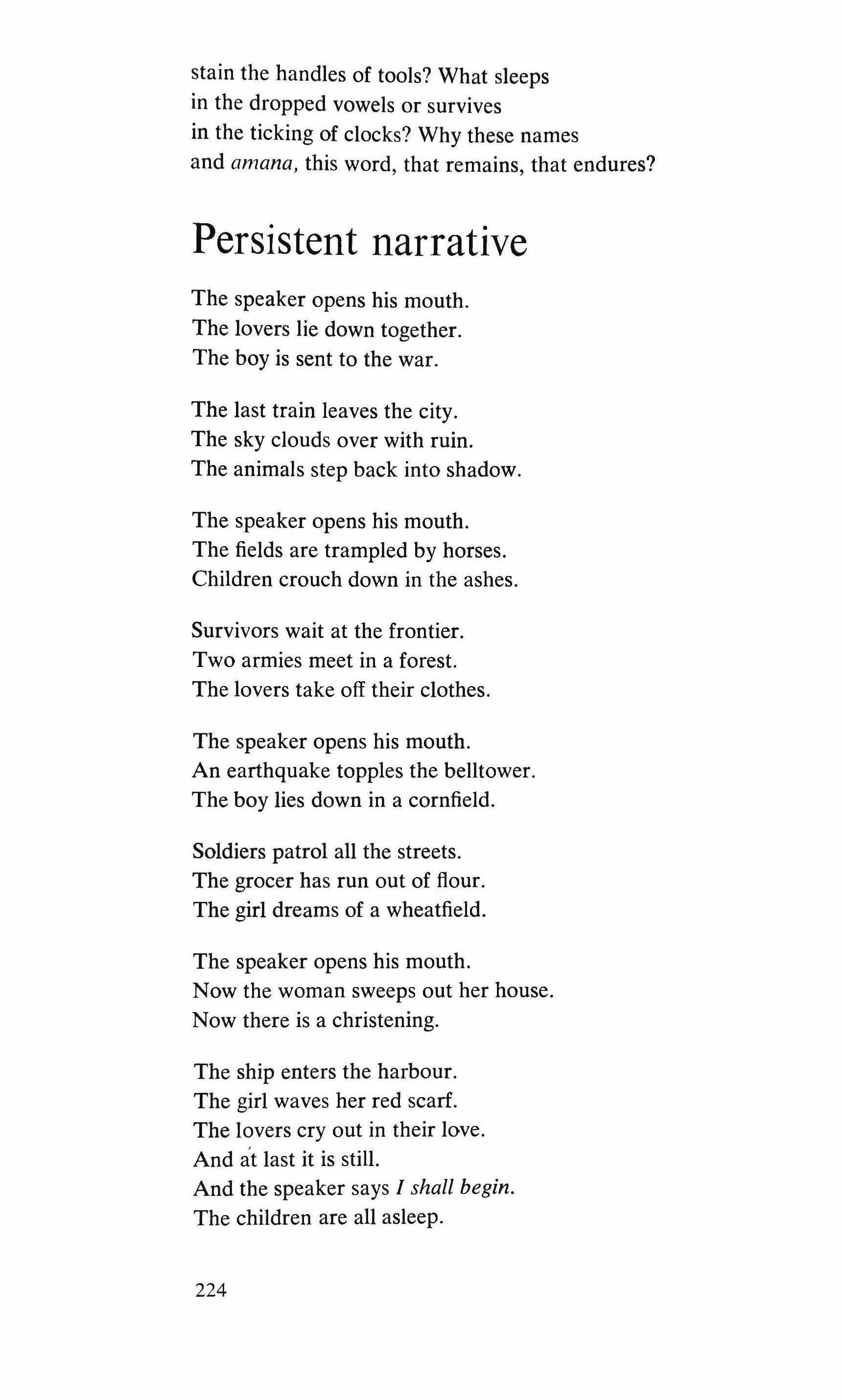
stain the handles of tools? What sleeps in the dropped vowels or survives in the ticking of clocks? Why these names and amana, this word, that remains, that endures?
Persistent narrative
The speaker opens his mouth. The lovers lie down together. The boy is sent to the war.
The last train leaves the city. The sky clouds over with ruin. The animals step back into shadow.
The speaker opens his mouth. The fields are trampled by horses. Children crouch down in the ashes.
Survivors wait at the frontier. Two armies meet in a forest. The lovers take off their clothes.
The speaker opens his mouth. An earthquake topples the belltower. The boy lies down in a cornfield.
Soldiers patrol all the streets.
The grocer has run out of flour. The girl dreams of a wheatfield.
The speaker opens his mouth. Now the woman sweeps out her house. Now there is a christening.
The ship enters the harbour. The girl waves her red scarf. The lovers cry out in their love. And at last it is still.
And the speaker says I shall begin. The children are all asleep.
224
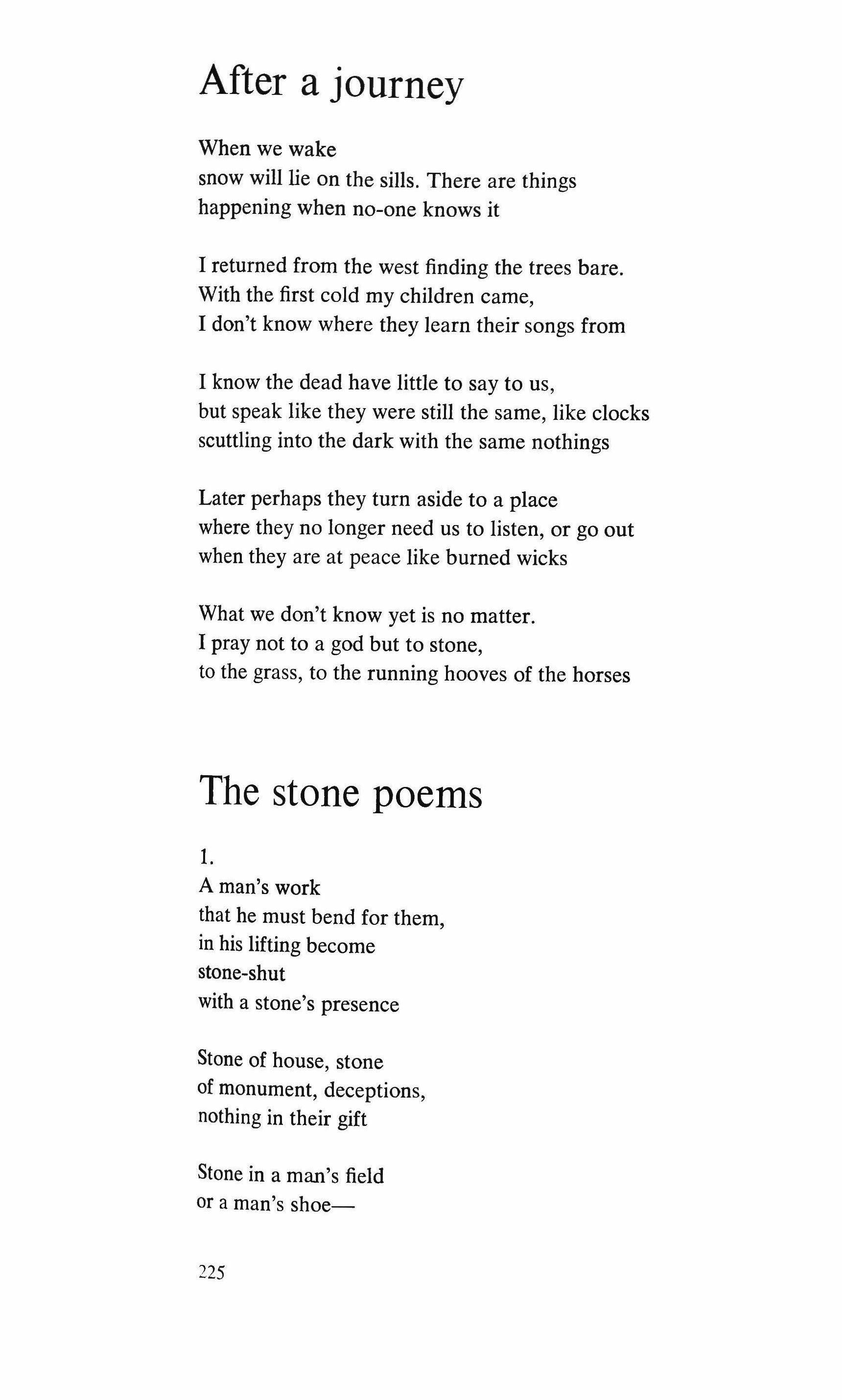
After a journey
When we wake snow will lie on the sills. There are things happening when no-one knows it
I returned from the west finding the trees bare. With the first cold my children came, I don't know where they learn their songs from
I know the dead have little to say to us, but speak like they were still the same, like clocks scuttling into the dark with the same nothings
Later perhaps they turn aside to a place where they no longer need us to listen, or go out when they are at peace like burned wicks
What we don't know yet is no matter. I pray not to a god but to stone, to the grass, to the running hooves of the horses
The stone poems
1. A man's work that he must bend for them, in his lifting become stone-shut with a stone's presence
Stone of house, stone of monument, deceptions, nothing in their gift
Stone in a man's field or a man's shoe-
225
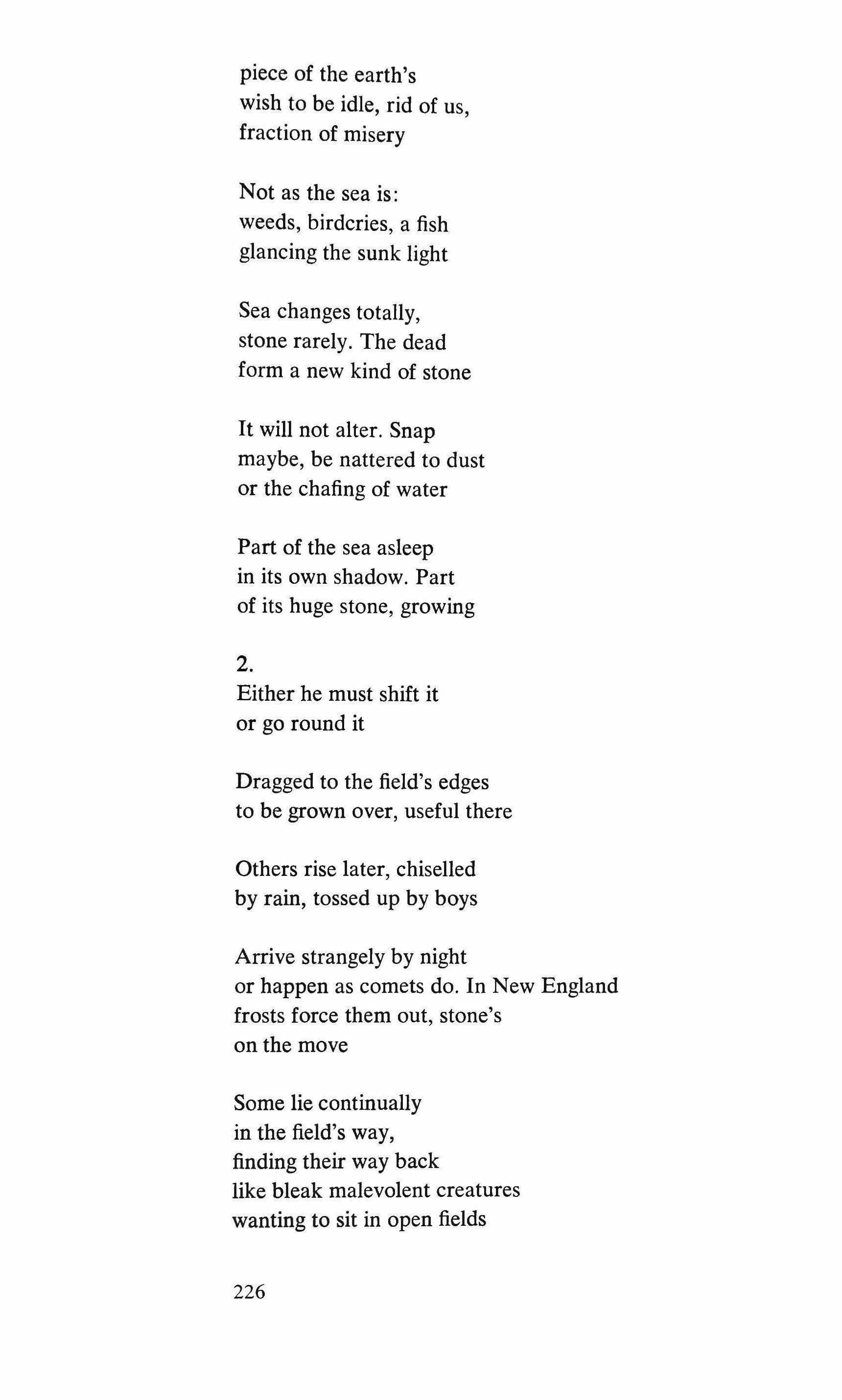
piece of the earth's wish to be idle, rid of us, fraction of misery
Not as the sea is: weeds, birdcries, a fish glancing the sunk light
Sea changes totally, stone rarely. The dead form a new kind of stone
It will not alter. Snap maybe, be nattered to dust or the chafing of water
Part of the sea asleep in its own shadow. Part of its huge stone, growing 2. Either he must shift it or go round it
Dragged to the field's edges to be grown over, useful there
Others rise later, chiselled by rain, tossed up by boys
Arrive strangely by night or happen as comets do. In New England frosts force them out, stone's on the move
Some lie continually in the field's way, finding their way back like bleak malevolent creatures wanting to sit in open fields
226

And the man keeps pelting them in a backward whirlpool of stones slewed over centuries
As if this were a battle: a man hurling stones and the stones' sad returns to their orbits
As if they would lie barearse to the sun, giving nothing growth
3. I Sonecold we say. In the blank faceless thing nothing of our meanings but that it outlasts us, holds up the names that mean nothing
That it is stone, that it is cold, that it is chosen for sepulchres
Nothing in that: bones picked clean as a stick with the seasons drained out, a stone flag, a perpetual lament for dead people
And nothing in that, nothing can be stayed off: a stoney vision we say, amazed at the strange light grown in the world II
Absence of stones in our cities;
227
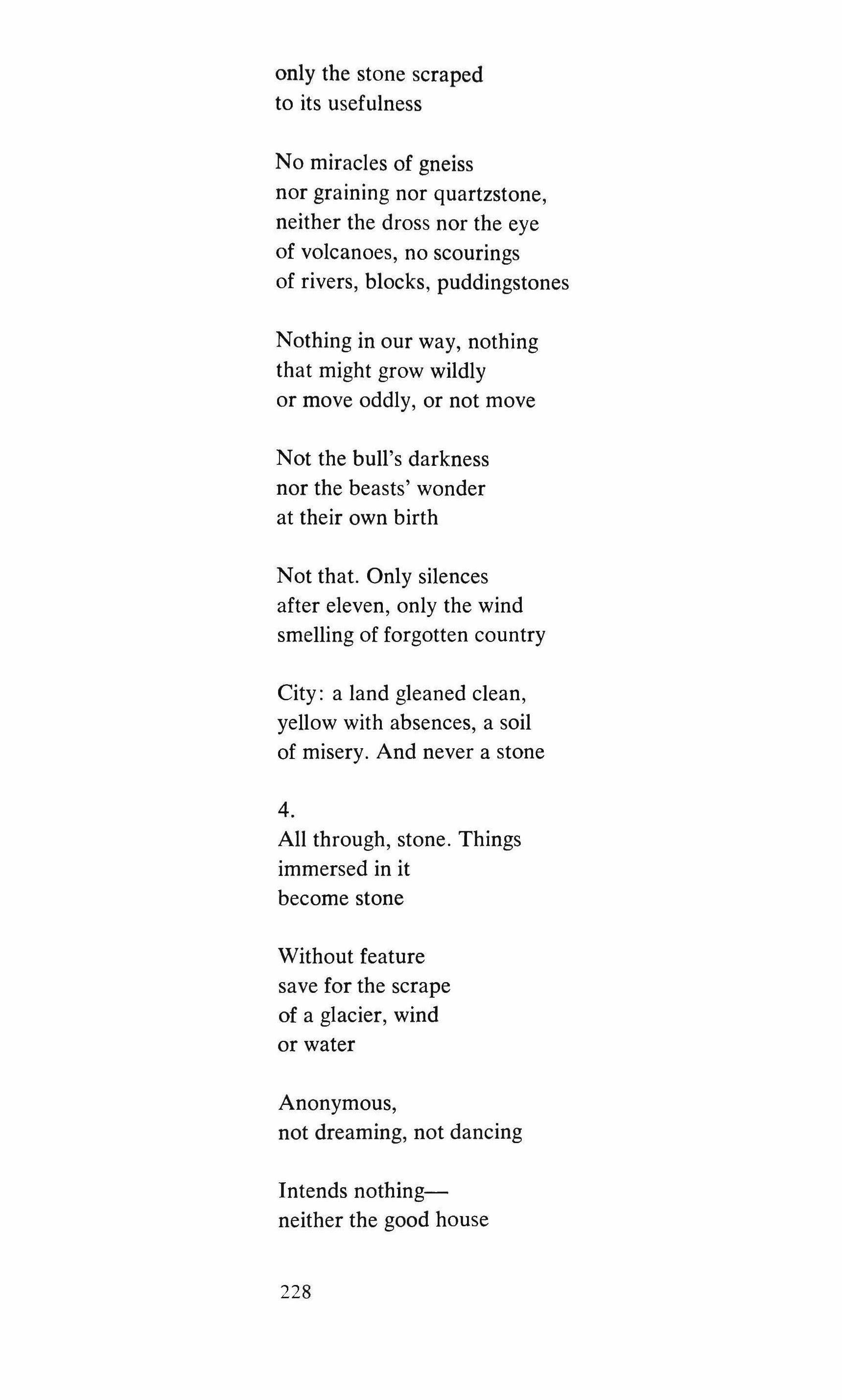
only the stone scraped to its usefulness
No miracles of gneiss nor graining nor quartzstone, neither the dross nor the eye of volcanoes, no scourings of rivers, blocks, puddingstones
Nothing in our way, nothing that might grow wildly or move oddly, or not move
Not the bull's darkness nor the beasts' wonder at their own birth
Not that. Only silences after eleven, only the wind smelling of forgotten country
City: a land gleaned clean, yellow with absences, a soil of misery. And never a stone
4.
All through, stone. Things immersed in it become stone
Without feature save for the scrape of a glacier, wind or water
Anonymous, not dreaming, not dancing
Intends nothingneither the good house
228

nor arrowhead, not even inconvenience
But there, resisting, holding on while the planet shudders to bits
Nothing to do but be grey boulder or pebble
No inside, no outside, no centre. No squatting like an animal. No nesting like a bird
Not wanting to go back into rock, not wanting to enter the sea, not wanting to be a small red flower or a lost button
Not even likeable
Not bothered
5.
Turned in the hand, idly to the contempt of the busy
Whatever it would be to be brought to it
A man's say to be pig, bird in flight the tiny house of a small
A man's say. Stone is its own place
That it may look
229
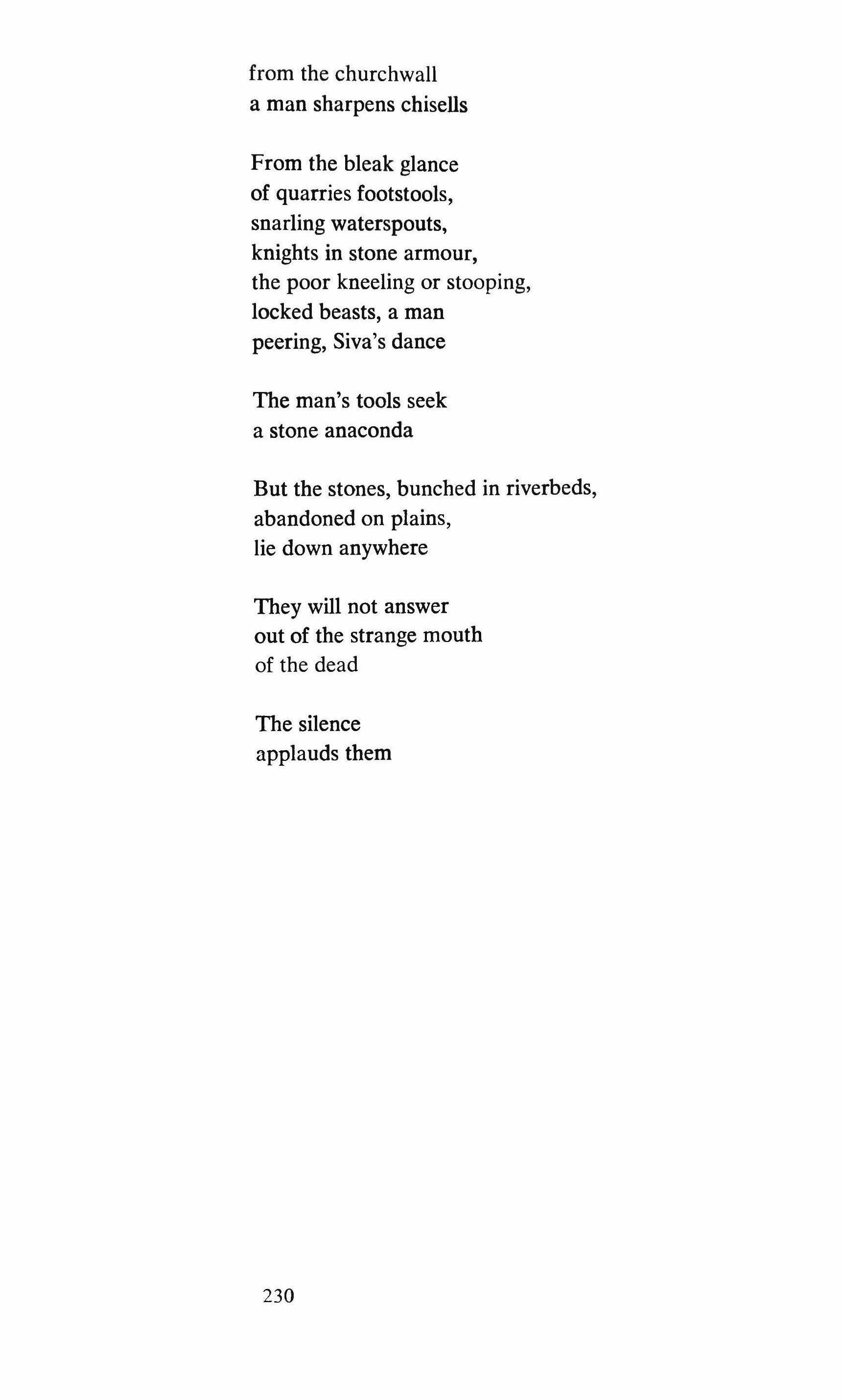
from the churchwall a man sharpens chisells
From the bleak glance of quarries footstools, snarling waterspouts, knights in stone armour, the poor kneeling or stooping, locked beasts, a man peering, Siva's dance
The man's tools seek a stone anaconda
But the stones, bunched in riverbeds, abandoned on plains, lie down anywhere
They will not answer out of the strange mouth of the dead
The silence applauds them
230

PETER WHIGHAM
The orchard is not cut down
The orchard is gone. A space, conventionally like Paaschendaele, linearly framed by black railings, rises to a wide field on which, inert, the milk-brown cows sun themselves and where the busy mailvan and the bus brightly curtail, on the road sudden as a gun, the field-the vanished grove.
No dream of priest or king can empower mind to seize the blossom on the wind; only, in passing, I have seen swan leaning on confused swan fall inwards like a folding fan.
Erotion's death
Frontus, Father; Flacilla, Mother, extend your protection from the Stygian shadows. The small Erotion (my household Iris) has changed my house for yours. See that the hellhound's horrid jaws don't scare her, who was no more than six years old (less six days) on the winter day she died. She'll play beside you gossiping about me in child's language. Weigh lightly on her small bones, gentle earth, as she, when living, lightly trod on you.
Martial, V.34;
231
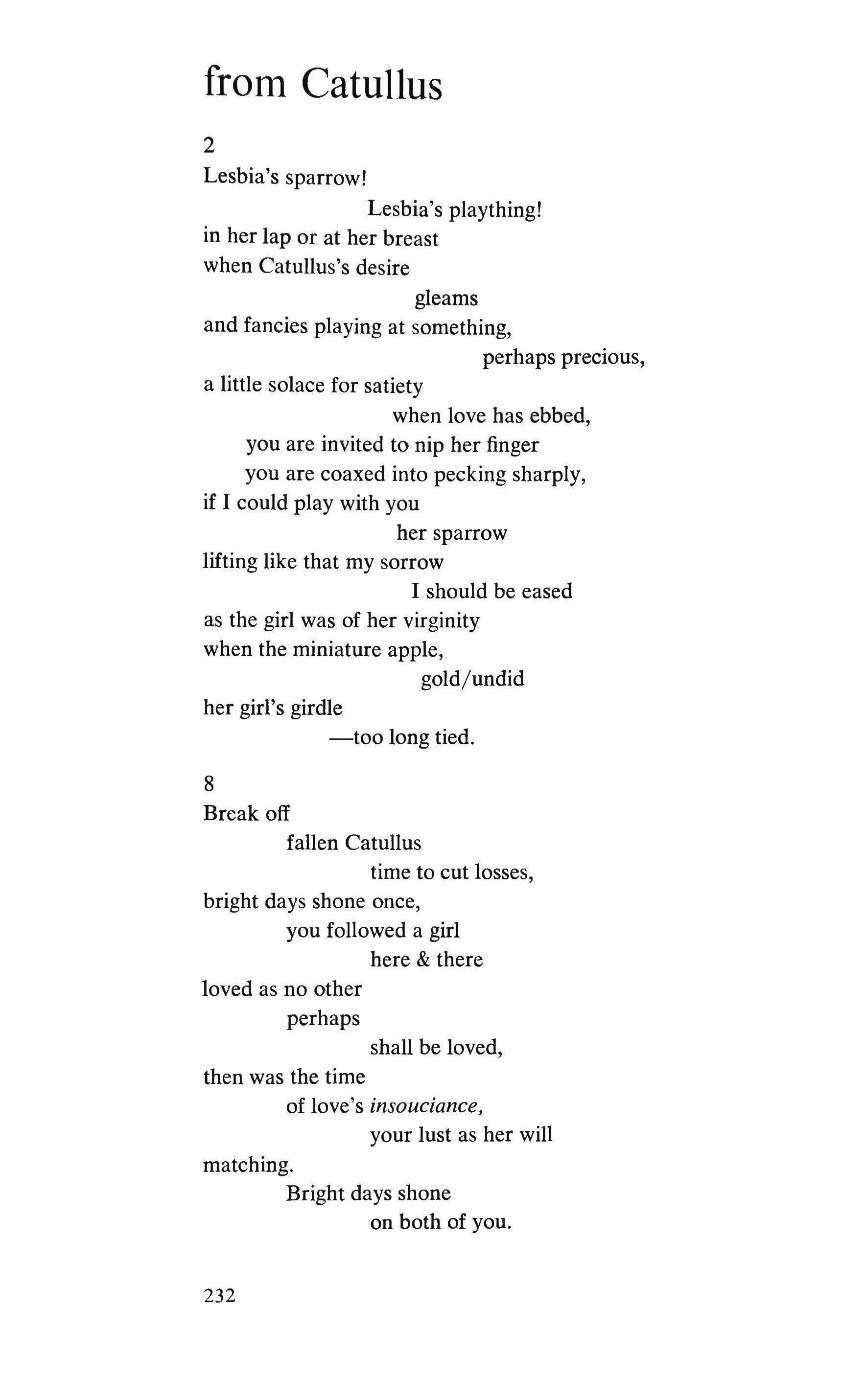
from Catullus
2 Lesbia's sparrow! Lesbia's plaything! in her lap or at her breast when Catullus's desire gleams and fancies playing at something, perhaps precious, a little solace for satiety when love has ebbed, you are invited to nip her finger you are coaxed into pecking sharply, if I could play with you her sparrow lifting like that my sorrow I should be eased as the girl was of her virginity when the miniature apple, gold/undid her girl's girdle -too long tied.
8 Break off fallen Catullus time to cut losses, bright days shone once, you followed a girl here & there loved as no other perhaps shall be loved, then was the time of love's insouciance, your lust as her will matching. Bright days shone on both of you.
232

Now, a woman is unwilling. Follow suit
weak as you are no chasing of mirages no fallen love, a clean break hard against the past. Not again, Lesbia. No more.
Catullus is clear. He won't miss you. He won't crave it. lt is cold. But you will whine. You are ruined. What will your life be? Who will 'visit' your room?
Who uncover that beauty? Whom will you love? Whose girl will you be? Whom kiss?
Whose lips bite? Enough. Break. Catullus. Against the past.
12
While everyone else is laughing & drinking you extend a surreptitious claw, Asinius, towards the table napkins of the negligent an unattractive habit you misguidedly think funny. You demur?
I assure you it is at once squalid & unattractive. Ask Pollionus, your brother
233
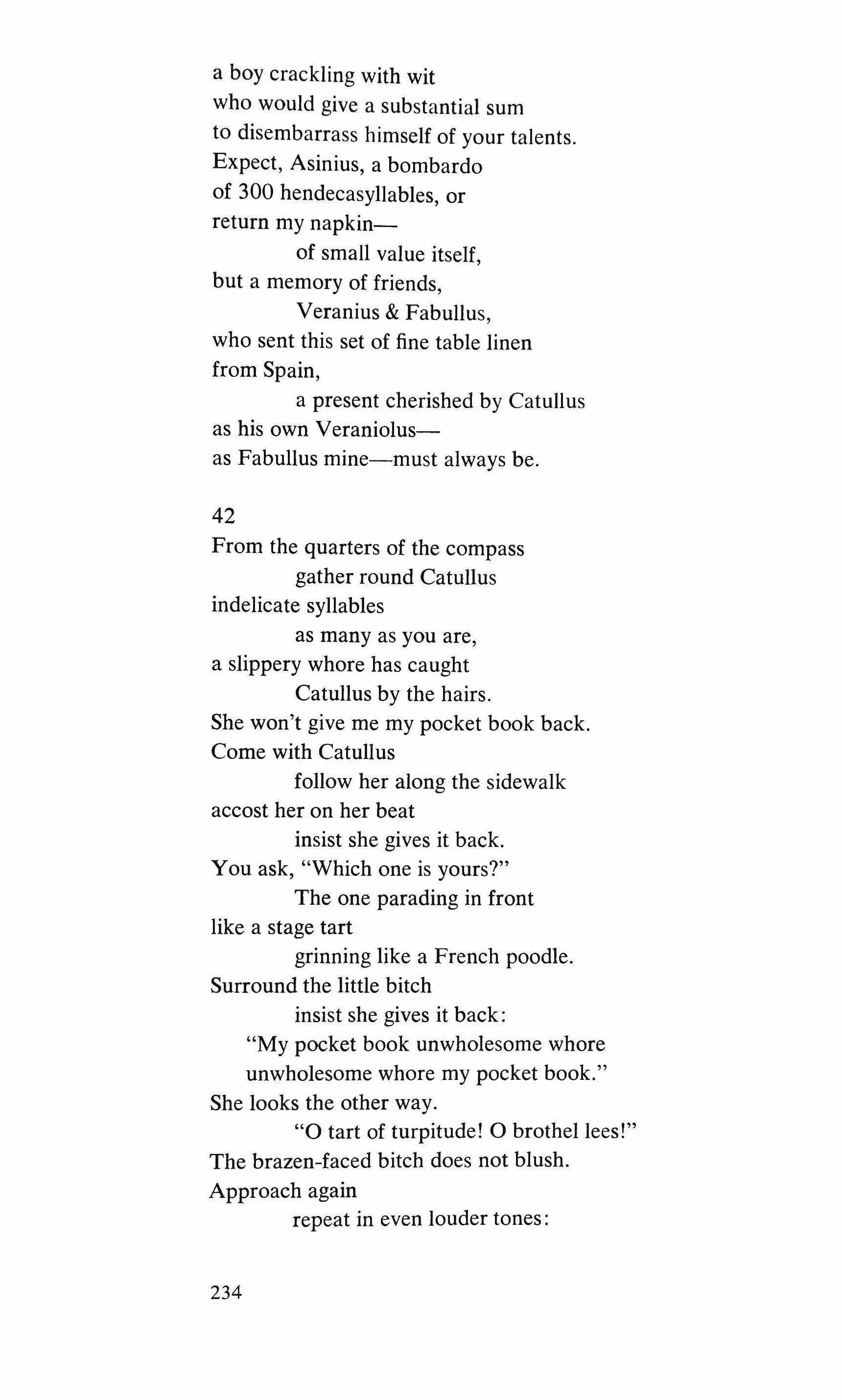
a boy crackling with wit who would give a substantial sum to disembarrass himself of your talents. Expect, Asinius, a bombardo of 300 hendecasyllables, or return my napkinof small value itself, but a memory of friends, Veranius & Fabullus, who sent this set of fine table linen from Spain, a present cherished by Catullus as his own Veraniolusas Fabullus mine-must always be.
42
From the quarters of the compass gather round Catullus indelicate syllables as many as you are, a slippery whore has caught Catullus by the hairs. She won't give me my pocket book back. Come with Catullus follow her along the sidewalk accost her on her beat insist she gives it back. You ask, "Which one is yours?" The one parading in front like a stage tart grinning like a French poodle. Surround the little bitch insist she gives it back: "My pocket book unwholesome whore unwholesome whore my pocket book." She looks the other way. "0 tart of turpitude! 0 brothel lees!" The brazen-faced bitch does not blush. Approach again repeat in even louder tones:
234

"My pocket book unwholesome whore unwholesome whore my pocket book." We make no visible impression. The girl is totally unmoved. Indelicate syllables to get our pocket book we must adopt a change of front we must adopt new tactics thus: Intact young lady and of nubile rectitude would you be so kind as to give me back my pocket book?"
Love poems of the Vlth Dalai Lama
1 This country girl with skin like country cream looks with frankness at me from the bed-furs. Her eyes watch me put my rings on one side. They watch me unlace my purse-belt.
5 A pattern of birds, crossed twigs, & the last milestone have brought love like luck to these two met in this hedge-tavern, where an old woman ladles out wine to them.
235

She will go on serving wine on the periphery of their lives at parting, at welcoming, at childbirth.
8
Why does this pretty boy from Kong-po buzz like a trapped bee?
He has been my bed-mate for three days, and now he thinks only of God & talks constantly of 'the future'. loquitur puella
11
In a season the shoots we planted in last year's mud have become handfuls of desiccated bent fit for thatching.
In a season, the young men have become stooped, their bodies curved as the bent bows of the archers of Mu.
Who bends the bow? Who loads youth with sudden age?
16 The old dog at the west postern has a yellow beard and is discreet
236
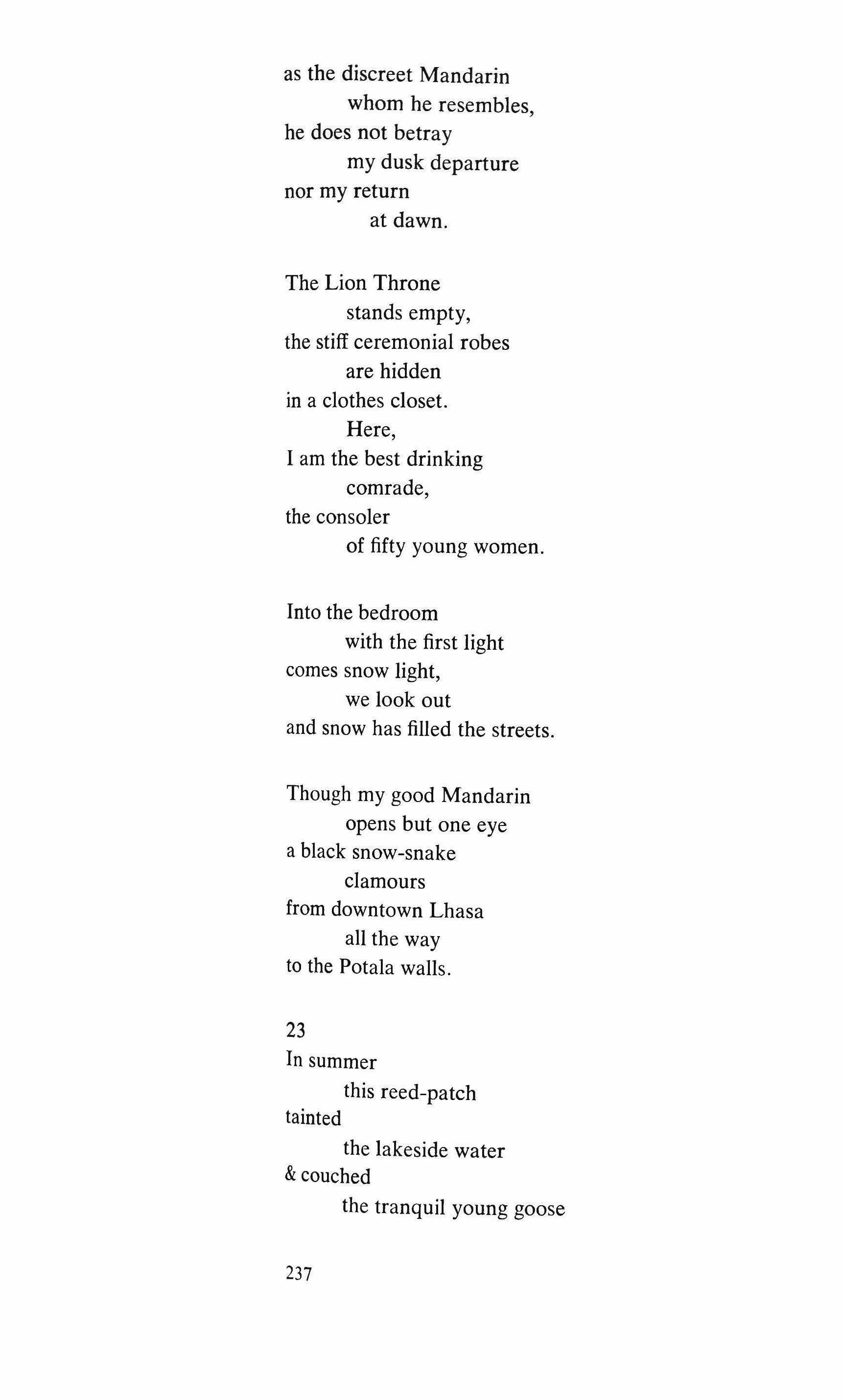
as the discreet Mandarin whom he resembles, he does not betray my dusk departure nor my return at dawn.
The Lion Throne stands empty, the stiff ceremonial robes are hidden in a clothes closet. Here, I am the best drinking comrade, the can soler of fifty young women.
Into the bedroom with the first light comes snow light, we look out and snow has filled the streets.
Though my good Mandarin opens but one eye a black snow-snake clamours from downtown Lhasa all the way to the Potala walls.
23 In summer this reed-patch tainted the lakeside water & couched the tranquil young goose
237
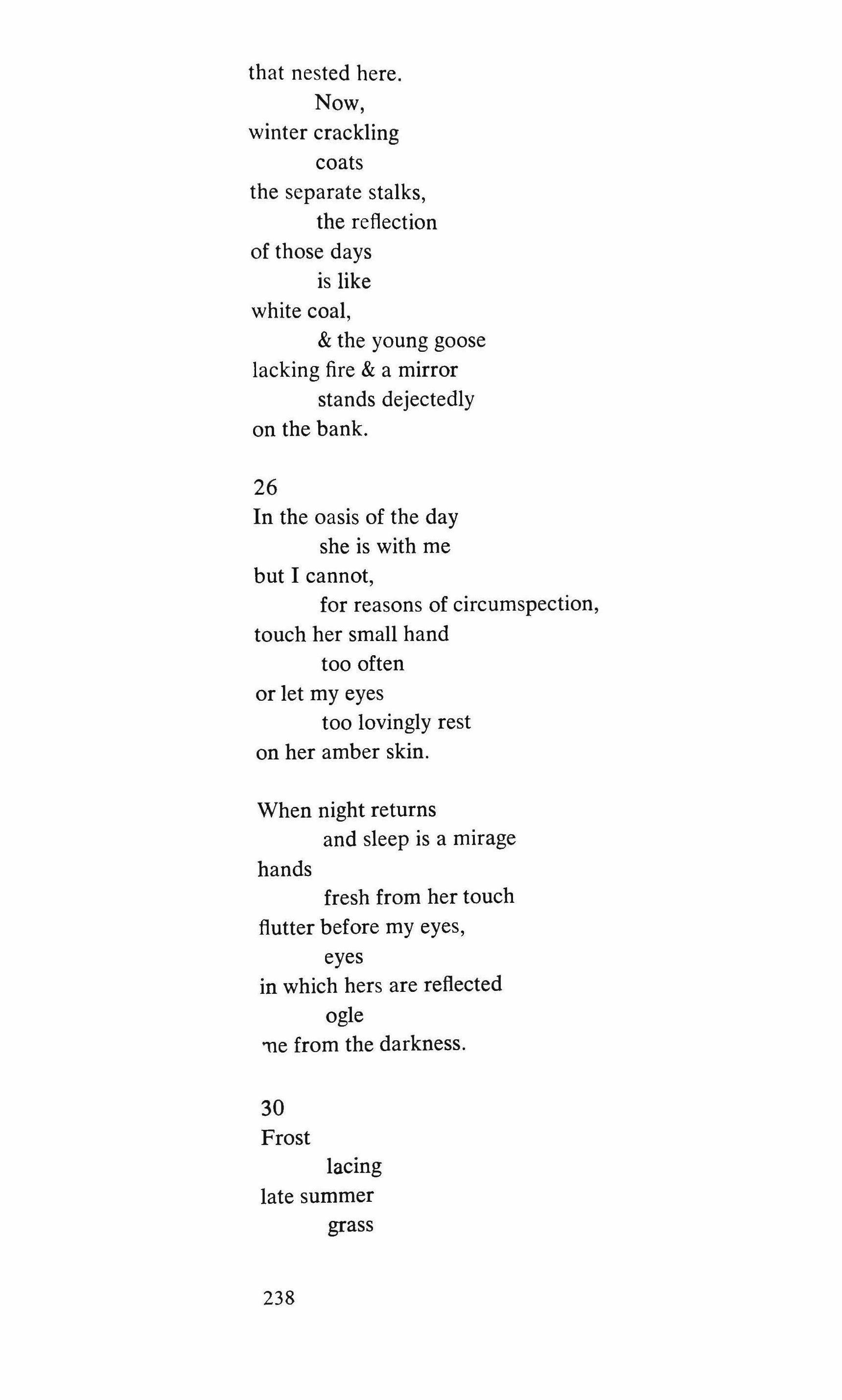
that nested here. Now, winter crackling coats the separate stalks, the reflection of those days is like white coal, & the young goose lacking fire & a mirror stands dejectedly on the bank.
26 In the oasis of the day she is with me but I cannot, for reasons of circumspection, touch her small hand too often or let my eyes too lovingly rest on her amber skin.
When night returns and sleep is a mirage hands fresh from her touch flutter before my eyes, eyes in which hers are reflected ogle 'lIe from the darkness.
30 Frost lacing late summer grass
238

gives warning of autumn winds. The honeyed season is over. The bee takes leave of the flower. I bow myself from your bed.
from The ingathering of love
IIt was in one of those old stone houses in Monmouthshire that we first met.
The flagged kitchen filled by a battered refectory table, a whole family sprawled there, gossiping and you walked in from a side door -in a swathe of sunlight.
Was it farm eggs? or something about cutting a hedge? or one of those dances we all went to?
I recall the impatient sun through the low windows describing your neck and chin; I recall how you walked & stood free with your legs as girls who have no thought of getting married
239
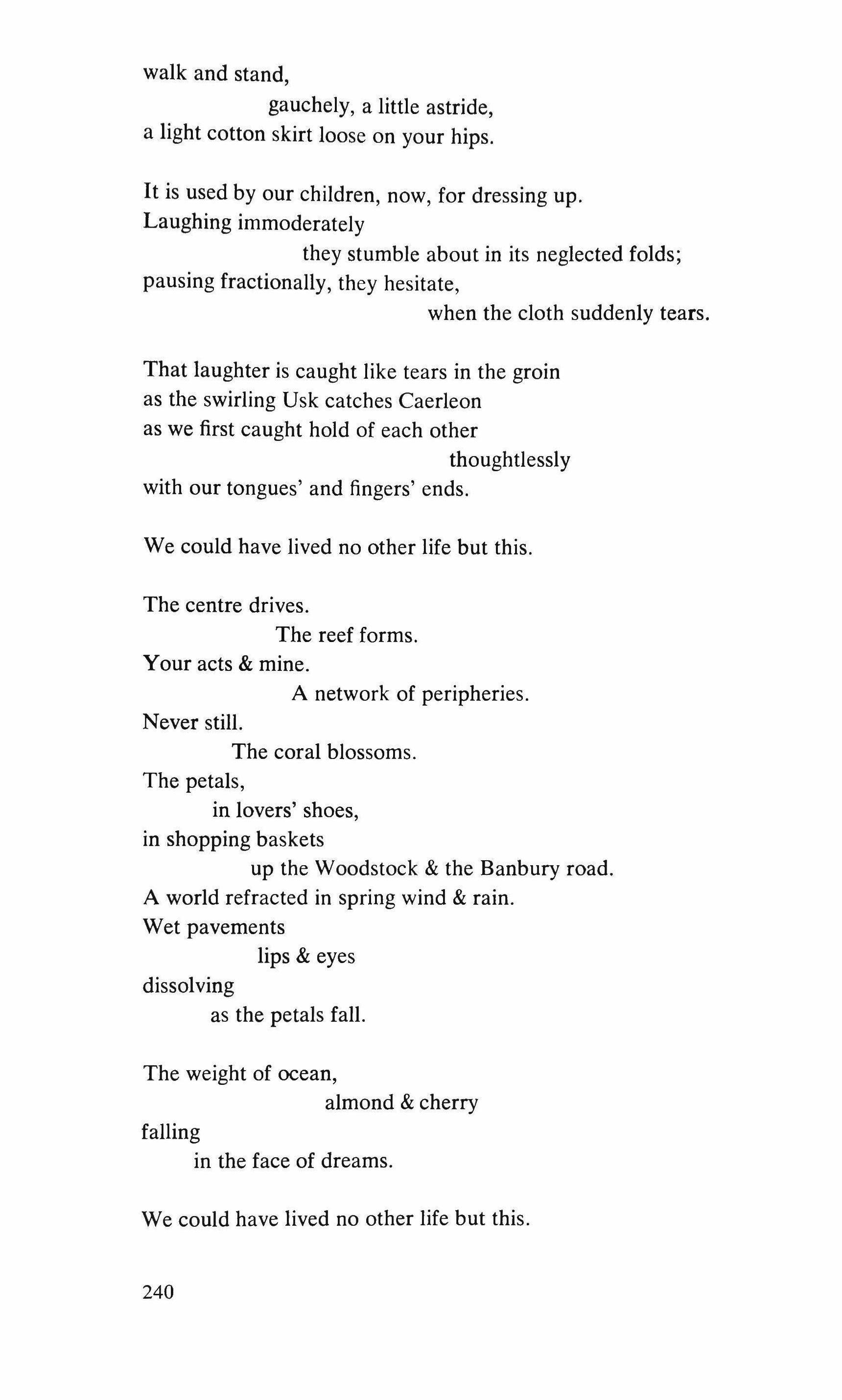
walk and stand, gauchely, a little astride, a light cotton skirt loose on your hips.
It is used by our children, now, for dressing up. Laughing immoderately they stumble about in its neglected folds; pausing fractionally, they hesitate, when the cloth suddenly tears.
That laughter is caught like tears in the groin as the swirling Usk catches Caerleon as we first caught hold of each other
thoughtlessly with our tongues' and fingers' ends.
We could have lived no other life but this.
The centre drives. The reef forms. Your acts & mine.
A network of peripheries. Never still.
The coral blossoms.
The petals, in lovers' shoes, in shopping baskets up the Woodstock & the Banbury road. A world refracted in spring wind & rain. Wet pavements lips & eyes dissolving as the petals fall.
The weight of ocean, almond & cherry falling in the face of dreams.
We could have lived no other life but this.
240
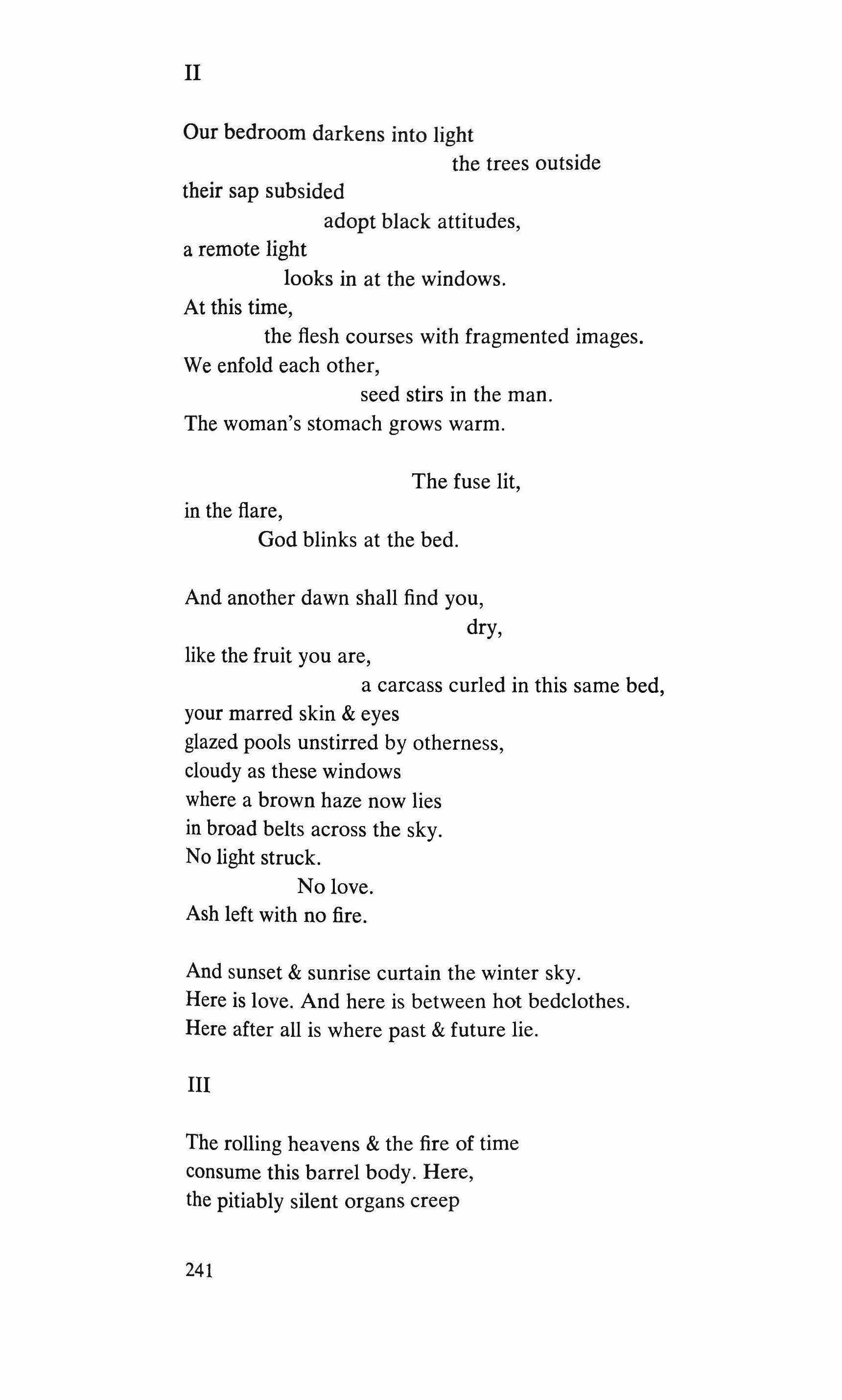
Our bedroom darkens into light the trees outside their sap subsided adopt black attitudes, a remote light looks in at the windows. At this time, the flesh courses with fragmented images. We enfold each other, seed stirs in the man. The woman's stomach grows warm.
The fuse lit, in the flare, God blinks at the bed.
And another dawn shall find you, dry, like the fruit you are, a carcass curled in this same bed, your marred skin & eyes glazed pools unstirred by otherness, cloudy as these windows where a brown haze now lies in broad belts across the sky. No light struck.
No love.
Ash left with no fire.
And sunset & sunrise curtain the winter sky. Here is love. And here is between hot bedclothes. Here after all is where past & future lie.
III
The rolling heavens & the fire of time consume this barrel body. Here, the pitiably silent organs creep
II
241
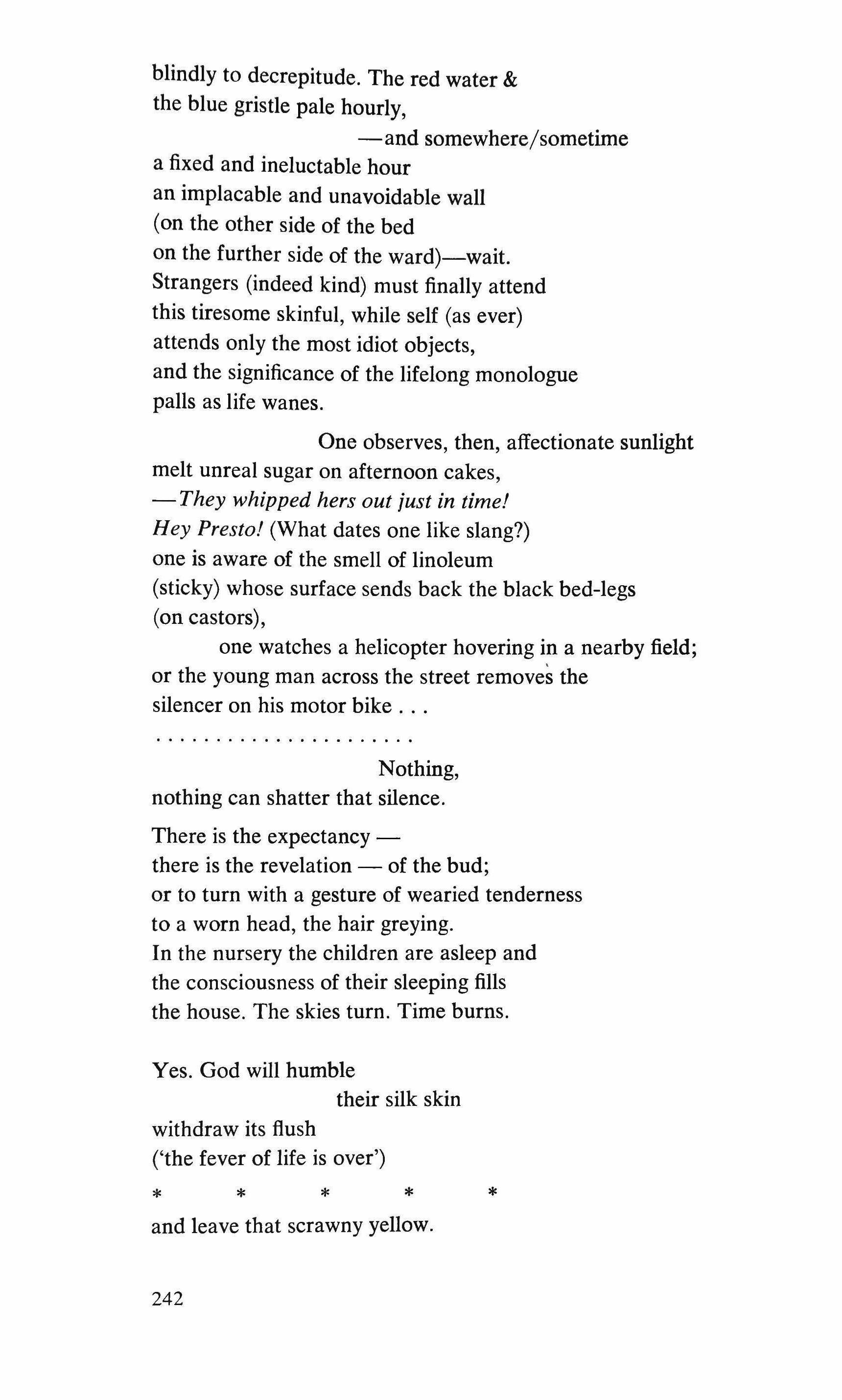
blindly to decrepitude. The red water & the blue gristle pale hourly, -and somewhere/sometime a fixed and ineluctable hour an implacable and unavoidable wall (on the other side of the bed on the further side of the ward)-wait. Strangers (indeed kind) must finally attend this tiresome skinful, while self (as ever) attends only the most idiot objects, and the significance of the lifelong monologue palls as life wanes.
One observes, then, affectionate sunlight melt unreal sugar on afternoon cakes, -They whipped hers out just in time! Hey Presto! (What dates one like slang?) one is aware of the smell of linoleum (sticky) whose surface sends back the black bed-legs (on castors), one watches a helicopter hovering in a nearby field; or the young man across the street removes the silencer on his motor bike
Nothing, nothing can shatter that silence.
There is the expectancythere is the revelation - of the bud; or to turn with a gesture of wearied tenderness to a worn head, the hair greying. In the nursery the children are asleep and the consciousness of their sleeping fills the house. The skies turn. Time burns.
Yes. God will humble their silk skin withdraw its flush ('the fever of life is over')
and leave that scrawny yellow.
* * * * *
242
from Astapovo or what are to do
for John Elton
3
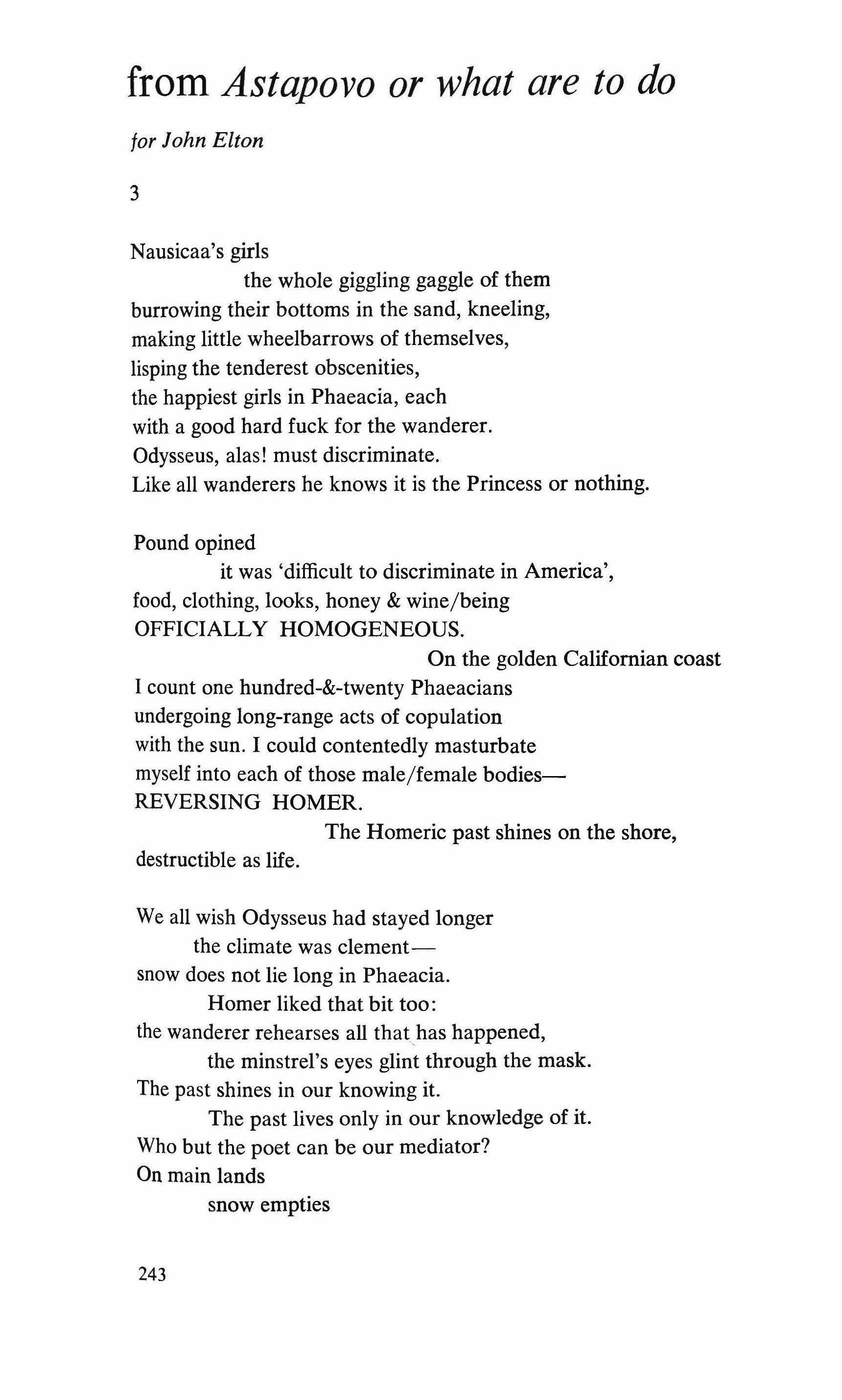
Nausicaa's girls
the whole giggling gaggle of them burrowing their bottoms in the sand, kneeling, making little wheelbarrows of themselves, lisping the tenderest obscenities, the happiest girls in Phaeacia, each with a good hard fuck for the wanderer. Odysseus, alas! must discriminate. Like all wanderers he knows it is the Princess or nothing.
Pound opined it was 'difficult to discriminate in America', food, clothing, looks, honey & wine/being OFFICIALLY HOMOGENEOUS.
On the golden Californian coast I count one hundred-&-twenty Phaeacians undergoing long-range acts of copulation with the sun. I could contentedly masturbate myself into each of those male/female bodiesREVERSING HOMER.
The Homeric past shines on the shore, destructible as life.
We all wish Odysseus had stayed longer the climate was clementsnow does not lie long in Phaeacia.
Homer liked that bit too: the wanderer rehearses all thathas happened, the minstrel's eyes glint through the mask. The past shines in our knowing it.
The past lives only in our knowledge of it. Who but the poet can be our mediator?
On main lands snow empties
243
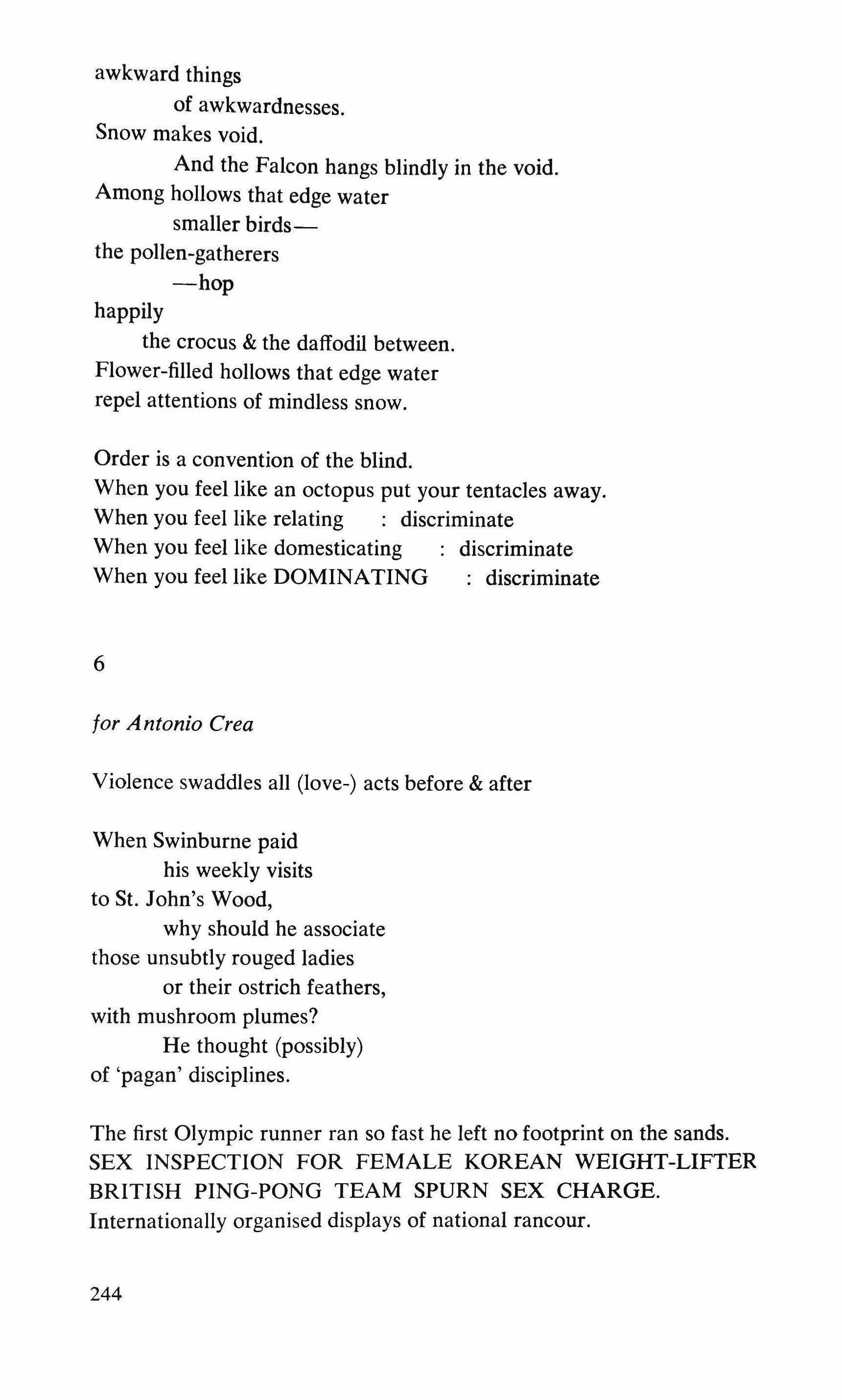
awkward things of awkwardnesses.
Snow makes void.
And the Falcon hangs blindly in the void. Among hollows that edge water smaller birdsthe pollen-gatherers -hop happily the crocus & the daffodil between. Flower-filled hollows that edge water repel attentions of mindless snow.
Order is a convention of the blind. When you feel like an octopus put your tentacles away. When you feel like relating : discriminate When you feel like domesticating discriminate When you feel like DOMINATING : discriminate 6 for Antonio Crea
Violence swaddles all (love-) acts before & after
When Swinburne paid his weekly visits to St. John's Wood, why should he associate those unsubtly rouged ladies or their ostrich feathers, with mushroom plumes? He thought (possibly) of 'pagan' disciplines.
The first Olympic runner ran so fast he left no footprint on the sands. SEX INSPECTION FOR FEMALE KOREAN WEIGHT-LIFTER BRITISH PING-PONG TEAM SPURN SEX CHARGE.
Internationally organised displays of national rancour.
244
Were the Divine Afterbirth to be recovered, cased in glass couched on wax flowers, who knows?
some sort of solution might (were the dream 'true') rise on the meditative eye.
As lust ebbed, he retained the pale halo of red, inconsequential as a meteor's aftermath. One day he was bending over a perambulator on a London pavement when its owner projected herself, screaming, from a public house, blew from the maritally gap-toothed mouth her warning fumes, & admonished the poet thus:
"Taike yer faice aht've me baiby's pram

yew narsty owld man".
A policeman led the fallen angel away.
La nave arrivo nel porto di Ostenda appena giunto in camera sua, Lord Byron si precipito come un [ulmine sulla cameriera.
(FIRST ACT ON LEAVING ENGLAND)
17 for Basil Bunting POETRY TO GO that's what Villon bought at the hot dog stand the sleek hot dogs not so hot blotched thighs round a worn twat
Death. Margot sans linen
245
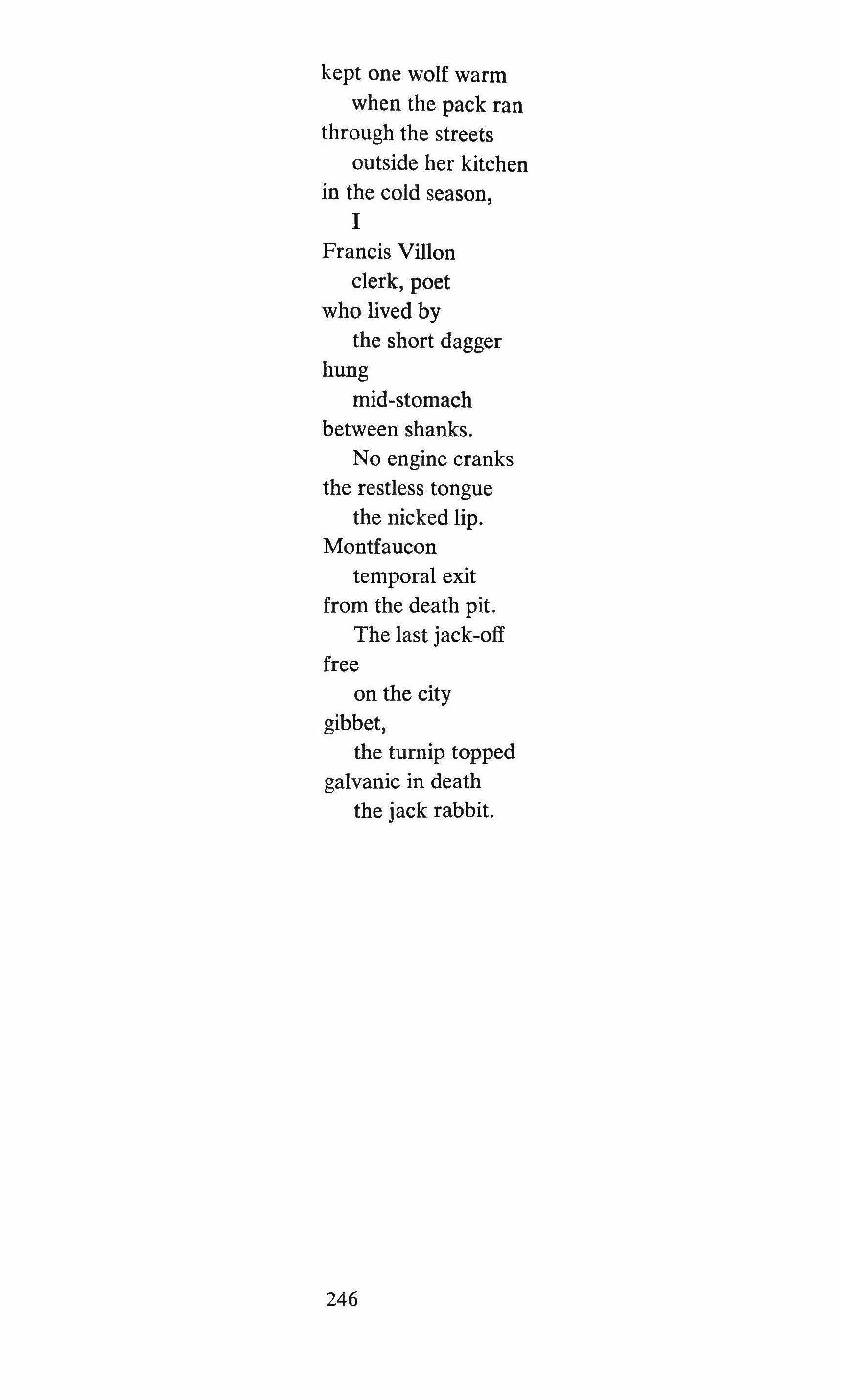
kept one wolf warm when the pack ran through the streets outside her kitchen in the cold season, I Francis Villon clerk, poet who lived by the short dagger hung mid-stomach between shanks. No engine cranks the restless tongue the nicked lip. Montfaucon temporal exit from the death pit. The last jack-off free on the city gibbet, the turnip topped galvanic in death the jack rabbit.
246
LEE HARWOOD
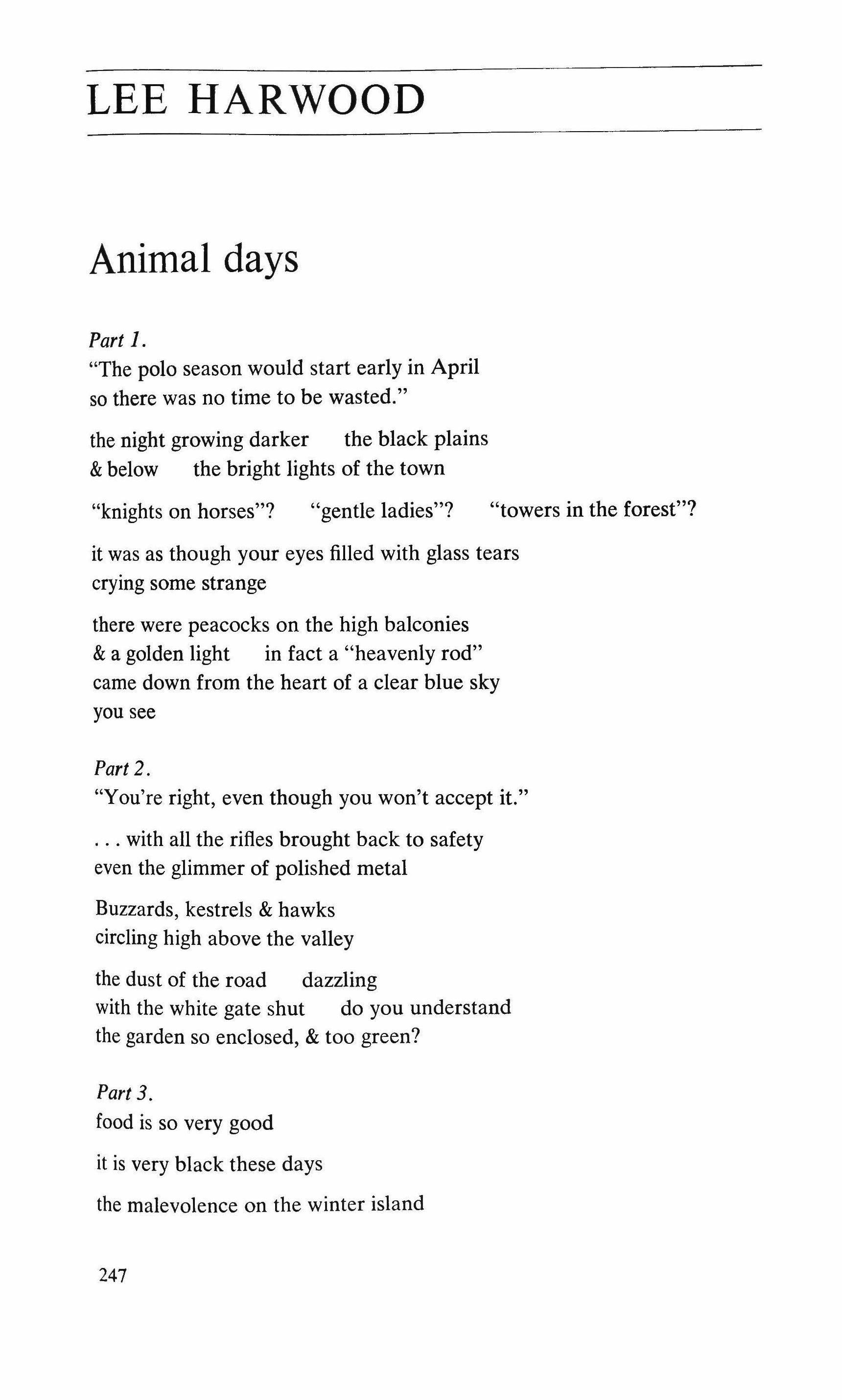
Animal days
Part 1.
"The polo season would start early in April so there was no time to be wasted." the night growing darker the black plains & below the bright lights of the town "knights on horses"? "gentle ladies"? "towers in the forest"? it was as though your eyes filled with glass tears crying some strange there were peacocks on the high balconies & a golden light in fact a "heavenly rod" came down from the heart of a clear blue sky you see
Part 2.
"You're right, even though you won't accept it." with all the rifles brought back to safety even the glimmer of polished metal Buzzards, kestrels & hawks circling high above the valley the dust of the road dazzling with the white gate shut do you understand the garden so enclosed, & too green?
Part 3. food is so very good it is very black these days the malevolence on the winter island
247
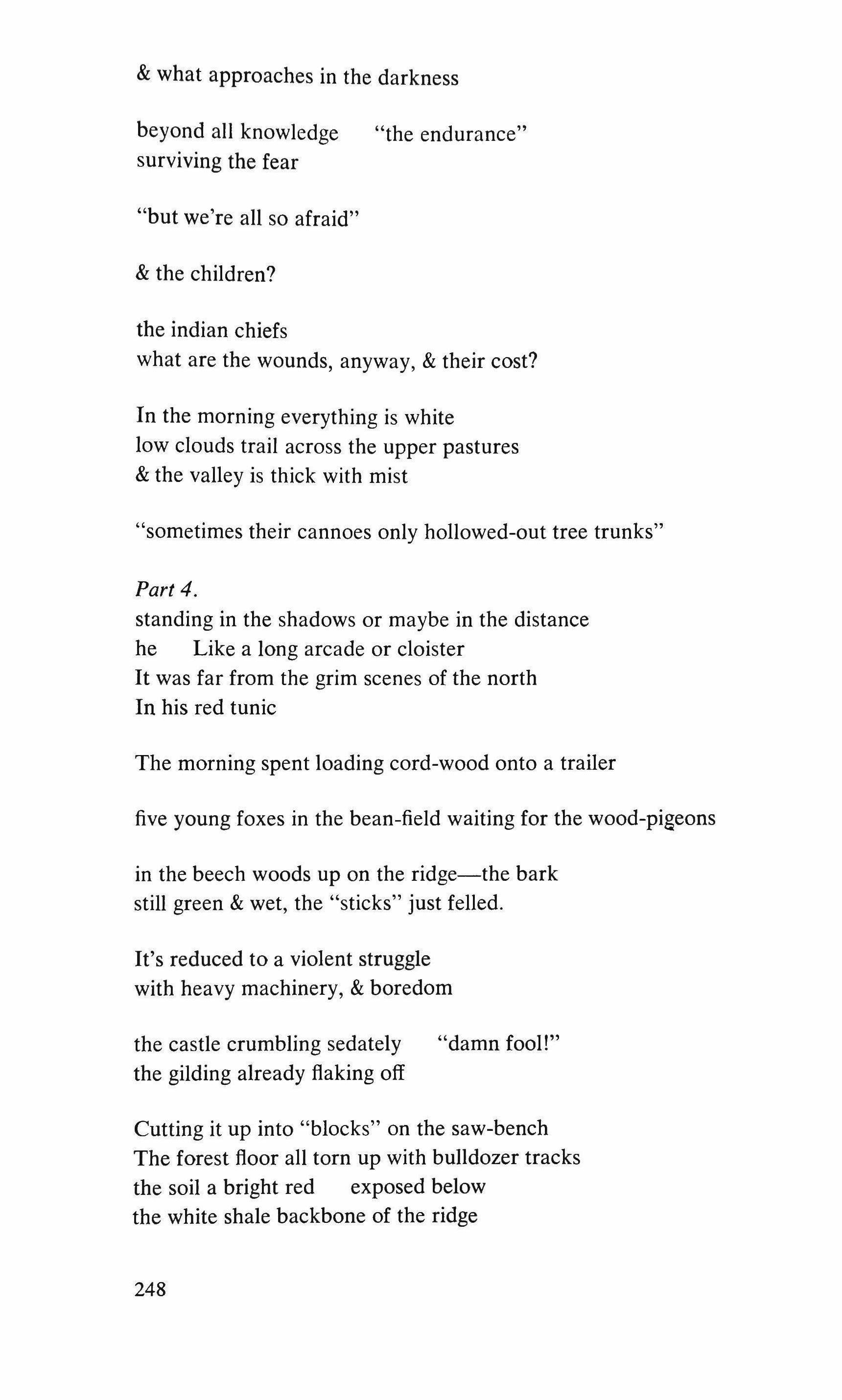
& what approaches in the darkness
beyond all knowledge surviving the fear "the endurance"
"but we're all so afraid" & the children?
the indian chiefs what are the wounds, anyway, & their cost?
In the morning everything is white low clouds trail across the upper pastures & the valley is thick with mist
"sometimes their cannoes only hollowed-out tree trunks"
Part 4.
standing in the shadows or maybe in the distance he Like a long arcade or cloister
It was far from the grim scenes of the north In his red tunic
The morning spent loading cord-wood onto a trailer
five young foxes in the bean-field waiting for the wood-pigeons
in the beech woods up on the ridge-the bark still green & wet, the "sticks" just felled.
It's reduced to a violent struggle with heavy machinery, & boredom
the castle crumbling sedately "damn fool!" the gilding already flaking off
Cutting it up into "blocks" on the saw-bench
The forest floor all torn up with bulldozer tracks the soil a bright red exposed below the white shale backbone of the ridge 248
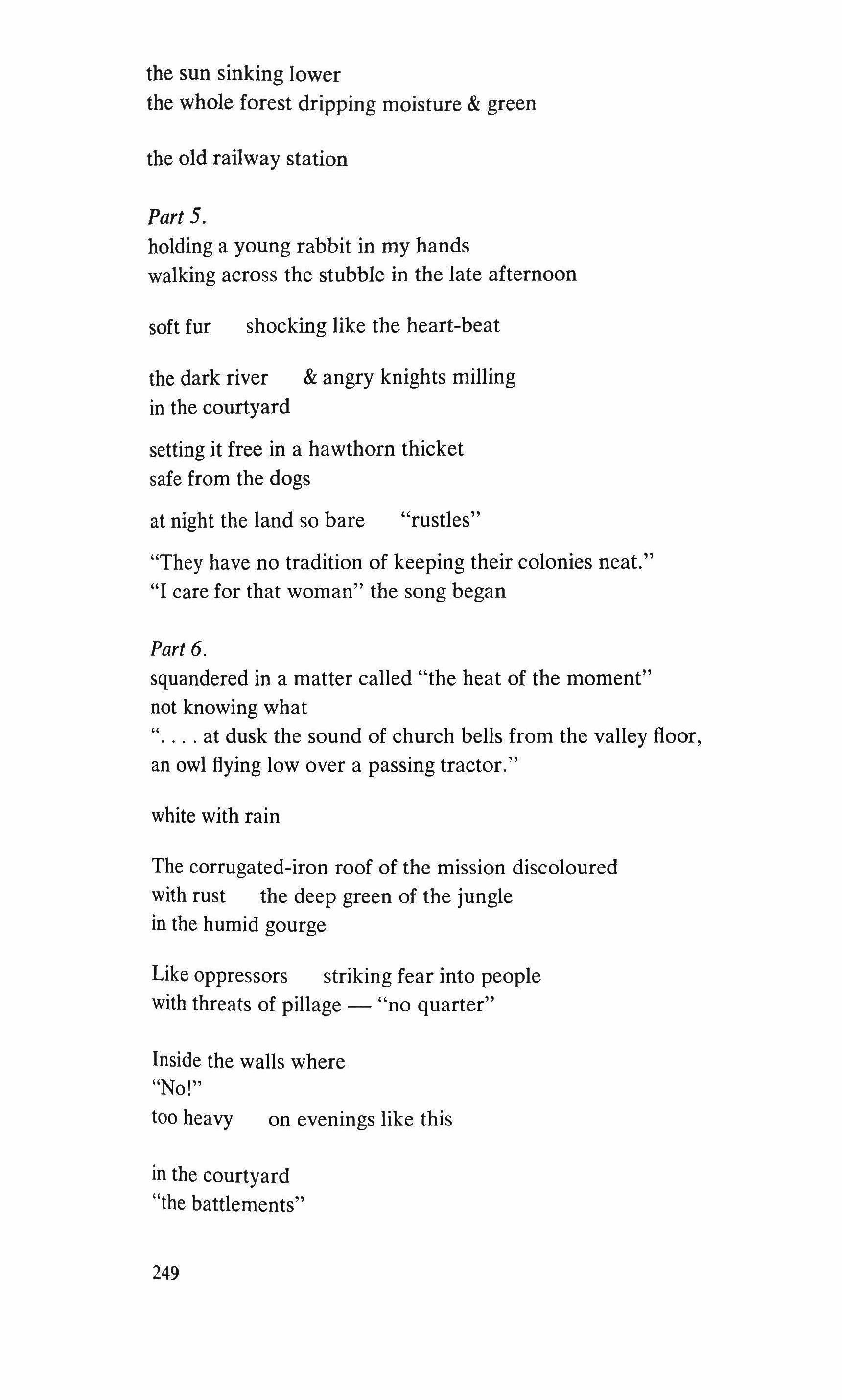
the sun sinking lower the whole forest dripping moisture & green
the old railway station
Part 5.
holding a young rabbit in my hands walking across the stubble in the late afternoon
soft fur shocking like the heart-beat
the dark river & angry knights milling in the courtyard
setting it free in a hawthorn thicket safe from the dogs at night the land so bare "rustles"
"They have no tradition of keeping their colonies neat." "I care for that woman" the song began
Part 6.
squandered in a matter called "the heat of the moment" not knowing what at dusk the sound of church bells from the valley floor, an owl flying low over a passing tractor."
white with rain
The corrugated-iron roof of the mission discoloured with rust the deep green of the jungle in the humid gourge
Like oppressors striking fear into people with threats of pillage - "no quarter"
Inside the walls where "No!" too heavy on evenings like this in the courtyard "the battlements"
249
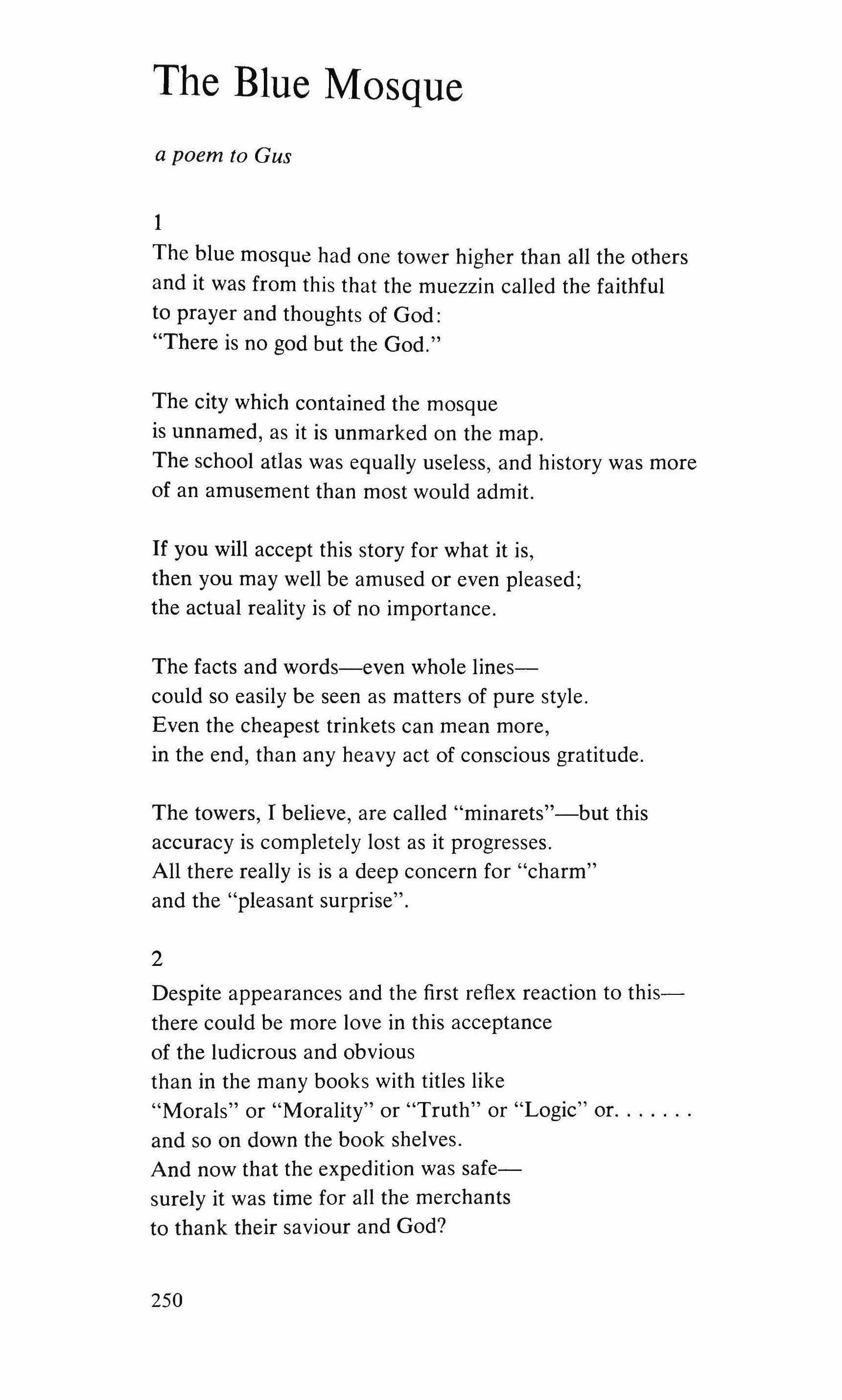
The Blue Mosque
a poem to Gus
1
The blue mosque had one tower higher than all the others and it was from this that the muezzin called the faithful to prayer and thoughts of God: "There is no god but the God."
The city which contained the mosque is unnamed, as it is unmarked on the map. The school atlas was equally useless, and history was more of an amusement than most would admit.
If you will accept this story for what it is, then you may well be amused or even pleased; the actual reality is of no importance.
The facts and words-even whole linescould so easily be seen as matters of pure style. Even the cheapest trinkets can mean more, in the end, than any heavy act of conscious gratitude.
The towers, r believe, are called "minarets"-but this accuracy is completely lost as it progresses. All there really is is a deep concern for "charm" and the "pleasant surprise".
2
Despite appearances and the first reflex reaction to thisthere could be more love in this acceptance of the ludicrous and obvious than in the many books with titles like "Morals" or "Morality" or "Truth" or "Logic" or and so on down the book shelves. And now that the expedition was safesurely it was time for all the merchants to thank their saviour and God?
250
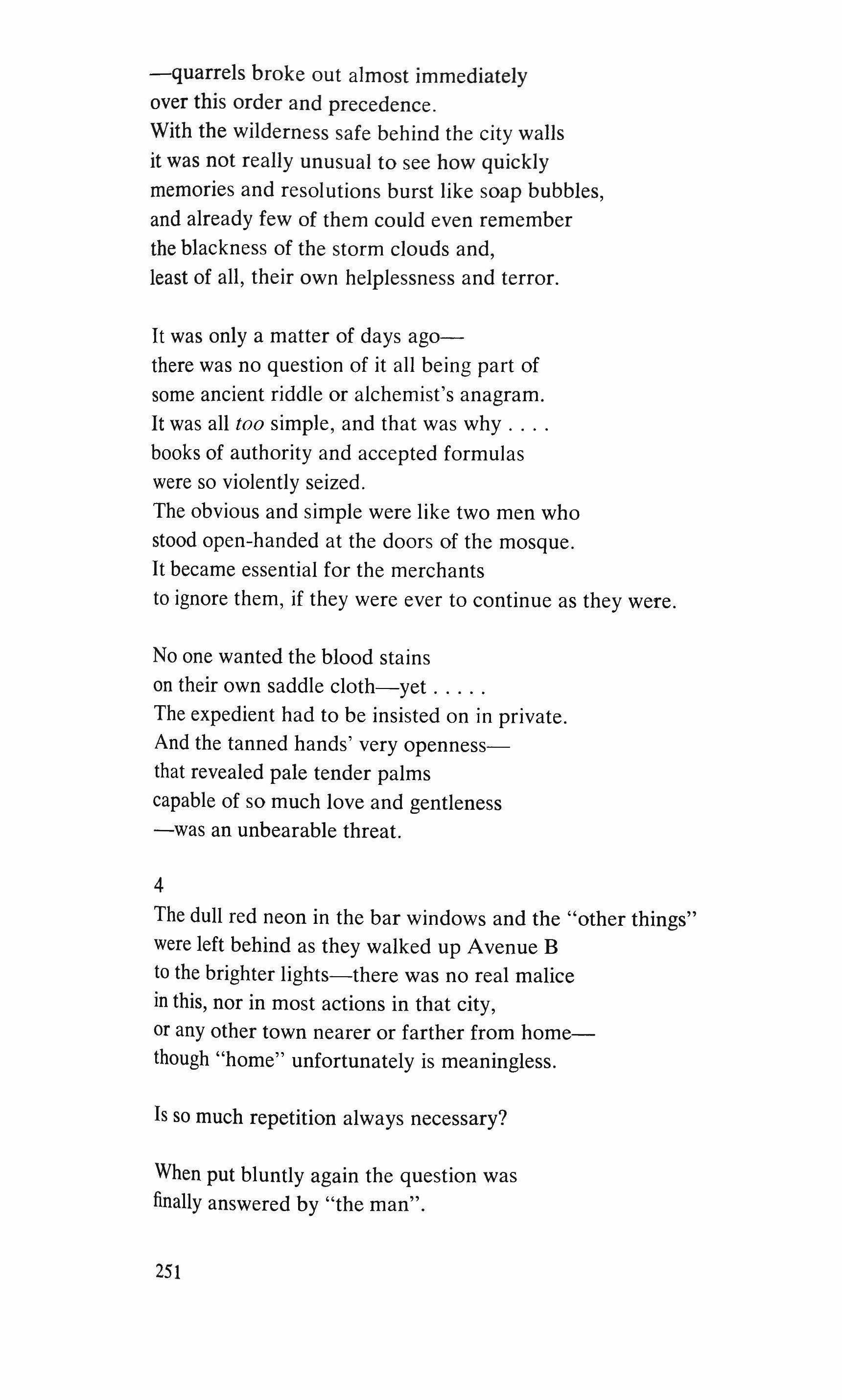
-quarrels broke out almost immediately over this order and precedence. With the wilderness safe behind the city walls it was not really unusual to see how quickly memories and resolutions burst like soap bubbles, and already few of them could even remember the blackness of the storm clouds and, least of all, their own helplessness and terror.
It was only a matter of days agothere was no question of it all being part of some ancient riddle or alchemist's anagram. It was all too simple, and that was why books of authority and accepted formulas were so violently seized.
The obvious and simple were like two men who stood open-handed at the doors of the mosque. It became essential for the merchants to ignore them, if they were ever to continue as they were.
No one wanted the blood stains on their own saddle cloth-yet The expedient had to be insisted on in private. And the tanned hands' very opennessthat revealed pale tender palms capable of so much love and gentleness -was an unbearable threat.
4
The dull red neon in the bar windows and the "other things" were left behind as they walked up Avenue B to the brighter lights-there was no real malice in this, nor in most actions in that city, or any other town nearer or farther from homethough "home" unfortunately is meaningless.
Is so much repetition always necessary?
When put bluntly again the question was finally answered by "the man".
251
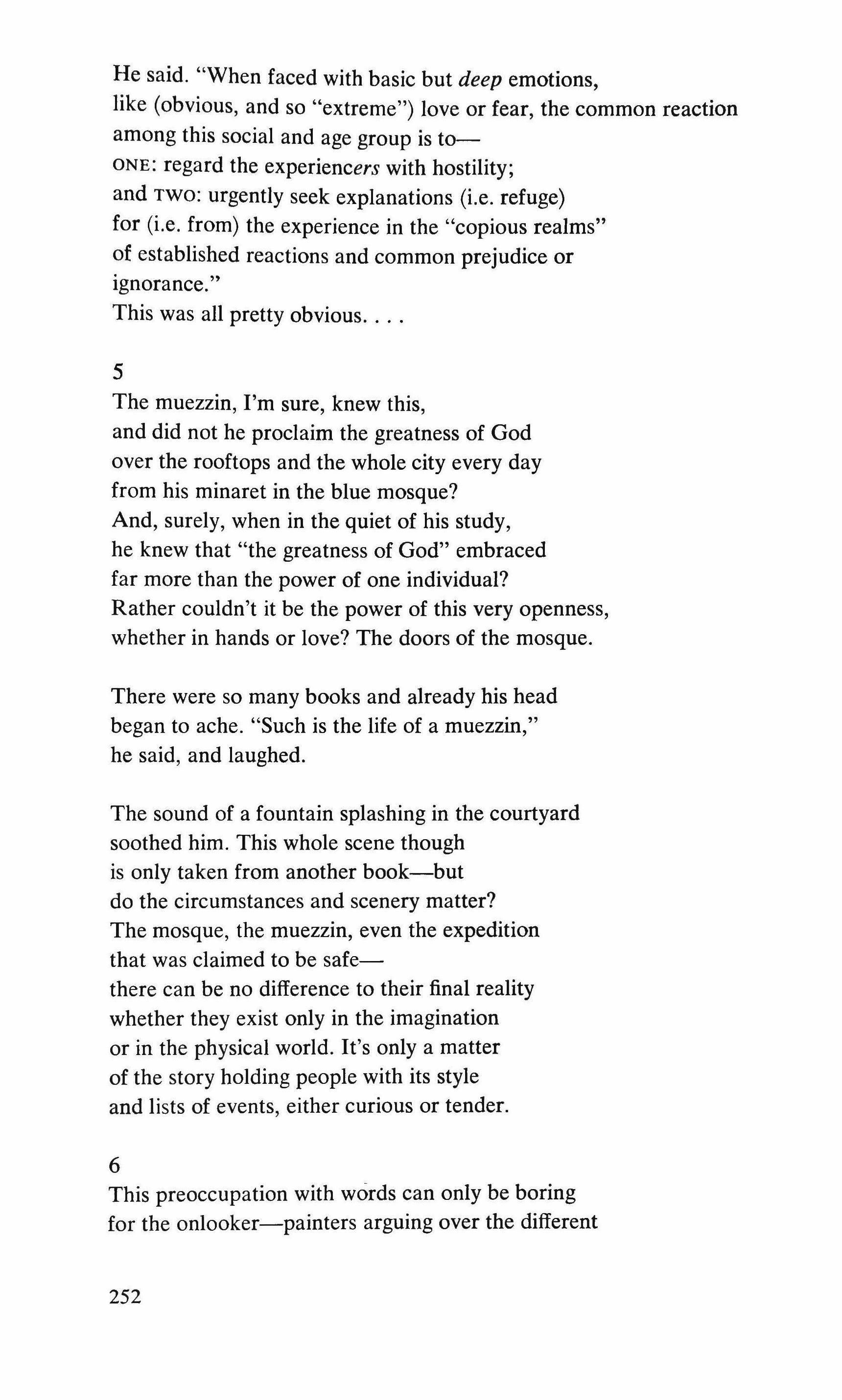
He said. "When faced with basic but deep emotions, like (obvious, and so "extreme") love or fear, the common reaction among this social and age group is toONE: regard the experiencers with hostility; and TWO: urgently seek explanations (i.e. refuge) for (i.e. from) the experience in the "copious realms" of established reactions and common prejudice or ignorance.
This was all pretty obvious
5
The muezzin, I'm sure, knew this, and did not he proclaim the greatness of God over the rooftops and the whole city every day from his minaret in the blue mosque?
And, surely, when in the quiet of his study, he knew that "the greatness of God" embraced far more than the power of one individual? Rather couldn't it be the power of this very openness, whether in hands or love? The doors of the mosque.
There were so many books and already his head began to ache. "Such is the life of a muezzin," he said, and laughed.
The sound of a fountain splashing in the courtyard soothed him. This whole scene though is only taken from another book-but do the circumstances and scenery matter?
The mosque, the muezzin, even the expedition that was claimed to be safethere can be no difference to their final reality whether they exist only in the imagination or in the physical world. It's only a matter of the story holding people with its style and lists of events, either curious or tender.
6
This preoccupation with words can only be boring for the onlooker-painters arguing over the different
252

brands of paint-useless parallels. What have any of these words to do with praising a good man or a love? No matter how exotic the decorations and materials-the words always fail. It's all been said before-and this very questioning now heard only too often. Even the cliches seem to contain less conceit than the poem, and now the poem about the poem, and the poem about the poem about the and so on and on deeper into the cheap gaming house.
What has this to do or say with any weight of the two men with open hands at the mosque who will be murdered by the merchants' assassins? or the good man that still knows how to love? or the loved one whose kiss alone is beyond words?
The whole poem book must be left behind (while I go to help the two men and thank the good man), and then let it be forgotten now we've become men and women. And surely it's obvious to the simplest of men, as it is for the muezzin to cry "There is no god but the God,", that I should now leave writing this poem when it is so late at night, and go lie with my love. It is late, but such blindness could not go on forever, thank God.
Plato was right though for Ed Darn 1
The empty house-the empty country-the empty sky. Reverse it to A-B-C.
A: The large house
253
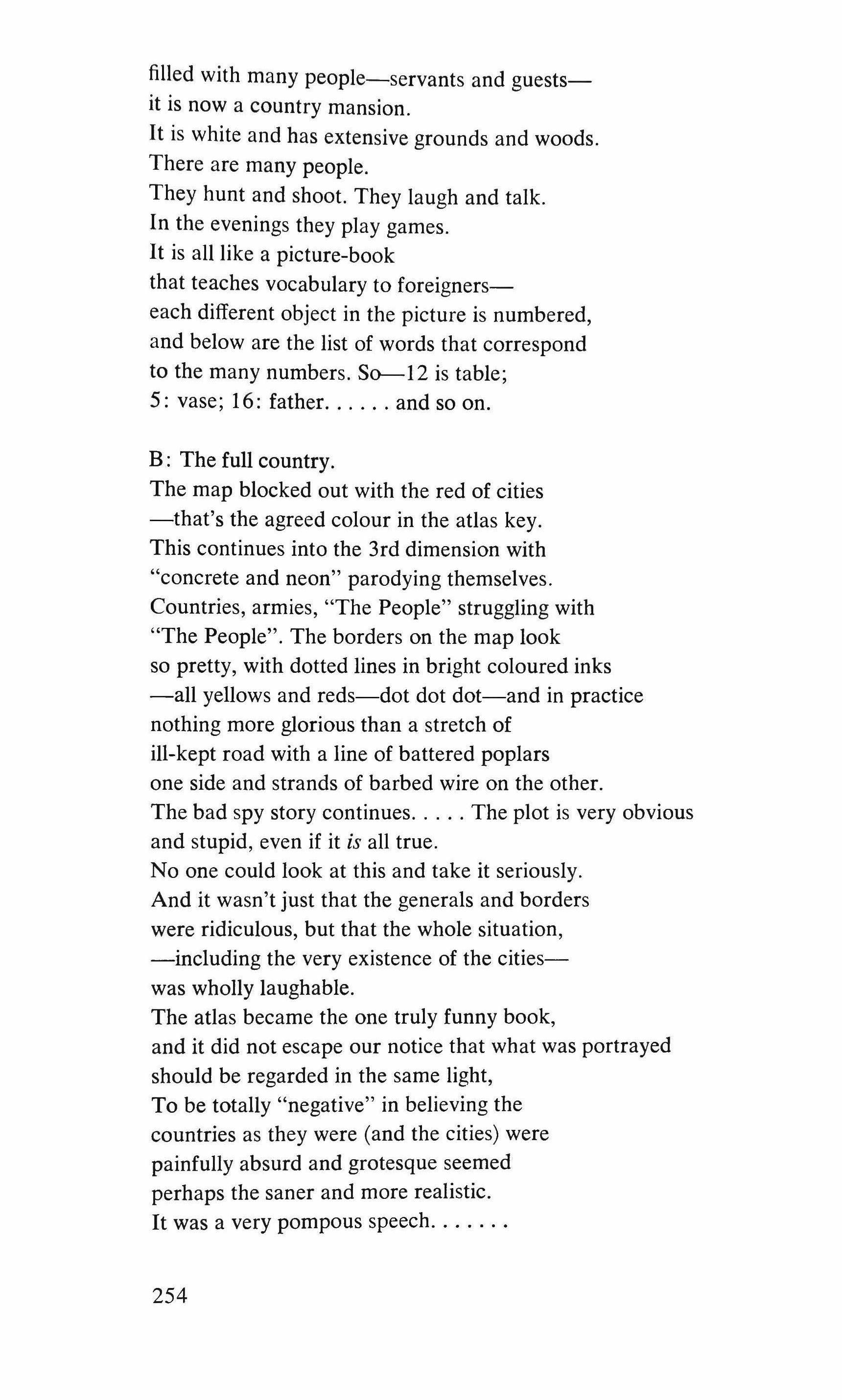
filled with many people-servants and guestsit is now a country mansion. It is white and has extensive grounds and woods. There are many people. They hunt and shoot. They laugh and talk. In the evenings they play games. It is all like a picture-book that teaches vocabulary to foreignerseach different object in the picture is numbered, and below are the list of words that correspond to the many numbers. So--12 is table; 5: vase; 16: father. and so on.
B: The full country.
The map blocked out with the red of cities -that's the agreed colour in the atlas key. This continues into the 3rd dimension with "concrete and neon" parodying themselves.
Countries, armies, "The People" struggling with "The People". The borders on the map look so pretty, with dotted lines in bright coloured inks -all yellows and reds-dot dot dot-and in practice nothing more glorious than a stretch of ill-kept road with a line of battered poplars one side and strands of barbed wire on the other. The bad spy story continues The plot is very obvious and stupid, even if it is all true.
No one could look at this and take it seriously. And it wasn't just that the generals and borders were ridiculous, but that the whole situation, -including the very existence of the citieswas wholly laughable.
The atlas became the one truly funny book, and it did not escape our notice that what was portrayed should be regarded in the same light,
To be totally "negative" in believing the countries as they were (and the cities) were painfully absurd and grotesque seemed perhaps the saner and more realistic. It was a very pompous speech
254
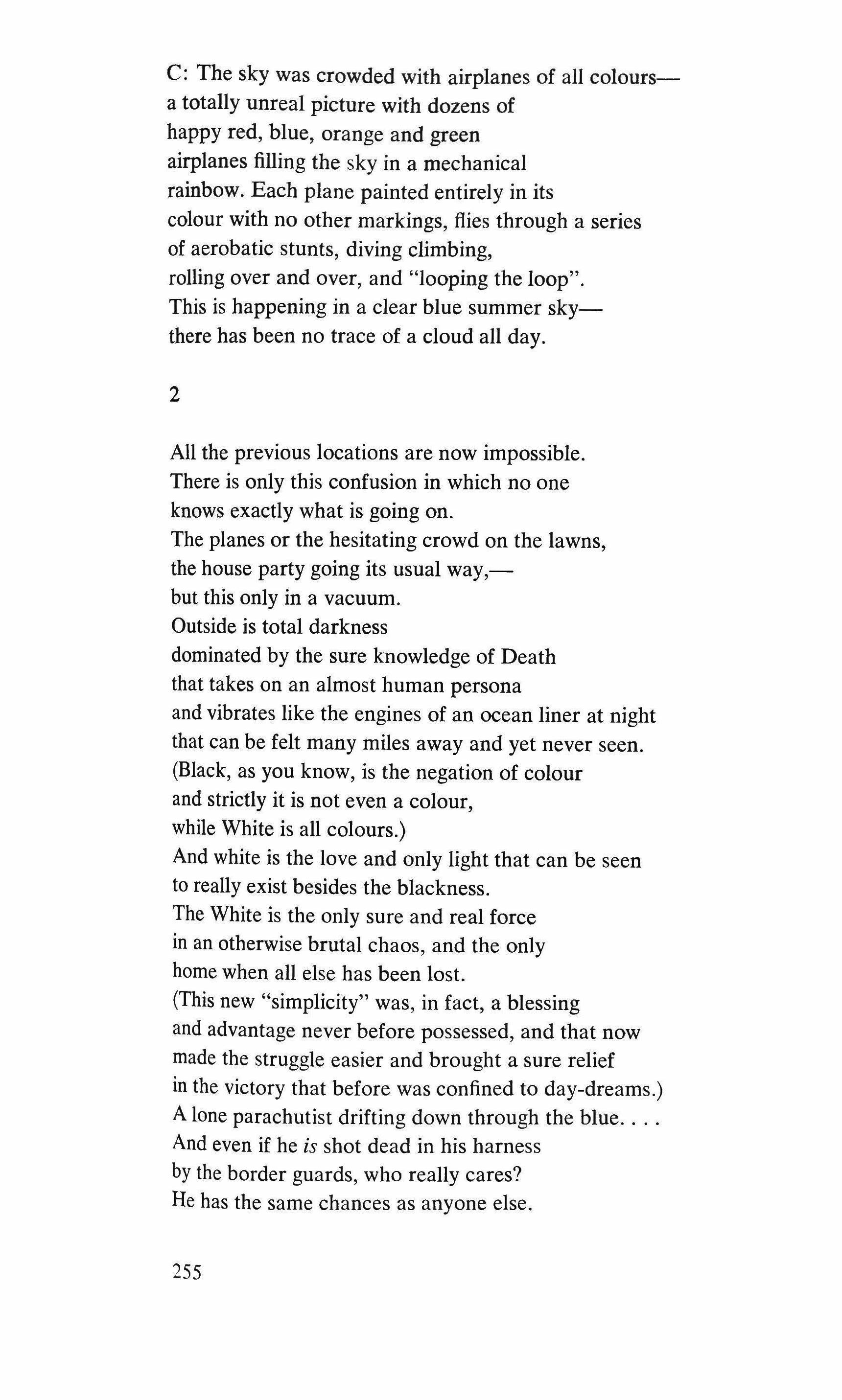
C: The sky was crowded with airplanes of all coloursa totally unreal picture with dozens of happy red, blue, orange and green airplanes filling the sky in a mechanical rainbow. Each plane painted entirely in its colour with no other markings, flies through a series of aerobatic stunts, diving climbing, rolling over and over, and "looping the loop". This is happening in a clear blue summer skythere has been no trace of a cloud all day.
2
All the previous locations are now impossible. There is only this confusion in which no one knows exactly what is going on.
The planes or the hesitating crowd on the lawns, the house party going its usual way,but this only in a vacuum.
Outside is total darkness dominated by the sure knowledge of Death that takes on an almost human persona and vibrates like the engines of an ocean liner at night that can be felt many miles away and yet never seen.
(Black, as you know, is the negation of colour and strictly it is not even a colour, while White is all colours.)
And white is the love and only light that can be seen to really exist besides the blackness. The White is the only sure and real force in an otherwise brutal chaos, and the only home when all else has been lost.
(This new "simplicity" was, in fact, a blessing and advantage never before possessed, and that now made the struggle easier and brought a sure relief in the victory that before was confined to day-dreams.)
A lone parachutist drifting down through the blue And even if he is shot dead in his harness by the border guards, who really cares? He has the same chances as anyone else.
255
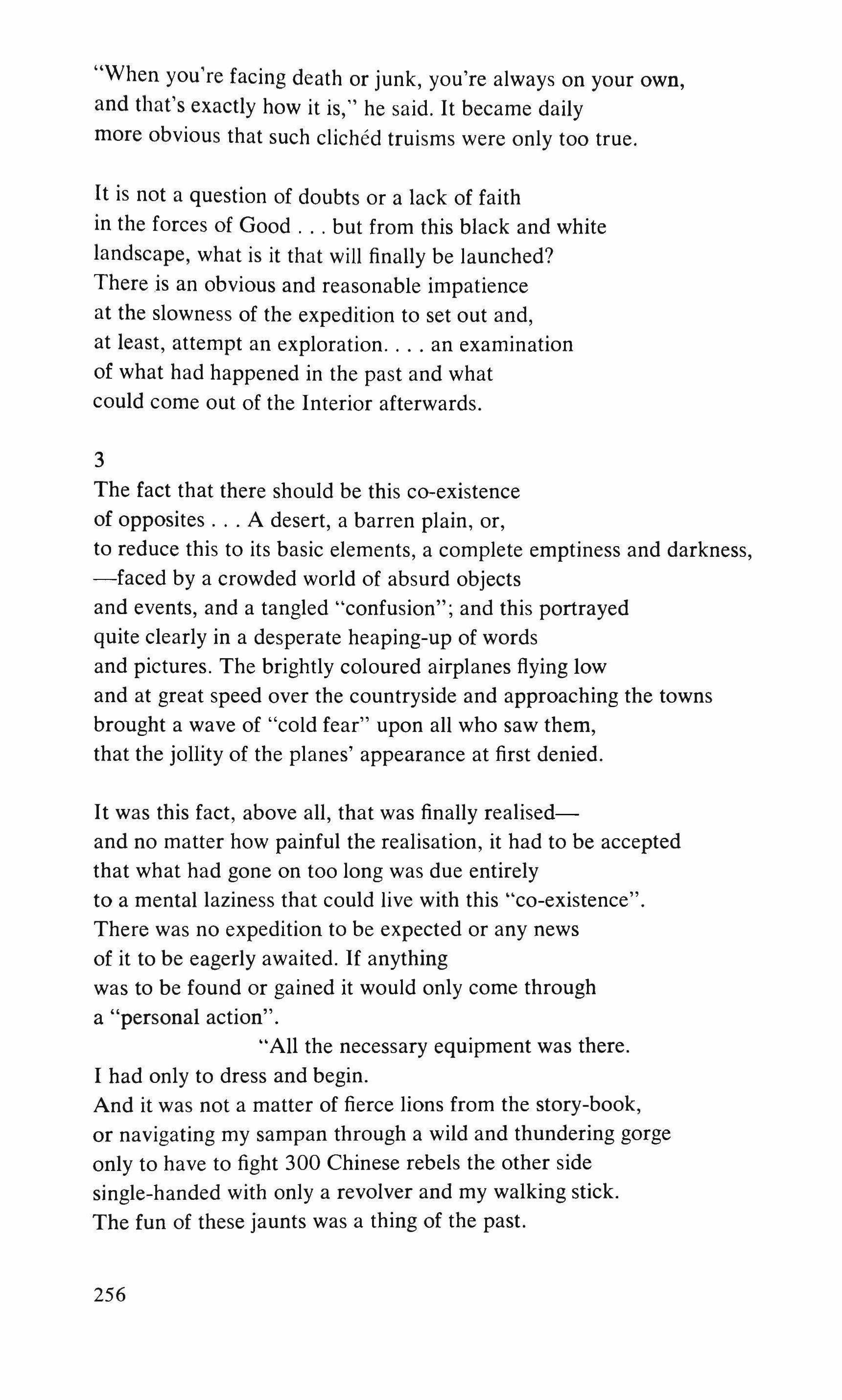
"When you're facing death or junk, you're always on your own, and that's exactly how it is," he said. It became daily more obvious that such cliched truisms were only too true.
It is not a question of doubts or a lack of faith in the forces of Good but from this black and white landscape, what is it that will finally be launched? There is an obvious and reasonable impatience at the slowness of the expedition to set out and, at least, attempt an exploration an examination of what had happened in the past and what could come out of the Interior afterwards.
3
The fact that there should be this co-existence of opposites A desert, a barren plain, or, to reduce this to its basic elements, a complete emptiness and darkness, -faced by a crowded world of absurd objects and events, and a tangled "confusion"; and this portrayed quite clearly in a desperate heaping-up of words and pictures. The brightly coloured airplanes flying low and at great speed over the countryside and approaching the towns brought a wave of "cold fear" upon all who saw them, that the jollity of the planes' appearance at first denied.
It was this fact, above all, that was finally realisedand no matter how painful the realisation, it had to be accepted that what had gone on too long was due entirely to a mental laziness that could live with this "co-existence". There was no expedition to be expected or any news of it to be eagerly awaited. If anything was to be found or gained it would only come through a "personal action".
"All the necessary equipment was there. I had only to dress and begin. And it was not a matter of fierce lions from the story-book, or navigating my sampan through a wild and thundering gorge only to have to fight 300 Chinese rebels the other side single-handed with only a revolver and my walking stick. The fun of these jaunts was a thing of the past.
256
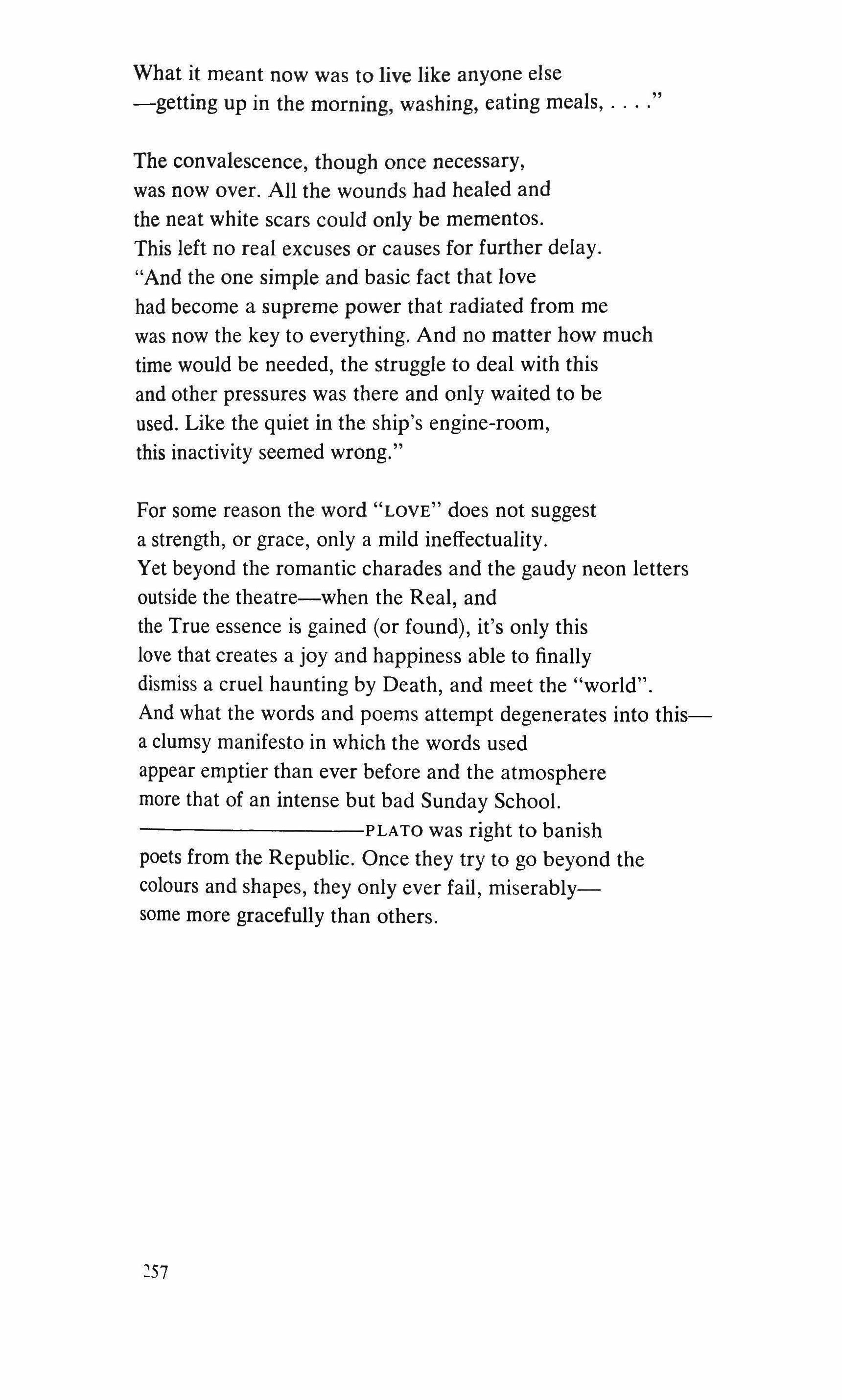
What it meant now was to live like anyone else -getting up in the morning, washing, eating meals,
The convalescence, though once necessary, was now over. All the wounds had healed and the neat white scars could only be mementos. This left no real excuses or causes for further delay. "And the one simple and basic fact that love had become a supreme power that radiated from me was now the key to everything. And no matter how much time would be needed, the struggle to deal with this and other pressures was there and only waited to be used. Like the quiet in the ship's engine-room, this inactivity seemed wrong."
For some reason the word "LOVE" does not suggest a strength, or grace, only a mild ineffectuality. Yet beyond the romantic charades and the gaudy neon letters outside the theatre-when the Real, and the True essence is gained (or found), it's only this love that creates a joy and happiness able to finally dismiss a cruel haunting by Death, and meet the "world". And what the words and poems attempt degenerates into thisa clumsy manifesto in which the words used appear emptier than ever before and the atmosphere more that of an intense but bad Sunday School.
----------PLATO was right to banish poets from the Republic. Once they try to go beyond the colours and shapes, they only ever fail, miserablysome more gracefully than others.
257
JOHN DANIEL

My wife who is American
My wife, who is American, will, when she is over-charged for ice-cream, speculate on the Inferiority of English ices, the Mendacity of shop-assistants (whom she calls clerks) the Hypocrisy of our traditional decorum, the Squalor of tea-shops, the Apathy that we call Restraint, the Clogged and Bestial European Soul lying like a Spent Dog on the shores of the Great Seas that divide us.
And I, seeing this mountainous wave on which the ice-cream and she come riding like a tiny surf-board down to the creaming brink, nod my head and say yes.
Watch
Formerly the individual work of a Nuremberg artificer THE WATCH has been transformed into the social product of an immense number of detail labourers, such as mainspring makers dial makers spiral spring makers
258
jewelled hole makers
ruby lever makers
hand makers
case makers
screw makers
gilders
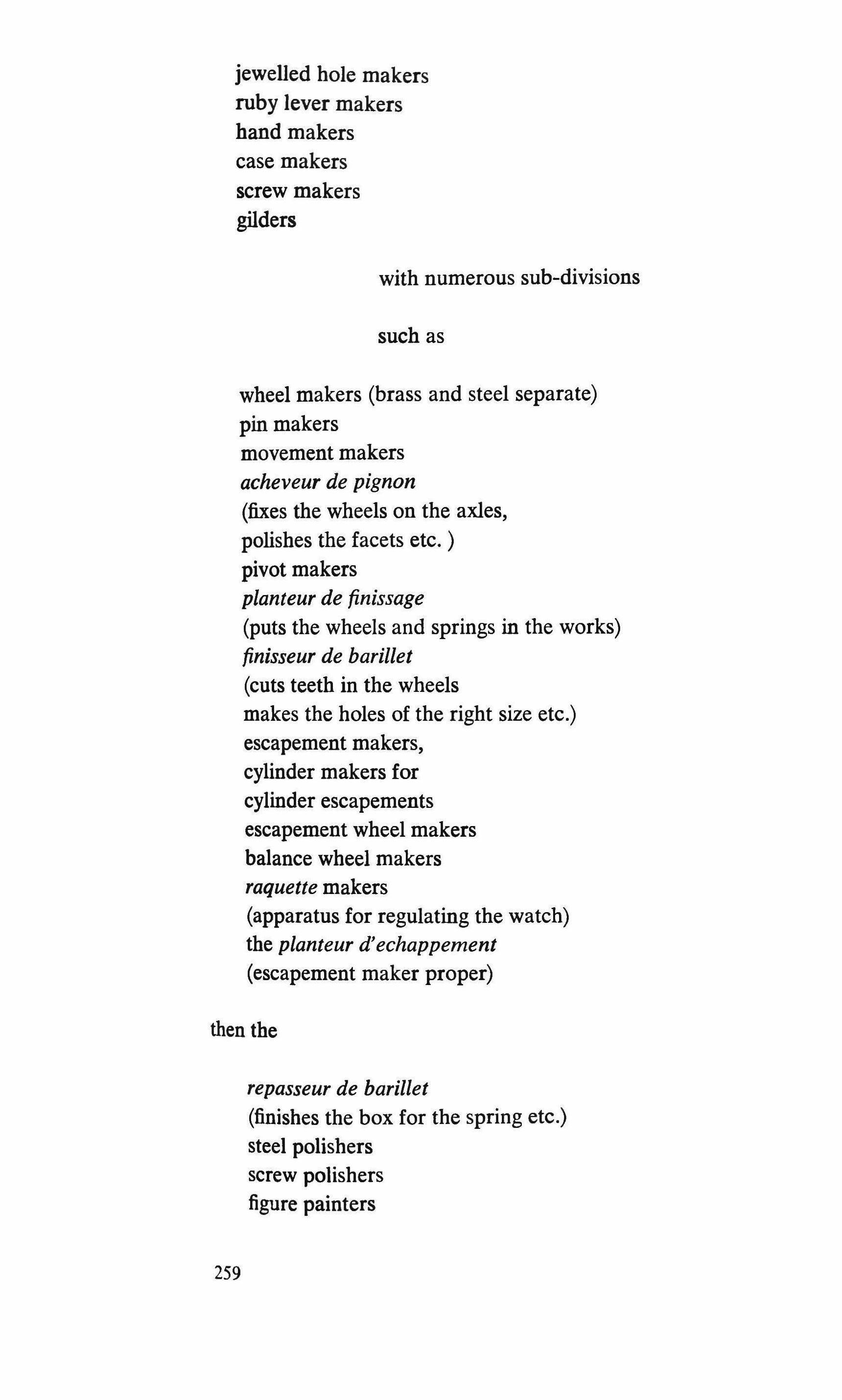
with numerous sub-divisions
such as
wheel makers (brass and steel separate)
pin makers
movement makers
acheveur de pignon (fixes the wheels on the axles, polishes the facets etc. )
pivot makers
planteur de finissage
(puts the wheels and springs in the works)
finisseur de barillet (cuts teeth in the wheels makes the holes of the right size etc.)
escapement makers, cylinder makers for cylinder escapements
escapement wheel makers
balance wheel makers
raquette makers
(apparatus for regulating the watch) the planteur d'echappement (escapement maker proper)
then the repasseur de barillet (finishes the box for the spring etc.)
steel polishers
screw polishers
figure painters
259
dial enamellers
(melt the enamel on the copper) [abricant de pendants (makes the ring by which the case is hung) finisseur de charniere (puts the brass hinge in the cover etc.) [aiseur de secret puts in the springs that open the case) graveur ciseleur polisseur de boite etc. etc. and last of all the repasseur who fits together the whole watch and hands it over in a going state.
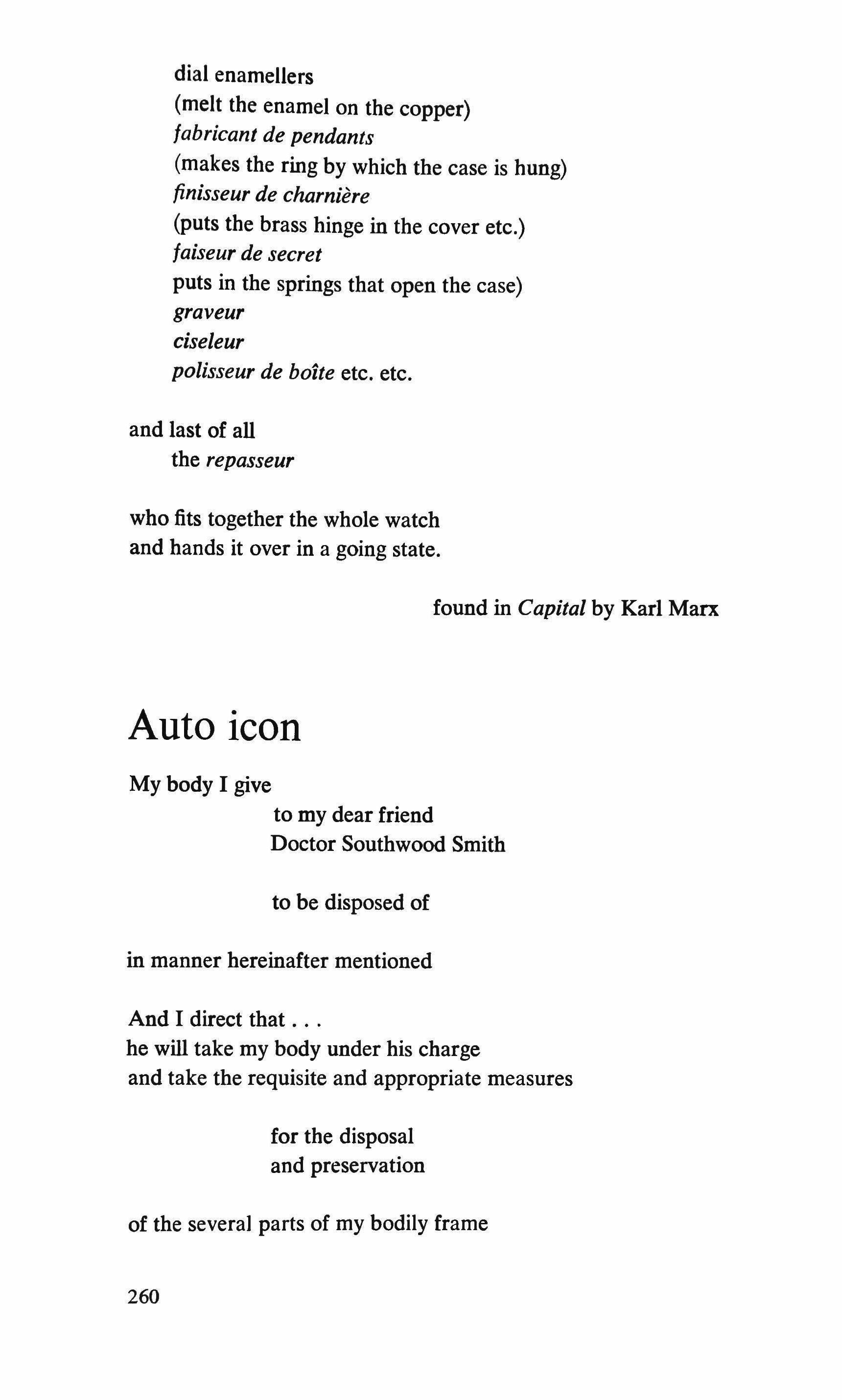
Auto icon
My body I give to my dear friend Doctor Southwood Smith to be disposed of in manner hereinafter mentioned
And I direct that he will take my body under his charge and take the requisite and appropriate measures for the disposal and preservation of the several parts of my bodily frame
found in Capital by Karl Marx
260
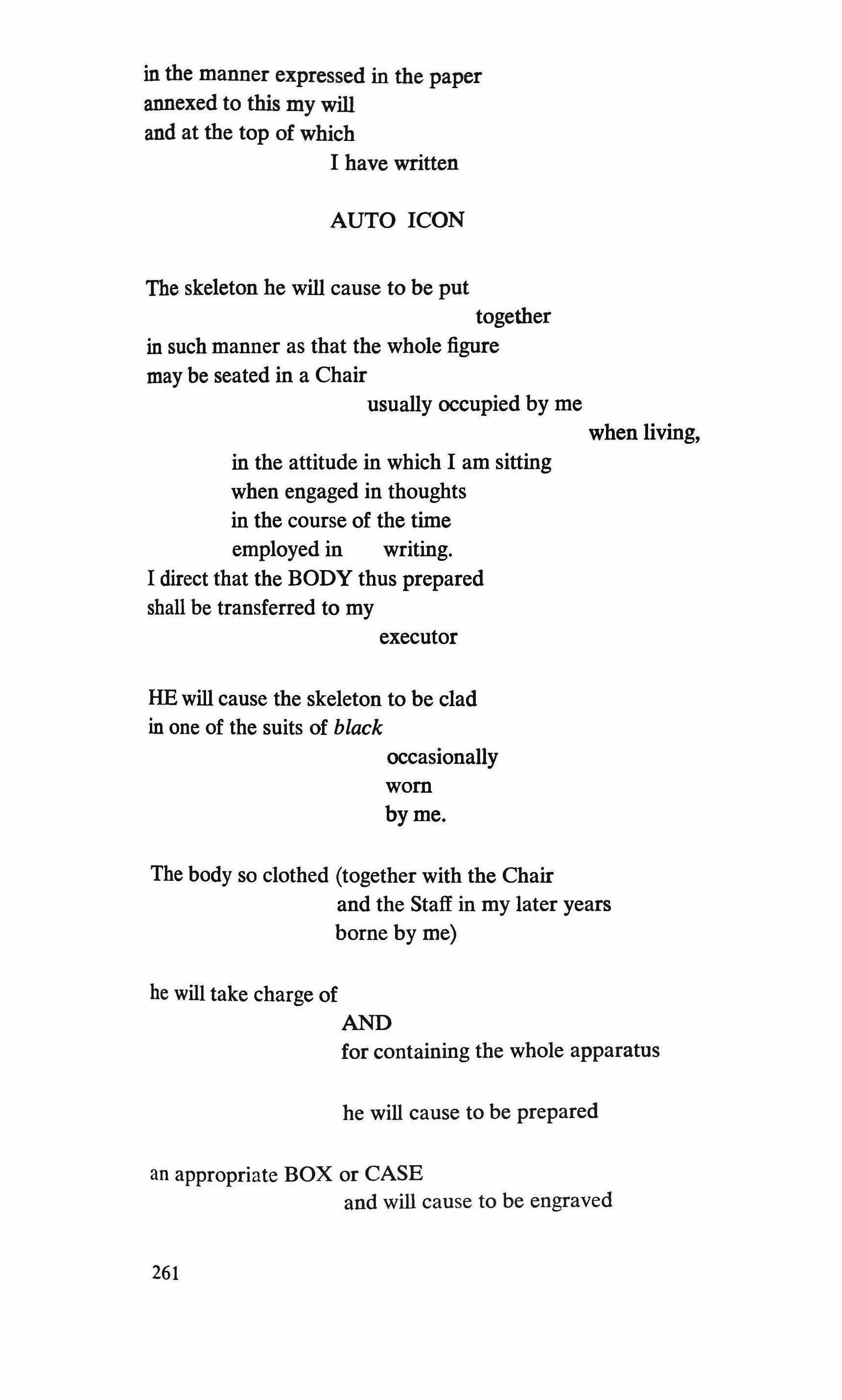
in the manner expressed in the paper annexed to this my will and at the top of which
I have written
AUTO ICON
The skeleton he will cause to be put together in such manner as that the whole figure may be seated in a Chair usually occupied by me when living, in the attitude in which I am sitting when engaged in thoughts in the course of the time employed in writing. I direct that the BODY thus prepared shall be transferred to my executor
HE will cause the skeleton to be clad in one of the suits of black occasionally worn byrne.
The body so clothed (together with the Chair and the Staff in my later years borne by me)
he will take charge of AND for containing the whole apparatus he will cause to be prepared an appropriate BOX or CASE and will cause to be engraved
261

in conspicuous characters on a plate to be affixed thereon (and also on the labels on the glass Cases in which the preparation of the Soft Parts of my Body shall be contained)
my Name at length with the letters ob. followed by the Day of My Decease. If it should so happen that my personal friends (and other disciples) should be disposed to meet together on some day or days of the year
for the purpose of Commemorating the Founder of the Greatest Happiness System of Morals and Legislation
my executor will (from time to time) cause to be conveyed to the room in which They meet the said BOX or CASE with the contents there to be stationed in such Part of the Room as to the Assembled Company shall seem meet.
Found in the will of Jeremy Bentham
262
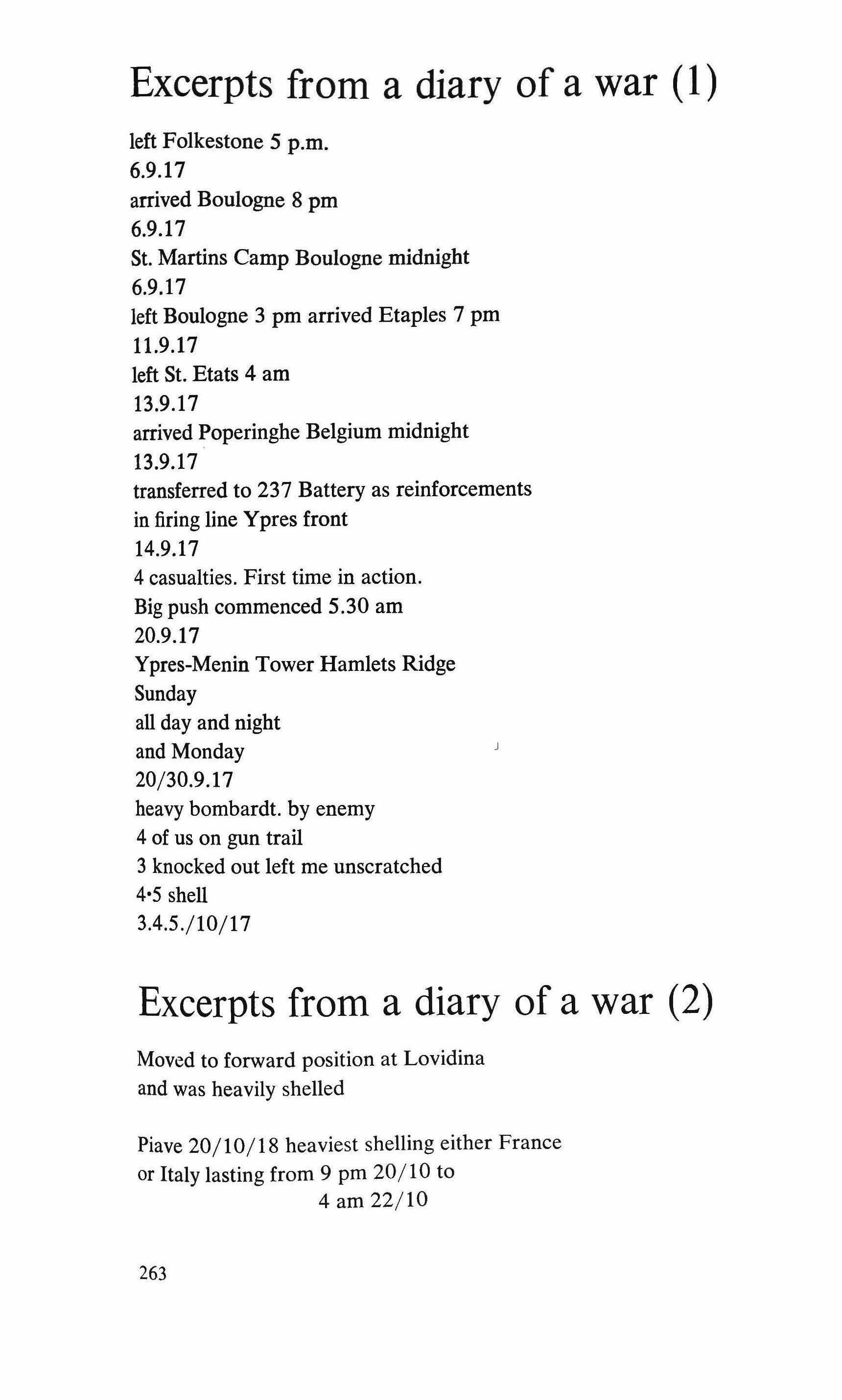
Excerpts from a diary of a war (1)
left Folkestone 5 p.m.
6.9.17
arrived Boulogne 8 pm
6.9.17
St. Martins Camp Boulogne midnight
6.9.17
left Boulogne 3 pm arrived Etaples 7 pm 11.9.17
left St. Etats 4 am 13.9.17
arrived Poperinghe Belgium midnight 13.9.17
transferred to 237 Battery as reinforcements in firing line Ypres front 14.9.17
4 casualties. First time in action. Big push commenced 5.30 am 20.9.17
Ypres-Menin Tower Hamlets Ridge Sunday all day and night and Monday 20/30.9.17
heavy bombardt. by enemy
4 of us on gun trail
3 knocked out left me unscratched 4'5 shell
3.4.5./10/17
Excerpts from a diary of a war (2)
Moved to forward position at Lovidina and was heavily shelled
Piave 20/10/18 heaviest shelling either France or Italy lasting from 9 pm 20/10 to 4 am 22/10
263
H.E. H.V. & Gas Shells & Bombs

Push started on Piave
first shot of bombardment 11.47 pm 26/10/18
Bombardment lasted until 8.30 am 27.10.18
Piave taken 7 am 27.10.18
Jerry retreating still thousands of prisoners coming in 5 pm 29/10/18
Guns now out of range 6.45 pm moved forward bridge blown up fell in Piave
21 drowned or killed by the shell 15 saved
Excerpts from a diary of a war (3)
21.10.17 left billet (Assurance and Arrival forms) for 9 days leave 21.10.17
6 pm wounded taken to C.C.S. then by ambulance train to hospital at St Etats arrived 5 am 23.10.17
* * * too rough to cross mines loose 25.10.17 started for Blighty midnight
264
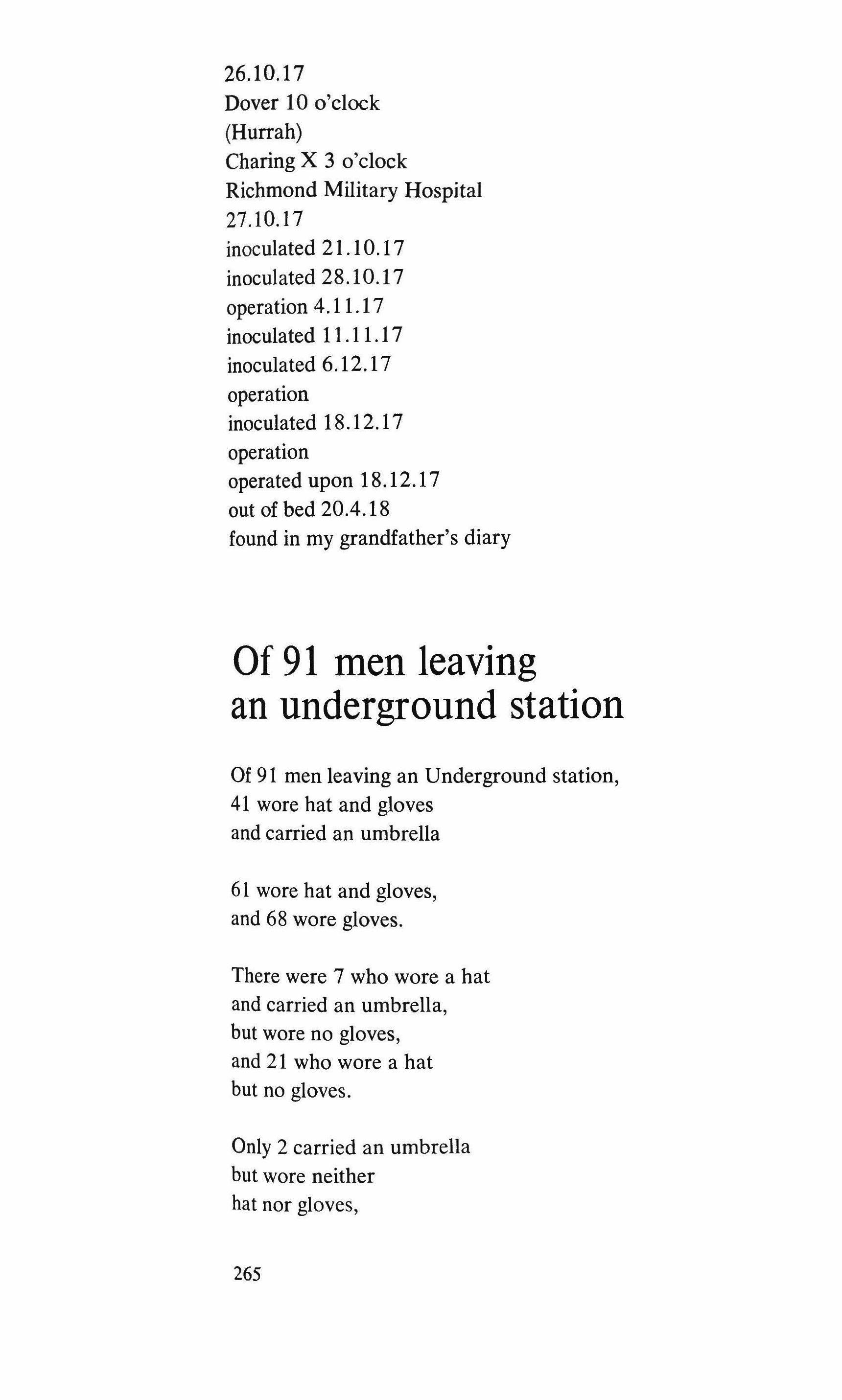
26.10.17
Dover 10 o'clock (Hurrah)
Charing X 3 o'clock
Richmond Military Hospital
27.10.17
inoculated 21.10.17
inoculated 28.10.17
operation 4.11.17
inoculated 11.11.17
inoculated 6.12.17
operation inoculated 18.12.17 operation operated upon 18.12.17 out of bed 20.4.18
found in my grandfather's diary
Of 91 men leaving an underground station
Of 91 men leaving an Underground station, 41 wore hat and gloves and carried an umbrella
61 wore hat and gloves, and 68 wore gloves.
There were 7 who wore a hat and carried an umbrella, but wore no gloves, and 21 who wore a hat but no gloves.
Only 2 carried an umbrella but wore neither hat nor gloves,
265
although there were 50 men with umbrellas altogether. How many of these wore gloves but no hat?
found in Sets and Logic by C.A.R.
Bailey
Injury to insured
total loss by physical severance at or above the wrist or ankle of ONE hand or ONE foot
total and irrecoverable loss of sight on ONE eye
total loss by physical severance at or above the wrist or ankle of ONE hand or ONE foot together with the total and irrecoverable loss of sight of ONE eye
total loss by physical severance at or above the wrist

£250
£250
£500
266
or ankle of BOTH hands or BOTH feet or of ONE hand
together with ONE foot
total and irrecoverable loss of sight of BOTH eyes
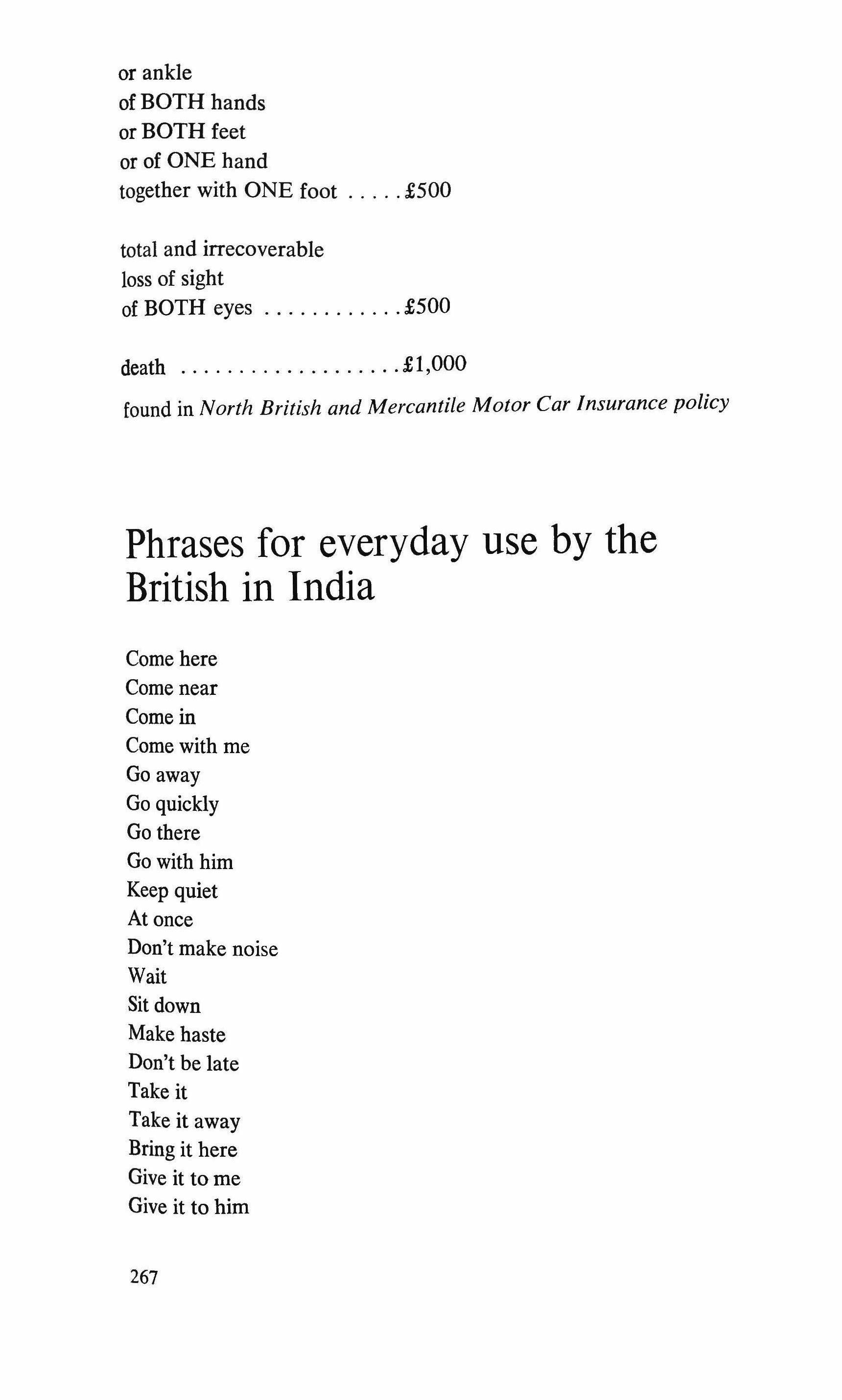
£500
£1,000 found in North British and Mercantile Motor Car Insurance policy
Phrases for everyday use by the British in India
Come here
Come near
Come in
Come with me
Go away
Go quickly
Go there
Go with him
Keep quiet
At once
Don't make noise
Wait
Sit down
Make haste
Don't be late
Take it
Take it away
Bring it here
Give it tome
Give it to him
267
£500 death
Leave it alone
Get out of the way
Bring a ghari
On the right
On the left
Mind your business
All right
That will do
Show it to me
Whip him
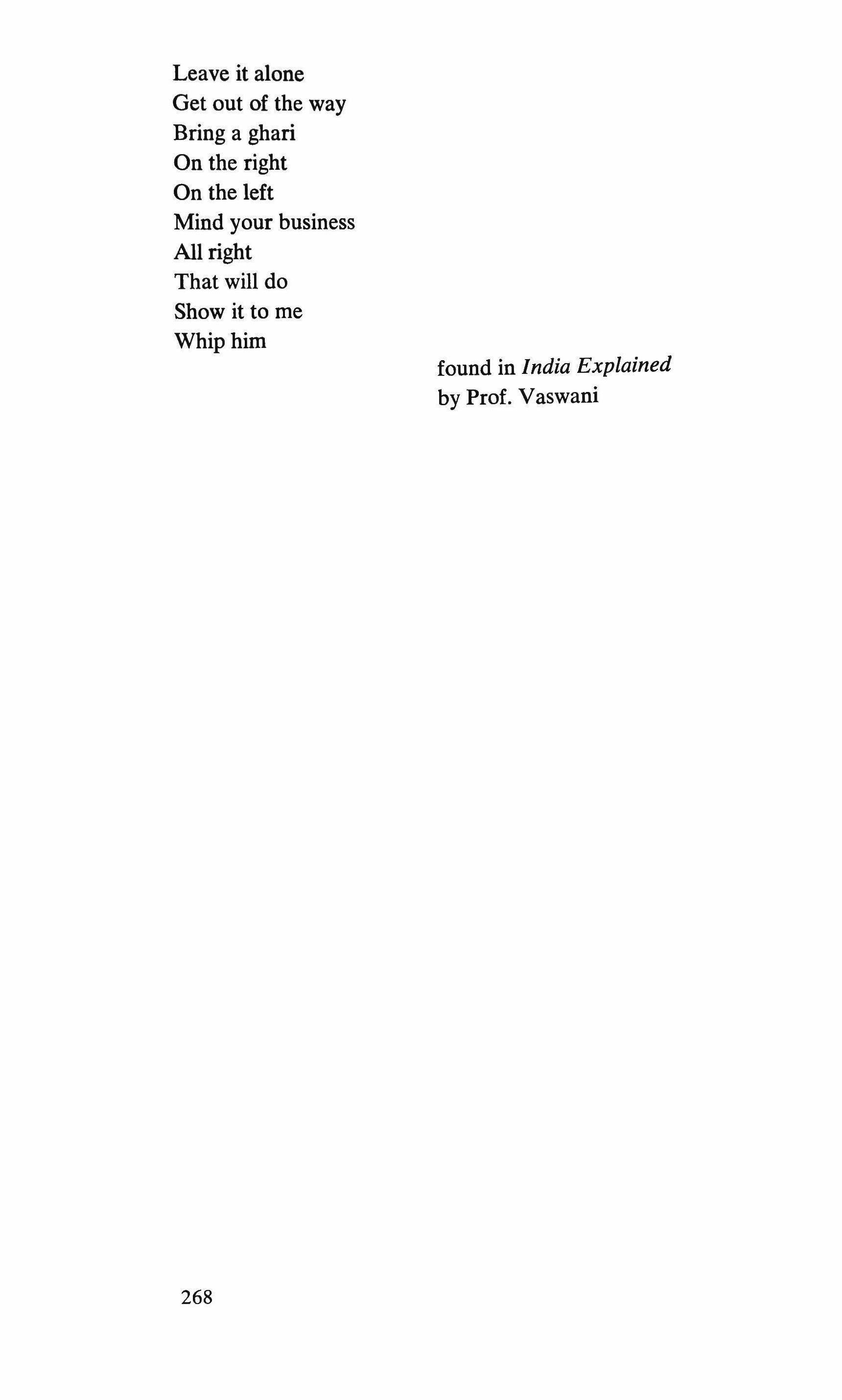
found in India Explained by Prof. Vaswani
268
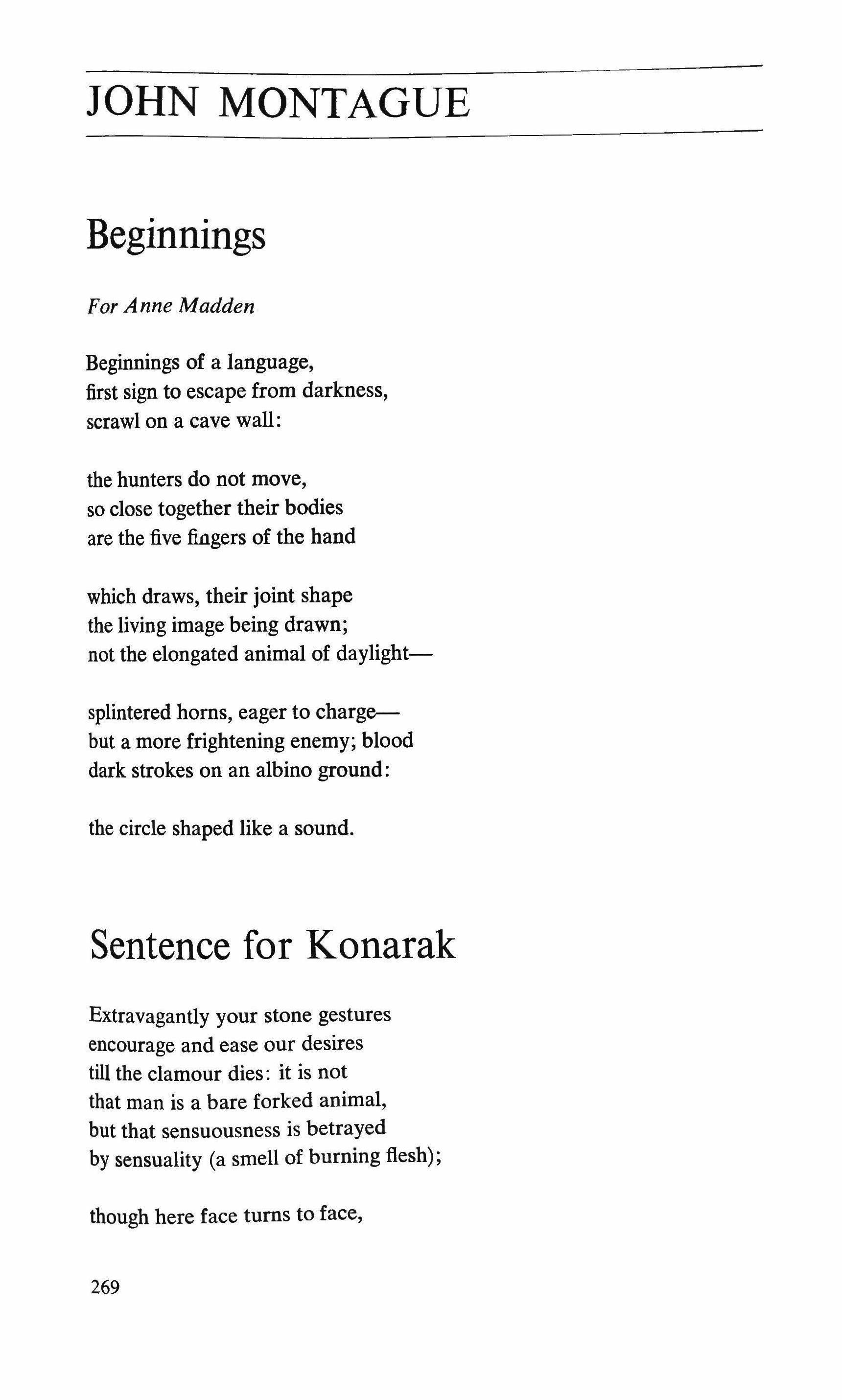
JOHN MONTAGUE
Beginnings
For Anne Madden
Beginnings of a language, first sign to escape from darkness, scrawl on a cave wall:
the hunters do not move, so close together their bodies are the five fingers of the hand
which draws, their joint shape the living image being drawn; not the elongated animal of daylight-
splintered horns, eager to chargebut a more frightening enemy; blood dark strokes on an albino ground:
the circle shaped like a sound.
Sentence for Konarak
Extravagantly your stone gestures encourage and ease our desires till the clamour dies: it is not that man is a bare forked animal, but that sensuousness is betrayed by sensuality (a smell of burning flesh); though here face turns to face,
269
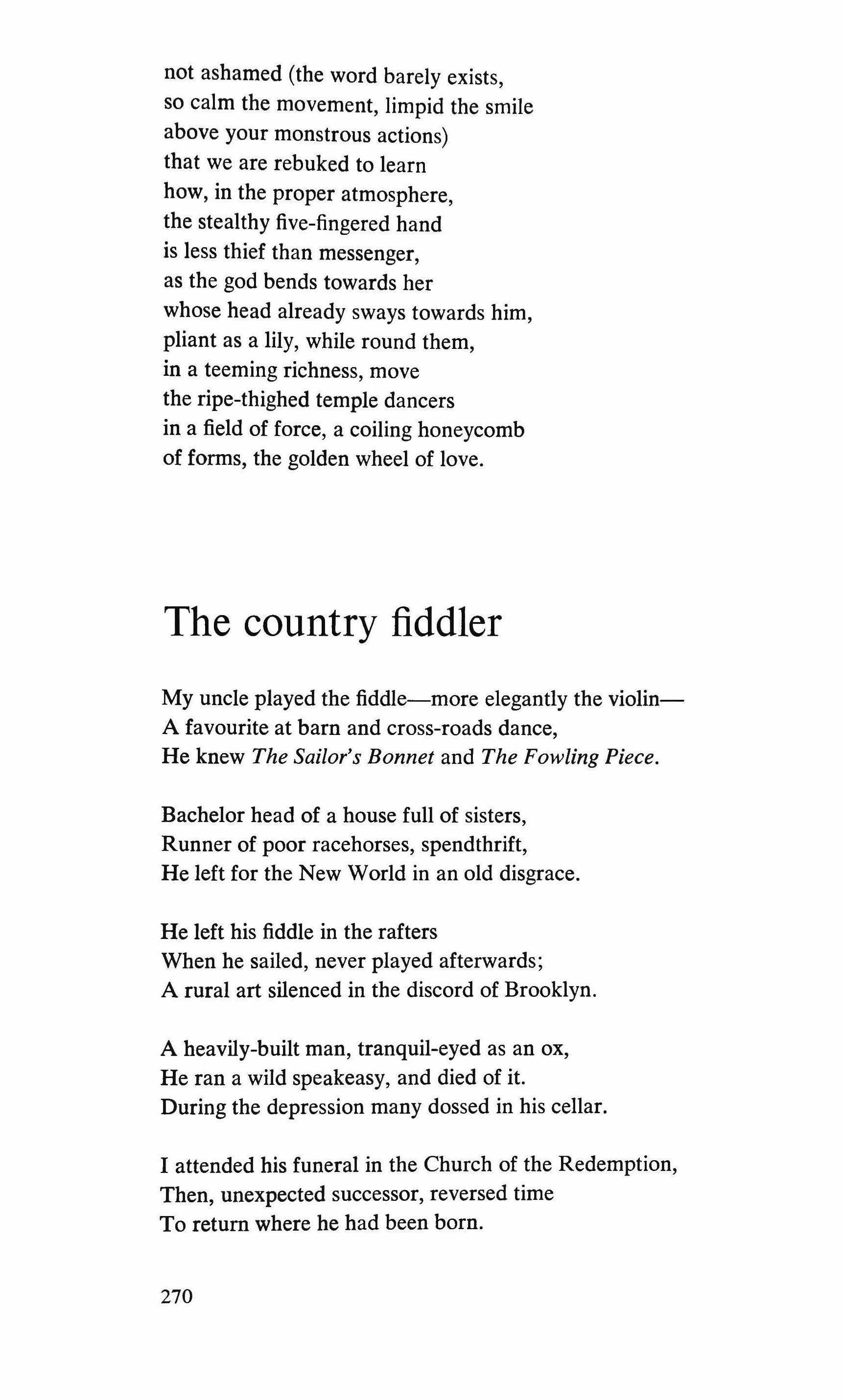
not ashamed (the word barely exists, so calm the movement, limpid the smile above your monstrous actions) that we are rebuked to learn how, in the proper atmosphere, the stealthy five-fingered hand is less thief than messenger, as the god bends towards her whose head already sways towards him, pliant as a lily, while round them, in a teeming richness, move the ripe-thighed temple dancers in a field of force, a coiling honeycomb of forms, the golden wheel of love.
The country fiddler
My uncle played the fiddle-more elegantly the violinA favourite at barn and cross-roads dance, He knew The Sailor's Bonnet and The Fowling Piece.
Bachelor head of a house full of sisters, Runner of poor racehorses, spendthrift, He left for the New World in an old disgrace.
He left his fiddle in the rafters When he sailed, never played afterwards; A rural art silenced in the discord of Brooklyn.
A heavily-built man, tranquil-eyed as an ox, He ran a wild speakeasy, and died of it. During the depression many dossed in his cellar.
I attended his funeral in the Church of the Redemption, Then, unexpected successor, reversed time To return where he had been born. 270
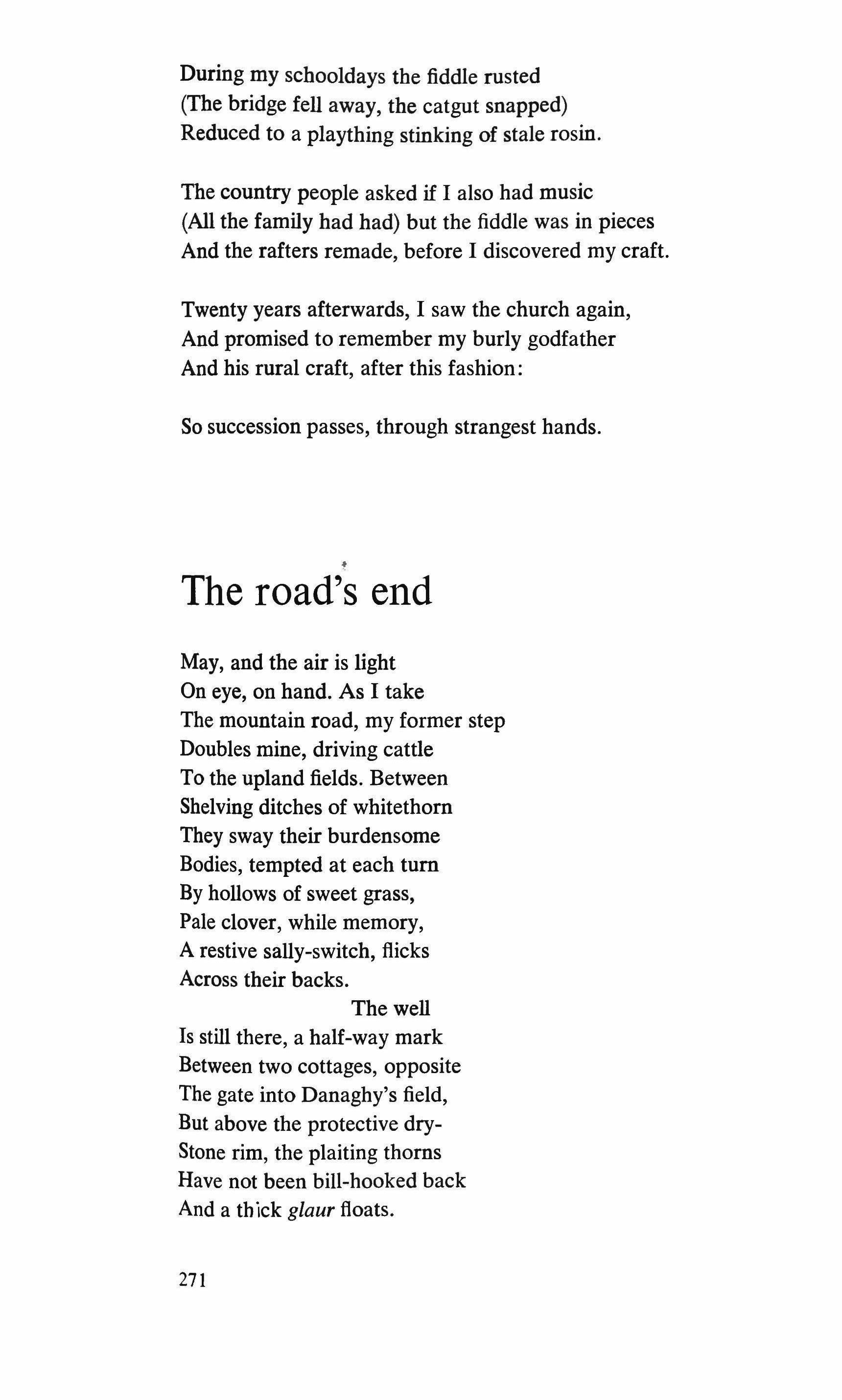
During my schooldays the fiddle rusted (The bridge fell away, the catgut snapped) Reduced to a plaything stinking of stale rosin.
The country people asked if I also had music (All the family had had) but the fiddle was in pieces And the rafters remade, before I discovered my craft.
Twenty years afterwards, I saw the church again, And promised to remember my burly godfather And his rural craft, after this fashion:
So succession passes, through strangest hands
The road's end
May, and the air is light
On eye, on hand. As I take The mountain road, my former step Doubles mine, driving cattle
To the upland fields. Between Shelving ditches of whitethorn They sway their burdensome Bodies, tempted at each tum
By hollows of sweet grass, Pale clover, while memory, A restive sally-switch, flicks Across their backs.
The well
Is still there, a half-way mark
Between two cottages, opposite The gate into Danaghy's field, But above the protective dryStone rim, the plaiting thorns Have not been bill-hooked back And a thick glaur floats.
271
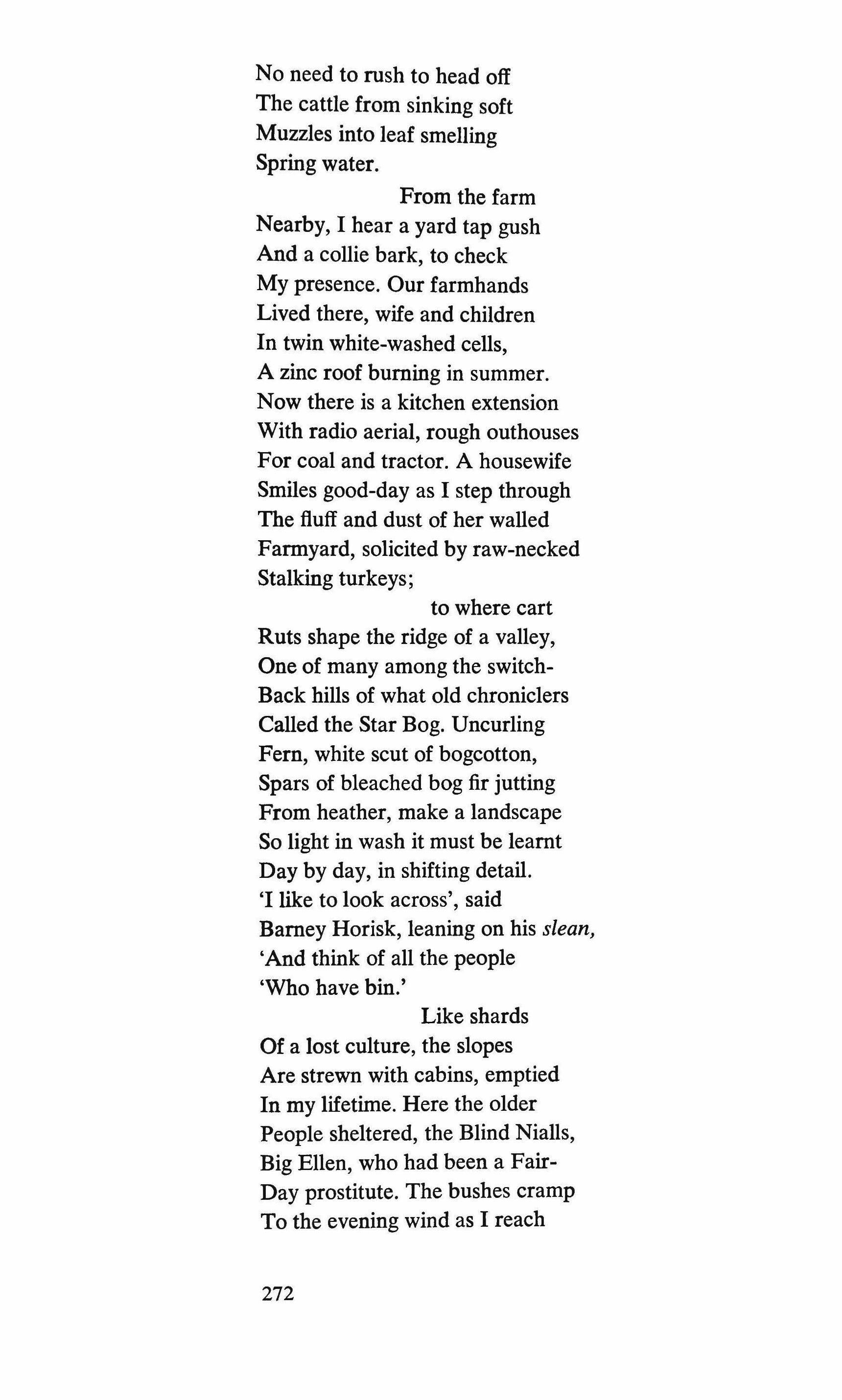
No need to rush to head off The cattle from sinking soft Muzzles into leaf smelling Spring water.
From the farm
Nearby, I hear a yard tap gush And a collie bark, to check My presence. Our farmhands Lived there, wife and children In twin white-washed cells, A zinc roof burning in summer. Now there is a kitchen extension With radio aerial, rough outhouses For coal and tractor. A housewife Smiles good-day as I step through The fluff and dust of her walled Farmyard, solicited by raw-necked Stalking turkeys; to where cart Ruts shape the ridge of a valley, One of many among the switchBack hills of what old chroniclers Called the Star Bog. Uncurling Fern, white scut of bogcotton, Spars of bleached bog fir jutting From heather, make a landscape So light in wash it must be learnt Day by day, in shifting detail. 'I like to look across', said Barney Horisk, leaning on his slean, 'And think of all the people 'Who have bin.'
Like shards
Of a lost culture, the slopes Are strewn with cabins, emptied In my lifetime. Here the older People sheltered, the Blind Nialls, Big Ellen, who had been a FairDay prostitute. The bushes cramp To the evening wind as I reach
272
The road's end. Jamie MacCrystal
Lived in the final cottage, A trim grove of mountain ash
Soughing protection round his walls And bright painted gate. The thatch Has slumped in, white dust of nettles On the flags. Only the shed remains In use for calves, although fuchsia
Bleeds by the wall, and someone Has propped a yellow cartwheel Against the door.
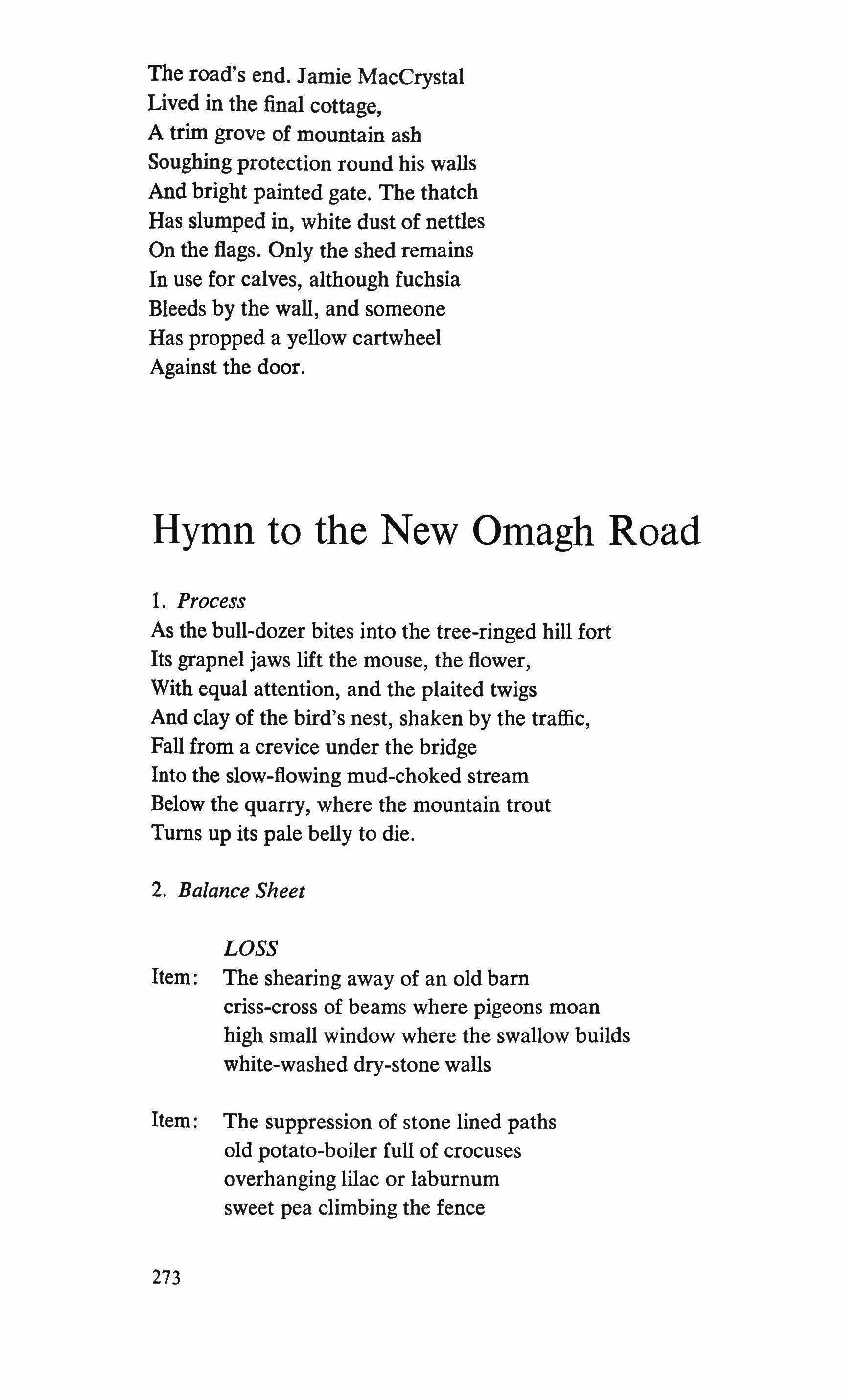
Hymn to the New Omagh Road
1. Process
As the bull-dozer bites into the tree-ringed hill fort Its grapnel jaws lift the mouse, the flower, With equal attention, and the plaited twigs And clay of the bird's nest, shaken by the traffic, Fall from a crevice under the bridge Into the slow-flowing mud-choked stream Below the quarry, where the mountain trout Turns up its pale belly to die.
2. Balance Sheet LOSS
Item: The shearing away of an old bam criss-cross of beams where pigeons moan high small window where the swallow builds white-washed dry-stone walls
Item: The suppression of stone lined paths old potato-boiler full of crocuses overhanging lilac or laburnum sweet pea climbing the fence
273
Item: The filling-in of chance streams uncovered wells, all unchannelled sources of water that might weaken foundations bubbling over the macadam.
Item: The disappearance of all signs of wild life, wren's or robin's nest, a rabbit nibbling a coltsfoot leaf, a stray mouse or water-rat.
Item: The uprooting of wayside hedges with their accomplices, devil's bit and dent de lion, prim rose and dog rose, an unlawful assembly of thistles.
Item: The removal of all hillocks and humps, superstition styled fairy forts and long barrows, now legally to be regarded as obstacles masking a driver's view.
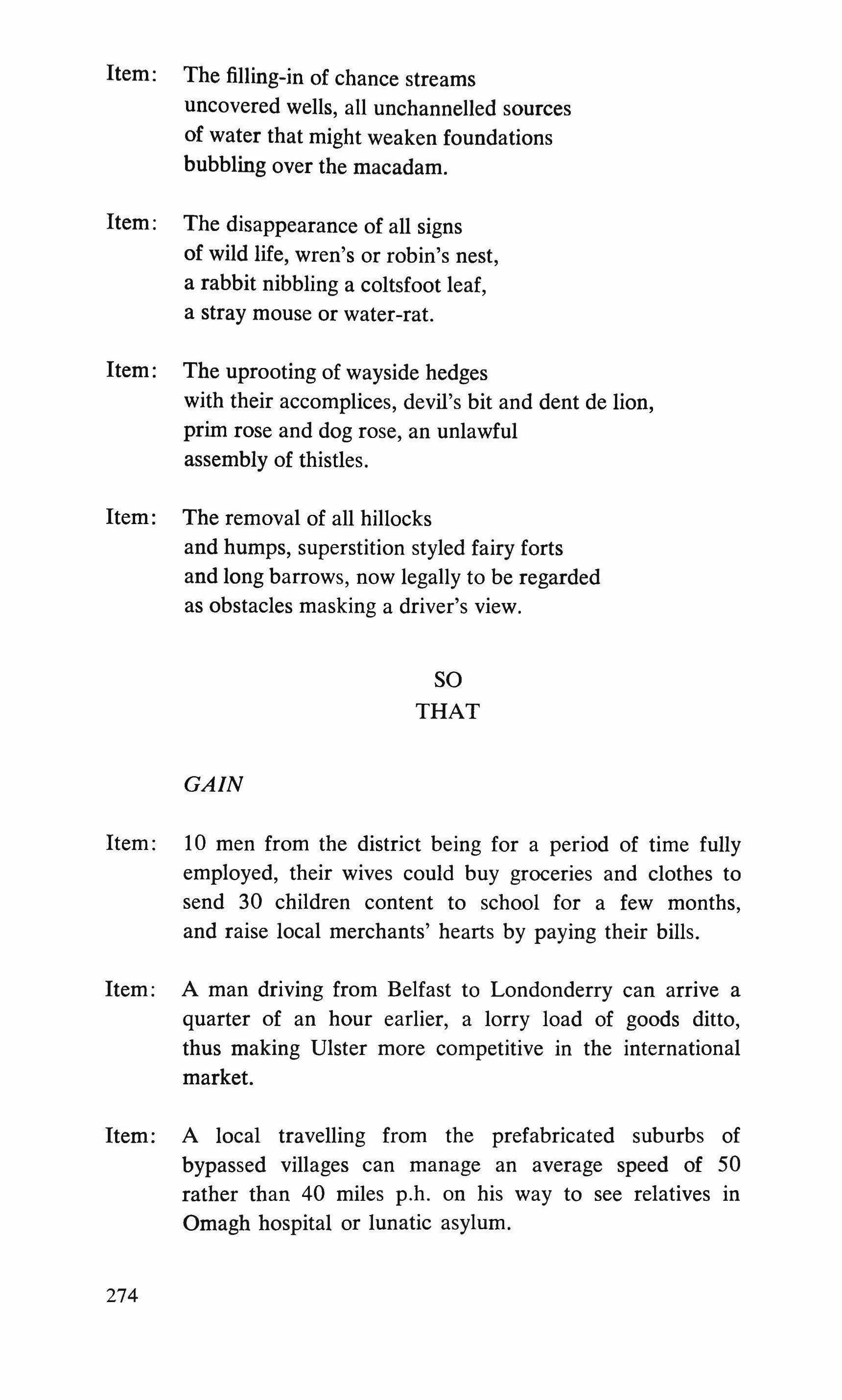
GAIN
Item: 10 men from the district being for a period of time fully employed, their wives could buy groceries and clothes to send 30 children content to school for a few months, and raise local merchants' hearts by paying their bills.
Item: A man driving from Belfast to Londonderry can arrive a quarter of an hour earlier, a lorry load of goods ditto, thus making Ulster more competitive in the international market.
Item: A local travelling from the prefabricated suburbs of bypassed villages can manage an average speed of 50 rather than 40 miles p.h. on his way to see relatives in Omagh hospital or lunatic asylum.
SO
THAT
274
Item: The dead of Carvaghey Graveyard (including my grandfather) can have an unobstructed view-the trees having been sheared away for a carpark-of the living passing at great speed, sometimes quick enough to come straight in:
Let it be clear
That I do not grudge my grandfather This long delayed pleasure! I like the idea of him Rising up from the rotting boards of the coffin With his J.P.'s white beard And penalizing drivers For traveling faster
Than jaunting cars
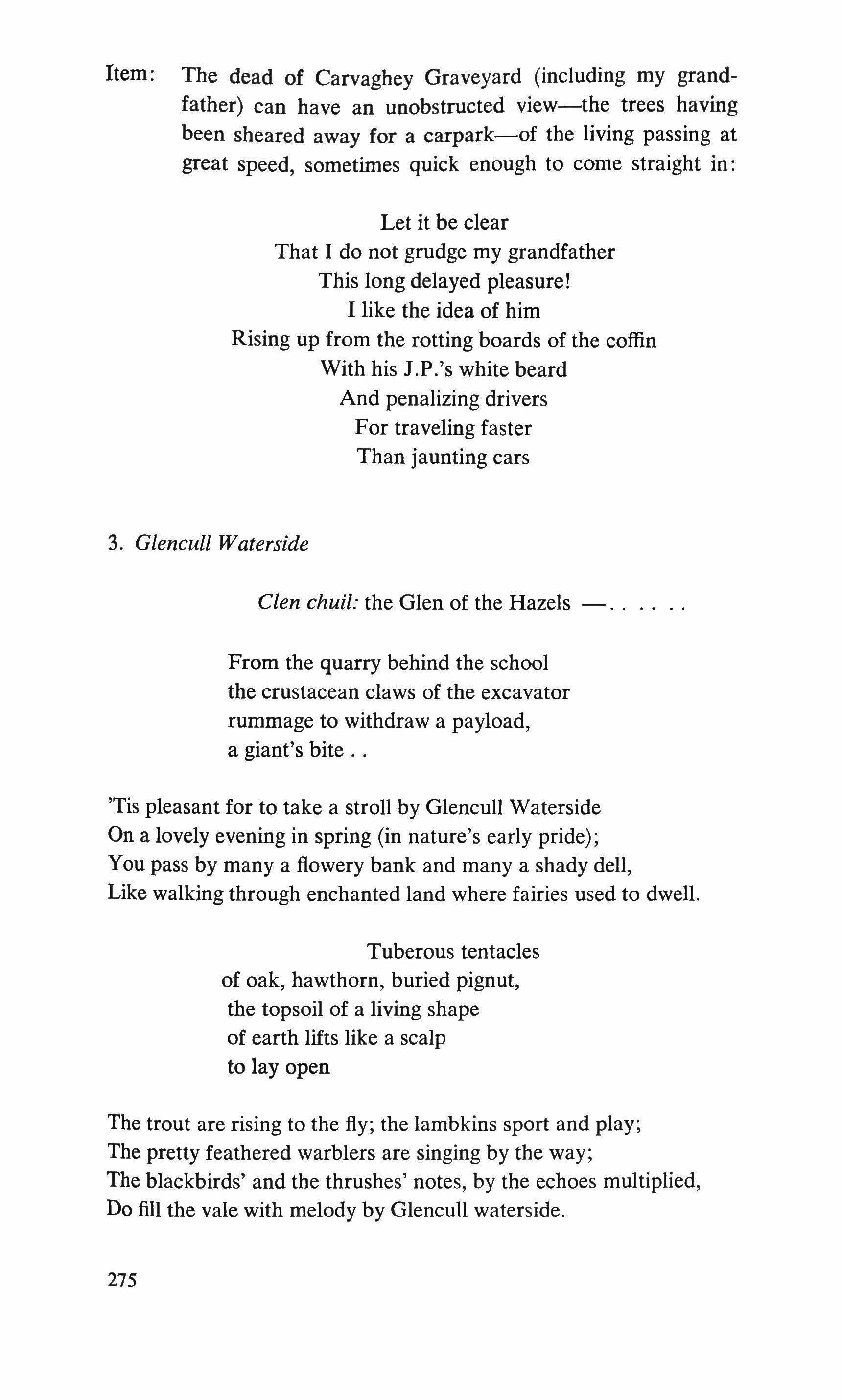
Clen chuil: the Glen of the Hazels
From the quarry behind the school the crustacean claws of the excavator rummage to withdraw a payload, a giant's bite
'Tis pleasant for to take a stroll by Glencull Waterside On a lovely evening in spring (in nature's early pride); You pass by many a flowery bank and many a shady dell, Like walking through enchanted land where fairies used to dwell.
Tuberous tentacles of oak, hawthorn, buried pignut, the topsoil of a living shape of earth lifts like a scalp to lay open
The trout are rising to the fly; the lambkins sport and play; The pretty feathered warblers are singing by the way; The blackbirds' and the thrushes' notes, by the echoes multiplied, Do fill the vale with melody by Glencull waterside.
3. Glencull Waterside
275
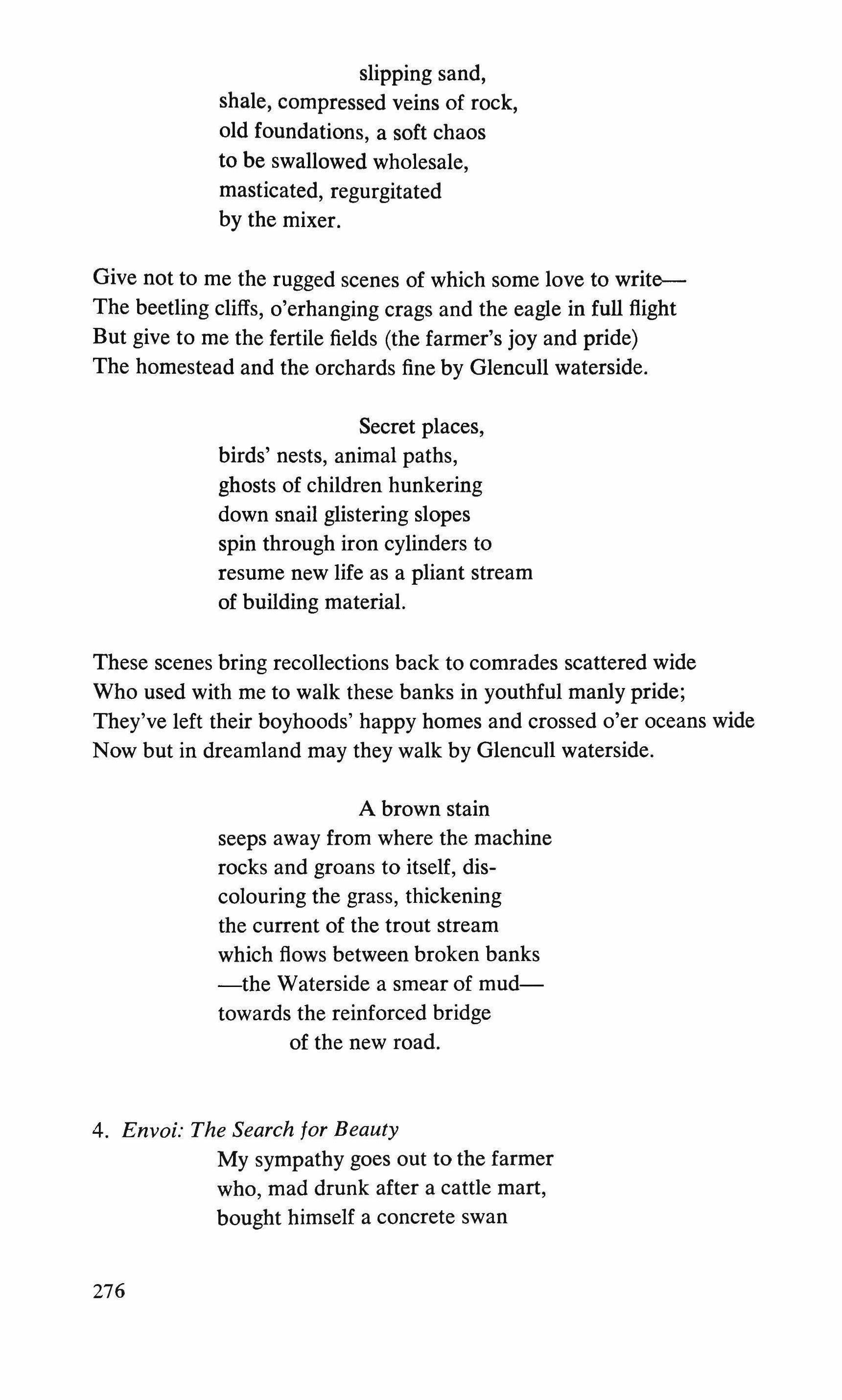
slipping sand, shale, compressed veins of rock, old foundations, a soft chaos to be swallowed wholesale, masticated, regurgitated by the mixer.
Give not to me the rugged scenes of which some love to write-
The beetling cliffs, o'erhanging crags and the eagle in full flight
But give to me the fertile fields (the farmer's joy and pride)
The homestead and the orchards fine by Glencull waterside.
Secret places, birds' nests, animal paths, ghosts of children hunkering down snail glistering slopes spin through iron cylinders to resume new life as a pliant stream of building material.
These scenes bring recollections back to comrades scattered wide
Who used with me to walk these banks in youthful manly pride; They've left their boyhoods' happy homes and crossed o'er oceans wide Now but in dreamland may they walk by Glencull waterside.
A brown stain
seeps away from where the machine rocks and groans to itself, discolouring the grass, thickening the current of the trout stream which flows between broken banks -the Waterside a smear of mudtowards the reinforced bridge of the new road.
4. Envoi: The Search for Beauty
My sympathy goes out to the farmer who, mad drunk after a cattle mart, bought himself a concrete swan
276
for thirty bob, and lugged it all the way home to deposit it (where the monkey puzzle was meant to grow) on his tiny landscaped lawn.
A chosen light
11 rue Daguerre
At night, sometimes, when I cannot sleep I go to the atelier door And smell the earth of the garden.
It exhales softly, Especially now, approaching springtime, When tendrils of green are plaited
Across the humus, desperately frail In their passage against The dark, unredeemed parcels of earth.
There is white light on the cobblestones And in the apartment house oppositeAll four floors-silence.
In that stillness-soft but luminously exact, A chosen light-I notice that The tips of the lately grafted cherry-tree
Are a firm and lacquered black.
II

Salute, in passing
The voyagers we cannot follow Are the most haunting. That face
I
277
Time has worn to a fastidious mask
Chides me, as one strict master Steps through the Luxembourg.
Surrounded by children, lovers, His thoughts are rigorous as trees
Reduced by winter. While the water Parts for tiny white-rigged yachts
He plots an icy human mathematics
Proving what content sighs when all Is lost, what wit flares from nothingness: His handsome hawk head is sacrificial
As he weathers to how man now is.
III
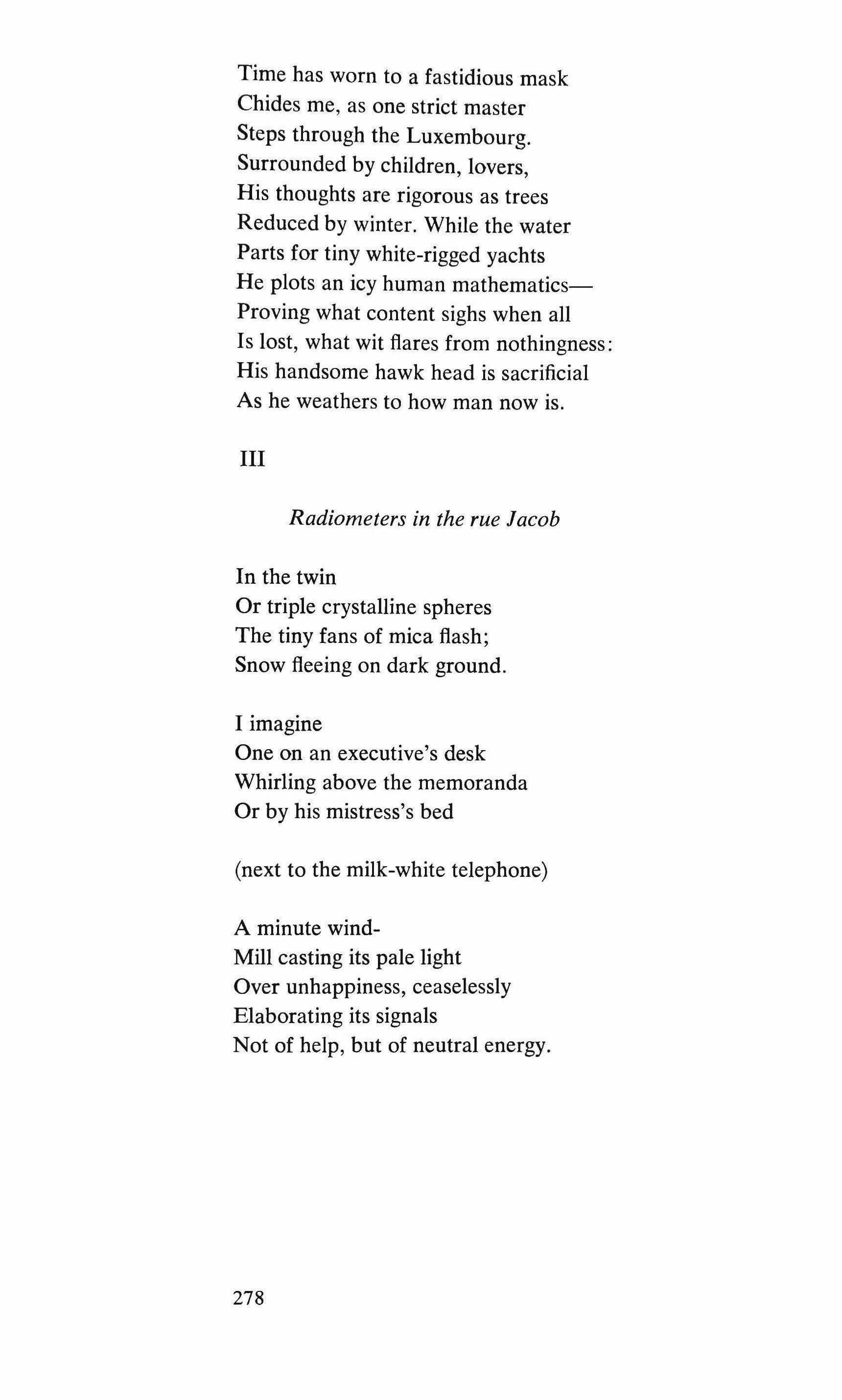
Radiometers in the rue Jacob
In the twin
Or triple crystalline spheres
The tiny fans of mica flash; Snow fleeing on dark ground.
I imagine
One on an executive's desk
Whirling above the memoranda
Or by his mistress's bed
(next to the milk-white telephone)
A minute wind-
Mill casting its pale light
Over unhappiness, ceaselessly
Elaborating its signals
Not of help, but of neutral energy.
278

Beyond the Liss
For Robert Duncan
Sean the hunchback, sadly Walking the road at evening Hears an errant music, Clear, strange, beautiful,
And thrusts his moon face
Over the wet hedge
To spy a ring of noble Figures dancing, with-
A rose at the centreThe lustrous princess.
Humbly he pleads to join, Saying, 'pardon my ugliness, Reward my patience, Heavenly governess.'
Presto! like the frog prince
His hump grows feather Light, his back splits, And he steps forth, shining
Into the world of ideal Movement where (stripped Of stale selfishness, Curdled envy) all
Act not as they are But might wish to bePlanets assumed in A sidereal harmony-
Strawfoot Sean Limber as any.
279

But slowly old habits
Reassert themselves, he Quarrels with pure gift, Declares the boredom
Of a perfect music, And, with toadish nastiness, Seeks first to insult, Then rape, the elegant princess.
Presto! with a sound
Like a rusty tearing He finds himself lifted Again through the air
To land, sprawling, Outside the hedge, His satchel hump securely Back on his back.
Sean the hunchback, sadly Walking the road at evening.
280
HARRY GUEST

A twilight man
The black flakes on the quiet wind drift through the rib-cage: Charred reductions of evidenceletters, dossiers, Photographs. The bonfire crackles to silence. Smell of dew supersedes the acridity In the back of the heat. A wry peace now. Embers Creep, write enigmatically, twist, fade. No messages. Scraps' float, soon lost in the thicker air contours abandon. A skeletal hand disturbs the site, prods, stains the Bone. Faces, afternoons on sofas, decisions, success, now Ash. The head tilts towards the stars of slower change Whose light prickles the empty eyesockets and, dropping into the black Skull, vanishes, unretained.
Water beads coldly on Spine, jaw, poised knuckle, and the darkness settles Substantiate since the last red point has gone leaving only Meaningless wafers for the night to obliterate, disperse.
281
Matsushima
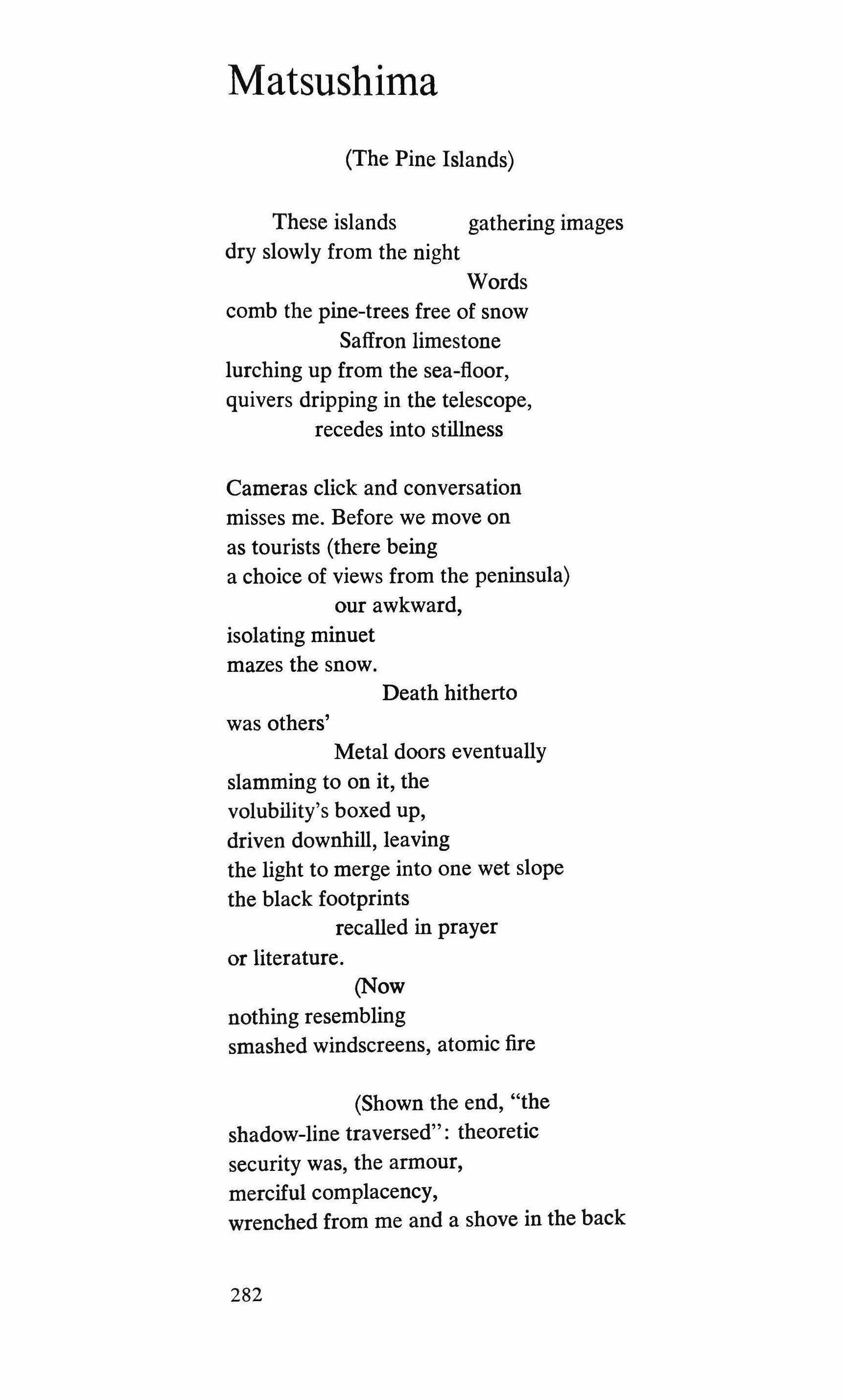
(The Pine Islands)
These islands gathering images dry slowly from the night
Words comb the pine-trees free of snow Saffron limestone lurching up from the sea-floor, quivers dripping in the telescope, recedes into stillness
Cameras click and conversation misses me. Before we move on as tourists (there being a choice of views from the peninsula) our awkward, isolating minuet mazes the snow.
Death hitherto was others'
Metal doors eventually slamming to on it, the volubility'S boxed up, driven downhill, leaving the light to merge into one wet slope the black footprints recalled in prayer or literature.
(Now nothing resembling smashed windscreens, atomic fire
(Shown the end, "the shadow-line traversed": theoretic security was, the armour, merciful complacency, wrenched from me and a shove in the back
282
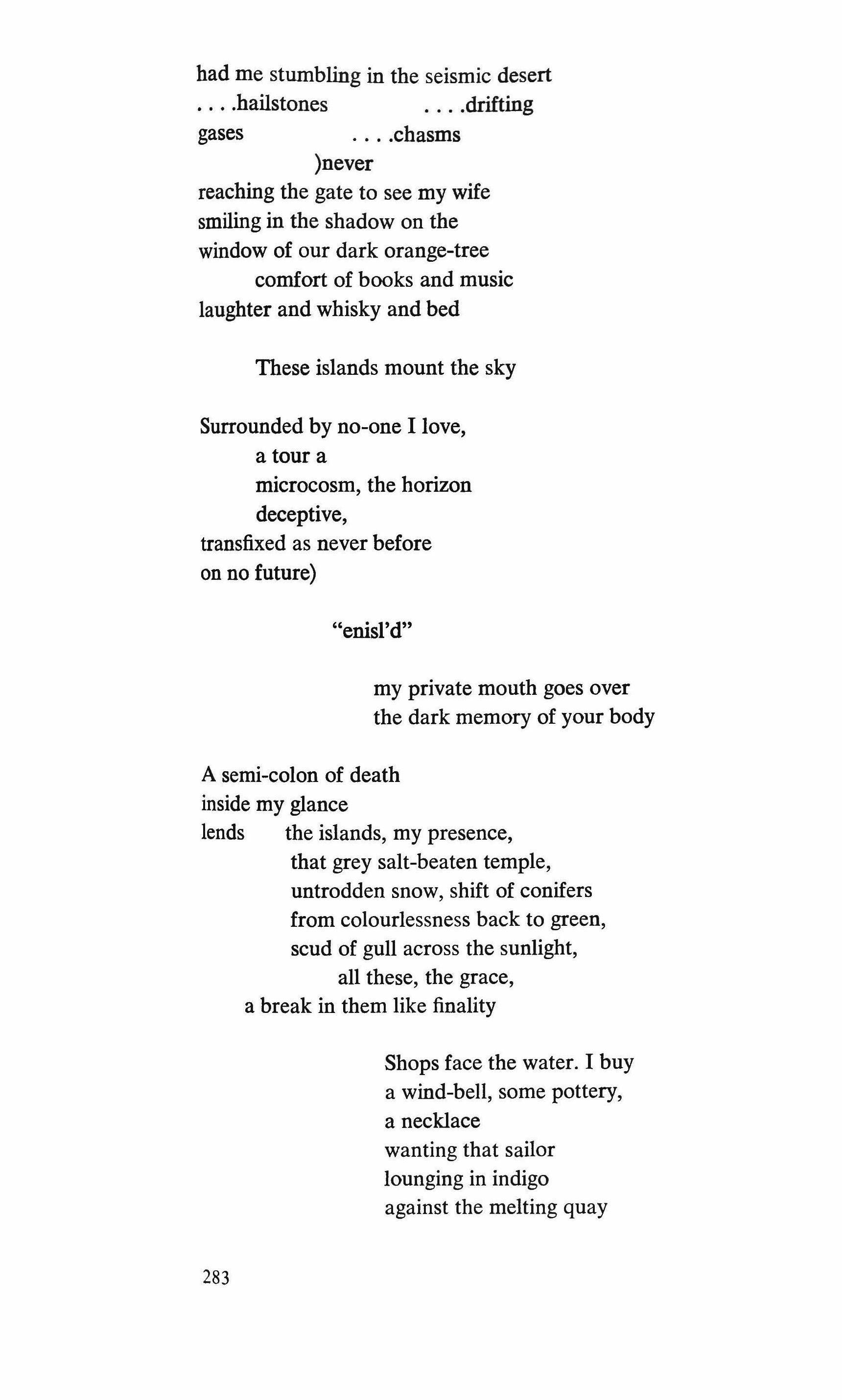
had me stumbling in the seismic desert hailstones drifting gases chasms
)never
reaching the gate to see my wife smiling in the shadow on the window of our dark orange-tree comfort of books and music
laughter and whisky and bed
These islands mount the sky
Surrounded by no-one I love, a tour a microcosm, the horizon deceptive, transfixed as never before on no future)
"enisl'd"
my private mouth goes over the dark memory of your body
A semi-colon of death inside my glance lends the islands, my presence, that grey salt-beaten temple, untrodden snow, shift of conifers from colourlessness back to green, scud of gull across the sunlight, all these, the grace, a break in them like finality
Shops face the water. I buy a wind-bell, some pottery, a necklace wanting that sailor lounging in indigo against the melting quay
283
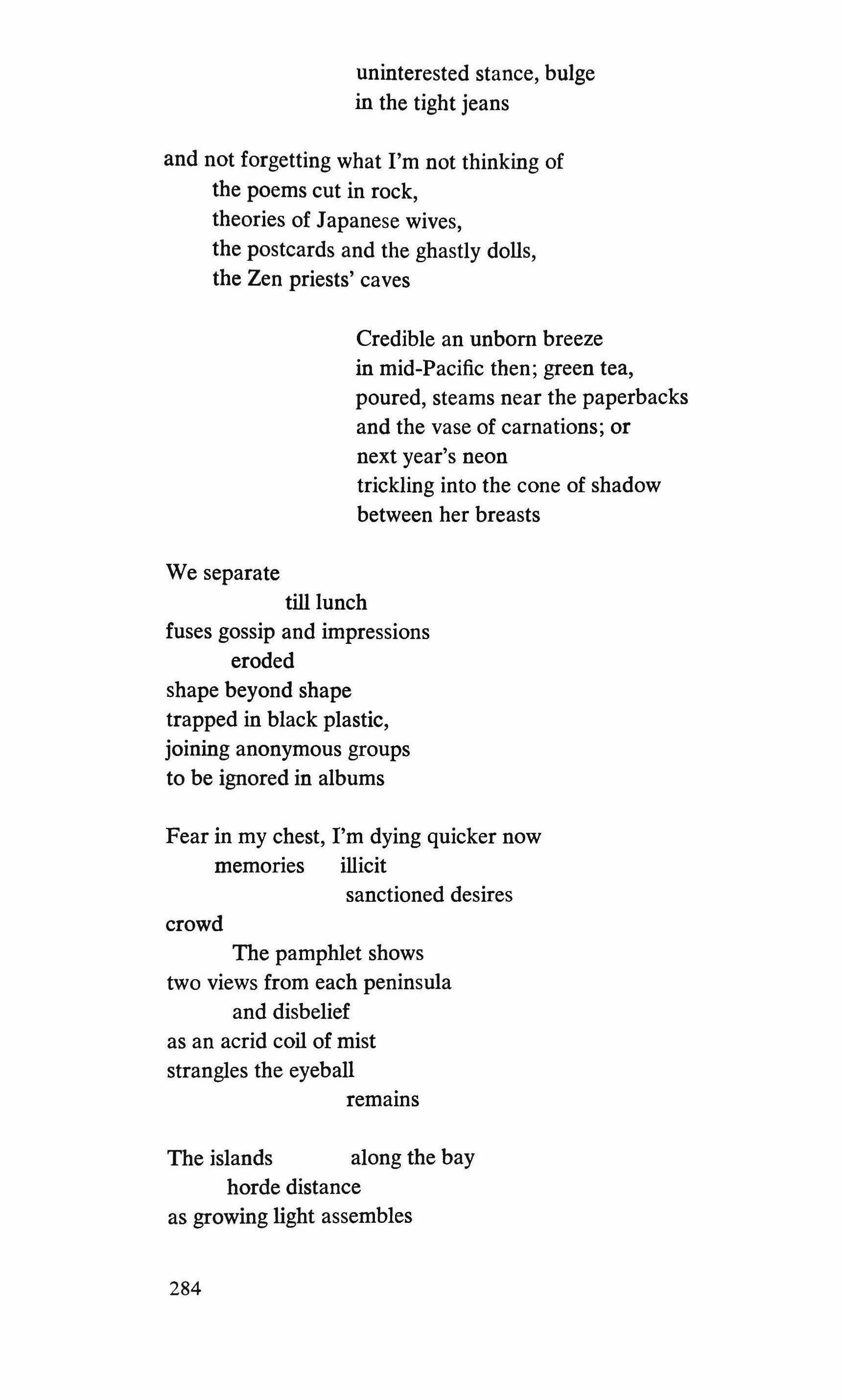
uninterested stance, bulge in the tight jeans
and not forgetting what I'm not thinking of the poems cut in rock, theories of Japanese wives, the postcards and the ghastly dolls, the Zen priests' caves
Credible an unborn breeze in mid-Pacific then; green tea, poured, steams near the paperbacks and the vase of carnations; or next year's neon trickling into the cone of shadow between her breasts
We separate till lunch fuses gossip and impressions eroded shape beyond shape trapped in black plastic, joining anonymous groups to be ignored in albums
Fear in my chest, I'm dying quicker now memories illicit sanctioned desires crowd
The pamphlet shows two views from each peninsula and disbelief as an acrid coil of mist strangles the eyeball remains
The islands along the bay horde distance as growing light assembles
284

the scooped stone and contorted pine
Fake, fake correlatives islands accrue nothing, solving sunrise and the flesh gains nothing, the fear, Ransome's fear, stays a lump of pain
the shutting-off of the pulse my mother knew at her Christmas cards
breath halted my father knew 'phoning from the darkness
the gasp, the squeezed lung, the heart's irregularity, night rammed down your throat
I shall know
my wife, my daughter, you, you
engulfed, dropped, enearthed Indifferent, grown hard and ill, This place we're emptying jostles me
from the tour, what, emblem, we visited,
my spattered eyes, the gone past, to, glimpsed, the notes
fragments, which, slopes bar of shadow only half-
285

remembered a boat cancelled by islands maybe blurred tree-trunks from the car-window
desultory, haunted are left with, littered, a complex of terror, cravings and souvenirs
Montage
I swing round the corner, still alone. There's no one now at the saluting-base, and the pavements here in the centre are all deserted.
I wrote once "Very drunk I raped you and the rain outside fell on to roses."
The morning lies empty to another sky, half the street indigo, half dusty yellow. After so long.
The lamp made your skin glow, at last naked underneath my kisses. Our year started.
The regime's altered, that I know. A breeze takes the gulls across the blue gap between the gutted block of the Royal Hotel and the bomb-scarred Post Office over which a new flag strains its colours.
In my arms you were always elsewhere: an absent mouth soured my embrace. Enigma of your possession. Once, a tarnished exile
286
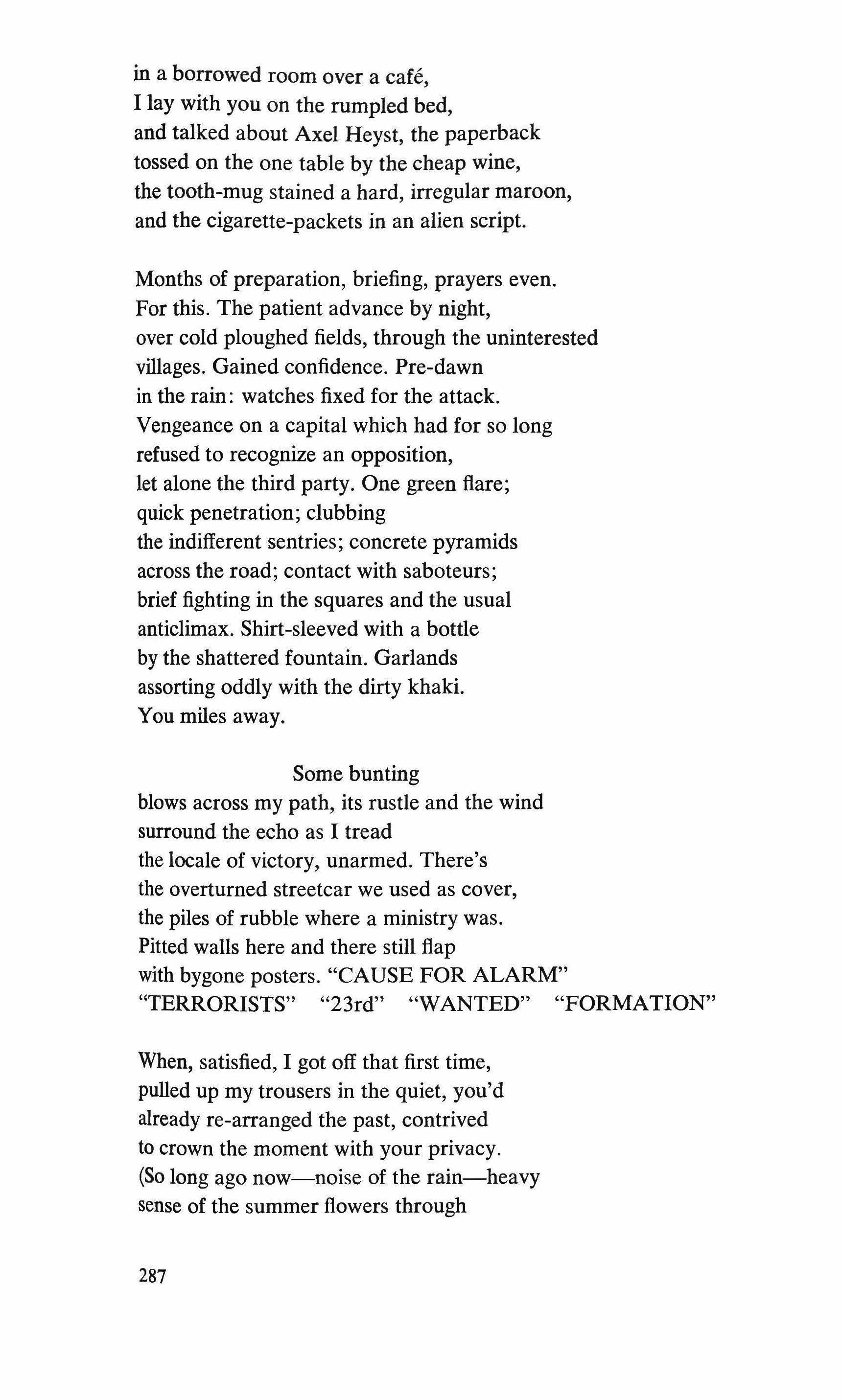
in a borrowed room over a cafe, I lay with you on the rumpled bed, and talked about Axel Heyst, the paperback tossed on the one table by the cheap wine, the tooth-mug stained a hard, irregular maroon, and the cigarette-packets in an alien script.
Months of preparation, briefing, prayers even. For this. The patient advance by night, over cold ploughed fields, through the uninterested villages. Gained confidence. Pre-dawn in the rain: watches fixed for the attack. Vengeance on a capital which had for so long refused to recognize an opposition, let alone the third party. One green flare; quick penetration; clubbing the indifferent sentries; concrete pyramids across the road; contact with saboteurs; brief fighting in the squares and the usual anticlimax. Shirt-sleeved with a bottle by the shattered fountain. Garlands assorting oddly with the dirty khaki. You miles away.
Some bunting blows across my path, its rustle and the wind surround the echo as I tread the locale of victory, unarmed. There's the overturned streetcar we used as cover, the piles of rubble where a ministry was. Pitted walls here and there still flap with bygone posters. "CAUSE FOR ALARM" "TERRORISTS" "23rd" "WANTED" "FORMATION"
When, satisfied, I got off that first time, pulled up my trousers in the quiet, you'd already re-arranged the past, contrived to crown the moment with your privacy. (So long ago now-noise of the rain-heavy sense of the summer flowers through
287
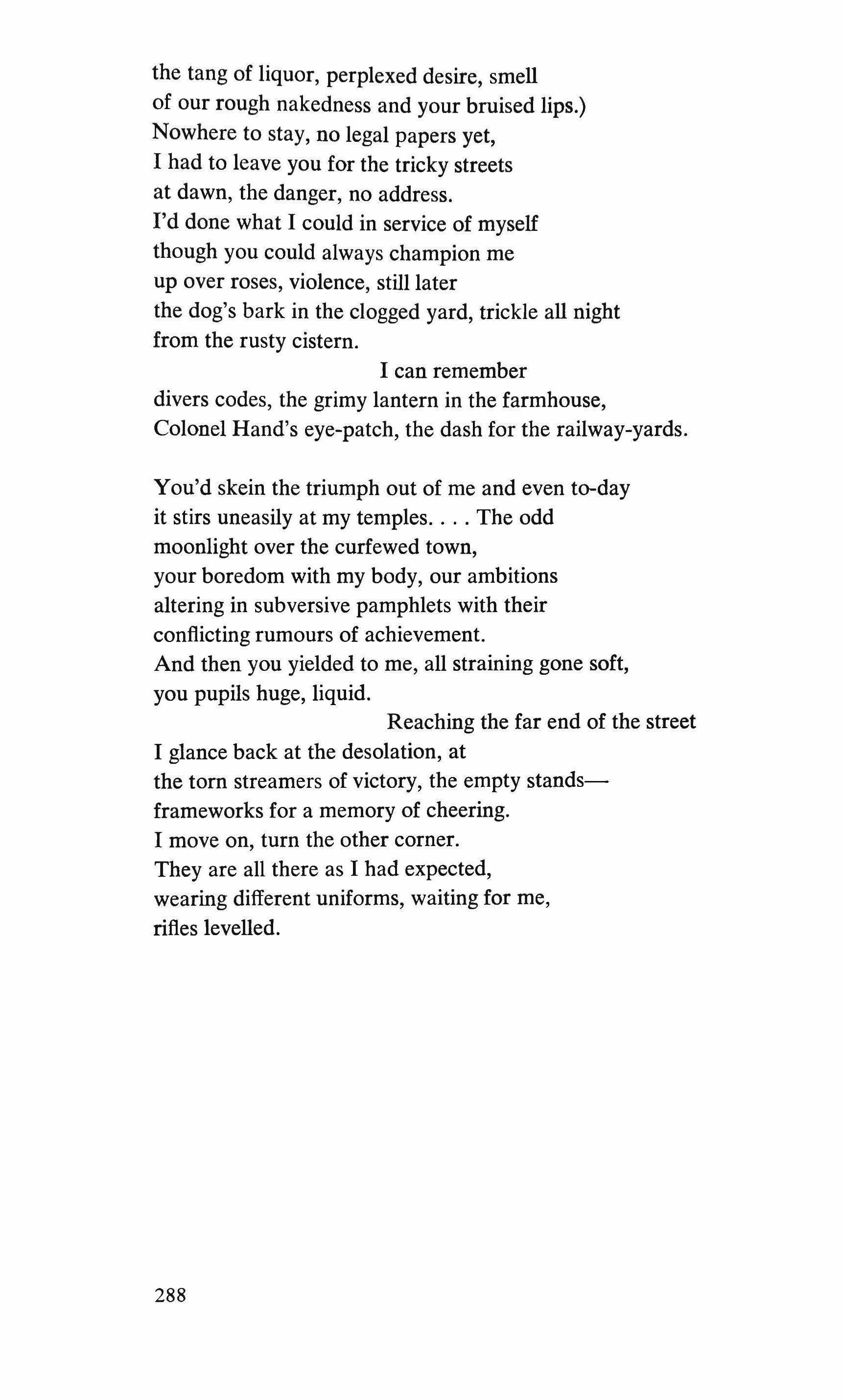
the tang of liquor, perplexed desire, smell of our rough nakedness and your bruised lips.) Nowhere to stay, no legal papers yet, I had to leave you for the tricky streets at dawn, the danger, no address.
I'd done what I could in service of myself though you could always champion me up over roses, violence, still later the dog's bark in the clogged yard, trickle all night from the rusty cistern.
I can remember divers codes, the grimy lantern in the farmhouse, Colonel Hand's eye-patch, the dash for the railway-yards.
You'd skein the triumph out of me and even to-day it stirs uneasily at my temples The odd moonlight over the curfewed town, your boredom with my body, our ambitions altering in subversive pamphlets with their conflicting rumours of achievement. And then you yielded to me, all straining gone soft, you pupils huge, liquid.
Reaching the far end of the street
I glance back at the desolation, at the tom streamers of victory, the empty standsframeworks for a memory of cheering. I move on, turn the other corner. They are all there as I had expected, wearing different uniforms, waiting for me, rifles levelled.
288
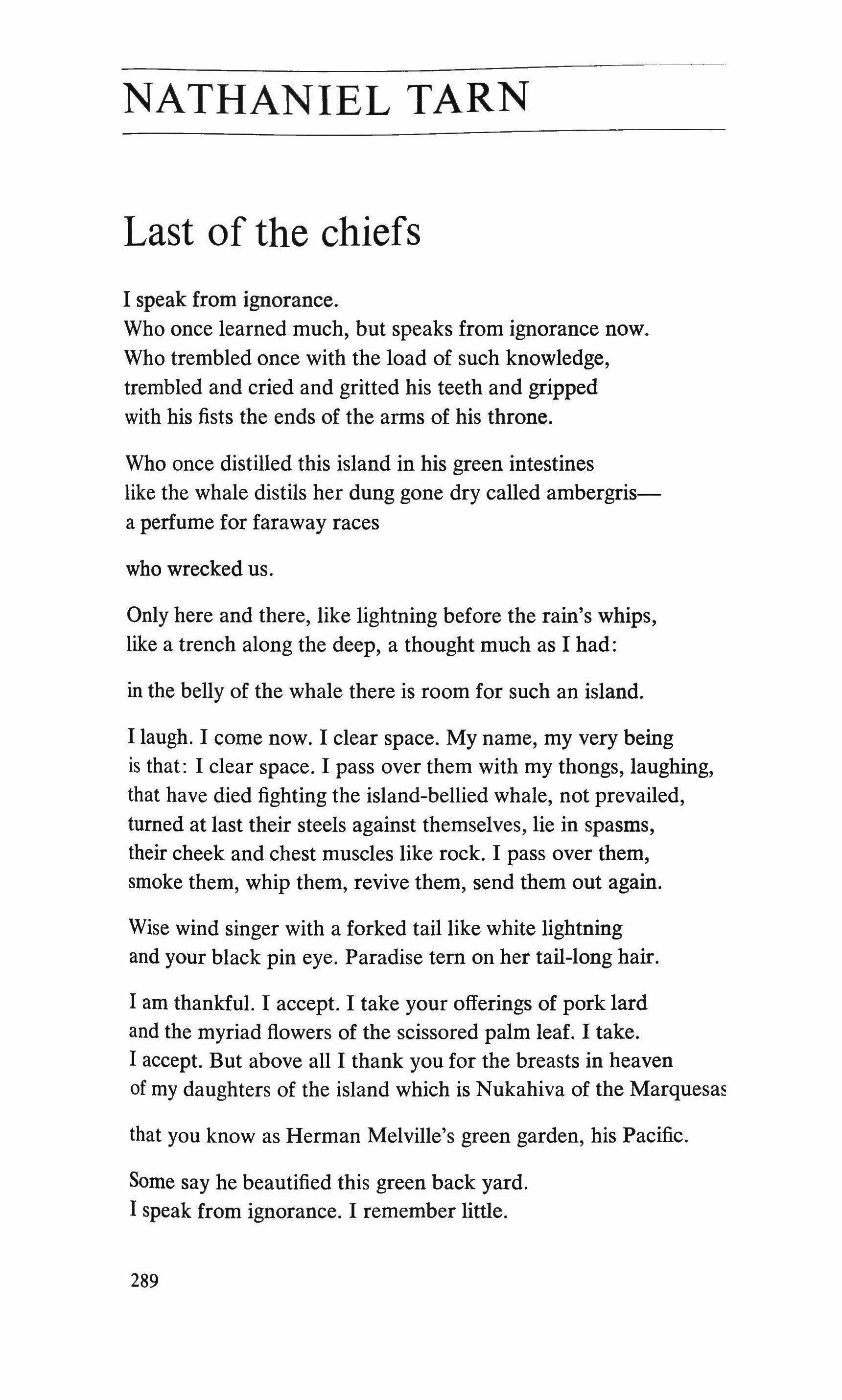
NATHANIEL TARN
Last of the chiefs
I speak from ignorance. Who once learned much, but speaks from ignorance now. Who trembled once with the load of such knowledge, trembled and cried and gritted his teeth and gripped with his fists the ends of the arms of his throne.
Who once distilled this island in his green intestines like the whale distils her dung gone dry called ambergrisa perfume for faraway races who wrecked us.
Only here and there, like lightning before the rain's whips, like a trench along the deep, a thought much as I had: in the belly of the whale there is room for such an island.
I laugh. I come now. I clear space. My name, my very being is that: I clear space. I pass over them with my thongs, laughing, that have died fighting the island-bellied whale, not prevailed, turned at last their steels against themselves, lie in spasms, their cheek and chest muscles like rock. I pass over them, smoke them, whip them, revive them, send them out again.
Wise wind singer with a forked taillike white lightning and your black pin eye. Paradise tern on her tail-long hair.
I am thankful. I accept. I take your offerings of pork lard and the myriad flowers of the scissored palm leaf. I take. I accept. But above all I thank you for the breasts in heaven of my daughters of the island which is Nukahiva of the Marquesas that you know as Herman Melville's green garden, his Pacific.
Some say he beautified this green back yard. I speak from ignorance. I remember little.
289
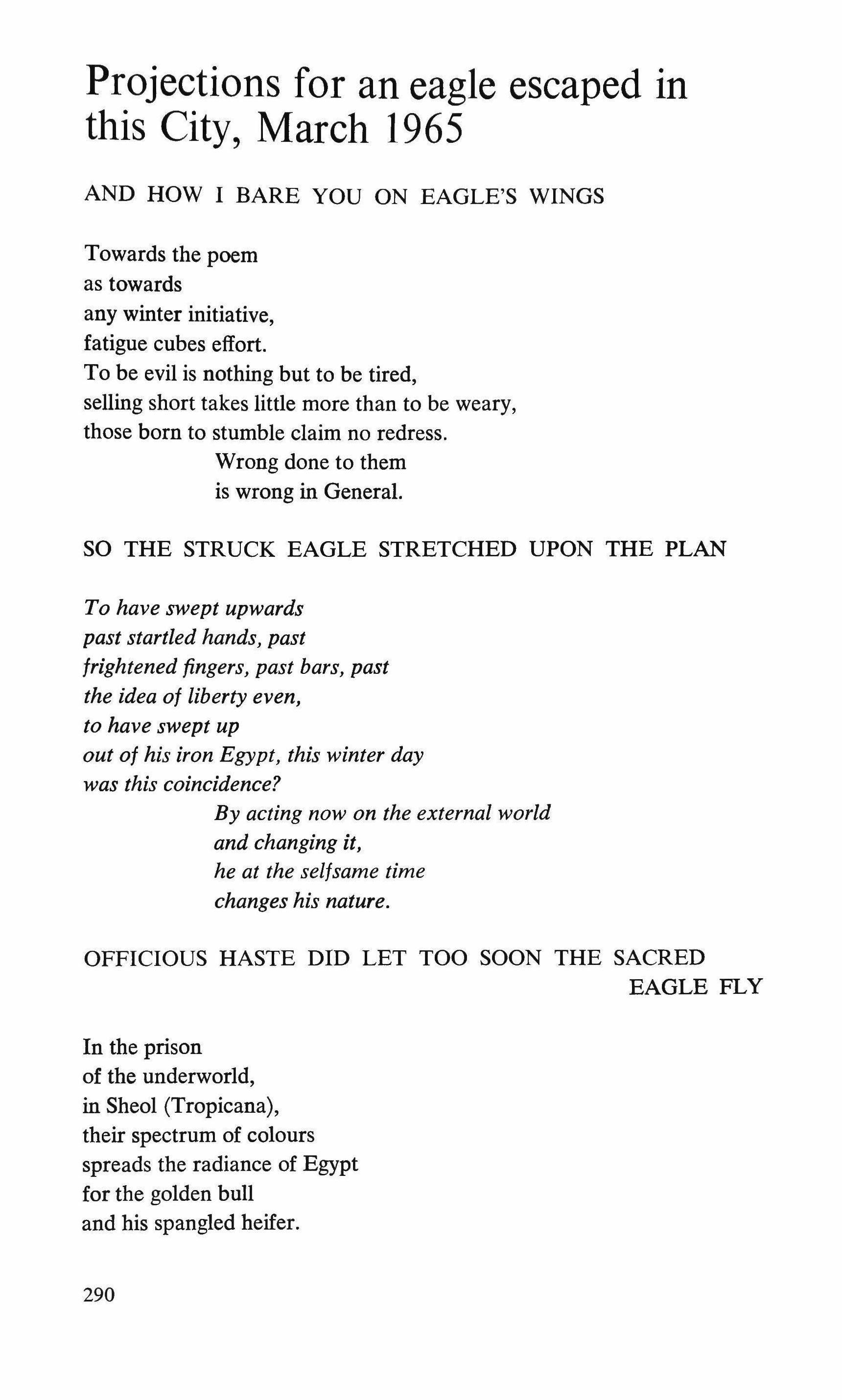
Projections for an eagle escaped in this City, March 1965
AND HOW I BARE YOU ON EAGLE'S WINGS
Towards the poem as towards any winter initiative, fatigue cubes effort.
To be evil is nothing but to be tired, selling short takes little more than to be weary, those born to stumble claim no redress. Wrong done to them is wrong in General.
SO THE STRUCK EAGLE STRETCHED UPON THE PLAN
To have swept upwards past startled hands, past frightened fingers, past bars, past the idea of liberty even, to have swept up out of his iron Egypt, this winter day was this coincidence?
By acting now on the external world and changing it, he at the selfsame time changes his nature.
OFFICIOUS HASTE DID LET TOO SOON THE SACRED EAGLE FLY
In the prison of the underworld, in Sheol (Tropicana), their spectrum of colours spreads the radiance of Egypt for the golden bull and his spangled heifer.
290

In the 19th century, from Bogota, Columbia, millions of hummers p.a. One London firm alone: 400,000 corpses plucked for adornment.
FOR WHERESOEVER THE CARCASE IS THERE WILL THE EAGLES BE GATHERED TOGETHER
Though the people do not even flock to their king. It is enough that the king rules again wingtip to wingtip spanning the upper air and clouding the nether air with his shadow. All those these walls enthrall, while more than mathematic gloom envelops all around, peer up from city windows and compute the king's position in the famished skies.
The gates of Sheol open on corridors which open onto light in this our world. But that illusion, quantum of darkness in the rush of light, bars hummers from the knowledge of their freedom. Egypt is weariness of heart. Specifications of 319 Apodiformes Trochilidae: flight muscles forming some 25 % of body weight, unique wingbone to shoulder swiveljoint permits wingplane adjustment to the air. 55 wingbeats per second in hoverflight, 75 w.p.s. in level flight. Courtship: (0 as for U-Ioop love-buzz) 200 w.p.s.
SKYWARD IN AIR A SUDDEN MUFFLED SOUND THE DALLIANCE OF THE EAGLES
While the king has not learned his trade. Who shall, from the holarctic rim, in legions,
291
as in the days oi Aquila Chrysaetos, hoist in Rome, bate bearing crowns and sceptres in their pinions, lightning in talons, the blizzard in their tails, flutterd your Volscians in Corioli, and teach to kill? and teach to wind the kingdom out on ever widening orbits?
The list of his Majesty's subjects in his provinces of latter-day Egypt: Cuban Bee, Calypte Helenae, 2Yz in., Isle of Pines. Frilled Coquette, Lophornis Magnifica, 23,4 in., Brazil. Adorable Coquette, Paphosia Adorabilis, 3 in., Costa Rica.
Popelaire's Thornbill, Popelairia Popelairii, 4Yz in., Ecuador. Violet Sabrewing, Sampylopterus Hemileucurus, 5 in., Mexico-Panama. Collared Inca, Coeligena Torquata, 5112 in., Colombia-Peru. Sappho Comet, Sappho Sparganura, 7 in., Bolivia. Greentailed Sylph, Aglaiocercus Kingi, 7Yz in., Andes. Crimson Topaz, Topaza Pella, 7Yz in., Guianas. Streamertail, Trochilus Polytmus, 9Yz in., Island of Jamaica. And others as per itemized list attached.
Here in Sheol by skeletal willows, by ghostly streams, their exiled harps are hung. They doze in hibernation by the hour. Their king has gone out of bondage from Egypt, Babylon, Spain, New Spain and all the Russias. Ring'd with the azure world, he stands. And the best of merry luck to him.

While the king has not learned his trade. He addresses, [ratres, the flannelled crowd, Romani, the keepers and dogs, populares, he addresses, the city truants, workers, the photographers, of the world, the journalists, unite, he addresses, the Sunday idle, every valley, scorning the ladders, shall be exalted,
THAT WITH HIS SHARPE LOK PERSETH THE SONNE
292
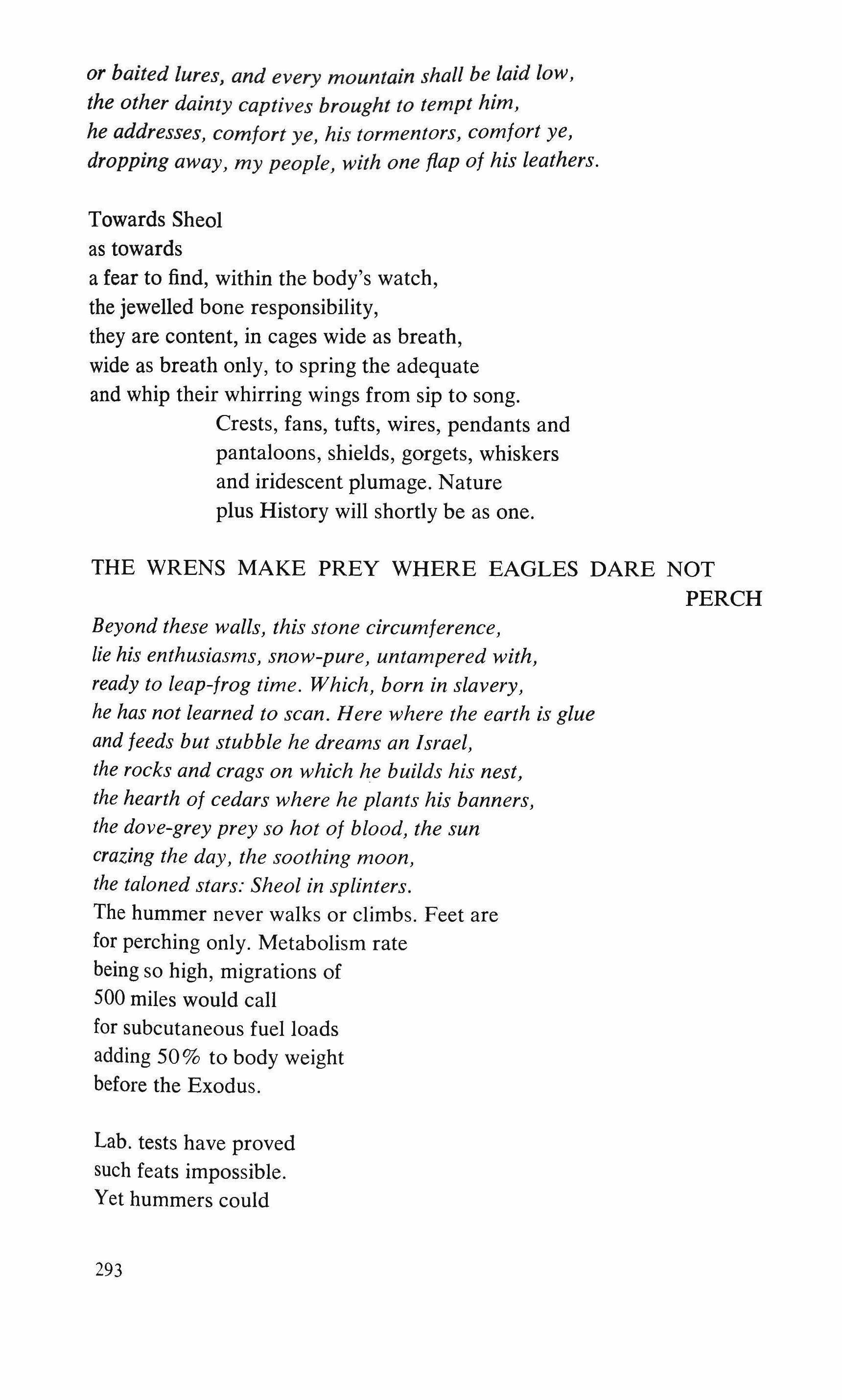
or baited lures, and every mountain shall be laid low, the other dainty captives brought to tempt him, he addresses, comfort ye, his tormentors, comfort ye, dropping away, my people, with one flap of his leathers.
Towards Sheol as towards a fear to find, within the body's watch, the jewelled bone responsibility, they are content, in cages wide as breath, wide as breath only, to spring the adequate and whip their whirring wings from sip to song. Crests, fans, tufts, wires, pendants and pantaloons, shields, gorgets, whiskers and iridescent plumage. Nature plus History will shortly be as one.
THE WRENS MAKE PREY WHERE EAGLES DARE NOT PERCH
Beyond these walls, this stone circumference, lie his enthusiasms, snow-pure, untampered with, ready to leap-frog time. Which, born in slavery, he has not learned to scan. Here where the earth is glue and feeds but stubble he dreams an Israel, the rocks and crags on which he builds his nest, the hearth of cedars where he plants his banners, the dove-grey prey so hot of blood, the sun crazing the day, the soothing moon, the taloned stars: Sheol in splinters. The hummer never walks or climbs. Feet are for perching only. Metabolism rate being so high, migrations of 500 miles would call for subcutaneous fuel loads adding 50% to body weight before the Exodus.
Lab. tests have proved such feats impossible. Yet hummers could
293

back in their days of Nature, before the massacres and slaughters (tears of the Indies), perform it nonetheless twice every year.
THAT IS THE HUM-BIRD NOT MUCH EXCEEDING A BEETLE
Wherefore the king, as all such stories end, will learn his trade. His shadow magnifies the swelling land, stooping to prey grown fat on idleness. He has gone to Pharaoh, who said No. He has decided Yes. He has worked out that frontiers concern subjects who may rot in their colours and emblems if they will. He will shift continents, change poles, night into day, day, night. Freeze deserts, make of the sands his snows.
Fire the snows, renew himself in ice. Quit his armies if need be and resign after Canaan.
Though the city change coin into weapons, and ingots to instruments of war, his lungs will {lower, his heart bear fruit. Mounting up with wings as a storm cloud, unafraid. That the seas may not run dry, nor the rivers falter.
Burying his right wing in orchards and vineyards against the whirlwind bred on Sinai, honey lapped from a lion gut, milk from the mouths of lambs, men lie with beaks and talons, marrow for talismans, where they shall not fear, naked bone, but for him in his air, in this crucible's fire, a throne, a torch of spicesin the fan of his wings now, his resurrected voice, the assent of these palms, in this wind, peace, nor shall there be slaves here any more. Peace. Selah. Poem. Amen.
294
from A Nowhere for Vallejo
"Talla tierra oira en tu silenciar, como nos van cobrando todos el alquiler del mundo donde nos dejas y el valor de aquel pan inacabable."
TRILCE

And they went down into the king-city Tahuantinsuyu four-quarters limbs of man to find the skull happening there first thing on the poet's name who'd become such a hero to his country though he had left it they'd finally put up a statue in the square fronting the church of famine and he walked up to the monument and kissed the poet's name with his hand
In "La Langouste Selon Desir" he heard the wind going through her tears the bird feeds its young in the myth opened its breast blood flowing out flapped lazily over city and harbour catch of fish dying children
Bird-glider over the city wall-wings / oven-beak falls on the statue of the caesar-poet bread on the sea
Where they buy and sell a country we were talking about the dead with the rich eating their platos criollos in "The House of the Thirty Coins" talking with the satellite vendors with which the country we don't know listens to the one we do
1.
295
In a city full of movement with the woman he loves crying for the caesar-poet to come back and eat them alive one by one the friends the enemies
eat them all in words born and dead at this table and then a constant quiet
murmur about gold
he hears the wind going through her tears her tears the queen-city married a king with her hair in his eyes above the grave of the caesar-poet he feeds the children crying in her tears
I/.
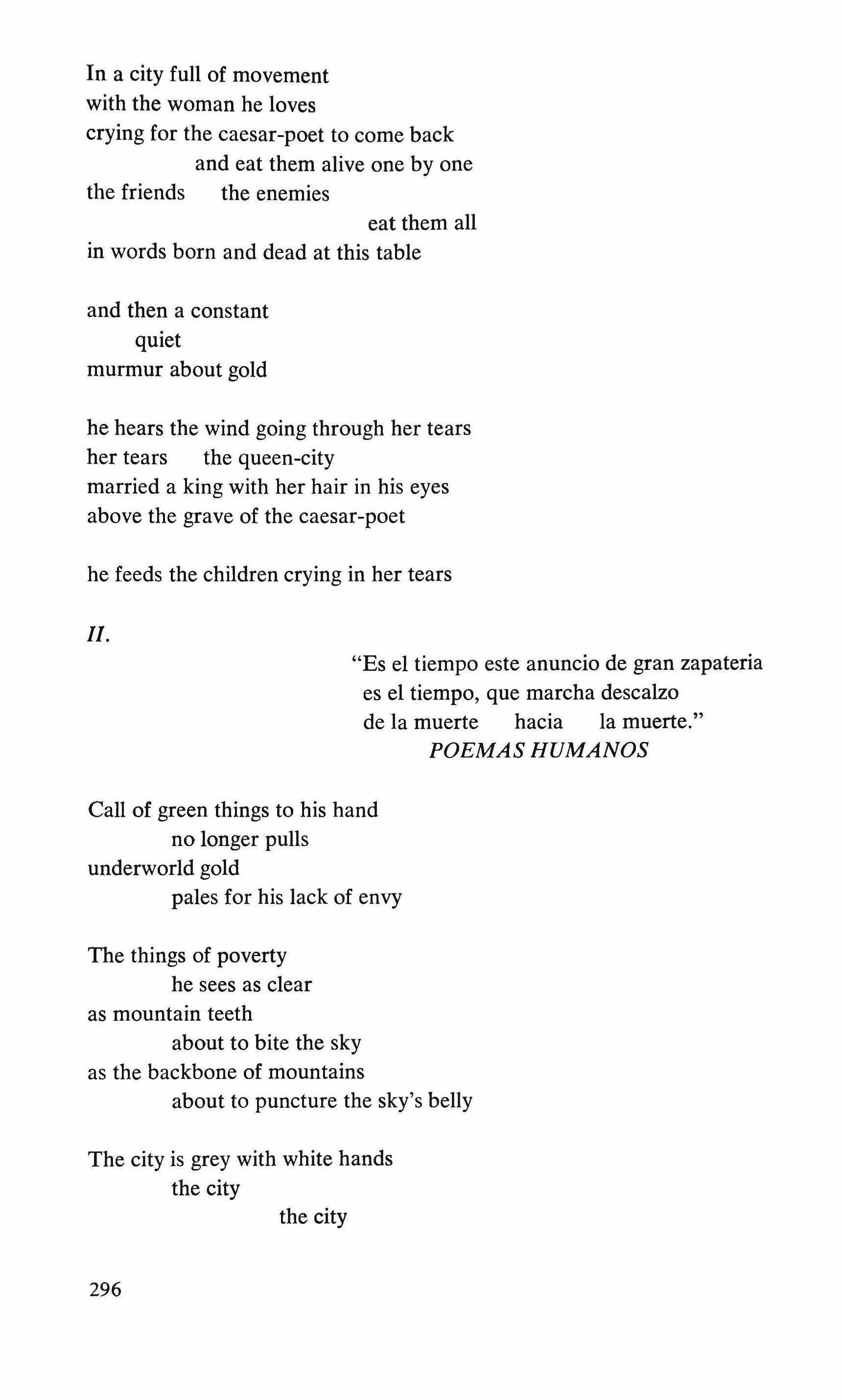
"Es el tiempo este anuncio de gran zapateria es el tiempo, que marcha descalzo de la muerte hacia la muerte."
POEMAS HUMANOS
Call of green things to his hand no longer pulls underworld gold pales for his lack of envy
The things of poverty he sees as clear as mountain teeth about to bite the sky as the backbone of mountains about to puncture the sky's belly
The city is grey with white hands the city the city
296
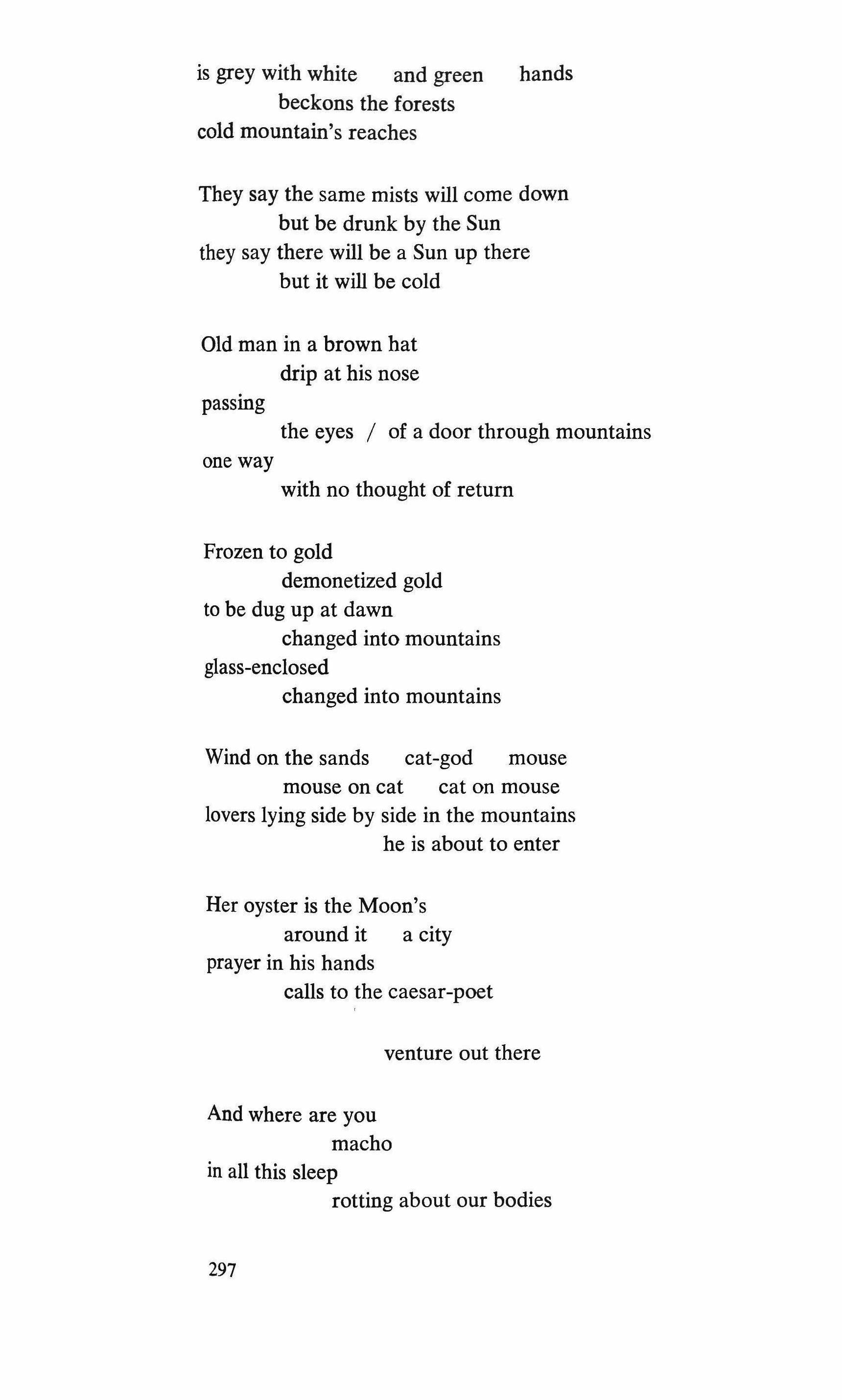
is grey with white and green hands beckons the forests cold mountain's reaches
They say the same mists will come down but be drunk by the Sun they say there will be a Sun up there but it will be cold
Old man in a brown hat drip at his nose passing the eyes I of a door through mountains one way with no thought of return
Frozen to gold demonetized gold to be dug up at dawn changed into mountains glass-enclosed changed into mountains
Wind on the sands cat-god mouse mouse on cat cat on mouse lovers lying side by side in the mountains he is about to enter
Her oyster is the Moon's around it a city prayer in his hands calls to the caesar-poet
venture out there
And where are you macho in all this sleep rotting about our bodies
297
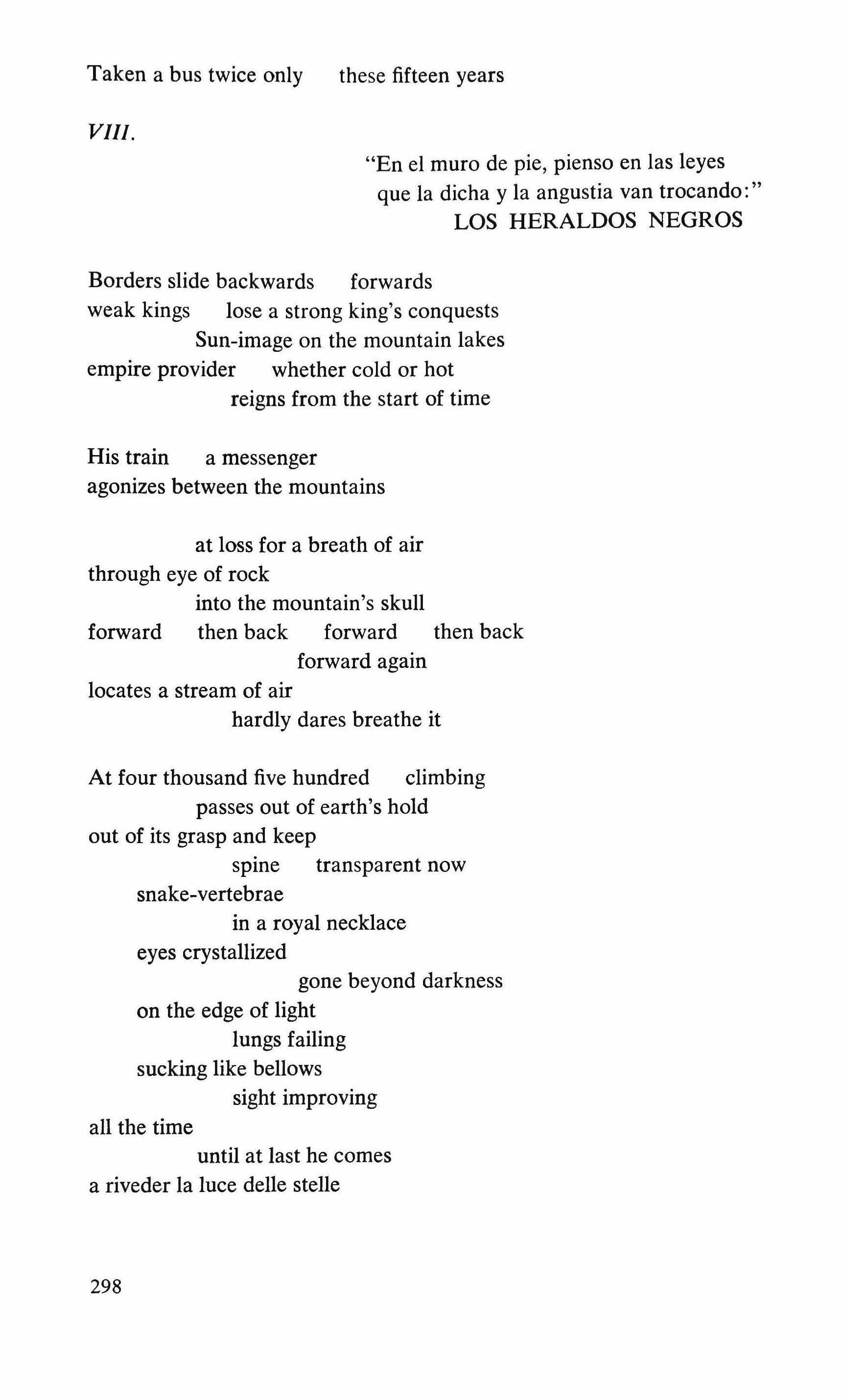
Taken a bus twice only these fifteen years VIII.
"En el muro de pie, pienso en las leyes que la dicha y la angustia van trocando:"
LOS HERALDOS NEGROS
Borders slide backwards forwards weak kings lose a strong king's conquests Sun-image on the mountain lakes empire provider whether cold or hot reigns from the start of time
His train a messenger agonizes between the mountains at loss for a breath of air through eye of rock into the mountain's skull forward then back forward then back forward again locates a stream of air hardly dares breathe it
At four thousand five hundred climbing passes out of earth's hold out of its grasp and keep spme transparent now snake-vertebrae in a royal necklace eyes crystallized gone beyond darkness on the edge of light lungs failing sucking like bellows sight improving all the time until at last he comes a riveder la luce delle stelle
298
And he has seen gigantes I monstruos teeth prison-bars gargantas famine duefios de los montes the archangelical Michel et toute sa compagnie du temps de sa jeunesse in his day of youth
Where Justice goes puffs along tracks with her dimmed eyes breasts flanks of mountains purse-bellied after many children and cleft of earthquake
Sun astride mountains mail of gold XIV.
"Callate. Nadie sabe que estas en mi, toda entera. Callate. No respires."
TRILCE
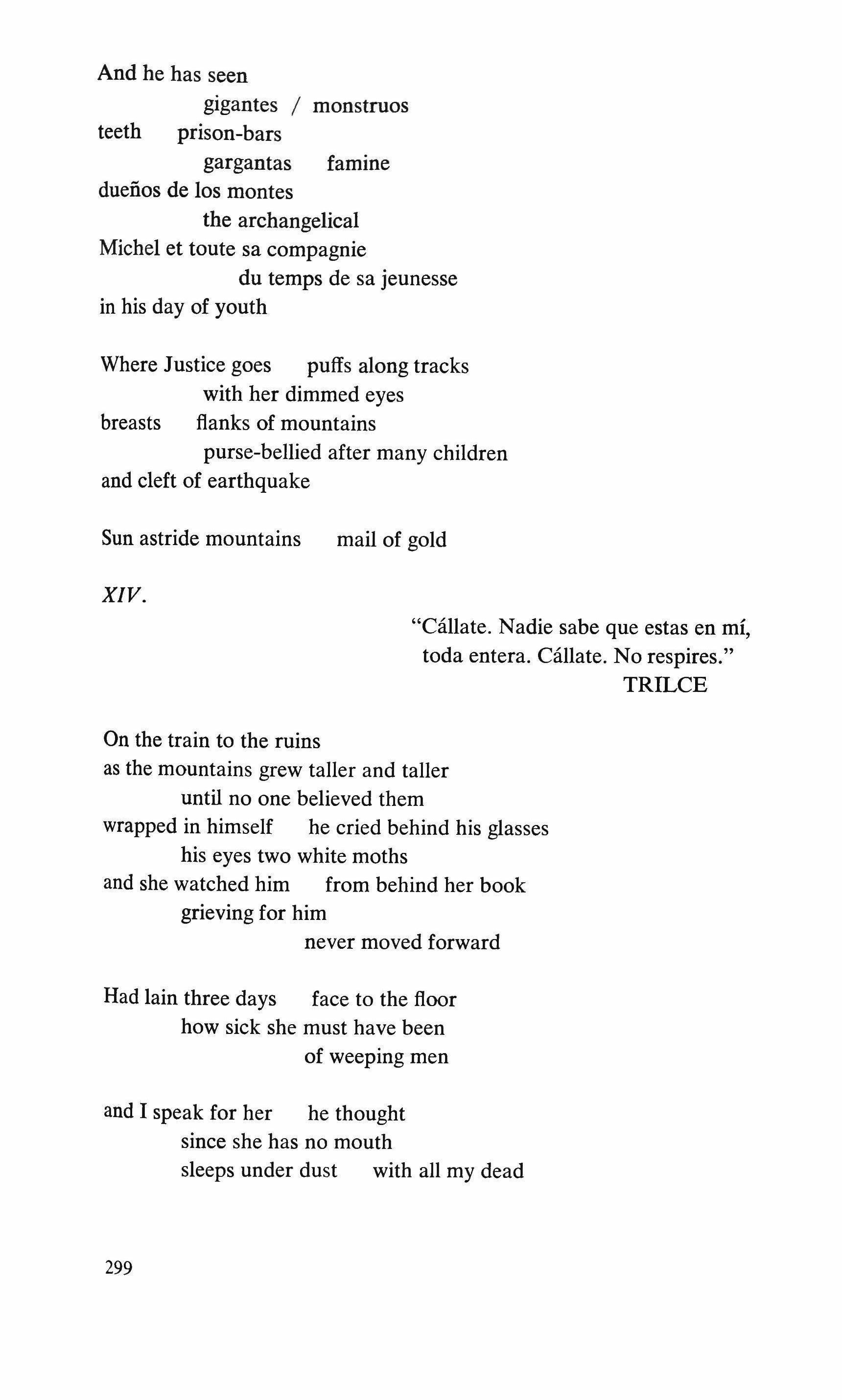
On the train to the ruins as the mountains grew taller and taller until no one believed them wrapped in himself he cried behind his glasses his eyes two white moths and she watched him from behind her book grieving for him
never moved forward
Had lain three days face to the floor how sick she must have been of weeping men and I speak for her he thought since she has no mouth sleeps under dust with all my dead
299
Coming back from the ruins meaning of height made clear they touched each other's hands as each marvel appeared breasts of a Moon survivor hard nipples bitter ink nestled in her white shirt brushing his cheek as they moved
A preacher at the back of the train was telling young men how to live whose eyes already knew
Gringas in nearby seats a bitter tale of dollars things they had failed to buy
Eyes of puma fox llama rushes lying down in the fire eyes of deer in evening sunshine eyes of adobe huacos eyes in which corn has brewed eyes of charcoal cinders eyes of alpaca wool in mist under the smoke of his hurt
We shall arrive by night he thought we shall arrive in the city by night the city we've not seen for some time no one will know we've come we'll go about our dowry our marvelous marriage-bed a little later yet be heard of elsewhere
XVI.

"No es grato morir, senor, si en la vida nada se deja y si en la muerte nada es posible, sino sobre 10 que pudo dejarse en la vida."
;300
"Y
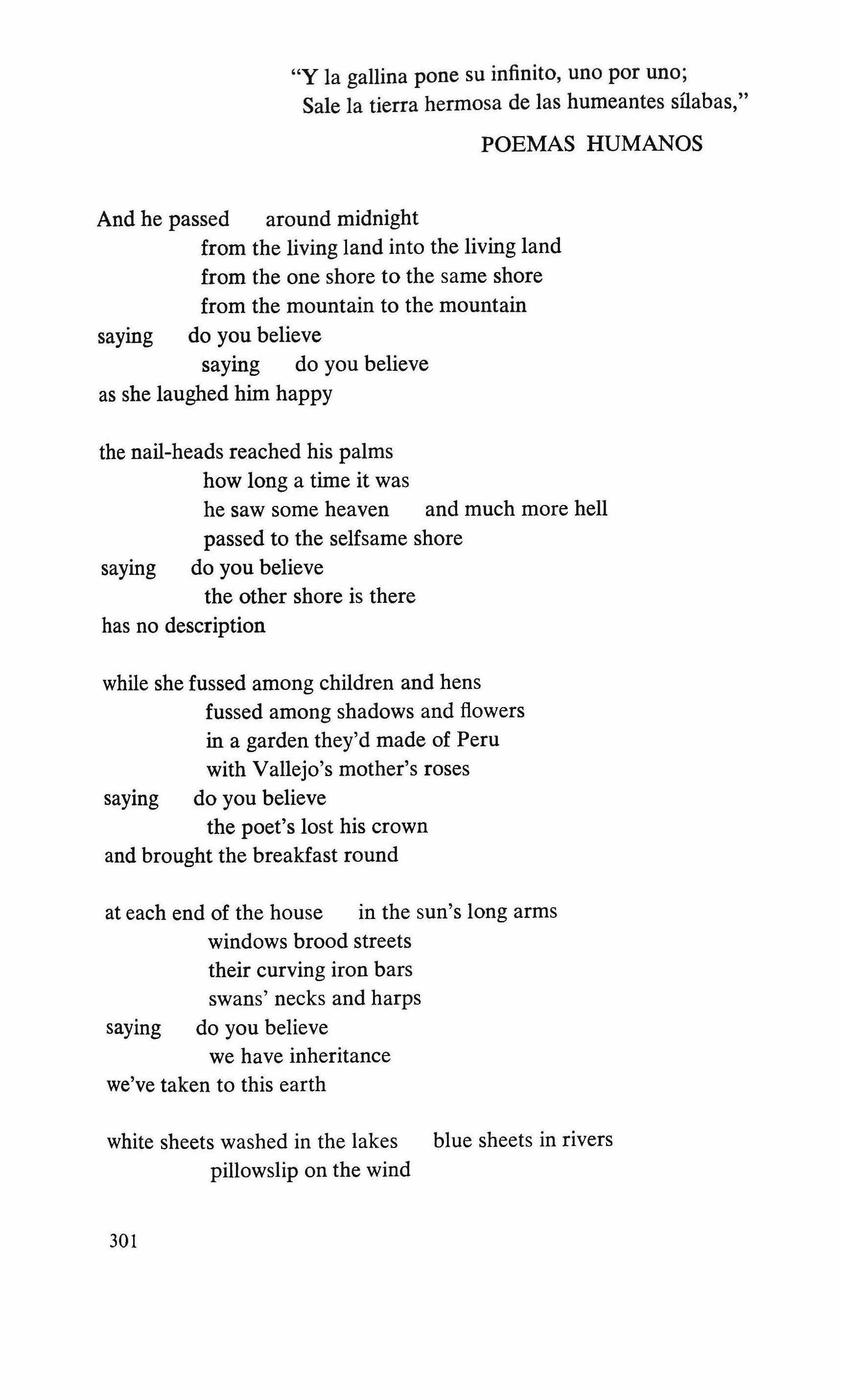
POEMAS HUMANOS
And he passed around midnight from the living land into the living land from the one shore to the same shore from the mountain to the mountain saying do you believe saying do you believe as she laughed him happy the nail-heads reached his palms how long a time it was he saw some heaven and much more hell passed to the selfsame shore saying do you believe the other shore is there has no description while she fussed among children and hens fussed among shadows and flowers in a garden they'd made of Peru with Vallejo's mother's roses saying do you believe the poet's lost his crown and brought the breakfast round at each end of the house in the sun's long arms windows brood streets their curving iron bars swans' necks and harps saying do you believe we have inheritance we've taken to this earth
white sheets washed in the lakes blue sheets in rivers pillowslip on the wind
las
la gallina pone su infinito, uno por uno; Sale la tierra hermosa de
humeantes sflabas,"
301
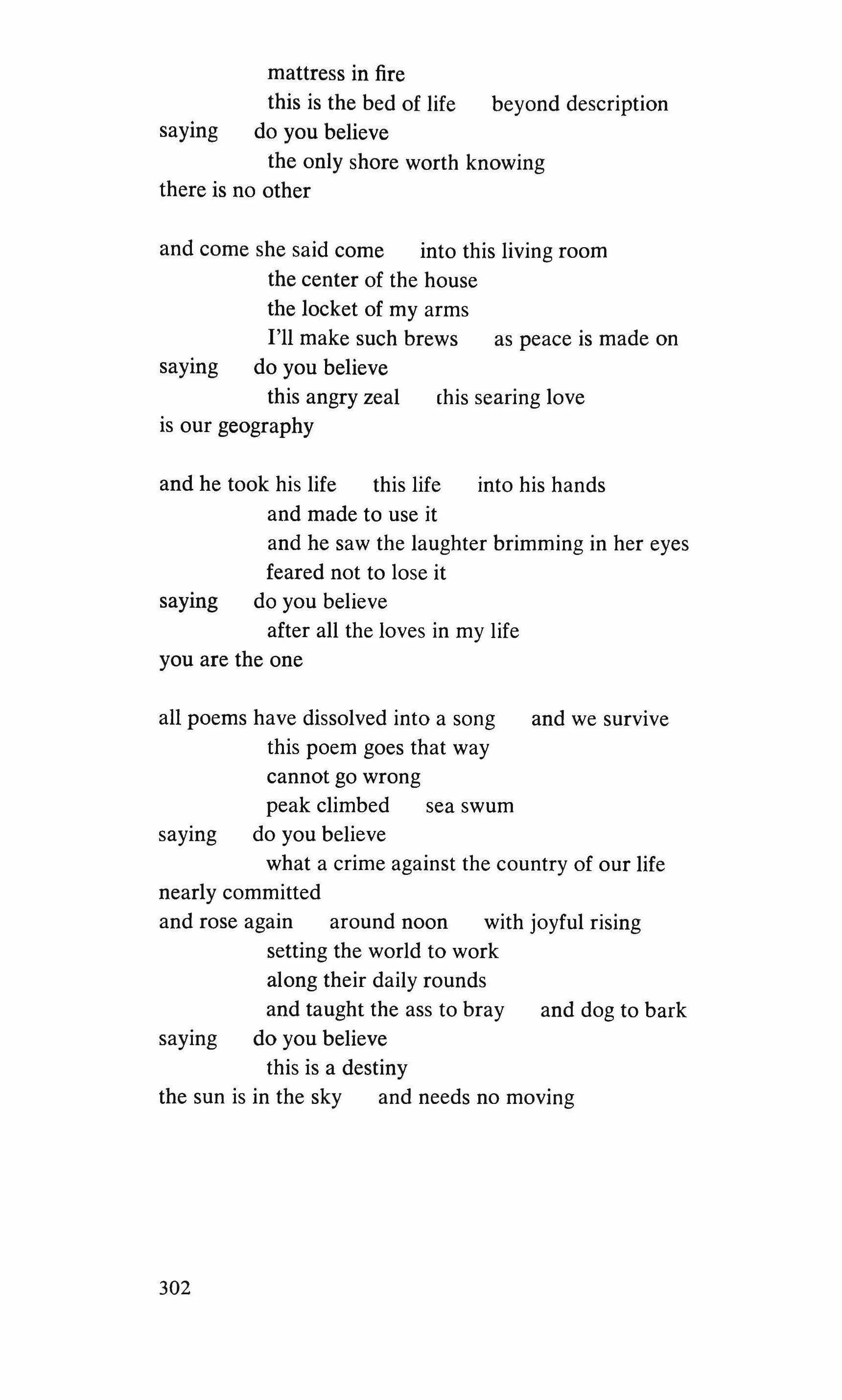
mattress in fire this is the bed of life beyond description saying do you believe the only shore worth knowing there is no other and come she said come into this living room the center of the house the locket of my arms I'll make such brews as peace is made on saying do you believe this angry zeal is our geography (his searing love and he took his life this life into his hands and made to use it and he saw the laughter brimming in her eyes feared not to lose it saying do you believe after all the loves in my life you are the one all poems have dissolved into a song this poem goes that way cannot go wrong peak climbed sea swum do you believe and we survive saying what a crime against the country of our life nearly committed and rose again around noon with joyful rising setting the world to work along their daily rounds and taught the ass to bray and dog to bark do you believe saying this is a destiny the sun is in the sky and needs no moving
302
from The Beautiful Contradictions
ELEVEN
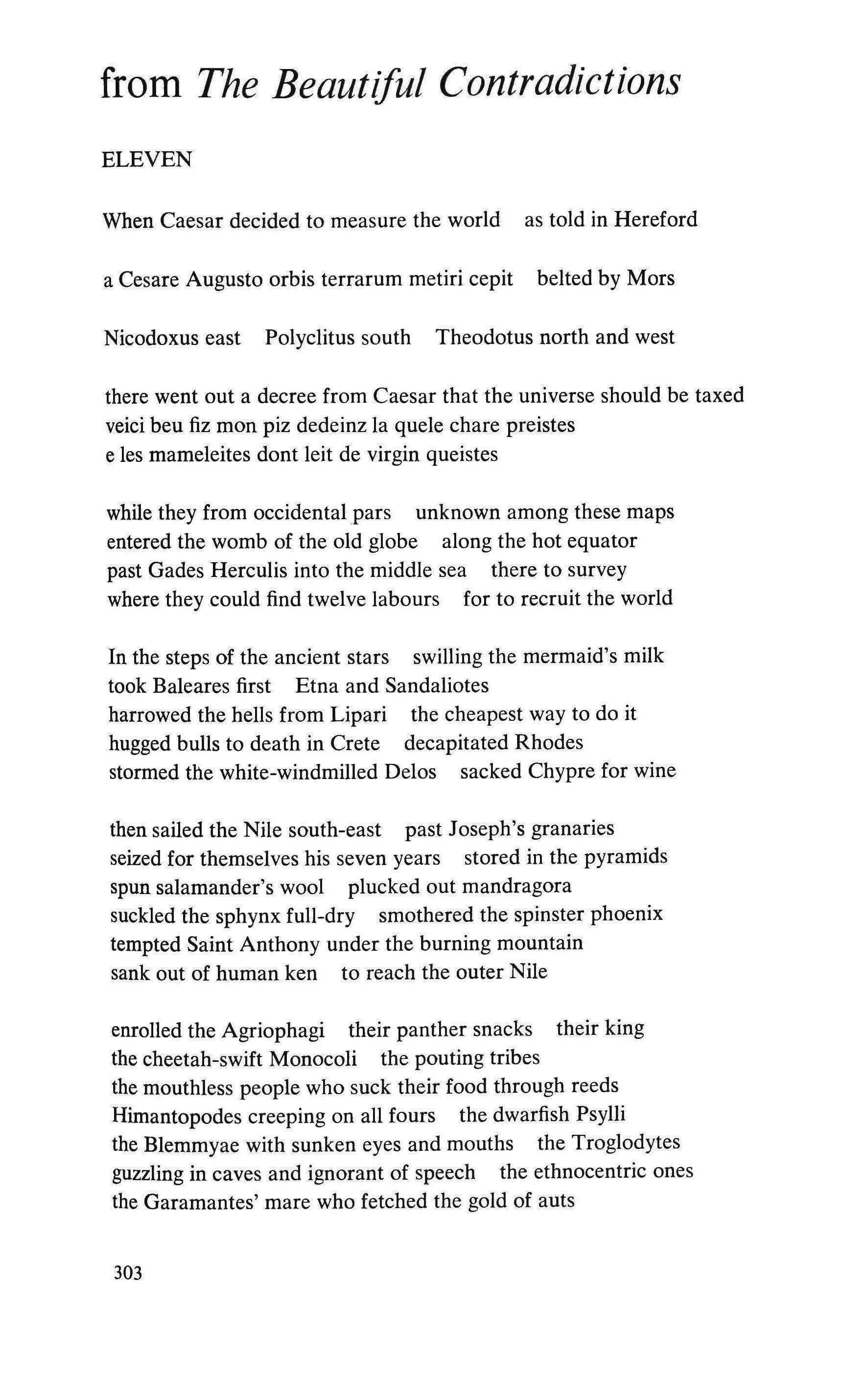
When Caesar decided to measure the world as told in Hereford
a Cesare Augusto orbis terrarum metiri cepit belted by Mors
Nicodoxus east Polyclitus south Theodotus north and west
there went out a decree from Caesar that the universe should be taxed veici beu fiz mon piz dedeinz la quele chare preistes e les mameleites dont leit de virgin queistes
while they from occidental pars unknown among these maps entered the womb of the old globe along the hot equator past Gades Herculis into the middle sea there to survey where they could find twelve labours for to recruit the world
In the steps of the ancient stars swilling the mermaid's milk took Baleares first Etna and Sandaliotes harrowed the hells from Lipari the cheapest way to do it hugged bulls to death in Crete decapitated Rhodes stormed the white-windmilled Delos sacked Chypre for wine
then sailed the Nile south-east past Joseph's granaries seized for themselves his seven years stored in the pyramids spun salamander's wool plucked out mandragora suckled the sphynx full-dry smothered the spinster phoenix tempted Saint Anthony under the burning mountain sank out of human ken to reach the outer Nile
enrolled the Agriophagi their panther snacks their king the cheetah-swift Monocoli the pouting tribes the mouthless people who suck their food through reeds
Hirnantopodes creeping on all fours the dwarfish Psylli the Blemmyae with sunken eyes and mouths the Troglodytes guzzling in caves and ignorant of speech the ethnocentric ones the Garamantes' mare who fetched the gold of auts
303
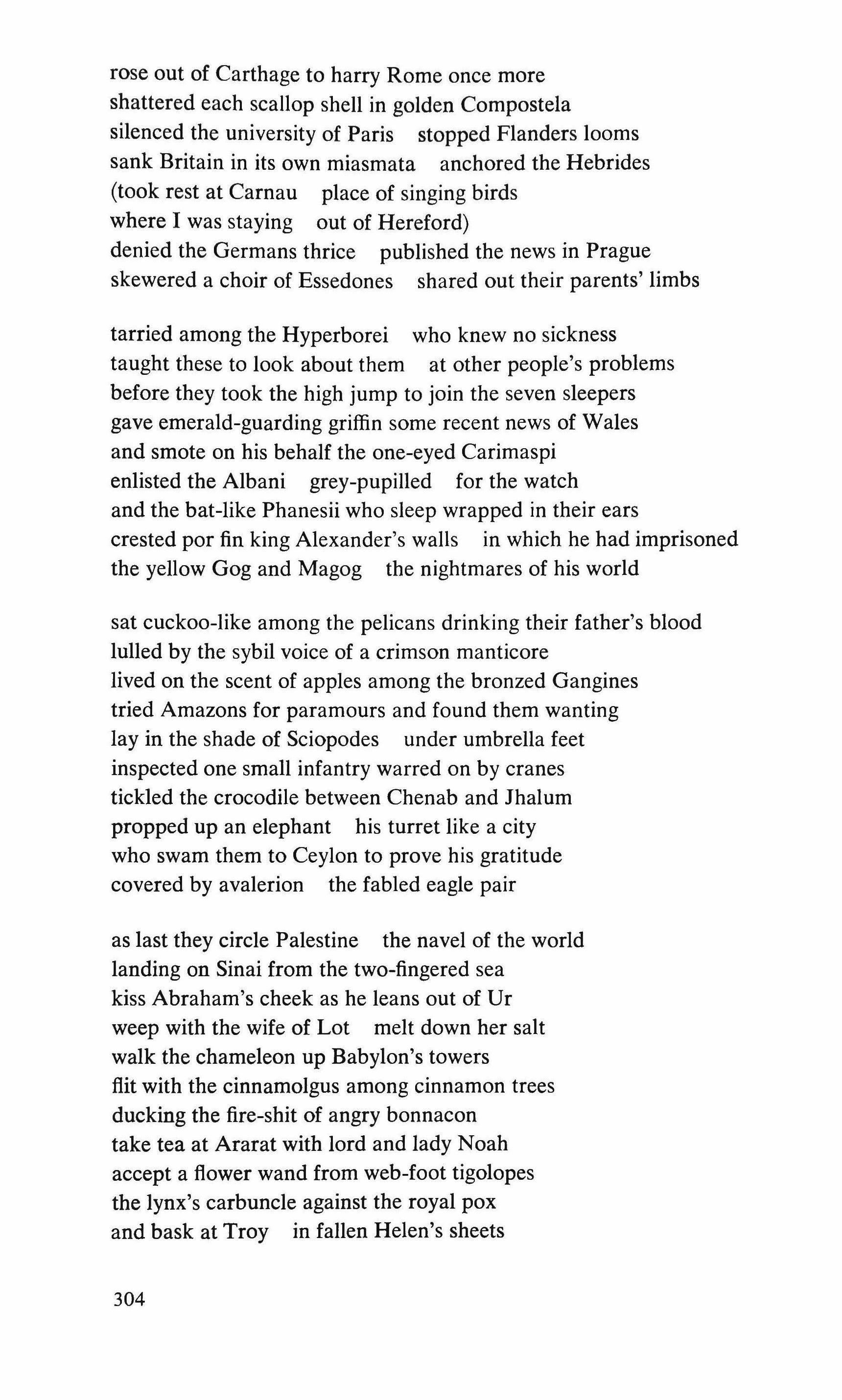
rose out of Carthage to harry Rome once more shattered each scallop shell in golden Compostela silenced the university of Paris stopped Flanders looms sank Britain in its own miasmata anchored the Hebrides (took rest at Carnau place of singing birds where I was staying out of Hereford) denied the Germans thrice published the news in Prague skewered a choir of Essedones shared out their parents' limbs
tarried among the Hyperborei who knew no sickness taught these to look about them at other people's problems before they took the high jump to join the seven sleepers gave emerald-guarding griffin some recent news of Wales and smote on his behalf the one-eyed Carimaspi enlisted the Albani grey-pupilled for the watch and the bat-like Phanesii who sleep wrapped in their ears crested por fin king Alexander's walls in which he had imprisoned the yellow Gog and Magog the nightmares of his world
sat cuckoo-like among the pelicans drinking their father's blood lulled by the sybil voice of a crimson manticore lived on the scent of apples among the bronzed Gangines tried Amazons for paramours and found them wanting lay in the shade of Sciopodes under umbrella feet inspected one small infantry warred on by cranes tickled the crocodile between Chenab and Jhalum propped up an elephant his turret like a city who swam them to Ceylon to prove his gratitude covered by avalerion the fabled eagle pair
as last they circle Palestine the navel of the world landing on Sinai from the two-fingered sea kiss Abraham's cheek as he leans out of Ur weep with the wife of Lot melt down her salt walk the chameleon up Babylon's towers flit with the cinnamolgus among cinnamon trees ducking the fire-shit of angry bonnacon take tea at Ararat with lord and lady Noah accept a flower wand from web-foot tigolopes the lynx's carbuncle against the royal pox and bask at Troy in fallen Helen's sheets
304

Now from corona mundi Caesar in judgment sits and in the hunter's mirror loses his cubs again down from the buried rivers under paradise and from Saint Michael's eyes as he shuts down the east a rain of spears fixes the stigmata into the carcase on hillock Calvarie
The dry tree withers the dry tree waxes green as the western lords survey Jerusalem the twelve winds blow from the encompassed earth the twelve apostles sing in the abundance of waters as they lie in the Jordan surrounded with light Jerusalem the heart of heaven shimmers among the waves their losses have been few as yet they are greenly remembered Javier Heraud poet shot in Maldonado Peru
Arbelio Ramirez historian in Montevideo Camillo Torres priest in Chucuri Colombia Danilo Rosalez Arguello doctor in Matagalpa sierra Jorge Vasquez Viana poet in the Bolivian sierra Camillo Cienfuegos doctor drowned at sea Cuba Ramon Soto Rojas professor drowned in sky Venezuela Otto Rene Castillo poet burned alive Guatemala Ernesto Guevara "prince" deposed near Higueras and other names that poetry cannot fit into last lines they died as Jerusalem lay in the waters about us ready to bud this year their resurrected mother
FIFTEEN
The elders at the zenith of their power look down the sky from the decline of the mountain the ocean slide the homeward slope an uninhabited moon in the path of the westering sun their hair shining theirs is forgetfulness intermittent recognition remembrances of youth greatly outnumbering recent events they look down with patience mostly they range the empty desert they are few and far between they go back into the dream companionless they sit for hours on end throwing their shadows on time their blood spurts into the earth they worship
305
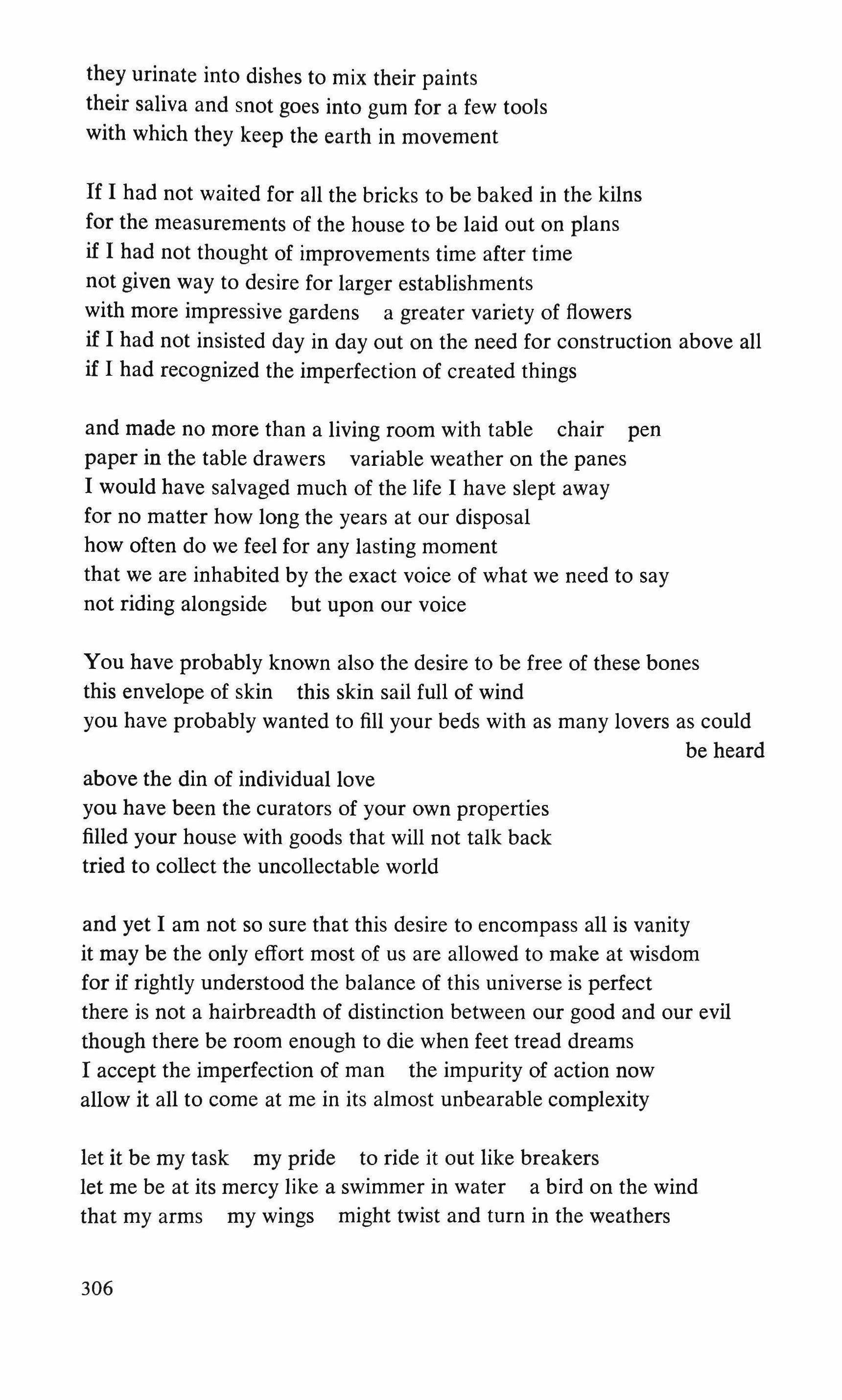
they urinate into dishes to mix their paints their saliva and snot goes into gum for a few tools with which they keep the earth in movement
If I had not waited for all the bricks to be baked in the kilns for the measurements of the house to be laid out on plans if I had not thought of improvements time after time not given way to desire for larger establishments with more impressive gardens a greater variety of flowers if I had not insisted day in day out on the need for construction above all if I had recognized the imperfection of created things
and made no more than a living room with table chair pen paper in the table drawers variable weather on the panes I would have salvaged much of the life I have slept away for no matter how long the years at our disposal how often do we feel for any lasting moment that we are inhabited by the exact voice of what we need to say not riding alongside but upon our voice
You have probably known also the desire to be free of these bones this envelope of skin this skin sail full of wind you have probably wanted to fill your beds with as many lovers as could be heard above the din of individual love you have been the curators of your own properties filled your house with goods that will not talk back tried to collect the uncollectable world
and yet I am not so sure that this desire to encompass all is vanity it may be the only effort most of us are allowed to make at wisdom for if rightly understood the balance of this universe is perfect there is not a hairbreadth of distinction between our good and our evil though there be room enough to die when feet tread dreams r accept the imperfection of man the impurity of action now allow it all to come at me in its almost unbearable complexity
let it be my task my pride to ride it out like breakers let me be at its mercy like a swimmer in water a bird on the wind that my arms my wings might twist and turn in the weathers
306
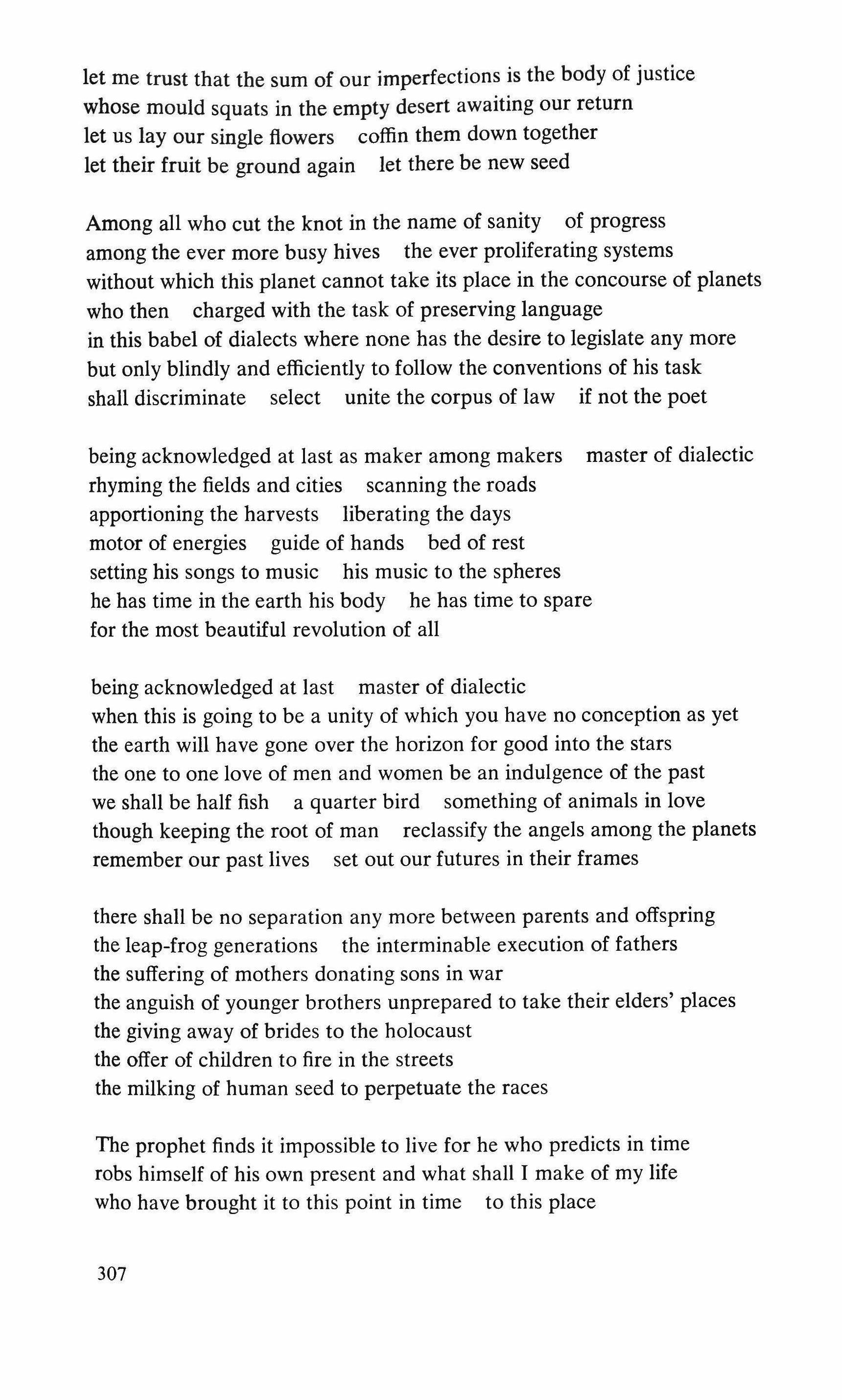
let me trust that the sum of our imperfections is the body of justice whose mould squats in the empty desert awaiting our return let us lay our single flowers coffin them down together let their fruit be ground again let there be new seed
Among all who cut the knot in the name of sanity of progress among the ever more busy hives the ever proliferating systems without which this planet cannot take its place in the concourse of planets who then charged with the task of preserving language in this babel of dialects where none has the desire to legislate any more but only blindly and efficiently to follow the conventions of his task shall discriminate select unite the corpus of law if not the poet
being acknowledged at last as maker among makers master of dialectic rhyming the fields and cities scanning the roads apportioning the harvests liberating the days motor of energies guide of hands bed of rest setting his songs to music his music to the spheres he has time in the earth his body he has time to spare for the most beautiful revolution of all
being acknowledged at last master of dialectic when this is going to be a unity of which you have no conception as yet the earth will have gone over the horizon for good into the stars the one to one love of men and women be an indulgence of the past we shall be half fish a quarter bird something of animals in love though keeping the root of man reclassify the angels among the planets remember our past lives set out our futures in their frames
there shall be no separation any more between parents and offspring the leap-frog generations the interminable execution of fathers the suffering of mothers donating sons in war the anguish of younger brothers unprepared to take their elders' places the giving away of brides to the holocaust the offer of children to fire in the streets the milking of human seed to perpetuate the races
The prophet finds it impossible to live for he who predicts in time robs himself of his own present and what shall I make of my life who have brought it to this point in time to this place
307
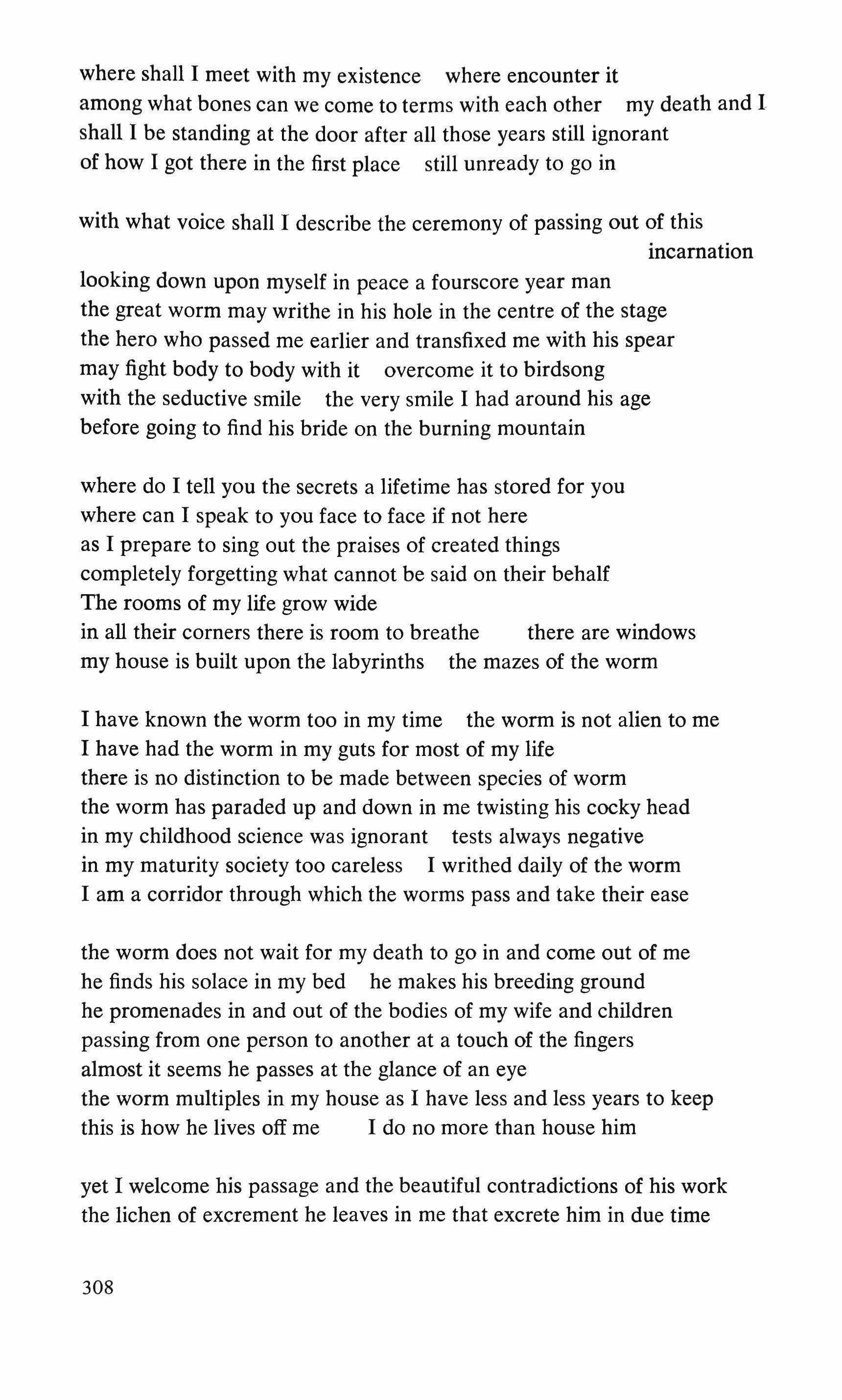
where shall I meet with my existence where encounter it among what bones can we come to terms with each other my death and 1 shall I be standing at the door after all those years still ignorant of how I got there in the first place still unready to go in
with what voice shall I describe the ceremony of passing out of this incarnation
looking down upon myself in peace a fourscore year man the great worm may writhe in his hole in the centre of the stage the hero who passed me earlier and transfixed me with his spear may fight body to body with it overcome it to birdsong with the seductive smile the very smile I had around his age before going to find his bride on the burning mountain
where do I tell you the secrets a lifetime has stored for you where can I speak to you face to face if not here as I prepare to sing out the praises of created things completely forgetting what cannot be said on their behalf The rooms of my life grow wide in all their corners there is room to breathe there are windows my house is built upon the labyrinths the mazes of the worm
I have known the worm too in my time the worm is not alien to me I have had the worm in my guts for most of my life there is no distinction to be made between species of worm the worm has paraded up and down in me twisting his cocky head in my childhood science was ignorant tests always negative in my maturity society too careless I writhed daily of the worm I am a corridor through which the worms pass and take their ease
the worm does not wait for my death to go in and come out of me he finds his solace in my bed he makes his breeding ground he promenades in and out of the bodies of my wife and children passing from one person to another at a touch of the fingers almost it seems he passes at the glance of an eye the worm multiples in my house as I have less and less years to keep this is how he lives off me I do no more than house him
yet I welcome his passage and the beautiful contradictions of his work the lichen of excrement he leaves in me that excrete him in due time
308
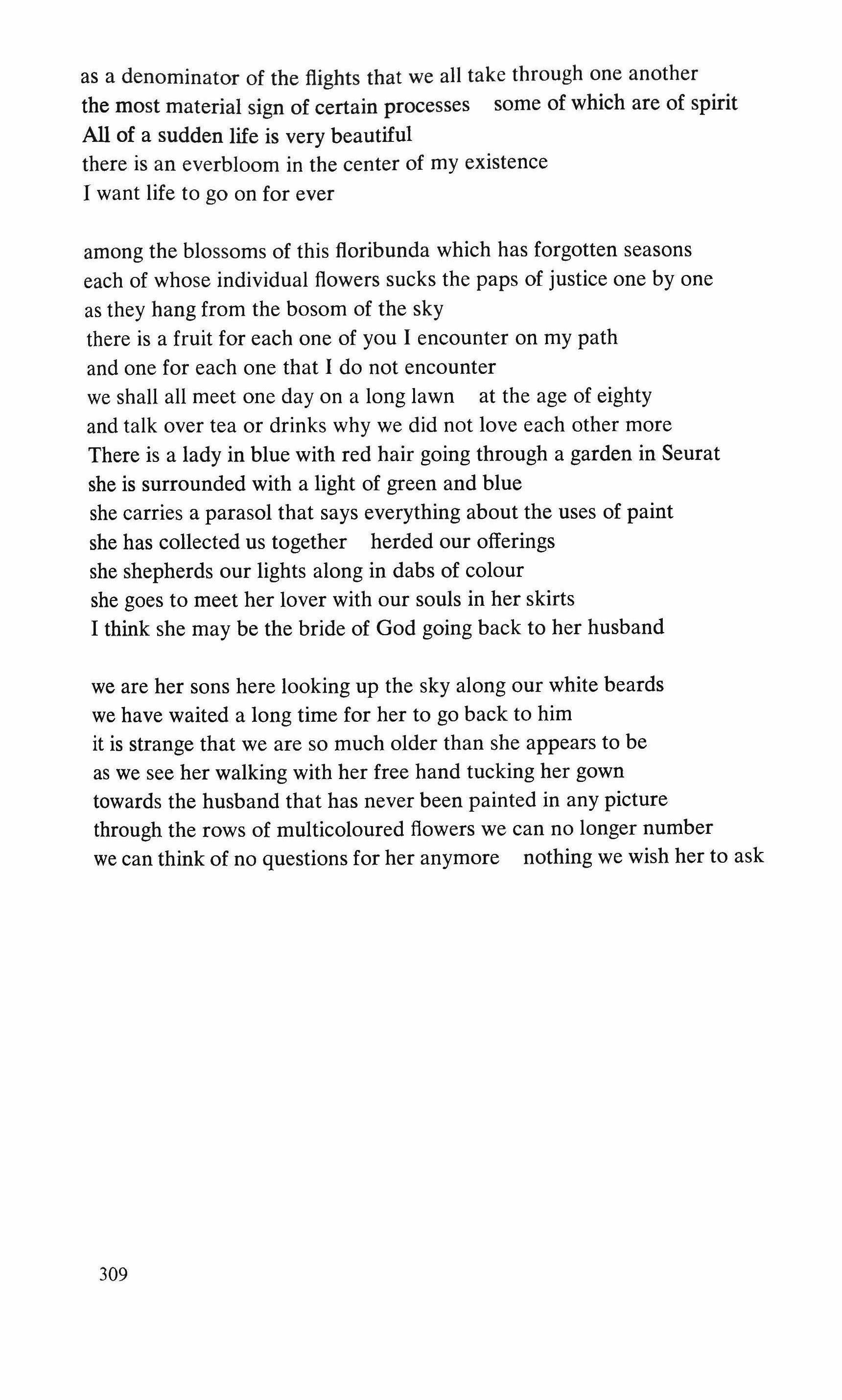
as a denominator of the flights that we all take through one another the most material sign of certain processes some of which are of spirit All of a sudden life is very beautiful there is an everbloom in the center of my existence I want life to go on for ever
among the blossoms of this floribunda which has forgotten seasons each of whose individual flowers sucks the paps of justice one by one as they hang from the bosom of the sky there is a fruit for each one of you I encounter on my path and one for each one that I do not encounter we shall all meet one day on a long lawn at the age of eighty and talk over tea or drinks why we did not love each other more There is a lady in blue with red hair going through a garden in Seurat she is surrounded with a light of green and blue she carries a parasol that says everything about the uses of paint she has collected us together herded our offerings she shepherds our lights along in dabs of colour she goes to meet her lover with our souls in her skirts I think she may be the bride of God going back to her husband
we are her sons here looking up the sky along our white beards we have waited a long time for her to go back to him it is strange that we are so much older than she appears to be as we see her walking with her free hand tucking her gown towards the husband that has never been painted in any picture through the rows of multicoloured flowers we can no longer number we can think of no questions for her anymore nothing we wish her to ask
309
TOM RAWORTH
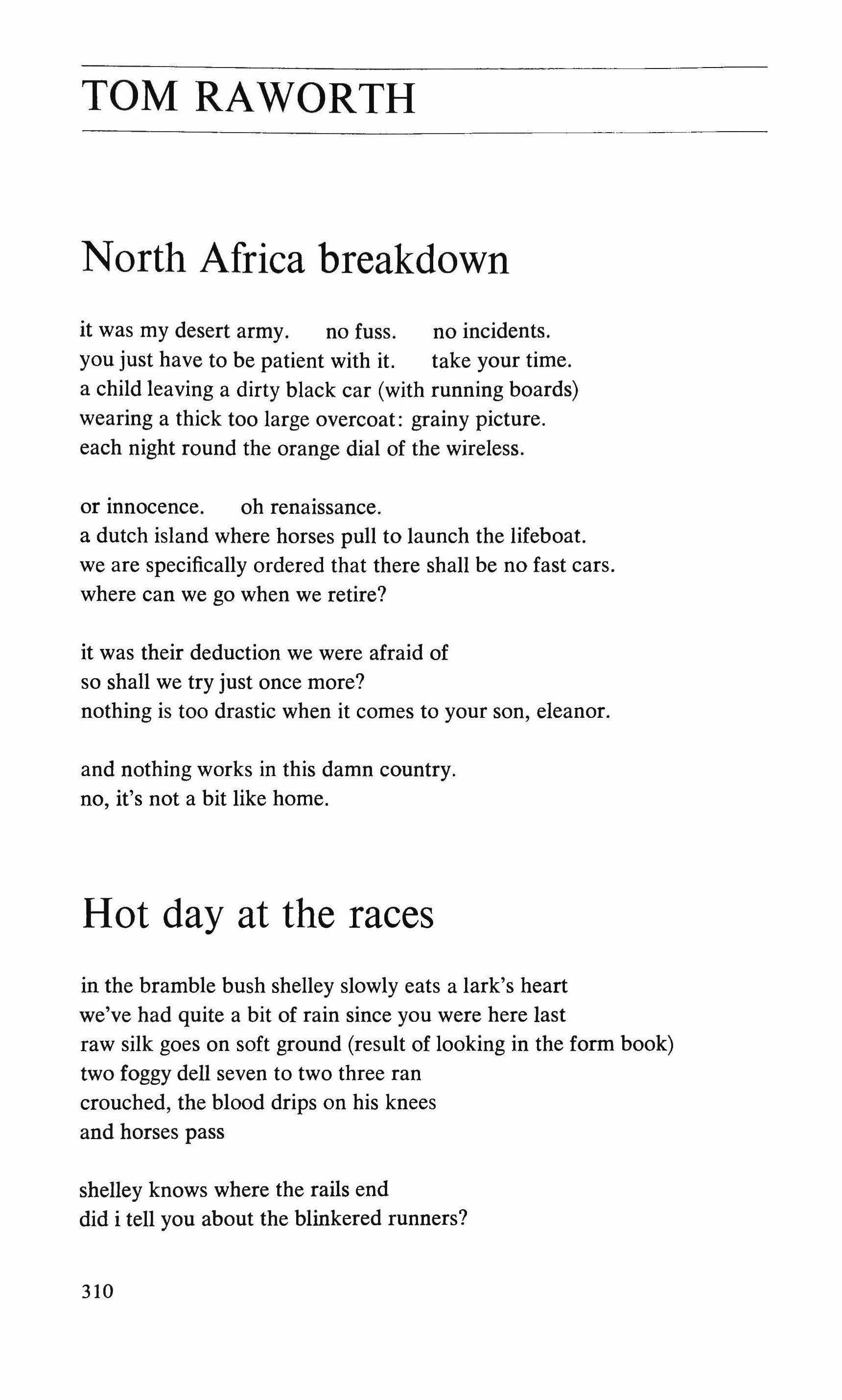
North Africa breakdown
it was my desert army. no fuss. no incidents. you just have to be patient with it. take your time. a child leaving a dirty black car (with running boards) wearing a thick too large overcoat: grainy picture. each night round the orange dial of the wireless. or innocence. oh renaissance. a dutch island where horses pull to launch the lifeboat. we are specifically ordered that there shall be no fast cars. where can we go when we retire?
it was their deduction we were afraid of so shall we try just once more? nothing is too drastic when it comes to your son, eleanor. and nothing works in this damn country. no, it's not a bit like home.
Hot day at the races
in the bramble bush shelley slowly eats a lark's heart we've had quite a bit of rain since you were here last raw silk goes on soft ground (result of looking in the form book) two foggy dell seven to two three ran crouched, the blood drips on his knees and horses pass
shelley knows where the rails end did i tell you about the blinkered runners?
310

shelley is waiting with a crossbow for his rival, the jockey all day he's watched the races from his bush now, with eight and a half furlongs to go raw silk at least four lengths back disputing third place he takes aim and horses pass his rival, the jockey, soars in the air and falls. the lark's beak neatly pierces his eye
Here in Polynia
horses move sideways to start this is the burden of my poem the west to start as the white horse has hooves so have i
the room is divided by the windows her melody ran before me into the arroyo hair, in a band, what became of her letters inscribed in the cyrillic alphabet she had forgotten
now it is night, the night that is around each city and only the horses stir his body is an anchor between the boulders
the west ah see how my penny has on it a chicken in the mementoes of my mind the decimal system has some uses nothing can be as it used to be the old times are going, ada
he is training the circling white horse to ride without hearing
311

You were wearing blue
the explosions are nearer this evening the last train leaves for the south at six tomorrow the announcements will be in a different language
i chew the end of a match the tips of my finger and thumb are sticky
i will wait at the station and you will send a note, i will read it it will be raining our shadows in the electric light
when i was eight they taught me real writing to join up the letters
listen you said i preferred to look at the sea. everything stops there at strange angles
only the boats spoil it making you focus further
Sliding two mirrors
sliding two mirrors together to make a puzzle of his face
oh she said moving across the room 19 years after the liberation i arrive there soldier carrying a guitar a ring
312
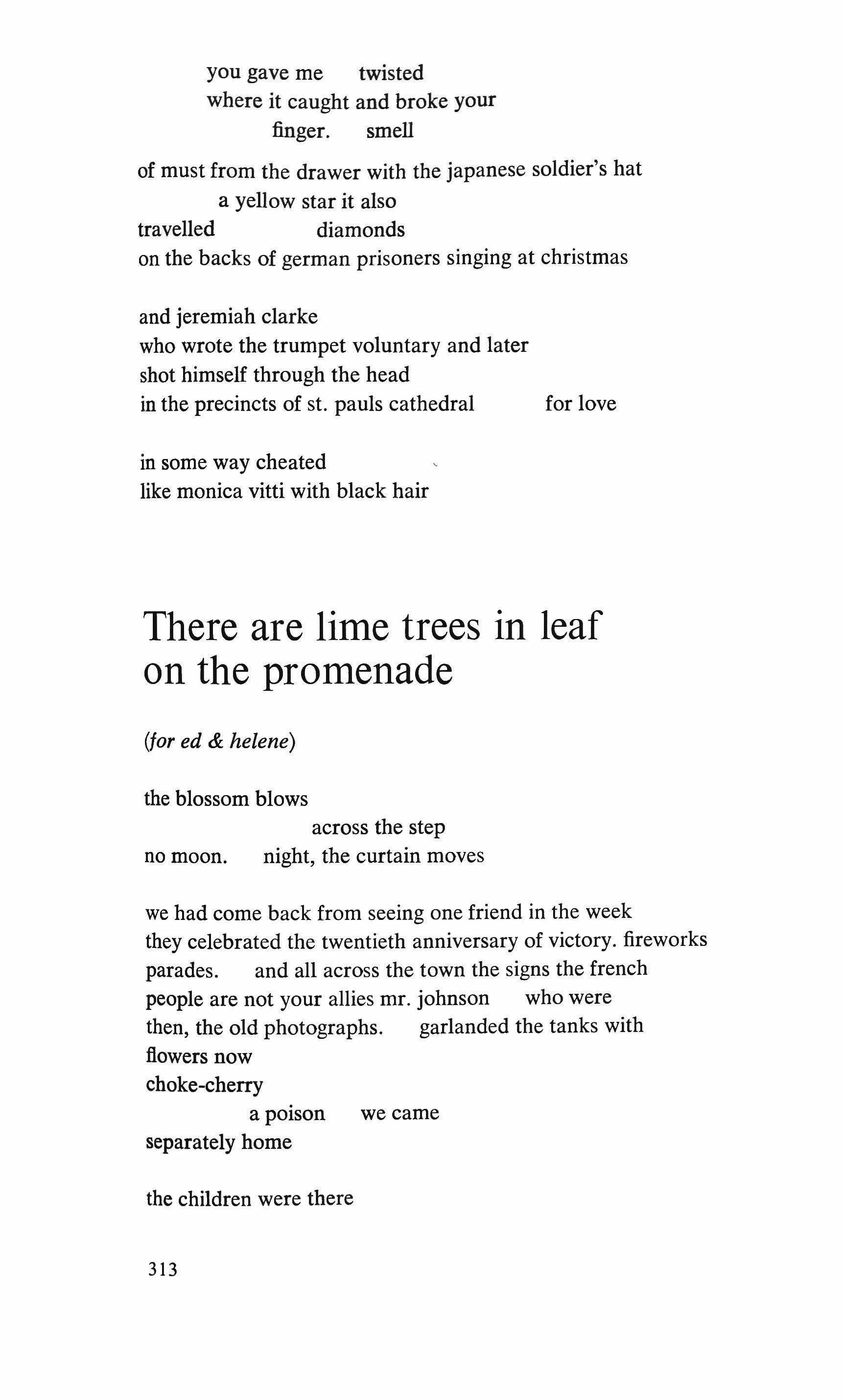
you gave me twisted where it caught and broke your finger. smell
of must from the drawer with the japanese soldier's hat a yellow star it also travelled diamonds on the backs of german prisoners singing at christmas and jeremiah clarke who wrote the trumpet voluntary and later shot himself through the head in the precincts of st. pauls cathedral for love
in some way cheated like monica vitti with black hair
There are lime trees in leaf on the promenade
(for ed & helene)
the blossom blows no moon.
across the step night, the curtain moves
we had come back from seeing one friend in the week they celebrated the twentieth anniversary of victory. fireworks parades. and all across the town the signs the french people are not your allies mr. johnson who were then, the old photographs. garlanded the tanks with flowers now choke-cherry a poison we came separately home
the children were there 313
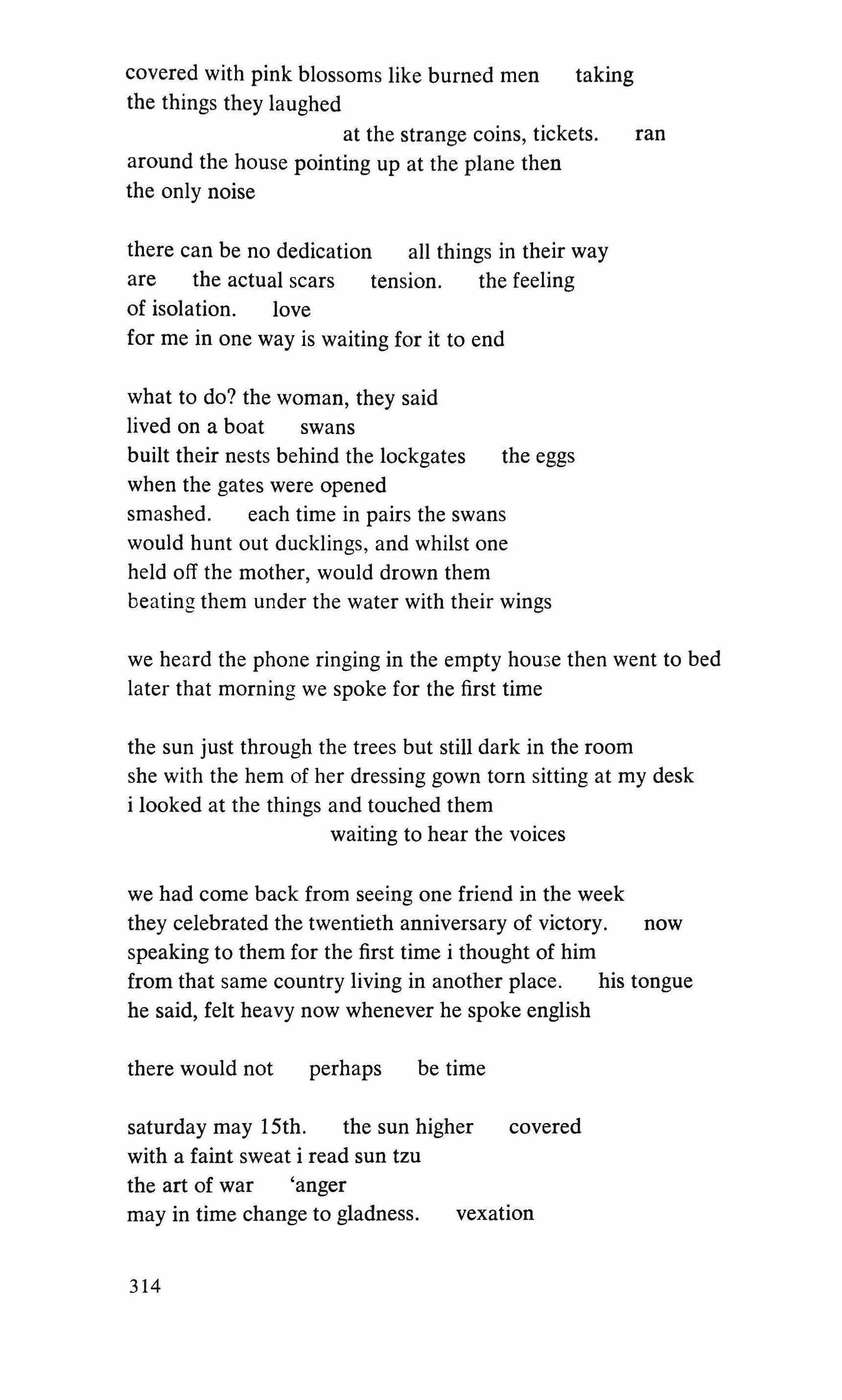
covered with pink blossoms like burned men taking the things they laughed at the strange coins, tickets. ran around the house pointing up at the plane then the only noise
there can be no dedication all things in their way are the actual scars tension. the feeling of isolation. love for me in one way is waiting for it to end
what to do? the woman, they said lived on a boat swans built their nests behind the lockgates the eggs when the gates were opened smashed. each time in pairs the swans would hunt out ducklings, and whilst one held off the mother, would drown them beating them under the water with their wings
we heard the phone ringing in the empty house then went to bed later that morning we spoke for the first time
the sun just through the trees but still dark in the room she with the hem of her dressing gown torn sitting at my desk i looked at the things and touched them waiting to hear the voices
we had come back from seeing one friend in the week they celebrated the twentieth anniversary of victory. now speaking to them for the first time i thought of him from that same country living in another place. his tongue he said, felt heavy now whenever he spoke english
there would not perhaps be time saturday may 15th. the sun higher covered with a faint sweat i read sun tzu the art of war 'anger may in time change to gladness. vexation
314
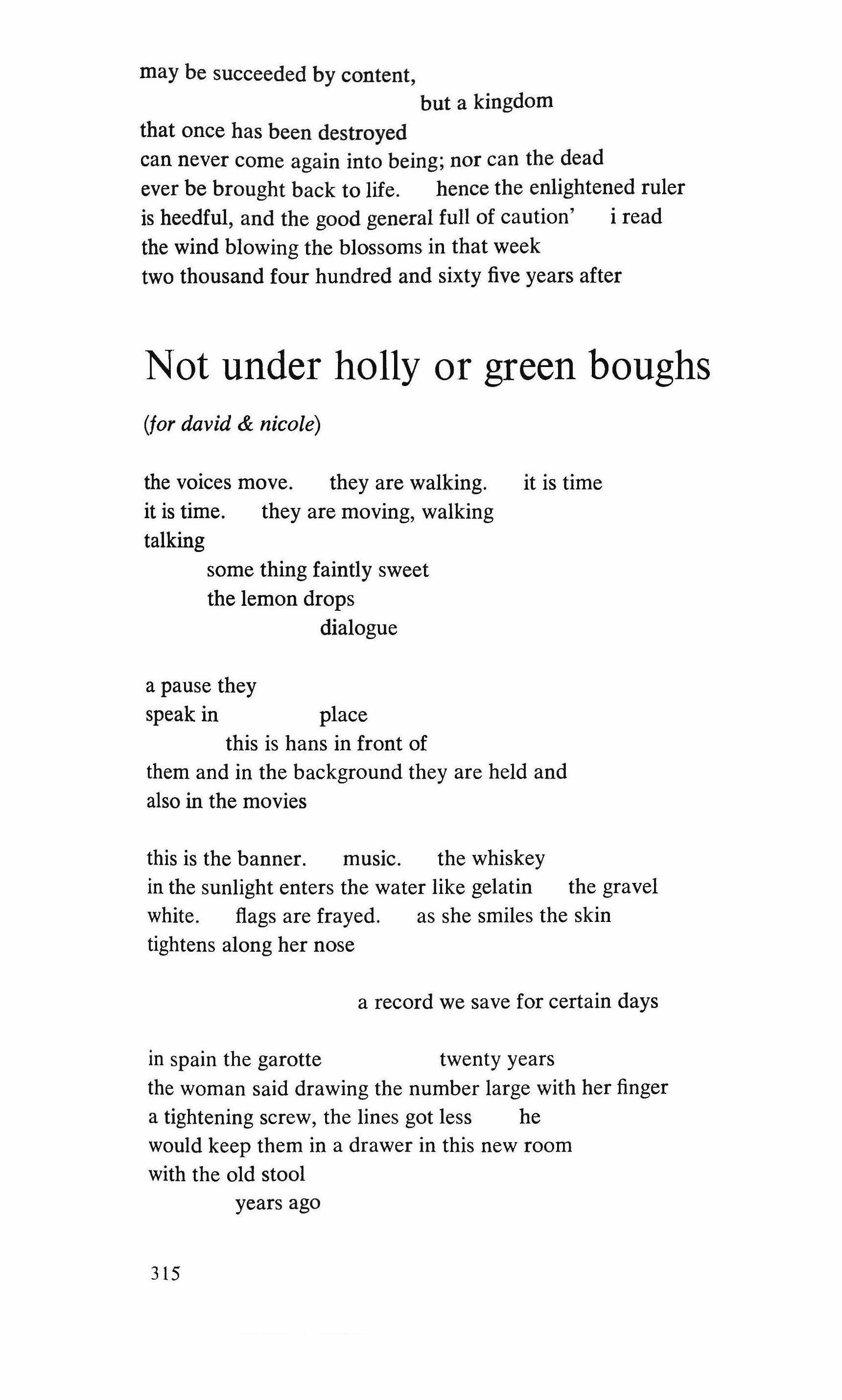
may be succeeded by content, but a kingdom that once has been destroyed can never come again into being; nor can the dead ever be brought back to life. hence the enlightened ruler is heedful, and the good general full of caution' i read the wind blowing the blossoms in that week two thousand four hundred and sixty five years after
Not under holly or green boughs
(for david & nicole)
the voices move. they are walking. it is time it is time. they are moving, walking talking some thing faintly sweet the lemon drops dialogue
a pause they speak in place
this is hans in front of them and in the background they are held and also in the movies
this is the banner. music. the whiskey in the sunlight enters the water like gelatin the gravel white. flags are frayed. as she smiles the skin tightens along her nose
a record we save for certain days in spain the garotte twenty years the woman said drawing the number large with her finger a tightening screw, the lines got less he would keep them in a drawer in this new room with the old stool years ago
315
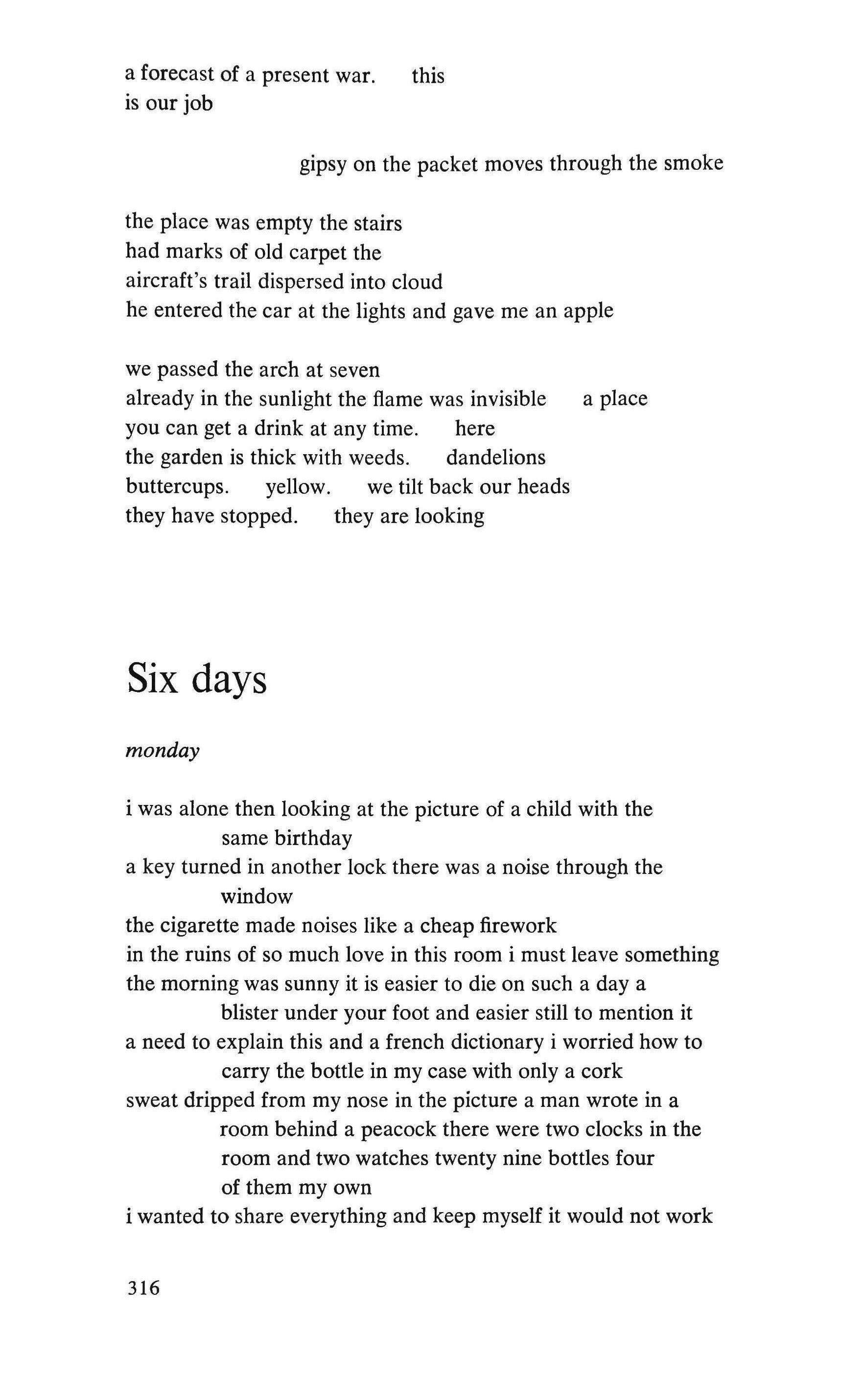
a forecast of a present war. this is our job
gipsy on the packet moves through the smoke
the place was empty the stairs had marks of old carpet the aircraft's trail dispersed into cloud he entered the car at the lights and gave me an apple
we passed the arch at seven already in the sunlight the flame was invisible you can get a drink at any time. here the garden is thick with weeds. dandelions buttercups. yellow. we tilt back our heads they have stopped. they are looking a place
Six days
monday
i was alone then looking at the picture of a child with the same birthday a key turned in another lock there was a noise through the window the cigarette made noises like a cheap firework in the ruins of so much love in this room i must leave something the morning was sunny it is easier to die on such a day a blister under your foot and easier still to mention it a need to explain this and a french dictionary i worried how to carry the bottle in my case with only a cork sweat dripped from my nose in the picture a man wrote in a room behind a peacock there were two clocks in the room and two watches twenty nine bottles four of them my own i wanted to share everything and keep myself it would not work
316

on the door a drawing of a lion in this room on the mirror in soap it said write the plane was always level and the moon dipped
i had cleaned the room all my taste had gone the whiskey tasted like milk chocolate i had bought all the books for my friends my shoulder still ached from the case i would be carrying more back a leaf i had found and given to her all green with four brown eyes
five years ago i had stood on those steps the next month she was wearing a white dress the car was late i combed my hair in a window in the tube it was still summer i was and still am addicted to self-pity
a handkerchief to my face and the blood dried i would have left it the shelter smelled of earth there was a shovel inside to dig yourself out nine paving stones in the path a tall brown girl in jeans who came up the steps of the bridge something about rhythm the line and breathing motions
tuesday
the whiskey began to taste like whiskey the cigarettes still made noises
i had not noticed that beside the peacock was a quieter bird in front of it a dish and thru the window a countryside day of daniel there had been noise and i fitted a lock to my door a long while ago i read silone 'i came home,' he said, when he was able to continue 'and told my parents the doctor had advised me to return to my native climate.'
so wrote to you this letter my jacket was wet from the window it was all grey except for one green tree by the pantheon there was a sound of water in the streets the americans wore white trousers and red shirts 317
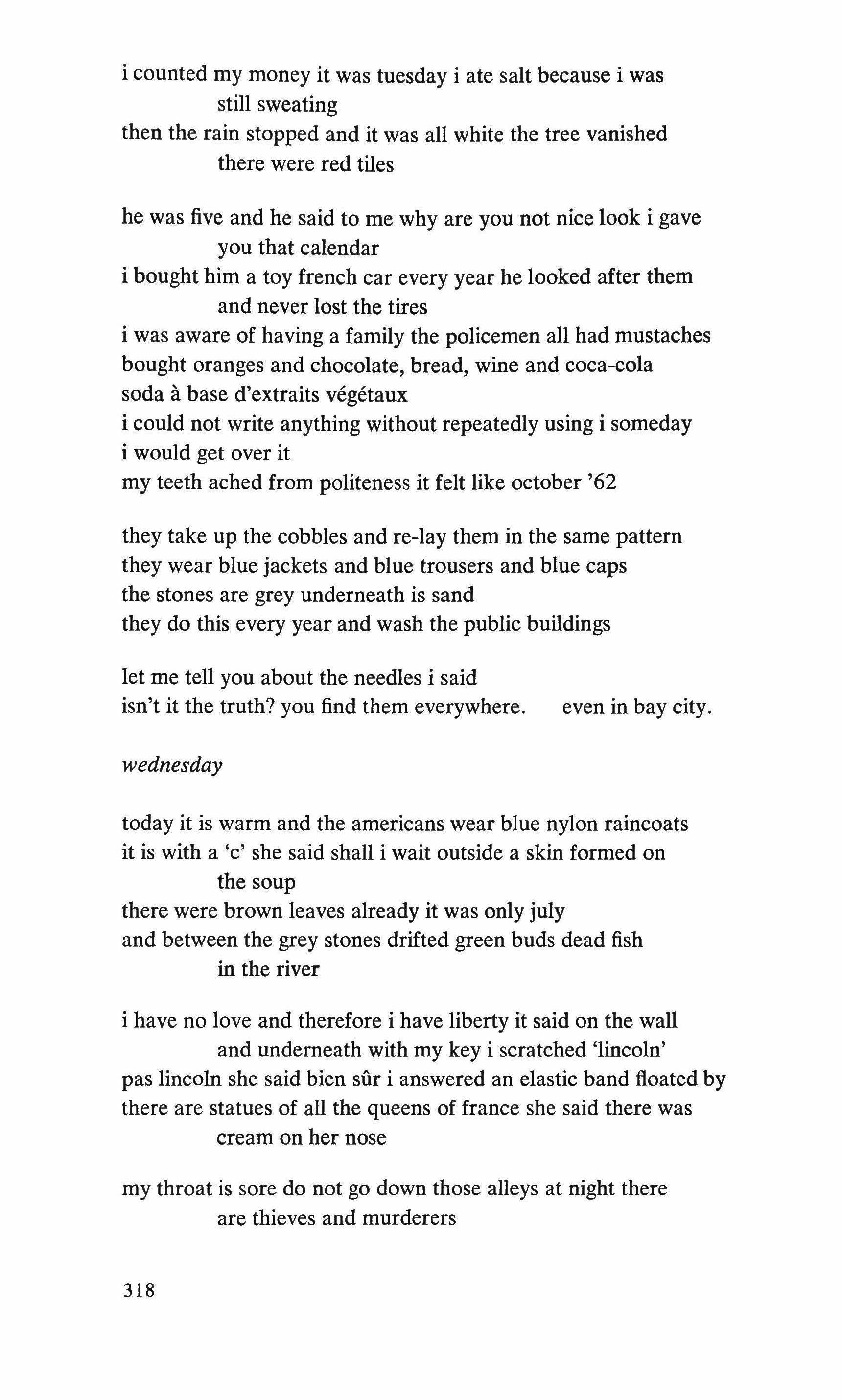
i counted my money it was tuesday i ate salt because i was still sweating then the rain stopped and it was all white the tree vanished there were red tiles
he was five and he said to me why are you not nice look i gave you that calendar i bought him a toy french car every year he looked after them and never lost the tires i was aware of having a family the policemen all had mustaches bought oranges and chocolate, bread, wine and coca-cola soda a base d'extraits vegetaux i could not write anything without repeatedly using i someday i would get over it
my teeth ached from politeness it felt like october '62
they take up the cobbles and re-lay them in the same pattern they wear blue jackets and blue trousers and blue caps the stones are grey underneath is sand they do this every year and wash the public buildings
let me tell you about the needles i said isn't it the truth? you find them everywhere. even in bay city.
wednesday
today it is warm and the americans wear blue nylon raincoats it is with a 'c' she said shall i wait outside a skin formed on the soup there were brown leaves already it was only july and between the grey stones drifted green buds dead fish in the river
i have no love and therefore i have liberty it said on the wall and underneath with my key i scratched 'lincoln' pas lincoln she said bien sur i answered an elastic band floated by there are statues of all the queens of france she said there was cream on her nose
my throat is sore do not go down those alleys at night there are thieves and murderers
318
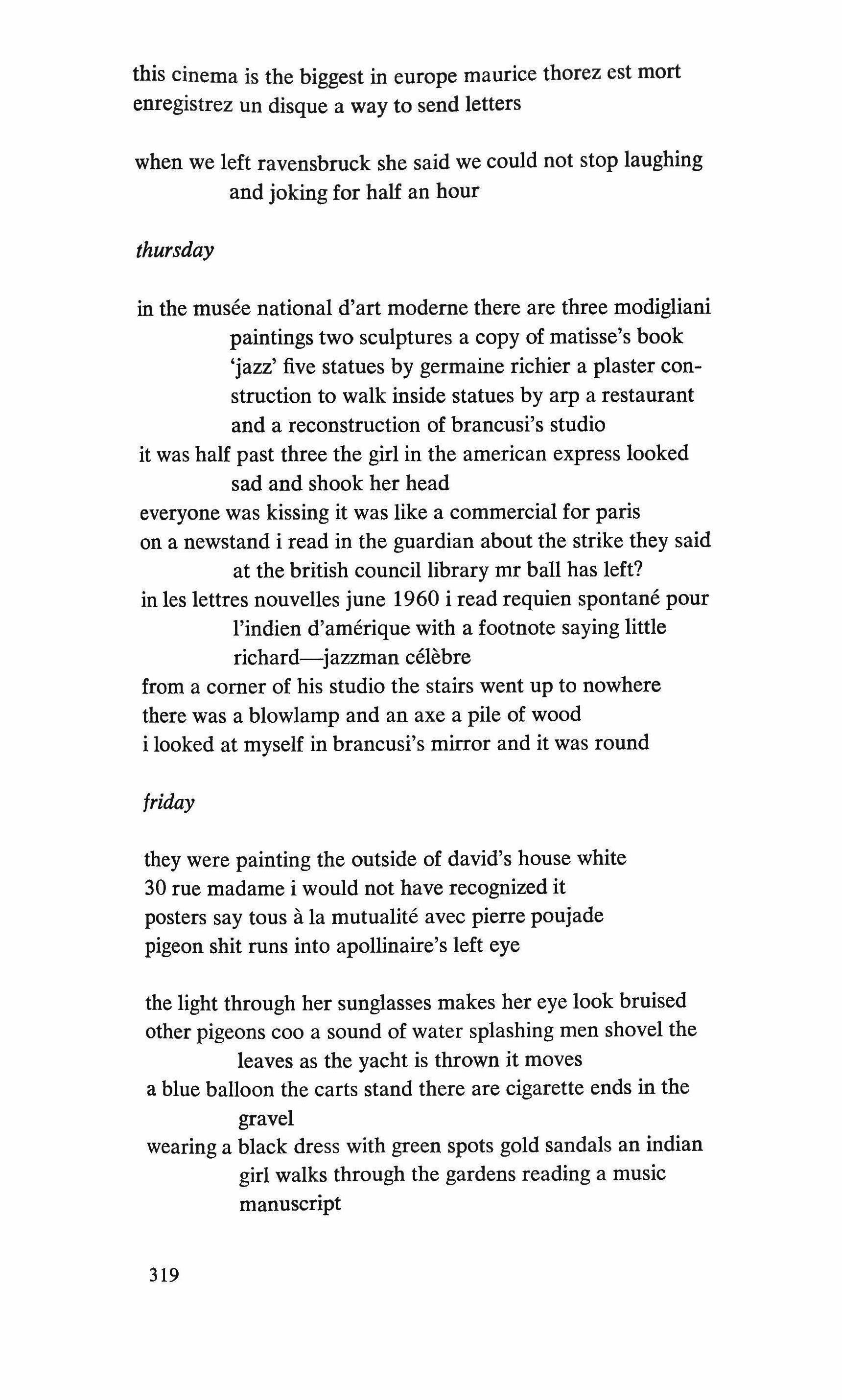
this cinema is the biggest in europe maurice thorez est mort enregistrez un disque a way to send letters
when we left ravensbruck she said we could not stop laughing and joking for half an hour
thursday
in the musee national d'art modeme there are three modigliani paintings two sculptures a copy of matisse's book 'jazz' five statues by germaine richier a plaster construction to walk inside statues by arp a restaurant and a reconstruction of brancusi's studio it was half past three the girl in the american express looked sad and shook her head
everyone was kissing it was like a commercial for paris on a newstand i read in the guardian about the strike they said at the british council library mr ball has left? in les lettres nouvelles june 1960 i read requien spontane pour l'indien d'amerique with a footnote saying little richard-jazzman celebre from a comer of his studio the stairs went up to nowhere there was a blowlamp and an axe a pile of wood i looked at myself in brancusi's mirror and it was round
friday
they were painting the outside of david's house white 30 rue madame i would not have recognized it posters say tous a la mutualite avec pierre poujade pigeon shit runs into apollinaire's left eye
the light through her sunglasses makes her eye look bruised other pigeons coo a sound of water splashing men shovel the leaves as the yacht is thrown it moves a blue balloon the carts stand there are cigarette ends in the gravel
wearing a black dress with green spots gold sandals an indian girl walks through the gardens reading a music manuscript
319

on the steps at night five spaniards singing fa bamba long r's and a noise like a cricket she moves another chair to rest her feet
one spot of nail polish on her stocking little song you have been pushing behind my eyes all day
saturday
a letter came i felt very strange at gloucester road she said after you went and i had kisses from four people i wanted to be there people move into church a door slams the car moves
i could not say i tried i said i could not people have hair on the backs of their hands what did we eat we ate sausage a stew of onions tomatoes and courgettes below in the square they played boules
six men and a fair brown woman in a black dress
emptiness a taste of brass the holes in my head filled with warm sand
a scar beneath her left eye yellow bruises inside her elbows in the marais we bought sweet cakes in the heat without shirts there were still tattooed numbers
birds walk inside the dry pool the flowers are dark and even on the wooden floor the cup broke quickly calvados a faint smell of apples
looking at the etruscan statues in the louvre there is a green patina on my hands my expression has taken its final shape everything becomes modern inside these cases there is nothing without touching
children crawl under the glass things are reflected several times
320
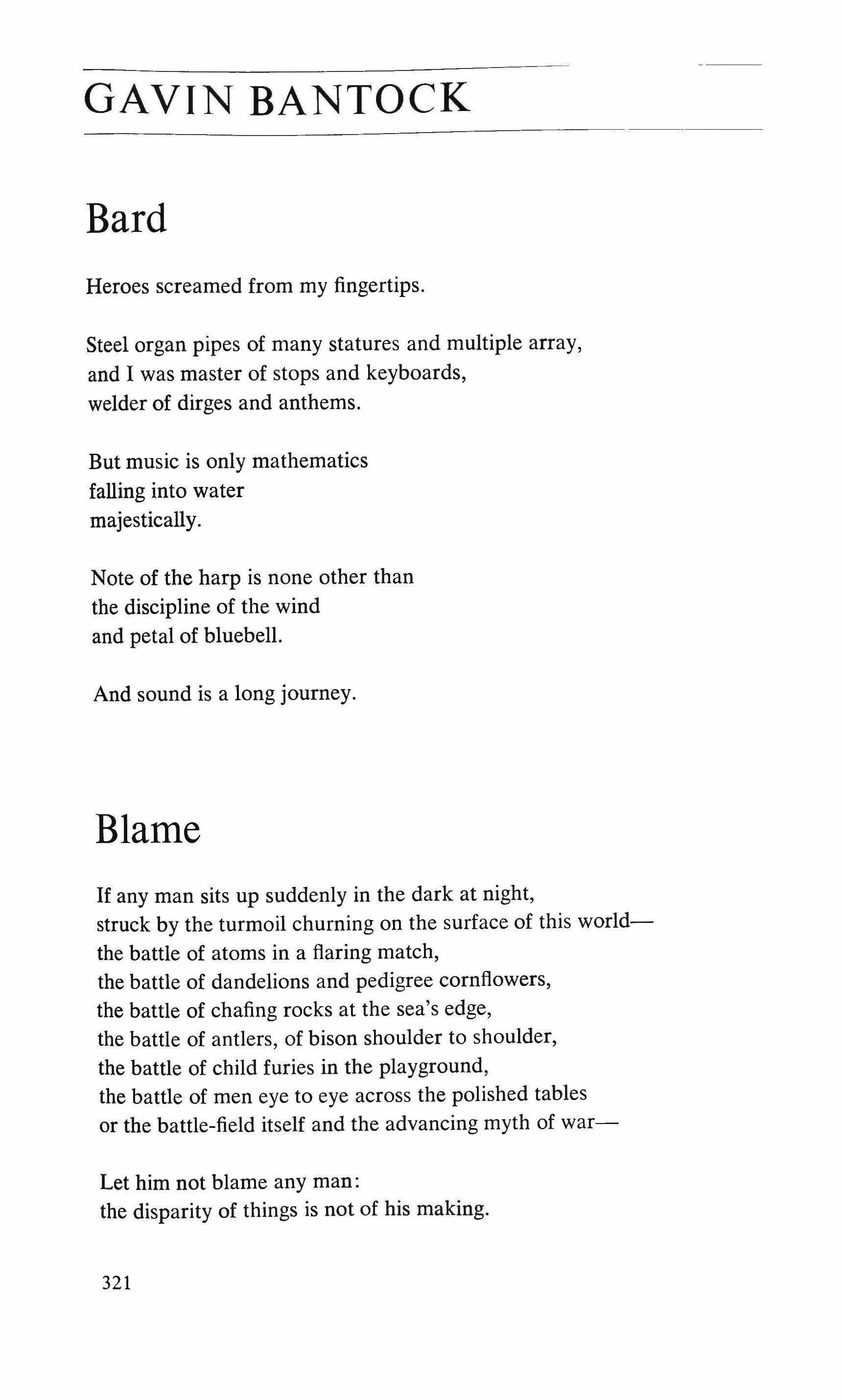
GAVIN BANTOCK
Bard
Heroes screamed from my fingertips.
Steel organ pipes of many statures and multiple array, and I was master of stops and keyboards, welder of dirges and anthems.
But music is only mathematics falling into water majestically.
Note of the harp is none other than the discipline of the wind and petal of bluebell.
And sound is a long journey.
Blame
If any man sits up suddenly in the dark at night, struck by the turmoil churning on the surface of this worldthe battle of atoms in a flaring match, the battle of dandelions and pedigree cornflowers, the battle of chafing rocks at the sea's edge, the battle of antlers, of bison shoulder to shoulder, the battle of child furies in the playground, the battle of men eye to eye across the polished tables or the battle-field itself and the advancing myth of war-
Let him not blame any man: the disparity of things is not of his making.
321
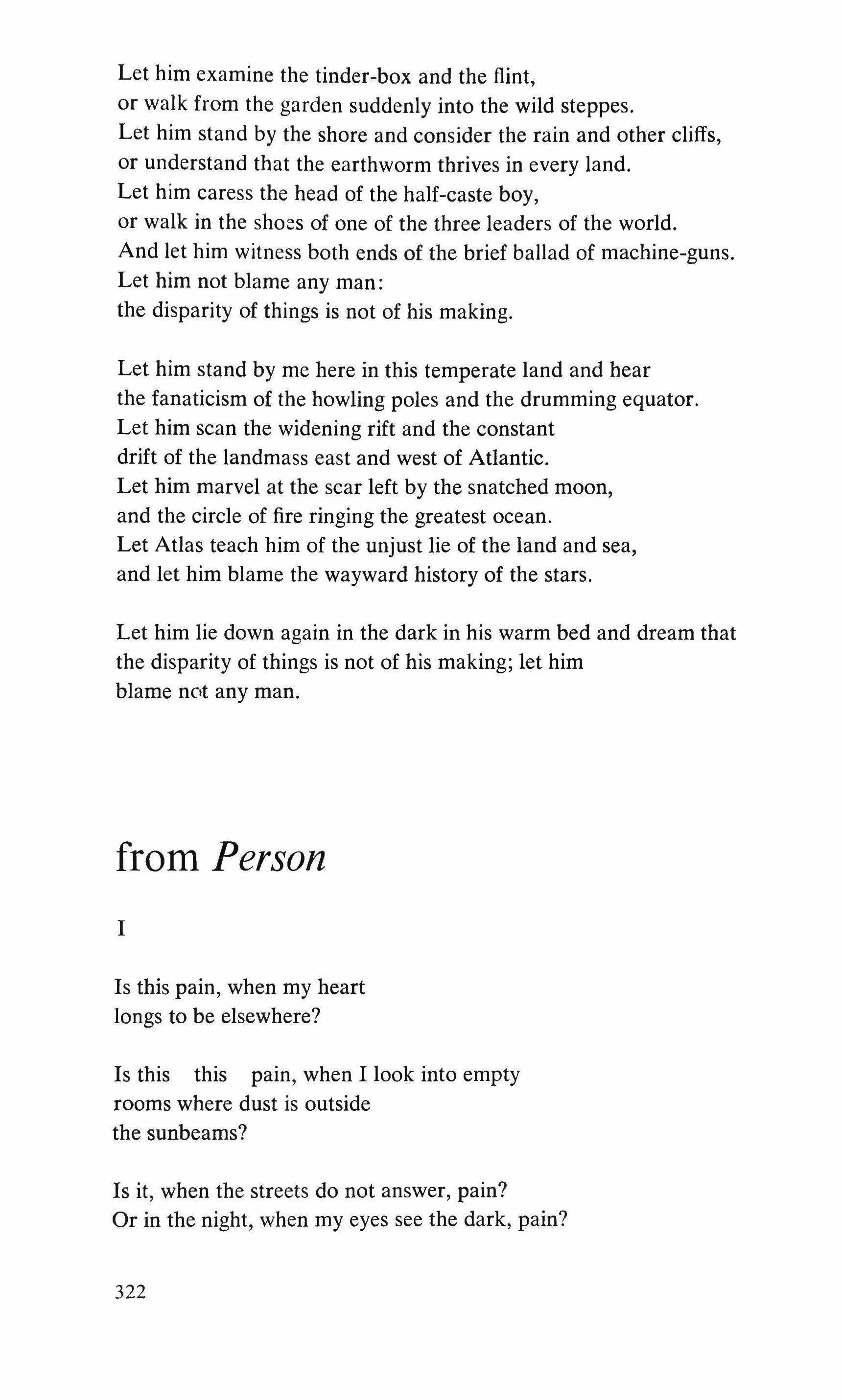
Let him examine the tinder-box and the flint, or walk from the garden suddenly into the wild steppes.
Let him stand by the shore and consider the rain and other cliffs, or understand that the earthworm thrives in every land.
Let him caress the head of the half-caste boy, or walk in the shoes of one of the three leaders of the world. And let him witness both ends of the brief ballad of machine-guns.
Let him not blame any man: the disparity of things is not of his making.
Let him stand by me here in this temperate land and hear the fanaticism of the howling poles and the drumming equator. Let him scan the widening rift and the constant drift of the landmass east and west of Atlantic.
Let him marvel at the scar left by the snatched moon, and the circle of fire ringing the greatest ocean.
Let Atlas teach him of the unjust lie of the land and sea, and let him blame the wayward history of the stars.
Let him lie down again in the dark in his warm bed and dream that the disparity of things is not of his making; let him blame not any man.
from Person
I Is this pain, when my heart longs to be elsewhere?
Is this this pain, when I look into empty rooms where dust is outside the sunbeams?
Is it, when the streets do not answer, pain? Or in the night, when my eyes see the dark, pain?
322

Bare bulbs hang in rooms smelling of the damp and his bed is single.
Is this pain?
It is not, no, it is not, for he loves saying so. But saying cannot soothe every corner of the mind nor slacken the steel in every nerve
II
I can speak but cannot modulate accent to the subtlety of occasion.
Sometimes when my throat is sore I know I've shouted many hours thinking I was murmuring.
Sometimes I've roared my secrets out to my friends and enemies alike; and when I had to speak in the auditorium, I mumbled one long inaudible monotone or whispered like sea heard from the cornfields, thinking I was eloquent.
And no undulation of gentle sympathy now comes to me in the drawing room; no murmur, as I hold hands by the stream, can bend my mind from this affliction whistling and buzzing across my skull's acoustics, as if strips of cat-gut twanged from one ear-drum to the other all day, or a room was full of zithers with slack strings.
You don't know, when the sound of drowning comes on the dry land, what that means.
They hate me for my quiet, uncouth utterance, and I would rather walk with my true love
323
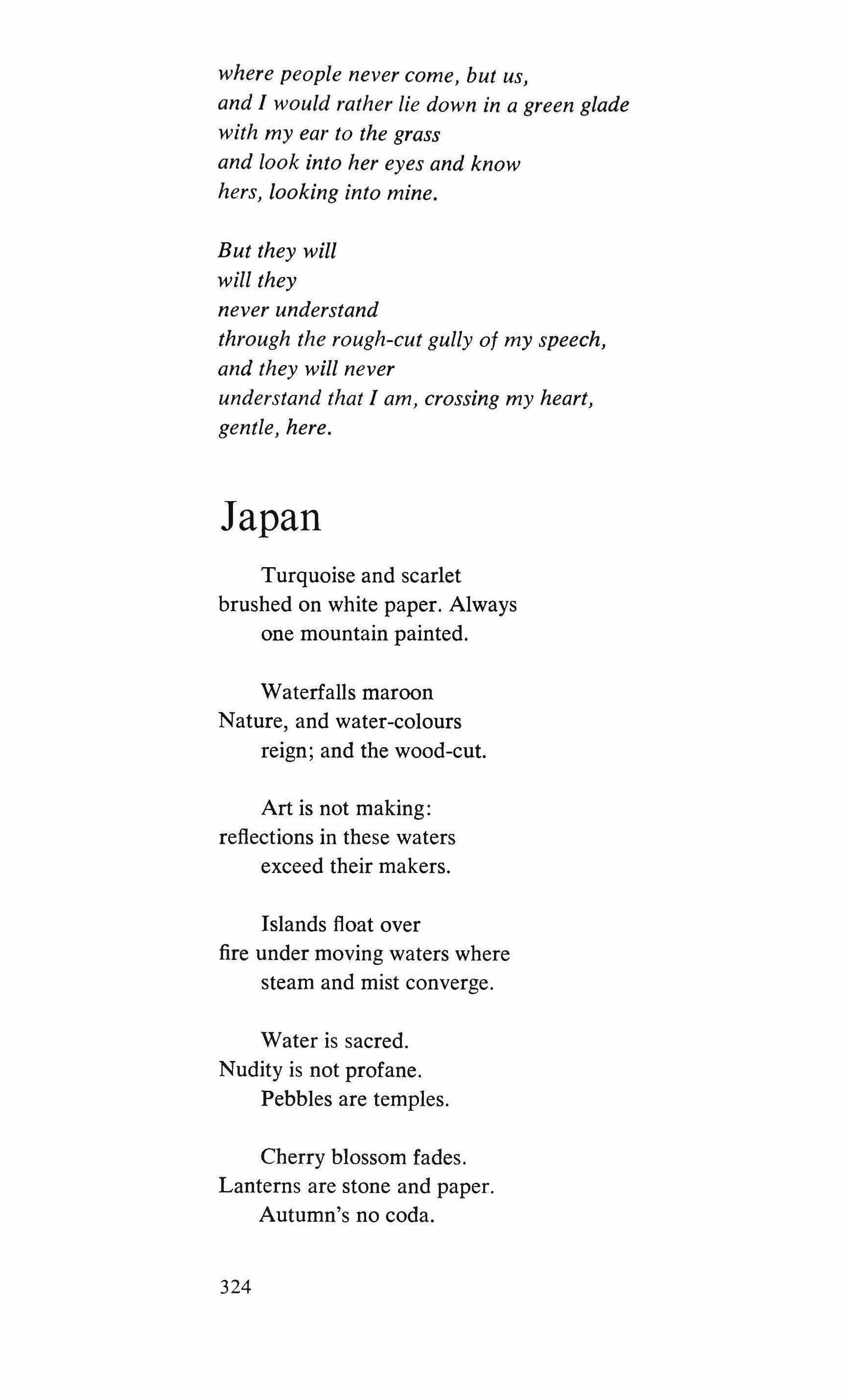
where people never come, but us, and I would rather lie down in a green glade with my ear to the grass and look into her eyes and know hers, looking into mine.
But they will will they never understand through the rough-cut gully of my speech, and they will never understand that I am, crossing my heart, gentle, here.
Japan
Turquoise and scarlet brushed on white paper. Always one mountain painted.
Waterfalls maroon Nature, and water-colours reign; and the wood-cut.
Art is not making: reflections in these waters exceed their makers.
Islands float over fire under moving waters where steam and mist converge.
Water is sacred. Nudity is not profane. Pebbles are temples.
Cherry blossom fades. Lanterns are stone and paper. Autumn's no coda.
324

Nod of greeting though brief is friendly. Celts would be friends in Hokkaido.
Man is master here: patience in long lines. Woman opens eyes; fans whirr.
Millions of white shirts miraculously controlled: seething refinement.
Industry governs: Buddha observes shipyards clang for Hirohito.
Immobile faces shield heirlooms of Samurai, teeth sharp as razors.
Strength of Karate is decision, discipline, strict hierarchy.
Noh: is flute, tapped drum, bird-shiver; catastropheone finger bending.
Hiroshima is myth. Crimson torii stands in Miyajima.
from Christ
Rolleth the seventh wave. Jesus said, I am not the only man As I sit here in this dark room, I know there are men moving,
325
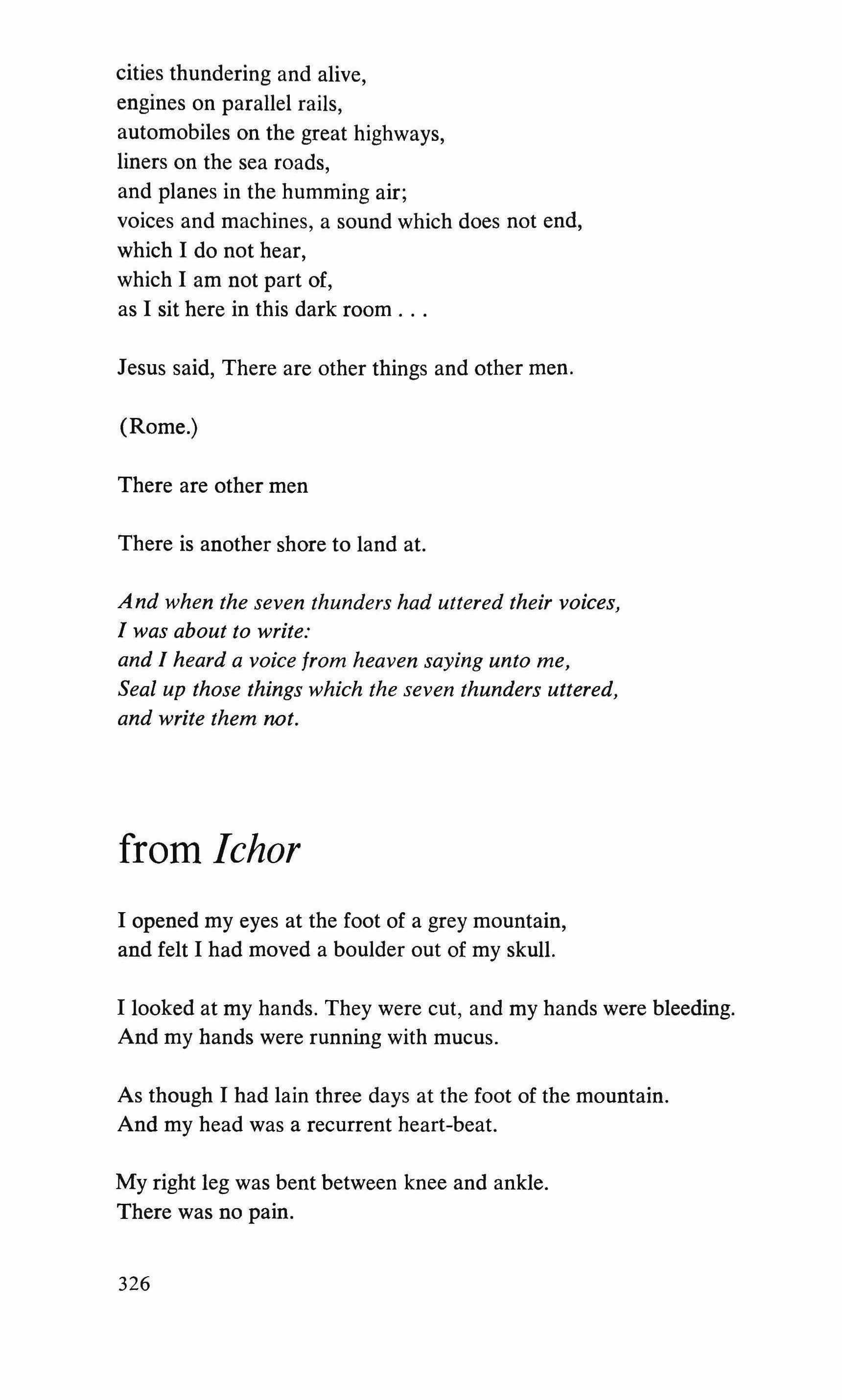
cities thundering and alive, engines on parallel rails, automobiles on the great highways, liners on the sea roads, and planes in the humming air; voices and machines, a sound which does not end, which I do not hear, which I am not part of, as I sit here in this dark room
Jesus said, There are other things and other men.
(Rome.)
There are other men
There is another shore to land at.
And when the seven thunders had uttered their voices, 1 was about to write: and 1 heard a voice from heaven saying unto me, Seal up those things which the seven thunders uttered, and write them not.
from Ichor
I opened my eyes at the foot of a grey mountain, and felt I had moved a boulder out of my skull.
I looked at my hands. They were cut, and my hands were bleeding. And my hands were running with mucus.
As though I had lain three days at the foot of the mountain. And my head was a recurrent heart-beat.
My right leg was bent between knee and ankle. There was no pain.
326
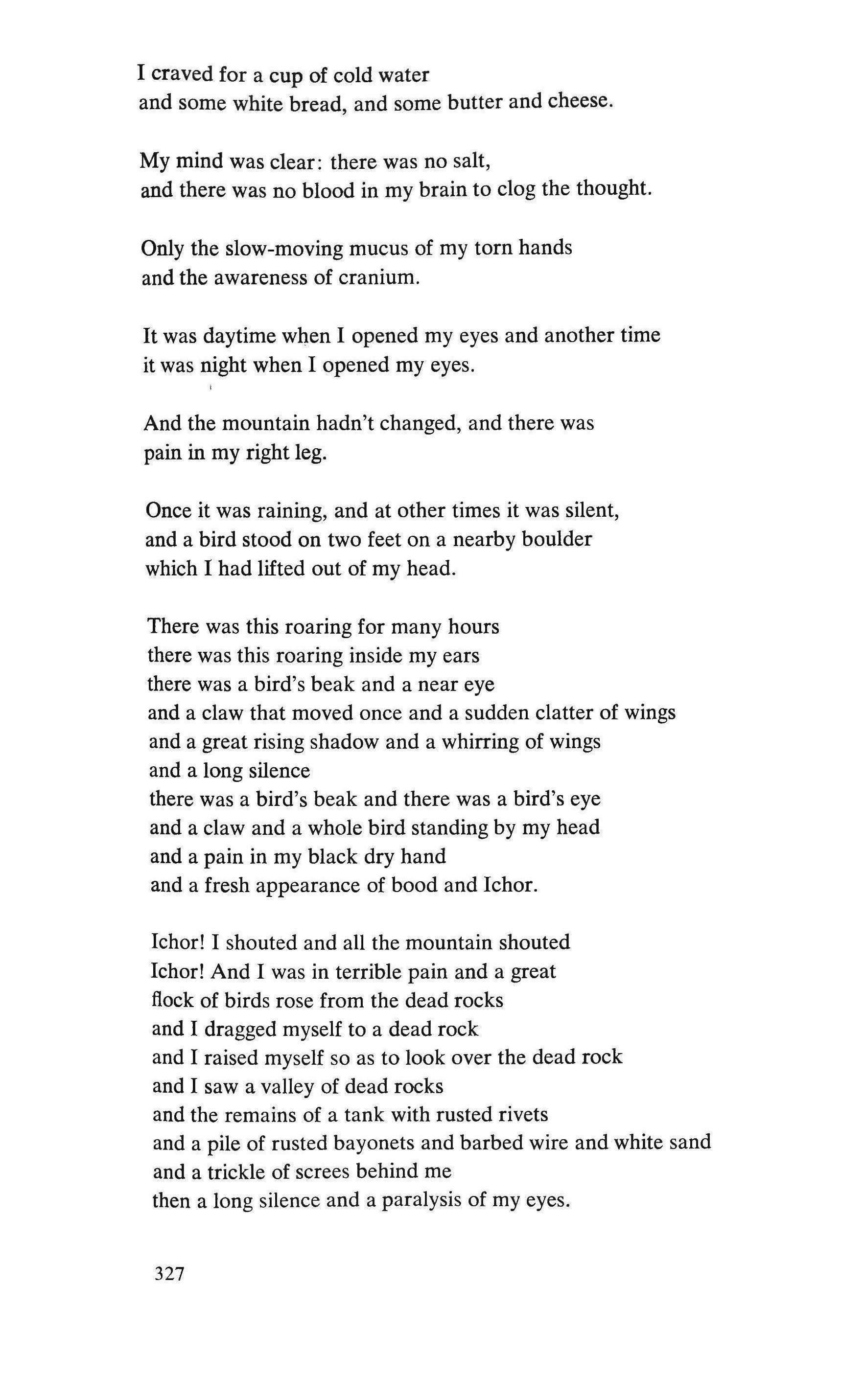
I craved for a cup of cold water and some white bread, and some butter and cheese.
My mind was clear: there was no salt, and there was no blood in my brain to clog the thought.
Only the slow-moving mucus of my torn hands and the awareness of cranium.
It was daytime when I opened my eyes and another time it was night when I opened my eyes.
And the mountain hadn't changed, and there was pain in my right leg.
Once it was raining, and at other times it was silent, and a bird stood on two feet on a nearby boulder which I had lifted out of my head.
There was this roaring for many hours there was this roaring inside my ears there was a bird's beak and a near eye and a claw that moved once and a sudden clatter of wings and a great rising shadow and a whirring of wings and a long silence there was a bird's beak and there was a bird's eye and a claw and a whole bird standing by my head and a pain in my black dry hand and a fresh appearance of bood and Ichor.
Ichor! I shouted and all the mountain shouted Ichor! And I was in terrible pain and a great flock of birds rose from the dead rocks and I dragged myself to a dead rock and I raised myself so as to look over the dead rock and I saw a valley of dead rocks and the remains of a tank with rusted rivets and a pile of rusted bayonets and barbed wire and white sand and a trickle of screes behind me then a long silence and a paralysis of my eyes.
327
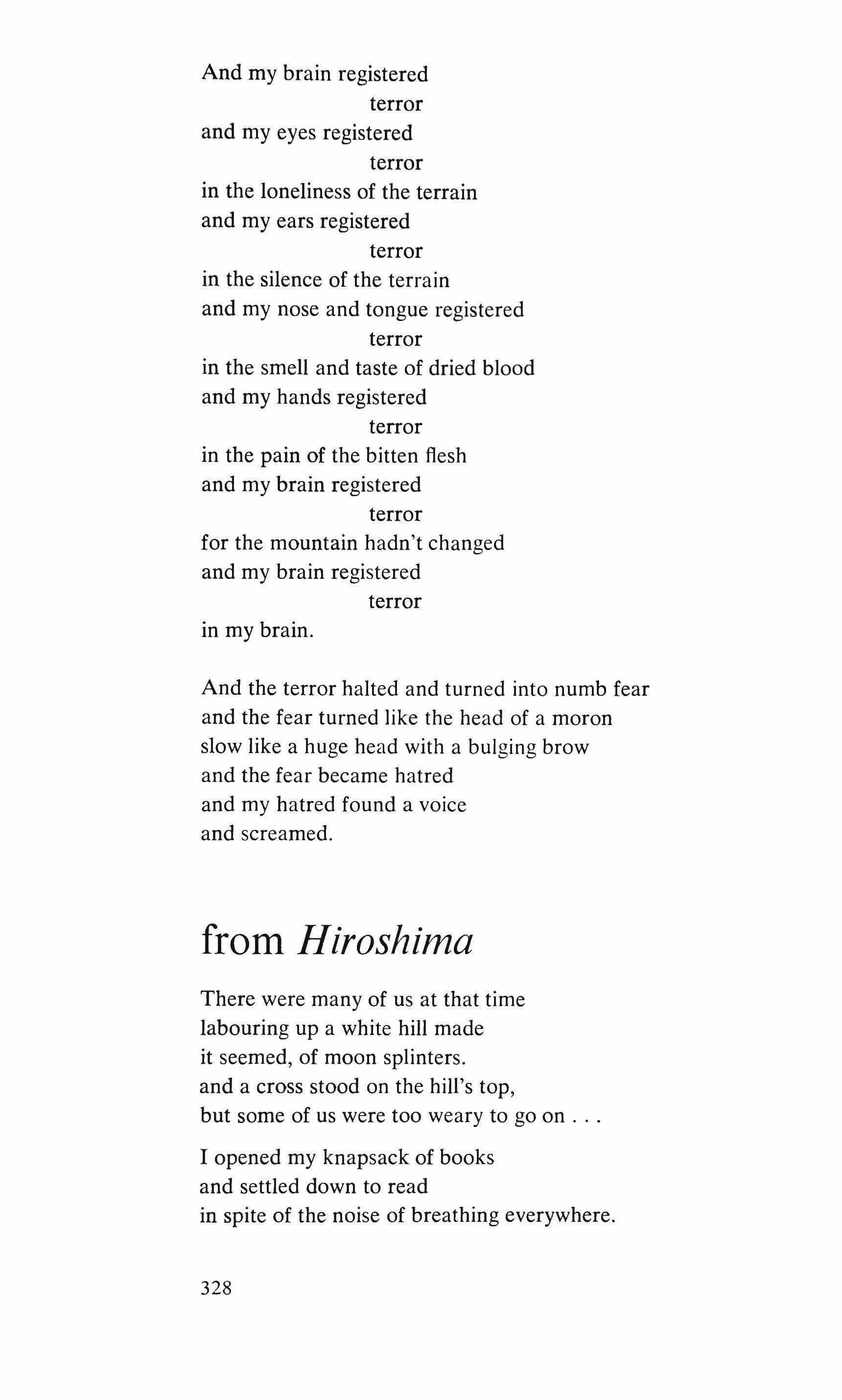
And my brain registered terror and my eyes registered terror in the loneliness of the terrain and my ears registered terror in the silence of the terrain and my nose and tongue registered terror in the smell and taste of dried blood and my hands registered terror in the pain of the bitten flesh and my brain registered terror for the mountain hadn't changed and my brain registered terror in my brain. And the terror halted and turned into numb fear and the fear turned like the head of a moron slow like a huge head with a bulging brow and the fear became hatred and my hatred found a voice and screamed.
from Hiroshima
There were many of us at that time labouring up a white hilI made it seemed, of moon splinters. and a cross stood on the hilI's top, but some of us were too weary to go on
I opened my knapsack of books and settled down to read in spite of the noise of breathing everywhere.
328
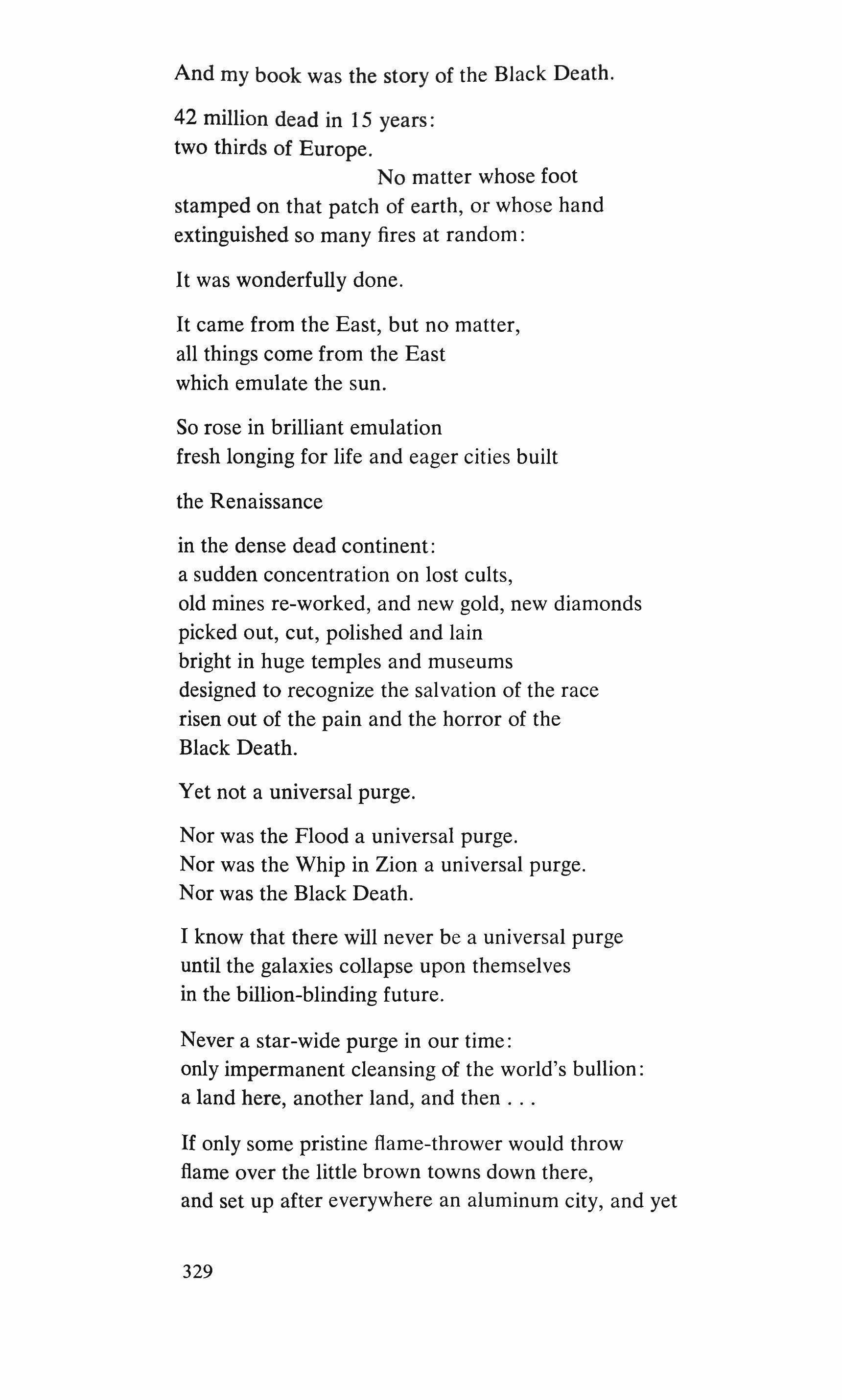
And my book was the story of the Black Death.
42 million dead in 15 years: two thirds of Europe.
No matter whose foot stamped on that patch of earth, or whose hand extinguished so many fires at random: It was wonderfully done.
It came from the East, but no matter, all things come from the East which emulate the sun.
So rose in brilliant emulation fresh longing for life and eager cities built the Renaissance in the dense dead continent: a sudden concentration on lost cults, old mines re-worked, and new gold, new diamonds picked out, cut, polished and lain bright in huge temples and museums designed to recognize the salvation of the race risen out of the pain and the horror of the Black Death.
Yet not a universal purge.
Nor was the Flood a universal purge. Nor was the Whip in Zion a universal purge. Nor was the Black Death.
I know that there will never be a universal purge until the galaxies collapse upon themselves in the billion-blinding future.
Never a star-wide purge in our time: only impermanent cleansing of the world's bullion: a land here, another land, and then
If only some pristine flame-thrower would throw flame over the little brown towns down there, and set up after everywhere an aluminum city, and yet
329
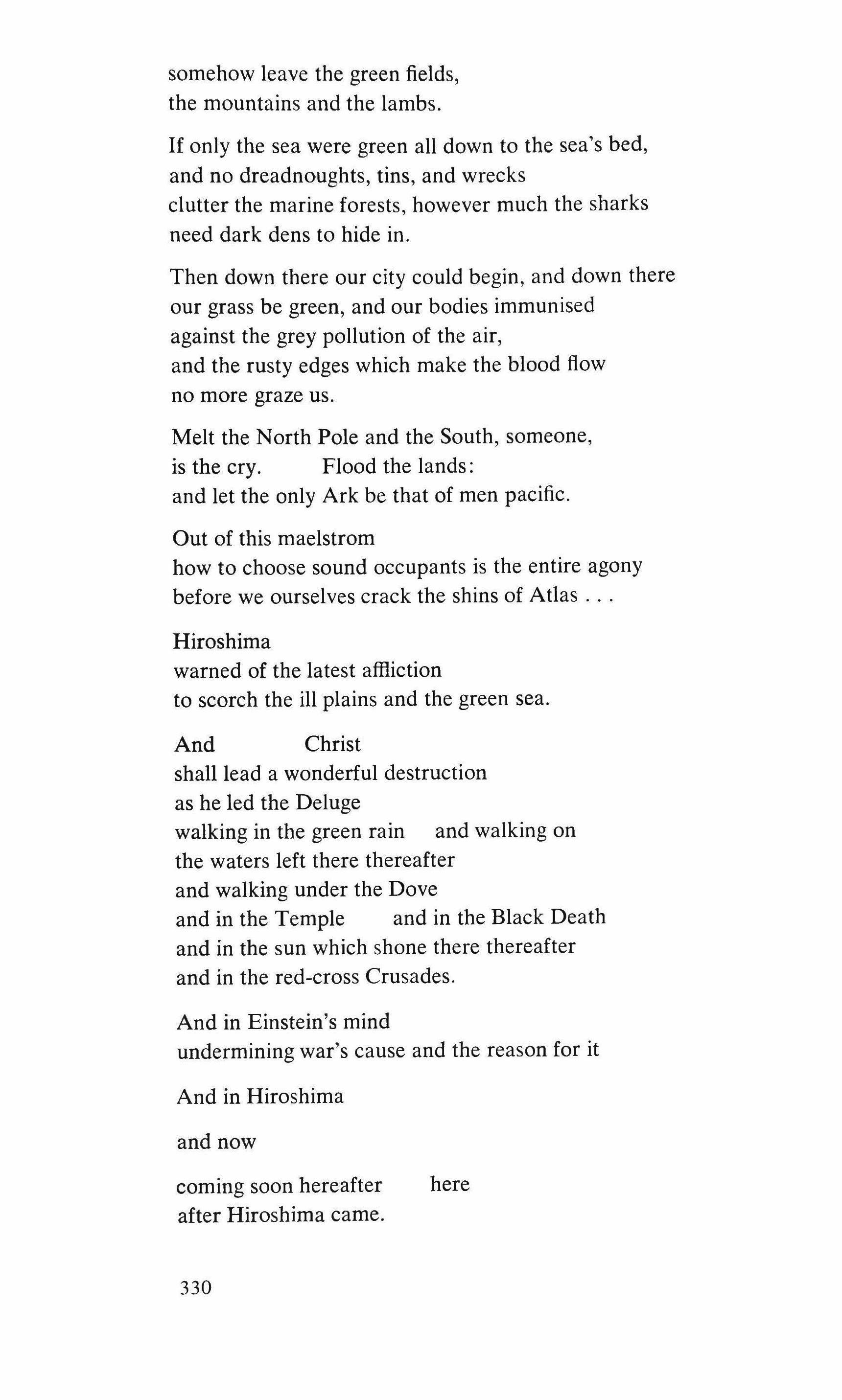
somehow leave the green fields, the mountains and the lambs.
If only the sea were green all down to the sea's bed, and no dreadnoughts, tins, and wrecks clutter the marine forests, however much the sharks need dark dens to hide in.
Then down there our city could begin, and down there our grass be green, and our bodies immunised against the grey pollution of the air, and the rusty edges which make the blood flow no more graze us.
Melt the North Pole and the South, someone, is the cry. Flood the lands: and let the only Ark be that of men pacific.
Out of this maelstrom how to choose sound occupants is the entire agony before we ourselves crack the shins of Atlas Hiroshima warned of the latest affliction to scorch the ill plains and the green sea.
And Christ shall lead a wonderful destruction as he led the Deluge walking in the green rain and walking on the waters left there thereafter and walking under the Dove and in the Temple and in the Black Death and in the sun which shone there thereafter and in the red-cross Crusades.
And in Einstein's mind undermining war's cause and the reason for it
And in Hiroshima and now coming soon hereafter here after Hiroshima came.
330
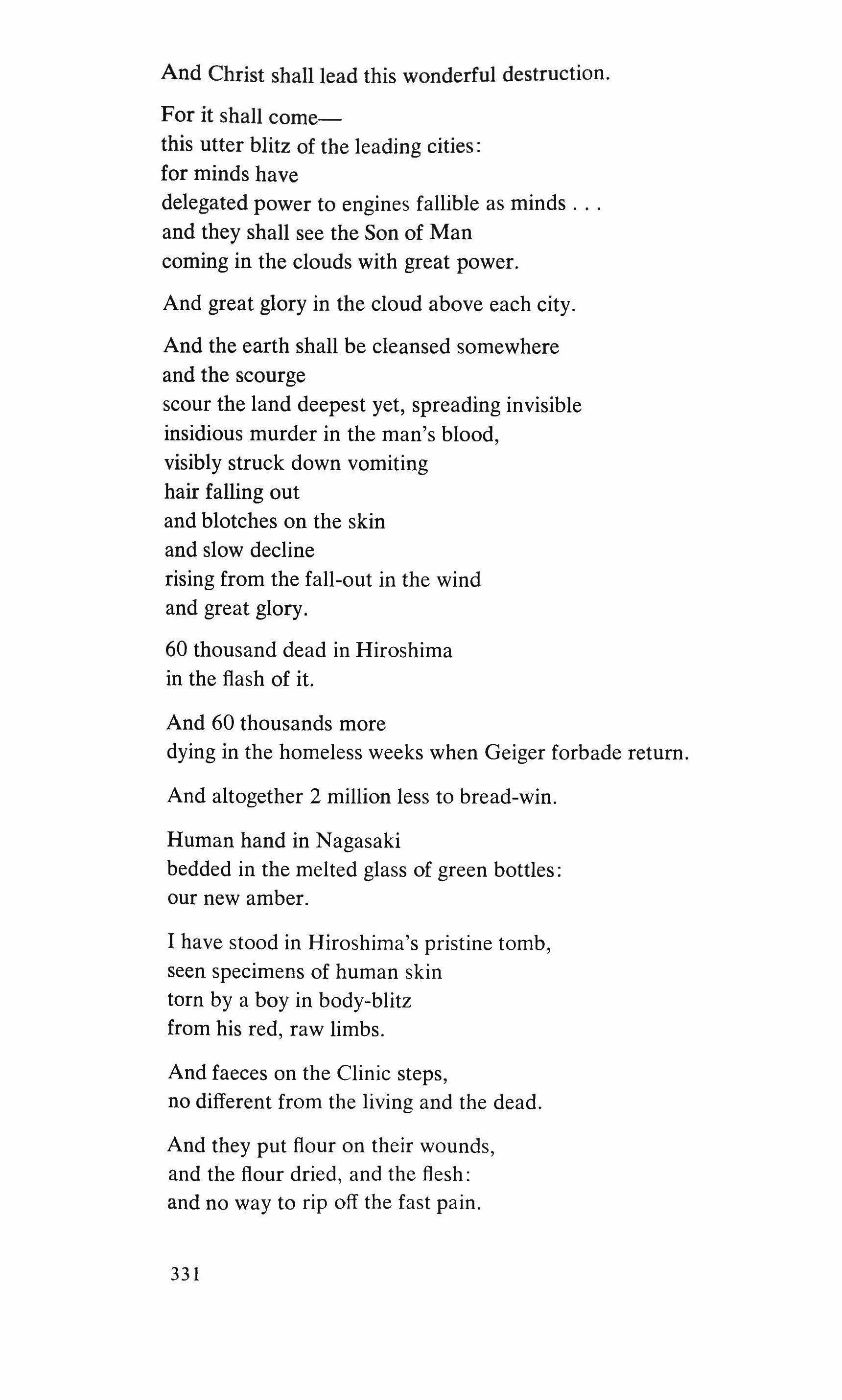
And Christ shall lead this wonderful destruction. For it shall comethis utter blitz of the leading cities: for minds have delegated power to engines fallible as minds and they shall see the Son of Man coming in the clouds with great power.
And great glory in the cloud above each city. And the earth shall be cleansed somewhere and the scourge scour the land deepest yet, spreading invisible insidious murder in the man's blood, visibly struck down vomiting hair falling out and blotches on the skin and slow decline rising from the fall-out in the wind and great glory.
60 thousand dead in Hiroshima in the flash of it.
And 60 thousands more dying in the homeless weeks when Geiger forbade return.
And altogether 2 million less to bread-win.
Human hand in Nagasaki bedded in the melted glass of green bottles: our new amber.
I have stood in Hiroshima's pristine tomb, seen specimens of human skin torn by a boy in body-blitz from his red, raw limbs.
And faeces on the Clinic steps, no different from the living and the dead.
And they put flour on their wounds, and the flour dried, and the flesh: and no way to rip off the fast pain.
331
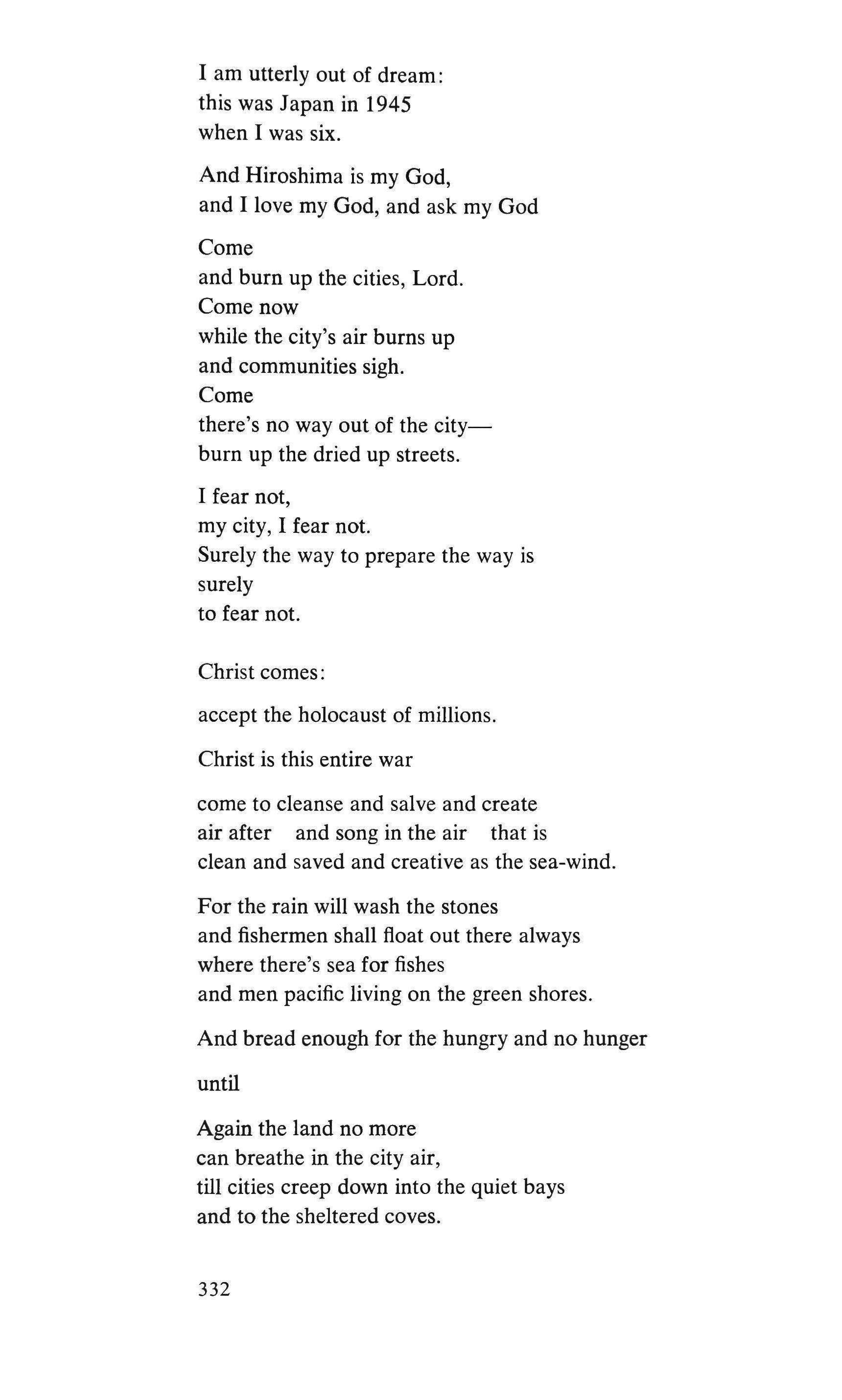
I am utterly out of dream: this was Japan in 1945 when I was six.
And Hiroshima is my God, and I love my God, and ask my God
Come and burn up the cities, Lord.
Come now while the city's air burns up and communities sigh.
Come there's no way out of the cityburn up the dried up streets. I fear not, my city, I fear not. Surely the way to prepare the way is surely to fear not.
Christ comes: accept the holocaust of millions.
Christ is this entire war
come to cleanse and salve and create air after and song in the air that is clean and saved and creative as the sea-wind.
For the rain will wash the stones and fishermen shall float out there always where there's sea for fishes and men pacific living on the green shores. And bread enough for the hungry and no hunger until
Again the land no more can breathe in the city air, till cities creep down into the quiet bays and to the sheltered coves.
332

I would choose to take my end as children take their end.
As Toshio Nakamura boy of ten:
"The day before the bomb I went for a swim.
In the morning I was eating peanuts.
I saw a light.
I was knocked to little sister's sleeping place.
When we were saved I could only see as far as the tram.
My mother and I started to pack our things.
The neighbours were walking round burned and bleeding.
Hataya-san told me to run away with her.
I said I wanted to wait for my mother.
We went to the park.
A whirlwind came.
At night a gas tank burned.
I saw the reflection in the river."
Seeing their reflection in the river, cities hurt me.
How much more may cities hurt me, when I see their ashes join the wind.
Then some of us will have to join the caravan guiding the treasures of the race across the desert until a land's found rain-washed enough and ready for the blue sky, when Geiger's silent.
Every mirage shall project the ruin on the sky in the first years after.
And we shall meet dumb emigrants racing across the desert from the distant dust.
333
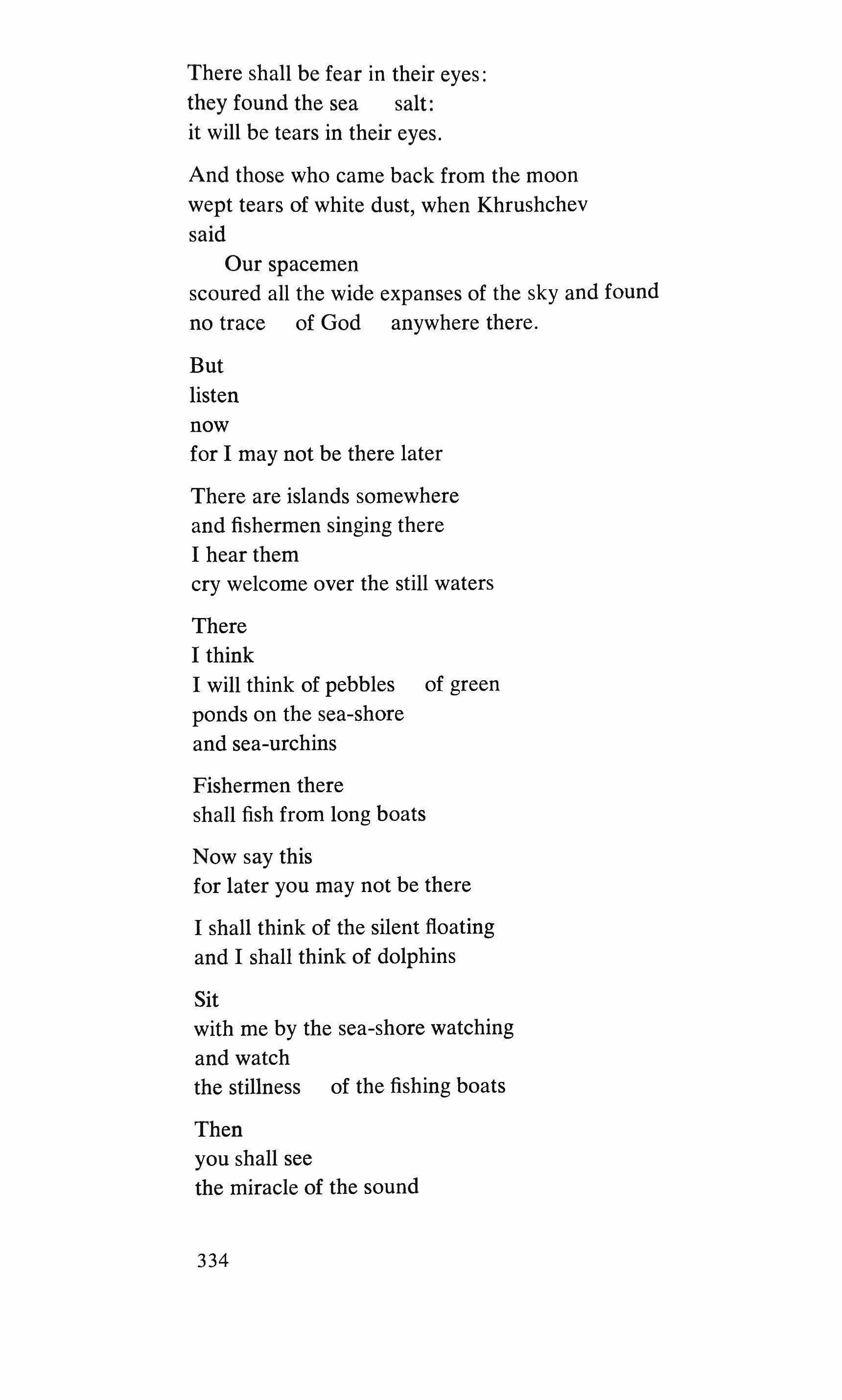
There shall be fear in their eyes: they found the sea salt: it will be tears in their eyes.
And those who came back from the moon wept tears of white dust, when Khrushchev said
Our spacemen scoured all the wide expanses of the sky and found no trace of God anywhere there.
But listen now for I may not be there later
There are islands somewhere and fishermen singing there I hear them cry welcome over the still waters
There I think I will think of pebbles of green ponds on the sea-shore and sea-urchins
Fishermen there shall fish from long boats
Now say this for later you may not be there
I shall think of the silent floating and I shall think of dolphins
Sit with me by the sea-shore watching and watch the stillness of the fishing boats
Then you shall see the miracle of the sound
334
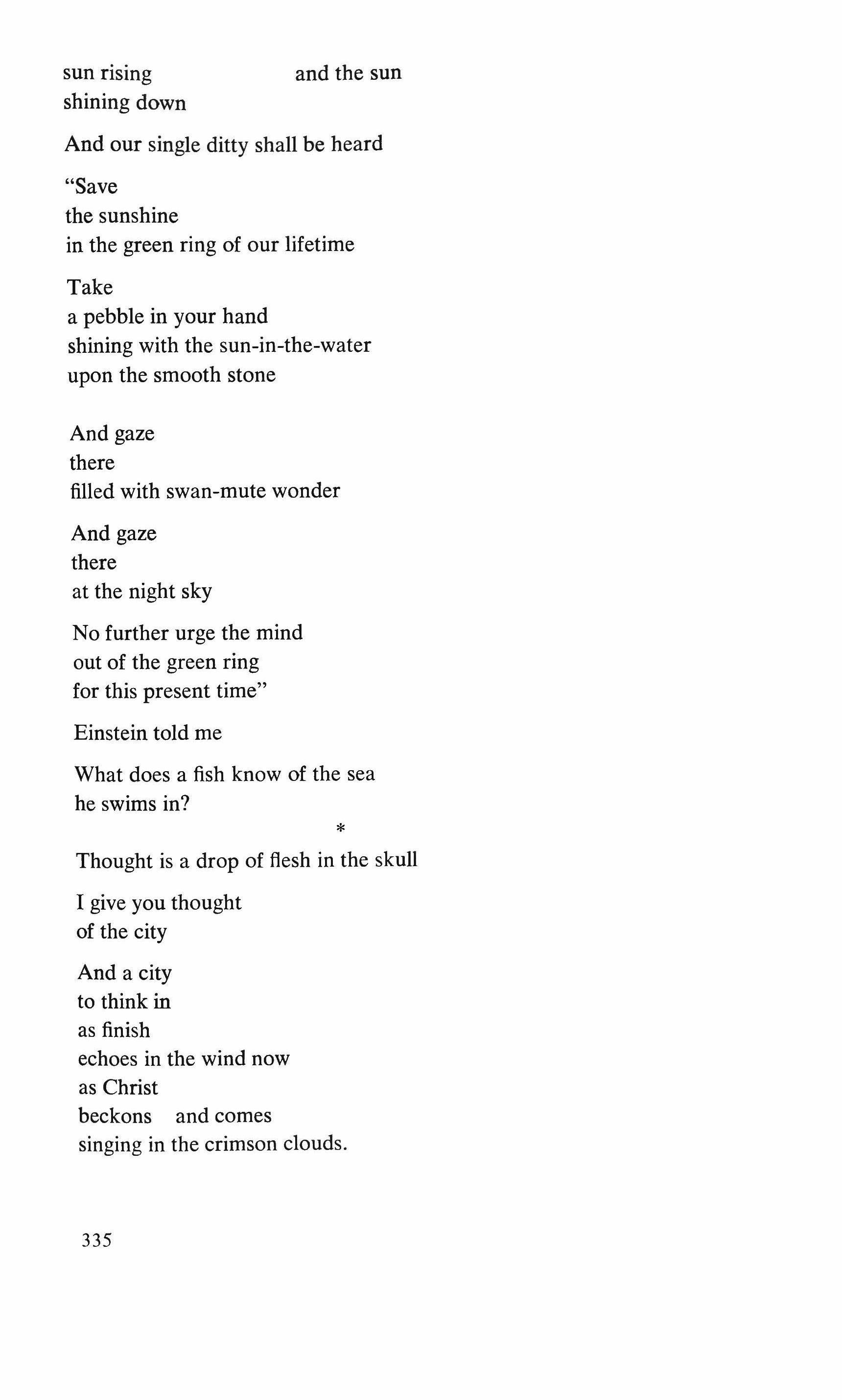
sun rising shining down
And our single ditty shall be heard and the sun
"Save the sunshine in the green ring of our lifetime
Take a pebble in your hand shining with the sun-in-the-water upon the smooth stone
And gaze there filled with swan-mute wonder
And gaze there at the night sky
No further urge the mind out of the green ring for this present time"
Einstein told me
What does a fish know of the sea he swims in?
Thought is a drop of flesh in the skull
I give you thought of the city
And a city to think in as finish echoes in the wind now as Christ beckons and comes singing in the crimson clouds.
*
335
Acknowledgments

DAVID JONES. Three sections from In Parenthesis. Reprinted by permission of Chilmark Press and Faber & Faber Ltd. "Angle-Land" and "Redriff" from The A nathemata. Reprinted by permission of Chilmark Press and Faber & Faber Ltd. "The Wall" first appeared in Poetry LXXXVII, No.2 (November 1955) and, more recently, in the David Jones Special Issue of Agenda (Spring-Summer 1967). Reprinted by permission of the author.
HUGH MACDIARMID. "Second Hymn to Lenin" from Collected Poems © 1948, 1962 Christopher Murray Grieve. Reprinted by permission of The MacMillan Company. "Esplumeoir' and "Diamond Body" from A Lap of Honour, © 1969 Christopher Murray Grieve. Reprinted by permission of The Swallow Press. "The World is Fast Bound in the Snares of Varuna" from In Memoriam James Joyce and "0 Wha's the Bride". Reprinted by permission of the author.
BASIL BUNTING. "Vestiges," "What the Chairman Told Tom." two sections from Brigfiatts, and "Chomei at Toyama" from Collected Poems, © 1968 Basil Bunting. Reprinted by permission of Fulcrum Press.
CHARLES TOMLINSON. "Observation of Facts" from The Necklace. Reprinted by permission of Oxford University Press. "Up at La Serra" from A Peopled Landscape. Reprinted by permission of Oxford University Press. "A Death in the Desert," "Las Trampas U.S.A "Mr. Brodsky, and "Idyll" from American Scenes and Other Poems. Reprinted by permission of Oxford University Press. "Paring the Apple" from Seeing is Believing, Reprinted by permission of Astor-Honor, Inc.
TED HUGHES. "October Dawn" from The Hawk in the Rain, © 1957 Ted Hughes. Reprinted by permission of Harper & Row, Publishers, Inc. "Pike" and "Thrushes" from Lupercal. Reprinted by permission of Harper & Row, Publishers, Inc. and Faber & Faber Ltd. "Ghost Crabs," "Out," "Pibroch." and "Wodwo" from Wodwo, © 1967 Ted Hughes. Reprinted by permission of Harper & Row, Publishers. Inc. and Faber & Faber Ltd.
CHRISTOPHER MIDDLETON. "The Thousand Things," "China Shop Vigil," and "Five Psalms of Common Man" from Torse 3 © 1962 Christopher Middleton. Reprinted by permission of Harcourt. Brace and Jovanivich. Inc. "January, 19 19," "Disturbing the Tarantula:' "Poem Written After Contemplating the Adverb 'Primarily'," "Young Woman in Apathy," and "Octobers" from Nonsequences, © 196 I. 1962, 1963. 1964. 1965 Christopher Middleton. Reprinted by permission of W. W. Norton & Company, Inc. "Found Poem With Grafts" and "The Historian" from Our Flowers and Nice Bones, © 1969 Christopher Middleton. Reprinted by permission of Fulcrum Press. "Jindrichuv Hradec" printed by permission of the author.
336
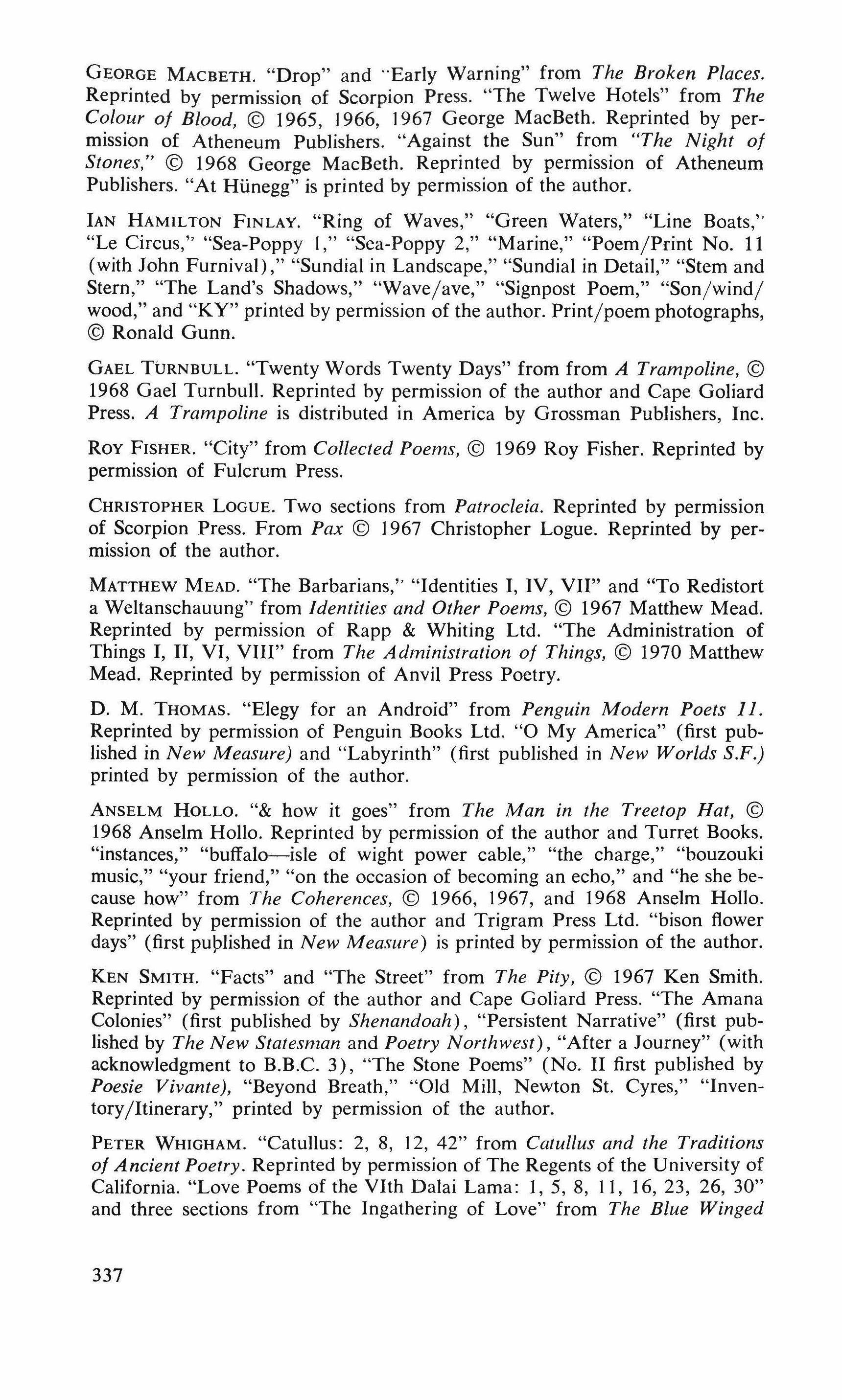
GEORGE MACBETH. "Drop" and "Early Warning" from The Broken Places. Reprinted by permission of Scorpion Press. "The Twelve Hotels" from The Colour of Blood, © 1965, 1966, 1967 George MacBeth. Reprinted by permission of Atheneum Publishers. "Against the Sun" from "The Night of Stones," © 1968 George MacBeth. Reprinted by permission of Atheneum Publishers. "At Htinegg" is printed by permission of the author.
IAN HAMILTON FINLAY. "Ring of Waves," "Green Waters," "Line Boats," "Le Circus," "Sea-Poppy 1 ," "Sea-Poppy 2," "Marine," "Poem/Print No. 11 (with John Furnival},' "Sundial in Landscape," "Sundial in Detail," "Stem and Stern," "The Land's Shadows," "Wave/ave," "Signpost Poem," "Son/wind/ wood," and "KY" printed by permission of the author. Print/poem photographs, © Ronald Gunn.
GAEL TURNBULL. "Twenty Words Twenty Days" from from A Trampoline, © 1968 Gael Turnbull. Reprinted by permission of the author and Cape Goliard Press. A Trampoline is distributed in America by Grossman Publishers, Inc. Roy FISHER. "City" from Collected Poems, © 1969 Roy Fisher. Reprinted by permission of Fulcrum Press.
CHRISTOPHER LOGUE. Two sections from Patrocleia. Reprinted by permission of Scorpion Press. From Pax © 1967 Christopher Logue. Reprinted by permission of the author.
MATTHEW MEAD. "The Barbarians," "Identities I, IV, VII" and "To Redistort a Weltanschauung" from Identities and Other Poems, © 1967 Matthew Mead. Reprinted by permission of Rapp & Whiting Ltd. "The Administration of Things I, II, VI, VIII" from The Administration of Things, © 1970 Matthew Mead. Reprinted by permission of Anvil Press Poetry.
D. M. THOMAS. "Elegy for an Android" from Penguin Modern Poets 11. Reprinted by permission of Penguin Books Ltd. "0 My America" (first published in New Measure) and "Labyrinth" (first published in New Worlds S.F.) printed by permission of the author.
ANSELM HOLLO. "& how it goes" from The Man in the Treetop Hat, © 1968 Anselm Hollo. Reprinted by permission of the author and Turret Books. "instances," "buffalo-isle of wight power cable," "the charge," "bouzouki music," "your friend," "on the occasion of becoming an echo," and "he she because how" from The Coherences, © 1966, 1967, and 1968 Anselm Hollo. Reprinted by permission of the author and Trigram Press Ltd. "bison flower days" (first published in New Measures is printed by permission of the author.
KEN SMITH. "Facts" and "The Street" from The Pity, © 1967 Ken Smith. Reprinted by permission of the author and Cape Goliard Press. "The Amana Colonies" (first published by Shenandoah), "Persistent Narrative" (first published by The New Statesman and Poetry Northwest), "After a Journey" (with acknowledgment to B.B.c. 3), "The Stone Poems" (No. II first published by Poesie Vivante), "Beyond Breath," "Old Mill, Newton St. Cyres," "Inventory/Itinerary," printed by permission of the author.
PETER WHIGHAM. "Catullus: 2, 8, 12, 42" from Catullus and the Traditions of Ancient Poetry. Reprinted by permission of The Regents of the University of California. "Love Poems of the Vlth Dalai Lama: 1, 5, 8, 11, 16, 23, 26, 30" and three sections from "The Ingathering of Love" from The Blue Winged
337
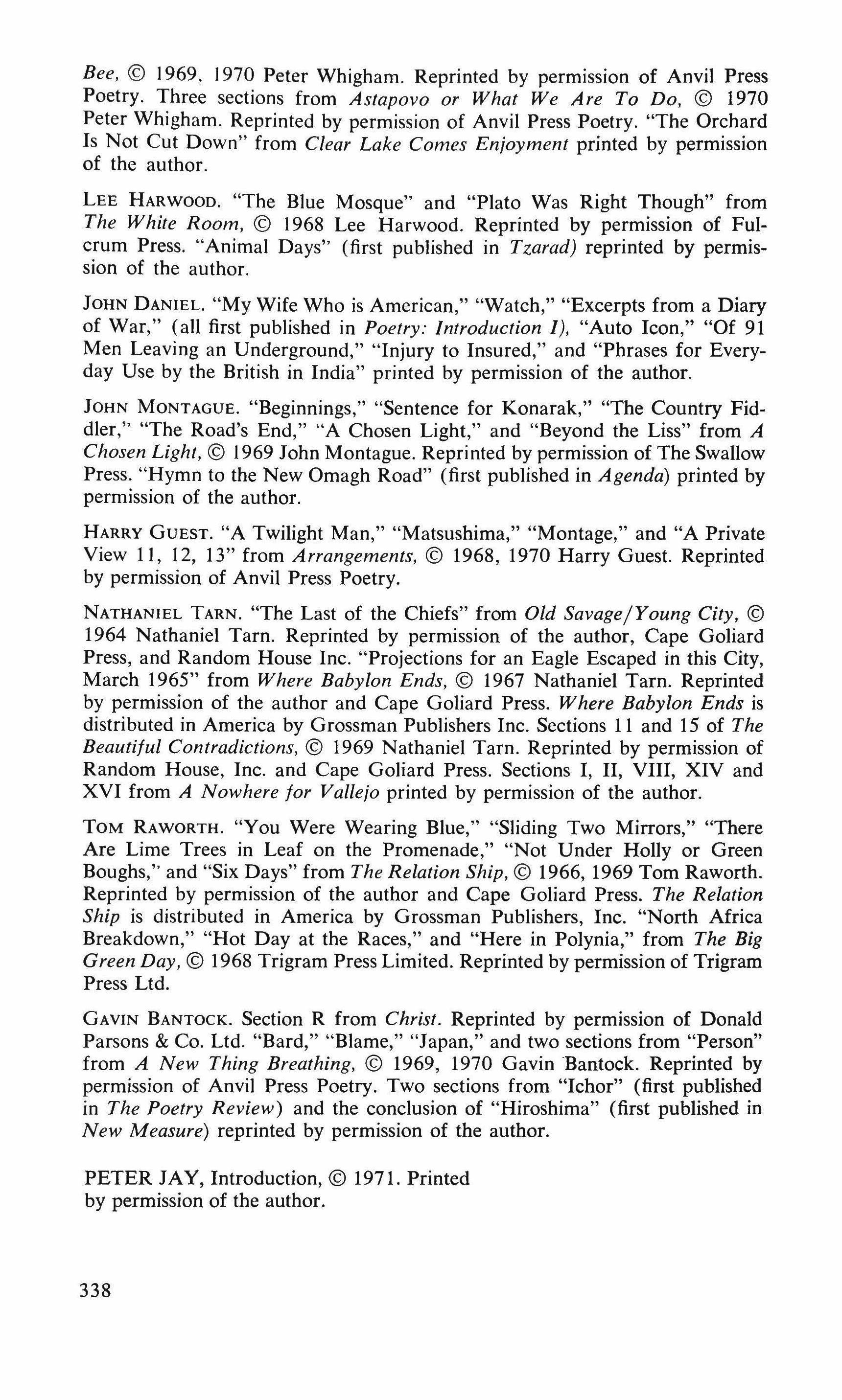
Bee, © 1969, 1970 Peter Whigham. Reprinted by permission of Anvil Press Poetry. Three sections from Astapovo or What We Are To Do, © 1970 Peter Whigham. Reprinted by permission of Anvil Press Poetry. "The Orchard Is Not Cut Down" from Clear Lake Comes Enjoyment printed by permission of the author.
LEE HARWOOD. "The Blue Mosque" and "Plato Was Right Though" from The White Room, © 1968 Lee Harwood. Reprinted by permission of Fulcrum Press. "Animal Days" (first published in Tzarad) reprinted by permission of the author.
JOHN DANIEL. "My Wife Who is American," "Watch," "Excerpts from a Diary of War," (all first published in Poetry: Introduction I), "Auto Icon," "Of 91 Men Leaving an Underground," "Injury to Insured," and "Phrases for Everyday Use by the British in India" printed by permission of the author.
JOHN MONTAGUE. "Beginnings," "Sentence for Konarak," "The Country Fiddler," "The Road's End," "A Chosen Light," and "Beyond the Liss" from A Chosen Light, © 1969 John Montague. Reprinted by permission of The Swallow Press. "Hymn to the New Omagh Road" (first published in Agenda) printed by permission of the author.
HARRY GUEST. "A Twilight Man," "Matsushirna,' "Montage," and "A Private View 11, 12, 13" from Arrangements, © 1968, 1970 Harry Guest. Reprinted by permission of Anvil Press Poetry.
NATHANIEL TARN. "The Last of the Chiefs" from Old Savage/Young City, © 1964 Nathaniel Tarn. Reprinted by permission of the author, Cape Goliard Press, and Random House Inc. "Projections for an Eagle Escaped in this City, March 1965" from Where Babylon Ends, © 1967 Nathaniel Tarn. Reprinted by permission of the author and Cape Goliard Press. Where Babylon Ends is distributed in America by Grossman Publishers Inc. Sections 11 and 15 of The Beautiful Contradictions, © 1969 Nathaniel Tarn. Reprinted by permission of Random House, Inc. and Cape Goliard Press. Sections I, II, VIII, XIV and XVI from A Nowhere for Vallejo printed by permission of the author.
TOM RAWORTH. "You Were Wearing Blue," "Sliding Two Mirrors," "There Are Lime Trees in Leaf on the Promenade," "Not Under Holly or Green Boughs," and "Six Days" from The Relation Ship, © 1966, 1969 Tom Raworth. Reprinted by permission of the author and Cape Goliard Press. The Relation Ship is distributed in America by Grossman Publishers, Inc. "North Africa Breakdown," "Hot Day at the Races," and "Here in Polynia," from The Big Green Day, © 1968 Trigram Press Limited. Reprinted by permission of Trigram Press Ltd.
GAVIN BANTOCK. Section R from Christ. Reprinted by permission of Donald Parsons & Co. Ltd. "Bard," "Blame," "Japan," and two sections from "Person" from A New Thing Breathing, © 1969, 1970 Gavin Bantock. Reprinted by permission of Anvil Press Poetry. Two sections from "Ichor" (first published in The Poetry Review) and the conclusion of "Hiroshima" (first published in New Measure) reprinted by permission of the author.
PETER JAY, Introduction, © 1971. Printed by permission of the author.
338
Editors' note: On being unsolicitous
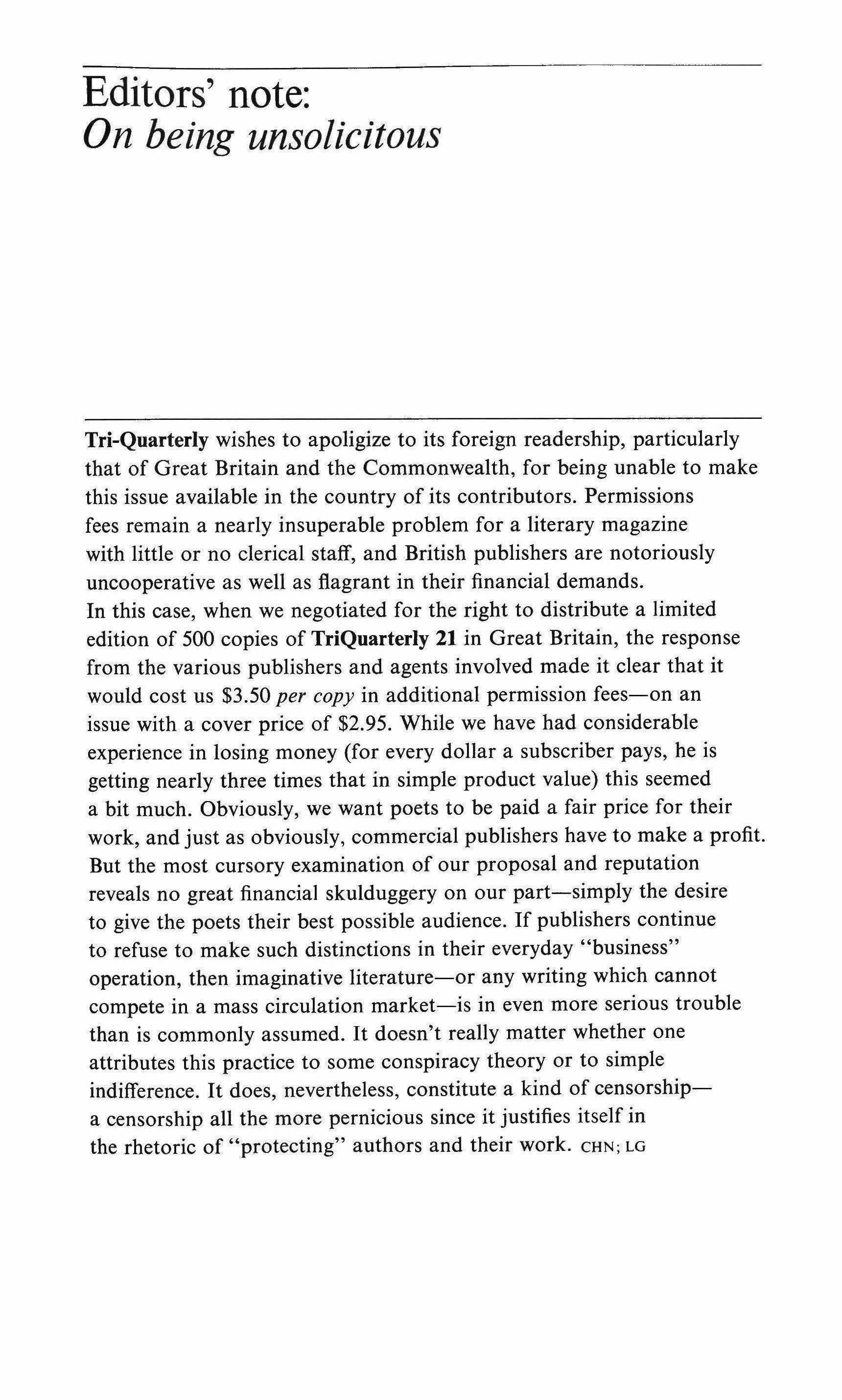
Tri-Quarterly wishes to apoligize to its foreign readership, particularly that of Great Britain and the Commonwealth, for being unable to make this issue available in the country of its contributors. Permissions fees remain a nearly insuperable problem for a literary magazine with little or no clerical staff, and British publishers are notoriously uncooperative as well as flagrant in their financial demands. In this case, when we negotiated for the right to distribute a limited edition of 500 copies of TriQuarterly 21 in Great Britain, the response from the various publishers and agents involved made it clear that it would cost us $3.50 per copy in additional permission fees-on an issue with a cover price of $2.95. While we have had considerable experience in losing money (for every dollar a subscriber pays, he is getting nearly three times that in simple product value) this seemed a bit much. Obviously, we want poets to be paid a fair price for their work, and just as obviously, commercial publishers have to make a profit. But the most cursory examination of our proposal and reputation reveals no great financial skulduggery on our part-simply the desire to give the poets their best possible audience. If publishers continue to refuse to make such distinctions in their everyday "business" operation, then imaginative literature-or any writing which cannot compete in a mass circulation market-is in even more serious trouble than is commonly assumed. It doesn't really matter whether one attributes this practice to some conspiracy theory or to simple indifference. It does, nevertheless, constitute a kind of censorshipa censorship all the more pernicious since it justifies itself in the rhetoric of "protecting" authors and their work. CHN; LG
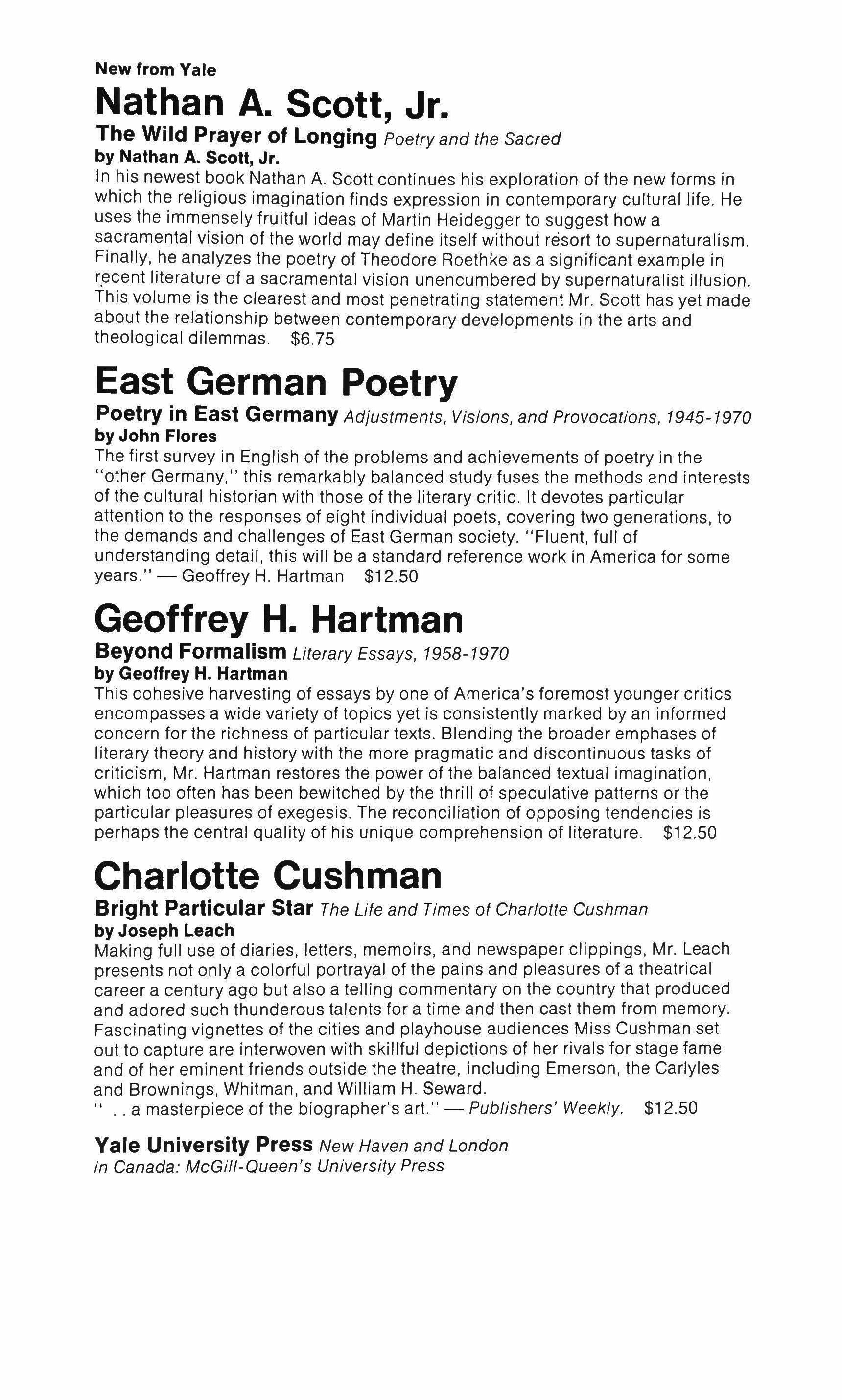
Nathan A. Scott, Jr.
The Wild Prayer of Longing Poetry and the Sacred by Nathan
A. Scott, Jr.
In his newest book Nathan A. Scott continues his exploration of the new forms in which the religious imagination finds expression in contemporary cultural life. He uses the immensely fruitful ideas of Martin Heidegger to suggest how a sacramental vision of the world may define itself without resort to supernaturalism. Finally, he analyzes the poetry of Theodore Roethke as a significant example in recent literature of a sacramental vision unencumbered by supernaturalist illusion. This volume is the clearest and most penetrating statement Mr. Scott has yet made about the relationship between contemporary developments in the arts and theological dilemmas. $6.75
East German Poetry
Poetry in East Germany Adjustments, Visions, and Provocations, 1945-1970 by
John Flores
The first survey in English of the problems and achievements of poetry in the "other Germany," this remarkably balanced study fuses the methods and interests of the cultural historian with those of the literary critic. It devotes particular attention to the responses of eight individual poets, covering two generations, to the demands and challenges of East German society. "Fluent, full of understanding detail, this will be a standard reference work in America for some years." - Geoffrey H. Hartman $12.50
Geoffrey H. Hartman
Beyond Formalism Literary Essays, 1958-1970
by Geoffrey H. Hartman
This cohesive harvesting of essays by one of America's foremost younger critics encompasses a wide variety of topics yet is consistently marked by an informed concern for the richness of particular texts. Blending the broader emphases of literary theory and history with the more pragmatic and discontinuous tasks of criticism, Mr. Hartman restores the power of the balanced textual imagination, which too often has been bewitched by the thrill of speculative patterns or the particular pleasures of exegesis. The reconciliation of opposing tendencies is perhaps the central quality of his unique comprehension of literature. $12.50
Charlotte Cushman
Bright Particular Star The Life and Times of Charlotte Cushman by
Joseph Leach
Making full use of diaries, letters, memoirs, and newspaper clippings, Mr. Leach presents not only a colorful portrayal of the pains and pleasures of a theatrical career a century ago but also a telling commentary on the country that produced and adored such thunderous talents for a time and then cast them from memory. Fascinating vignettes of the cities and playhouse audiences Miss Cushman set out to capture are interwoven with skillful depictions of her rivals for stage fame and of her eminent friends outside the theatre, including Emerson, the Carlyles and Brownings, Whitman, and William H. Seward. a masterpiece of the biographer's art." - Publishers' Weekly. $12.50
Yale University Press New Haven and London in Canada: McGill-Queen's University Press
New from Yale


D. M. Thomas David Jones
Anselm Hollo H�gh MacDiarmid
Ken Smith Basil Bunting
Peter Whigham Charles Tomlinson
Lee Harwood Ted Hughes
John Daniel Christopher Middleton
John Montague George MacBeth
Harry Guest Ian Hamilton Finlay
Nathaniel Tam Gael Turnbull
Tom Raworth
Matthew Mead
Gavin Bantock
Roy Fisher
Christopher Logue
Includes:










































































































































































 Port. Le!hr,s FiabinS NOJi. �o cau SiS!! Nett lOn's!.
Port. Le!hr,s FiabinS NOJi. �o cau SiS!! Nett lOn's!.
































































































































































































